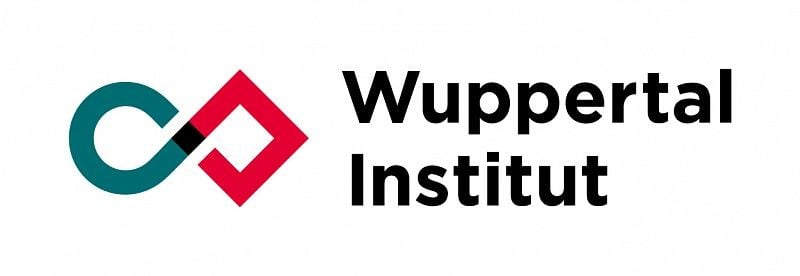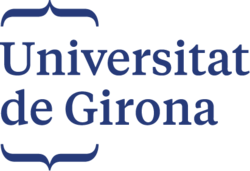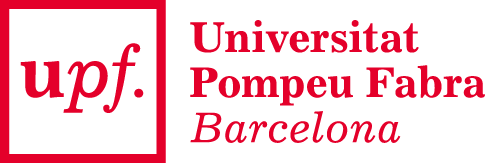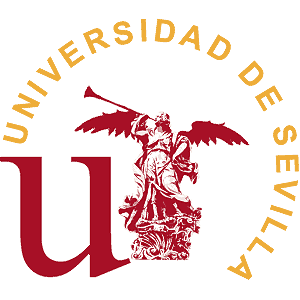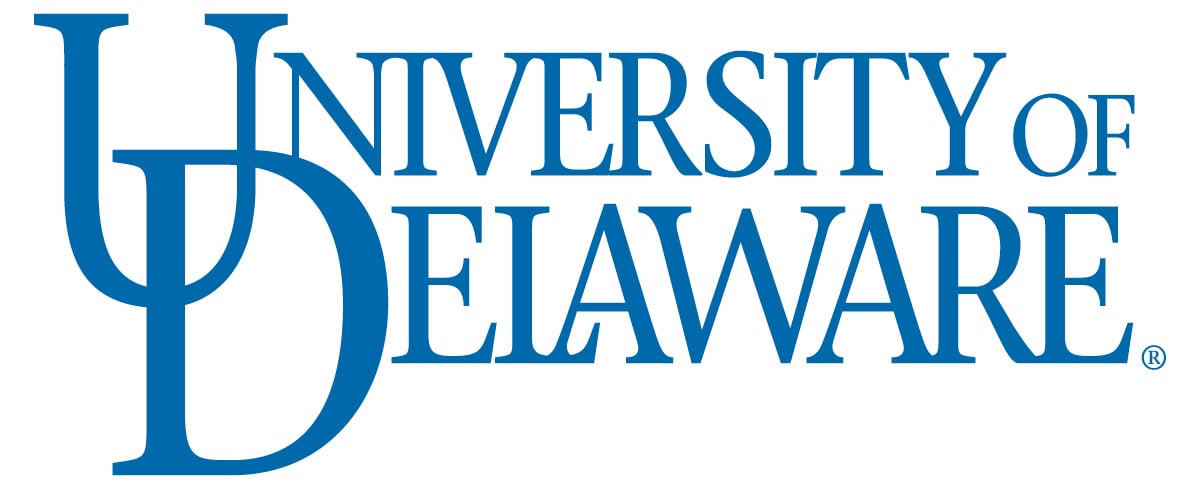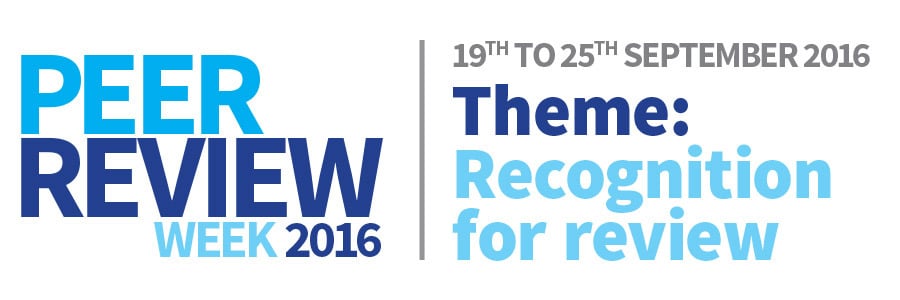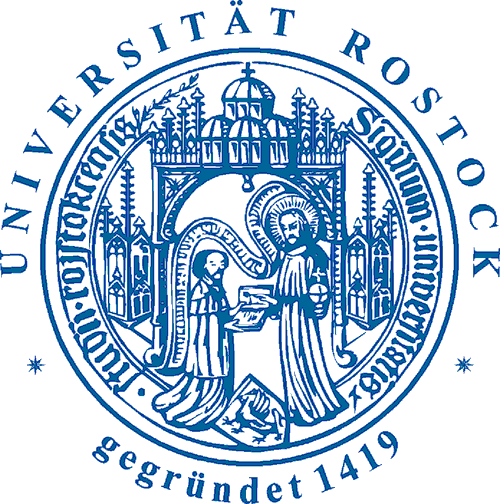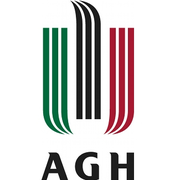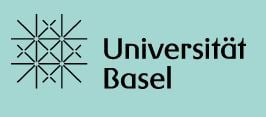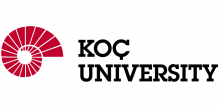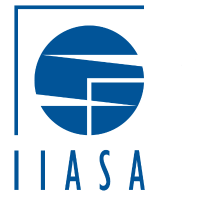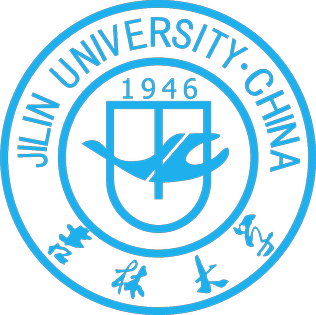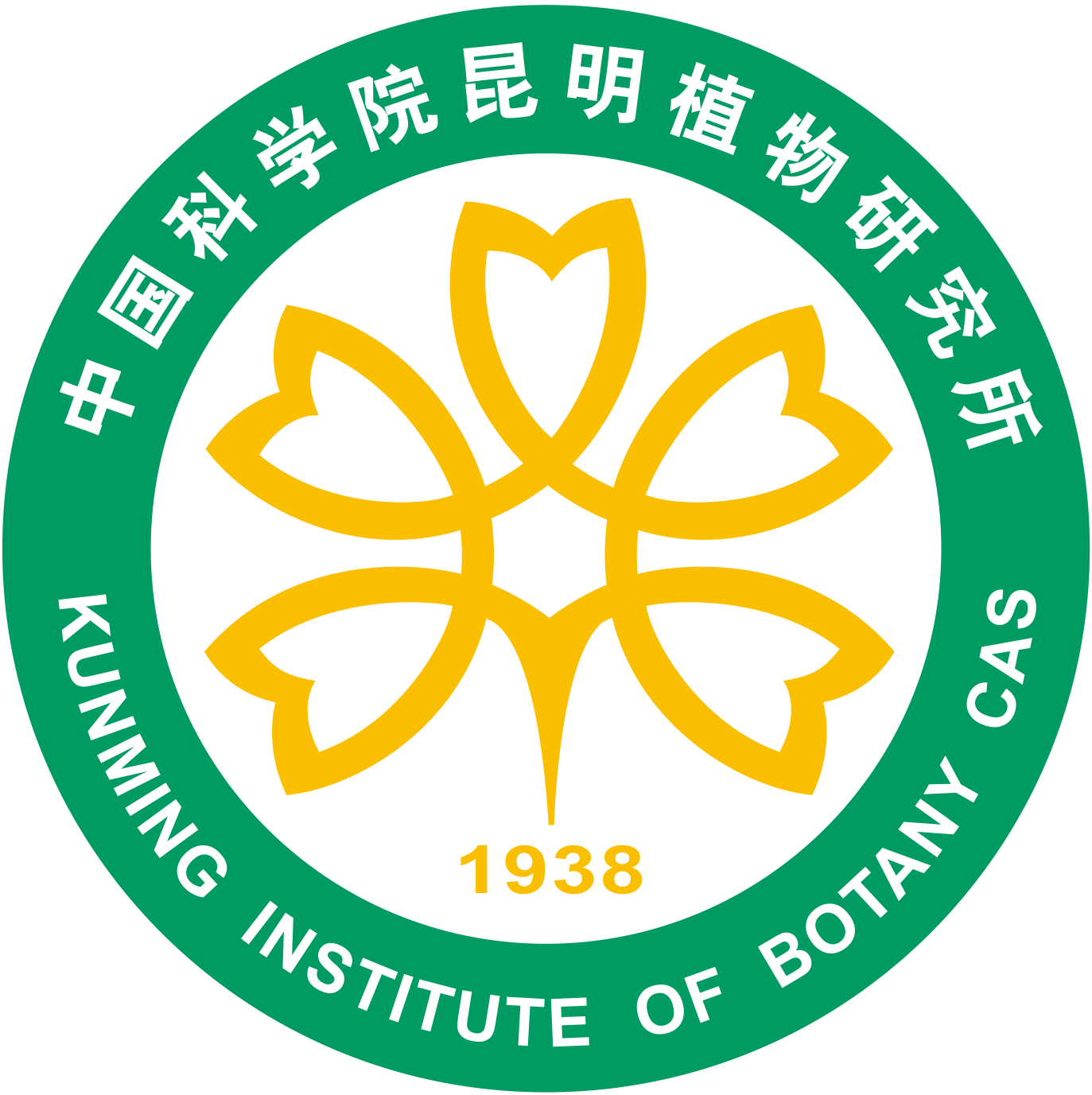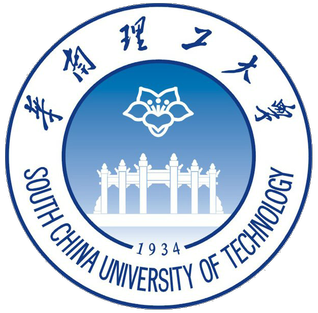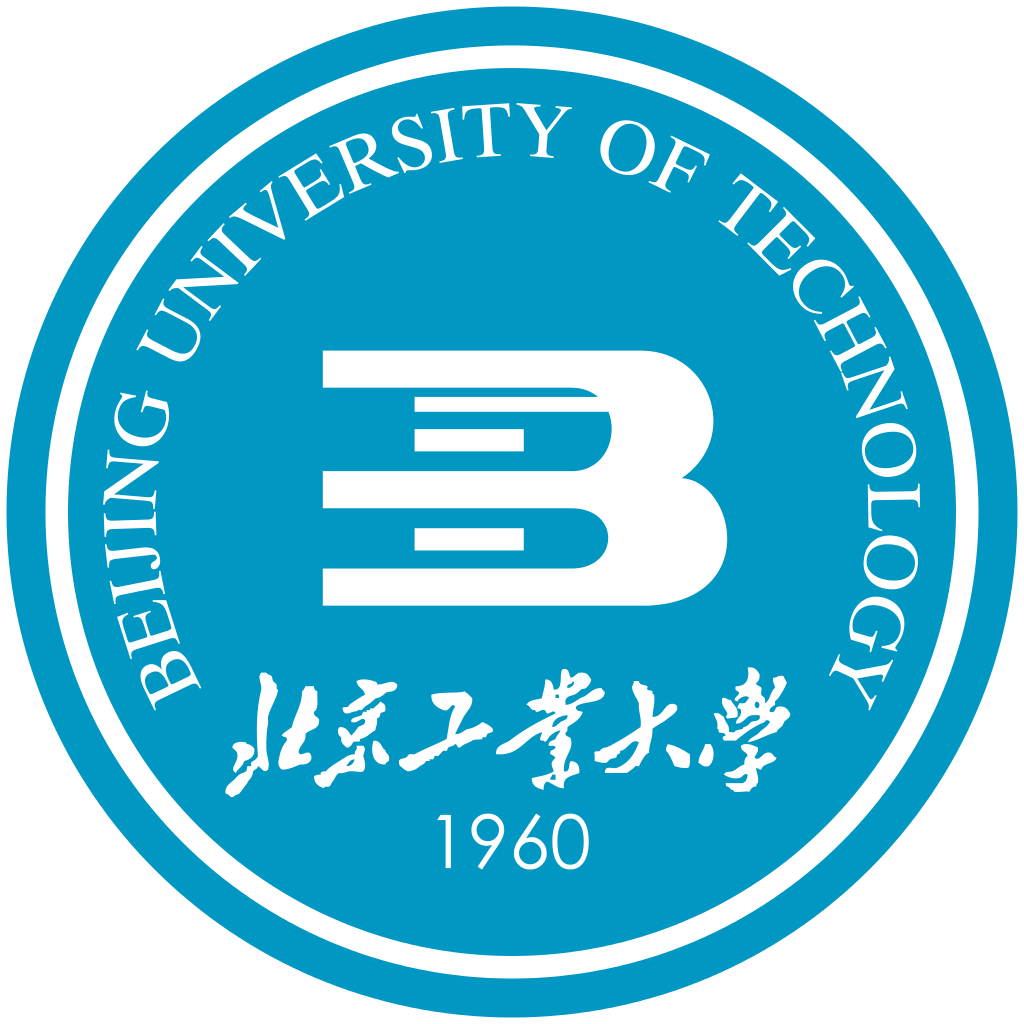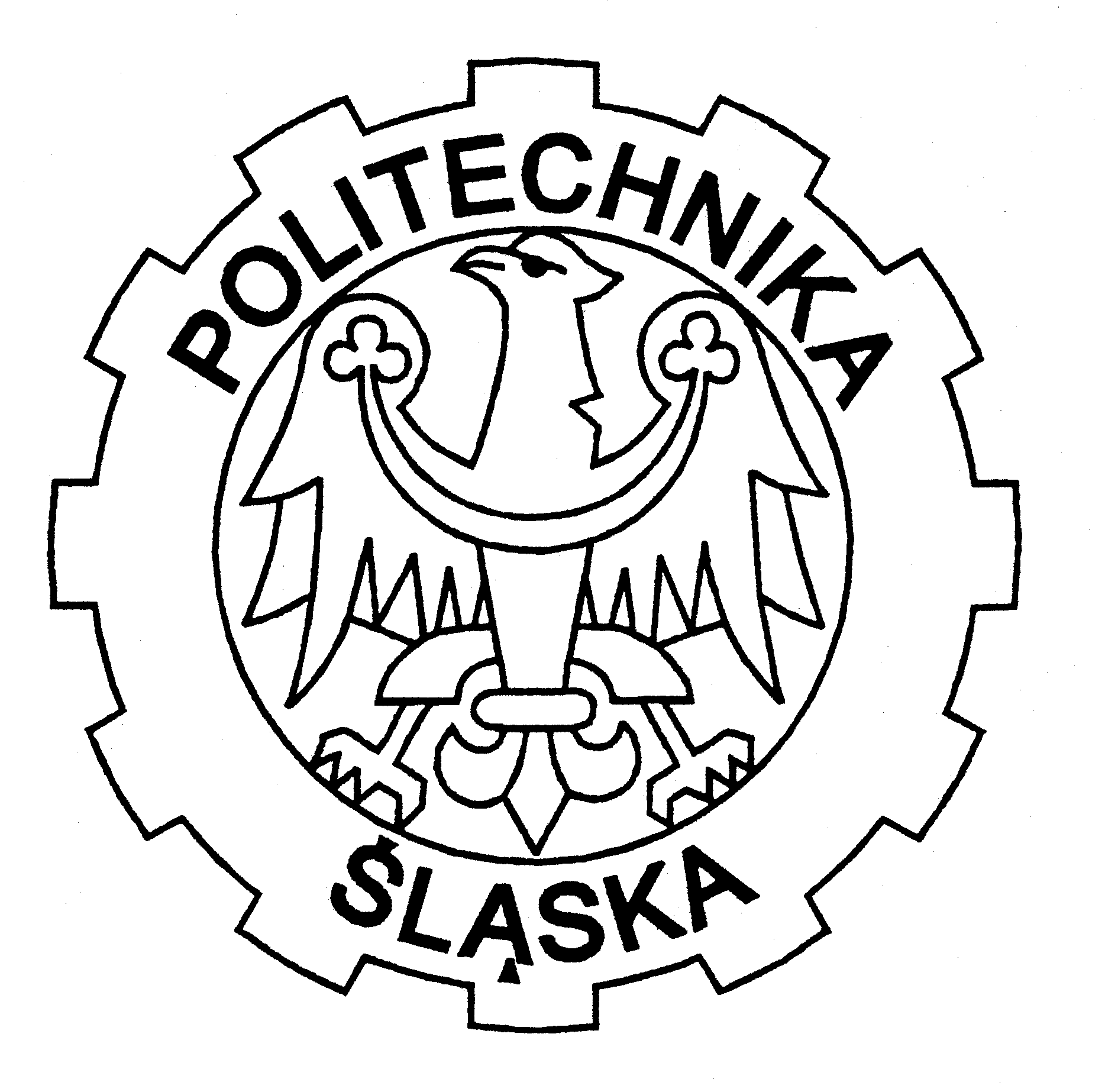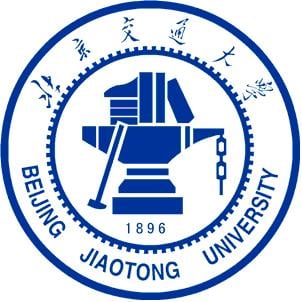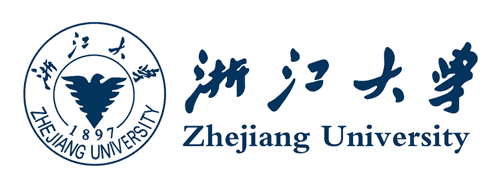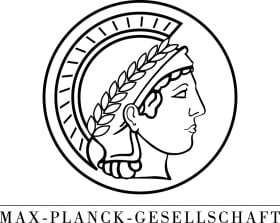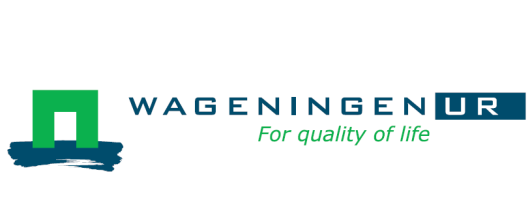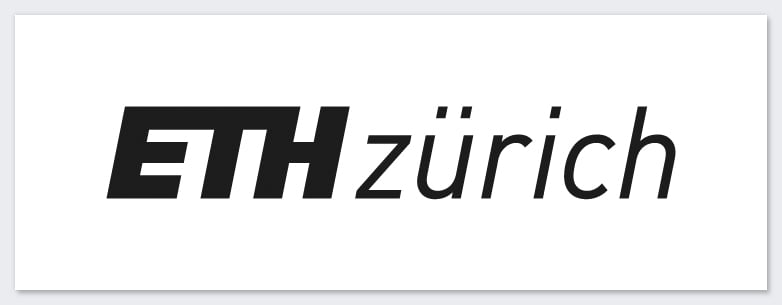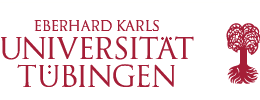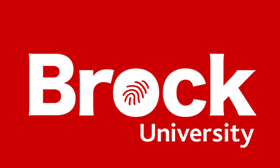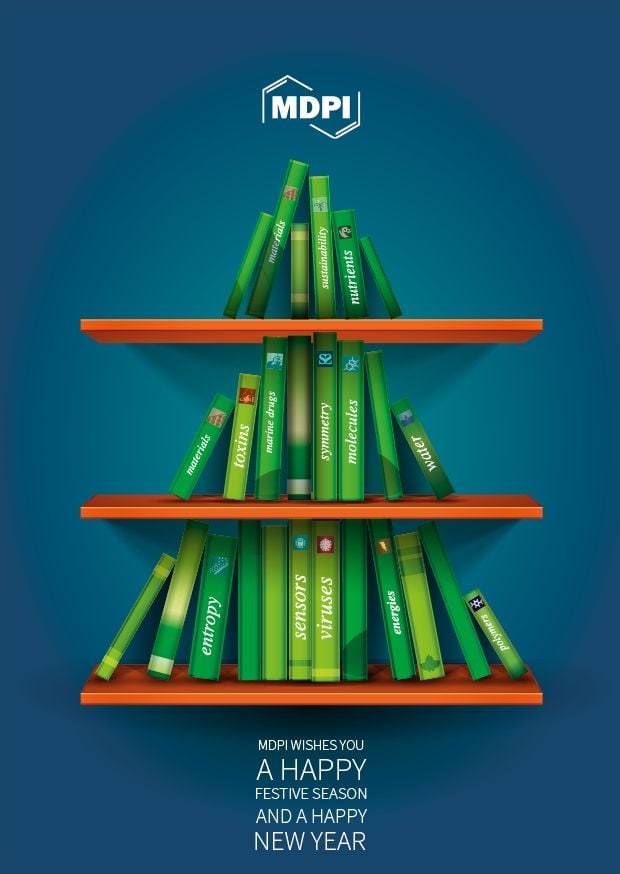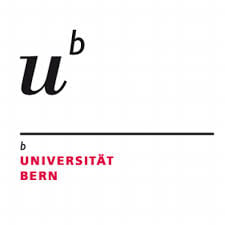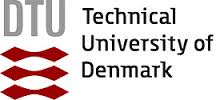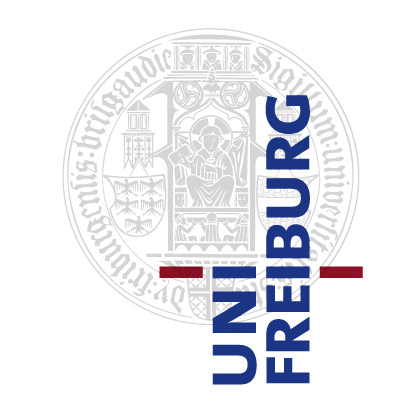
Journal Menu
► ▼ Journal Menu-
- Electronics Home
- Aims & Scope
- Editorial Board
- Reviewer Board
- Topical Advisory Panel
- Instructions for Authors
- Special Issues
- Topics
- Sections & Collections
- Article Processing Charge
- Indexing & Archiving
- Editor’s Choice Articles
- Most Cited & Viewed
- Journal Statistics
- Journal History
- Journal Awards
- Society Collaborations
- Conferences
- Editorial Office
Journal Browser
► ▼ Journal BrowserNeed Help?
Announcements
15 April 2024
Electronics 2024 Best Paper Award—Winners Announced
We are pleased to announce the winners of the Electronics 2024 Best Paper Award. All papers published in 2022 in Electronics (ISSN: 2079-9292) were considered for the award. After a thorough evaluation of the originality and significance of the papers, citations, and downloads, three winners were selected.
One Review:
“A Review of Wireless Power Transfer Systems for Electric Vehicle Battery Charging with a Focus on Inductive Coupling”
by Iman Okasili, Ahmad Elkhateb and Timothy Littler
Electronics 2022, 11(9), 1355; https://doi.org/10.3390/electronics11091355
Available online: https://www.mdpi.com/2079-9292/11/9/1355
Two Research Articles:
“A Deep Learning Model for Network Intrusion Detection with Imbalanced Data”
by Yanfang Fu, Yishuai Du, Zijian Cao, Qiang Li and Wei Xiang
Electronics 2022, 11(6), 898; https://doi.org/10.3390/electronics11060898
Available online: https://www.mdpi.com/2079-9292/11/6/898
“Machine Learning for DDoS Attack Detection in Industry 4.0 CPPSs”
by Firooz B. Saghezchi, Georgios Mantas, Manuel A. Violas, A. Manuel de Oliveira Duarte and Jonathan Rodriguez
Electronics 2022, 11(4), 602; https://doi.org/10.3390/electronics11040602
Available online: https://www.mdpi.com/2079-9292/11/4/602
Each winner will receive CHF 500, a chance to publish a paper free of charge in Electronics in 2024 after peer review, and a certificate.
Please join us in congratulating the winners of the Electronics 2024 Best Paper Award. We would also like to take this opportunity to thank all of our authors for their continued support of Electronics.
This announcement is delivered on behalf of the Assessment Committee—Prof. Dr. Flavio Canavero, Dr. Kostas Karpouzis, Prof. Dr. Manuel Arrebola, and Prof. Dr. Jingyang Fang.
Electronics Editorial Office
15 April 2024
Electronics 2023 Best Ph.D. Thesis Award—Winners Announced
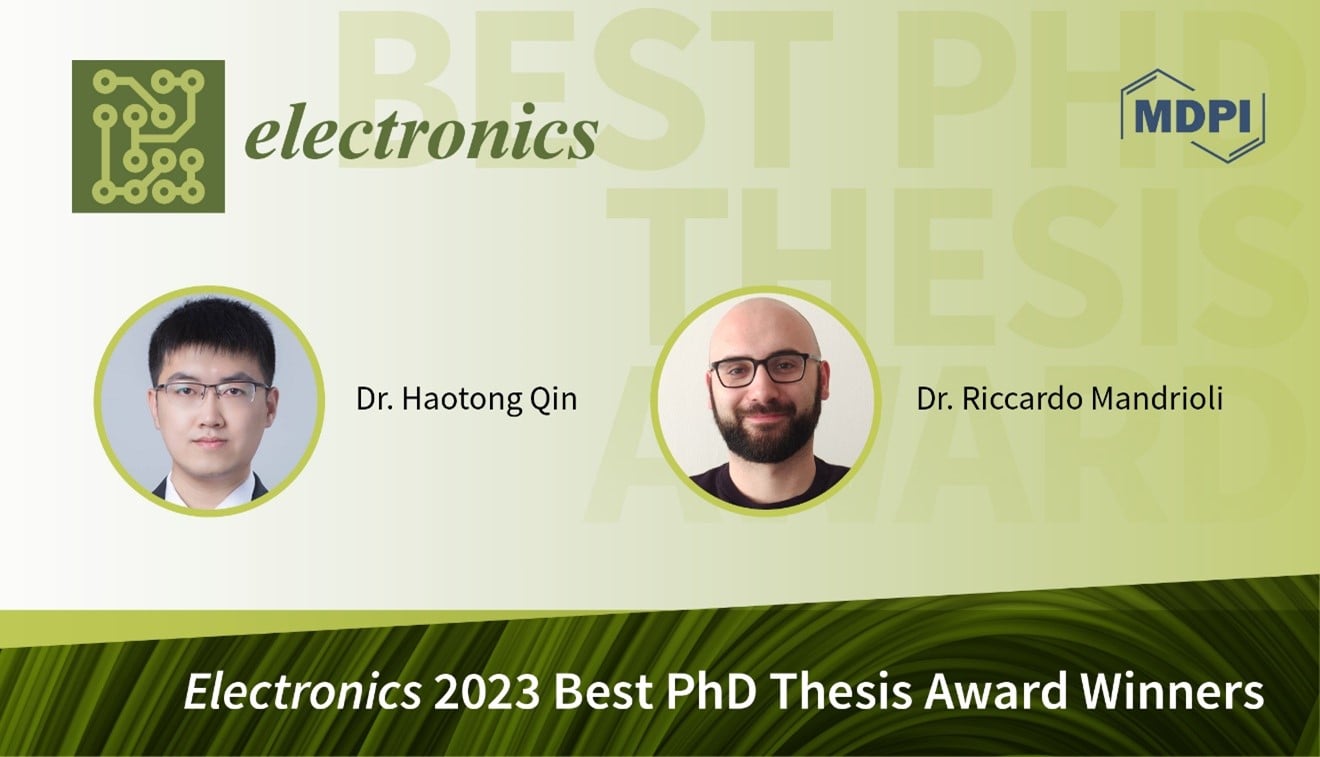
We are pleased to announce the winners of the Electronics 2023 Best Ph.D. Thesis Award. This award is for two Ph.D. students or recently qualified Ph.D.’s who have produced a highly anticipated thesis with great academic potential.
The award has been granted to the following:
“Hardware-friendly Low-bit Quantization for Neural Network Compression”
by Dr. Haotong Qin, Beihang University, China
“Analysis and Improvements of Four-Wire Power Converters for Electric Vehicle Chargers”
by Dr. Riccardo Mandrioli, University of Bologna, Italy
Each winner will receive CHF 800, a certificate, and a chance to publish a paper free of charge after peer review in Electronics (ISSN: 2079-9292) in 2024.
On behalf of the evaluation committee—Prof. Dr. George A Tsihrintzis, Prof. Dr. Francisco Falcone, Prof. Dr. Xiongfeng Ma, and Prof. Dr. Giulio Antonini—we congratulate the winners on their accomplishments. We would like to take this opportunity to thank all the applicants for submitting their exceptional theses and thank the Award Committee for voting and helping with this award.
Prof. Dr. Flavio Canavero
Editor-in-Chief of Electronics
12 April 2024
Meet Us at the ISPRS TC I Mid-term Symposium on Intelligent Sensing and Remote Sensing Application (ISPRS 2024 TC I), 13–17 May 2024, Changsha, China
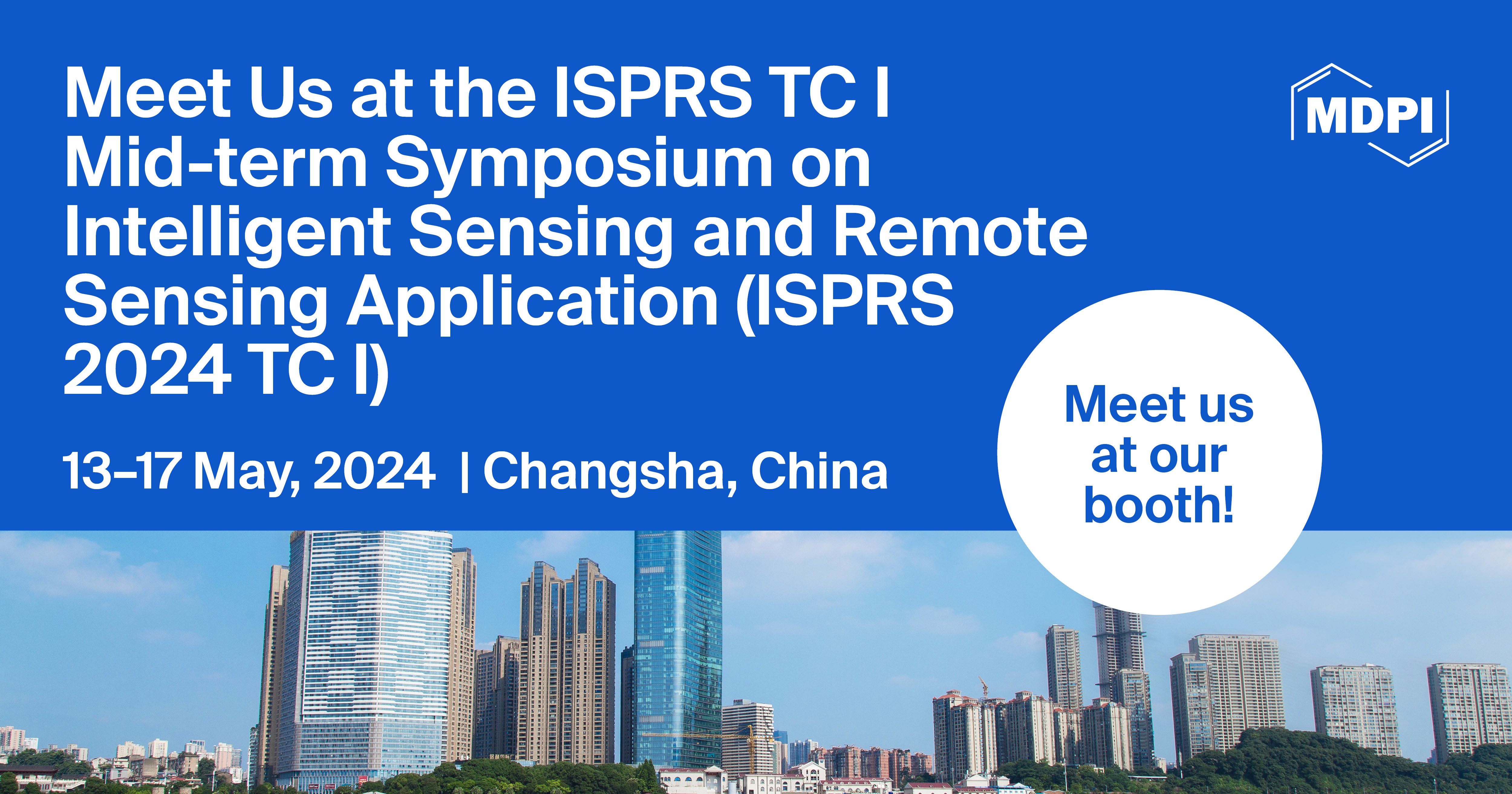
MDPI will be attending the ISPRS TC I Mid-term Symposium on Intelligent Sensing and Remote Sensing Application 2024 in Changsha, China, which will take place from the 13 to 17 May 2024. Centering around the research areas of TC I and its subordinate working groups, the symposium includes plenary sessions, technical sessions, paper posters, technology exhibitions, and technical visits. If you are attending the conference, please visit our booth. Our delegates look forward to meeting you in person and answering any questions you may have.
The following MDPI journals will be represented at the conference:
- IJGI;
- Remote Sensing;
- Electronics;
- Inventions;
- Drones;
- AI;
- Technologies;
- Journal of Imaging;
- Smart Cities.
If you are attending this conference, please feel free to start a conversation with us at our booth. The booth number will be announced online later. Our delegates look forward to meeting you in person and answering any questions that you may have.
12 April 2024
Electronics | Highly Cited Papers in 2022–2023 in the Section “Systems & Control Engineering”
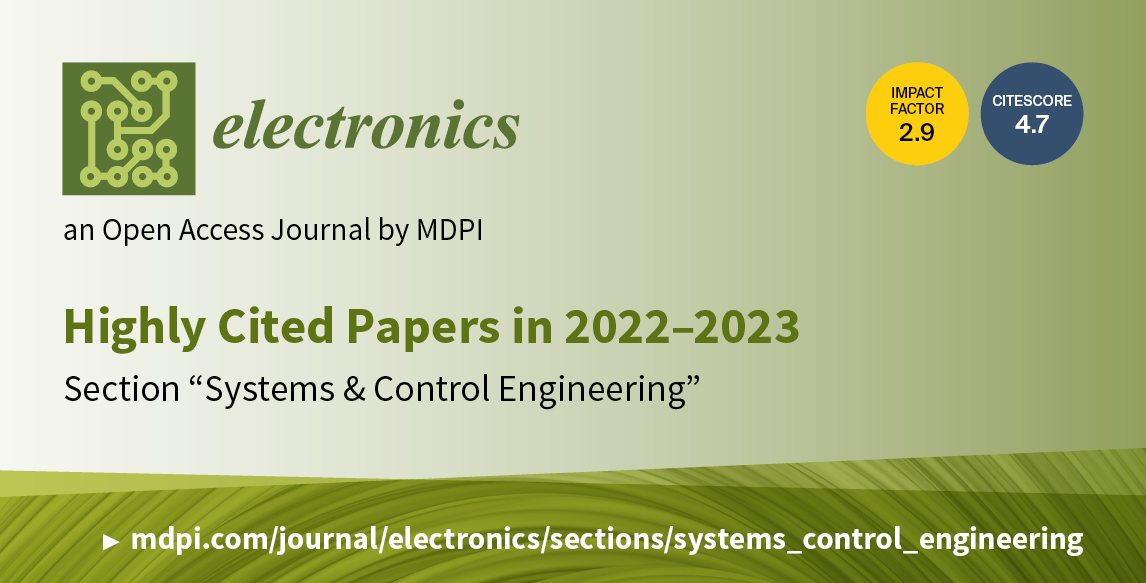
The “Systems & Control Engineering” Section of Electronics (ISSN: 2079-9292) provides the field of electrical and computer engineering with a unified paradigm for designing controllers in a variety of application domains. Initially developed in the context of electrical engineering, this dynamic field has come to represent an essential enabling and supporting technology for a wide range of sectors (energy, transport, manufacturing, biology, defense, robotics, etc.).
This Section is devoted to publishing focused articles related to control aspects of electronics and engineering systems, more specifically including theoretical developments and applications of control engineering as embedded control systems, mechatronics, smart systems, power systems, electrical circuits, and computer science, for the enhancement of electronic systems and processes.
You have free and unlimited access to the full texts of all the open access articles published in our journal. We welcome you to read our most highly cited papers published in 2022 and 2023 below:
1. “Minimal-Approximation-Based Adaptive Event-Triggered Control of Switched Nonlinear Systems with Unknown Control Direction”
by Yumeng Cao, Ning Zhao, Ning Xu, Xudong Zhao and Fawaz E. Alsaadi
Electronics 2022, 11(20), 3386; https://doi.org/10.3390/electronics11203386
Available online: https://www.mdpi.com/2079-9292/11/20/3386
2. “Review of Collision Avoidance and Path Planning Algorithms Used in Autonomous Underwater Vehicles”
by Rafał Kot
Electronics 2022, 11(15), 2301; https://doi.org/10.3390/electronics11152301
Available online: https://www.mdpi.com/2079-9292/11/15/2301
3. “Deep Reinforcement Learning for Intelligent Dual-UAV Reconnaissance Mission Planning”
by Xiaoru Zhao, Rennong Yang, Ying Zhang, Mengda Yan and Longfei Yue
Electronics 2022, 11(13), 2031; https://doi.org/10.3390/electronics11132031
Available online: https://www.mdpi.com/2079-9292/11/13/2031
4. “Real-Time ISR-YOLOv4 Based Small Object Detection for Safe Shop Floor in Smart Factories”
by Byungjin Ku, Kangsan Kim and Jongpil Jeong
Electronics 2022, 11(15), 2348; https://doi.org/10.3390/electronics11152348
Available online: https://www.mdpi.com/2079-9292/11/15/2348
5. “Multiparameter Identification of Permanent Magnet Synchronous Motor Based on Model Reference Adaptive System—Simulated Annealing Particle Swarm Optimization Algorithm”
by Guoyong Su, Pengyu Wang, Yongcun Guo, Gang Cheng, Shuang Wang and Dongyang Zhao
Electronics 2022, 11(1), 159; https://doi.org/10.3390/electronics11010159
Available online: https://www.mdpi.com/2079-9292/11/1/159
6. “Vertiport Operations Modeling, Agent-Based Simulation and Parameter Value Specification”
by Lukas Preis and Mirko Hornung
Electronics 2022, 11(7), 1071; https://doi.org/10.3390/electronics11071071
Available online: https://www.mdpi.com/2079-9292/11/7/1071
7. “Automatic Weight Prediction System for Korean Cattle Using Bayesian Ridge Algorithm on RGB-D Image”
by Myung Hwan Na, Wan Hyun Cho, Sang Kyoon Kim and In Seop Na
Electronics 2022, 11(10), 1663; https://doi.org/10.3390/electronics11101663
Available online: https://www.mdpi.com/2079-9292/11/10/1663
8. “Energy Management Strategies for Hybrid Energy Storage Systems Based on Filter Control: Analysis and Comparison”
by Germán Andrés Ramos and Ramon Costa-Castelló
Electronics 2022, 11(10), 1631; https://doi.org/10.3390/electronics11101631
Available online: https://www.mdpi.com/2079-9292/11/10/1631
9. “Supervisor Design for a Pressurized Reactor Unit in the Presence of Sensor and Actuator Faults”
by Fotis N. Koumboulis, Dimitrios G. Fragkoulis, Ioannis Kalkanas and George F. Fragulis
Electronics 2022, 11(16), 2534; https://doi.org/10.3390/electronics11162534
Available online: https://www.mdpi.com/2079-9292/11/16/2534
10. “ASSIST-IoT: A Modular Implementation of a Reference Architecture for the Next Generation Internet of Things”
by Paweł Szmeja, Alejandro Fornés-Leal, Ignacio Lacalle, Carlos E. Palau, Maria Ganzha, Wiesław Pawłowski, Marcin Paprzycki and Johan Schabbink
Electronics 2023, 12(4), 854; https://doi.org/10.3390/electronics12040854
Available online: https://www.mdpi.com/2079-9292/12/4/854
11. “The Application of Improved Harmony Search Algorithm to Multi-UAV Task Assignment”
by Yujuan Cui, Wenhan Dong, Duoxiu Hu and Haibo Liu
Electronics 2022, 11(8), 1171; https://doi.org/10.3390/electronics11081171
Available online: https://www.mdpi.com/2079-9292/11/8/1171
12. “Improved Linear Quadratic Regulator Lateral Path Tracking Approach Based on a Real-Time Updated Algorithm with Fuzzy Control and Cosine Similarity for Autonomous Vehicles”
by Zhaoqiang Wang, Keyang Sun, Siqun Ma, Lingtao Sun, Wei Gao and Zhuangzhuang Dong
Electronics 2022, 11(22), 3703; https://doi.org/10.3390/electronics11223703
Available online: https://www.mdpi.com/2079-9292/11/22/3703
13. “Bin-Picking Solution for Randomly Placed Automotive Connectors Based on Machine Learning Techniques”
by Pedro Torres, Janis Arents, Hugo Marques and Paulo Marques
Electronics 2022, 11(3), 476; https://doi.org/10.3390/electronics11030476
Available online: https://www.mdpi.com/2079-9292/11/3/476
14. “Model Reference Adaptive Control of Marine Permanent Magnet Propulsion Motor Based on Parameter Identification”
by Yubo Huang, Jundong Zhang, Dong Chen and Jiahao Qi
Electronics 2022, 11(7), 1012; https://doi.org/10.3390/electronics11071012
Available online: https://www.mdpi.com/2079-9292/11/7/1012
15. “Improved Rapidly Exploring Random Tree with Bacterial Mutation and Node Deletion for Offline Path Planning of Mobile Robot”
by Aphilak Lonklang and János Botzheim
Electronics 2022, 11(9), 1459; https://doi.org/10.3390/electronics11091459
Available online: https://www.mdpi.com/2079-9292/11/9/1459
12 April 2024
Meet Us at the 16th International Conference on Hybrid and Organic Photovoltaics, 13–15 May 2024, Valencia, Spain

MDPI will be attending the 16th International Conference on Hybrid and Organic Photovoltaics in Valencia, Spain, which will take place from 13 to 15 May 2024. Key topics of the conference include material design in organic and hybrid photovoltaics, artificial intelligence and machine learning for energy technologies, advanced characterization techniques for new-generation photovoltaics, breaking efficiency limits, operational stability measurement and reporting, scale-up and commercialization of new-generation photovoltaics, emerging framework materials for energy conversion, multifunctional materials in energy conversion and beyond, emerging concepts in solar energy conversion (from optoionics to photoferroics), photoelectrochemical energy conversion, and energy policy and diplomacy.
The following MDPI journals will be represented:
- Electronics;
- Energies;
- Inventions;
- Micromachines;
- Optics;
- Photonics;
- QuBS.
If you are attending the conference, please visit our booth. Our delegates look forward to meeting you in person and answering any questions that you may have. For more information about the conference, please visit the following link: https://www.nanoge.org/HOPV24/.
2 April 2024
MDPI Insights: The CEO's Letter #10 - South Korea, IWD, U2A, Japan

Welcome to the MDPI Insights: The CEO's Letter.
In these monthly letters, I will showcase two key aspects of our work at MDPI: our commitment to empowering researchers and our determination to facilitating open scientific exchange.
Opening Thoughts

Left to right: Dr. Jisuk Kang (Scientific Officer, MDPI), Stefan Tochev (CEO, MDPI), and Dr. Giulia Stefenelli (Chair of Scientific Office Board, MDPI), during media meetings at Prain Agency office in Seoul, South Korea.
Visit to Seoul, South Korea
During my recent visit to South Korea, I had the privilege of meeting various stakeholders, including representatives of government, research institutions, and academia, to understand their needs and communicate MDPI’s commitment to accessible science. Accompanied by my colleagues Dr. Giulia Stefenelli and Dr. Jisuk Kang, I engaged with the Korean scientific community, which is increasingly embracing open access (OA).
As the leading OA publisher in South Korea, MDPI is trusted by local authors and in 2023 enjoyed an approximately 30% share of the OA market. South Korea ranks sixth globally for MDPI in terms of research papers submitted and published.
MDPI and South Korea by Numbers
As at 30 March, over 76,000 MDPI articles have been authored by individuals affiliated with Korean institutions. We have over 1,800 active editorial board members (EBMs) from South Korea, with more than 880 EBMs having an H-index between 26 and 50, including 10 serving as Chief Editors.
“South Korea is the sixth-largest contributor to our total publications”
Over the past five years (2019–2023), nearly 120,000 authors affiliated with South Korean institutes have published with MDPI. Specifically in 2023, we received approximately 25,000 submissions from South Korean authors, publishing close to 13,000 articles, resulting in a rejection rate of 47.4%, which is not far below MDPI’s overall rejection rate of 56.4% in 2023.
Institutional Partnerships with South Korea
I am pleased to share that MDPI has more than 825 institutional partnerships worldwide, with 12 in South Korea, including Kyunghee University, Chung-Ang University, and Inha University, among others.

Left to right: Dr. Jisuk Kang (Scientific Officer, MDPI), Dr. Giulia Stefenelli (Chair of Scientific Office Board, MDPI), and Stefan Tochev (CEO, MDPI) fielding media questions at Prain PR Agency office in Seoul, South Korea.
Over the past three years (2021–2023), we have had some of the most prestigious academic universities ranked among the top 10 Korean institutions publishing with MDPI. Seoul National University had the highest number of publications with MDPI during those three years, publishing nearly 6,000 papers. Universities such as Korea University and Yonsei University also rank among the top 10 Korean institutions publishing with MDPI.
MDPI Hosts Seminar for Academia and Media
As the world’s leading OA publisher, MDPI is actively democratizing science. This is reflected in the seminars we hosted on 21 March to address questions about our editorial processes and ethical standards. The visit garnered media coverage, reflecting our mission to providing high-quality services and fostering open dialogue in the community.
“MDPI is actively democratizing science”
MDPI in the News

Stefan Tochev (CEO, MDPI) leading a seminar on OA and MDPI at Prain PR Agency office in Seoul, South Korea.
Media coverage generated by our visit to Seoul included the following stories:
“Open access is an unstoppable trend…it will lead the development of the knowledge ecosystem.”
I greatly appreciate the contributions of everyone who took the time to meet with us, share their stories, and hold us accountable for continuing to provide high-quality publishing services while identifying areas for improvement. I am also excited to announce that we have opened an MDPI office in Seoul and will release a press release on MDPI.com, with details, by the end April 2024. The purpose of the office is to establish a local presence to connect with and support the South Korean academic community through institutional partnerships, conferences, author workshops, stakeholder communications, and more.
Impactful Research

Featured Articles on Women’s Leadership and Healthcare
In celebration of International Women’s Day (8 March 2024), MDPI curated a collection of research articles on various topics, including women’s leadership, reproductive health, preventive healthcare, and a selection of articles from our journal Women.
Women’s Leadership
- Women Entrepreneurship and Sustainable Development: Bibliometric Analysis and Emerging Research Trends
Sustainability 2022, 14, 9160. https://doi.org/10.3390/su14159160 - Refugee Women Business Mentors: New Evidence for Women’s Empowerment
Sustainability 2022, 14, 9154. https://doi.org/10.3390/su14159154 - Women and Leadership in Higher Education: A Systematic Review
Soc. Sci. 2023, 12, 555. https://doi.org/10.3390/socsci12100555 - Understanding Needs and Potentials for Gender-Balanced Empowerment and Leadership in Climate Change Adaptation and Mitigation in Africa
Sustainability 2022, 14, 9410. https://doi.org/10.3390/su14159410 - Challenges Women Experience in Leadership Careers: An Integrative Review
Merits 2023, 3, 366-389. https://doi.org/10.3390/merits3020021
Women’s Reproductive Health
- Recreational Female Athletes’ Understanding of and Perceived Impact of the Menstrual Cycle on Physical Performance, Mood, and Sleeping Behaviour
Women 2023, 3, 445-456. https://doi.org/10.3390/women3030034 - Difficulties in Adaptation of the Mother and Newborn via Cesarean Section versus Natural Birth—A Narrative Review
Life 2023, 13, 300. https://doi.org/10.3390/life13020300 - The Main Theories on the Pathogenesis of Endometriosis
Int. J. Mol. Sci. 2023, 24, 4254. https://doi.org/10.3390/ijms24054254
Women’s Preventive Healthcare
- Insulin Metabolism in Polycystic Ovary Syndrome: Secretion, Signaling, and Clearance
Int. J. Mol. Sci. 2023, 24, 3140. https://doi.org/10.3390/ijms24043140 - Assessing Barriers Encountered by Women in Cervical Cancer Screening and Follow-Up Care in Urban Bolivia, Cochabamba
Healthcare 2022, 10, 1604. https://doi.org/10.3390/healthcare10091604 - Updates on HPV Vaccination
Diagnostics 2023, 13, 243. https://doi.org/10.3390/diagnostics13020243
Featured Articles in MDPI Journal Women
Below are a few articles from Women, our journal focused on women’s health, the social determinants of health, and the healthcare system that serves women. The aim of Women is to encourage academics to publish their experimental and theoretical results in detail, to aid reproducibility, and in an engaging style, to aid comprehensibility.
- Premenstrual Syndrome and Exercise: A Narrative Review
Women 2023, 3, 348-364. https://doi.org/10.3390/women3020026 - Increasing Awareness of the Human Papillomavirus (HPV) Vaccine for Women 18–45 Years of Age
Women 2023, 3, 365-373. https://doi.org/10.3390/women3030027 - Addressing Women’s Needs with Human Immunodeficiency Virus (HIV) and Enhancing the Visibility of Pharmacists in the Public Health Arena
Women 2022, 2, 346-352. https://doi.org/10.3390/women2040032
Inside MDPI

Championing Women’s Healthcare and Access to Healthcare Information
MDPI colleagues from our offices joined in celebrating #IWD2024. In doing so, we emphasized key missions that encompass:
- Empowering women to assume leadership and decision-making roles in both business and science.
- Helping women and girls make informed decisions about their health.
- Recruiting and developing female talent and fostering inclusive workplace environments.
“We are thrilled to recognize the accomplishments of women scientists”
I am proud to see our colleagues enthusiastically supporting the International Women’s Day call to ‘Inspire Inclusion!’ The heart-hands in the collage below symbolize our appreciation of the achievements of women researchers and the recognition of the trailblazers who have courageously made a mark on societies past and present.

We are thrilled to recognize the accomplishments of women scientists through our many MDPI awards and by highlighting success stories. As inspirational figures, female scientists are paving the way for the next generation of women aspiring to pursue careers in engineering, life sciences, computing, and various other STEM fields.
“I consider myself lucky because I work with incredibly talented women who inspire me every day.”
– Dr. Alessandra Pasut, Winner of MDPI's ‘Biology 2023 Young Investigator Award’
“It’s really important to find a supportive and enabling environment in which to do your science; it would have a big impact on you as a person and on your scientific outputs.”
– Dr. Rhea Longley, Winner of the ‘Pathogens 2023 Young Investigator Award’
Open-access publishing, in particular, allows early-career women researchers to share their work more widely, potentially attracting mentorship opportunities and collaborations. This support is crucial for career development and advancement.
Coming Together for Science

MDPI Joins United2Act in Collective Fight to Stop Paper Mills
In my February 2024 CEO Letter, I highlighted some of our recent initiatives aimed at bolstering our commitment to research integrity, including joining the STM Integrity Hub and expanding our Research Integrity and Publication Ethics team (RIPE). Continuing our efforts in coming together for science, I am pleased to share our participation in the United2Act initiative.
The text below is taken from our official announcement:
United2Act represents an international group of stakeholders in the publishing industry committed to addressing the collective challenge posed to research integrity by paper mills.
Scientists and academic publishers have increasingly noted the alarming proliferation of paper mills, recognized as fraudulent entities seeking to manipulate the publication process for financial profit. These entities engage in fraudulent practices such as falsifying or fabricating data, selling co-authorship of fake papers, manipulating peer review, and including inappropriate citations. These actions pose a significant threat to the integrity of the scholarly record, prompting widespread concern among those involved in the academic community.
MDPI has been actively contributing to combat the undermining of the scientific record. Our editors employ a set of tools to detect potential ethical breaches within a manuscript and to tackle the issue of fake papers.
United2Act’s consensus statement is the outcome of a virtual summit held in May 2023. It involved the participation of research bodies, publishers, researchers/sleuths, universities, and publishing infrastructure from 15 countries and resulted in a Consensus Statement outlining five key areas of action for all stakeholders:
- Education and awareness
- Improve post-publication corrections
- Facilitate and organise research on paper mills
- Enable the development of trust markers
- Facilitate dialogue between stakeholders
MDPI is committed to promoting transparency and integrity in scholarly publishing and is continuing to work closely with the scientific community toward this goal.
Closing Thoughts

Left to right: Ryo Hirayama (Marketing Specialist, MDPI), Takashi Sasabe (Marketing Specialist, MDPI), Dr. Giulia Stefenelli (Chair of Scientific Office Board, MDPI), Dr. Izumi Yamamoto (Marketing Manager, MDPI), and Stefan Tochev (CEO, MDPI), at MDPI’s office in Tokyo, Japan.
Visit to Tokyo and Kyoto, Japan
In March, I had the opportunity to visit our Tokyo office and engage with stakeholders in Tokyo and Kyoto. During the visit, I also recorded a video message to welcome Japanese scholars working with MDPI and to highlight our operations in Japan.
We held meetings with Editors-in-Chief, librarians, scholars, and external consultants to gather feedback on our efforts to enhance our reputation and explore additional steps we can take in that direction. Japan's rich cultural heritage, characterized by tradition, respect, and formality, provided valuable insights into meeting the publishing needs specific to Japan.
Japan’s Open Access statistics
Over the years, we have seen a shift from subscription-only to gold OA publishing in Japan, despite the lack of an official mandate. Here are some statistics:
- 2012: 68% of articles were subscription-only, 6% were green Open Access, and 8% were gold Open Access.
- 2016: 55% of articles were subscription-only, 6% were green Open Access, and 20% were gold Open Access.
- 2022: 43% of articles were subscription-only, 7% were green Open Access, and 39% were gold Open Access.
To learn more about the history of OA in Japan as well as about future trends, please read this blog post.
“Japan is the ninth-largest contributor to our total publications”

Left to right: Stefan Tochev (CEO, MDPI), Dr. Izumi Yamamoto (Marketing Manager, MDPI), and Dr. Giulia Stefenelli (Chair of Scientific Office Board, MDPI) visiting Kyoto University in Kyoto, Japan.
MDPI and Japan by Numbers
As at 1 April, over 50,000 MDPI articles have been authored by scholars affiliated with Japanese institutions, making the country the ninth-largest contributor to our total publications. Over the past three years (2020–2023), nearly 90,000 authors affiliated with Japanese institutes have published with MDPI, and we have collaborated with over 4,600 Guest Editors from Japan.
In 2023, we published over 8,200 papers from authors associated with Japanese institutions. MDPI collaborates with 41 institutional partnerships in Japan, including the University of Tokyo, Hokkaido University, and Nagoya University. We have over 2,100 active EBMs from Japan, more than 1,050 EBMs having an H-index between 26 and 50, including 13 serving as Editors-in-Chief.
General Feedback – a side note
A general takeaway from our discussions with stakeholders from around the world is that negative perceptions of MDPI often stem from misinformation, misconceptions, or misunderstandings about MDPI and our practices. While we acknowledge our mistakes and work diligently to address them, maintaining a strong editorial procedure and robust peer-review process, I find that educating stakeholders about our how we do what we do and our ongoing improvements tends to help shift opinions.
That said, we recognize the importance of addressing individual concerns. We take feedback seriously and are continuously working to get better while not compromising the core principles that millions of authors appreciate about MDPI.
Chief Executive Officer
MDPI AG
29 March 2024
Electronics | Highly Cited Papers in 2022 in the Section “Artificial Intelligence”
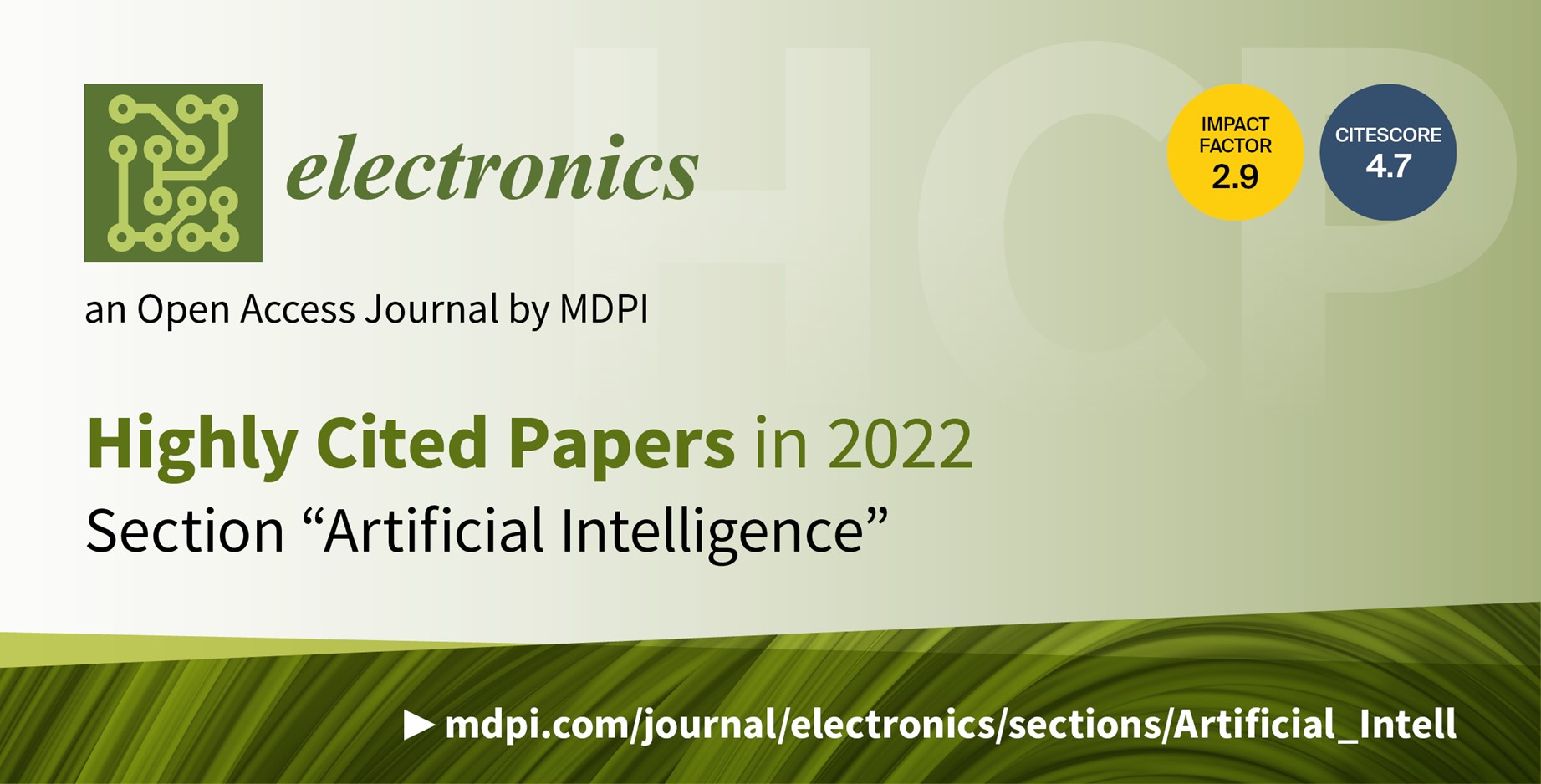
The “Artificial Intelligence” Section of the journal Electronics (ISSN: 2079-9292) mainly covers topics of interest within unique hardware-based deep learning AI and algorithmic deep learning AI using machine learning. The purpose of this Section is to bring together researchers and engineers, from both academia and industry, to present novel ideas and solid research on the hardware and algorithmic aspects of advanced applications of deep learning-based AI.
As all of the articles published in our journal are in an open access format, you have free and unlimited access to the full texts. We welcome you to read our most highly cited papers published in 2022 listed below:
1. “A Survey of Recommendation Systems: Recommendation Models, Techniques, and Application Fields”
by Hyeyoung Ko, Suyeon Lee and Yoonseo Park
Electronics 2022, 11(1), 141; https://doi.org/10.3390/electronics11010141
Available online: https://www.mdpi.com/2079-9292/11/1/141
2. “Human-Computer Interaction in Customer Service: The Experience with AI Chatbots—A Systematic Literature Review”
by Luminița Nicolescu and Monica Teodora Tudorache
Electronics 2022, 11(10), 1579; https://doi.org/10.3390/electronics11101579
Available online: https://www.mdpi.com/2079-9292/11/10/1579
3. “A Systematic Review on Oral Interactions in Robot-Assisted Language Learning”
by Vivien Lin, Hui-Chin Yeh and Nian-Shing Chen
Electronics 2022, 11(2), 290; https://doi.org/10.3390/electronics11020290
Available online: https://www.mdpi.com/2079-9292/11/2/290
4. “Using Deep Learning Networks to Identify Cyber Attacks on Intrusion Detection for In-Vehicle Networks”
by Hsiao-Chung Lin, Ping Wang, Kuo-Ming Chao, Wen-Hui Lin and Jia-Hong Chen
Electronics 2022, 11(14), 2180; https://doi.org/10.3390/electronics11142180
Available online: https://www.mdpi.com/2079-9292/11/14/2180
5. “Grey Wolf Optimizer in Design Process of the Recurrent Wavelet Neural Controller Applied for Two-Mass System”
by Mateusz Zychlewicz, Radoslaw Stanislawski and Marcin Kaminski
Electronics 2022, 11(2), 177; https://doi.org/10.3390/electronics11020177
Available online: https://www.mdpi.com/2079-9292/11/2/177
6. “Using Deep Learning Techniques in Forecasting Stock Markets by Hybrid Data with Multilingual Sentiment Analysis”
by Ying-Lei Lin, Chi-Ju Lai and Ping-Feng Pai
Electronics 2022, 11(21), 3513; https://doi.org/10.3390/electronics11213513
Available online: https://www.mdpi.com/2079-9292/11/21/3513
7. “Deep Learning-Based Attack Detection and Classification in Android Devices”
by Alfonso Gómez and Antonio Muñoz
Electronics 2023, 12(15), 3253; https://doi.org/10.3390/electronics12153253
Available online: https://www.mdpi.com/2079-9292/12/15/3253
8. “Low-Power On-Chip Implementation of Enhanced SVM Algorithm for Sensors Fusion-Based Activity Classification in Lightweighted Edge Devices”
by Juneseo Chang, Myeongjin Kang and Daejin Park
Electronics 2022, 11(1), 139; https://doi.org/10.3390/electronics11010139
Available online: https://www.mdpi.com/2079-9292/11/1/139
9. “Uncertainty-Based Rejection in Machine Learning: Implications for Model Development and Interpretability”
by Marília Barandas, Duarte Folgado, Ricardo Santos, Raquel Simão and Hugo Gamboa
Electronics 2022, 11(3), 396; https://doi.org/10.3390/electronics11030396
Available online: https://www.mdpi.com/2079-9292/11/3/396
10. “Semantic Conceptual Framework for Environmental Monitoring and Surveillance—A Case Study on Forest Fire Video Monitoring and Surveillance”
by Ljiljana Šerić, Antonia Ivanda, Marin Bugarić and Maja Braović
Electronics 2022, 11(2), 275; https://doi.org/10.3390/electronics11020275
Available online: https://www.mdpi.com/2079-9292/11/2/275
25 March 2024
Meet Us at the 37th International Electric Vehicle Symposium and Exhibition (EVS37), 23–26 April 2024, Seoul, South Korea

MDPI will attend the 37th International Electric Vehicle Symposium and Exhibition, held from 23 to 26 April 2024 in Seoul, South Korea.
Since its inception in 1969, the International Electric Vehicle Symposium and Exhibition (EVS) series has been at the forefront of this movement and has grown to become the largest and most prominent global event in the electric vehicle industry, showcasing current and emerging technologies both in the market and under development.
The EVS37 organizing committee aims to address and shape the monumental movement of e-mobility under the theme of "Electric Waves to Future Mobility" with academic, government, and industry professionals involved in electric vehicle technologies. As the EV revolution continues to evolve at increasingly faster speeds, EVS37 serves a critical role as a nexus to exchange ideas and feature the latest EV breakthroughs.
The following MDPI journals will be represented:
- Electronics;
- WEVJ;
- Vehicles;
- Energies;
- Smart Cities;
- Batteries;
- Machines.
If you plan to attend this conference, we invite you to visit our booth and converse with our delegates. We are excited to meet you in person and address any questions you may have. For further details about the conference, please visit the following website: https://evs37korea.org/main.asp.
19 March 2024
Meet Us at the 2024 International Conference on Unmanned Aircraft Systems, 4–7 June 2024, Chania, Greece
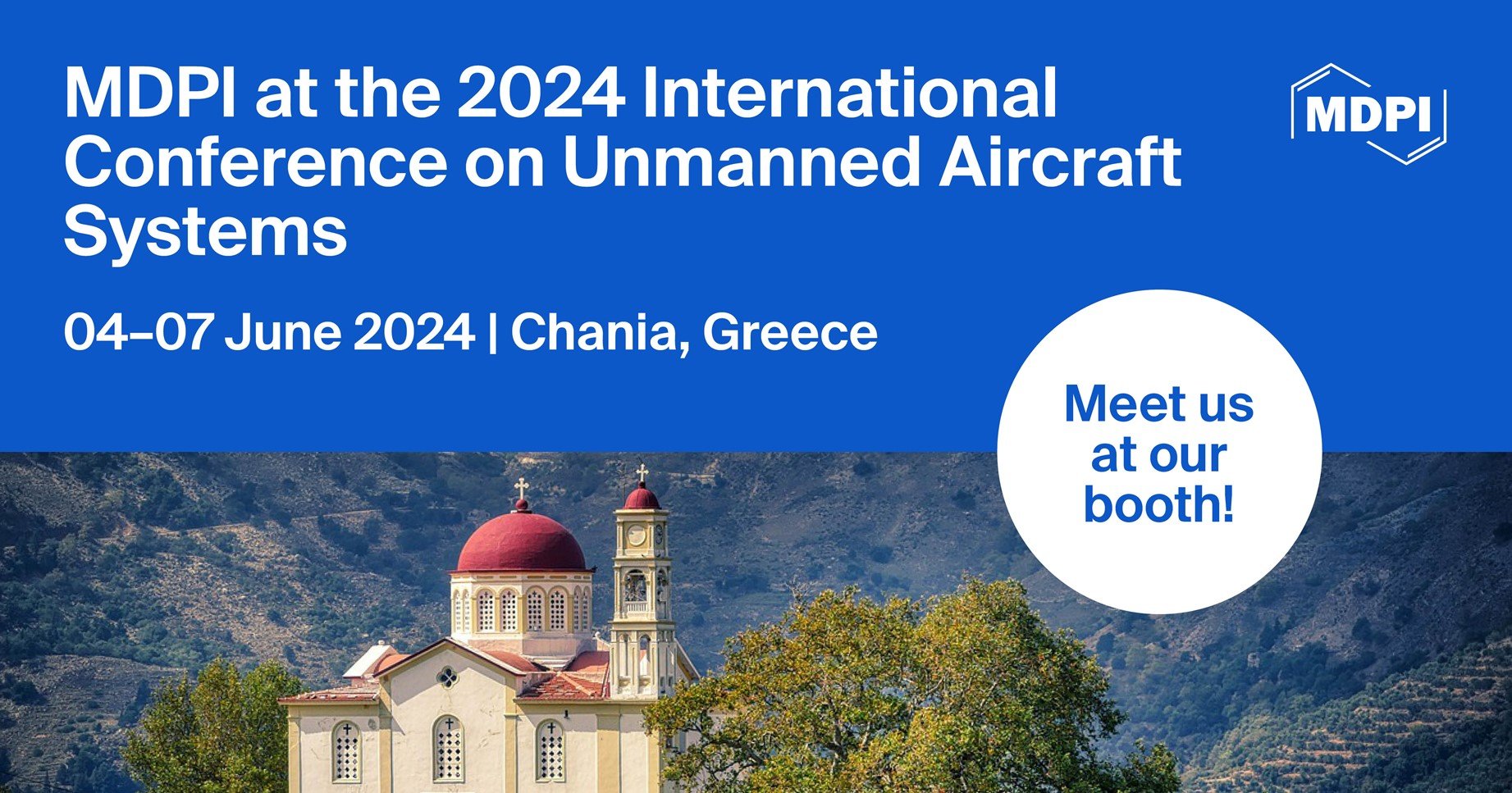
Conference: The 2024 International Conference on Unmanned Aircraft Systems
Organization: Technical University of Crete (TUC)
Date: 4–7 June 2024
Place: Chania, Greece
MDPI journals will be attending the 2024 International Conference on Unmanned Aircraft Systems (ICUAS) as an exhibitor. This meeting will be held in Chania, Greece, from 4 to 7 June 2024.
The International Conference on Unmanned Aircraft Systems is an annual meeting, started in 2013, held by the ICUAS Association, Inc., a non-profit organization. ICUAS 2024 focuses on civil and public domain applications, unmanned aviation's societal impact, and its effect on everyday quality of life. ICUAS 2024 offers unique opportunities to meet, interact, and shape the future of unmanned aviation worldwide, bringing together the technical, regulatory, and legal communities.
The following MDPI journals will be represented:
- Drones;
- Aerospace;
- Electronics;
- Remote Sensing;
- Technologies;
- Signals;
- Journal of Sensor and Actuator Networks;
- Sensors;
- Automation;
- Smart Cities;
- Applied Mechanics;
- Journal of Imaging.
If you are attending this conference, please feel free to start a conversation with us. Our delegates look forward to meeting you in person and answering any questions you may have. For more information about the conference, please visit the following link: https://uasconferences.com/2024_icuas/.
14 March 2024
Electronics | Section “Quantum Electronics” Is Discontinued
After a discussion with the Editor-in-Chief, and a careful consideration of the scope and focus of Electronics (ISSN: 2079-9292), we have decided to close the Section “Quantum Electronics”. All published papers and closed Special Issues will remain unchanged. All papers that are being processed for this Section will either be moved to other Sections or will be taken as regular papers of the journal. We still accept articles related to quantum electronics if they fall within the scope of Electronics.
Electronics Editorial Office
14 March 2024
Electronics | Section “Artificial Intelligence Circuits and Systems (AICAS)” Is Discontinued
After a discussion with the Editor-in-Chief, and a careful consideration of the scope and focus of Electronics (ISSN: 2079-9292), we have decided to close the Section “Artificial Intelligence Circuits and Systems (AICAS)”. All published papers and closed Special Issues will remain unchanged. All papers currently under processing will be moved to other Sections or taken as regular journal papers. We will still accept articles related to artificial intelligence circuits and systems (AICAS) as long as they fall within the scope of Electronics.
Electronics Editorial Office
11 March 2024
Electronics | Highly Cited Papers in 2023 in the Section “Microwave and Wireless Communications”
The Section “Microwave and Wireless Communications” invites advanced theories and technologies across a wide spectrum. These can be related to microwave and millimeter wave communications, including radar sensors, which may be a fundament or application, element or system, hardware or software, and methodology theory or measurement. We hope to present state-of-the-art technologies in this Section.
As Electronics (ISSN: 2079-9292) is of an open access format, you have free and unlimited access to the full text of all the articles published in our journal. We welcome you to read our most highly cited papers published in 2023, which you can find below:
1. “A Novel Hybrid Artificial Bee Colony-Based Deep Convolutional Neural Network to Improve the Detection Performance of Backscatter Communication Systems”
by Sina Aghakhani, Ata Larijani, Fatemeh Sadeghi, Diego Martín and Ali Ahmadi Shahrakht
Electronics 2023, 12(10), 2263; https://doi.org/10.3390/electronics12102263
Available online: https://www.mdpi.com/2079-9292/12/10/2263
2. “A Review on Cell-Free Massive MIMO Systems”
by Joumana Kassam, Daniel Castanheira, Adão Silva, Rui Dinis and Atilio Gameiro
Electronics 2023, 12(4), 1001; https://doi.org/10.3390/electronics12041001
Available online: https://www.mdpi.com/2079-9292/12/4/1001
3. “Applications of Microwaves in Medicine Leveraging Artificial Intelligence: Future Perspectives”
by Keerthy Gopalakrishnan, Aakriti Adhikari, Namratha Pallipamu, Mansunderbir Singh, Tasin Nusrat, Sunil Gaddam, Poulami Samaddar, Anjali Rajagopal, Akhila Sai Sree Cherukuri, Anmol Yadav et al.
Electronics 2023, 12(5), 1101; https://doi.org/10.3390/electronics12051101
Available online: https://www.mdpi.com/2079-9292/12/5/1101
4. “Automatic Modulation Recognition Based on Deep-Learning Features Fusion of Signal and Constellation Diagram”
by Hui Han, Zhijian Yi, Zhigang Zhu, Lin Li, Shuaige Gong, Bin Li and Mingjie Wang
Electronics 2023, 12(3), 552; https://doi.org/10.3390/electronics12030552
Available online: https://www.mdpi.com/2079-9292/12/3/552
5. “Hybrid Precoding Applied to Multi-Beam Transmitting Reconfigurable Intelligent Surfaces (T-RIS)”
by David Demmer, Francesco Foglia Manzillo, Samara Gharbieh, Maciej Śmierzchalski, Raffaele D’Errico, Jean-Baptiste Doré and Antonio Clemente
Electronics 2023, 12(5), 1162; https://doi.org/10.3390/electronics12051162
Available online: https://www.mdpi.com/2079-9292/12/5/1162
6. “A Comprehensive Overview of the Temperature-Dependent Modeling of the High-Power GaN HEMT Technology Using mm-Wave Scattering Parameter Measurements”
by Giovanni Crupi, Mariangela Latino, Giovanni Gugliandolo, Zlatica Marinković, Jialin Cai, Gianni Bosi, Antonio Raffo, Enza Fazio and Nicola Donato
Electronics 2023, 12(8), 1771; https://doi.org/10.3390/electronics12081771
Available online: https://www.mdpi.com/2079-9292/12/8/1771
7. “A Detailed Survey on Federated Learning Attacks and Defenses”
by Hira Shahzadi Sikandar, Huda Waheed, Sibgha Tahir, Saif U. R. Malik and Waqas Rafique
Electronics 2023, 12(2), 260; https://doi.org/10.3390/electronics12020260
Available online: https://www.mdpi.com/2079-9292/12/2/260
8. “Non-Contact Human Vital Signs Extraction Algorithms Using IR-UWB Radar: A Review”
by Zhihuan Liang, Mingyao Xiong, Yanghao Jin, Jianlai Chen, Dangjun Zhao, Degui Yang, Buge Liang and Jinjun Mo
Electronics 2023, 12(6), 1301; https://doi.org/10.3390/electronics12061301
Available online: https://www.mdpi.com/2079-9292/12/6/1301
9. “Drone Detection Method Based on MobileViT and CA-PANet”
by Qianqing Cheng, Xiuhe Li, Bin Zhu, Yingchun Shi and Bo Xie
Electronics 2023, 12(1), 223; https://doi.org/10.3390/electronics12010223
Available online: https://www.mdpi.com/2079-9292/12/1/223
10. “Blockchain-Enabled Internet of Vehicles Applications”
by Junting Gao, Chunrong Peng, Tsutomu Yoshinaga, Guorong Han, Siri Guleng and Celimuge Wu
Electronics 2023, 12(6), 1335; https://doi.org/10.3390/electronics12061335
Available online: https://www.mdpi.com/2079-9292/12/6/1335
11. “3GPP 5G V2X Error Correction Coding for Various Propagation Environments: A QoS Approach”
by Dimitrios Chatzoulis, Costas Chaikalis, Dimitrios Kosmanos, Kostas E. Anagnostou and Apostolos Xenakis
Electronics 2023, 12(13), 2898; https://doi.org/10.3390/electronics12132898
Available online: https://www.mdpi.com/2079-9292/12/13/2898
5 March 2024
Electronics | Highly Cited Papers in 2022 in the Section “Microwave and Wireless Communications”
The Section “Microwave and Wireless Communications” invites advanced theories and technologies across a wide spectrum. These can be related to microwave and millimeter wave communications, including radar sensors, etc., which may be a fundament or application, element or system, hardware or software, methodology theory or measurement. We hope to present state-of-the-art technologies in this Section.
As Electronics (ISSN: 2079-9292) is of open access format, you have free and unlimited access to the full text of all the articles published in our journal. We welcome you to read our most highly cited papers published in 2022 below.
1. “A Road towards 6G Communication—A Review of 5G Antennas, Arrays, and Wearable Devices”
by Muhammad Ikram, Kamel Sultan, Muhammad Faisal Lateef and Abdulrahman S. M. Alqadami
Electronics 2022, 11(1), 169; https://doi.org/10.3390/electronics11010169
Available online: https://www.mdpi.com/2079-9292/11/1/169
2. “High-Isolation MIMO Antenna for 5G Millimeter-Wave Communication Systems”
by Muhammad Bilal, Syeda Iffat Naqvi, Niamat Hussain, Yasar Amin and Nam Kim
Electronics 2022, 11(6), 962; https://doi.org/10.3390/electronics11060962
Available online: https://www.mdpi.com/2079-9292/11/6/962
3. “A Novel Meander Bowtie-Shaped Antenna with Multi-Resonant and Rejection Bands for Modern 5G Communications”
by Yanal S. Faouri, Sarosh Ahmad, Naser Ojaroudi Parchin, Chan Hwang See and Raed Abd-Alhameed
Electronics 2022, 11(5), 821; https://doi.org/10.3390/electronics11050821
Available online: https://www.mdpi.com/2079-9292/11/5/821
4. “A Compact, Ultra-Wideband, Transformer-Based Quadrature Signal Generation Network in 45 nm CMOS SOI for 5G Applications”
by Yuzhe Zhu, Xuzhi Liu, Xiaoran Li, Zicheng Liu and Quanwen Qi
Electronics 2022, 11(16), 2508; https://doi.org/10.3390/electronics11162508
Available online: https://www.mdpi.com/2079-9292/11/16/2508
5. “A Survey on CubeSat Missions and Their Antenna Designs”
by Sining Liu, Panagiotis Ioannis Theoharis, Raad Raad, Faisel Tubbal, Angelos Theoharis, Saeid Iranmanesh, Suhila Abulgasem, Muhammad Usman Ali Khan and Ladislau Matekovits
Electronics 2022, 11(13), 2021; https://doi.org/10.3390/electronics11132021
Available online: https://www.mdpi.com/2079-9292/11/13/2021
6. “Indoor Positioning System Based on Bluetooth Low Energy Technology and a Nature-Inspired Optimization Algorithm”
by Primož Bencak, Darko Hercog and Tone Lerher
Electronics 2022, 11(3), 308; https://doi.org/10.3390/electronics11030308
Available online: https://www.mdpi.com/2079-9292/11/3/308
7. “A Review on SIW and Its Applications to Microwave Components”
by Augustine O. Nwajana and Emenike Raymond Obi
Electronics 2022, 11(7), 1160; https://doi.org/10.3390/electronics11071160
Available online: https://www.mdpi.com/2079-9292/11/7/1160
8. “Performance Analysis of Multi-User MIMO Schemes under Realistic 3GPP 3-D Channel Model for 5G mmWave Cellular Networks”
by Daniel Gaetano Riviello, Francesco Di Stasio and Riccardo Tuninato
Electronics 2022, 11(3), 330; https://doi.org/10.3390/electronics11030330
Available online: https://www.mdpi.com/2079-9292/11/3/330
9. “Recent Developments and Challenges on Beam Steering Characteristics of Reconfigurable Transmitarray Antennas”
by Qasim Ali, Waseem Shahzad, Iftikhar Ahmad, Shozab Safiq, Xi Bin, Syed Muzahir Abbas and Houjun Sun
Electronics 2022, 11(4), 587; https://doi.org/10.3390/electronics11040587
Available online: https://www.mdpi.com/2079-9292/11/4/587
10. “Sound Localization Based on Acoustic Source Using Multiple Microphone Array in an Indoor Environment”
by Ming-An Chung, Hung-Chi Chou and Chia-Wei Lin
Electronics 2022, 11(6), 890; https://doi.org/10.3390/electronics11060890
Available online: https://www.mdpi.com/2079-9292/11/6/890
4 March 2024
MDPI Insights: The CEO's Letter #9 - Romania, Research Integrity, Viruses

Welcome to the MDPI Insights: The CEO's Letter.
In these monthly letters, I will showcase two key aspects of our work at MDPI: our commitment to empowering researchers and our determination to facilitating open scientific exchange.
Opening Thoughts

Reka Kovacs (Deputy Office Manager, MDPI), Stefan Tochev (CEO, MDPI), and Sandra Ana Spatariu (Office Manager, MDPI) at the MDPI office in Cluj, Romania.
MDPI’s Impact on Romania
In February, I visited our office in Cluj, Romania. I worked closely with our senior office managers and various teams, including the departments of training, marketing and conferences, as well as our journal relationship specialists, reviewing our service to the local scholarly community. During the visit, I also met with representatives from Babes-Bolyai University and the Technical University of Cluj-Napoca. Our multifunctional Romanian office plays an important role in supporting our collaborations with the local market as well as helping to meet MDPI’s overall business needs.

Feedback and strategy meeting with a group of MDPI’s Journal Relationship Specialists at the MDPI office in Cluj, Romania.
With 22,436 articles, Romania ranks as a top 20 contributing country to MDPI’s total number of papers published as at 28 February 2024. This highlights the importance of our collaboration with Romanian-affiliated authors and the growing opportunity to support their publishing needs. MDPI is one of the few academic publishers with a significant presence in Romania, boasting over 360 colleagues across our offices in Bucharest and Cluj. We are also proud to hire colleagues from local institutions to launch their careers within publishing.
Romania ranks as a top 20 contributing country.
The Numbers: 2019–2023
MDPI has seen a healthy increase in submissions from Romanian authors over the past three years, from 8,439 in 2021 to 11,866 by end of 2023, with most submissions going to journals such as Sustainability, Medicina, Diagnostics, IJMS, Applied Sciences, and JCM. From 2019 to 2023, MDPI published articles from 32,145 authors affiliated with Romanian institutions. Over those years, we have worked with Romanian Guest Editors on nearly 3,000 occasions to support their Special Issue and Topical collections.
With more than 300 Editorial Board Members from Romania, 34 appear on the board of Mathematics, 27 on Materials, 19 on Polymers, 18 on Coatings, and 16 on Molecules, while three serve as Section Editors-in-Chief (SEiC) on our journals Coatings (3.4 IF, 4.6 Citescore), Magnetochemistry (2.7 IF, 3.5 Citescore), and Chemosensors (4.2 IF, 3.9 Citescore).
Institutional Open Access Programs
Our commitment to working with institutions is evident in Romania, where we have established eight Institutional Open Access Programs (IOAP) with esteemed institutions such as the University of Bucharest, the University of Medicine and Pharmacy Cluj-Napoca, and most recently the National Institute for Laser, Plasma and Radiation Physics.
Our growth and presence in Romania are a true testament.
We also have IOAP agreements with Babes-Bolyai University and the Technical University of Cluj-Napoca, where I had the opportunity to meet senior stakeholders during my visit. Below are a few photos capturing our meeting with Prof. Radu Silaghi-Dumitrescu (Head of Faculty of Chemistry, Babes-Bolyai University) at the MDPI office in Cluj, Romania, along with a photo from our meeting with Vice Deans Nicoleta Cobarzan, Nicoleta Ilies, and Hoda Gavril, from the faculty of Civil Engineering at the Technical University of Cluj, Romania.


Our growth and presence in Romania are a true testament to the service we provide to the scholarly community and the relationships we foster in that region. We look forward to continuing to support Romanian scholars and institutions by providing a valuable and trusted experience with MDPI, the leader in open access publishing.
Impactful Research

MDPI Joins the STM Integrity Hub
MDPI has long been a supporter and partner of STM, with our involvement ranging from sponsoring and attending events to helping organize event programs. By joining the STM Integrity Hub, we aim to further our commitment to STM initiatives aimed at safeguarding the integrity of science.
“We are pleased to welcome MDPI as the 35th organisation participating in the Hub. This expansion is critical, as every new member enhances our capacity to prevent fraudulent submissions from entering the academic record.”
Joris van Rossum, Director of Research Integrity, STM
MDPI operates in full alignment with STM Integrity Hub's values of shared data and experiences. We strongly believe in collaboration and open exchange for the purposes of creating a holistic approach to support research integrity at MDPI itself and across the entire academic publishing industry. The Integrity Hub is an excellent example of how publishers can come together to jointly address industry-wide challenges related to research integrity, such as manuscripts that breach research integrity standards and paper-mills.
I look forward to our Research Integrity and Publication Ethics Team (RIPE) team immersing themselves in this initiative, exchanging information, best practices, and tools for the benefit of the entire scholarly ecosystem. We believe that ethical publishing standards should be implemented across the board, and we aim to be rigorous in our approach, addressing research integrity issues and improving the impact of published research.
Inside MDPI

MDPI Expands Research Integrity and Publication Ethics Team (RIPE)
In addition to external collaborations and joint initiatives aimed at further strengthening our commitment to research integrity, we are also enhancing our internal efforts. This includes improving our processes and guidelines and expanding our teams and departments to ensure quality assurance throughout our publishing process.
We are pleased to announce the expansion of our Research Integrity and Publication Ethics Team (RIPE) at MDPI. The RIPE team has recently welcomed new colleagues, each bringing unique skills and a personal commitment to prioritize ethical considerations in all our work.
The demand for research integrity and high ethical standards in academic publishing is steadily rising across our industry. Our expanded RIPE team will work to enhance and align our practices with industry best practices, ensuring excellence in research integrity and publication ethics.

Stefan Tochev (CEO, MDPI) introduces Dr. Tim Tait-Jamieson (Research Integrity Lead, MDPI) for his presentation on MDPI’s Retraction and Approval Process to a group of Journal Relationship Specialists at the MDPI office in Cluj, Romania: “The demand for research integrity and publication ethics is steadily rising across our industry.”
Introducing our Research Integrity and Publication Ethics Team
Led by Dr. Tim Tait-Jamieson (Research Integrity Lead), the RIPE team comprises Dr. Ivana Resanovic (Research Integrity Manager), Dr. Lavinia Rogojina (Research Integrity Manager), Ms. Diana Apodaritei (Research Integrity Specialist), Dr. Zoltan Mihaly (Research Integrity Specialist), Mr. Aleksandar Đukić (Research Integrity Specialist), Ms. Ana Stankovic (Research Integrity Specialist), and Ms. Anna Pena (Publication Ethics Assistant).
Please click here to access everything that you need to know about MDPI’s Research and Publication Ethics.
With this span of complementary roles, the RIPE team collaborates directly with journal editorial teams and works closely with various departments, including our Scientific Office Board and our Journal Relationship Specialists. The team’s primary objectives are to help prevent issues regarding research integrity and publication ethics during peer review, uphold MDPI’s ethics policies, adhere to industry standards, and resolve publication ethics and research integrity issues and complaints.
Quality Updates to Special Issues Oversight
At MDPI, we are committed to reviewing policies pertaining to the quality of research. In this blog post, Shaheena Patel (Communications Associate, MDPI), outlines two recent updates to MDPI journal processes. These updates pertain to Special Issue (SI) quality guidelines, in line with criteria provided by COPE and DOAJ. Alongside the SI updates, details regarding the new minor corrections policy introduced in 2024 are provided in the blog.
The two updates we implemented include greater oversight and the verification of Guest Editor credentials. These guidelines require that Editors-in-Chief (EiCs) and Editorial Board Members (EBMs) take responsibility for overseeing SIs.
PS. Thank you, James Butcher, for featuring this up in your 67th issue of the Journalogy newsletter.
Read more:
Coming Together for Science

Viruses 2024 – A World of Viruses
I am pleased to share the success of our MDPI conference Viruses 2024 – A World of Viruses, held 14-16 February, in Barcelona. With 240 registrations, this event brought together top scientists, researchers, and industry experts from 40 countries to share their findings on the latest developments in viral pathogenesis and immune responses.
Attendees gathered for the 5th edition of the Viruses’ conference, where we hosted influential keynote speeches from Nobel Prize laureate Dr. Charles M. Rice and ‘Distinguished Senior Virologist’ Prof. Luis Enjuanes, along with 14 invited speakers, 47 selected speakers, and nine flash poster presenters, to discuss the most significant issues in virology today.
Recap on the #Viruses2024 Conference
Take a look at the key moments from MDPI’s Viruses event and please join us in commemorating a gathering for global knowledge and cooperation. A heartfelt thank-you to all attendees; their passion and engagement played a crucial role in making this event an engaging success!
Below are calls to action from the keynote speakers encouraging collaboration and communication:
“There’s never been a better time than now to really take the power that we have both in terms of basic research and also in biotech and pharma to develop antiviral agents.” - Dr. Charles M. Rice, The Rockefeller University, New York, USA
“The collaboration between labs is absolutely essential. Improving initial detection and improving communication is a must for all of us working in science.” - Prof. Dr. Luis Enjuanes, National Center of Biotechnology (CNB-CSIC), Madrid, Spain

Our thanks go to our sponsors and partnering societies, our Viruses journal and editorial team, our Barcelona colleagues, and the social media, conference and other MDPI teams for making this event a memorable occasion. View the event gallery here.
Upcoming In-Person Event

24–26 April, 2024
4th MMCS – Harnessing the Power of New Drug Modalities
Location: Barcelona, Spain
Esteemed speakers at MMCS 2024 include Prof. Arun K. Ghosh, the mind behind the Darunavir molecule, and Prof. Paul Brennan, CSO of Alzheimer's Research UK Oxford Drug Discovery Institute.
Find more upcoming MDPI events here.
Organize Your Event with MDPI’s Sciforum
Sciforum is MDPI’s platform dedicated to the organization of scientific events. In line with our mission to promote science, Sciforum supports scholars, societies, research networks, and universities at all stages of organizing in-person events, virtual events and webinars. Our platforms are efficient, user-friendly, and cost-effective. We handle all steps related to event management. Contact us for details.
Closing Thoughts

Researcher to Reader (R2R) Conference
From 20–21 February 2024, I had the pleasure of attending the Researcher to Reader (R2R) conference in London, which MDPI has proudly sponsored over the years. The conference programme offered a variety of session formats, including workshops, panel discussions, debates, interviews, presentations, and lightning talks, with opportunities to discuss relevant topics.
We take pride in supporting the scientific community, bringing researchers across the world together to network, exchange ideas and share the latest in science and publishing. In 2023, MDPI invested close to 2 million CHF in sponsoring over 2,000 scientific and publishing-related conferences worldwide.
R2R Peer Review Innovations Workshop
I found the R2R conference to be engaging, with the workshops being particularly enjoyable. My colleague Giulia Stefenelli (Chair of Scientific Office Board) and I participated in the “Peer Review Innovations” workshop, which spanned four sessions over the two days. These sessions explored the future of peer review and how we can improve the peer review process for everyone involved. Notably, the large majority of attendees expressed their opinion that peer review, as currently practiced, requires significant improvement. Together, we collaborated on potential immediate and long-term improvements and innovative processes, aiming to create an ecosystem beneficial to all stakeholders by strengthening submission systems with the aim of reducing threats and making authors more responsible for their work. We also discussed the opportunity for academic institutions to better scrutinize the quality of the work produced and submitted to journals.
Our group comprised publishers, software providers, librarians, and more, bringing diverse perspectives to the discussions. These interactions were relevant to MDPI’s ongoing conversations, providing insights to our efforts. The session also made me appreciate that MDPI is doing well, as the group discussions included the subject of various quality checks that we have already embedded in our processes, ensuring that we keep abreast of industry standards.
The need for an optimized system to incentivize the activities of editors and reviewers was also a focus of discussion, as well as the support that reviewers need from publishers via the provision of strong reports through fixed forms, questionnaires and training.
At MDPI, we are currently auditing our reviewer program to improve reviewer recognition, guidelines, and methods for identifying suitable reviewers, while maintaining our commitment to quality and timeliness.
Congratulations to Mark Carden, Conference Director, and the R2R team for organizing a productive and successful event. PS: The break times were greatly appreciated as well!
Chief Executive Officer
MDPI AG
29 February 2024
Electronics | 2022 Editor’s Choice Articles
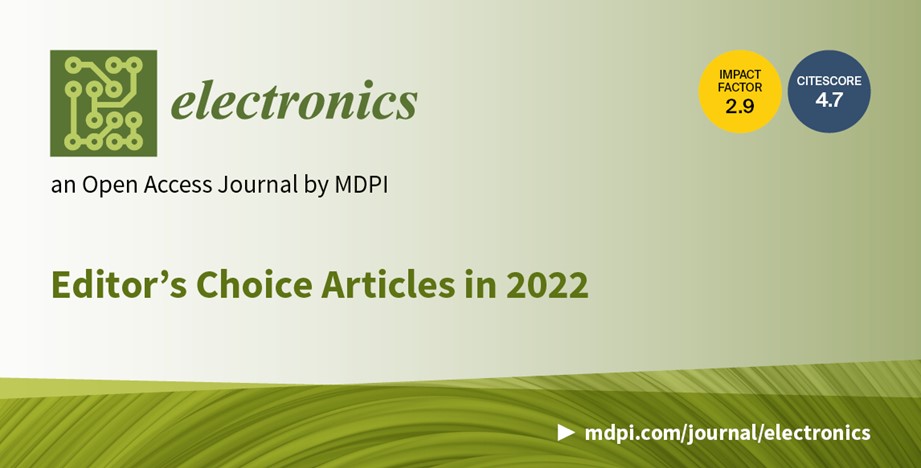
Editor’s Choice Articles are based on recommendations by the scientific editors of MDPI journals from around the world. Editors select a small number of articles recently published in the journal that they believe will be particularly interesting to readers, or important in the respective research area. The aim is to provide a snapshot of some of the most exciting work published in the various research areas of the journal.
You have free and unlimited access to the full texts of all the open access articles published in the journal Electronics (ISSN: 2079-9292). We welcome you to read the Editor’s Choice Articles published in 2022:
1. “A Survey of Recommendation Systems: Recommendation Models, Techniques, and Application Fields”
by Hyeyoung Ko, Suyeon Lee, Yoonseo Park and Anna Choi
Electronics 2022, 11(1), 141; https://doi.org/10.3390/electronics11010141
Available online: https://www.mdpi.com/2079-9292/11/1/141
2. “Mobility-Aware Hybrid Flow Rule Cache Scheme in Software-Defined Access Networks”
by Youngjun Kim, Jinwoo Park and Yeunwoong Kyung
Electronics 2022, 11(1), 160; https://doi.org/10.3390/electronics11010160
Available online: https://www.mdpi.com/2079-9292/11/1/160
3. “Automatic RTL Generation Tool of FPGAs for DNNs”
by Seojin Jang, Wei Liu, Sangun Park and Yongbeom Cho
Electronics 2022, 11(3), 402; https://doi.org/10.3390/electronics11030402
Available online: https://www.mdpi.com/2079-9292/11/3/402
4. “Bidimensional and Tridimensional Poincaré Maps in Cardiology: A Multiclass Machine Learning Study”
by Leandro Donisi, Carlo Ricciardi, Giuseppe Cesarelli, Armando Coccia, Federica Amitrano, Sarah Adamo and Giovanni D’Addio
Electronics 2022, 11(3), 448; https://doi.org/10.3390/electronics11030448
Available online: https://www.mdpi.com/2079-9292/11/3/448
5. “Bringing Emotion Recognition Out of the Lab into Real Life: Recent Advances in Sensors and Machine Learning”
by Stanisław Saganowski
Electronics 2022, 11(3), 496; https://doi.org/10.3390/electronics11030496
Available online: https://www.mdpi.com/2079-9292/11/3/496
6. “A Run-Time Reconfiguration Method for an FPGA-Based Electrical Capacitance Tomography System”
by Damian Wanta, Waldemar T. Smolik, Jacek Kryszyn, Przemysław Wróblewski and Mateusz Midura
Electronics 2022, 11(4), 545; https://doi.org/10.3390/electronics11040545
Available online: https://www.mdpi.com/2079-9292/11/4/545
7. “Research on an Urban Low-Altitude Target Detection Method Based on Image Classification”
by Haiyan Jin, Yuxin Wu, Guodong Xu and Zhilu Wu
Electronics 2022, 11(4), 657; https://doi.org/10.3390/electronics11040657
Available online: https://www.mdpi.com/2079-9292/11/4/657
8. “Smart Cities and Awareness of Sustainable Communities Related to Demand Response Programs: Data Processing with First-Order and Hierarchical Confirmatory Factor Analyses”
by Simona-Vasilica Oprea, Adela Bâra, Cristian-Eugen Ciurea and Laura Florentina Stoica
Electronics 2022, 11(7), 1157; https://doi.org/10.3390/electronics11071157
Available online: https://www.mdpi.com/2079-9292/11/7/1157
9. “Neuron Circuit Failure and Pattern Learning in Electronic Spiking Neural Networks”
by Sumedha Gandharava, Robert C. Ivans, Benjamin R. Etcheverry and Kurtis D. Cantley
Electronics 2022, 11(9), 1392; https://doi.org/10.3390/electronics11091392
Available online: https://www.mdpi.com/2079-9292/11/9/1392
10. “Numerical Evaluation of Complex Capacitance Measurement Using Pulse Excitation in Electrical Capacitance Tomography”
by Damian Wanta, Oliwia Makowiecka, Waldemar T. Smolik, Jacek Kryszyn, Grzegorz Domański, Mateusz Midura and Przemysław Wróblewski
Electronics 2022, 11(12), 1864; https://doi.org/10.3390/electronics11121864
Available online: https://www.mdpi.com/2079-9292/11/12/1864
11. “The Diversification and Enhancement of an IDS Scheme for the Cybersecurity Needs of Modern Supply Chains”
by Dimitris Deyannis, Eva Papadogiannaki, Grigorios Chrysos, Konstantinos Georgopoulos and Sotiris Ioannidis
Electronics 2022, 11(13), 1944; https://doi.org/10.3390/electronics11131944
Available online: https://www.mdpi.com/2079-9292/11/13/1944
12. “Improving FPGA Based Impedance Spectroscopy Measurement Equipment by Means of HLS Described Neural Networks to Apply Edge AI”
by Jorge Fe, Rafael Gadea-Gironés, Jose M. Monzo, Ángel Tebar-Ruiz and Ricardo Colom-Palero
Electronics 2022, 11(13), 2064; https://doi.org/10.3390/electronics11132064
Available online: https://www.mdpi.com/2079-9292/11/13/2064
13. “High-Performance and Robust Binarized Neural Network Accelerator Based on Modified Content-Addressable Memory”
by Sureum Choi, Youngjun Jeon and Yeongkyo Seo
Electronics 2022, 11(17), 2780; https://doi.org/10.3390/electronics11172780
Available online: https://www.mdpi.com/2079-9292/11/17/2780
23 February 2024
Meet Us at the European Robotics Forum 2024, 13–15 March 2024, Rimini, Italy

MDPI will be attending the European Robotics Forum 2024 in Rimini, Italy, which will take place from 13 to 15 March 2024. The Forum will see leading experts in robotics, both academic and industrial, at an international level, come together in the vibrant city of Rimini; the Forum will also see the presence of the major European companies with interests in this field. Topics of interest include but are not limited to the following: artificial intelligence (AI)-enabled robotics; autonomous navigation; collaborative robotics; mechatronics; soft robotics; human–robot interactions; human-centred robotics; and safety and standardization.
The following MDPI journals will be represented:
- Electronics;
- Sensors;
- AI;
- Machines;
- Robotics;
- Smart Cities;
- Systems.
If you are attending the conference, please visit our booth. Our delegates look forward to meeting you in person and answering any questions that you may have. For more information about the conference, please visit the following link: https://erf2024.eu/.
31 January 2024
MDPI Insights: The CEO's Letter #8 - Altmetric and Flat Fee Agreement

Welcome to the MDPI Insights: The CEO's Letter.
In these monthly letters, I will showcase two key aspects of our work at MDPI: our commitment to empowering researchers and our determination to facilitating open scientific exchange.
Opening Thoughts

MDPI and Digital Science Meeting
At MDPI, we are committed to providing our authors with the essential tools to publish, promote, and track their research. In line with this commitment, we have established a longstanding collaboration with Digital Science, a company specializing in research data and analytical insights for the research community. Our collaboration integrates their Altmetric tool, offering us and our authors the ability to track a variety of sources that monitor and report attention surrounding publications.
As part of our collaboration, we recently hosted Cathy Holland, Director of Global Publisher Business Development, and Helen Cooke, Managing Director of Publisher Sales, from Digital Science, at our MDPI headquarters in Basel, Switzerland.

Left to right: Facundo Santomé (Senior Marketing Manager, MDPI), Constanze Shelhorn (Indexing Manager, MDPI), Cathy Holland (Director of Global Publisher Business Development, Digital Science), Helen Cooke (Managing Director of Publisher Sales, Digital Science), and Stefan Tochev (CEO, MDPI) in front of MDPI headquarters in Basel, Switzerland.
During our meeting, we discussed MDPI’s publishing philosophy and explored further avenues for collaboration. We look forward to continuing our partnership with Digital Science, aiming to improve our services yet further and meet the needs of our authors more closely than ever.
What is Altmetric?
You will notice that MDPI articles feature an Altmetric score, a colourful doughnut capturing the score in the upper right corner of the article page. This score represents ‘alternative metrics,’ as distinct from traditional metrics such as Impact Factor, CiteScore, and Scimago Journal Rank.
Altmetrics complement traditional citation-based metrics by capturing online discussions related to a specific research topic. By analyzing both sets of data, we can obtain a comprehensive understanding of the attention a particular research output receives and the sources in which it is mentioned.
“Almetric provides visual insights into where research is being discussed”
Sources Tracked by Altmetric
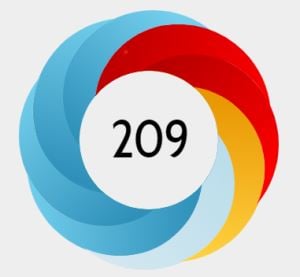
Altmetric badge showing the Altmetric score and colour-coded mention sources.
Altmetric monitors various sources, categorizing them into segments such as policy documents, peer reviews, Wikipedia, news and blogs, and social media, among other sources. Each category is identifiable by a specific colour.
The Altmetric badge provides visual insights into where the research is being discussed. A more colourful badge indicates broader mentions across multiple platforms. Such tracking enables us to gauge the extent of an article’s online dissemination, noting that increased visibility may correlate with higher citation rates.
Read more:
Impactful Research

Ten High-Altmetric Articles Published by MDPI
As at 30 January 2024, Altmetric has tracked 670,500 MDPI research outputs from MDPI, resulting in over 4.3 million mentions. This includes over 71,894 mentions in policy and patents and 294,714 mentions in news and blogs, with some achieving an Altmetric score as high as 28,754.
So, what is a good Altmetric score? There are various ways to put this score into context. You can find out more about the score in context and how to evaluate your work by this means.
Here are ten MDPI papers ranking in the top 5% of all research outputs scored by Altmetric.
|
|
“Accuracy in Wrist-Worn, Sensor-Based Measurements of Heart Rate and Energy Expenditure in a Diverse Cohort” J. Pers. Med. 2017, 7(2), 3; https://doi.org/10.3390/jpm7020003 Altmetric page: https://mdpi.altmetric.com/details/20477344 Altmetric shows that this article appeared in 253 news stories from 209 outlets including Forbes, BBC, and Fox News. |
|
|
“Daylight Saving Time and Acute Myocardial Infarction: A Meta-Analysis” J. Clin. Med. 2019, 8(3), 404; https://doi.org/10.3390/jcm8030404 Altmetric page: https://mdpi.altmetric.com/details/57654628 Altmetric shows that this article appeared in 295 news stories from 207 outlets including Forbes, The Atlantic, and New York Times. |
|
|
“The Preliminary Analysis of Cave Lion Cubs Panthera spelaea (Goldfuss, 1810) from the Permafrost of Siberia” Quaternary 2021, 4(3), 24; https://doi.org/10.3390/quat4030024 Altmetric page: https://mdpi.altmetric.com/details/111086701 Altmetric shows that this article appeared in 182 news stories from 134 outlets including CBC News, CNN, and National Geographic. |
|
|
“Not the Cat’s Meow? The Impact of Posing with Cats on Female Perceptions of Male Dateability” Animals 2020, 10(6), 1007; https://doi.org/10.3390/ani10061007 Altmetric page: https://mdpi.altmetric.com/details/83796184 Altmetric shows that this article appeared in 124 news stories from 98 outlets including VICE, CNN and The Guardian. |
|
|
“Behaviour and Welfare Impacts of Releasing Elephants from Overnight Tethers: A Zimbabwean Case Study” Animals 2022, 12(15), 1933; https://doi.org/10.3390/ani12151933 Altmetric page: https://mdpi.altmetric.com/details/133463915 Altmetric shows that this article appeared in 192 news stories from 186 outlets. |
How do I use altmetrics?
Altmetric Explorer provides a detailed step-by-step guide and instruction video for first-time users of the tool. The guide includes useful diagrams that make it easy to get started.
Sharing Research Online
For research to be tracked across different sources, Altmetric needs a research output with a persistent identifier: a DOI, ISBN, PubMed ID, handle ID, etc. When sharing research, it is important to include a link to the original research output.
|
|
“An Update on Eukaryotic Viruses Revived from Ancient Permafrost” Viruses 2023, 15(2), 564; https://doi.org/10.3390/v15020564 Altmetric page: https://mdpi.altmetric.com/details/142929875 Altmetric shows that this article appeared in 250 news stories from 180 outlets including CTV, Fox News, and CNN. |
|
|
“The Global Problem of Insufficient Sleep and Its Serious Public Health Implications” Healthcare 2019, 7(1), 1; https://doi.org/10.3390/healthcare7010001 Altmetric page: https://mdpi.altmetric.com/details/53406248 Altmetric shows that this article appeared in 252 news stories from 168 outlets including BBC, Harvard Business Review, and Forbes. |
|
|
“A Detailed Review Study on Potential Effects of Microplastics and Additives of Concern on Human Health” Int. J. Environ. Res. Public Health 2020, 17(4), 1212; https://doi.org/10.3390/ijerph17041212 Altmetric page: https://mdpi.altmetric.com/details/86529137 Altmetric shows that this article appeared in 197 news stories from 150 outlets including BBC, The Tribune, and World Economic Forum. |
|
|
“An Empirical Study of Chronic Diseases in the United States: A Visual Analytics Approach to Public Health” Int. J. Environ. Res. Public Health 2018, 15(3), 431; https://doi.org/10.3390/ijerph15030431 Altmetric page: https://mdpi.altmetric.com/details/34714141 Altmetric shows that this article appeared in 232 news stories from 149 outlets including Forbes, New York Times, and Harvard Business Review. |
|
|
“Garden Scraps: Agonistic Interactions between Hedgehogs and Sympatric Mammals in Urban Gardens” Animals 2023, 13(4), 590; https://doi.org/10.3390/ani13040590 Altmetric page: https://mdpi.altmetric.com/details/142934305 Altmetric shows that this article appeared in 172 news stories from 168 outlets including BBC. |
Inside MDPI

MDPI Annual Meeting Celebrations in China
On Thursday 25 January, over 1,300 MDPI colleagues from our two offices in Beijing gathered to kick off MDPI’s traditional ‘Annual Meetings.’ These celebrations take place in MDPI’s offices across China, including Dalian, Tianjin, Wuhan, and Nanjing.
The evenings include performances, informative talks and presentations, awards, and entertainment, providing an ideal platform to recognize our colleagues, celebrate their achievements, and set our sights on the future.
“It is essential that we stay connected and share best practices”

I sent a video congratulating everyone on their work and sharing our vision of building MDPI into the most trusted OA publisher, highlighting the roles each of us has to play in achieving that goal.
Unfortunately I could not join in person, but you may recall my recent trip, when I visited our offices in Beijing and Wuhan, which I look forward to visiting again this year.
Although our headquarters are in Basel, Switzerland, and we are expanding throughout Europe and North America, the majority of MDPI’s workforce is in China and throughout the Asia-Pacific region, including offices in Singapore, Thailand, Japan, and newly opened office in South Korea. It is essential that as a global organization, we stay connected and share best practices in order to grow collectively and continue providing the exceptional service to our authors.
The Annual Meeting is a moment to reflect and enjoy the year’s hard work and dedication.
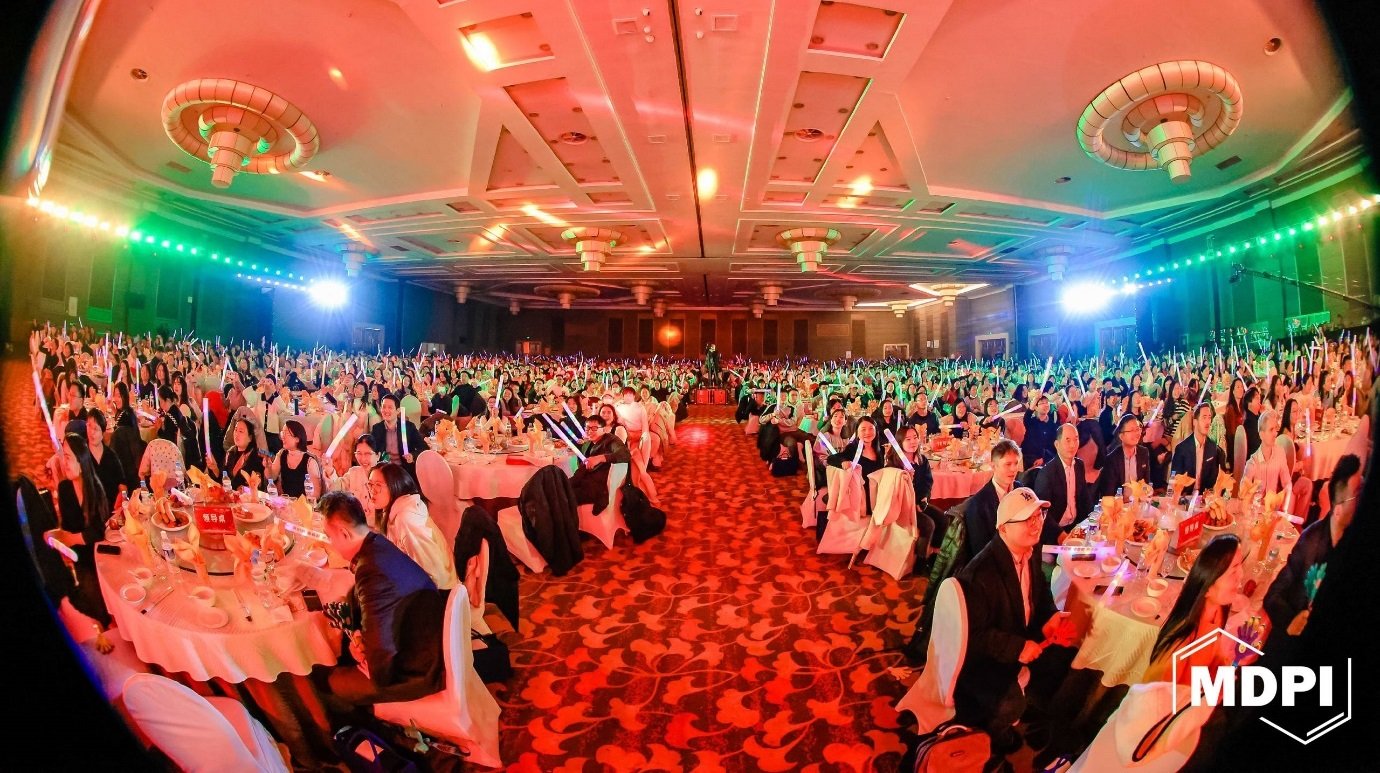
I extend our best wishes to all for the Chinese New Year (Xīnnián kuàilè)!
Coming Together for Science
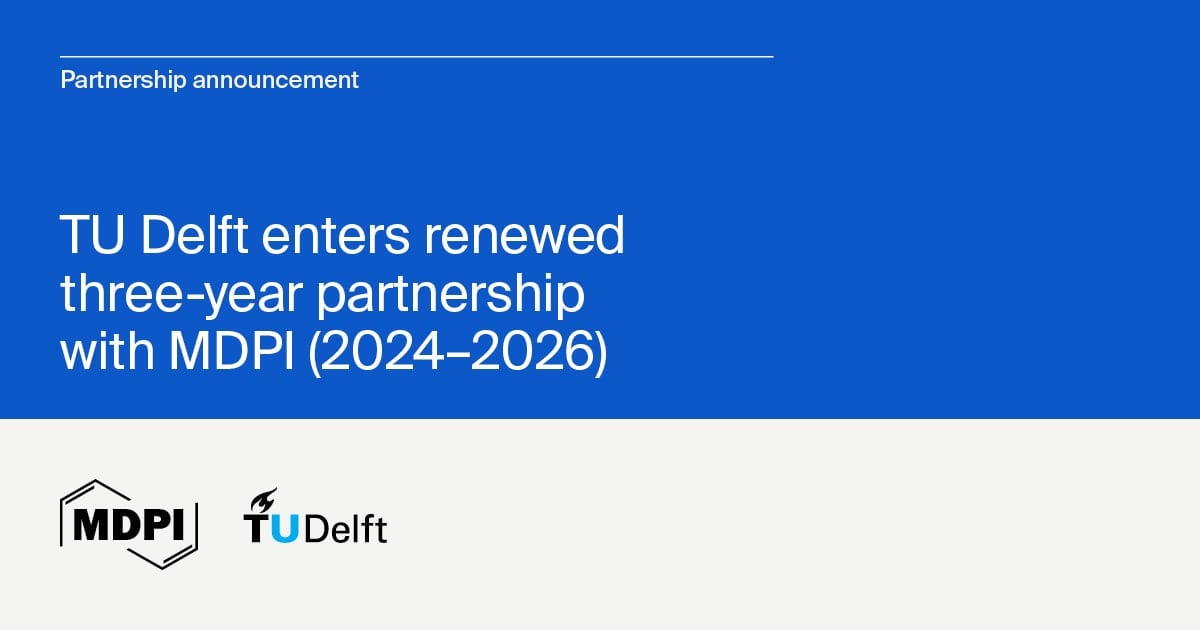
MDPI and TU Delft Adopt Flat Fee Model in Extended Partnership
We are excited to announce a renewed three-year partnership with Delft University of Technology (TU Delft) in the Netherlands. This collaboration introduces a fixed lump-sum fee, covering publishing costs from 2024 to 2026.
“This initiative reflects our dedication to transparent and inclusive publishing”
TU Delft-affiliated authors will enjoy cost-free publishing in any MDPI journal during this period, aligning with our commitment to removing barriers for open access publishing. The agreement supports Plan S compliance and facilitates a seamless publishing process for TU Delft corresponding authors. This initiative reflects our dedication to transparent and inclusive publishing, providing stability and predictability both for authors and for institutions.
For further details on our Institutional Open Access Program (IOAP), please contact us.
Benefits to MDPI’s IOAP
At MDPI we have a long tradition of partnerships, including our Institutional Open Access Program (IOAP). IOAP supports institutions through simplification, access, transparency, APC discounts, and institutional repository deposits. The program simplifies administrative processes, offers central payment, and allows easy opting in and out. Participants gain free access to Susy, MDPI’s online submission system, with extensive article metadata and exportable data. APC discounts and Book Processing Charge discounts are available for affiliated authors. Automated deposits to institutional repositories and streamlined matching of papers to IOAP participants enhance the overall experience.
For further information, see our IOAP FAQ.
Closing Thoughts

Reflections on the 2024 APE Conference
MDPI was proud to co-sponsor the Academic Publishing in Europe (APE) 2024 Conference that took place in Berlin, Germany, from 9–10 January 2024.
The conference theme, ‘Keep the Conversation Going!’, explored the evolving landscape of scholarly communication. APE is one of the key conferences I make a point to attend each year. January offers a valuable opportunity to engage with new contacts, reconnect with familiar faces, and participate in impactful discussions and presentations among professionals, scholars, and practitioners in the field.
“It's fascinating to see how other publishers are leveraging AI”
Highlights
Some of the standout panels for me include: the role of the UN Sustainable Development Goals (SDGs) within the publishing industry. It was encouraging to hear the current status quo, though I was eager also to learn about the exciting projects planned for 2024 and beyond. These will allow us to track progress in subsequent years. At MDPI, we remain committed to promoting Open–Access (OA) content on SDGs through scientific articles and books. Furthermore, we extend our commitment to sustainability by financially supporting researchers through initiatives such as the World Sustainability Award and the Emerging Sustainability Leader Award, as well as waiving the APC for feature papers on each SDG.
In recent years, discussions on AI have become increasingly prominent at such conferences. It’s fascinating to see how other publishers are leveraging AI to meet the evolving needs of their audiences while at the same time using it to safeguard the scientific process. Other engaging panels that I enjoyed included updates on transformation beyond transformative agreements, the principles of lean change, incentive structures related to research integrity, and the panel on reviewer incentives.
“We can share best practices and lessons learned”
Incorporating MDPI’s Insights into Conferences
I must confess that I sometimes feel overlooked when MDPI is not invited to participate in crucial industry discussions. As the leading open access publisher and the third-largest publisher overall, we possess extensive experience in many of these areas and can offer valuable contributions to these discussions. We can share best practices, lessons learned, and our thinking about future trajectories. For instance, in panels discussing reviewer incentives, at MDPI we offer a discount voucher to reviewers for future submissions, reflecting our commitment to fostering a robust peer review process. In 2022 alone, MDPI collected over 1.4 million peer review reports, informing the decision-making processes of our editors. Given our expertise in these areas, it would be natural to include MDPI in such discussions. I therefore extend an invitation to future conference organizers to consider MDPI for speaking engagements and collaborative opportunities.
Chief Executive Officer
MDPI AG
26 January 2024
Acknowledgment of the Reviewers of Electronics in 2023
In recognizing the exceptional efforts of our reviewers in 2023, we express our sincere gratitude for upholding the high standards of Electronics. Their commitment ensured the rigorous peer review that is integral to quality academic publishing.
In 2023, Electronics received 21,183 review reports, from 11,710 reviewers. This past year, we worked with reviewers from 103 countries and regions, reflecting the diversity in our collaboration with research communities. Their dedication shapes scholarly discourse and advances global research. The editorial team expresses gratitude for the vital role played by each reviewer in the Electronics family throughout 2023, and we look forward to their continued support in 2024.
The following are the reviewers who have consented to show their names:
| A. K. Awasthi | Lihao Ge |
| A. A. M. Muzahid | Liliana Ionescu-Feleaga |
| A. Halim | Lin Li |
| A. N. M. Bazlur Rashid | Lin Zhang |
| A. S. Rashed | Lina Montuori |
| A. J. Yuste-Delgado | Lingsheng Meng |
| Aamir Anwar | Lino Giefer |
| Aamir Muhammad | Lioua Kolsi |
| Aaron Jaufenthaler | Lip Yee Por |
| Abbas Abbaszadeh Shahri | Liping Guo |
| Abbas Ali Heidari | Liqaa Nawaf |
| Abbas Nasri | Liqun Ma |
| Abbott Po Shun Chen | Lisandro Lovisolo |
| A. A. Abd El-Aziz | Liu Jianhua |
| Abdalhossein Rezai | Liu Kun |
| Abdallah Ghourabi | Liudmila Gerasimova-Meigal |
| Abdelaziz El-Hoshoudy | Liuyi Ling |
| Abdelaziz Timesli | Livia Petrescu |
| Abdelhakim Hannousse | Liwei Deng |
| Abdelhamied Ateya | Li-Wei Kang |
| Abdel-Mehsen Ahmad | Liyuan Sheng |
| Abdel-Rahman Akl | Lizhu Ren |
| Abdelrahman Elfaki | Ljubica Kazi |
| Abdelsalam M. Elhaffar | Llorenç Cerdà-Alabern |
| Abdoh Jabbari | Lluís Ribas-Xirgo |
| Abdu Gumaei | Loganathan Veeramuthu |
| Abdul Jabbar Siddiqui | Loic Theolier |
| Abdul Rab Asary | Longhui Qin |
| Abdul Razzaq | Lorena Parra |
| Abdulaziz Alsulami | Lorenzo Brognara |
| Abdulbast Abushgra | Lotfi Baghli |
| Abdulghafor Abdulhameed | Lu Chang Peh |
| Abdulhakim Sabur | Ľubomír Beňa |
| Abdulilah Mayet | Lubomir Kubik |
| Abdullah Al-Aboosi | Luca Crocetti |
| Abdullah Alourani | Luca Davoli |
| Abdullah Basuhail | Luca Gemignani |
| Abdulnaser M. Alshoaibi | Luca Rugini |
| Abdulrahman Alnaim | Lucas Frizera Encarnação |
| Abdul-Wahid Saif | Lucia Načinović Prskalo |
| Abdur Rasool | Lucian Evdochim |
| Abdussalam Elhanashi | Lucian Lupu |
| Abedallah Zaid Abualkishik | Lucian Pislaru-Danescu |
| Abeer Mahmoud | Lucian Trifina |
| Abhijeet R. Patil | Lucian-Mihai Cosovanu |
| Abhishek Sahu | Luciano Boglione |
| Abhishek Sharma | Luciano De Tommasi |
| Abhishek Singh | Luigi De Napoli |
| Abidemi Adeniyi | Luigi Gianpio Di Maggio |
| Abraham Amole | Luigi Mascolo |
| Abraham Finny | Luis Adrián Lizama-Perez |
| Abraham Mejia-Aguilar | Luis Alberto Morales Rosales |
| Abu Elnasr Sobaih | Luis Alberto Rodríguez-Picón |
| Abu Sarwar Zamani | Luís Barreto |
| Abul Bashar | Luis Coelho |
| Abul Doulah | Luís Frazão |
| Acacio Amaral | Luis N. Coria |
| Achraf Othman | Luís Oliveira |
| Adam Martowicz | Luis Pires |
| Adam Milik | Luis Roseiro |
| Adam Mroziński | Luis Santos |
| Adam Szeląg | Luisa D'amore |
| Adel Ali Ahmed | Luiz Paulo Fávero |
| Adel Alti | Lu-Kai Song |
| Adel Girgis | Łukasz Januszkiewicz |
| Adelina Bordianu | Lukasz Makowski |
| Adem Ozcelik | Łukasz Rykała |
| Adimoolam Malaiyalathan | Łukasz Wyciślik |
| Adis Puška | Luyao Zhang |
| Aditi Singh | Lykourgos Magafas |
| Adnene Arbi | M Mustafa Azeem |
| Adolfo Josué Rodríguez Rodríguez | M. Dolores Jiménez-López |
| Adrian Gligor | M. Hussein Assadi |
| Adrian M. P. Braşoveanu | M. I. Diana |
| Adriana Brancaccio | Maarten Weyn |
| Adriana Grigorescu | Maawiya Ould Sidi |
| Adriana-Gabriela Schiopu | Mabel Vazquez |
| Afzal Khan | Macedon Moldovan |
| Agata Stanek | Maciej Dyrbuś |
| Agbotiname Imoize | Maciej Henzel |
| Agnieszka Choroszucho | Maciej Kruszyna |
| Agnieszka Duraj | Maciej Sobieraj |
| Agnieszka Konys | Maciej Surma |
| Agnius Liutkevicius | Madeleine Al-Tahan |
| Ahmad Hoirul Basori | Madhav Btp |
| Ahmed Abdi | Magdalena Garlinska |
| Ahmed Balamesh | Magdalena Wyrwicka |
| Ahmed Elebiary | Maged Mohammed |
| Ahmed El-Yahyaoui | Maggie Mashaly |
| Ahmed Ezzat Matouk | Mahaboobbatcha Aleem |
| Ahmed Ginidi | Mahdi Kalantari |
| Ahmed Hebala | Mahdi Mosayebi |
| Ahmed Ibrahim | Mahfouz Abd-Elgawad |
| Ahmed J. Obaid | Mahmoud Abdelwahab Fathy Sayed |
| Ahmed Kabeel | Mahmoud Attia |
| Ahmed Khaled | Mahmoud El-Morshedy |
| Ahmed Maamoun | Mahmoud Owais |
| Ahmed Mekawy | Mahyar Kamali Saraji |
| Ahmed Omar | Mai Sallam |
| Ahmed Osman | Mai The Vu |
| Ahmed Refaat Ragab | Majid Forghani-Elahabad |
| Ahmed Samour | Majlinda Fetaji |
| Ahmed Shaker | Małgorzata Chojak |
| Ahmed Zouinkhi | Małgorzata Gawlik-Kobylińska |
| Ahmet Çağdaş Seçkin | Małgorzata Grzelak |
| Aijun Zhu | Małgorzata Kosińska-Pezda |
| Aileni Raluca Maria | Malgorzata Pankowska |
| Aili Wang | Małgorzata Wójcik |
| Aivars Vembris | Malinda Vania |
| Aixiang Ding | Malinka Ivanova |
| Aize Hao | Mallikarjuna Gowda C. P |
| Ajay Pal | Malo Rosemeier |
| Ajit Jha | Mamdouh El Haj Assad |
| Akihito Hiromori | Manarshhjot Singh |
| Akm Hossain | Mangali Chinna Chinnaiah |
| Akmalbek Bobomirzaevich Abdusalomov | Manjit Kaur |
| Alaa Abd-Elnaiem | Manoel Henrique Nóbrega Marinho |
| Alaa Mohammed | Manolis Kousloglou |
| Alan Da Silva | Manuel Cáceres |
| Alberto Aloisio | Manuel De La Sen |
| Alberto Carelli | Manuel F. M. Costa |
| Alberto Celani | Manuel Fernandez-Veiga |
| Alberto Ochoa | Manuel Jesús-Azabal |
| Alejandro Castillo Atoche | Manuela Avadanei |
| Alejandro Diaz-Sanchez | Manuela Panoiu |
| Alejandro Medina Santiago | Manuela Tufo |
| Alejandro Paredes-Camacho | Manuele Bertoluzzo |
| Alejandro Roman Loera | Maram Bani Younes |
| Alejandro Zunino | Marcel Hendrix |
| Aleksandar Dimitrijevic | Marcelo García |
| Aleksandar Janjic | Marcelo Honnicke |
| Aleksandar Miladinovic | Marcelo Okano |
| Aleksandar Milosavljević | Marcin Habrych |
| Aleksandar Simović | Marcin Jesionek |
| Aleksander Jakimowicz | Marcin Kolakowski |
| Aleksandr Levin | Marcin Lawnik |
| Aleksandr Rakhmangulov | Marcin Pepliński |
| Aleksandr Romanov | Marcin Pluciński |
| Aleksandra Pawlicka | Marcin Walczak |
| Aleksandra Werner | Marcin Zygmanowski |
| Aleksey Antipov | Marcio Basilio |
| Aleksey Dorofeev | Marcio Laurini |
| Aleksey Dyskin | Marco Todescato |
| Aleksey Gvozdarev | Marco Tulio Ramírez Torres |
| Aleksey Kabanov | Marco Zamora Antuñano |
| Aleksey Udovichenko | Marcos Quinones-Grueiro |
| Alesandr Krasnov | Marcos Vinícius Da Silva |
| Alessandro Andreadis | Marcosiris Pessoa |
| Alessandro Bruno | Marek Bolanowski |
| Alessandro Gabrielli | Marek Češkovič |
| Alessandro Labella | Marek Gancarz |
| Alessandro Lorenzo Palma | Marek Jasinski |
| Alessandro Pagano | Marek Lampart |
| Alessandro Testa | Marek Lankosz |
| Alessio Antolini | Marek Pawel Ciurys |
| Alessio Faccia | Marek Sawerwain |
| Alexander Anikin | Marek Šolc |
| Alexander Dudin | Maren Schnieder |
| Alexander Fedotov | Maria Chiara Caschera |
| Alexander Feoktistov | Maria Cristea |
| Alexander Khomich | Maria Cristina Nițu |
| Alexander Kukaev | Maria Dâmaso |
| Alexander Molnar | Maria G. Ioannides |
| Alexander Novikov | Maria Giovanna Bianco |
| Alexander Savin | María Isabel Lamas Galdo |
| Alexander Semenov | Maria Manuela De Sousa Freire |
| Alexander Syuy | Maria Matsiola |
| Alexander Valentinovich Khoperskov | Maria Micaela Esteves |
| Alexandr Kuznetsov | María Orfila |
| Alexandra Fodor | Maria Rizzi |
| Alexandra M. S. F. Galhano | Maria Rosaria Masullo |
| Alexandra Parmentier | Maria Stepanova |
| Alexandre Landry | Maria Teresa Bixirao Neto |
| Alexandre Nassif | Maria Vesna Nikolic |
| Alexandre Ramos | Maria Viorela Muntean |
| Alexandre Sena | Maria Vittoria Corazza |
| Alexandre Serres | Maria-Floriana Popescu |
| Alexandru Lavric | Marian Gilewski |
| Alexandru Marian | Marian Ion |
| Alexandru Tudosie | Marian Pompiliu Cristescu |
| Alexandru Tugui | Marian Wnuk |
| Alexey Bosov | Mariana Dumitrescu |
| Alexey G. Voloboy | Mariana Petrova |
| Alexey Kutyrev | Mariano Raboso |
| Alexey Lyapin | Marietta Kiss |
| Alexis Murillo Carrasco | Marija Habijan |
| Alfonso López Ruiz | Marina Barulina |
| Alfonso Martinez-Cruz | Marina Kurnikova |
| Alfredo Gonzalez-Fernandez | Marina Sousa |
| Algirdas Baskys | Marinela Ință |
| Ali Abboud | Marinela Mircea |
| Ali Al-Juboori | Marino J. Maciel |
| Ali Alouani | Mario Alberto Garcia-Ramirez |
| Ali Aydda | Mário Antunes |
| Ali Bou Nassif | Mario Chong |
| Ali Danandeh Mehr | Mário Véstias |
| Ali Eltamaly | Marius Iulian Mihailescu |
| Ali Haider | Marius Minea |
| Ali Hasan Ali | Marius Prelipceanu |
| Ali Hassan | Mariusz Jabłoński |
| Ali Kara | Mariusz Salwin |
| Ali Mehrabi | Marjan Mernik |
| Ali Moghassemi | Mark Marshall |
| Ali Nasir | Mark Vella |
| Ali Roshanghias | Marko Barjaktarovic |
| Ali Rushdi | Marko Gulić |
| Ali S. Alghamdi | Marko Horvat |
| Ali Sadiq | Marko Mišić |
| Ali Salem | Marko Orošnjak |
| Ali Shukur | Marko Petkovsek |
| Ali Takieldeen | Marko Slavković |
| Alina Calin | Marko Topalović |
| Alina Iuliana Tabirca | Markos Konstantakis |
| Alina Momot | Markus Puchinger |
| Alina-Cristina Bunea | Marouane Balmakhtar |
| Alin-Mihai Cailean | Marshal Raj |
| Alireza Abbasimoshaei | Marta Biegańska |
| Alireza Enshaeian | Marta M. Hernando |
| Alisher Askarov | Marta Montenegro-Rueda |
| Alisson Silva | Marta Sylvia Del-Rio-Guerra |
| Allan G. S. Sánchez | Martin Aleksandrov |
| Alvaro Manuel Rodriguez-Rodriguez | Martin Beer |
| Alvise Rabitti | Martin Burgdorf |
| Alwin Poulose | Martin Kenyeres |
| Amang Sudarsono | Martin Lederer |
| Amar Abane | Martin Stabauer |
| Amélia Caldeira | Marwa Hussien Mohamed |
| Amelia Victoria Garcia Luengo | Marwan Al-Momani |
| Amin Al-Khursan | Maryna Bulakh |
| Amin Rabiei Baboukani | Masahiro Fujita |
| Amin Zehtabian | Masike Malatji |
| Amine Saddik | Masoud Nazarian-Samani |
| Amir Benzaoui | Massimiliano Lupo Pasini |
| Amir Golroo | Massimiliano Rossi |
| Amir Hosein Oveis | Massimo Della Pietra |
| Amira Idrees | Massimo Mariello |
| Amira Zaki | Massimo Pacella |
| Amirhossein Majidirad | Masud Rana Rashel |
| Amirmasoud Ahmadi | Matej Mencinger |
| Amirmohammad Yousefi | Mathias Foo |
| Amirtharajan Rengarajan | Mathias Magdowski |
| Amit Banerjee | Matias Carandell |
| Amjad Iqbal | Matias Garcia-Constantino |
| Amlana Panda | Matteo Cutugno |
| Ammar Kadi | Matteo Farne |
| Amr Gafar | Matteo Sonza Reorda |
| Amr Ismaiel | Matthew Craven |
| Amr Radi | Matthias Raedle |
| Amr S. Zalhaf | Mauricio Alberto Escalante Soberanis |
| Amr Tolba | Maurizio Zola |
| Ana Belen Rey | Max Mauro Santos |
| Ana María Torres Aranda | Maxim Bakaev |
| Ana Rovisco | Maxim Sakharov |
| Anamaria Bjelopera | Maxim Tereshonok |
| Anandakumar Haldorai | Maximiliam Luppe |
| Ananth Ramaseri Chandra | Mayank Khichar |
| Anass Barodi | Maziar Yazdani |
| Anastasia Nikitaeva | Md Billal Hossain |
| Anastasios Giannopoulos | Md Humayun Kabir |
| Anatoliy Kazak | Md Mottahir Alam |
| Anatoliy Melnyk | Md Nasim Reza |
| Anca Ionita | Md Palash Uddin |
| Anca Miron | Md Rasedul Islam |
| Andon Dimitrov | Md Shakhawat Hossain |
| Andranik Akopov | Medhat Elkelawy |
| András Horváth | Mehmet Boz |
| Andras Kelemen | Meijuan Chen |
| André Luiz Carvalho Ottoni | Meisam Abdollahi |
| Andre Luiz Costa | Melina Ioannidou |
| Andrea Asperti | Melvyn Tyloo |
| Andrea Ballo | Menachem Domb |
| Andrea Fioravanti | Merryn Cole |
| Andrea Generosi | Merugu Suresh |
| Andrea Gilioli | Messaoud Berkal |
| Andrea Guercio | Meysam Akbari |
| Andrea Loddo | Mhamed Sayyouri |
| Andrea Mariscotti | Michael Heigl |
| Andrea Passarelli | Michael Kohler |
| Andrea Piras | Michael Mangold |
| Andrea Rey | Michael Newton |
| Andrea Ria | Michail Gianniou |
| Andrea Toscani | Michał Aibin |
| Andrea Vitali | Michal Borecki |
| Andreas Bahr | Michal Kaczmarek |
| Andreas Floros | Michał Morawski |
| Andreas Schreiber | Michal Podpora |
| Andrei Dumitrescu | Michał Stosiak |
| Andrei Mihaela | Michał Strzelecki |
| Andrei Olaru | Michał Tomaszewski |
| Andreia Machado | Michel Paindavoine |
| Andrej Savic | Michela Longhi |
| Andres Annuk | Michele De Santis |
| Andres Augusto Nogueiras Melendez | Michele Dei |
| Andrés Barrios-Rubio | Michele Ortolani |
| Andres Gallego | Michele Penza |
| Andrew J. | Miguel Angel Guevara Lopez |
| Andrew Liem | Miguel Ángel Gutiérrez García |
| Andrey Filippov | Miguel Angel Murillo-Escobar |
| Andrey G. Altynnikov | Miguel Arjona Ramírez |
| Andrey Teplykh | Miguel Brito |
| Andrius Katkevičius | Miguel Lorenzo-Fernandez |
| Andriy Burbelko | Miguel Rodríguez Pérez |
| Andrzej Banaszek | Miguel Sellitto |
| Andrzej Hutorowicz | Miguel Uribe-Opazo |
| Andrzej Kasperski | Miguel-Angel Luque-Nieto |
| Andrzej Sioma | Mihaela Cirlugea |
| Aneta Ptak-Chmielewska | Mihaela Popescu |
| Angel Arranz-Gimon | Mihaela Udristioiu |
| Ángel Canal-Alonso | Mihai Caramihai |
| Angel Mur | Mihai Daraban |
| Ángel Sánchez García | Mihai Gavrilas |
| Angelo Marcelo Tusset | Mihai Oproescu |
| Anh Nguyen | Mihai Tatar |
| Anibal Coronel | Mihai Tiberiu Lates |
| Aniel Morais | Mikhail Basov |
| Aniela Bălăcescu | Mikhail E. Semenov |
| Anil Bhujel | Mikhail Lytaev |
| Aniruddha Rajendra Rao | Mikhail Shleymovich |
| Ankit Kumar | Miklos Serényi |
| Ankit R. Patel | Mila Bulić |
| Anna Borucka | Milad Niknejad |
| Anna Burduk | Miladin Stefanovic |
| Anna Glazkova | Milan Andrejić |
| Anna Kornyushchenko | Milan Džunda |
| Anna Manowska | Milan Marinković |
| Anna Stankiewicz | Milka Potrebic |
| Anshu Gaur | Milos Antonijevic |
| Ante Prkić | Miloš Milosavljević |
| Anton Antonov | Milos Seda |
| Anton Romanov | Milutin Radonjic |
| Antonella Bevilacqua | Min Ye |
| Antonella Falini | Min Zhang |
| Antonella Violano | Minan Tang |
| Antoni Ivanov | Minas Dasygenis |
| Antonia M. Reina Quintero | Mine Seçkin |
| Antonietta Varasano | Minella Bezha |
| António Almeida | Ming Li |
| Antonio Concha | Ming Zhang |
| Antonio Coruzzolo | Mingfei Sheng |
| Antonio Leo | Ming-Hung Hsu |
| António Lopes | Mingkai Wang |
| Antonio Martínez Raya | Mingliang Li |
| Antonio Matencio-Escolar | Mingpu Yao |
| António Miguel Monteiro | Mingrong Ren |
| António Miguel Morgado | Mingsen Pan |
| António Miguel Rosado Da Cruz | Mingtao He |
| Antonio Oliveira-Jr | Mingxing Du |
| Antonio Pino | Mingyang Zhang |
| Antoniu Turcu | Mingzu Liu |
| Antreas Kantaros | Minhyeok Lee |
| Anupam Biswas | Minjong Cheon |
| Anurag Thantharate | Minsuk Koo |
| Anveshkumar Nella | Miodrag Zivkovic |
| Anwar Ulla Khan | Miona Andrejevic Stosovic |
| Anwer Abd El-Hameed | Mircea Dragoman |
| Ao Iong | Mircea Șcheau |
| Apoorva Nisal | Mirela Tomaš-Simin |
| Apostolos Korlos | Mirhojjat Seyedi |
| Arafa Aly | Miroslav Drljača |
| Arbnor Pajaziti | Miroslav Kelemen |
| Arcadie Cracan | Miroslav Sokol |
| Ariel Teles | Miroslav Spodniak |
| Arif Ullah | Miroslava Mĺkva |
| Aristidis Anagnostakis | Mishall Al-Zubaidie |
| Arjan Gijsenij | Mizanoor Rahman |
| Arkadiusz Kampczyk | Mjahed Mostafa |
| Arkadiusz Małek | Mladen Koprivica |
| Arkadiusz Tomczyk | Mobasshir Mahbub |
| Arman Goudarzi | Mohamad Alzayed |
| Armin Lehmann | Mohamed Abdelkader |
| Arnaud Le Bris | Mohamed Abouelatta |
| Arpan Desai | Mohamed Adel |
| Arshad Jamal | Mohamed Ahmed |
| Artem E. Shitikov | Mohamed Darweesh |
| Artem Obukhov | Mohamed El- Sayed M. Essa |
| Artem Sokolov | Mohamed Eltoukhy |
| Arthur-Jozsef Molnar | Mohamed Ezzat |
| Artur Ferreira | Mohamed Hanine |
| Artur Jaworski | Mohamed Karray |
| Artur Kierzkowski | Mohamed Mohamed |
| Artur Noga | Mohamed Moustafa Hassan |
| Artur Zaporozhets | Mohamed Naiel |
| Artūras Serackis | Mohamed Saad |
| Arturo Fajardo | Mohamed Salem |
| Arvind Singh | Mohamed Zayed |
| Asadullah Shaikh | Mohammad Afifi |
| Ashish Gupta | Mohammad Al Mojamed |
| Ashok Kumar | Mohammad Ali Jabraeil Jamali |
| Ashraf Hemeida | Mohammad Alijani |
| Ashraf Ibrahim | Mohammad Almseidin |
| Ashraful Islam | Mohammad Al-Rawi |
| Asif Ali Laghari | Mohammad Hamed |
| Asim Niaz | Mohammad Hossein Amirhosseini |
| Asma Abu-Samah | Mohammad Hossein Ghaemi |
| Asmaa Selim | Mohammad Meraj Mirza |
| Assef Zare | Mohammad Moradi |
| Asya Stoyanova-Doycheva | Mohammad Reza Maghami |
| Ata Chizari | Mohammad Sadra Rajabi |
| Ata Taghipour | Mohammad Sajid |
| Ateeq Ur Rehman | Mohammad Samadi |
| Athanasios Kiourtis | Mohammad Siraj |
| Athith Krishna | Mohammadmehdi Shahzamanian |
| Atif Siddiqui | Mohammed Al-Shomrani |
| Atoany Fierro | Mohammed Altaf Ahmed |
| Atta Rahman | Mohammed Elmogy |
| Attila Hilt | Mohammed Hajjaj |
| Attilio Di Nisio | Mohammed M. Al-Sawalha |
| Atul Kumar | Mohammed Mahedi Hasan |
| Augustyn Lorenc | Mohammed Salah Al-Radhi |
| Aura Popescu | Mohammed Sallah |
| Aura Rusca | Mohammed Shuaib |
| Aurelia Rybak | Mohammed Tarique |
| Avo Reinap | Mohammed Zakariah |
| Aya Saad | Mohammedhusen Manekiya |
| Aybeyan Selim | Mohana Rani Gokana |
| Aydin Eresen | Mohand Said Allili |
| Ayesha Maqbool | Mohd Khaled Shambour |
| Ayman Althuwayb | Mohd Najib Mohd Yasin |
| Ayman Diyab | Mohd Natashah Norizan |
| Aymen Akremi | Mohd Tariq |
| Aysegul Ucar | Mohsin Ali Farhad |
| Aytuğ Onan | Mohsin Murad |
| Azmah Hanim Mohamed Ariff | Moiz Abdul |
| Babu Dawadi | Mona Faraji Niri |
| Badreddine Babes | Monica La Mura |
| Baki Ozturk | Moonseong Kim |
| Balamurugan Subramani | Morgan Nilsen |
| Balázs Villányi | Mostafa Bakkar |
| Balduino Mateus | Mostafa Elgayar |
| Balint Varga | Mostafa Elhosseini |
| Banta Viorel-Costin | Mostafa Marei |
| Barbara Messina | Mostafa Shooshtari |
| Barbara Probierz | Mostefa Mohamed-Seghir |
| Barry Irwin | Mouhamed Bayane Bouraima |
| Bartłomiej Ambrożkiewicz | Mourad Jbene |
| Basem Assiri | Mourad Kchaou |
| Basem Elhalawany | Mpho Lencwe |
| Basheera Mahmmod | Mpyana Mwamba Merlec |
| Basit Qureshi | Muammel Hanon |
| Bassam Al-Naami | Muath Obaidat |
| Bassem Abd-El-Atty | Mubarak Mustapha |
| Bassem Sheta | Muftah Fraifer |
| Bassey Isong | Muguras Mocofan |
| Bastian Engelmann | Muhammad Altaf Khan |
| Beatrice Albanesi | Muhammad Ammirrul Atiqi Mohd Zainuri |
| Beddiaf Yassine | Muhammad Arshad Shehzad Hassan |
| Beenish Chaudhry | Muhammad Ashar Naveed |
| Behbod Ghalamkari | Muhammad Awais |
| Behnam Talebjedi | Muhammad Awais Javed |
| Behrokh Beiranvand | Muhammad Babar Imtiaz |
| Behzad Pirouz | Muhammad Bilal |
| Beibei Xu | Muhammad Fahad Zia |
| Ben Ingram | Muhammad Faheem |
| Benedek Nagy | Muhammad Faisal Nadeem |
| Bénédicte Bucher | Muhammad Faizan Tahir |
| Beniuga Răzvan | Muhammad Firdaus Mohd Nazeri |
| Benjamin González-Díaz | Muhammad Hussain |
| Benson P. C. Liu | Muhammad Khalid |
| Berihu Teklu | Muhammad Masud |
| Bernhard Koelmel | Muhammad Muqeet Rehman |
| Bertha Santos | Muhammad Reza Kahar Aziz |
| Bhagwan Das | Muhammad Sardaraz |
| Bhanu Shrestha | Muhammad Shoaib Arif |
| Bharat S Chaudhari | Muhammad Sulaman |
| Bharatiraja Chokkalingam | Muhammad Tanveer |
| Bhartendu Chaturvedi | Muhammad Usama |
| Bhishma Pandit | Muhammad Usman |
| Bilal Abu-Salih | Muhammad Usman Hadi |
| Bilal Alatas | Muhammad Wajid Ullah |
| Bilal Manzoor | Muhammad Yasir |
| Bilawal Mahmood | Muhammad Yousuf Irfan Zia |
| Bin Quan | Muhammad Zahid |
| Bin Sheng | Muhammed Enes Atik |
| Binbin Yang | Muhammed Naeem |
| Binfeng Yin | Muhannad Almutiry |
| Birgit Hofer | Mukesh Gautam |
| Bishwajit Dey | Mumtaz Begum Mustafa |
| Biswarup Rana | Muntadher Alsabah |
| Blagovest Belev | Münür Herdem |
| Blaza Stojanović | Murali Cheepu |
| Bo Guo | Murat Yucel |
| Bo Liu | Murilo Eduardo Casteroba Bento |
| Bo Luan | Musa Balta |
| Bo Qiu | Musa Hussain |
| Bo Xu | Muslikhin Muslikhin |
| Bo Yi | Muslim Jameel Syed |
| Bo Zhang | Müslüm Hacar |
| Bobo Yang | Musrrat Ali |
| Bogart Yail Marquez | Mustafa Atay |
| Bogdan Bita | Mustafa Engin |
| Bogdan Gherman | Mustafa Ergin Şahin |
| Bogdan Gilev | Mustafa Erkovan |
| Bogdan Oancea | Mustafa Hikmet Bilgehan Ucar |
| Bogdan Tiganoaia | Mustafa Umut Demirezen |
| Bogusław Butryło | My Abdelouahed Sabri |
| Boguslaw Szlachetko | Mykola Kushnir |
| Bohdan Kopchak | Myung-Sup Kim |
| Bolun Li | Nabih Pico |
| Boris Boiarskii | Nabil El Akkad |
| Boris Kozelov | Nabil Mohammed |
| Boris Shumilov | Nadezhda Kafadarova |
| Bostjan Batagelj | Nadezhda Shmeleva |
| Boštjan Šumak | Nadia Ali |
| Bowei Li | Nadia Ionescu (Belu) |
| Bowen Gong | Nadim Rana |
| Boyu Kuang | Nadire Cavus |
| Boyuan Yu | Naga Raghuveer Modala |
| Bradley Roth | Naheem Adesina |
| Brahim Brahmi | Naim Ali |
| Branko Perišić | Najeeb Jebreel |
| Brijesh Patel | Najib Essounbouli |
| Bruce Denby | Nakul Pande |
| Bruce Jo | Nam Dinh |
| Bruno Blaskovic | Nan Zhou |
| Bruno Da Costa | Nandakishor Yadav |
| Bruno Dos Santos | Naoki Ohshima |
| Byoungchul Ko | Naqqash Dilshad |
| Bystrík Dolník | Naresh Duvva |
| Cai Meng | Naresh Kumar |
| Caius Panoiu | Nareshkumar Darimireddy |
| Calin Corciova | Nasmin Jiwani |
| Camila Saporetti | Nasro Min-Allah |
| Camillo Ressl | Natalia Kireeva |
| Can Ding | Natalia Volkova |
| Cândido Duarte | Nataliya Shaburova |
| Canek Portillo | Natalya Kondratyeva |
| Carlos Serodio | Natan Kopeika |
| Carlos Abreu | Natei Benti |
| Carlos Aguilar-Ibañez | Nathan Jeong |
| Carlos Alberto Pereira Soares | Natividad Duro |
| Carlos Alcantara | Naveen Jaglan |
| Carlos Alexandre Gouvea Da Silva | Navid Nasajpour-Esfahani |
| Carlos Avila | Naw Safrin Sattar |
| Carlos Cruz | Nazeer Muhammad |
| Carlos G. Juan | Nedim Tutkun |
| Carlos Henrique Duarte | Neel Haldolaarachchige |
| Carlos Hernández-Gracidas | Neelamadhab Padhy |
| Carlos Pantoja | Nektarios Moumoutzis |
| Carlos Ramos-Paja | Nemanja Zdravković |
| Carlos Torres-Torres | Nenad Petrovic |
| Carmelo Scuro | Neng Ye |
| Carmen Alicia Carabali Carabali | Nerijus Morkevicius |
| Carolina Del Valle Soto | Nevena Rankovic |
| Carson Leung | Nguyen Luong Vuong |
| Carsten Behn | Nhu-Tai Do |
| Casey Watters | Nicholas Cartocci |
| Časlav Livada | Nicholas Samaras |
| Cataldo Guaragnella | Nick Rigogiannis |
| Cătălin Barbu | Nicola Giulietti |
| Catalin Beguni | Nicola Toscani |
| Catalin Popescu | Nicolae Pop |
| Catalin Silvestru | Nicolai Beisheim |
| Catalina Lucia Cocianu | Nicolas Medrano |
| Catalina Rus-Casas | Nicolás Muñoz-Galeano |
| Catarina Silva | Nicole Christoff |
| Cayetano Navarrete-Molina | Niket Sharma |
| Ce Yang | Nikita Babyr |
| Cédric Stéphane Tekouabou Koumetio | Nikola Simić |
| Celso Brennand | Nikolaj Goranin |
| Celson Lima | Nikolaos Athanasios Anagnostopoulos |
| Cesar Isaza | Nikolaos Theodorakatos |
| Cevin Zhang | Nikolaos Tsakiridis |
| Cezary Szczepański | Nikolay Hinov |
| Chaitanya Pande | Nikolay Kiktev |
| Chakib Taybi | Nikolay Korolev |
| Chaman Sabharwal | Nikolay Lopatkin |
| Chanachok Chokwitthaya | Nikos Karacapilidis |
| Chan-Bae Park | Nimrod Vazquez |
| Chandan Tiwari | Nina Szczepanik-Scislo |
| Chandra Adhikari | Niranjanamurthy M |
| Chandrakanta Mahanty | Niravkumar Joshi |
| Chang Liu | Nitin Goyal |
| Chang Seop Rhee | Nitish Nayak |
| Changcheng Liu | Nivaldo Schiefler Jr. |
| Chang-Hua Lien | Nizar Faisal Alkayem |
| Chang-Hua Lin | Noman Shabbir |
| Changyuan Chen | Nonso Nnamoko |
| Changzhong Pan | Nour Aburaed |
| Chao Chen | Noureddine Melouki |
| Chao Zhang | Numan Ali |
| Chao-Hsien Lee | Nuno Martins |
| Chao-Hui Feng | Nuno Miguel Fonseca Ferreira |
| Chaoshan Wu | Nuno Rodrigues |
| Charitha Dias | Nuno Vieira Lopes |
| Charles Tijus | Nur Uddin |
| Chen Gong | Nwabueze Emekwuru |
| Chen Wu | Oana Beniuga |
| Chen-Chiung Hsieh | Obaid S. Alshammari |
| Cheng Peng | Octavian Dospinescu |
| Chengfeng Jian | Octavian Duliu |
| Chengjiang Zhou | Octavian Narcis Ionescu |
| Chengqing Yu | Odysseas Bouzos |
| Chengwei Huang | Oguzhan Der |
| Cheng-Wen Lee | Oksana Kovtun |
| Chengyu Lin | Oladipo Folorunso |
| Chen-Hua Fu | Olamide Tawose |
| Cheonshik Kim | Olamilekan Shobayo |
| Che-Yu Lu | Oleg Gvozdev |
| Chhaya Grover | Oleg Illiashenko |
| Chi Xu | Oleg Sychev |
| Chia Hung Kao | Oleg Zhdaneev |
| Chiagoziem Ukwuoma | Oleh Berezsky |
| Chia-Liang Lin | Oleksandr Tsymbal |
| Chia-Yu Hsu | Oleksandr Vrublevskyi |
| Chidentree Treesatayapun | Olena Liakh |
| Chien-Liang Lin | Olesia Makhnytkina |
| Chih-Hao Lee | Olexander Barmak |
| Chilingaryan Kamo | Olga Andrianova |
| Ching-Lung Fan | Olga Bucovetchi |
| Chinmay Sahu | Olga Morozova |
| Chinmoy Kumar Panigrahi | Olga Peskova |
| Chin-Shiuh Shieh | Olha Boiko |
| Chi-Te Liang | Olivian Chiver |
| Cho Nilar Phyo | Olivier Rukundo |
| Chris Wei Zhou | Oluwole Famoriji |
| Christian Fernández-Campusano | Omar Almomani |
| Christian Maibohm | Omar Boubker |
| Christian Prause | Omar Mahmoud |
| Christian Tamantini | Omar Mendoza Montoya |
| Christiana Chamon | Omar Mohamed |
| Christian-Alexander Bunge | Omar Ruiz-Martinez |
| Christine Chinelli | Omer Mujahid |
| Christoph Doering | Onofre Morfin |
| Christopher Boyle | Orazio Tomarchio |
| Christopher Healey | Orion Itzhak |
| Christopher Tompkins | Orlandino Testa |
| Christos Chatzikonstantinou | Osama Khashan |
| Christos Drosos | Oscar De Lucio |
| Christos Michail | Oscar Gomez-Cardenes |
| Christos P. Antonopoulos | Oscar Navarro |
| Chrysanthos Maraveas | Osslan Osiris Vergara Villegas |
| Chuanyu Sun | Ouafa Sijilmassi |
| Chujie Lu | Ourania Spantidi |
| Chun-An Cheng | Oussama Hamid |
| Chun-Ching Hsiao | Ovidiu Gheorghe Moldovan |
| Chung Lien Pan | Ovidiu-Iulian Bunea |
| Chung-Huang Yeh | Oyeyemi Olayode |
| Chunjiong Zhang | Ozan Gulbudak |
| Chunlei Liu | P. Salgado Sánchez |
| Chun-Lien Su | P. M. Durai Raj Vincent |
| Chunpeng Chen | P. S. Manoharan |
| Chun-Ta Li | Pablo Corral González |
| Chunwei Dong | Pablo Fernández-Arias |
| Chunyang Wang | Pablo Palacios Játiva |
| Chutisant Kerdvibulvech | Pablo Rodríguez-Gonzálvez |
| Chuyang Yang | Palani Elumalai |
| Cid Nogueira Santos | Pampa Sadhukhan |
| Cihangir Tezcan | Panagiotis Karagiannis |
| Cilísia Ornelas | Panagiotis Karkazis |
| Cinzia Caliendo | Panagiotis Michailidis |
| Claudia Constantinescu | Panagiotis Papageorgas |
| Claudia Ferraris | Pankaj Dadheech |
| Claudia Girjob | Pankaj Singh |
| Claudia Pacurar | Pantea Nadimi Goki |
| Claudio Marche | Paolo Russo |
| Claudio Sartori | Paolo Scarabaggio |
| Claudio Terraza | Paolo Visconti |
| Congsi Wang | Parameshachari B. D. |
| Constantin Bungau | Parisa Mojaver |
| Constantin Ilie | Parma Nand |
| Constantin Oancea | Pascal Salmane |
| Constantin Ungureanu | Pascal Schirmer |
| Constantine Kotropoulos | Pascual Montes Dorantes |
| Constantinos Angelis | Pasquale Ferrara |
| Constantinos Halkiopoulos | Patrícia Alves |
| Cornel Brișan | Patricio Ordaz |
| Cosmas Ifeanyi Nwakanma | Paul Annus |
| Cosmina Corches | Paul Black |
| Costas Chaikalis | Paul Crocker |
| Creed Jones | Paul Mendez Monroy |
| Cristhian Duran Acvedo | Paul Tucan |
| Cristian Alionte | Paul Valle |
| Cristian Boldisor | Paula M. Castro |
| Cristian Grava | Paula María Triviño-Tarradas |
| Cristian Poliziani | Paula Morais |
| Cristian Ramirez-Gutierrez | Paulo Coelho |
| Cristian Uscatu | Paulo Ferreira |
| Cristian-Dragos Dumitru | Paulo Pires |
| Cristina Biris | Paulo Sergio Martins |
| Cristina Meinhardt | Paulo Tasinaffo |
| Cristina Pana | Pavel Atănăsoae |
| Cristina Paniagua | Pavel Fiala |
| Cristoforo Marzocca | Pavel Lafata |
| Csaba Szabó | Pavel Reyes |
| Cuiping Shi | Pavel Starovoitov |
| Cuong Pham-Quoc | Pavel Turalchuk |
| Cynthia Miramontes Ortega | Pavle Dakić |
| Czesław Dyrcz | Pavlos Nikolaidis |
| D. Tsamatsoulis | Pavol Kajánek |
| Da Xu | Paweł Brzustewicz |
| Dae Woong Woo | Paweł Droździel |
| Dachang Zhu | Paweł Jabłoński |
| Daehee Kim | Paweł Pawłowski |
| Dagoberto Castellanos-Nieves | Paweł Rajba |
| Daijun Feng | Paweł Swornowski |
| Daisuke Akiba | Paweł Weichbroth |
| Dalia Elsheakh | Paweł Zmarzły |
| Dalia Suša Vugec | Pedaballi Sireesha |
| Dalibor L. Sekulic | Pedro Bolsi |
| Damian Gogolewski | Pedro García-Ramírez |
| Damijan Novak | Pedro Marques |
| Damir Krstinić | Pedro Melo |
| Dan Chicea | Pedro Oliveira |
| Dan Pescaru | Pedro Orgeira-Crespo |
| Dan Song | Pedro Pablo Garrido Abenza |
| Dan-Alexandru Szabo | Pedro Roig |
| Daniel Antón | Pedro Vargas Chable |
| Daniel Bigman | Pei Hu |
| Daniel Chuchala | Peibo An |
| Daniel Espejel Blanco | Peifeng Jing |
| Daniel Ferreira | Peixiao Wang |
| Daniel Homocianu | Peng Jiang |
| Daniel Jancarczyk | Peng Zhang |
| Daniel Krajzewicz | Pengfei Jia |
| Daniel Moise | Pengfei Wang |
| Daniel Peters | Pengju Yang |
| Daniel Ramos | Pengle Cheng |
| Daniel Soper | Pengpeng Hu |
| Daniel Tse | Petar Milić |
| Daniel Zinca | Peter Barcik |
| Daniela Pöhn | Peter Glösekötter |
| Daniele Murra | Peter Grabusts |
| Daniele Pinchera | Peter Hubinsky |
| Daniele Sofia | Peter Lukács |
| Daniil Bratashov | Peter Malega |
| Danil Lyapunov | Peter Mikulecký |
| Danilo Greco | Peter Ross Mcaree |
| Dan-Marius Dobrea | Peter Stumpf |
| Dariusz Horla | Peter Truchly |
| Dariusz Jamróz | Peteris Apse-Apsitis |
| Dariusz Klepacki | Petko Petkov |
| Dariusz Kurz | Petr Františ |
| Dariusz Kusiak | Petra Marková |
| Dariusz Michalak | Petrescu Lucian |
| Dariusz Mikołajewski | Petro Pukach |
| Dariusz Mikułowski | Petros Nikopolitidis |
| Dariusz Smugala | Petrus Mursanto |
| Darjan Karabasevic | Philip Branch |
| Darshana Athukorala | Philip Gardiner |
| Dave Poreh | Philip Moore |
| David Mesa | Philipp Zech |
| David Pelta | Philippos Papaphilippou |
| David Rivas | Pi-Chung Wang |
| David Safadinho | Pier Francesco Giordano |
| David Sarabia-Jácome | Pierluigi Rossi |
| David Schüller | Pierpaolo Loreti |
| David Sedláček | Pierpaolo Palestri |
| Davide Astolfi | Pierre-Martin Tardif |
| Davide Chiarella | Pietro Aricò |
| Davor Gracin | Pınar Cihan |
| Davor Vinko | Pingfan Hu |
| Davut Ertekin | Pinghui Lee |
| Dawei Zhao | Piotr Dworakowski |
| Dawid Zych | Piotr Jankowski-Mihułowicz |
| Daynier Rolando Delgado Sobrino | Piotr Korbel |
| De Rosal Ignatius Moses Setiadi | Piotr Legutko |
| Dean Sumic | Piotr Rybacki |
| Debasish Jana | Piotr Srokosz |
| Debiao Meng | Piotr Synowiec |
| Debisree Ray | Pooya Taheri |
| Deborah Pereg | Popescu Paul Stefan |
| Deepak Balram | Porfirio Tramontana |
| Deepak Sinwar | Prabhakar Karthikeyan |
| Deepam Goyal | Pradeep Kumar |
| Dehao Qin | Prakasam Periasamy |
| Deisy Chaves | Pramod Kumar |
| Dejan G. Ćirić | Praveen K. Jain |
| Dejan Vasović | Praveen Kumar Sekharamantry |
| Delia Deliu | Pritesh Shah |
| Delia Velasco-Montero | Przemyslaw Falkowski-Gilski |
| Denglong Ma | Przemysław Pietrzak |
| Denis Kotin | Przemysław Podulka |
| Denis Pankratov | Pu Li |
| Denise-Penelope Kontoni | Pu Miao |
| Deniss Brodnevs | Puneet Sharma |
| Deniss Stepins | Pyo-Woong Son |
| Dennis Peters | Pythagoras Petratos |
| Deolinda M. L. Dias Rasteiro | Qazi Ejaz Ali |
| Dequan Zhang | Qazi Mudassar Ilyas |
| Derlis Gregor | Qi Zou |
| Dexing Zhong | Qian Lin |
| Deyu Li | Qian Song |
| Deyu Tong | Qian Wang |
| Deyun Zhong | Qiang Duan |
| Deyvis Cano | Qiang Xu |
| Diaa-Eldin Mansour | Qichun Zhang |
| Diana Carolina Toledo Pérez | Qing Tan |
| Diana Manukovskaya | Qing Tian |
| Diana Vranceanu | Qingfeng Cao |
| Diana-Margarita Cordova-Esparza | Qingliang Jiao |
| Dibyendu Mukherjee | Qinyue Tan |
| Diego Bellan | Qiong Wu |
| Diego Leonel Cadette Dutra | Qiwei Pang |
| Diego P. Pinto-Roa | Quan Wang |
| Diego Pennino | Quanguo He |
| Diego Renza | R. Maheswar |
| Diego Sušanj | Rabie Ramadan |
| Dietmar Matthes | Radmila Randjelovic |
| Dilovan Zebari | Radoslava Kraleva |
| Dima Cheskis | Radoslaw Wolniak |
| Dimitar Arnaudov | Radu Chifor |
| Dimitrios Kosmanos | Radu Comes |
| Dimitrios Lampakis | Radu Hanzu-Pazara |
| Dimitrios Liarokapis | Radu Mihalache |
| Dimitrios Nalmpantis | Radu Pietraru |
| Dimitrios Pliatsios | Radu Tamaian |
| Dimitrios Rakopoulos | Radu Vasiu |
| Dimitrios Stamatelos | Raed Abd-Alhameed |
| Dimitrios Ι. Doukas | Rafael Escarela-Perez |
| Dimitriosdalaklis Dalaklis | Rafael Gonzalez-Landaeta |
| Dimitris Barmpakos | Rafael Pastor Vargas |
| Dimitris Karampatzakis | Rafael Rivera-Lopez |
| Dimitris Kyriazanos | Rafael Socas |
| Dimitris Ziouzios | Rafael Vásquez |
| Dina Ibrahim | Rafaella Fiorelli |
| Dinh Thuan Le | Rafał Kot |
| Dinh-Dung Nguyen | Rafał Nagaj |
| Diogo Mattos | Rafał Przesmycki |
| Dionysios Reisis | Raffaele Carli |
| Dipesh Kapoor | Raffaele Giordano |
| Divij Bhatia | Ragab El-Sehiemy |
| Divyanshu Divyanshu | Raghunandan K R |
| Dmitrijs Bliznuks | Rainer Falk |
| Dmitriy Beznosko | Rajakumar Ramalingam |
| Dmitriy Garmatyuk | Rajan Kadel |
| Dmitry Kiesewetter | Rajanikanth Aluvalu |
| Dmitry Korzun | Rajavel Krishnamoorthy |
| Dmitry Levshun | Rajeev Kumar |
| Dmitry Lukyanenko | Rajkishor Kumar |
| Dmitry Ruban | Rajkumar Rathore |
| Dmitry Ryumin | Rajkumar Soundrapandiyan |
| Dmytro Chumachenko | Rajveer Shastri |
| Dmytro Zherlitsyn | Rakesh Tiwari |
| Do Nguyen Binh Kieu | Rakeshkumar Mahto |
| Dominique Decouchant | Rakshit Shah |
| Domonkos Varga | Ramadhan Mstafa |
| Done Stojanov | Ramani Selvanambi |
| Dong Zhao | Ramasamy Srinivasagan |
| Don-Gey Liu | Ramazan Esmeli |
| Dongho Kim | Ramesh G. P. |
| Donghwa Shon | Ramesh Sahni |
| Donghyeok An | Ramiro Barbosa |
| Dongil Ho | Ramon Antonio Rodriges Zalipynis |
| Dongil Shin | Ramon Fabregat |
| Donglin Zhu | Ramon Ramirez-Villalobos |
| Dongping Zhu | Ranganathan Rani Hemamalini |
| Dongqi An | Rania Ibrahim |
| Dongran Song | Ranilson Paiva |
| Dong-Sheng Jeng | Ranjan Mishra |
| Doosan Cho | Raouf Senhadji-Navarro |
| Dora Almeida | Raquel Hijón Neira |
| Dorin Luca | Rastislav Róka |
| Dorin Petreus | Ratko Obradovic |
| Dorota Stachowiak | Ratna Kishore Velamati |
| Douglas Brooks | Raúl Alberto Reyes Villagrana |
| Do-Yup Kim | Raúl Arasa |
| Dragan Marinkovic | Raúl Parada Medina |
| Dragan Ranđelović | Ravi Kant |
| Dragana Krstic | Ravilla Dilli |
| Dragoljub Bajic | Ravindra Moharil |
| Dragos Isvoranu | Rawaa Qasha |
| Dražen Drašković | Ray Tahir Mushtaq |
| Duaa Al-Hamid | Raymond Hintz |
| Duanjin Zhang | Raymond Low |
| Duc Tri Phan | Raymond Opdenakker |
| Ducsun Lim | Raza Hasan |
| Dunja Srpak | Razvan Bocu |
| Duo Xu | Razvan Bogdan |
| Dušan Gajić | Razvan Nistor |
| Dusan Maga | Redmond R. Shamshiri |
| Dušan Nikezić | Reha Metin Alkan |
| Dušan Ramljak | Renan Geronel |
| Dušan Simjanović | Rene Jativa |
| Dwayne Mcdaniel | Renming Yang |
| Dyah Agustika | Reza E. Rad |
| Dzintra Atstaja | Reza Shahidi |
| Dzintra Kazoka | Riadul Islam |
| E. Elsayed | Ricardo A. Marques Lameirinhas |
| Ebenezer Esenogho | Ricardo Balcazar Montes De Oca |
| Ebrahim E. Elsayed | Ricardo Santos |
| Ebrahim Elsayed | Ricardo Vidal-Albalate |
| Ebubekir Kaya | Richard Honti |
| Eckart Michaelsen | Richard Van Eck |
| Eder Mateus Gonçalves | Richard Watson |
| Edgar Antonio Barragan-Escandón | Ridha Ouni |
| Edgar Goytia | Rifaqat Hussain |
| Edgars Edelmers | Rita Manuela Monteiro Pereira |
| Edina Molnár | Rita Peres |
| Edivan Carvalho | Ritesh Chimoriya |
| Edoardo Fadda | Robert Dylewski |
| Edson Ursini | Robert Friedman |
| Eduard Zadobrischi | Robert Groza |
| Eduardo Fragoso-Navarro | Robert Johnson |
| Eduardo Garcia-Espinosa | Robert Matos |
| Eduardo Pichardo | Robert Mingesz |
| Edyta Kardas | Robert Nowak |
| Ehab Awad | Robert Smolarz |
| Ehab Bayoumi | Robert Strong |
| Ehsan Yaghoubi | Robert Szczepanek |
| Ekaterina Kopets | Robert Župan |
| Ekaterina Ponizovskaya-Devine | Roberto Alejo |
| Ekaterina Ugnich | Roberto De Fazio |
| Ekincan Ufuktepe | Roberto Morales-Caporal |
| El Mehdi Cherrat | Roberto Netto |
| Elbaz Abouelmagd | Roberto Oliveira |
| Elcio Oliveira | Roberto Perrino |
| Elena Pierro | Roberto Ramírez-Chavarría |
| Elena Răducan | Roberto Saia |
| Elena Vorobyeva | Roberto Salcedo |
| Elena-Simona Apostol | Roberto Sanchez-Cabrero |
| Eleni Makri | Robin Bhadoria |
| Eleni Tomai | Rocco Citroni |
| Elhoussin Elbouchikhi | Rocio Sanchez-Montero |
| Elias Dritsas | Rodrigo Colnago Contreras |
| Eliete Caldeira | Rodrigo Fernando Salazar |
| Elio Romano | Rodrigo Lemos |
| Elisabeta Ilona Molnar | Rodrigo Perez Fernandez |
| Elisabetta Sieni | Rodrigo Santos |
| Elmer Rolando Llanos Villarreal | Rogelio De Jesus Portillo-Velez |
| Elochukwu Ukwandu | Rogerio Diogne De Souza E Silva |
| Eloi Agostini Jr | Rogerio Dionisio |
| Elpidio Romano | Rohaya Latip |
| Elsadig Ahmed | Roja Raman Mekalathur |
| Elvis Hozdić | Roman Ivanov |
| Elżbieta Kubera | Roman Platonov |
| Emad S. Hassan | Romolo Marcelli |
| Eman Alkhammash | Ronaldo Cozza |
| Emanuele Torti | Rongbo Hu |
| Emerson Carati | Rongkang Yin |
| Emil Dumic | Ronny Gelleschus |
| Emilia Sipos | Ronny Hartanto |
| Emilio Cataldo | Roozbeh Abedini-Nassab |
| Emilio Matricciani | Roseline Ogundokun |
| Emmanuel O. C. Mkpojiogu | Rosendo Romero-Andrade |
| Emrah Onat | Ross Gore |
| Enkhsaikhan Boldsaikhan | Rubén Nocelo López |
| Enrico Babilio | Rubén San-Segundo |
| Enrico Ivaldi | Ruber Hernández-García |
| Enrico Verona | Ruchire Eranga Wijesinghe |
| Enrique Germany | Rudnei Dias Da Cunha |
| Enrique Melgoza-Vázquez | Ruggero Lanotte |
| Enrique Nava Baro | Rui Antunes |
| Enrique Navarro | Rui Esteves Araújo |
| Eralp Şener | Rui Hua |
| Ercan Kose | Rui Santos |
| Eréndira Rendón-Lara | Rui Yoshino |
| Eric Campos-Cantón | Ruiguang Pan |
| Eric Fujiwara | Ruihang Ji |
| Erica Volta | Ruijie Ma |
| Ericka Rechy-Ramirez | Ruixing Yang |
| Erik Kučera | Run Zhou Ye |
| Erkuden Rios | Rusan Kumar Barik |
| Ernesto Leon-Castro | Ruslan Lupak |
| Ernesto Moya-Albor | Ruslan Shevchuk |
| Ersan Kabalci | Ryan Randy Suryono |
| Erwin Kristen | S Ramalingam |
| Esteban Pino | S. N. V. Bramareswara Rao |
| Esteban Zalamea | S. S. Manikandasaran |
| Esther Irawati Setiawan | Saad Al-Ahmadi |
| Euclides Chuma | Saad Darwish |
| Eugene Ogbodo | Sabarathinam Chockalingam |
| Eugénio Ribeiro | Sabina Necula |
| Eugenio Vocaturo | Sabina Szymoniak |
| Eugin Hyun | Sachin Kumar |
| Eui Chul Lee | Sadaqat Ur Rehman |
| Eun Bi Kim | Sadeq D. Al-Majidi |
| Evgeny Nikulchev | Sadiq Ali |
| Ewa Korzeniewska | Saeed Bahadorikhalili |
| Ewa Mazur-Wierzbicka | Saeed Olyaee |
| F. Antonio Medrano | Saeed Roshani |
| F. M. Javed Mehedi Shamrat | Saeid Niazmardi |
| F. W. S. Lima | Safa Elkefi |
| Fabiano Ferrari | Sagarmoy Mandal |
| Fabio Caldarola | Sagit Valeev |
| Fabio Grandi | Sahaj Saxena |
| Fabio Leccese | Sahar Saleh |
| Fabio Viola | Sahbi Boubaker |
| Fabrice Seguin | Sai Kiran Hota |
| Fabricio Carvalho | Said El Kafhali |
| Fabrizio Baiardi | Said Mesloub |
| Facundo Almeraya-Calderón | Saiful Islam |
| Fadl Dahan | Sajjad Ghauri |
| Fahad Ahmad | Sakorn Mekruksavanich |
| Fahad Alturise | Salabat Khan |
| Fahim Sufi | Saleem Riaz |
| Fanel Dorel Scheaua | Saleh Alyahya |
| Fangfang Zhang | Salem Al-Agtash |
| Fangkai Han | Salik Khanal |
| Faraz Bhatti | Salil Bharany |
| Fares Abu-Abed | Salma Elsayed |
| Farhad Ali | Salman Ghafoor |
| Fariborz Parandin | Salman Yussof |
| Farid Garcia-Lamont | Salvador Alepuz |
| Farnaz Farid | Salvador Manich |
| Faroq Razzaz | Salvatore Ponte |
| Farrukh Jamal | Salvatore Sessa |
| Faruk Özger | Sam Noshadha |
| Fasheng Qiu | Sameer Bhat |
| Fatah Ellah Rarbi | Samer Al Ghour |
| Fatih Ozaydin | Samet Memiş |
| Fawad Hussain | Samia Chelloug |
| Fayçal Hamdaoui | Samineni Peddakrishna |
| Fayez Tarsha Kurdi | Samir Bandyopadhyay |
| Fazal-E-Asim | Sampad Kumar Panda |
| Fedor Barkov | Samuel Montejo Sánchez |
| Fedor Gubarev | Sana Shahab |
| Fei Liu | Sanda Mihalache |
| Feifan Shen | Sandi Ljubic |
| Feiyan Hu | Sang Ik Han |
| Felipe Arraño-Vargas | Sanghamitra Dutta |
| Felipe Costa | Sanghun Lee |
| Felipe Grigoletto | Sangman Moh |
| Felipe Jimenez | Sanjoy Paul |
| Felipe Sorcia-Vázquez | Sankar Prasad Mondal |
| Felipe Torres | Santiago Felici-Castell |
| Felipe Trujillo-Romero | Santiago Oviedo-Casado |
| Femke Van Beek | Santiago Puma-Araujo |
| Fen Ge | Santiago Sánchez-Solano |
| Feng Cheng | Sara García-Bravo |
| Feng Gao | Sara Ríos |
| Feng Li | Saravanan Krishnan |
| Feng Wang | Sarfaraz Niazi |
| Feng Wei | Sarmad Ibrahim |
| Feng Wen | Saroj Panigrahy |
| Fengyun Xie | Sarunas Grigaliunas |
| Feras Alasali | Sarwar Sayeed |
| Feras Almasri | Sascha Ranftl |
| Ferdows B. Zarrabi | Saurabh Agarwal |
| Fernanda Correa | Sayed Mohamed |
| Fernando Almeida | Sayed Ward |
| Fernando Martin-Rodriguez | Sean Mckeown |
| Fernando Ribeiro | Sean Seaman |
| Fernando Sanchez Lasheras | Sebastian Dormido-Canto |
| Fernando Suárez-Carballo | Sebastian Nugroho |
| Fernando Viadero-Monasterio | Sebastien Jacques |
| Fidencio Tapia | Sejung Yang |
| Filipe Alves | Selahattin Kosunalp |
| Flavio Canavero | Senghane Mbodji |
| Fleming Gudagunti | Senthil Pari |
| Flor Ortiz | Serban Obreja |
| Florian Sobieczky | Sercan Aygun |
| Florin Popescu | Serena Mattiazzo |
| Florin Popister | Sergei Maydanyuk |
| Florin Rusca | Sergei Osipov |
| Florin Stoica | Sergei Popov |
| Fotios Gioulekas | Sergei Shevyrev |
| Francesca Felicia Operto | Sergey Borovik |
| Francesca Lonetti | Sergey Gandzha |
| Francesca Venneri | Sergey Gladkov |
| Francesco Perono Cacciafoco | Sergey Rusakov |
| Francesco Ponzio | Sergey Slipchenko |
| Francesco Simone | Sergey Stankevich |
| Francisca Angelica Monroy García | Sergey Tkachenko |
| Francisca Segura | Sergey Tsygankov |
| Francisco Fernandes Castro Rego | Sergey V. Brovanov |
| Francisco Haces-Fernandez | Sergey Yablochnikov |
| Francisco Maria Calisto | Sergey Zhironkin |
| Francisco R. Castillo-Soria | Sergii Babichev |
| Francisco Robles Aguirre | Sergii Dukhopelnykov |
| Francisco Rossomando | Sergii Kushch |
| Franco Da Silveira | Sérgio Cabral |
| Francois Morini | Sergio David |
| Frank Denk | Sergio Restaino |
| Frank Förster | Sergiu Iordanescu |
| Frank Wouda | Sergiy Lavrenko |
| Franyelit Suarez-Carreño | Serhii Lupenko |
| Freddy Gabbay | Serhii Stepenko |
| Frédéric Li | Seyed Majid Hashemzadeh |
| Frederico Branco | Seyed Mohsen Hosseini |
| Fumitaka Ogushi | Seyedeh Yasaman Hosseini Mirmahaleh |
| Fuqiang Lu | Seyed-Sajad Ahmadpour |
| Furqan Alam | Shabana Habib |
| G.Ramachandra Reddy | Shadab Alam |
| Gabor Soos | Shafaat Ullah |
| Gabriel Danciu | Shahin Sohrabi |
| Gabriel De Oliveira | Shahriar Shirvani Moghaddam |
| Gabriel Serna | Shahzad Ahmad Qureshi |
| Gabriela Lima | Shahzad Ashraf |
| Galya Georgieva-Tsaneva | Shahzadi Tayyaba |
| Ganapathy Natarajan | Shaina Raza |
| Gandhimathi Velusamy | Shamik Tiwari |
| Garima Agrawal | Shanping Yu |
| Gaspare Giovinco | Shantanu Gupta |
| Gelu Gurguiatu | Shanti Chandran Sandaran |
| Gen Li | Shao-Fang Wen |
| Gennadi Saiko | Shaoguang Huang |
| Georg Rill | Shao-Ku Kao |
| George Adam | Sharaf Malebary |
| George Cardoso | Sharifu Ura |
| George E. Tsekouras | Sheetal Sonavane |
| George Fernandez Savari | Sheikh Ziauddin |
| George Floros | Shen Qu |
| George Ionescu | Shengkai Li |
| George Karalekas | Sheng-Po Chen |
| George Papakostas | Shengyu Duan |
| George Petrea | Sherif Zaid |
| George Teseleanu | Sherine Nagy Saleh |
| George Tsihrintzis | Shi Qiang Liu |
| Georgios Pappas | Shih-Chieh Chen |
| Georgios Stavroulakis | Shih-Wen Chen |
| Gerardo L. Febres | Shihyuan Yeh |
| Gergely Csányi | Shilin Liu |
| German-Lenin Dugarte-Peña | Shilpa Suresh |
| Gervais Dolvis Leutcho | Shilpi Gupta |
| Gevork Karapetyan | Shiow-Jyu Lin |
| Ghaitaoui Touhami | Shiwei Liu |
| Ghaith Khalil | Shiwei Wang |
| Gheorghe Grigoras | Shlomo Dubnov |
| Ghislain Despesse | Shlomo Greenberg |
| Ghizlane Orhanou | Sho Maruyama |
| Ghulam Abbas | Shohin Aheleroff |
| Ghulam Hafeez | Shouki A. Ebad |
| Ghulam Jawad Sirewal | Shree Krishna Acharya |
| Giacomo Bergami | Shreyas Ramakrishna |
| Giacomo Peruzzi | Shrikant Jadhav |
| Gilbert Bellanger | Shuang Fu |
| Gilbert Lim | Shubhodeep Goswami |
| Gilberto Huesca | Shubrajit Bhaumik |
| Gilberto Pérez-Lechuga | Shuhua Fang |
| Gilberto Santos | Shuitao Gu |
| Gillich Gilbert-Rainer | Shuja Ansari |
| Gillot Frederic | Shunji Yamada |
| Giner Alor-Hernández | Shu-Nung Yao |
| Ginés Morales Méndez | Shunyao Wu |
| Giorgio Biagetti | Shunzhou Wang |
| Giorgio Maria Di Nunzio | Shuo Li |
| Giorgio Vannini | Shuolin Xiao |
| Giovanna Adinolfi | Shuping Wu |
| Giovanna Maria Sanna | Shuqing Liu |
| Giovanni Battista Gaggero | Shuyu Cao |
| Giovanni Cicceri | Shynu P. G. |
| Giovanni Diraco | Si Jia Li |
| Giovanni Garraffa | Sibo Li |
| Giovanni Guzmán-Lugo | Siddarth Reddy Karuka |
| Giovanni Maria Sardi | Sidharta Gautama |
| Giovanni Migliaccio | Siham Benhadou |
| Giovanni Paragliola | Sihao Chen |
| Giovanni Pilato | Sihui Dong |
| Giovanni Vitale | Sikha Bagui |
| Giuliana Bilotta | Silvia Battistoni |
| Giulio Caldarelli | Silvia García-Méndez |
| Giulio Maria Bianco | Silvia Maria Zanoli |
| Giuseppe Brunetti | Silvia Parusheva |
| Giuseppe Casula | Silvia Puiu |
| Giuseppe Del Core | Silvio Quincozes |
| Giuseppe Ferri | Sima Dimitrijev |
| Giuseppe Graber | Sima Noghanian |
| Giuseppe Maria Luigi Sarnè | Simbarashe Jombo |
| Giuseppe Rizzo | Simon Kolmanič |
| Giuseppe Ruscica | Simon Philbin |
| Giuseppe Scotti | Simona Petrakieva |
| Giuseppe Varone | Simona Sternad Zabukovšek |
| Glaucia Bressan | Simona Violino |
| Gleiston Dias | Sinan Chen |
| Golap Kalita | Singara Singh Kasana |
| Golshan Mohamadpour | Siti Rohani Sheikh Raihan |
| Gong Cheng | Sivanantham Sathasivam |
| Gonzalo Diaz-Meneses | Siye Wang |
| Goran Markovic | Slavcho Bozhkov |
| Gorazd Bombek | Slavisa Jovanovic |
| Grégoire Lefebvre | Sławomir Bartoszek |
| Gregor Donaj | Sławomir Kocoń |
| Gregorio Andria | Snehsheel Sharma |
| Gregorio Zamora-Mejia | Snezhana Sulova |
| Gregory Provan | Snježana Rimac-Drlje |
| Grigor Mihaylov | Sobhan Roshani |
| Grigoreta Cojocar | Sofia Ceccarelli |
| Grigorios Kyriakopoulos | Soha Mahdi |
| Grzegorz Bartnicki | Sohaib Bin Altaf Khattak |
| Grzegorz Holdynski | Sohail Mumtaz |
| Grzegorz Jabłoński | Solethu Nkosi |
| Grzegorz Janczyk | Sonain Jamil |
| Grzegorz Peruń | Sonay Aydin |
| Guang Yih Sheu | Songbo Wu |
| Guangliang Cheng | Song-Toan Tran |
| Guanming He | Sonia Aroni |
| Guanying Yu | Sonia Freddi |
| Guilherme Lucas | Soomok Lee |
| Guilherme Vieira Hollweg | Soonjo Kwon |
| Guillermo Azuara | Soo-Whang Baek |
| Guillermo Garcia Torales | Soroosh Shalileh |
| Guillermo Sosa-Gómez | Sotirios K. Goudos |
| Guillermo Valencia-Palomo | Soufiana Mekouar |
| Guogang Zhang | Soufiane Haddout |
| Guojin Chen | Souham Meshoul |
| Guozhen Xia | Sourabh Sahu |
| Gurhan Ertasgin | Sourav Patel |
| Gustavo Cerda-Villafana | Spyridon Chronopoulos |
| Gutu Ioana | Srikanth Prabhu |
| György Jóna | Stamatis Amanatiadis |
| György Szabados | Stamatis Karlos |
| Gyuyeol Kong | Stanimir Sadinov |
| Habib Benbouhenni | Stanislav Marchevský |
| Habib Shah | Stanislav Tiagulskyi |
| Hadi Raja | Stanislaw Flaga |
| Hadi Tavakkoli | Stavros Kalogiannidis |
| Hafiz Abd Ul Muqeet | Stefan Grigorean |
| Haigang Sui | Štefan Kohek |
| Hailiang Yang | Stefan Tabacu |
| Haitao Yu | Stefania Perrella |
| Haitham Abu Ghazaleh | Stefano Cirillo |
| Haitham Hassan Mahmoud | Stefano Coropulis |
| Haithem Ben Chikha | Stefano Di Matteo |
| Hakilo Sabit | Stefano Filippi |
| Hala Mostafa | Stefano Franceschini |
| Hamada Esmaiel | Stefano Mauro |
| Hamed Aly | Stefano Pinardi |
| Hamed Hashemi-Dezaki | Štefica Mrvelj |
| Hamed Jafari Kaleybar | Stelios Zimeras |
| Hamed Taherdoost | Stella Hrehova |
| Hameedullah Zaheb | Stepan Savchuk |
| Hamid Alasadi | Stephan Havemann |
| Hamid Osman | Stephanie J. Blocker |
| Hamiden Khalifa | Stephen Ojo |
| Hamidreza Alavi | Stoil Ivanov |
| Hamidreza Khaleghzadeh | Stuart Charters |
| Hamidreza Rahbari | Stylianos Karagiannis |
| Hamoud Aljamaan | Stylianos Mystakidis |
| Hamza Mohammed Ridha Al-Khafaji | Stylianos Papazis |
| Hanrui Wang | Suganthi S. T. |
| Hans-Joachim Krause | Suja Palaniswamy |
| Hany Ahmed | Sujan Shrestha |
| Hao Chen | Sujoy Ghosh |
| Hao Feng | Sukhjit Sehra |
| Hao Hao | Sulaymon Eshkabilov |
| Hao Lu | Suleiman Aliyu Babale |
| Hao Wu | Süleyman Eken |
| Hao Yang | Sultan Shoaib |
| Hao Zeng | Sung-Hoon Mok |
| Haoqi Shan | Sungjin Cho |
| Haoteng Zhao | Sungtek Kahng |
| Haoyang Chen | Suparshya Babu Sukhavasi |
| Haozhan Meng | Surapati Pramanik |
| Hapnes Toba | Surbhi Sharma |
| Harikumar Rajaguru | Surya Sharma |
| Haris M. Khalid | Surya Singaraju |
| Harish Vangala | Susana Devesa |
| Hassan Banaruee | Susana Silva |
| Hassan Harb | Sushank Chaudhary |
| Hassan Rahimzadeh | Susrutha Babu Sukhavasi |
| Hassen Mestiri | Susumu Ishihara |
| He Sun | Suvo Chatterjee |
| Hector Eduardo Roman | Sven Bilén |
| Héctor García-Martínez | Swathi Kaluvakuri |
| Hector Guerrero Osuna | Swetava Ganguli |
| Héctor Guillen Bonilla | Syahrul Junaini |
| Héctor Migallón | Syed Basit Ali Bukhari |
| Heeseon Jang | Syed Furqan Qadri |
| Hehao Niu | Syed Imran Hussain Shah |
| Heinz-Dietrich Wuttke | Syed Mohsin |
| Helbert Da Rocha | Syed Muhammad Usman |
| Helbert Espitia | Syed Muzahir Abbas |
| Helena Navas | Sylwester Kłysz |
| Helinando De Oliveira | Sylwia Werbińska-Wojciechowska |
| Hem Joshi | Taewon Song |
| Heng Luo | Tai-Long He |
| Henk Koppelaar | Tairan Liu |
| Henok Behabtu | Talmon Alexandri |
| Henrietta Lengyel | Tamara (Ceranic) Skoric |
| Henrique Pires Corrêa | Tamás Kristóf |
| Heon-Sul Jeong | Tamer Abdelmaguid |
| Herman Myburgh | Tamer Habib |
| Herminio Martínez-García | Tanweer Alam |
| Hernan Peraza-Vazquez | Tanweer Ali |
| Hesham Elbadawy | Tao Hong |
| Hichem Mrabet | Tao Li |
| Hiep Duc | Tao Liu |
| Hikmat Khan | Tao Sun |
| Hing Yan Tong | Tao Yang |
| Hirosato Monobe | Tapan Kumar Das |
| Hiroshi Matsuo | Tarek Abd El-Hafeez |
| Hiroyuki Noda | Tarek Berghout |
| Ho Sang Lam | Tarek Mohamed |
| Ho-Hyoung Choi | Tareq Khan |
| Hong Tang | Tariq Almubarak |
| Hongbiao Zhou | Tasneem Miqdady |
| Hongbo Sun | Tatiana Canata |
| Hongchao Zhuang | Tatiana Jaworska |
| Hongda Li | Tawfiq Hasanin |
| Honggui Li | Teddy Lazebnik |
| Hong-Jian Wang | Teng Ma |
| Hongmei Liu | Teng Zeng |
| Hongmeng Chen | Tetiana Hovorushchenko |
| Hongmin Li | Tetsuya Kojima |
| Hongqing Yu | Tetyana Chumachenko |
| Hongtao Ren | Tetyana Pimonenko |
| Horacio Legal Ayala | Thadeu Brito |
| Horacio Paggi | Theocharis Kosmas |
| Horia Modran | Theodore Andronikos |
| Hoseong Kim | Theodore Laopoulos |
| Hossam Abdelmeguid | Theoharis Babanatsas |
| Hossam Nabwey | Thiago Mota Soares |
| Houssem Jerbi | Thippa Reddy Gadekallu |
| Howard Schneider | Thirumurugan Shanmugam |
| Hristos Tyralis | Thokozani Kunene |
| Hrvoje Glavaš | Thomas Bressner |
| Hrvoje Karna | Thomas Cilloni |
| Hsin-Jang Shieh | Thomas Greiner |
| Hsin-Lin Chiu | Thomas Heide Clausen |
| Hsiu-Ying Hwang | Thomas Heston |
| Hsuan Chu Chen | Thomas Koutsos |
| Huan Huo | Thomas Mandl |
| Huan Pang | Thomas Noulis |
| Huan-Ming Chuang | Thomas P. Mazarakos |
| Huaping Wang | Tiago Meireles |
| Huei-Yung Lin | Tiago Ribeiro |
| Hui Cui | Tian Ma |
| Hui Li | Tianjian Yang |
| Hui Liu | Tianqi Liu |
| Huizhen Yang | Tianshu Li |
| Humberto Martínez-Barberá | Tiberiu Letia |
| Hung-Fu Chang | Tibor Guzsvinecz |
| Hunter Moseley | Tibor Krenicky |
| Hüseyin Uzunboylu | Tien Nguyen |
| Hwang-Cherng Chow | Tihomir Orehovački |
| I. De Zarzà | Tihomir Vasilev |
| Iacovos Ioannou | Tim Lee |
| Ibrahim B. M. Taha | Tim Weingaertner |
| Ibrahim Elshaer | Timea Bezdan |
| Ibrahim Mohamed Diaaeldin | Timofey Leshukov |
| Ickhyun Song | Tin Lukić |
| Ievgen Zaitsev | Tina Tomazic |
| Ifigeneia Mylona | Tingrui Liu |
| Iftikhar Ahmad | Ting-Wei Wang |
| Igor Calzada | Tobias Meuser |
| Igor Dudarev | Todor Todorov |
| Igor Golyak | Tohid Rahimi |
| Igor Gruic | Tom Garner |
| Igor Halenar | Tomaso Vairo |
| Igor Kabashkin | Tomasz Binkowski |
| Igor Kalmykov | Tomasz Blachowicz |
| Igor Litvinchev | Tomasz Cieplak |
| Igor Pires | Tomasz Jastrząb |
| Igor Vujović | Tomasz Kaczmarczyk |
| Igor Zakharov | Tomasz Lipecki |
| I-Hsien Liu | Tomasz Siwulski |
| Ilaria Cacciari | Tomasz Skrzypczak |
| Ilaria Marasco | Tomasz Stasiak |
| Ilea Valentin | Tomaz Kern |
| Ilias Elmouki | Tomi T. Li |
| İlker Ünal | Tomislav Ivanjko |
| Ilya Zavidovskiy | Tomislav Matić |
| Ilya Zudin | Tommaso Cardona |
| Ilyos Khujayorov | Tommaso Cucinotta |
| Iman Heidarpour Shahrezaei | Tommaso Pecorella |
| Iman Oraif | Tong Gao |
| Indervir Singh Banipal | Tongtong Lu |
| Indranil Roy | Tongxi Hu |
| Ines Kozuh | Tran Trung Duy |
| Iñigo Cuiñas | Tri-Hai Nguyen |
| Ioan Burda | Trojnacki Maciej |
| Ioan Tudosa | Trung Nguyen |
| Ioana Andreea Bogoslov | Truong Mn Bui |
| Ioana-Gabriela Sirbu | Trushit Upadhyaya |
| Ioana-Monica Pop-Calimanu | Tse-Chuan Hsu |
| Ioannis (Yannis) Karamitsos | Tse-Shao Chang |
| Ioannis Kansizoglou | Tsvetana Grigorova-Shtarbeva |
| Ioannis Kosmas | Tsvetelin Zaevski |
| Ioannis Markoulidakis | Tudor Emil |
| Ion-Cornel Mituletu | Tudor Palade |
| Ionel Laurentiu Alboteanu | Tullio Facchinetti |
| Ionut Ghionea | Uchenna Diala |
| Ionut Nica | Udaya Sree Dakarapu |
| Ionut Schiopu | Udochukwu Akuru |
| Iosif Szeidert | Ulises Páramo-García |
| Iosif Vasile Nemoianu | Umair Iqbal |
| Iouliia Skliarova | Umamaheswari K |
| Irdin Pekaric | Umberto Robustelli |
| Irena Jekova | Umer Farooq |
| Irfan Ahmad | Umer Saeed |
| Irfan Memon | Uroš Čakar |
| Irina Georgiana Mocanu | Urška Vrabič-Brodnjak |
| Iryna Humeniuk | Uzair Khan |
| Iryna Svyd | V. K. Kachanov |
| Isaac Henderson | Vacius Jusas |
| Isaac Machorro Cano | Václav Píštěk |
| Isabella Poggi | Vadim Agafonov |
| Isak Karabegović | Vadim R. Gasiyarov |
| Ishtiaq Ahmad | Vadim Terentyev |
| Ishtiaq Hussain | Vadym Avrutov |
| Islam T. Abdel-Halim | Vahid Sohrabi Tabar |
| Islam Taj-Eddin | Vaidotas Barzdenas |
| Ismael Baierle | Válber César Cavalcanti Roza |
| Ismail Ben Abdallah | Valentim Realinho |
| Ismail Fidan | Valentin Kuleto |
| Ismi Rajiani | Valentin Radu |
| Israel Edem Agbehadji | Valentina Bello |
| Issam Al-Azzoni | Valentina Marascu |
| Itzhak Aviv | Valeriia Demareva |
| Iuliana Cocean | Valeriu Manuel Ionescu |
| Iurii Krak | Valery Tsaplev |
| Ivan Aleksandrov | Valmik Tilwari |
| Ivan Artyukhov | Vamsi Borra |
| Ivan Cuk | Van Du Nguyen |
| Ivan Gruber | Van Thanh Tien Nguyen |
| Iván Hernández-Pérez | Vanessa Prajova |
| Ivan Iudice | Vânia Guimarães |
| Ivan Ivanov | Varadraj Prabhu Gurupur |
| Ivan Lipuzhin | Varittha Sanphuang |
| Ivan Machado | Vasile Cioata |
| Ivan Magdalenić | Vasile-Daniel Pavaloaia |
| Ivan Matveev | Vasileios Konstantakos |
| Ivan Pavlenko | Vasileios Vlachos |
| Ivan Petrovic | Vasilios Stavrou |
| Ivan Rogovskii | Vasily Desnitsky |
| Ivan Rozhnov | Vasyl Lozynskyi |
| Ivan Tomašić | Vedran Jurdana |
| Ivanna Dronyuk | Vedran Mrzljak |
| Ivaylo Stoyanov | Vedrana Jerković Štil |
| Ivelina Stoyanova | Veneta Aleksieva |
| Ivica Jurić‐Grgić | Venkata Rajesh Yella |
| Ivica Lukić | Vera Ivanyuk |
| Ivo Stancic | Veraldo Liesenberg |
| Ivona Brajević | Véronique Georlette |
| Ivona Zakarija | Vesna Tepavčević |
| Iwona Grobelna | Veta Ghenescu |
| Izabela Dembińska | Viacheslav Kovtun |
| J R K Kumar Dabbakuti | Viacheslav Osadchyi |
| J. Arun Pandian | Viacheslav Voronin |
| J. De Curtò | Vibhor Kumar |
| Jaafar Idrais | Vicent Costa |
| Jabbar M. A. | Vicente Bayarri |
| Jabir Alshehabi Al-Ani | Vicente Ferreira De Lucena Junior |
| Jacek Abramczyk | Vicente León-Martínez |
| Jacek Caban | Victor Casamayor-Pujol |
| Jacek Jagodziński | Victor De Carvalho |
| Jacek Komorowski | Víctor Hernández-Beltrán |
| Jacek Kozyra | Victor Martin |
| Jacek Oskarbski | Victor Monzon Baeza |
| Jacek Paś | Victor Sánchez |
| Jacek Salach | Victor Tcherdyntsev |
| Jacek Skibicki | Victor Zhuravlev |
| Jacek Stankiewicz | Victor-Alexandru Briciu |
| Jack Wang | Vignesh Sampath |
| Jacopo Sini | Vignesh Suresh |
| Jaeeun Lee | Vijay Verma |
| Jaekwang Kim | Vijayakumar Ponnusamy |
| Jagadheswaran Rajendran | Vikram Mittal |
| Jaganathan Logeshwaran | Viktor Milardić |
| Jaï Otman | Viktor Reshniak |
| Jaime Muñoz-Arteaga | Viktor Schlosser |
| Jaime Rohten | Viman Liviu Marin |
| Jairo Viola | Vincent Adeyemi |
| Jakub Kufel | Vincent Maurice |
| Jakub Swacha | Vincent Nyangaresi |
| Jalil Rashed-Mohassel | Vincenzo Conti |
| Jamal Nasir | Vira Shendryk |
| James Chung-Wai Cheung | Virgil Dobrota |
| James Hutson | Virgil-Florin Duma |
| Jan Lacko | Virgilio Pérez Giménez |
| Jan Lansky | Virginia Radulescu |
| Jan Saliga | Vishal Srivastava |
| Jan Schür | Vishnu Suresh |
| Jana Olivová | Vitaliy Yakovyna |
| Jana Shafi | Vito Conforti |
| Jangpyo Bae | Vítor Carvalho |
| Janika Leoste | Vitrice Ruben Folifack Signing |
| Janina Rząsa | Vittorio Rampa |
| Janis Balodis | Vittorio Solina |
| Janos Simon | Viviana Mariani |
| Janusz Jakubiak | Vladimir Arlazarov |
| Janusz Majewski | Vladimir Barakhnin |
| Janusz Sosnowski | Vladimir Egorov |
| Jaouhar Fattahi | Vladimir Galaktionov |
| Jaroslav Kováč | Vladimir Jotsov |
| Jarosław Chodór | Vladimir Katić |
| Jaroslaw Krygier | Vladimir Kolpakov |
| Jarosław Zubrzycki | Vladimir Laslo Tadic |
| Jasmina Lukinac | Vladimir Milić |
| Jasna Grabić | Vladimir Milovanović |
| Javed Sayyad | Vladimir Sinitsin |
| Javier Rocher | Vladimir Sukhov |
| Javier Rubio-Loyola | Vladimir Toporovsky |
| Jayantilal N. Patel | Vladimir Tsurkov |
| Jayshri Kulkarni | Vladimir Tudić |
| Jazmin Ramirez-Hernandez | Vladimir Ulansky |
| Jean-Marie Sleewaegen | Vladislav Kuchanskyy |
| Jeferson Rodrigues Cotrim | Vladislav Nezevak |
| Jéfferson Costa | Voncila Ion |
| Jelena Radic | Voula Georgopoulos |
| Jenica Ileana Corcau | Vuk Stojiljkovic |
| Jeno Szep | Vuk Vranjković |
| Jens Kersten | Vyacheslav Kharchenko |
| Jeronimo Segovia-Fernandez | Vyacheslav Klyukhin |
| Jerzy Chojnacki | Vytautas Abromavicius |
| Jesús Ángel Román Gallego | Waddah Saeed |
| Jesus Franco | Wadim Strielkowski |
| Jevgenijus Toldinas | Wael Alosaimi |
| Ji Zhang | Wael Z. Tawfik |
| Jia Guo | Wageh Swelm |
| Jia Hou | Waheeb Abu-Ulbeh |
| Jiahui Jiang | Waldemar Susek |
| Jiahui Liu | Wanfeng Dou |
| Jiawen Li | Wangqiang Niu |
| Jian Li | Wangshu Tan |
| Jian Peng | Wanli Wen |
| Jianan Li | Warren Bakay |
| Jianfeng Chen | Waseem Aslam |
| Jiangfan Feng | Wassim Alexan |
| Jiangyuan Li | Watcharakorn Pinthurat |
| Jianqi Wang | Wathiq Mansoor |
| Jianwei Ke | Wazie Abdulkawi |
| Jiapeng Liu | Wei Feng |
| Jiawei Xiang | Wei Hong Lim |
| Jiawei Xiong | Wei Wang |
| Jiaxing Xie | Wei Wei |
| Jidong Yang | Weichao Huang |
| Jie Wang | Weicheng Lin |
| Jie Zhang | Wei-Chiang Hong |
| Jiefeng Xu | Weiguo Fang |
| Jiejie Huang | Weihua Huang |
| Jihoon Kim | Weijia Chen |
| Jihoon Moon | Wei-Kai Cheng |
| Jin Li | Weike Wang |
| Jinfeng Li | Weiping Li |
| Jing Qin | Weitao Li |
| Jing Wang | Weiwei Jiang |
| Jing Zhang | Weizhen Hou |
| Jingcao Cai | Wen Wang |
| Jingfeng Huang | Wen Yang |
| Jinghua Ye | Wenan Yuan |
| Jingjing Yang | Wenchen Ma |
| Jinglong Guo | Wenguang Luo |
| Jingxi He | Wenjie Wu |
| Jinkun Geng | Wentao Dong |
| Jinlong Liu | Wenzheng Xu |
| Jinnuo Zhang | Werner Brockherde |
| Jin-Oh Lee | Wesley Doorsamy |
| Jinrong He | Wieslaw Pamuła |
| Jinwoo Shin | Wilfried Gappmair |
| Jinyi Zhang | Wilfried Yves Hamilton Adoni |
| Jiri Kroutil | Wilian Pech-Rodríguez |
| Jiri Vala | William Arrasmith |
| Jitao Li | William Headley |
| Jiwei Tian | Wilson Santana |
| Jiyuan Li | Wirginia Tomczak |
| Joan Vila-Francés | Witold Machowski |
| Joanna Kos-Łabędowicz | Witold Rzodkiewicz |
| Joanna Witczak | Władysław Skarbek |
| Joao Batista | Wlodek Zadrozny |
| Joao Carmo | Wojciech Giernacki |
| João Gondim | Wojciech Sułek |
| João Henriques | Wojciech Zabierowski |
| João Marcelo Teixeira | Wojciech Zabołotny |
| João Pedro Neves | Wolfgang Leister |
| João Reis | Wolfgang Schreiner |
| Joaquim Tinoco | Wu-Chun Chung |
| Joaquín Gayoso Cabada | Wujun Si |
| Jochen Staudacher | X. San Liang |
| Johan J. Estrada-López | Xaver Neumeyer |
| Johannes Idsø | Xavier Fernando |
| John Anzola | Xavier Larriva-Novo |
| John Ayeelyan | Xiangjie Kong |
| John Van Der Poll | Xiangjun Zou |
| Jong-Geun Kim | Xiangning Liu |
| Jongwon Kim | Xiangxing Yang |
| Jonnalagadda Srinivas | Xiangxiong Kong |
| Jonny Paul Zavala De Paz | Xiao Dong Zhou |
| Jordi-Roger Riba | Xiao Li |
| Jorge Antonio Reyes-Avendaño | Xiao Luo |
| Jorge Bacca-Acosta | Xiao Meng |
| Jorge Bernardino | Xiao Tan |
| Jorge Blanes | Xiao Xu |
| Jorge Cardoso | Xiao Zhang |
| Jorge Cerqueiro Pequeño | Xiaoan Yan |
| Jorge Cruz-Duarte | Xiaochen Lu |
| Jorge El Mariachet Carreño | Xiaochen Zhang |
| Jorge Gonçalves | Xiaofei Chen |
| Jorge Guerra | Xiaogang Wang |
| Jorge Herrera-Tapia | Xiaogang Yang |
| Jorge Luis Zambrano-Martinez | Xiaohan Zhang |
| Jorge Maestre Vidal | Xiaojie Xu |
| Jorge Márquez | Xiaoliang Wang |
| Jorge Parraga-Alava | Xiaoqiang Zhang |
| Jorge Rodolfo Beingolea | Xiaoqin Fu |
| José A. Orosa | Xiaoyan Kang |
| Jose Alonso | Xiaoyan Shi |
| Jose Brandao Faria | Xiaoyang Guan |
| José Camacho-Escoto | Xiaoyu Zhang |
| José Cárdenas-Valdez | Xiaoyuan Luo |
| José Cecílio | Xiaoyun Zhao |
| Jose Cornejo | Xihui Chen |
| Jose Daniel Lopez-Barrientos | Xin Gao |
| Jose E. Ruiz-Sarrio | Xin Li |
| Jose E. Naranjo | Xin Xu |
| Jose Eduardo Fuentes Delgado | Xingxing Chen |
| José Enrique Izquierdo | Xingxing Huang |
| José Fernández-Cerero | Xinwei Yu |
| José Genaro González-Hernández | Xinxiang Zhang |
| Jose Guadalupe Arceo Olague | Xinyu Wang |
| Jose Luis Guisado Lizar | Xinzhe Yuan |
| José Luis Hernández-Hernández | Xiuhua Hu |
| Jose Luis Lopez Martinez | Xiuyu Liu |
| José Luis López Ruiz | Xiyu Shi |
| José Machado Da Silva | Xizhong Shen |
| Jose Manuel Almeida | Xudong Ji |
| José María Martínez-Otzeta | Xuechao Li |
| José María Serrano | Xuefeng Zhang |
| José Matas | Xuemin Chen |
| José Paulo Lousado | Xueping Xu |
| José Pereira | Xueqing Liu |
| José Ramón Cardona | Xurong Li |
| Jose Rangel-Magdaleno | Yahia Said |
| José Roversi | Yakov Roizin |
| Jose Ruiz-Pinales | Yakun Liu |
| Jose Salvado | Yan Liu |
| José Sánchez-Fernández | Yan Yu |
| Jose Vicente Riera | Yan Zhang |
| Josef Horálek | Yang Lin |
| José-Lázaro Amaro-Mellado | Yang Liu |
| Jose-Maria Guerrero-Rodriguez | Yang Ming |
| Joseph Awotunde | Yang Zou |
| Joseph Hornak | Yangquan Chen |
| Joseph Ojo | Yanjun Wang |
| Joško Šoda | Yanjun Yang |
| Josue Ortega | Yanlei Gu |
| Jovan Tadic | Yanlei Li |
| Joyraj Chakraborty | Yanru Lyu |
| Jozef Hrbček | Yantao Zhu |
| Jozef Husár | Yao Duan |
| Jozef Krajnak | Yao Ni |
| Juan A. López-Villanueva | Yao-Feng Chang |
| Juan Antonio Torrents Arevalo | Yaokai Feng |
| Juan C. Infante-Moro | Yaoqun Xu |
| Juan De Dios Sanchez-Lopez | Yaoxiang Li |
| Juan Diego Rios Penaloza | Yaqeen Sabah Mezaal |
| Juan Luis Cabanillas García | Yashbir Singh |
| Juan Moises Mauricio Villanueva | Yasir Ahmed Solangi |
| Juan Moreno | Yassine Amirat |
| Juan Pablo Pascual | Yasunori Sakai |
| Juan Pascual Garcia | Yasushi Sumi |
| Juan Roldán | Ya-Tian Li |
| Juan Soria | Yaxin Li |
| Juan Terven | Yayao Ma |
| Juan-José González-De-La-Rosa | Yedukondala Rao Veeranki |
| Judit Szűcs | Yee Law |
| Julian Antonio Pucheta | Yeison Garcés-Gómez |
| Julian Vasilev | Yeliz Karaca |
| Julien Magnien | Yeongbae Choe |
| Julio Anjos | Yeou-Jiunn Chen |
| Jun Feng | Yi Liu |
| Jun Wu | Yi Wang |
| Jun Zhang | Yi Yang |
| Jun Zhao | Yi Yao |
| Jun-Lin Lin | Yi-Chang Chen |
| Junming Zhang | Yichao Yuan |
| Juntian Qu | Yide Zhang |
| Junwei Sun | Yih-Shing Lee |
| Junwu Tao | Yi-Liang Yeh |
| Jupeng Ding | Ying Ju |
| Jurgita Antucheviciene | Ying Sha |
| Jus Kocijan | Ying Zhang |
| Jusak Jusak | Yinghao Shan |
| Juseong Lee | Yinglei Song |
| Justyna Zywiolek | Yinglun Zhan |
| Juvenal Rodriguez | Yingpei Zeng |
| Jyotheeswara Reddy Kalvakurthi | Yixuan Feng |
| Jyotindra Narayan | Yi-Zhong Shi |
| K. V. Santhosh | Yohn Parra Bautista |
| Ka-Hou Chan | Yoichi Shiraishi |
| Kai Li | Yoichi Tomioka |
| Kai Zheng | Yong Chen |
| Kaihong Zhao | Yong Hu |
| Kalamullah Ramli | Yong Shi |
| Kalina Detka | Yong Wan |
| Kalinka Kaloyanova | Yong-Chao Liu |
| Kambiz Farahmand | Yonggang Kim |
| Kambiz Tehrani | Yong-Xin Liu |
| Kamel Belloulata | Yonis Gulzar |
| Kamil Dimililer | Yoshio Josue Rubio Higuera |
| Kamil Maciuk | Yosi Kristian |
| Kamran Asemi | Younes Jabrane |
| Kanad Ray | Young-Chan Jang |
| Kang Liu | Youngju Kim |
| Kannadassan Dhanaraj | Young-Seok Choi |
| Kannan Govindarajan | Youngsun Ryuh |
| Kanwarpreet Kaur | Youqiang Zhang |
| Kareem Aboras | You-Shyang Chen |
| Karina Lezama | Youssef El Archi |
| Karol Król | Youye Xie |
| Karolina Muszyńska | Yu Kyoung Ryu |
| Karoly Nemeth | Yu Lu |
| Karthikeyan Subramanian | Yu Zhang |
| Kashif Saleem | Yu. V. Kataev |
| Kashish Dhal | Yuan Ding |
| Kassiano Matteussi | Yuan Liu |
| Kassio Mendes | Yuan Sun |
| Katarzyna Pentoś | Yuan-Chih Yu |
| Katarzyna Peta | Yuan-Pin Cheng |
| Katarzyna Rydel-Ciszek | Yuanqiang Zhou |
| Kateryna Molodetska | Yuansong Qiao |
| Kavitha Subash | Yuan-Wei Tseng |
| Kayode Oshinubi | Yuanxing Xia |
| Kazimierz Wilkosz | Yuanzhi Ke |
| Kazuto Yano | Yuchao Chen |
| Ke Wang | Yuchuan Fan |
| Ke Xu | Yue Liu |
| Kei Shing Ng | Yuefei Zuo |
| Keke Shang | Yuefeng Liao |
| Ken Cai | Yuelei Xiao |
| Kendrik Yan Hong Lim | Yuerou Zhang |
| Kenneth Lim | Yufeng Zhou |
| Kenzo Repole | Yuhang Wu |
| Kepa Iturralde | Yuhui Zhang |
| Kerlos Atia Abdalmalak | Yujing Zhang |
| Kęstutis Venslauskas | Yulia Kumar |
| Kevin Desai | Yuma Abe |
| Kevin Koidl | Yunan Wu |
| Kevin Matthe Caramancion | Yunchao Tang |
| Kewei Li | Yundong Li |
| Kexuan Li | Yung Hsiang Chen |
| Khadak Singh Bhandari | Yunwen Tao |
| Khaled Mahar | Yunxiang Liu |
| Khaled Riad | Yuqing Dong |
| Khalid Yahya | Yuqing Zhou |
| Khalil Sayidmarie | Yuri Konstantinov |
| Khem Poudel | Yuri Matveev |
| Khizar Hameed | Yuri Proshkin |
| Khoa Nguyen | Yuriy Egorov |
| Khrissy Medeiros | Yuriy Syerov |
| Khuong An Nguyen | Yury Tiumentsev |
| Kingsley Ukoba | Yury Yasyukevich |
| Kiril Alexiev | Yusuke Kajiwara |
| Kiwon Park | Yutang Wang |
| Klaas Bombeke | Yuxi Xie |
| Kleomenis Kalogeropoulos | Yuxiang Peng |
| Kodai Kitagawa | Yuxing Li |
| Konosuke Nakaji | Yuzhuo Li |
| Konrad Olejnik | Yves Bayon |
| Konrad Sobolewski | Yves Berviller |
| Konstantin Brazovskii | Zacharias Papadakis |
| Konstantin Kozlov | Zafar Khan |
| Konstantin Nikolic | Zaffar Ahmed Shaikh |
| Konstantinos A. Tsintotas | Zaheer Ahmed Dayo |
| Konstantinos Drosos | Zaher Al Barakeh |
| Konstantinos Kantelis | Zahid Khan |
| Konstantinos Tsitseklis | Zahid Mahmood |
| Krasimir Tonchev | Zaid Alyasseri |
| Krassimira Vlachkova | Zaihua Duan |
| Krešimir Fekete | Zaijin Li |
| Krishna Kant | Zakaria El Allali |
| Krishnamurthy Vemuru | Zakiud Din |
| Krishnan Somasundaram | Zbigniew Leonowicz |
| Kristina Lebedeva | Zbigniew Olczykowski |
| Krit Phankitnirundorn | Zbigniew Zieliński |
| Krystian Tuczyński | Zbynek Kocur |
| Krystyna Kazimierowicz-Frankowska | Zdeněk Kubík |
| Krzysztof Ciecieląg | Zeashan Khan |
| Krzysztof Foit | Zeeshan Arfeen |
| Krzysztof Górecki | Zeheng Wang |
| Krzysztof Kluza | Zelei Cheng |
| Krzysztof Kołek | Želimir Veinović |
| Krzysztof Lewandowski | Željko Despotović |
| Krzysztof Stankiewicz | Zeljko Djurovic |
| Krzysztof Tomczyk | Željko Kovačević |
| Kun Qian | Željko Špoljarić |
| Kunyan Zhang | Zepeng Ning |
| Kunyao Jiang | Zerui Dong |
| Kuo Chien Liao | Zeshan Iqbal |
| Kwaku Barfi | Zeyi Tan |
| Kwanho You | Zhang Lili |
| L. Minh Dang | Zhao Li |
| Lahsen Cherif Iyad | Zhaoqiang Chu |
| Laib Abdelbaset | Zhaoxi Sun |
| Laith Ismail | Zhaoyu Zhai |
| Lalitha Madhavi Konila Sriram | Zhe Li |
| Lambert Spaanenburg | Zhe Shen |
| Lambros Sarakis | Zhen Zhang |
| Lanyong Zhang | Zhendong Wang |
| Lars Wischhof | Zheng Pei |
| Larysa Globa | Zhengguang Xu |
| Lasse Christiansen | Zhengjun Yao |
| Laszlo Barna Iantovics | Zhengmao Li |
| László Szabó | Zhengyu Xia |
| Laura Ivanciu | Zhenyu Ouyang |
| Laura Jones | Zhenyu Zhou |
| Laurence Capus | Zheyi Chen |
| Laurens A. Bronckers | Zhi Lin |
| Laurentiu Milici | Zhi Pei |
| Lavanya Vadamodala | Zhibin Zhou |
| Lazaros Moysis | Zhihao Shang |
| Lazhar Khriji | Zhihua Zhang |
| Leahu Cristian-Ioan | Zhihuan Wang |
| Lean Karlo Tolentino | Zhiqiang Zhang |
| Leandro Merces | Zhiwei Wu |
| Lee Chang Hee | Zhiwu Zhou |
| Lehlogonolo Ledwaba | Zhiyuan Peng |
| Lei Shi | Zhiyuan Ren |
| Lei Wu | Zhiyuan Yu |
| Lei Zhang | Zhonggen Wang |
| Leila Nouri | Zhonglin Lin |
| Leobardo Hernandez | Zhongqiang Luo |
| Leonardo Ornella | Zhou Gu |
| Leonardo Santos | Zhu Liang |
| Leonardo Vivarelli | Zhuangjian Liu |
| Leonid Revin | Zhuofu Liu |
| Leonidas Akritidis | Zi Yi Lim |
| Leonie Brummer | Zia Muhammad |
| Leopoldo Altamirano | Ziad Salem |
| Leticia Neira-Tovar | Ziaur Rahman |
| Lev Kazakovtsev | Zichen Zhang |
| Lev Kuzmin | Žiga Rojec |
| Levente Czumbil | Zihao Ding |
| Levon Gevorkov | Zihao Ou |
| Lewis Hsu | Ziheng Yao |
| Lexi Xu | Živko Bojović |
| Li Hao | Ziyue Zhang |
| Li Ma | Zlatin Zlatev |
| Li Rui | Zohaib Mushtaq |
| Li Zhengmao | Zohra Benzarti |
| Lia E Aciu | Zoltán Forgó |
| Liang Huang | Zoltan Korka |
| Liang Wang | Zongan Li |
| Liang Yang | Zoran Cica |
| Liangfu Ge | Zoran Mijić |
| Liangliang Xiao | Zoran Stamenkovic |
| Libing Cao | Zuhe Li |
| Libor Pekař | Zulfiqar Ahmad |
| Lida Kouhalvandi | |
18 January 2024
Electronics | Issue Cover Articles in 2023
Welcome to the 2023 annual selection of cover articles, where we showcase some of the most notable and impactful research published in Electronics (ISSN: 2079-9292) over the past year. This collection represents a diverse range of topics and disciplines, highlighting the breadth and depth of scholarship within our academic community.
|
|
“Gamma Ray Effects on Multi-Colored Commercial Light-Emitting Diodes at MGy Level” |
|
|
“Distributed Deep Neural-Network-Based Middleware for Cyber-Attacks Detection in Smart IoT Ecosystem: A Novel Framework and Performance Evaluation Approach” |
|
|
“Data Glove with Bending Sensor and Inertial Sensor Based on Weighted DTW Fusion for Sign Language Recognition” |
|
|
“In-Line Gas Sensor Based on the Optical Fiber Taper Technology with a Graphene Oxide Layer” |
|
|
“Applications of Microwaves in Medicine Leveraging Artificial Intelligence: Future Perspectives” |
|
|
“User Experience of Multi-Mode and Multitasked Extended Reality on Different Mobile Interaction Platforms” |
|
|
“GaN and SiC Device Characterization by a Dedicated Embedded Measurement System” |
|
|
“Three-Dimensional Lattice Structure to Reduce Parasitic Inductance for WBG Power Semiconductor-Based Converters” |
|
|
“A Simple Learning Approach for Robust Tracking Control of a Class of Dynamical Systems” |
|
|
“A Wirelessly-Powered Body-Coupled Data Transmission with Multi-Stage and Multi-Source Rectifier” |
|
|
“Bridge of Trust: Cross Domain Authentication for Industrial Internet of Things (IIoT) Blockchain over Transport Layer Security (TLS)” |
|
|
“Digital Twin Haptic Robotic Arms: Towards Handshakes in the Metaverse” |
|
|
“An Electronic Microsaccade Circuit with Charge-Balanced Stimulation and Flicker Vision Prevention for an Artificial Eyeball System” |
|
|
“Design of Flexible Multi-Band Miniature Antenna Based on Minkowski Fractal Structure and Folding Technique for Miniature Wireless Transmission System” |
|
|
“Towards System-Level Simulation of a Miniature Electromagnetic Energy Harvester Model” |
|
|
“Design, Implementation, and Characterization of a Compact Lock-in Add-on for Low-Frequency Impedance Measurements” |
|
|
“A 110 GHz Feedback Amplifier Design Based on Quasi-Linear Analysis” |
|
|
“GPU-Accelerated Interaction-Aware Motion Prediction” |
|
|
“Measurement and Calculation Techniques of Complex Permeability Applied to Mn-Zn Ferrites Based on Iterative Approximation Curve Fitting and Modified Equivalent Inductor Model” |
|
|
“Fostering Fuzzy Logic in Enhancing Pedestrian Safety: Harnessing Smart Pole Interaction Unit for Autonomous Vehicle-to-Pedestrian Communication and Decision Optimization” |
|
|
“Electromagnetic Safety of Short-Range Radio Frequency Identification Systems” |
|
|
“Load Modulation Feedback in Adaptive Matching Networks for Low-Coupling Wireless Power Transfer Systems” |
|
|
“Towards Smarter Positioning through Analyzing Raw GNSS and Multi-Sensor Data from Android Devices: A Dataset and an Open-Source Application” |
|
|
“Design and Analysis of a Long-Stroke and High-Precision Positioning System for Scanning Beam Interference Lithography” |
2 January 2024
MDPI Insights: The CEO’s Letter #7 - Nobel Laureates Entrust MDPI with Their Research

Welcome to the MDPI Insights: The CEO's Letter.
In these monthly letters, I will showcase two key aspects of our work at MDPI: our commitment to empowering researchers and our determination to facilitating open scientific exchange.
Opening Thoughts

Nobel Prize Laureates Entrust MDPI with Their Research
The Nobel Prize stands as a hallmark of distinction, honouring ground-breaking research across disciplines. Annually, the Nobel Prizes are awarded in six categories: Physics, Chemistry, Medicine or Physiology, Literature, Peace, and Economic Sciences.
Through the years, renowned scholars have entrusted MDPI with their work. As at December 2023, 26 Nobel laureates have contributed to more than 75 articles across 25 MDPI journals, including: Antibiotics, Applied Sciences, Biology, Biomedicines, Cancers, Catalysts, Cells, Crystals, Entropy, Games, IJMS, Life, Materials, Micromachines, Molecules, Pharmaceuticals, Pharmaceutics, Photonics, Quantum Beam Science, Remote Sensing, Sensors, Solids, Universe, Vaccines, and Viruses.
The best of the best trust us with their work.
Nobel Prize Laureates Who Have Published with MDPI
We are proud to list the names of Pierre Agostini, Hiroshi Amano, Werner Arber, Aaron Ciechanover, Robert H. Grubbs, Oliver Hart, Gerard ‘t Hooft, Michael Houghton, Harald zur Hausen, Katalin Karikó, Jean-Marie Lehn, Gérard Mourou, Ferid Murad, Shuji Nakamura, William Nordhaus, Kostya S. Novoselov, Giorgio Parisi, Charles M. Rice, Alvin E. Roth, Donna Strickland, K. Barry Sharpless, George F. Smoot, Anne L’Huillier, Drew Weissman, Kurt Wüthrich, Ada Yonath.
The privilege of hosting such contributors resonates deeply with our editorial teams. For instance, in this interview, the Editor-in-Chief (EiC) of Universe speaks on the significance of publishing a paper by Nobel laureate Gerard ’t Hooft within the journal.
2023 Nobel Prize Winners Published by MDPI

Nobel Prize Winners, 2023: Katalin Karikó, Drew Weissman, Anne L’Huillier (Ill. Niklas Elmehed © Nobel Prize Outreach)
Three laureates from the 2023 Nobel Prize cohort have trusted MDPI as their publishing platform. Notably, in a 2022 Pharmaceutics paper, molecular biologist Katalin Karikó and her team presented a methodology for evaluating mRNA capping efficiency, pivotal for therapeutic applications. Pharmaceutics had previously dedicated a Special Issue to “mRNA Therapeutics: A Themed Issue in Honor of Professor Katalin Karikó”, spotlighting ten articles from August 2021 to February 2022.
In the journal Vaccines, Professor Drew Weissman, collaborating with scholars from Pennsylvania University and George Mason University, contributed an influential review titled “Nanomaterial Delivery Systems for mRNA Vaccines”. His collaborative efforts spanned five papers across MDPI journals between 2021 and 2023.
Furthermore, Anne L'Huillier of Lund University, only the fifth female recipient of the Physics Prize, co-authored an article in Applied Sciences focusing on "Advanced EUV and X-Ray Optics". Similarly, Pierre Agostini, an Emeritus Professor from Ohio State University, co-authored an article featured in the special issue "Attosecond Science and Technology: Principles and Applications".
We extend heartfelt congratulations to all Nobel Prize laureates and express sincere gratitude for their confidence in MDPI as a platform for their scholarly contributions.
Read more:
Impactful Research

MDPI Journals Newly Indexed in 2023
The aim of indexing is to enhance the quality and credibility of published research, ensuring that researchers access the most credible resources available. While the principle behind citation indexing is straightforward, it remains one of the most dependable methods for tracking an idea's evolution across various scientific disciplines.
Throughout the year, MDPI works to expand the reach of our publications across premier multidisciplinary databases like Web of Science, Scopus, EBSCO, and ProQuest. This initiative is spearheaded by MDPI's Indexing team, under the leadership of Dr. Constanze Schelhorn.
In 2023, MDPI achieved 54 new acceptances in Scopus, 29 in Web of Science, 52 in EBSCO, and 83 in DOAJ: Directory of Open Access Journals.
The team prioritizes ensuring that our journals feature in numerous specialized databases, including PMC, PubMed, MEDLINE, Inspec, CAS, and FSTA, among others. Currently, MDPI collaborates with over 65 renowned international databases, consistently enhancing our database affiliations annually.
MDPI’s journals are indexed in all major global databases.
Furthermore, we collaborate with universities and government organizations to list our journals in country-specific ranking lists and relevant institutional repositories. This ensures compliance with requirements often set by funders or institutions for authors to publish in specific journals.
Web of Science Adds 24 MDPI Journals to Emerging Sources Citation Index (ESCI)
Clarivate recently analysed MDPI’s new journals, resulting in 24 journals, mainly established in 2020, being added to the ESCI in November and December 2023. Additionally, five journals passed this assessment earlier in the year. For a complete list of our journals in Web of Science, refer here. Journals in the ESCI meet 24 quality criteria, ensuring editorial rigor. They may be considered for inclusion in broader indices like the Science Citation Index Expanded (SCIE), the Social Sciences Citation Index (SSCI), or the Arts and Humanities Citation Index (AHCI), based on four impact criteria.
Read more:
Inside MDPI

MDPI Appoints New Chief Operating Officer (COO)

Alistair Freeland returned to MDPI and assumed the role of Chief Operating Officer in November 2023, a position he previously held from 2013 to 2019. He succeeds Dr. Yu Lin, who will remain a member of MDPI’s Board of Directors, overseeing significant financial decisions for the company. I would like to express my sincere thanks to Dr. Yu Lin for his service as COO.
Alistair brings extensive experience not only in scholarly publishing but also in technology and business management. Prior to rejoining MDPI, he was associated with SIX Group, the entity responsible for Switzerland's financial market infrastructure. There, he played a pivotal role in developing the blockchain-based platform SDX (SIX Digital Exchange), which has gained traction among major Swiss banks and the Swiss National Bank.
As COO, Alistair will collaborate with the MDPI management team to improve the practices and services we offer to scholarly communities. I am pleased to welcome Alistair back to MDPI and look forward to his contributions going forward.
Coming Together for Science

MDPI’s 2024 In-Person Academic Events Schedule
MDPI's Conference Team is dedicated to organizing and hosting in-person academic events across Europe, Asia-Pacific, and North America. We recognize conferences as invaluable platforms for scientific collaboration, scholarly exchange, discussions on contemporary topics, networking, and forging collaborations.
Here's a glimpse of the notable events we currently have scheduled for 2024:
|
|
14–16 February, 2024 |
|
|
24–26 April, 2024 |
|
|
28–31 May, 2024 |
|
|
1–4 August, 2024 |
Upcoming events with details to be announced:
- September 2024, Materials 2024 – Basel, Switzerland
- 19–21 September 2024, International Conference on Nanomaterials Sciences 2024 – Beijing, China
- October 2024, ncRNA 2024 – Basel, Switzerland
- November 2024, Pharmaceuticals 2024 – Barcelona, Spain
- 22–26 November 2024, International Conference on Science of Electronics – Wuhan, China
- Stay tuned for more details on the Sustainable Publishing Forum 2024.
Click here for all upcoming MDPI events.
Organize Your Event with MDPI’s Sciforum
Sciforum is MDPI’s platform dedicated to the organization of scientific events. In line with our mission to promote science, Sciforum supports scholars, societies, research networks, and universities at all stages of organizing in-person events, virtual events and webinars. Our platforms are efficient, user-friendly, and cost-effective. We handle all steps related to event management. Contact us for details.
Closing Thoughts

Reflecting on 2023 and Looking Ahead to 2024
As we approach 2024, I reflect on the incredible journey we’ve had together at MDPI this year. The past 12 months have been marked by ambitious projects and initiatives to improve our internal processes, and a commitment to continue delivering top-notch services to our stakeholders. I’d like to thank each and every one of our staff members for contributing to the positive experiences our stakeholders have reported in our surveys. Your dedication to speed, efficiency, and effective communication with our stakeholders is very much recognized and appreciated.
Becoming a stronger organisation
While we have encountered challenges in 2023, it’s important to understand that these are a part of our growth process. Difficulties provide us with opportunities to reflect, address problems at their roots, and ultimately evolve into a stronger organization. Our stakeholders expect us to overcome tough times, and it’s an expectation that we have for ourselves.
I extend my sincere appreciation to every MDPI employee, from our editorial office and IT department to marketing, indexing, IOAP, societies, Scientific Office board, products, production, conferences, finance, operations, admin, and beyond. To our newest team members, a warm welcome; to our longstanding colleagues, your dedication is invaluable.
“I am committed to taking MDPI to a new level of excellence.”
Interacting with many of you during my visits to our offices and representing MDPI at external events has been a personal highlight. I am deeply grateful to Dr. Lin for entrusting me with the role of CEO of MDPI. Looking forward, I am committed to working closely with our management team to lead MDPI and take it to a new level of excellence, aiming to establish it as the most trusted publisher in open access worldwide. This is a collective endeavour, with each of us shaping MDPI’s reputation. I therefore encourage us to take pride in our work, as it represents not only our craft but also MDPI as a whole.
Accountability and communication
As we look forward to 2024, there’s a lot to be excited about. Together, we’ll navigate challenges, seize growth opportunities, and refine our practices. To solidify MDPI’s position as the premier open access publisher globally, we must bolster accountability, improve stakeholder communication, share MDPI’s best practices, champion the open access philosophy, and educate stakeholders about our mission, methodologies, and motivations.
Thank you for engaging with the CEO Letter over the past six months of 2023. I will continue to release this newsletter as a method of sharing the great work being done at MDPI. Please feel free to connect directly with any insights or questions.
Here’s to a joyous and prosperous 2024!
Chief Executive Officer
MDPI AG
26 December 2023
Electronics | Highly Cited Papers in 2021–2022 in the Section “Electronic Multimedia”
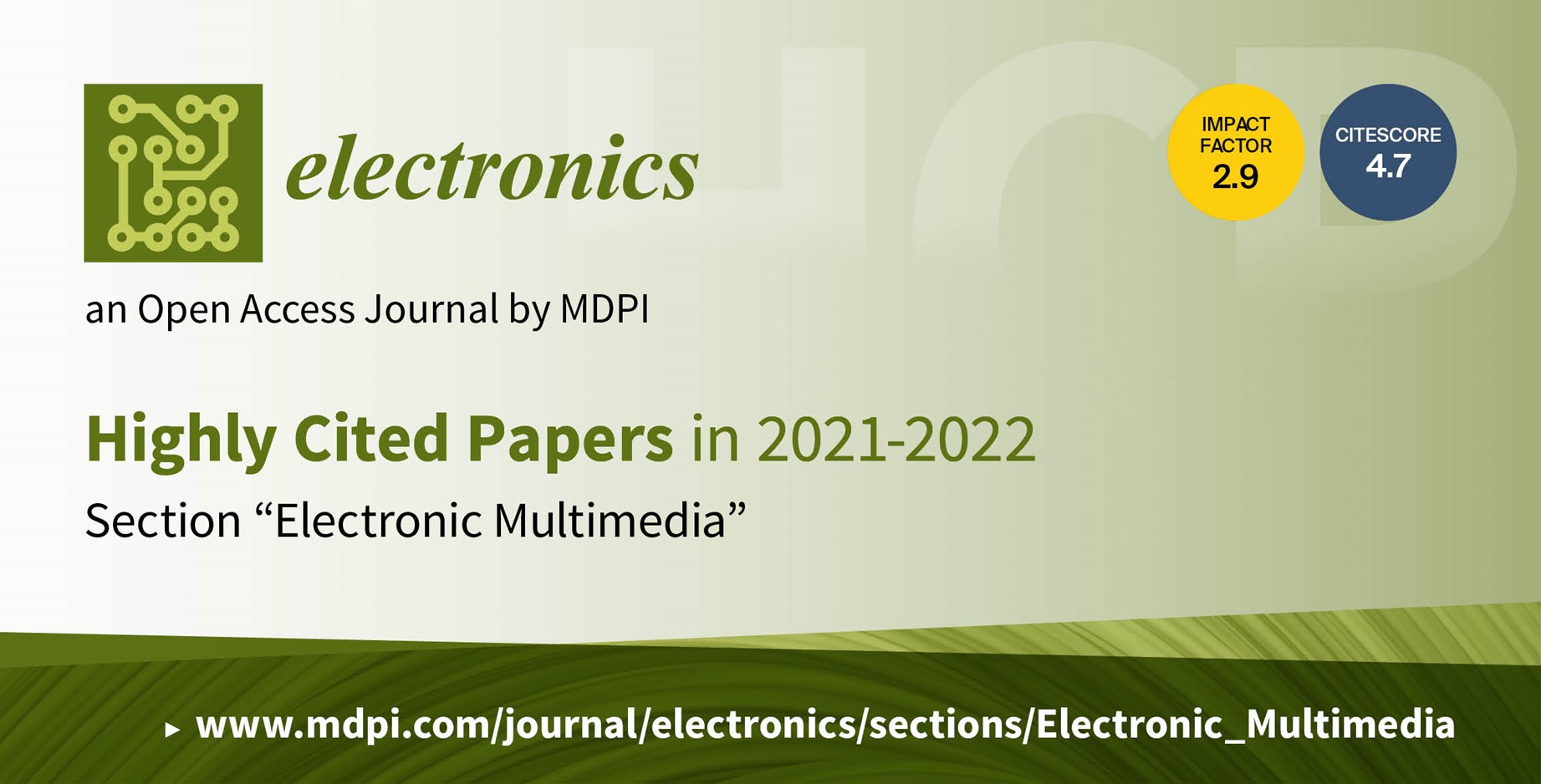
The Section “Electronic Multimedia”, in Electronics (ISSN: 2079-9292), reports on electronic multimedia technology, tools, and applications of electronic multimedia, including but not limited to circuits, networking, signal processing, systems, software, and system integration.
You have free and unlimited access to the full texts of all of the open access articles published in our journal. We welcome you to read our most highly cited papers published in 2021-2022 below:
1. “Assessing the Effects of the COVID-19 Pandemic on M-Commerce Adoption: An Adapted UTAUT2 Approach”
by Simona Vinerean, Camelia Budac, Lia Alexandra Baltador and Dan-Cristian Dabija
Electronics 2022, 11(8), 1269; https://doi.org/10.3390/electronics11081269
Available online: https://www.mdpi.com/2079-9292/11/8/1269
2. “A Survey on QoE-Oriented VR Video Streaming: Some Research Issues and Challenges”
by Jinjia Ruan and Dongliang Xie
Electronics 2021, 10(17), 2155; https://doi.org/10.3390/electronics10172155
Available online: https://www.mdpi.com/2079-9292/10/17/2155
3. “The Impact of the COVID-19 Pandemic on the Global Web and Video Conferencing SaaS Market”
by Cristiana Tudor
Electronics 2022, 11(16), 2633; https://doi.org/10.3390/electronics11162633
Available online: https://www.mdpi.com/2079-9292/11/16/2633
4. “Toward Efficient Blockchain for the Internet of Vehicles with Hierarchical Blockchain Resource Scheduling”
by Liming Gao, Celimuge Wu, Zhaoyang Du, Tsutomu Yoshinaga, Lei Zhong, Fuqiang Liu and Yusheng Ji
Electronics 2022, 11(5), 832; https://doi.org/10.3390/electronics11050832
Available online: https://www.mdpi.com/2079-9292/11/5/832
5. “Segmentation of Aorta 3D CT Images Based on 2D Convolutional Neural Networks”
by Simone Bonechi, Paolo Andreini, Alessandro Mecocci, Nicola Giannelli, Franco Scarselli, Eugenio Neri, Monica Bianchini and Giovanna Maria Dimitri
Electronics 2021, 10(20), 2559; https://doi.org/10.3390/electronics10202559
Available online: https://www.mdpi.com/2079-9292/10/20/2559
6 December 2023
Interview with Dr. Kai Da Xu—Winner of the Electronics 2023 Young Investigator Award
Dr. Kai Da Xu obtained a Ph.D. degree at the University of Electronic Science and Technology of China (UESTC), and he worked at several well-known universities overseas for nearly six years, including Duke University, the City University of Hong Kong, the University of Wisconsin-Madison, Tohoku University, and Yokohama National University. He received two fellowships from the Japan Society for the Promotion of Science (JSPS), and in 2020, he joined Xi’an Jiaotong University, China.
The following is a short interview with Dr. Kai Da Xu:
- Can you briefly introduce yourself to our readers and tell us a little bit about your fields of interest?
I have published 180 articles in peer-reviewed journals and over 50 papers in Conference Proceedings, where 13 papers were selected as ESI highly cited papers and 2 papers were selected as ESI hot papers. I was also included in the 2022 list of the most cited Chinese researchers announced by Elsevier. I was also included for 3 years in the list of the top 2% of the most cited scientists in the field of information, communication, and technology released by scientists from Stanford University. I am now serving as an Editorial Board Member for the journal Electronics (MDPI), and I have also been serving as an Associate Editor for IEEE Access, IET Microwaves, Antennas & Propagation, and Electronics Letters. I have organized several Special Issues in some international journals as a Guest Editor. My current research is focused on millimeter-wave and terahertz devices, such as filters and antennas. - Which research topics do you think are of particular interest to the research community in the coming years?
In the upcoming years, I plan to persist in my research with a specific focus on millimeter-wave and terahertz transmission lines and their applications in the design of components like filters and amplifiers for next-generation communication systems. -
Have you had difficulties to overcome in your work? How did you approach those situations?
I encountered some financial difficulties during my career, especially in the period between 2015 and 2019. After defending my Ph.D., it was difficult for me to get promoted, so I had to change several universities. The award and financial support received from the Japan Society for the Promotion of Science (JSPS) were really helpful for me in my professional development. Additionally, in 2019, the birth of my daughter prompted me to maintain a balance between my professional and personal life. -
What’s the secret to a happy scientific life?
In my opinion, the key to a happy scientific life lies in a genuine passion for the research domain. Scientists should maintain their enthusiasm, even in the face of multiple unsuccessful funding applications over several years, recognizing that funding may be insufficient for that particular research field. -
What qualities do you think young scientists need?
A young researcher should exhibit motivation and a genuine interest in the project for which they are applying. -
What is your opinion of the open access model of publishing?
I have experience contributing to both open access and subscription journals. The open access model facilitates the widespread dissemination of knowledge by eliminating financial barriers, ensuring research outcomes are accessible to the public. Papers published in open access journals tend to garner greater readership and citations compared to the traditional subscription model. However, covering article processing fees can pose a challenge for authors with insufficient funding. When selecting a journal for publication, it is also important to consider the Impact Factor of the journal. -
As the winner of this award, is there something you would like to express to our readers?
I am very honored to be the winner of the Young Investigator Award, as it was my first application for such recognition. This award has important significance in bolstering my prospects for pursuing upcoming projects. Be more confident; perhaps the winner of this award will be you next year.
We wish Dr. Kai Da Xu every success in his current work, and we look forward to his future contributions to the journal.
5 December 2023
Editorial Board Members from Electronics Featured in the 2023 Highly Cited Researchers List Published by Clarivate
Recently, ClarivateTM revealed its 2023 list of Highly Cited ResearchersTM—individuals at universities, research institutes, and commercial organizations.
The scientists who were selected for this year’s list of Highly Cited Researchers published highly cited papers in the 11-year period from January 2012 to December 2022, with citation frequency in the top 1% of academic subjects and the same year of publication in the Web of ScienceTM database. This year, 7,125 Highly Cited Researcher 2023 designations were issued to 6,849 individuals, representing just 1 in 1,000 researchers worldwide. This means that these researchers have demonstrated an incredible level of significant and broad influence in their chosen field or fields over the last decade. The list is truly global, spanning 67 countries or regions and spread across a diverse range of research sciences and social sciences.
According to our statistics, 7 members of the Editorial Board of Electronics (ISSN: 2079-9292) were selected for the list of Highly Cited Researchers by ClarivateTM in 2023. They are being recognized for their high-quality scientific research achievements and outstanding contributions to their professional fields. The Electronics Editorial Office sincerely congratulates all elected editorial members and hopes that they continue to have an academically productive relationship with the journal.
|
Researcher |
Category |
Affiliation |
|
Zhang, Xian-Ming |
Computer Science |
Swinburne University of Technology, Australia |
|
Guan, Cao |
Cross-Field |
Northwestern Polytechnical University, China |
|
He, Jr-Hau |
Cross-Field |
City University of Hong Kong, Hong Kong |
|
Yu, Jun |
Cross-Field |
Hangzhou Dianzi University, China |
|
Xu, Li Da |
Engineering |
Old Dominion University, United States |
|
Yin, Shen |
Engineering |
Norwegian University of Science & Technology (NTNU), Norway |
|
Cheng, Qiang |
Physics |
Southeast University - China, China |
30 November 2023
MDPI Insights: The CEO’s Letter #6 - MDPI Spain Summit and ResearchGate

Welcome to the MDPI Insights: The CEO's Letter.
In these monthly letters, I will showcase two key aspects of our work at MDPI: our commitment to empowering researchers and our determination to facilitating open scientific exchange.
Opening Thoughts

MDPI Spain Summit

Stefan Tochev (CEO, MDPI) gives the opening speech at the MDPI Spain Summit.
On Friday 10 November 2023 I was in Barcelona, Spain, to deliver the opening presentation and participate in a panel at MDPI’s Spain Summit, a two-day event, inspired by our salon events in China.
With 16 Editors-in-Chief (EiCs) and 20 Editorial Board Members (EBMs) in attendance, the event, organized by our conference team and Barcelona office, featured presentations on open access (OA), MDPI, and publishing market trends in Spain.
The event provided a great opportunity to engage with stakeholders from various MDPI journals, including Nutrients, Vaccines, Buildings, IJMS, and others. We were able to gather feedback and have open conversations around manuscript quality, the peer-review process, and journal development, as well as accreditation agencies.
The main objective of this Summit was to bring together Editors representing MDPI journals across various disciplines within Spanish universities and research centers, primarily from the Barcelona area. The aim was to facilitate an open and fruitful discussion regarding the development of their journals, the future of OA in Spain, and to provide meaningful interactions and networking opportunities.
Connecting with Editorial Board Members

Stefan Tochev in conversation with Summit participants: "Our EBMs are passionate about the journals they serve."
Interacting with our EBMs in person provides a valuable opportunity to show how important it is to us to connect with them, hear their perspectives on their journals and learn more about their own experience collaborating with MDPI.
From my conversations, it was clear that our EBMs are passionate about the journals they serve. I know the advice they provide may sometimes involve just small tweaks, but these can lead to important improvements. As the saying goes, small hinges swing open big doors.
As at November 2023, MDPI has over 6,300 EBMs affiliated with Spanish institutions, with more than 30 of them serving as EiCs or section EiCs. Furthermore, over 68,000 Spanish scholars have contributed as reviewers in MDPI journals.
Open Access in Spain
In 2023, Spain implemented legislation mandating immediate OA for all publicly funded research, aligning with the EU’s Plan S initiative to expedite the transition to OA. The Spanish government also approved a four-year, €23.8 million annual budget for the first national OA strategy, aiming to make publicly funded research freely accessible upon publication. This strategy aims to strengthen the quality and transparency of research in Spain, and to help promote movement towards a digital, low-carbon economy.
For further details of Spain's OA policy and the history of government mandates, click here.
Spain has already seen a notable decline in subscription-only articles, decreasing by 62% over a 10-year period, while gold OA increased by 42%. Green OA slightly decreased, suggesting a shift towards publishing in gold OA journals rather than traditional subscription-based ones. Here are some statistics from Scopus.
A big thank-you to the various MDPI teams, including our conference team and the Barcelona office, for organizing this very successful event!

MDPI colleagues from various offices gathered to host and support the first MDPI Spain Summit, in Barcelona, Spain.
I think this type of gathering has the potential to become an annual event in various locations. For example, Manchester could be an option, as we have over 30 EiCs and over 3,000 EBMs in the UK, a top market for MDPI that publishes high-quality research.
Impactful Research

769 Editorial Board Members of MDPI Journals Recognized as Highly Cited Researchers in 2023
Congratulations to our 769 Editorial Board Members from 40 countries/territories who have been awarded Highly Cited Researcher status for 2023 by Clarivate. This recognition is based on their outstanding scientific research contributions and significant influence in various fields, as evidenced by Web of Science data.
Click here to view the full list of 769 Editorial Board Members.
Clarivate's Highly Cited ResearchersTM list identifies individuals with exceptional impact in scientific and social science domains over the past decade. Their papers rank in the top 1% of citations in 21 fields analysed in ‘Essential Science Indicators,’ showcasing their substantial influence.
This year, 7,125 Highly Cited Researcher 2023 designations were issued to 6,849 individuals from 67 countries, representing just 1 in 1,000 researchers worldwide.
These researchers demonstrate exceptional influence, representing a small fraction of contributors pushing the boundaries of knowledge, contributing to global well-being, sustainability, and security.
Congratulations to these scholars for their remarkable achievement: we are honoured to have them on board with our journals!
Inside MDPI

Corporate Marketing and Communications Strategy Session

Members of MDPI’s Corporate Marketing & Communications team.
For the past few years, I have led the Corporate Marketing & Communications department in our annual strategy session.
This typically involves 2–3 days of focused sessions covering key topics including budgeting, hiring targets, campaign reviews, and planning for the upcoming year, department strategy, and structure.
We are constantly exploring ways to optimize the Corporate Marketing & Communications department to support MDPI’s primary objectives and better convey the MDPI story while serving the scholarly community.
The strategy session also serves as a team-building activity, during which the team voted on bowling!
Strategy Session
In this strategy session, we looked at how to align our teams in order to better streamline our content with our campaigns, build a dedicated marketing team to strategically support our core MDPI products, expand our communications teams and functionalities to focus on company-critical campaigns and press releases, align our new brand design system with our marketing initiatives, set up a community and engagement team to support various teams with their outreach and communication efforts, and increase our use of data in the evaluation of campaign performance.
To grow in these areas, we will be hiring for various positions, including those of Public Relations Manager, Communications Manager, Internal Communications Manager, Campaign Manager, Marketing Associate, and Editorial Engagement Manager.
I am grateful for the way our Corporate Marketing & Communications department has grown and gelled over the years, and I look forward to supporting the department teams and their ideas for the future.
Coming Together for Science

ResearchGate and MDPI Partner to Boost the Visibility of Open Access Content through Journal Home

Stefan Tochev (CEO, MDPI) and Sören Hofmayer (Co-Founder and Chief Strategy Officer, ResearchGate) meet in Berlin, Germany to take their ongoing discussion further.
When I assumed the role of CEO at MDPI, my primary focus was to initiate the building of essential partnerships and collaborations within our industry. After all, I am a firm believer in achieving our goals by helping others achieve theirs and focusing on co-opetition wherever there is an opportunity. I first touched on the notion of co-opetition in MDPI Insights: The CEO's Letter #3, particularly when discussing collaborations with Elsevier.
In light of this, Sören Hofmayer (Co-Founder and Chief Strategy Officer at ResearchGate) and I connected recently to continue a discussion that had been ongoing for months. I was quickly brought up to speed and felt there was an opportunity for MDPI journals to pilot the Journal Home service that ResearchGate had launched. This would provide a new way for MDPI to engage with authors and readers and amplify the visibility of our journals.
While I receive many offers and opportunities for discussions with vendors, I am a firm believer that timing is everything, and in this case, the time for us is now. Sören and I met in person during my recent visit to Berlin and decided to proceed with piloting ten MDPI journals with the Journal Home service.
The press release below provides further details.
Press Release: Berlin (Germany) and Basel (Switzerland), 15 November 2023
ResearchGate, the professional network for researchers, and MDPI, the largest open access publisher in the world and a pioneer in open access publishing, today announced a partnership that will see ten of MDPI’s open access journals benefit from an enhanced presence on ResearchGate through its innovative Journal Home offering.
This new partnership will expand the reach and visibility of MDPI’s participating flagship journals with ResearchGate’s highly relevant community of more than 25 million researchers globally.
Around 210,000 version-of-record articles from these 10 titles will be readily available on ResearchGate, including the full archive material and all new articles as they are published. These journals also benefit from enhanced brand visibility, with dedicated journal profiles, prominent representation on all associated article pages and all relevant touchpoints across the ResearchGate network – keeping the journals top-of-mind with their reader and author audiences. All articles covered by the new partnership will automatically be added to the authors’ publication records in ResearchGate. This not only reduces MDPI authors’ needs for direct management but also offers them valuable insights into the impact of their work, including data about readership and citations.
Closing Thoughts

November is Men’s Health Awareness Month

Stefan Tochev (CEO, MDPI) listening to music as he writes at a coffee shop in Basel, Switzerland.
November is dedicated to raising awareness of various men’s health issues. I have been fortunate to have positive male role models in my life, and I strive to share my experiences with others.
I used to take part in Movember, growing my moustache throughout November to raise awareness and funds and to help “change the face of men’s health.” With male family and friends impacted by physical and mental health issues, I have recently become more interested in men’s overall well-being.
Men often face stigma involving the perceived need always to be strong and have things figured out. Recently, I’ve had meaningful conversations with male friends and colleagues about issues we rarely discuss, and it was a positive experience.
Various factors impact men’s health and well-being, all too easily leading to risky health behaviours including a lack of health awareness, poor health education, and negative, culturally induced, behaviour patterns in our work and personal lives. I hope we can break down these barriers in our work environment.
Healthy men help build healthy families and a healthy society
Men are less likely than women to seek help with their physical and mental health struggles. This is a reminder to prioritize your overall well-being. I hope that as men, we will continue to open up to one another, becoming vulnerable in order to share what we are going through. By sharing and by supporting each other, we can learn and grow together. You are not alone, and when you fall, you can still get up and stand tall.
From one broski to another, you are loved and appreciated. I hope this mindset carries into December and beyond.
Mindfulness
Our content team recently released a handful of articles on mindfulness, a practice that I believe provides a good opportunity for stress release and self-reflection:
Chief Executive Officer
MDPI AG
29 November 2023
Electronics 2023 Young Investigator Award—Winner Announced
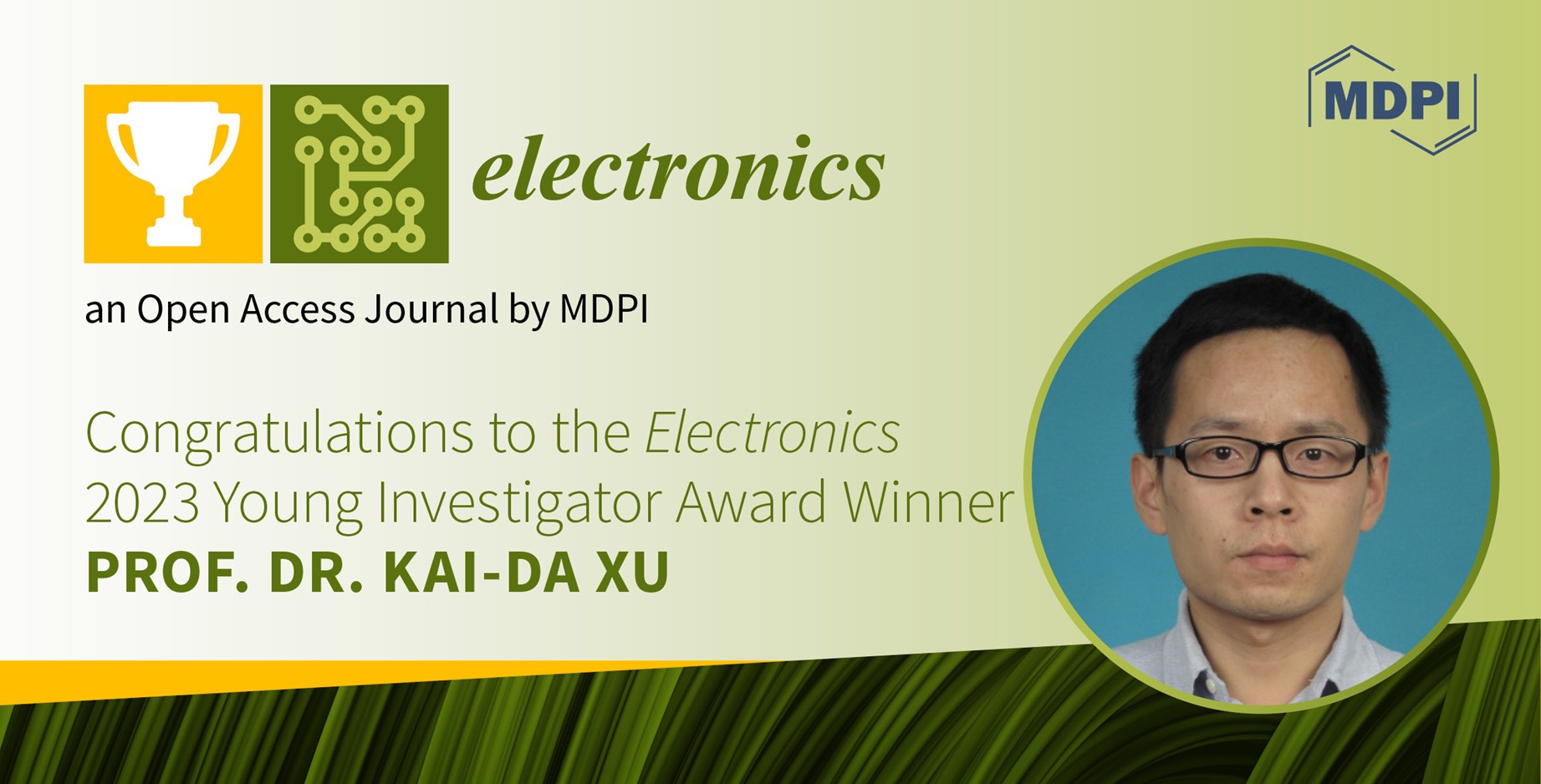
We are pleased to announce that the winner of the Electronics 2023 Young Investigator Award is Prof. Dr. Kai-Da Xu from Xi’an Jiaotong University, China.
Dr. Kai-Da Xu received his Ph.D. degree in electromagnetic field and microwave technology from the University of Electronic Science and Technology of China (UESTC), Chengdu, China, in 2015. From 2015 to 2018, he was an assistant professor at Xiamen University, Xiamen, China. From 2016 to 2017, he was a Postdoctoral Fellow at the City University of Hong Kong, Hong Kong. From 2018 to 2019, he was an Honorary Fellow at the University of Wisconsin–Madison, Madison, WI, USA. From 2019 to 2021, he was a Japan Society for the Promotion of Science (JSPS) Fellow at Tohoku University, Sendai, Japan. In 2020, he joined Xi’an Jiaotong University. From August to September 2023, he was a visiting professor at the Yokohama National University with financial support from the JSPS. He has authored and coauthored over 180 papers in peer-reviewed journals, and over 50 papers in conference proceedings. He was in the list of “2022 Most Cited Chinese Researchers” announced by Elsevier in March 2023. His current research interests include microwave/millimeter wave/THz devices and antenna arrays. This is an outstanding achievement in today’s competitive environment. Please join us in congratulating Dr. Kai-Da Xu for his outstanding achievements.
As the awardee, Dr. Kai-Da Xu will receive an honorarium of CHF 2000, an offer to publish a paper free of charge before 31 December 2024 in Electronics (ISSN: 2079-9292) after peer review, and an electronic certificate.
On behalf of the Assessment Committee Members—Dr. Giambattista Gruosso, Dr. Xiongfeng Ma and Prof. Dr. George A. Tsihrintzis—we congratulate the winner on his accomplishments. We would also like to thank all of the nominators from various fields of study for their participation as well as all of the Award Committee Members for their evaluation of the abundant excellent nominations.
Prof. Dr. Flavio Canavero
Editor-in-Chief of Electronics
24 November 2023
Electronics | Highly Cited Papers in 2021–2022 in the Section “Quantum Electronics”

The Electronics (ISSN: 2079-9292) “Quantum Electronics” Section publishes original and significant contributions to the theoretical and experimental implementations of quantum electronics. More specifically, the articles will consider superconducting circuits, semiconductor qubits, NV centers, and electron qubits in general. Connections to atomic, molecular, and optical physics, as well as to mechatronic systems (i.e., robots and drones) when combined with quantum science are also welcome. We will consider the relationship between quantum artificial intelligence, quantum machine learning, and electronic quantum systems. Reviews as well as Special Issues will also be published.
You have free and unlimited access to the full texts of all the open access articles published in our journal. We welcome you to read our most highly cited papers published in 2021 and 2022 below:
1. “Automated Quantum Hardware Selection for Quantum Workflows”
by Benjamin Weder, Johanna Barzen, Frank Leymann and Marie Salm
Electronics 2021, 10(8), 984; https://doi.org/10.3390/electronics10080984
Available online: https://www.mdpi.com/2079-9292/10/8/984
2. “Recent Advances in the Characterized Identification of Mono-to-Multi-Layer Graphene and Its Biomedical Applications: A Review”
by Nargish Parvin, Vineet Kumar, Sang Woo Joo, Sang-Shin Park and Tapas Kumar Mandal
Electronics 2022, 11(20), 3345; https://doi.org/10.3390/electronics11203345
Available online: https://www.mdpi.com/2079-9292/11/20/3345
3. “Coreset Clustering on Small Quantum Computers”
by Teague Tomesh, Pranav Gokhale, Eric R. Anschuetz and Frederic T. Chong
Electronics 2021, 10(14), 1690; https://doi.org/10.3390/electronics10141690
Available online: https://www.mdpi.com/2079-9292/10/14/1690
4. “Design of a 20 T Class REBCO Insert in a 15 T Low Temperature Superconducting Magnet”
by Liangjun Shao, Xintao Zhang, Yufan Yan, Haoyuan Wang, Huajun Liu and Timing Qu
Electronics 2021, 10(14), 1741; https://doi.org/10.3390/electronics10141741
Available online: https://www.mdpi.com/2079-9292/10/14/1741
5. “Quantum Mechatronics”
by Lucas Lamata, Marco B. Quadrelli, Clarence W. de Silva, Prem Kumar, Gregory S. Kanter, Maziar Ghazinejad and Farbod Khoshnoud
Electronics 2021, 10(20), 2483; https://doi.org/10.3390/electronics10202483
Available online: https://www.mdpi.com/2079-9292/10/20/2483
23 November 2023
Interview with Mr. Jiahao Syu—Winner of the Electronics 2023 Travel Award

We wish to congratulate Mr. Jiahao Syu on winning the Electronics 2023 Travel Award Mr. Syu is a Ph.D. student at the National Taiwan University, Taiwan. His research is focused on artificial intelligence, including machine learning and data mining in the fields of energy, healthcare, and finance.
The following is an interview with Mr. Jiahao Syu:
1. Can you briefly introduce yourself to our readers and tell us a little bit about your fields of interest?
I am currently involved in a project focused on the energy grid of a small factory. The basic concept is related to the power consumption of robots and the conversion of energy to assist with the power charging arrangement or the task arrangement and scheduling. I will consider submitting a new article to an MDPI journal with the latest findings from my Ph.D. research.
2. Which research topics do you think will be of particular interest to the research community in the coming years?
I consider that AI technologies are developing rapidly, and researchers should pay more attention to privacy and security issues. Relative technology like federated learning or school learning has potential for future research in the field of artificial intelligence.
3. Have you had difficulties to overcome in your work? How did you approach those situations?
I consider that the most difficult part of my work is related to data availability and data collection. The limitation in my research work results from concerns related to data privacy and data security at the factory level. Also, the data from websites are not always enough for complex research. Receiving funding is also a problem for my research work, especially because I am a Ph.D. student. Thus, I need to apply for many projects at the same time to support my studies.
4. What qualities do you think young scientists need?
I think that one of the main qualities that a young researcher should have is self-motivation. Junior scientists need to figure out their path and direction at the beginning of their journey. Sometimes they do not receive external guidance for future actions. It is also really important to keep a balance between one’s personal life and work. This is why I applied last year for a student exchange program in Norway. I enjoyed this experience because I could learn from the scientists there and travel at the same time.
5. What’s the secret to a happy scientific life?
In my opinion, the key to a happy scientific life is to have a positive mindset. It is really important to be open-minded to deal with different challenges during one’s research career, even when you have conflicts with other colleagues from the same project. Patience and passion are also important.
6. What is your opinion of the open access model of publishing?
I think that open access is a good opportunity to spread information using online resources when institutions are not willing to pay for subscriptions to access different scientific papers. It can offer more visibility for researchers, as their work is accessible to a wider audience.
7. As the winner of this award, is there anything you would like to express?
I was excited to receive this travel award and used the grant to travel to a conference in the USA. I appreciate MDPI for supporting young researchers in their endeavor to attend international conferences and I encourage other scientists to apply for future awards.
We wish Mr. Jiahao Syu every success in his current work, and we look forward to his future contributions to the journal.
21 November 2023
769 Editorial Board Members of MDPI Journals Achieve Highly Cited Researcher Recognition in 2023

We extend our sincere congratulations to the 769 Editorial Board Members of our journals – from 40 different countries/territories – who have been recognized as Highly Cited Researchers for the year 2023 by Clarivate. They are being recognized for their high-quality scientific research achievements and outstanding contributions to their professional fields, as indicated by Web of Science data.
Clarivate's annual list of Highly Cited ResearchersTM identifies the most highly cited scientists for the past decade who stand out for their significant and broad influence in various scientific and social science domains. Their impactful papers are among the top 1 per cent in the citation distribution of one or more of 21 fields analyzed in the "Essential Science Indicators", distinguishing them as hugely influential among their peers.
This year, 7,125 Highly Cited Researcher 2023 designations were issued to 6,849 individuals from 67 countries, representing just 1 in 1,000 researchers worldwide.
This means that these researchers have demonstrated an incredible level of significant and broad influence in their chosen field or fields over the last decade. They represent a small fraction of the researcher population whose contributions disproportionately push the boundaries of knowledge, enhancing global well-being, sustainability, and security.
Congratulations to the scholars for their noteworthy achievement – we are honored to have them on board with our journals!
|
Abate, Antonio |
Jaiswal, Amit K. |
Shen, Zexiang |
17 November 2023
Electronics | Highly Cited Papers in 2021–2022 in the Section “Electronic Materials”

The Section “Electronic Materials” of Electronics (ISSN: 2079-9292) reports on the science, technology, and applications of electronic materials that are used in electrical industries, electronics and microelectronics, and the substances used in the construction of integrated circuits, circuit boards, packaging materials, communication cables, optical fibers, displays, and various controlling and monitoring devices.
You have free and unlimited access to the full texts of all the open access articles published in our journal. We welcome you to read our most highly cited papers published in 2021 and 2022 below:
1. “Strategies for Applications of Oxide-Based Thin Film Transistors”
by Lirong Zhang, Huaming Yu, Wenping Xiao, Chun Liu, Junrong Chen, Manlan Guo, Huayu Gao, Baiquan Liu and Weijing Wu
Electronics 2022, 11(6), 960; https://doi.org/10.3390/electronics11060960
Available online: https://www.mdpi.com/2079-9292/11/6/960
2. “Calculation Methodologies of Complex Permeability for Various Magnetic Materials”
by Eun S. Lee and Byeong Guk Choi
Electronics 2021, 10(17), 2167; https://doi.org/10.3390/electronics10172167
Available online: https://www.mdpi.com/2079-9292/10/17/2167
3. “Study of Thermal Stress Fluctuations at the Die-Attach Solder Interface Using the Finite Element Method”
by Luchun Yan, Jiawen Yao, Yu Dai, Shanshan Zhang, Wangmin Bai, Kewei Gao, Huisheng Yang and Yanbin Wang
Electronics 2022, 11(1), 62; https://doi.org/10.3390/electronics11010062
Available online: https://www.mdpi.com/2079-9292/11/1/62
4. “Microstructural and Energy-Dispersive X-ray Analyses on Argon Ion Implantations in Tantalum Thin Films for Microelectronic Substrates”
by Amir Hoshang Ramezani, Siamak Hoseinzadeh, Zhaleh Ebrahiminejad, Milad Sangashekan and Saim Memon
Electronics 2021, 10(23), 2941; https://doi.org/10.3390/electronics10232941
Available online: https://www.mdpi.com/2079-9292/10/23/2941
5. “Broadband-Transmissive, Frequency-Selective Rasorber Design Using Characteristic Mode Analysis”
by Jie Xiong, Baoping Yang, Yanjie Wu, Xiongwei Zeng, Qiuyu Li, Rongxin Tang and Hai Lin
Electronics 2022, 11(9), 1418; https://doi.org/10.3390/electronics11091418
Available online: https://www.mdpi.com/2079-9292/11/9/1418
6. “Complex Permittivity Measurement of Low-Loss Anisotropic Dielectric Materials at Hundreds of Megahertz”
by Chuanlan Li, Changying Wu and Lifei Shen
Electronics 2022, 11(11), 1769; https://doi.org/10.3390/electronics11111769
Available online: https://www.mdpi.com/2079-9292/11/11/1769
15 November 2023
Join Us at the MDPI Author Training Workshop at Manchester Metropolitan University, 17 November 2023, Manchester, United Kingdom
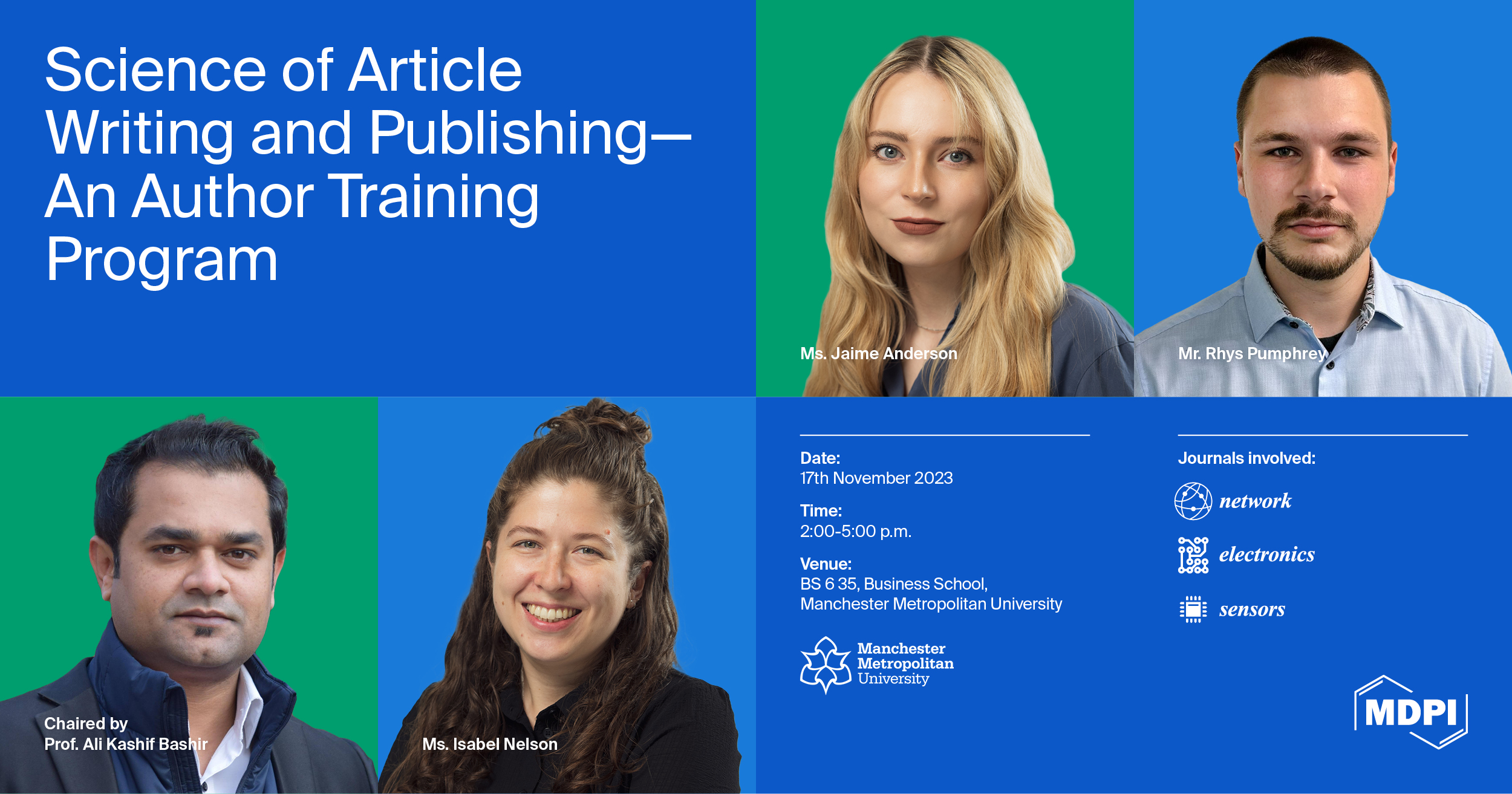
MDPI Manchester, in collaboration with the Manchester Metropolitan University, is organizing an author training session aiming to elucidate the scientific aspects of writing and publishing scholarly articles. The workshops will facilitate scholars in enhancing their comprehension of academic publications through exploration and cultivation. The training will be conducted by proficient academic editors from MDPI and will include the incorporation of use-case scenarios. The event will additionally demonstrate MDPI’s regional vision, featuring a round-table discussion with field-leading academics and editors, and a quiz with an opportunity to win prizes.
Date: 17 November 2023
Time: 2:00 p.m.–5:00 p.m.
Venue: BS 6 35, Business School, Manchester Metropolitan University, United Kingdom
Schedule:
| Time | Program and Content | Speakers |
| 14:00-14:05 | Introducing Author Training | Prof. Ali Kashif Bashir |
| 14:05-14:15 | MDPI’s Regional Vision | Mr. Rhys Pumphrey |
| 14:15-14:45 | How to Write Scientific Papers | Ms. Jaime Anderson |
| 14:45-15:20 | Editorial Insights: Reasons for Rejections and Responding to Peer-Reviewers | Ms. Isabel Nelson |
| 15:20-15:30 | Break | |
| 15:30-16:00 | A Round-Table Discussion with Academics and Editors | |
| 16:00-16:10 | Job Opportunities and Benefits at MDPI | Ms. Jaime Anderson |
| 16:10-16:30 | Quiz (with prizes!) | |
| 16:30-17:00 | Networking | |
MDPI speakers:
| Speaker | Biography |
|
Mr. Rhys Pumphrey |
Mr. Rhys Pumphrey obtained his M.Eng. in materials science and engineering from the University of Manchester, UK in 2021. He joined MDPI as an Assistant Editor for the journal Materials the same year. In September 2022, he became a Section Managing Editor, and he is currently the Journal Relations Specialist for Materials. |
|
Ms. Jaime Anderson |
Ms. Jaime Anderson holds a bachelor’s degree in psychology from the University of Manchester, UK (2018) and a Master’s degree in comparative and evolutionary psychology from the University of St Andrews, UK (2019). She joined MDPI in June 2020 as Assistant Editor and Section Managing Editor for the journal IJMS. In 2022, she joined the journal Animals, and was appointed Office Manager of the Manchester Office. |
|
Ms. Isabel Nelson |
Ms. Isabel Nelson obtained her M.Sc. in environmental monitoring, modelling and reconstruction from the University of Manchester, UK in 2020. With an interest in environmental and public health, she joined MDPI as an Assistant Editor for the journal Healthcare in 2021. Since October 2022, she has worked towards becoming a Section Managing Editor, whilst acting as the Journal Relations Specialist for Healthcare. |
7 November 2023
Meet Us at the Optics & Photonics Taiwan International Conference 2023 (OPTIC 2023), 1–3 December 2023, Tainan, Taiwan

The Optics & Photonics Taiwan International Conference (OPTIC) serves as the largest annual meeting on optics and photonics in Taiwan. It aims to bring together great minds from around the globe to share the latest advancements in optical materials, optical technology, and metaverse photonics. OPTIC 2023 will be held from 1 to 3 December 2023, at the National Cheng Kung University (NCKU), Tainan, Taiwan.
This year OPTIC 2023 comprises 10 parallel sessions covering a broad spectrum of optics and photonics:
- Nanophotonic Materials and Devices;
- Optical Waveguides and Communications;
- Quantum Electronics and Laser Technology;
- Optical Information Processing and Holography;
- Optical Design, Testing, and Engineering;
- Biophotonics and Biomedical Imaging;
- Display and Solid-State Lighting;
- Thin-Film and Photovoltaic Technology;
- Optical Sensing;
- Metaverse Photonics.
You can find more information about the conference at the following website: https://optic2023.conf.tw.
7 November 2023
Meet the Editors | Interview with Prof. Dr. Enzo Pasquale Scilingo—Section Editor-in-Chief of Section “Bioelectronics” in Electronics

Prof. Dr. Enzo Pasquale Scilingo is a full professor of Electronic and Information Bioengineering at the University of Pisa, Italy. His main research interests are in wearable monitoring systems, human–computer interfaces, biomedical and biomechanical signal processing, modeling, control and instrumentation. He is the author of more than 150 papers in peer-reviewed journals, contributions to international conferences and chapters in international books.
The following is a short Q&A with Prof. Dr. Enzo Pasquale Scilingo, who shared his vision for the journal with us, as well as his views of the research area and open access publishing:
1. How has your experience been as a Section Editor-in-Chief so far?
As Section Editor-in-Chief of the “Bioelectronics” Section, I've had the privilege of overseeing the publication of cutting-edge research in the field of bioelectronics. It's been a dynamic role that has allowed me to work closely with authors, reviewers, and our editorial team to ensure the quality and relevance of the articles we publish.
2. What made you choose to work with us knowing that we are an open access digital publisher?
Working with an open access digital publisher aligns with my commitment to advancing science and making research accessible to all. I appreciate the emphasis on transparency, accessibility, and the potential for broader impact.
3. We know that you are also working as the leading Guest Editor of many Special Issues. How do you feel about your experience as a Special Issue Editor?
It allows me to focus on specific themes or emerging areas within the field. What's particularly fulfilling is the opportunity to collaborate with experts in those areas, as well as with authors who are passionate about their research. It's a great platform for knowledge exchange and for driving innovation in specialized topics. I find it rewarding to bring together high-quality articles on a particular subject and contribute to the academic community's understanding of emerging trends and developments.
7 November 2023
Meet the Editors | Interview with Prof. Dr. Elias Stathatos—Section Editor-in-Chief of Section “Optoelectronics” in Electronics
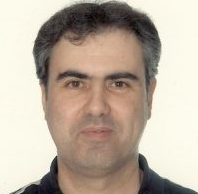
Prof. Dr. Elias Stathatos is a professor in the Electrical and Computer Engineering Deptartment at the University of Peloponnese, Greece and Head of Nanotechnology and Advanced Materials Laboratory (N&AML). His research interests are focused on third-generation solar cells and their characterization. In particular, Prof. Dr. Stathatos is interested in the conversion of solar energy to electricity using dye-sensitized, quantum dot and perovskite solar cells employing nanostructured materials.
The following is a short Q&A with Prof. Dr. Elias Stathatos, who shared his vision for the journal with us, as well as his views of the research area and open access publishing:
1. How has your experience been as the Section Editor-in-Chief of “Optoelectronics” so far?
My experience as the Section Editor-in-Chief of “Optoelectronics” has been truly rewarding. I've had the opportunity to work with an exceptional team of experts in the field, and it's been a pleasure to help shape the content and direction of the journal.
2. We know that you are also working as the leading Guest Editor of a Special Issue. How do you feel about your experience as a Special Issue Editor?
Serving as a Special Issue Editor has been a unique experience. It allows me to focus on a specific area within optoelectronics and collaborate closely with authors who are experts in that domain. It's a fantastic way to bring together cutting-edge research and share it with our readers.
3. What made you choose to work with us knowing that we are an open access digital publisher?
Open access aligns with my belief in making research more accessible to a broader audience. It ensures that knowledge is not confined behind paywalls and can benefit researchers, students, and professionals worldwide. Joining an open-access publisher like “Optoelectronics” was a natural choice for me.
4. Do you have any new topics or new directions to which we should pay more attention?
Absolutely, I believe we should pay more attention to emerging areas such as quantum optoelectronics, integrated photonics, and sustainable materials and technologies in optoelectronics. These areas hold immense potential and can significantly impact various industries and applications.
7 November 2023
Meet the Editors | Interview with Dr. Sergio Busquets-Monge—Section Editor-in-Chief of Section “Electrical and Autonomous Vehicles” in Electronics

Dr. Sergio Busquets-Monge is an academic researcher from the Polytechnic University of Catalonia, Spain. This author has contributed to research in the following topics: pulse-width modulation and converters.
The following is a short Q&A with Dr. Sergio Busquets-Monge, who shared his vision for the journal with us, as well as his views of the research area and open access publishing:
1. How has your experience been as a Section Editor-in-Chief so far?
It's been an incredibly rewarding experience. I've had the opportunity to engage with some of the brightest minds in the field of electrical and autonomous vehicles. The role has allowed me to witness the rapid advancements and innovation in this sector up close, which has been truly inspiring.
2. What made you choose to work with us, knowing that we are an open access digital publisher?
Well, open access digital publishing aligns with the modern academic landscape. It enables broader access to research, accelerating the dissemination of knowledge. I believe in the democratization of information, and working with an open access publisher allows me to contribute to this mission. Additionally, it offers a platform to reach a global audience, ensuring our research reaches the widest possible readership.
3. We know that you are also working as the leading Guest Editor of many Special Issues. How do you feel about your experience as a Special Issue Editor?
Serving as a Guest Editor for Special Issues has been a highly enriching experience. It provides the opportunity to curate collections of articles that delve deep into specific topics of interest within our field. It's a chance to shape the direction of research and encourage collaboration among experts. I find the role both intellectually stimulating and a way to contribute to the field's growth.
4. Do you have any new topics or new directions to which we should pay more attention?
Given the dynamic nature of the field, it's important to stay attuned to emerging trends. Topics like electric and autonomous transportation in smart cities, sustainable energy solutions, and AI applications in autonomous vehicles are areas that warrant attention. Additionally, as technology advances, ethical and regulatory considerations in the field will become increasingly important to address.
3 November 2023
Meet Us at Asia Communications and Photonics Conference/International Photonics and OptoElectronics Meetings (ACP/POEM 2023), 4–7 November 2023, Wuhan, China
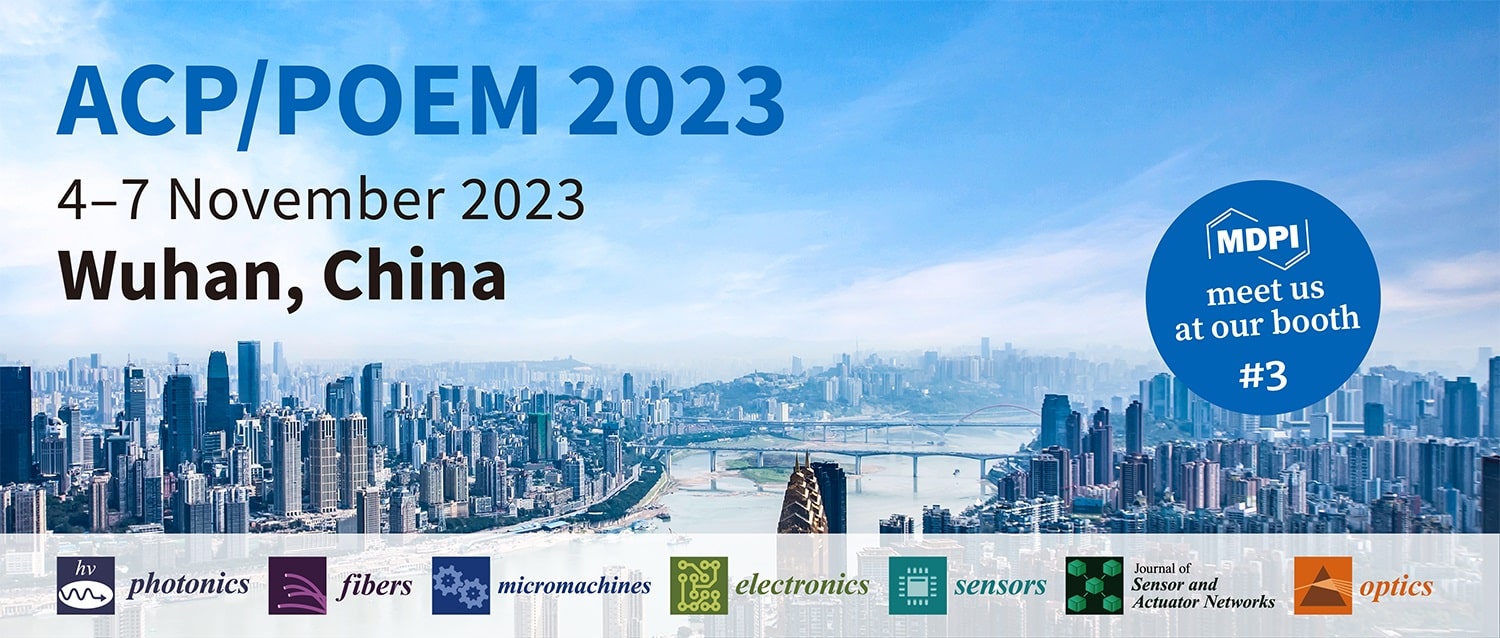
MDPI will be attending the Asia Communications and Photonics Conference/International Photonics and OptoElectronics Meetings (ACP/POEM 2023) in Wuhan, China, from 4 to 7 November 2023.
Asia Communications and Photonics Conference (ACP), which began in 2001, is one of the largest conferences in the Asia–Pacific region on optical communication, photonics and relevant technologies. The International Photonics and OptoElectronics Meetings (POEM) is an annual international conference hosted by the Wuhan National Laboratory for Optoelectronics (WNLO) of Huazhong University of Science and Technology (HUST), together with the Optics Valley Laboratory (OVL) in Hubei Province. ACP/POEM 2023 will be hosted by Huazhong University of Science and Technology. During this conference, MDPI will welcome researchers from different fields to visit and share their latest research.
The following MDPI journals will be represented:
If you are attending this conference, please stop by our booth #3. Our delegates look forward to meeting you in person and answering any questions that you may have. For more information about the conference, please visit the following link: http://www.acpconf.com/.
1 November 2023
MDPI Insights: The CEO’s Letter #5 - OA Week, UK, and Strategy

Welcome to the MDPI Insights: The CEO's Letter.
In these monthly letters, I will showcase two key aspects of our work at MDPI: our commitment to empowering researchers and our determination to facilitating open scientific exchange.
Opening Thoughts

Open Access Week 2023 – the Global Drive to Open Continues
As the world's largest open-access (OA) publisher, we believe that unrestricted access to research findings is the cornerstone of transparency, efficiency, and quality control across scientific disciplines. At MDPI, we provide free, immediate access to scientific papers, empowering scientists to examine, validate, replicate, and build upon existing results. This minimizes redundancy, optimizes resources, and fosters innovative approaches.
International OA Week, held from 23 to 29 October 2023, provided a unique opportunity to link the global movement toward open sharing and open science with the progress of policy changes at the local level. Our mission, during OA Week and all the year round, is to offer educational resources highlighting the benefits of open-access publishing. The MDPI Blog is a valuable resource for information on open access and open science.
Core principles of OA publishing
Accessibility, transparency, and collaboration are core principles of OA publishing. OA aims to break down barriers that have traditionally restricted research access, ensuring that knowledge is available to all, regardless of financial situation or institutional affiliations. Our commitment to diverse pathways for OA publishing worldwide includes discounts for researchers. You can learn more about how MDPI supports scientific communities here.
One of the key strengths of OA publishing is its ability to facilitate interdisciplinary research. By removing paywalls and promoting knowledge-sharing across disciplines, OA encourages collaboration and innovation. Researchers from various fields can access and build upon each others’ work, fostering a holistic approach to addressing complex global challenges.
OA holds the potential to democratize knowledge, advance science, and drive positive societal change.
Policy driving change
Governments, institutions, and funding agencies have recognized the transformative potential of OA and have implemented policies to promote it. These policies often require publicly funded research to be made openly accessible, accelerating the growth of OA repositories and journals. Check out our spotlights on OA policies in the US, EU and China.
OA publishing is continuously evolving, with community-driven models and technologies shaping its future. Initiatives such as “Plan S” and “cOAlition S” promote OA publishing from the perspective of national funders, requiring grantees to publish their research openly. A new policy announced by the US administration last year mandates that, with effect from January 2026, all US federally funded research should be freely and immediately available after publication.
Additionally, preprint servers such as MDPI's Preprints.org, which allow researchers to share their findings before formal peer review, have gained popularity, enhancing the speed at which new knowledge is disseminated. The rise of blockchain technology is also being explored to ensure transparency and authenticity in scholarly publishing.
For more than two decades, OA publishing has been revolutionizing academic publishing by promoting accessibility, transparency, and collaboration. Its support for interdisciplinary research, evolving policies, and innovative practices all contribute to its growing influence in the global research community. As OA continues to expand, it holds the potential to democratize knowledge, advance science, and drive positive societal change.
MDPI is proud to lead the transition to open access.
Read more:
Impactful Research

Spotlight on Smart Cities
Smart cities will serve as a cornerstone for future human development. Their implementation will help us tackle many of the significant challenges we are facing – climate change, ageing populations, waste management, public safety, travel, and so on. Recognising the importance of this multifaceted field, MDPI launched the inaugural issue of Smart Cities in 2018 to provide an advanced forum for research into smart technology and society. Here we take a look at how this journal has developed, and its impact in this exciting field.
As at 30 October, 2023, Smart Cities has published 421 papers and has an Impact Factor of 6.4. It also has a CiteScore of 8.5, and more than one quarter of its published papers – 124 – have been cited 10 times or more.
Highly cited papers in Smart Cities
Below are several highly cited papers recently published in Smart Cities. Citation metrics are current as at 31 October 2023.
1. “Introducing the “15-Minute City”: Sustainability, Resilience and Place Identity in Future Post-Pandemic Cities”
Authors: Carlos Moreno, Zaheer Allam, Didier Chabaud, Catherine Gall and Florent Pratlong
Smart Cities 2021, 4(1), 93-111; https://doi.org/10.3390/smartcities4010006
Citations: Crossref (338), Scopus (366), Web of Science (270), Google Scholar (710)
The paper discusses the socio-economic impacts of the COVID-19 on cities, including increasing inequalities and rising unemployment. It introduces the concept of the "15-Minute City," a form of "chrono-urbanism," as a response to the challenges posed by the pandemic.
2. “A Review on Electric Vehicles: Technologies and Challenges”
Authors: Julio A. Sanguesa, Vicente Torres-Sanz, Piedad Garrido, Francisco J. Martinez and Johann M. Marquez-Barja
Smart Cities 2021, 4(1), 372-404; https://doi.org/10.3390/smartcities4010022
Citations: Crossref (359), Scopus (363), Web of Science (268), Google Scholar (558)
This paper provides an overview of the progress in Electric Vehicles (EVs), focusing on battery technology, charging methods, and emerging research challenges. It also analyzes the global EV market and its future outlook.
3. “IoT in Smart Cities: A Survey of Technologies, Practices and Challenges”
Authors: Abbas Shah Syed, Daniel Sierra-Sosa, Anup Kumar and Adel Elmaghraby
Smart Cities 2021, 4(2), 429-475; https://doi.org/10.3390/smartcities4020024
Citations: Crossref (121), Scopus (151), Web of Science (91), Google Scholar (215)
This paper gives an overview of the Internet of Things (IoT) in the context of Smart Cities, discussing the fundamental components, technologies, architectures, networking technologies, and artificial algorithms that underpin IoT-based Smart City systems.
4. “Artificial Intelligence Techniques in Smart Grid: A Survey”
Authors: Olufemi A. Omitaomu and Haoran Niu
Smart Cities 2021, 4(2), 548-568; https://doi.org/10.3390/smartcities4020029
Citations: Crossref (76), Scopus (94), Web of Science (57), Google Scholar (120)
This survey paper reviews the utilization of artificial intelligence (AI) techniques in the context of the smart grid. It covers various applications of AI in load forecasting, power grid stability assessment, fault detection, and security issues in the smart grid and power systems.
5. “The Metaverse as a Virtual Form of Smart Cities: Opportunities and Challenges for Environmental, Economic, and Social Sustainability in Urban Futures”
Authors: Zaheer Allam, Ayyoob Sharifi, Simon Elias Bibri, David Sydney Jones and John Krogstie
Smart Cities 2022, 5(3), 771-801; https://doi.org/10.3390/smartcities5030040
Citations: Crossref (72), Scopus (75), Web of Science (43), Google Scholar (176)
This paper discusses the concept of the Metaverse, a virtual world introduced by Meta (formerly Facebook), and its potential impact on urban life. It explores how emerging technologies such as AI, Big Data, IoT, and Digital Twins could reshape urban design and services in the context of the Metaverse.
Testimonial
“It was indeed a great and pleasant experience with MDPI regarding our recent publication. The submission process was very straightforward and less time-consuming than the norm. The review process was very fast compared to many other open access journals, which is praiseworthy. The support from the Editorial Office during the revision process was highly useful as well. We look forward to publishing with MDPI in the future, and I will most definitely recommend MDPI to my colleagues and collaborators.” – Dr. Luís Rosa, University of Minho
Article in Smart Cities: Mobile Networks and Internet of Things Infrastructures to Characterize Smart Human Mobility
Inside MDPI

MDPI Manchester office, UK Visit

Allie Shi (Editorial Director, MDPI), Stefan Tochev (CEO, MDPI), Jamie Anderson (Manchester Office Manager, MDPI), Michael O’Sullivan (Senior Scientific Officer, MDPI), Hushneara Akhtar, and Becky Castellon (IOAP Team Lead, MDPI), dining out in Manchester, UK.
In October, I visited MDPI’s new office in Manchester. During the visit, I connected with our English Editing (EE) managers, Scientific Officer, members of the Editorial team, the Marketing team, and IOAP Team Lead.
Our Manchester office focuses primarily on EE services and provides local support for the UK market. Additionally, we regularly visit Editorial Board members and participate in local conferences.
I would like to thank Jamie Anderson, Manchester Office Manager, and her team, for their deep commitment to our Manchester staff and to MDPI’s impact on the UK market.
The UK by numbers
The UK is a hub for the world’s top universities, making it a key market for MDPI and the publishing world in general. It is home to two of the top-five-ranked universities globally, 11 in the top 100, and 15 in the top 200.
As a result, the UK plays a key role in MDPI’s global market. As at October 2023, it ranks as the seventh-largest contributor to the total number of papers published by MDPI. We have 3,500 Editorial Board members affiliated with UK institutions, including 34 serving as Editors-in-Chief (EiCs). Our commitment to collaboration with institutions is evident in the UK, where we have successfully established some 60 Institutional Open Access Program (IOAP) agreements with esteemed institutions, such as the University of Oxford, the University of Cambridge, Imperial College London, the University of Edinburgh, and more.
According to InCites Dataset + ESCI for the period 2018–2022, as at October 2023, nearly 65% of UK papers are now published as OA. Just over 10% of total OA publications are by UK authors. UK papers are known for their high quality, with an average of 11 citations per paper. Furthermore, 2.16% of UK papers are in the top 1% of cited papers, and 14.61% are in the top 10% of cited papers, showcasing their impact.
We are currently hiring EEs in various locations worldwide.
English Editing at MDPI
Our English Editing (EE) department consists of two main branches, Quality Control and Learning and Development, reflecting our priorities. We are continuously enhancing the quality of our English Editing services and have raised the relevant standards, which now extend to company-wide communications. English editors participate in international interviews, conduct English assessments, and provide colleagues with presentations on ways to improve their use of written and spoken English.
While expanding, the EE department has proactively refocused its efforts on the quality of our work and how the English Editing department can benefit the company more broadly. We currently have approximately 140 full-time English Editors based across five offices worldwide, supplemented by over 700 freelance English editors.
Our Manchester office serves as the hub for the EE Department, with EE Managers situated there, except for Kurtis Jackson, who serves as the Head of EE and is located in our Basel office. Manchester EEs play a critical role in establishing and developing EE teams in our other offices, overseeing management and recruitment. The EE department plays a vital role in MDPI’s operations, as it is the department that touches every published paper. If this work interests you, I encourage you to explore our available EE positions, whether you are seeking full-time or freelance opportunities.
Testimonials
“MDPI provides an excellent service compared to any other previously used services. It delivers fast and high-quality results but at an affordable price.” – Ardha Apriyanto, University of Potsdam
“In my role as a professor, I consider that MDPI Author Services offer an excellent quality in the editing of Western academic writing while maintaining the required standards of clarity, precision and rigor. Additionally, delivery times are fast compared to other available services.” – Jesus Insuasti, University of Nariño
Read more:
Coming Together for Science

STM and Frankfurt Book Fair
Attending STM
MDPI has been a proud sponsor of the STM Conference for several years. The STM Conference is a dynamic event featuring interactive sessions, expert panellists, idea-sharing, and ample networking opportunities. On 16 October, the event kicked off with arrival drinks, sponsored by MDPI, followed by a welcoming dinner, providing a great chance to connect and network with industry professionals. The following day was filled with speakers, sessions, and further opportunities to connect. STM exemplifies the collaborative spirit of the scientific community, with session topics including achieving open, visible, and impactful research at scale; maintaining research integrity in a rapidly changing world; and exploring the impact of ever-evolving technology in the scholarly community.
Meeting with Web of Science
On a personal note, one of the highlights of STM was a candid and productive conversation with Nandita Quaderi, Editor-in-Chief and SVP at Web of Science. During our discussion, we talked about MDPI, Web of Science, the IJERPH delisting, and ways of moving forward. This open conversation aimed at fostering better collaboration for the future.
“We discussed ways to improve our communication and collaboration.”
I appreciated our frank discussion and felt that Nandita wholeheartedly supports open access. She also expressed her appreciation for the monthly CEO Letter, which she sees as a way to add personality to the MDPI brand and provide insight into the great work we do at MDPI. While we highlighted the positives, we also discussed ways to improve our communication and collaboration moving forward. This meeting alone made the trip worthwhile, and I hope Nandita doesn’t mind my sharing that she found our chat to be “the most honest and constructive discussion” she’s had with someone from MDPI in recent years.
75th Frankfurt Book Fair

Jelena Milojevic (Book Editor, MDPI), Jovana Dubajic (Book Editor, MDPI), Evan Escamilla (Project Manager, MDPI), Laura Wagner (Head of Books, MDPI), and Jenny Knowles (Commissioning Editor, MDPI), at the Frankfurt Book Fair in Frankfurt am Main, Germany.
For the 75th time, the Frankfurter Buchmesse opened its doors in October to celebrate exciting stories and their authors. If you haven’t yet had the chance to visit the Frankfurt Book Fair, I highly recommend it. It’s the largest book fair in the world, attracting thousands of visitors from around the globe. This is the place to gain valuable industry insights from top-class publishing professionals, connect with publishers directly, and learn about the latest trends in publishing.
MDPI Books
Our Books team was also present at the Frankfurt Book Fair, networking and learning from various panels. Did you know that our MDPI Books department publishes OA Books?
The book publishing program includes monographs, book series, edited books and reprints of special issues and topical collections, among other book types.
If you have a book proposal you would like to discuss, please feel free to contact our Books team to understand the benefits and methods of publishing your next book with the OA model.
Closing Thoughts

MDPI Strategy Meeting
As the newly appointed CEO, this is my first year leading the MDPI Senior Management Strategy session. I saw it as an opportunity to explore what MDPI has the potential to become in the next five years. Guided by the vision of its founder and President, Dr. Shu-kun Lin, the company has accomplished remarkable feats over the past 27 years and currently holds the position as the world’s third-largest academic publisher, following Springer Nature and Elsevier.
Our primary objective is to build upon the milestones of the past decades and consolidate MDPI’s position as well-established publishing brand. The two-day meeting emphasized the importance of communicating MDPI’s values more actively via its brand and adopting a straightforward yet impactful approach to managing MDPI as a mature academic publisher.
“Our primary objective is to consolidate MDPI’s position as well-established publishing brand”
As the world’s number one open-access publisher, MDPI has long been a game-changer in the scholarly community, serving millions of authors. The challenge in being a trailblazer is the need to continuously improve and at the same time explore the next blue-ocean strategy, while also maintaining the smooth operation of the business. Our collection model, featuring guest-curated thematic topics in the form of Special Issues, has disrupted the industry. Other publishers closely study us and attempt to replicate our models. The future of this collection model is something we are actively addressing – while, of course, looking ahead to what comes next!
Chief Executive Officer
MDPI AG
31 October 2023
Interview with Dr. Jianlong Zhou—Winner of the Electronics 2023 Best Paper Award
The Electronics 2023 Best Paper Award has been granted to the following paper:
“Evaluating the Quality of Machine Learning Explanations: A Survey on Methods and Metrics”
by Jianlong Zhou, Amir H. Gandomi, Fang Chen and Andreas Holzinger
Electronics 2021, 10(5), 593; https://doi.org/10.3390/electronics10050593
The winners will receive CHF 500 and a chance to publish a paper free of charge after peer review in Electronics (ISSN: 2079-9292) in 2023.

Dr. Jianlong Zhou is an Associate Professor at the School of Computer Science, Faculty of Engineering and IT, University of Technology Sydney, Australia, leading the UTS Human-Centred AI research lab. His current work focuses on AI for social good, AI fairness, AI explainability, smart agriculture, visual analytics, behaviour analytics, human-computer interaction, and related applications.
The following is a short Q&A with Dr. Jianlong Zhou:
1. Could you please briefly introduce the main content of the winning paper?
The content of this paper is a literature review on the evaluation of the explanation quality in machine learning, and we carried out a deep literature review on different approaches to evaluate the quality of explanations, which include qualitative and quantitative research.
2. Could you describe the difficulties and breakthrough innovations in this research field?
The most difficult part of this article, in my opinion, is the design. In the beginning, there are many different approaches, and it's a mess. Somebody has treated this topic in this way. Somebody has treated this issue in a different way. And there are other people in different areas. For example, a social scientist, even a psychologist, will also have some discussions about this.
3. How was your experience submitting to Electronics?
My experience with Electronics is that it is very impressive, very good, and I can get feedback very quickly, which I like very much, and I plan to submit my work in the future.
4. What were some of the biggest challenges you faced?
We had to think about a very good idea for a framework to frame this literal view. How do we categorize this work or existing work, and how do we find interesting ideas or challenges in such a review. So, we finally divided the work into a qualitative and quantitative approach, and qualitative is also further divided into different areas to those in the quantitative approach. In each country, there are many explanations for machine learning itself. There are also many different categories, for example, local explanation and global explanation, for each explanation. Categories are also different methods. However, we don't know whether their explanation is a real explanation or not. This kind of work is very challenging, very difficult. And why? Because most of the time we don't have a ground truth, we don't have a ground truth for the explanation. So, it's very difficult work. They only state that they have developed a new explanatory method, but they do not evaluate the quality. They have evaluated some papers. They use some simulated data. They use very simple cases. For example, they just say that they know the ground truth of the explanation and just want to measure the weather. The explanations they generate are closer to the baseline data. For our literature review, we categorized these papers and divided them into qualitative and quantitative. We also found that the evaluation of explanations is more human-focused. We also reviewed a lot of work on human-centered assessment. The evaluation of the quality of machine-learning explanations belonged to two areas: the human-computer interaction domain and the machine-learning domain.
5. How do you think open access impacts authors?
I think that open access is challenging and helps to improve the impact of publications. Our work has to do with electronics, which fits within the scope of your journal, and when readers search for similar topics, they can easily download the full PDF of the article. This way, our work could be easily cited or read, increasing the impact of the work on the research community.
We want to congratulate Dr. Jianlong Zhou for winning the Electronics 2023 Best Paper Award.
25 October 2023
Meet Us at the 7th Micro-Nano Optical Technology and Application Symposium, 17–19 November 2023, Hangzhou, China
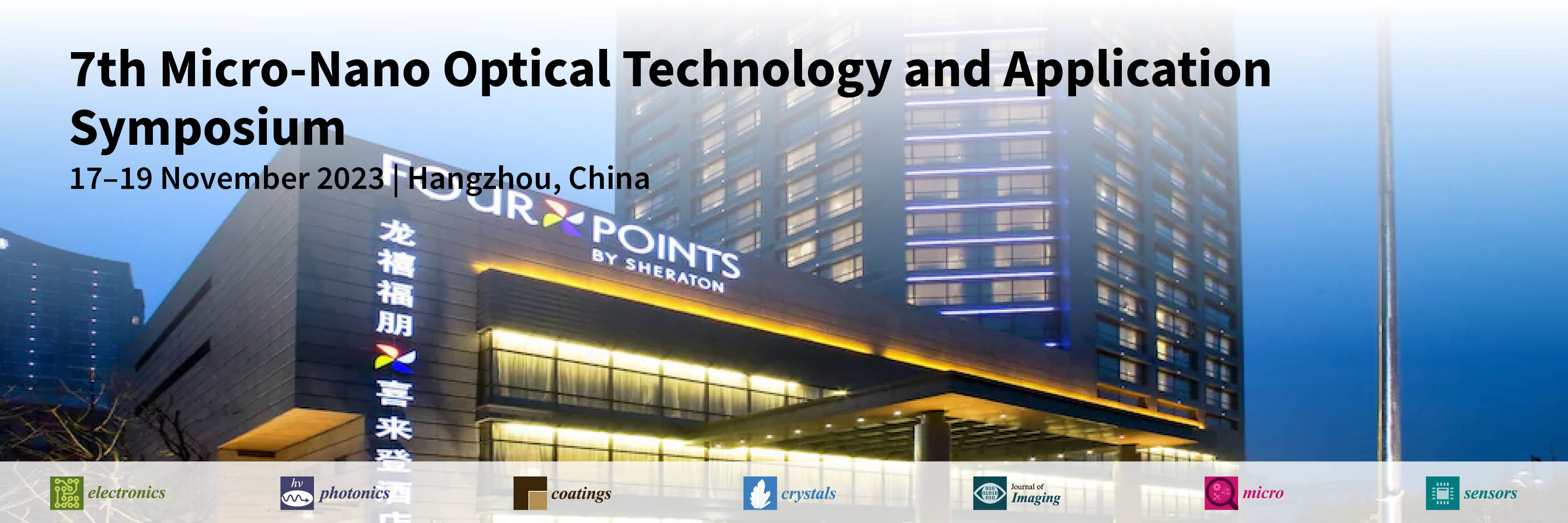
MDPI will be attending the 7th Micro-Nano Optical Technology and Application Symposium in Hangzhou, China, which will take place from 17 to 19 November 2023. Micro-nano optics is one of the most active frontiers in the development of optical disciplines. It combines the cutting-edge results of photonics as well as nanotechnology and is an indispensable key science and technology in the 21st century. This conference aims to build a communication platform for scientific researchers and industrial application teams engaged in related research, as well as to promote the development of micro-nano optics and its application fields.
The following MDPI journals will be represented:
- Electronics;
- Photonics;
- Coatings;
- Crystals;
- J. Imaging;
- Micro;
- Sensors.
If you are attending the conference, please visit our booth. Our delegates look forward to meeting you in person and answering any questions that you may have. For more information about the conference, please visit the following link: https://b2b.csoe.org.cn/meeting/MOTA2023.html.
19 October 2023
Open Access Week 2023 – the Global Drive to Open Continues

MDPI has been a strong proponent of the open access publishing model right from the beginning. As one of the pioneering fully open access publishers, we firmly believe that unrestricted access to research findings forms the foundation for better transparency, efficiency, and quality control across all scientific disciplines.
In December 2022, we reached a significant milestone by surpassing one million articles published. That is one million articles freely available to all, to circulate and build upon!
Offering free and immediate access to scientific papers empowers scientists to examine, validate, replicate, and expand upon existing results. This not only helps prevent redundancy and optimizes how resources are used but also paves the way for innovative new approaches.
The International Open Access Week takes place from 23 to 29 October 2023, providing a unique opportunity to connect the global movement towards open sharing and open science with the progress of policy transformations at the local level.
Our goal, during Open Access Week as well as throughout the year, is to offer resources for educating people about the benefits of open access publishing. The MDPI Blog offers a wealth of information around open access and open science.
Promoting the values of accessibility, transparency, and collaboration
Open access publishing embodies the fundamental values of democratizing knowledge and fostering global accessibility. It aims to break down barriers that have traditionally limited access to scholarly work, ensuring that knowledge is available to all, regardless of their financial or institutional affiliations.
Discounts are part of our commitment to ensuring there are diverse pathways to Open Access publishing for researchers worldwide. MDPI supports scientific communities in several different ways.
One of the key strengths of open access publishing lies in its ability to facilitate interdisciplinary research. By removing paywalls and promoting the sharing of knowledge across disciplines, OA encourages collaboration and innovation. Researchers from diverse fields can access and build upon each other's work, fostering a holistic approach to addressing complex global challenges.
Funders' policies are getting aligned with open science
Governments, institutions, and funding agencies have recognized the transformative potential of open access and have implemented policies to promote it. These policies often mandate that publicly funded research should be made openly accessible. Such initiatives have accelerated the growth of open access repositories and journals, reinforcing the commitment to open access principles. Check our spotlights on OA policies in the US, EU and China.
Open access publishing is continually evolving, with innovative and community-driven models and technologies shaping its future. Initiatives like "Plan S" and "cOAlition S" promote the adoption of OA publishing from the national funders’ perspective by requiring grantees to publish their research openly. A new policy announced by the US administration last year requires that, as of January 2026, all US federally funded research be made freely and immediately available after publication.
Additionally, preprint servers such as MDPI's Preprints.org, which allow researchers to share their findings before formal peer review, have gained popularity, enhancing the speed at which new knowledge is disseminated. The rise of blockchain technology is also being explored to ensure transparency and authenticity in scholarly publishing.
For more than twenty years, open access scholarly publishing has been revolutionizing academia by promoting the values of accessibility, transparency, and collaboration. Its support for interdisciplinary research, evolving policies, and innovative practices all contribute to its growing influence in the global research community. As open access continues to expand, it holds the potential to democratize knowledge, advance science, and drive positive societal change.
MDPI is proud to be a leader in the transition to open access.
19 October 2023
Meet Us at the 26th International Conference on Electrical Machines and Systems (ICEMS 2023), 5–8 November 2023, Zhuhai, China
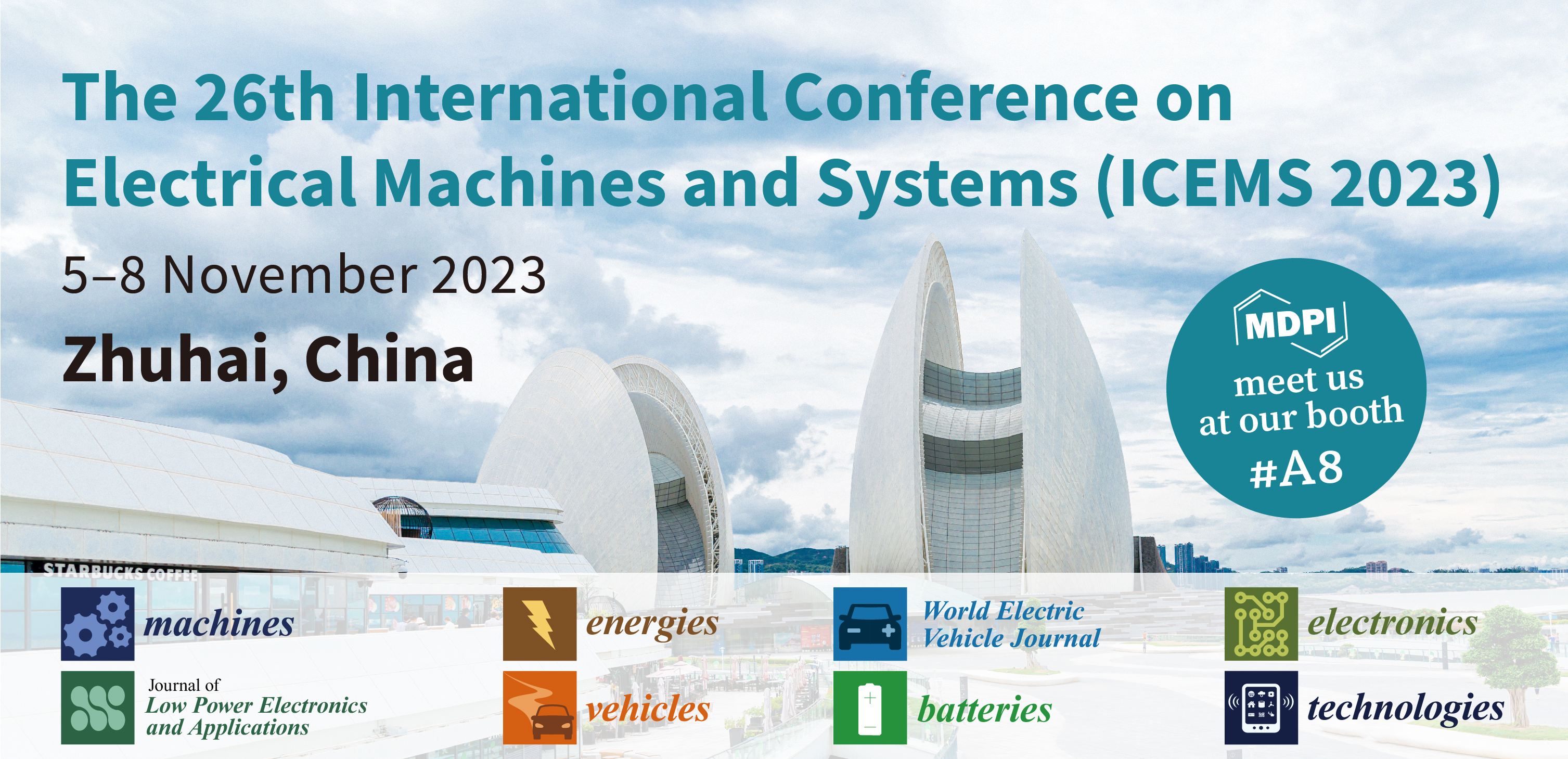
Conference: The 26th International Conference on Electrical Machines and Systems (ICEMS 2023)
Organization: China Electrotechnical Society (CES)
Date: 5–8 November 2023
Place: Zhuhai International Convention & Exhibition Center, 1663 Yinwan Road, Xiangzhou District, Zhuhai, China
Booth: #A8
MDPI journals will be attending ICEMS 2023 as an exhibitor. This meeting will be held in Zhuhai, China, from 5 to 8 November 2023.
ICEMS is an annual international conference on electrical machines and systems held since 1987, and it is jointly organized by the CES (China Electrotechnical Society), KIEE EMECS (KIEE Electrical Machinery and Energy Conversion Systems Society) and IEEJ IAS (IEEJ Industry Applications Society). It provides an extensive and exciting platform to gather the world's leading scientists, researchers and engineers in the field of electrical machines and systems together to showcase state-of-the-art ideas, methods and prototypes. We believe that this conference will benefit us by broadening our horizons, stimulating ideas and enhancing contacts with international colleagues.
The following MDPI journals will be represented:
- Machines;
- Energies;
- World Electric Vehicle Journal;
- Electronics;
- The Journal of Low Power Electronics and Applications;
- Vehicles;
- Batteries;
- Technologies.
If you are attending this conference, please feel free to start a conversation with us. Our delegates look forward to meeting you in person and answering any questions you may have. For more information about the conference, please visit the following website: https://www.icems2023.com/overview.html.
16 October 2023
Electronics | Highly Cited Papers in 2021–2022 in the Section “Artificial Intelligence Circuits and Systems (AICAS)”
The “Artificial Intelligence Circuits and Systems (AICAS)” Section of Electronics (ISSN: 2079-9292) covers topics of interest within hardware-based deep learning AI and algorithmic deep learning AI using machine learning. It is dedicated to the publication of articles not only from the listed areas but also from similar or related areas. We encourage the submission of original contributions derived from theoretical and/or application-oriented research studies.
As they are of open access format, you have free and unlimited access to the full text of all the articles published in our journal. We welcome you to read our most highly cited papers published in 2021 and 2022 below:
1. “FPGA Implementation for CNN-Based Optical Remote Sensing Object Detection”
by Ning Zhang, Xin Wei, He Chen and Wenchao Liu
Electronics 2021, 10(3), 282; https://doi.org/10.3390/electronics10030282
Full text available online: https://www.mdpi.com/2079-9292/10/3/282
2. “Accelerating Neural Network Inference on FPGA-Based Platforms—A Survey”
by Ran Wu, Xinmin Guo, Jian Du and Junbao Li
Electronics 2021, 10(9), 1025; https://doi.org/10.3390/electronics10091025
Full text available online: https://www.mdpi.com/2079-9292/10/9/1025
3. “Recurrent Neural Network for Human Activity Recognition in Embedded Systems Using PPG and Accelerometer Data”
by Michele Alessandrini, Giorgio Biagetti, Paolo Crippa, Laura Falaschetti and Claudio Turchetti
Electronics 2021, 10(14), 1715; https://doi.org/10.3390/electronics10141715
Full text available online: https://www.mdpi.com/2079-9292/10/14/1715
4. “Underwater Target Recognition Based on Improved YOLOv4 Neural Network”
by Lingyu Chen, Meicheng Zheng, Shunqiang Duan, Weilin Luo and Ligang Yao
Electronics 2021, 10(14), 1634; https://doi.org/10.3390/electronics10141634
Full text available online: https://www.mdpi.com/2079-9292/10/14/1634
5. “Design and Implementation of Deep Learning Based Contactless Authentication System Using Hand Gestures”
by Aveen Dayal, Naveen Paluru, Linga Reddy Cenkeramaddi, Soumya J. and Phaneendra K. Yalavarthy
Electronics 2021, 10(2), 182; https://doi.org/10.3390/electronics10020182
Full text available online: https://www.mdpi.com/2079-9292/10/2/182
6. “Bringing Emotion Recognition Out of the Lab into Real Life: Recent Advances in Sensors and Machine Learning”
by Stanisław Saganowski
Electronics 2022, 11(3), 496; https://doi.org/10.3390/electronics11030496
Full text available online: https://www.mdpi.com/2079-9292/11/3/496
7. “An Efficient FPGA-Based Convolutional Neural Network for Classification: Ad-MobileNet”
by Safa Bouguezzi, Hana Ben Fredj, Tarek Belabed, Carlos Valderrama, Hassene Faiedh and Chokri Souani
Electronics 2021, 10(18), 2272; https://doi.org/10.3390/electronics10182272
Full text available online: https://www.mdpi.com/2079-9292/10/18/2272
8. “FPGA Accelerator for Gradient Boosting Decision Trees”
by Adrián Alcolea and Javier Resano
Electronics 2021, 10(3), 314; https://doi.org/10.3390/electronics10030314
Full text available online: https://www.mdpi.com/2079-9292/10/3/314
9. “Relations between Electronics, Artificial Intelligence and Information Society through Information Society Rules”
by Matjaž Gams and Tine Kolenik
Electronics 2021, 10(4), 514; https://doi.org/10.3390/electronics10040514
Full text available online: https://www.mdpi.com/2079-9292/10/4/514
10. “Ultra-Short Window Length and Feature Importance Analysis for Cognitive Load Detection from Wearable Sensors”
by Jaakko Tervonen, Kati Pettersson and Jani Mäntyjärvi
Electronics 2021, 10(5), 613; https://doi.org/10.3390/electronics10050613
Full text available online: https://www.mdpi.com/2079-9292/10/5/613
16 October 2023
Electronics | Recruiting Editorial Board Members for Section “Semiconductor Devices”
The “Semiconductor Devices” Section in Electronics (ISSN: 2079-9292) publishes original and significant contributions to the theory and performance of semiconductor devices and related materials, including devices, fabrication processes, simulation, quantum devices, hybrid devices, flexible electronic devices, novel semiconductors, semiconductor material, and device physics. Reviews on these subjects are published, and Special Issues dealing with specific topics are also published.
Topics of interest include but are not limited to the following:
- Semiconductor device applications;
- Fabrication processing;
- Simulation (theory);
- Quantum devices;
- Hybrid electronic and semiconductor devices;
- Semiconductor devices for energy;
- Flexible devices;
- Semiconductor material and device physics;
- Novel semiconductor;
- 2D materials for devices;
- New technology for semiconductor devices;
- Semiconductor optoelectronic and photonic devices and processing.
If you are an active researcher in the field and are passionate about participating in cutting-edge research publications, please do not hesitate to contact us about joining the board and contributing to this Section.
For more information, please visit: https://www.mdpi.com/journal/electronics/sections/Semiconductors.
If you have any questions, please contact Section Managing Editor Ms. Hebbe Tian ([email protected]).
12 October 2023
Meet Us at the 3rd International Forum & Exhibition on Precision Manufacturing (PreciMan 2023), 9–11 November 2023, Kunshan, China

MDPI will be attending the 3rd International Forum & Exhibition on Precision Manufacturing (PreciMan 2023), which will be held from 9 to 11 November 2023 in Kunshan, China.
It is our great pleasure to invite you to participate in the 3rd International Forum & Exhibition on Precision Manufacturing (PreciMan2023), which will be held in the Kunshan Huaqiao International Expo Center from 9 to 11 November 2023. Kunshan is located right at the heart of the Yangzi River Delta Region (which includes the Shanghai Metropolitan Area, Jiangsu, and Zhejiang Provinces), which is the powerhouse for the modern Chinese economy. Kunshan has been ranked number one in the Chinese top 100 counties league over the last eighteen years in economy development, where there are thousands of engineering companies increasingly embracing precision engineering manufacturing and business.
The forum and exhibition will be a unique annual event aiming to bring engineering practitioners, researchers, industrialists, and academics together to discuss and interact with each other in the context of precision engineering manufacture and business.
The following MDPI journals will be represented:
- Machines;
- JMMP;
- System;
- Electronics.
If you plan to attend this conference, please feel free to start a conversation with us. Our delegates look forward to meeting you in person and answering any questions that you may have. For more information about the conference and our booth, please visit the following link: http://www.preciman.com/.
8 October 2023
Electronics | Highly Cited Papers in 2021–2022 in the Section “Optoelectronics”
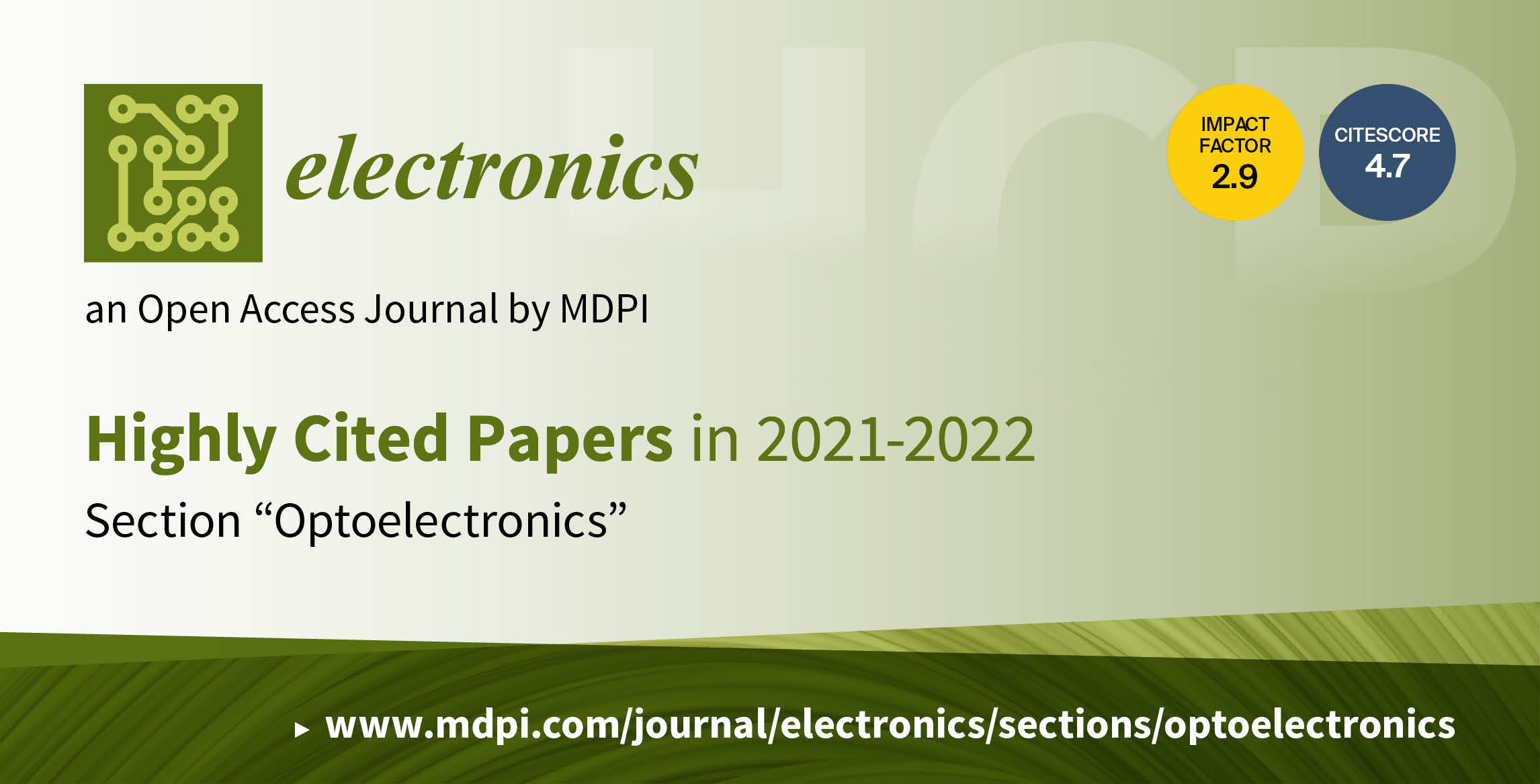
The Section “Optoelectronics” of Electronics (ISSN: 2079-9292) addresses the following topics and considers mostly experimental work or theoretical/simulation work, either directly linked to or supporting the following fields:
- Nanoelectronic and photonic devices and their fabrication;
- Microsystems, microdevices (e.g., sensors and nanoenergy devices) and their fabrication.
You have free and unlimited access to the full texts of all the open access articles published in our journal. We welcome you to read our most highly cited papers published in 2021 and 2022 below:
1. “A Review on Solution-Processed Organic Phototransistors and Their Recent Developments”
by Aybuke Tavasli, Betul Gurunlu, Dilara Gunturkun, Recep Isci and Sheida Faraji
Electronics 2022, 11(3), 316; https://doi.org/10.3390/electronics11030316
Available online: https://www.mdpi.com/2079-9292/11/3/316
2. “Effects of Varying the Fin Width, Fin Height, Gate Dielectric Material, and Gate Length on the DC and RF Performance of a 14-nm SOI FinFET Structure”
by Nour El I. Boukortt, Trupti Ranjan Lenka, Salvatore Patanè and Giovanni Crupi
Electronics 2022, 11(1), 91; https://doi.org/10.3390/electronics11010091
Available online: https://www.mdpi.com/2079-9292/11/1/91
3. “Human Detection in Aerial Thermal Images Using Faster R-CNN and SSD Algorithms”
by K. R. Akshatha, A. Kotegar Karunakar, Satish B. Shenoy, Abhilash K. Pai, Nikhil Hunjanal Nagaraj and Sambhav Singh Rohatgi
Electronics 2022, 11(7), 1151; https://doi.org/10.3390/electronics11071151
Available online: https://www.mdpi.com/2079-9292/11/7/1151
4. “Toward a Scalable Fabrication of Perovskite Solar Cells under Fully Ambient Air Atmosphere: From Spin-Coating to Inkjet-Printing of Perovskite Absorbent Layer”
by Aggeliki Karavioti, Dimitris A. Chalkias, Giannis Katsagounos, Argyroula Mourtzikou, Alexandros N. Kalarakis and Elias Stathatos
Electronics 2021, 10(16), 1904; https://doi.org/10.3390/electronics10161904
Available online: https://www.mdpi.com/2079-9292/10/16/1904
5. “Fabrication of Large-Area Short-Wave Infrared Array Photodetectors under High Operating Temperature by High Quality PtS2 Continuous Films”
by Yichen Zhang, Qingliang Feng, Rui Hao and Mingjin Zhang
Electronics 2022, 11(6), 838; https://doi.org/10.3390/electronics11060838
Available online: https://www.mdpi.com/2079-9292/11/6/838
6. “Perylene Based Solution Processed Single Layer WOLED with Adjustable CCT and CRI”
by Volkan Bozkus, Erkan Aksoy and Canan Varlikli
Electronics 2021, 10(6), 725; https://doi.org/10.3390/electronics10060725
Available online: https://www.mdpi.com/2079-9292/10/6/725
7. “Solar Energy Conversion and Storage Using a Photocatalytic Fuel Cell Combined with a Supercapacitor”
by Tatiana Santos Andrade, Vassilios Dracopoulos and Panagiotis Lianos
Electronics 2021, 10(3), 273; https://doi.org/10.3390/electronics10030273
Available online: https://www.mdpi.com/2079-9292/10/3/273
8. “Defect Detection for Metal Base of TO-Can Packaged Laser Diode Based on Improved YOLO Algorithm”
by Jiayi Liu, Xingfei Zhu, Xingyu Zhou, Shanhua Qian and Jinghu Yu
Electronics 2022, 11(10), 1561; https://doi.org/10.3390/electronics11101561
Available online: https://www.mdpi.com/2079-9292/11/10/1561
9. “Spiking VGG7: Deep Convolutional Spiking Neural Network with Direct Training for Object Recognition”
by Shuiying Xiang, Shuqing Jiang, Xiaosong Liu, Tao Zhang and Licun Yu
Electronics 2022, 11(13), 2097; https://doi.org/10.3390/electronics11132097
Available online: https://www.mdpi.com/2079-9292/11/13/2097
10. “Integrated Fiber-FSO WDM Access System with Fiber Fault Protection”
by Chien-Hung Yeh, Wen-Piao Lin, Syu-Yang Jiang, Shang-En Hsieh, Ching-Hsuan Hsu and Chi-Wai Chow
Electronics 2022, 11(13), 2101; https://doi.org/10.3390/electronics11132101
Available online: https://www.mdpi.com/2079-9292/11/13/2101
11. “Global Maximum Power Point Tracking of Photovoltaic Module Arrays Based on Improved Cuckoo Search Algorithm”
by Kuei-Hsiang Chao, Long-Yi Chang and Kuan-Wen Wang
Electronics 2022, 11(8), 1247; https://doi.org/10.3390/electronics11081247
Available online: https://www.mdpi.com/2079-9292/11/8/1247
12. “Routing and Spectrum Allocation in Spectrum-Sliced Elastic Optical Path Networks: A Primal-Dual Framework”
by Yang Wang, Chaoyang Li, Qian Hu, Jabree Flor and Maryam Jalalitabar
Electronics 2021, 10(22), 2809; https://doi.org/10.3390/electronics10222809
Available online: https://www.mdpi.com/2079-9292/10/22/2809
13. “Hole Injection Role of p-Type Conjugated Polymer Nanolayers in Phosphorescent Organic Light-Emitting Devices”
by Sooyong Lee, Hwajeong Kim and Youngkyoo Kim
Electronics 2021, 10(18), 2283; https://doi.org/10.3390/electronics10182283
Available online: https://www.mdpi.com/2079-9292/10/18/2283
2 October 2023
MDPI Insights: The CEO’s Letter #4 - MDPI Presence in China

Welcome to the MDPI Insights: The CEO's Letter.
In these monthly letters, I will showcase two key aspects of our work at MDPI: our commitment to empowering researchers and our determination to facilitating open scientific exchange.
Opening Thoughts

Open Access in China
It is Saturday, 23 September, and I have just returned from an unforgettable 12-day trip to China, visiting our main offices in Beijing and Wuhan. In the wake of a packed and very enjoyable agenda of internal and external meetings, I would like to use this edition of the CEO Letter to showcase how MDPI supports the scholarly community in China.
Coincidentally, Jack McKenna, Communications Associate from MDPI’s corporate content team, has just released a blog article discussing China’s open access (OA) policy. It is a timely read, providing a concise overview of the development of the OA movement in China and reflecting on its future. I shall draw some content from Jack’s piece and use this edition of the CEO Letter to highlight the various ways in which MDPI is involved in this market. And it would be remiss of me not to include some pictures and highlights from my travels!
Open Access Policy in China
As per Jack’s post, in 2020, China became the world’s leading producer of research articles. Today, China is experiencing a “substantial growth rate in OA [Open Access] publication”. This growth is supported by the State’s commitment to research & development and its policy “requiring the promotion of open science”.
Over the past two decades, there have been gradual developments in China’s OA framework, with repositories and platforms being developed in a consistent manner. Currently, key institutions across China – including the National Science Library, the National Science and Technology Library, and the Natural Science Foundation of China – support OA. The State aims to establish consistent policies across government agencies – a framework for a more encompassing embrace of OA across institutions.
In China, the number of subscription-only articles decreased by nearly 30% over the 10-year period of 2011–2021, while gold OA increased by 22%. Between 2017 and 2020 alone, China published 800,921 academic papers in an OA format.
In 2023, as the leading publisher of academic research, China is pursuing “self-reliance”. Therefore, the State will be establishing consistent policies across government agencies, including those related to OA. Additionally, it will want to ensure that Chinese people can access the research that is supported by Chinese funding and produced by Chinese academics. For this reason, “Open Access is a matter of priority in China”.
MDPI Offices in China
While the history of MDPI begins in Basel, Switzerland, the story of MDPI’s founder is very much rooted in China. Dr. Shu-kun Lin, Founder and President of MDPI, graduated with a BSc from Wuhan University in 1982. He also studied physical chemistry at the Lanzhou Institute of Chemical Physics, Chinese Academy of Sciences (1982–1986; MSc in 1985), and at the University of Louisville, USA (1987–1989). Dr. Lin completed his doctorate in organic chemistry at the Swiss Federal Institute of Technology (ETH-Zürich) in 1992.

Stefan Tochev (CEO, MDPI) at MDPI’s Wuhan office.
In 2002, MDPI’s Basel headquarters moved to Matthäusstrasse 11, 4052 Basel, and Dr. Lin opened an editorial office in Qingdao, China, which launched the journal Marine Drugs in the following year. Below is a list of MDPI’s current offices in China and their respective dates of inauguration:
- 2008: Beijing (Tongzhou, Haidian)
- 2013: Wuhan (Hankou, Guanggu)
- 2019: Tianjin
- 2021: Dalian
- 2021: Nanjing
Our Strength is in Our People
With over 6,000 MDPI staff, across 20 offices in 11 countries, MDPI is able to offer authors responsive and efficient round-the-clock support, enabling a rapid publication process.
In my experience, stakeholders are genuinely surprised when they realize the extent of our global operations. My response is to reiterate that our people are our strength. This is why we have fast and efficient processes and top-notch responsiveness. Our global presence ensures that your manuscript is constantly attended to, rather than sitting on someone’s desk. We prioritize our authors’ needs and act quickly to move things through the various stages of publication. MDPI is built on speed, convenience, and competence, which I believe are core pillars for success in any industry. We continually strive to improve our systems and processes on the basis of these core strengths. We literally have over 6,000 staff worldwide dedicated to serving your needs. It’s not magic: it’s people; it’s real.
Impactful Research

MDPI Awards
To support the academic community, and especially young researchers, and also to enhance communication among scientists, MDPI journals offer various awards in specific fields. We serve the scientific community by funding research to facilitate the development of sustainable global solutions through our annual World Sustainability Award and Emerging Sustainability Leader Award.
In 2022, MDPI made awards totalling over US$1 million in recognition and support of researchers worldwide.
Across our journal catalogue, we have granted over 2,000 awards to recognize and support researchers from all disciplines. Since 2016, these awards have served as a source of recognition, acknowledging the impact of research by heightening the influence of talented individuals. The award types mainly include the Young Investigator Award, the Best PhD Thesis Award, the Best Paper Award, and the Outstanding Reviewer Award.
To learn more about MDPI Awards and to find out which are currently available, please click here.
MDPI Awards to Scholars from China
Since 2021, there have been 23 Best Paper Awards granted to authors affiliated with Chinese institutions, identifying their papers as having high-quality scientific impact. A total of 45 Chinese scholars have received awards such as the Young Investigator Award, the Best PhD Thesis Award, the Outstanding Reviewer Award, and the Tu Youyou Award, among others. Prizes for these awards include MDPI grants for paid publications, totalling over CHF 70,000 for scholars affiliated with Chinese institutions.
MDPI’s Tu Youyou Award

Prof. Tu Youyou (left), Dr. Shu-Kun Lin (President, MDPI).
In 2015, Professor Tu Youyou was awarded the Nobel Prize in Physiology or Medicine “for her discoveries concerning a novel therapy against Malaria.” In order to commemorate Professor Tu’s contributions to human health and to promote the passion and spirit conveyed by her experiences, MDPI in 2016 established the ‘Tu Youyou Award’, which runs biennially to recognize outstanding scholars dedicated to the research of natural products and medicinal chemistry.
The 2022 Tu Youyou Award was granted to Prof. Dr. Xiaoguang Lei of Peking University. Click here to access the interview with the winner.
2015 Nobel Prize for Medicine Awarded to Professor Youyou Tu
Professor Tu’s work was celebrated in a Special Issue from Molecules on the occasion of her 80th birthday. The Special Issue: 'Artemisinin (Qinghaosu): Commemorative Issue in Honor of Professor Youyou Tu on the Occasion of her 80th Anniversary” was created five years before she won the Nobel Prize, highlighting the visibility MDPI provides researchers and their work.
Highly Cited Articles by Chinese Scholars Published in MDPI
Click here to access the most cited MDPI papers published by scholars affiliated with Chinese institutions. This list presents the most influential research from the more than 287,000 MDPI papers published by Chinese scholars. With over 9 million total citations, I encourage you to maximize your visibility and impact by publishing with MDPI, the number one most cited open access publisher.
Read more:
- Tu Youyou Award
- World Sustainability Awards
- Available Awards
Inside MDPI
 Stefan Tochev (CEO, MDPI) with the Beijing Marketing team.
Stefan Tochev (CEO, MDPI) with the Beijing Marketing team.
Marketing Department in China
During my visit to our offices in Beijing and Wuhan, I had the opportunity to meet with, and to present to, our local marketing teams. These teams are responsible for various journal-related and corporate promotional activities, including newsletters, conferences, seminars, author training, journal awards, content creation, digital marketing, and social media.
I was pleased by the ambition and curiosity of our marketing colleagues. They showed a strong desire to collaborate and acquire knowledge and tactics to effectively market and promote MDPI-journal-related activities. I presented some of the principles and objectives that we apply in the Corporate Marketing and Communications department, and used the opportunity to strengthen our collaborative communications across offices.
 Stefan Tochev (CEO, MDPI) with the Wuhan Marketing team.
Stefan Tochev (CEO, MDPI) with the Wuhan Marketing team.
Coming Together for Science

Collaborations, Scholarships and Meetings
MDPI maintains partnerships with nearly 190 learned societies and over 800 institutions and consortia, helping to facilitate the transition to OA publishing. Our commitment to working with institutions is evident in China, where we have successfully established over 35 Institutional Open Access Programs (IOAP) with esteemed institutions such as the Tsinghua University, Huazhong University of Science and Technology, and Shanghai Jiao Tong University.
Our institutional partnerships, waiver programs, and article processing cost discounts create diverse pathways to OA publishing for researchers worldwide.
Scholarships in China
Since 2021, several MDPI journals (Sensors, Photonics, Coatings, Materials, Energies, and Journal of Fungi) have funded full scholarships for four Master’s and five Ph.D. projects in China. These scholarships align with Tianjin University, Wuhan University of Technology, Central South University, the Chinese Academy of Sciences, and the China University of Petroleum (Beijing).
Meeting with the Society of Chinese University Journals (CUJS)

Prof. Tieming Zhang (President of CUJS, centre) and MDPI colleagues at CUJS office.
I am pleased to have participated in some highly productive meetings during my visit to China, including one with the Society of Chinese University Journals (CUJS). The meeting involved Prof. Tieming Zhang (President of CUJS), Assoc. Prof. Xin Zhang (Vice President and Secretary General), and Dr. Fei Gao (Executive Member of CUJS). Alongside my colleagues Dr. Guoshi Liu, Dr. Giulia Stefenelli, and Anita Sun, I represented MDPI and held an open discussion to address any questions regarding OA and MDPI.
We discussed several methods for collaboration, including a workshop on the future of peer review, MDPI sponsoring a funding grant for early-career researchers, and transitioning journals from diamond to gold OA. I am thankful for the opportunity to have met our colleagues at CUJS in person and feel very confident about our future collaborations in support of OA publishing in China.
MDPI hosts free academic seminars, author training sessions, and academic conferences as part of its commitment to enrich and support the scholarly community. CUJS often stages academic events (e.g., conferences, editor training, and editor competitions), and I believe there are great opportunities for CUJS and MDPI to collaborate accordingly.
Meeting with National Science Library, Chinese Academy of Sciences (NSLC)

Stefan Tochev (CEO, MDPI), Dr. Giulia Stefenelli (Chair of Scientific Officers, MDPI), Anita Sun (PR Manager, MDPI) and Dr. Guoshi Liu (Managing Director, MDPI) at the National Science Library, Chinese Academy of Sciences.
We also visited the NSLC Director, Xiwen Liu, and colleagues Ying Jin, Zhesi Shen, and Sichao Tong. Following our introductions, we gave a presentation on the history and editorial process at MDPI, discussing specific details related to MDPI’s business and data. We highlighted the status of our IOAP collaborations in China and the makeup of our author base, specifically in China, and drew attention to the fact that MDPI has published research by authors from every country in the world. We then discussed the design indicators, calculation methods and implementation purposes of the ‘Early Warning Journal List’ and how we can have open communication to provide any data regarding MDPI journals. I am pleased to report that we reached a consensus on future communications, and am grateful to NSLC for hosting us in their offices.
In-person meetings with stakeholders provide an invaluable opportunity to communicate what MDPI is about and the various ways in which we serve the scholarly community. While digital marketing and online communication are essential, they are no replacement for the understanding and trust that come about through in-person interactions.
The Numbers
As at September 2023, China holds the largest position in MDPI’s global market, ranking as the largest contributor to the total number of papers published by MDPI.
At this point in time, there were more than 847,000 China mainland scholars who have published with MDPI, 51 of whom are Section-Editors-in-Chief (SEiC) of MDPI journals, with seven serving as Editors-in-Chief (EiCs) for journals such as Air, Big Data and Cognitive Computing, Blockchains, Future, Nanoenergy Advances, and Targets.
Our growth and presence in China are a true testament to the service we provide to the scholarly community, and to the relationships we foster through collaborative activities. We look forward to continuing to support the growth of the scholarly community in China, providing a valuable and trusted experience with MDPI.
Closing Thoughts
Final Reflections on our MDPI Offices in Beijing and Wuhan

Stefan Tochev (CEO, MDPI), Dr. Constanze Schelhorn (Indexing Manager, MDPI), Jiale Shang (Admin, Tongzhou, MDPI) at Beijing Capital International Airport, Beijing.
I spent approximately two weeks visiting some of our offices in China, and the first word that comes to mind when describing my experience is ‘hospitality.’ My colleagues and I were met with enthusiasm and delight at the airport by the Tongzhou Admin team (thank you, Jiale Shang, and thank you, Eric Wang, for keeping us organized on this trip!) and were taken care of with great attention. From hotels to transportation, dinners, and meetings, our stay was catered for perfectly.
Perhaps this is where MDPI’s focus on customers and service originates. At our core, we are a service company that provides a publishing platform for its authors. It’s therefore no surprise that authors consistently rate their experience with MDPI very highly.
95% of submitting authors rate their overall experience with the MDPI publication process as Excellent or Good (Springer Nature report 90%).
91% of submitting authors rate their overall experience with the MDPI peer review process as Excellent or Good.
Speed/Efficiency and Editorial Relationship are two key reasons underlying this high satisfaction score. ‘Editorial Relationship’ can be further explored, but in the past month, the most commonly noted aspects were the professionalism, kindness, availability, communicativeness, and personalized assistance provided by our editorial staff throughout the process. These attributes are at the core of our work across all our offices and continents.
Hospitality and Service
Just as our Chinese colleagues strove to keep us engaged by showing us the city sights (thank you, Thea Pan, and Jason Wu from the Wuhan Marketing team!) and sharing a variety of wonderful meals, our editorial staff are committed to serving our authors throughout their publishing journey. Our aim is to place the author at the centre of everything we do, eager to welcome our ‘guests’ and provide them with a pleasant publishing experience.
I asked my colleague Francis Wu (Senior Publisher, Wuhan office) where this hospitality originates. He responded that it is part of Chinese culture. I reflected long and deep on this answer. China is a vast country, and when visitors arrive, hosts want to ensure they feel welcomed and taken care of in order to maximize their time and visit. I can’t think of a better analogy for how I would want our authors to feel when they visit MDPI for their publishing needs. A company culture that prioritizes service, something that goes beyond products and productivity, and focuses on the overall experience. Over 6,000 people, across all MDPI offices, are ready, willing and able to go the extra mile for their colleagues and their customers. This is something I am truly proud of.
Chief Executive Officer
MDPI AG
26 September 2023
Meet Us at the 7th International Conference on Advanced Electromaterials (ICAE 2023), 31 October–3 November 2023, Jeju, South Korea
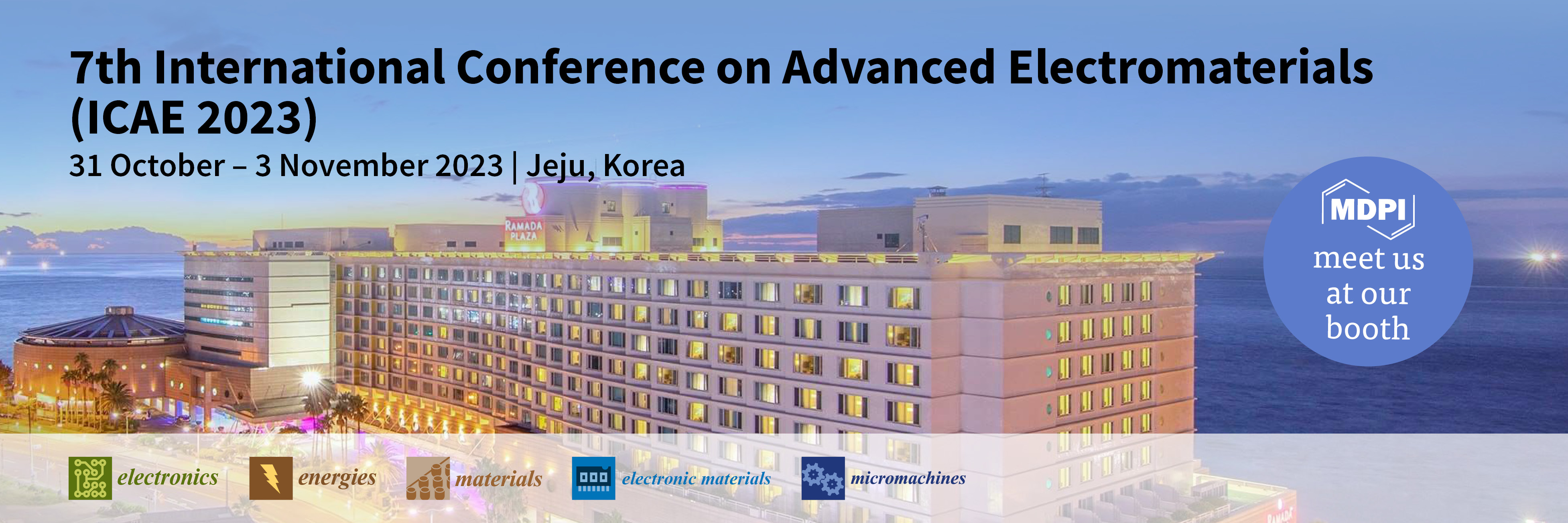
MDPI will be attending the 7th International Conference on Advanced Electromaterials (ICAE 2023) in Jeju, South Korea, which will take place from 31 October to 3 November 2023. ICAE 2023 will explore the latest progress in research on electromaterials serving as the basis for research and development in this discipline for many decades to come, such as ferroelectric and piezoelectric materials, green energy materials used for solar cells and fuel cells, functional materials for thin films devices, energy storage materials, or any new materials for display applications. The program will be a rewarding international platform for all participants and will contribute to the evolution of global science and technology.
The following MDPI journals will be represented:
- Electronics;
- Energies;
- Materials;
- Electronic Materials;
- Micromachines.
If you are attending the conference, please visit our booth. Our delegates look forward to meeting you in person and answering any questions that you may have. For more information about the conference, please visit the following link: https://www.icae.kr/.
22 September 2023
Electronics | Selected Special Issue Reprints in 2021–2022
We cordially invite you to explore the annual selection of Special Issue Reprints from Electronics (ISSN: 2079-9292). These reprints feature a compilation of impactful and influential articles published in our special issues throughout the year.
|
1. “Antenna Designs for 5G/IoT and Space Applications” Guest Editors: Faisel Tubbal, Ladislau Matekovits and Raad Raad Published: October 2022; Pages: 268 ISBN 978-3-0365-5151-7 (hardback); ISBN 978-3-0365-5152-4 (PDF) Available online: https://www.mdpi.com/books/book/6208-antenna-designs-for-5g-iot-and-space-applications |
|
2. “Physical Diagnosis and Rehabilitation Technologies” Guest Editors: Tao Liu and João Ferreira Published: October 2022; Pages: 154 ISBN 978-3-0365-5672-7 (hardback); ISBN 978-3-0365-5671-0 (PDF) Available online: https://www.mdpi.com/books/book/6265-physical-diagnosis-and-rehabilitation-technologies |
|
3. “High-Frequency Vacuum Electron Devices” Guest Editors: Jinjun Feng, Yubin Gong, Chaohai Du et al. Published: October 2022; Pages: 176 ISBN 978-3-0365-5448-8 (hardback); ISBN 978-3-0365-5447-1 (PDF) Available online: https://www.mdpi.com/books/book/6257-high-frequency-vacuum-electron-devices |
|
4. “Feasible, Robust and Reliable Automation and Control for Autonomous Systems” Guest Editors: Umar Zakir Abdul Hamid, Argyrios Zolotas and Chuan Hu Published: September 2022; Pages: 232 ISBN 978-3-0365-5075-6 (hardback); ISBN 978-3-0365-5076-3 (PDF) Available online: https://www.mdpi.com/books/book/6068-feasible-robust-and-reliable-automation-and-control-for-autonomous-systems |
|
5. “Recent Advances in Embedded Computing, Intelligence and Applications” Guest Editors: Jorge Portilla, Andres Otero and Gabriel Mujica Published: May 2022; Pages: 188 ISBN 978-3-0365-4246-1 (hardback); ISBN 978-3-0365-4245-4 (PDF) Available online: https://www.mdpi.com/books/book/5488-recent-advances-in-embedded-computing-intelligence-and-applications |
|
6. “Semiconductor Memory Devices for Hardware-Driven Neuromorphic Systems” Guest Editor: Seongjae Cho Published: September 2021; Pages: 96 ISBN 978-3-0365-1734-6 (hardback); ISBN 978-3-0365-1733-9 (PDF) Available online: https://www.mdpi.com/books/book/4351-semiconductor-memory-devices-for-hardware-driven-neuromorphic-systems |
|
7. “Terahertz Technology and Its Applications” Guest Editor: Victor Pacheco Peña Published: August 2021; Pages: 162 ISBN 978-3-0365-0996-9 (hardback); ISBN 978-3-0365-0997-6 (PDF) Available online: https://www.mdpi.com/books/book/4100-terahertz-technology-and-its-applications |
|
8. “Grid-Connected Renewable Energy Sources” Guest Editor: J. C. Hernandez Published: June 2021; Pages: 234 ISBN 978-3-0365-0998-3 (hardback); ISBN 978-3-0365-0999-0 (PDF) Available online: https://www.mdpi.com/books/book/3877-grid-connected-renewable-energy-sources |
|
9. “Challenges and New Trends in Power Electronic Devices Reliability” Guest Editors: Elio Chiodo, Pasquale De Falco and Luigi Pio Di Noia Published: May 2021; Pages: 228 ISBN 978-3-0365-1177-1 (hardback); ISBN 978-3-0365-1176-4 (PDF) Available online: https://www.mdpi.com/books/book/3724-challenges-and-new-trends-in-power-electronic-devices-reliability |
|
10. “AI-Based Transportation Planning and Operation” Guest Editor: Keemin Sohn Published: March 2021; Pages: 124 ISBN 978-3-0365-0364-6 (hardback); ISBN 978-3-0365-0365-3 (PDF) Available online: https://www.mdpi.com/books/book/3543-ai-based-transportation-planning-and-operation |
20 September 2023
Electronics | 2021–2022 Selected Hot Review Papers
We welcome you to read the Electronics (ISSN: 2079-9292) annual selection of hot review papers. We have curated a collection of popular review articles published in 2021 and 2022. These articles have been carefully selected to provide an overview of the cutting-edge developments and trends in various subfields of electronics. Each review article offers a comprehensive analysis of the subject matter, highlighting significant breakthroughs, challenges, and future prospects. We invite you to delve into this collection of popular review articles and discover the exciting developments that have shaped the electronics landscape in recent years.
1. “CNN Variants for Computer Vision: History, Architecture, Application, Challenges and Future Scope”
by Dulari Bhatt, Chirag Patel, Hardik Talsania, Jigar Patel, Rasmika Vaghela, Sharnil Pandya, Kirit Modi and Hemant Ghayvat
Electronics 2021, 10(20), 2470; https://doi.org/10.3390/electronics10202470
Cited by 131 | Viewed by 11190
2. “Evaluating the Quality of Machine Learning Explanations: A Survey on Methods and Metrics”
by Jianlong Zhou, Amir H. Gandomi, Fang Chen and Andreas Holzinger
Electronics 2021, 10(5), 593; https://doi.org/10.3390/electronics10050593
Cited by 127 | Viewed by 16121
3. “Artificial Neural Networks Based Optimization Techniques: A Review”
by Maher G. M. Abdolrasol, S. M. Suhail Hussain, Taha Selim Ustun, Mahidur R. Sarker, Mahammad A. Hannan, Ramizi Mohamed, Jamal Abd Ali, Saad Mekhilef and Abdalrhman Milad
Electronics 2021, 10(21), 2689; https://doi.org/10.3390/electronics10212689
Cited by 92 | Viewed by 10998
4. “Artificial Intelligence-Based Decision-Making Algorithms, Internet of Things Sensing Networks, and Deep Learning-Assisted Smart Process Management in Cyber-Physical Production Systems”
by Mihai Andronie, George Lăzăroiu, Mariana Iatagan, Cristian Uță, Roxana Ștefănescu and Mădălina Cocoșatu
Electronics 2021, 10(20), 2497; https://doi.org/10.3390/electronics10202497
Cited by 85 | Viewed by 6176
5. “A Survey of Recommendation Systems: Recommendation Models, Techniques, and Application Fields”
by Hyeyoung Ko, Suyeon Lee, Yoonseo Park and Anna Choi
Electronics 2022, 11(1), 141; https://doi.org/10.3390/electronics11010141
Cited by 78 | Viewed by 17562
6. “Machine Learning in Wireless Sensor Networks for Smart Cities: A Survey”
by Himanshu Sharma, Ahteshamul Haque and Frede Blaabjerg
Electronics 2021, 10(9), 1012; https://doi.org/10.3390/electronics10091012
Cited by 62 | Viewed by 9941
7. “Sentiment Analysis for Fake News Detection”
by Miguel A. Alonso, David Vilares, Carlos Gómez-Rodríguez and Jesús Vilares
Electronics 2021, 10(11), 1348; https://doi.org/10.3390/electronics10111348
Cited by 47 | Viewed by 12253
8. “Blockchain for IoT Applications: Taxonomy, Platforms, Recent Advances, Challenges and Future Research Directions”
by Abdelzahir Abdelmaboud, Abdelmuttlib Ibrahim Abdalla Ahmed, Mohammed Abaker, Taiseer Abdalla Elfadil Eisa, Hashim Albasheer, Sara Abdelwahab Ghorashi and Faten Khalid Karim
Electronics 2022, 11(4), 630; https://doi.org/10.3390/electronics11040630
Cited by 43 | Viewed by 10826
9. “Detecting Cybersecurity Attacks in Internet of Things Using Artificial Intelligence Methods: A Systematic Literature Review”
by Mujaheed Abdullahi, Yahia Baashar, Hitham Alhussian, Ayed Alwadain, Norshakirah Aziz, Luiz Fernando Capretz and Said Jadid Abdulkadir
Electronics 2022, 11(2), 198; https://doi.org/10.3390/electronics11020198
Cited by 41 | Viewed by 14981
10. “Voltage Stability of Power Systems with Renewable-Energy Inverter-Based Generators: A Review”
by Nasser Hosseinzadeh, Asma Aziz, Apel Mahmud, Ameen Gargoom and Mahbub Rabbani
Electronics 2021, 10(2), 115; https://doi.org/10.3390/electronics10020115
Cited by 39 | Viewed by 7833
11. “Recent Progress on 3D NAND Flash Technologies”
by Akira Goda
Electronics 2021, 10(24), 3156; https://doi.org/10.3390/electronics10243156
Cited by 33 | Viewed by 12349
12. “Stock Market Prediction Using Machine Learning Techniques: A Decade Survey on Methodologies, Recent Developments, and Future Directions”
by Nusrat Rouf, Majid Bashir Malik, Tasleem Arif, Sparsh Sharma, Saurabh Singh, Satyabrata Aich and Hee-Cheol Kim
Electronics 2021, 10(21), 2717; https://doi.org/10.3390/electronics10212717
Cited by 31 | Viewed by 18322
13. “Android Mobile Malware Detection Using Machine Learning: A Systematic Review”
by Janaka Senanayake, Harsha Kalutarage and Mhd Omar Al-Kadri
Electronics 2021, 10(13), 1606; https://doi.org/10.3390/electronics10131606
Cited by 28 | Viewed by 10822
14. “A Review on 5G Sub-6 GHz Base Station Antenna Design Challenges”
by Madiha Farasat, Dushmantha N. Thalakotuna, Zhonghao Hu and Yang Yang
Electronics 2021, 10(16), 2000; https://doi.org/10.3390/electronics10162000
Cited by 22 | Viewed by 9261
15. “Human-Computer Interaction in Customer Service: The Experience with AI Chatbots—A Systematic Literature Review”
by Luminița Nicolescu and Monica Teodora Tudorache
Electronics 2022, 11(10), 1579; https://doi.org/10.3390/electronics11101579
Cited by 21 | Viewed by 12064
19 September 2023
Meet the Editors | Interview with Dr. Piero Cosseddu—Section Editor-in-Chief of Section “Flexible Electronics” in Electronics

In this captivating series, we had the privilege of interviewing the eminent Dr. Piero Cosseddu, Section Editor-in-Chief of the “Flexible Electronics” Section of Electronics (ISSN: 2079-9292). Renowned for his groundbreaking contributions in the design, fabrication and characterization of organic semiconductor-based devices on flexible plastic substrates—such as organic field effect transistors, organic electrochemical transistors, nonvolatile memory elements and the development of innovative applications, from wearable electronics and artificial skin to sensing applications—Dr. Piero Cosseddu shares his invaluable insights and takes us on an exclusive journey into the inner workings of the journal. Through these interviews, our aim is to offer a unique perspective on the publishing process from the Editors themselves.
The following is a short Q&A with Dr. Piero Cosseddu, who shared his vision for the journal with us, as well as his views on the research area and open access publishing.
1. Can you share with us some information about your academic background?
I am an Associate Professor at the Department of Electrical and Electronics Engineering of the University of Cagliari, Italy, where I currently teach analog electronics and wearable and flexible electronics. I hold a Ph.D. in electronic and computer science engineering, obtained in 2007, before continuing as a Postdoctoral Fellow at the DIEE from May 2007 to March 2010. I am also the author of more than 100 papers and book chapters of peer-reviewed international journals and conference proceedings.
2. What are your current interests?
My work primarily revolves around the field of organic electronics with particular attention toward the design, fabrication and characterization of organic semiconductor-based devices on flexible plastic substrates as organic field effect transistors (OFETs), organic electrochemical transistors (OECTs) and nonvolatile memory elements. I have been particularly involved in the development of innovative sensing systems for different applications, including biochemical sensors, wearable electronics and artificial skin.
3. What made you choose to work with us knowing that we are an open access digital publisher?
In my view, I strongly believe that open access publishing has become increasingly popular in recent years as it allows for a wider distribution of academic research and promotes collaboration and innovation within the scientific community. Additionally, open access publishing aligns with the principles of accessibility and transparency, which are highly valued by many individuals and organizations.
4. Which research topics do you think will be of particular interest to the research community in the coming years?
I believe that in the coming years, the emergence of Industry 5.0 may affect the development and application of flexible electronics. Also, the creation of databases based on responses and opinions from customers and users could become a hot topic in artificial intelligence, which will involve flexible electronics. On the other hand, flexible electronics could play a bigger role in improving the quantity and quality of agricultural products through the monitoring of conditions where the products are produced. The field of flexible electronics is rapidly changing, so other possible hot topics could emerge in the future. The key is to identify targets and release more specific Special Issues, as well as to try to reach people with those interests and encourage them to submit to the journal through different means, such as advertising or asking them to become Editorial Board Members or Topic Advisors.
We wish Dr. Piero Cosseddu every success in his current position as Section Editor-in-Chief, and we look forward to his future contributions to the journal.
12 September 2023
Electronics | Issue Cover Articles in 2021
Welcome to the 2021 annual selection of articles, where we showcase some of the most notable and impactful research published in Electronics (ISSN: 2079-9292) over the past year. This collection represents a diverse range of topics and disciplines, highlighting the breadth and depth of scholarship within our academic community.
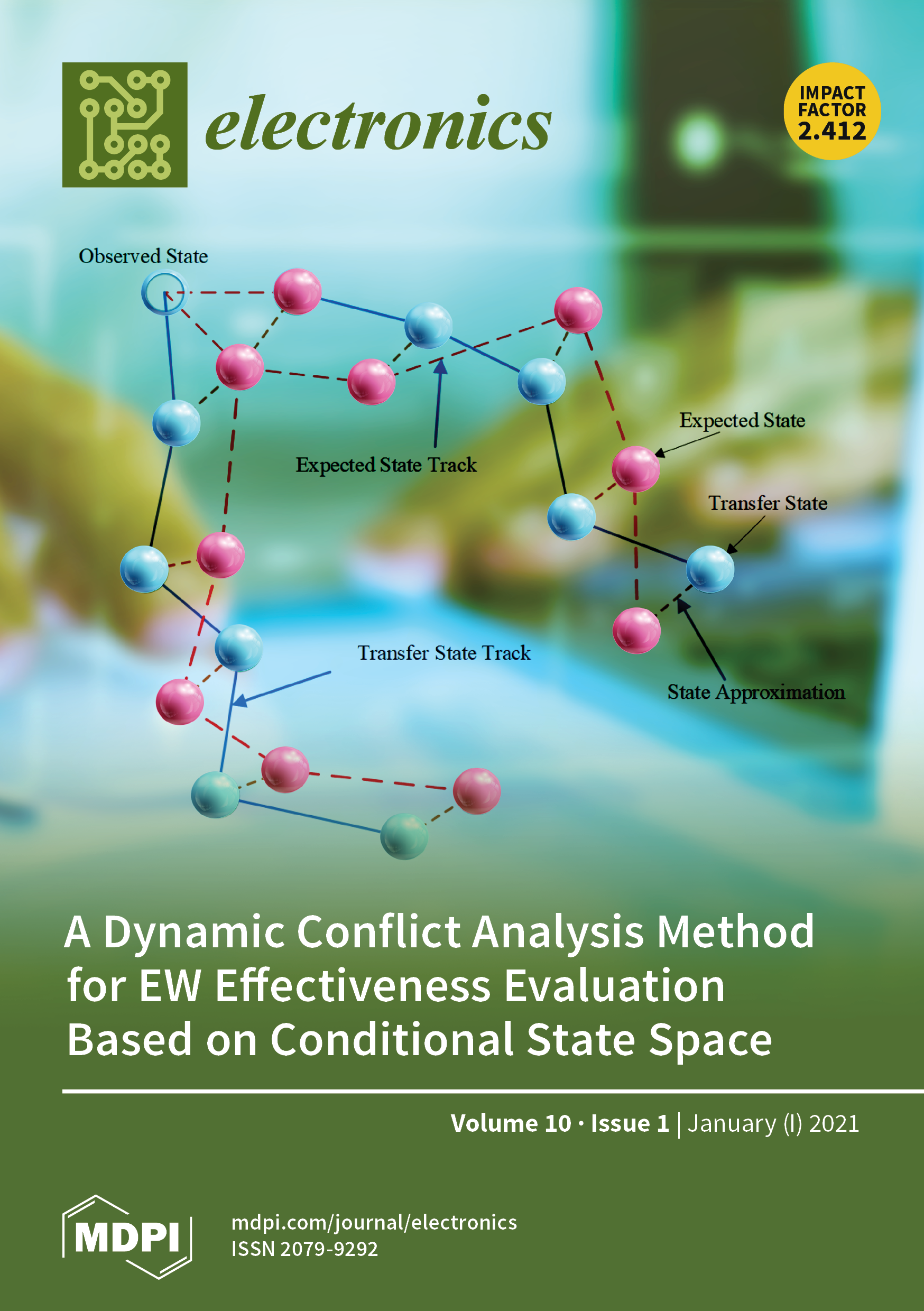 |
“A Dynamic Conflict Analysis Method for EW Effectiveness Evaluation Based on Conditional State Space” |
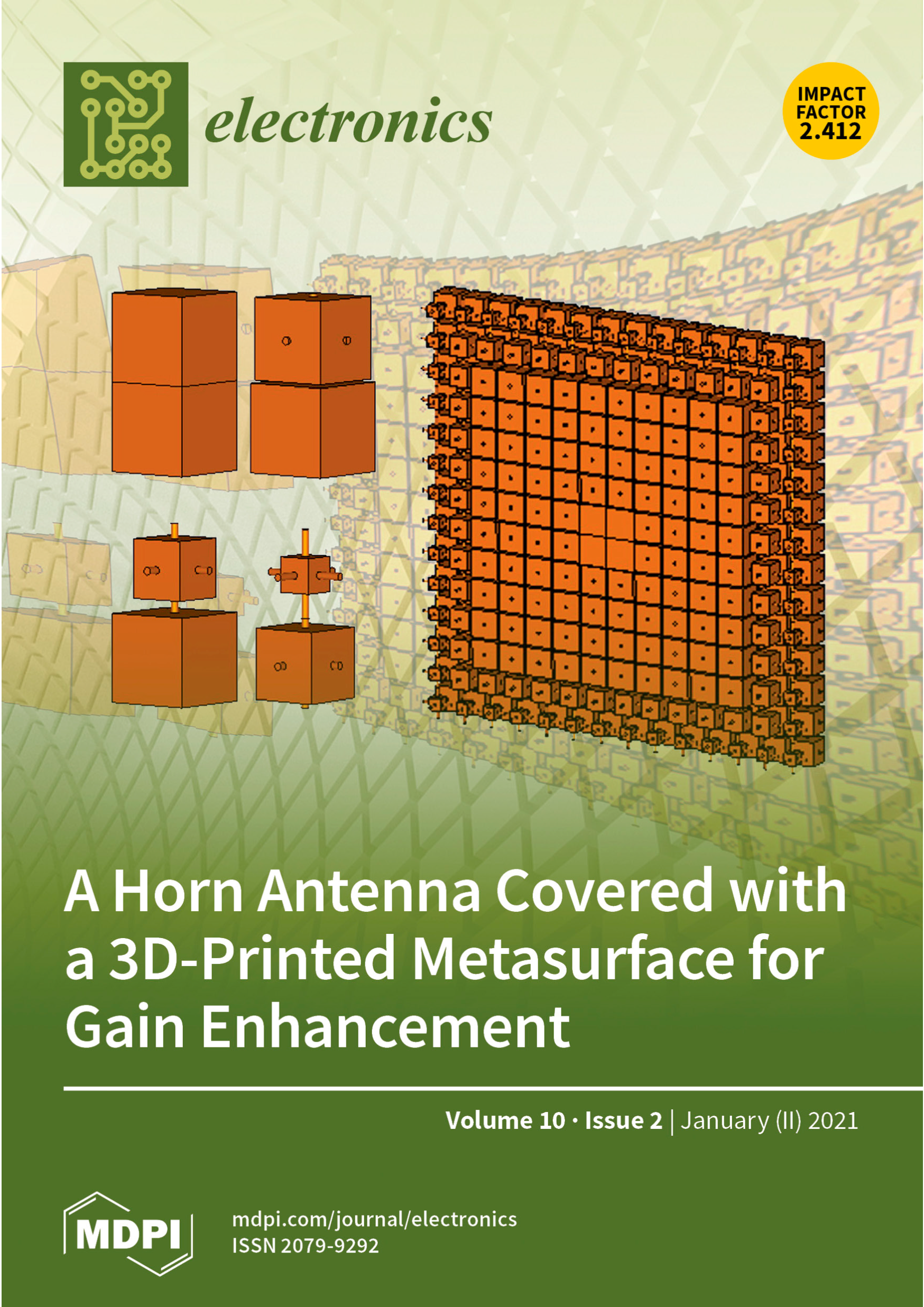 |
“A Horn Antenna Covered with a 3D-Printed Metasurface for Gain Enhancement” |
 |
“Solar Energy Conversion and Storage Using a Photocatalytic Fuel Cell Combined with a Supercapacitor” |
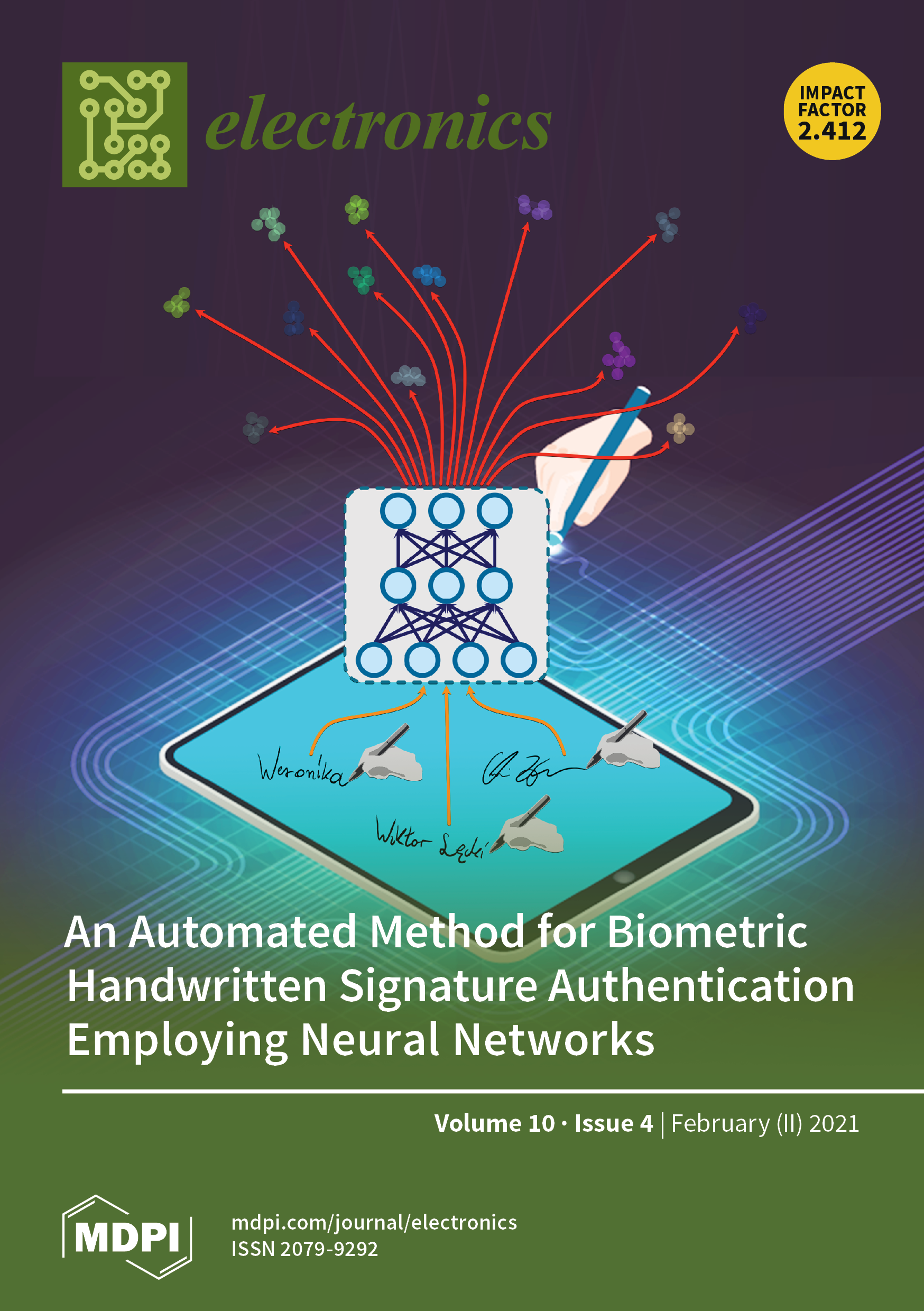 |
“An Automated Method for Biometric Handwritten Signature Authentication Employing Neural Networks “ |
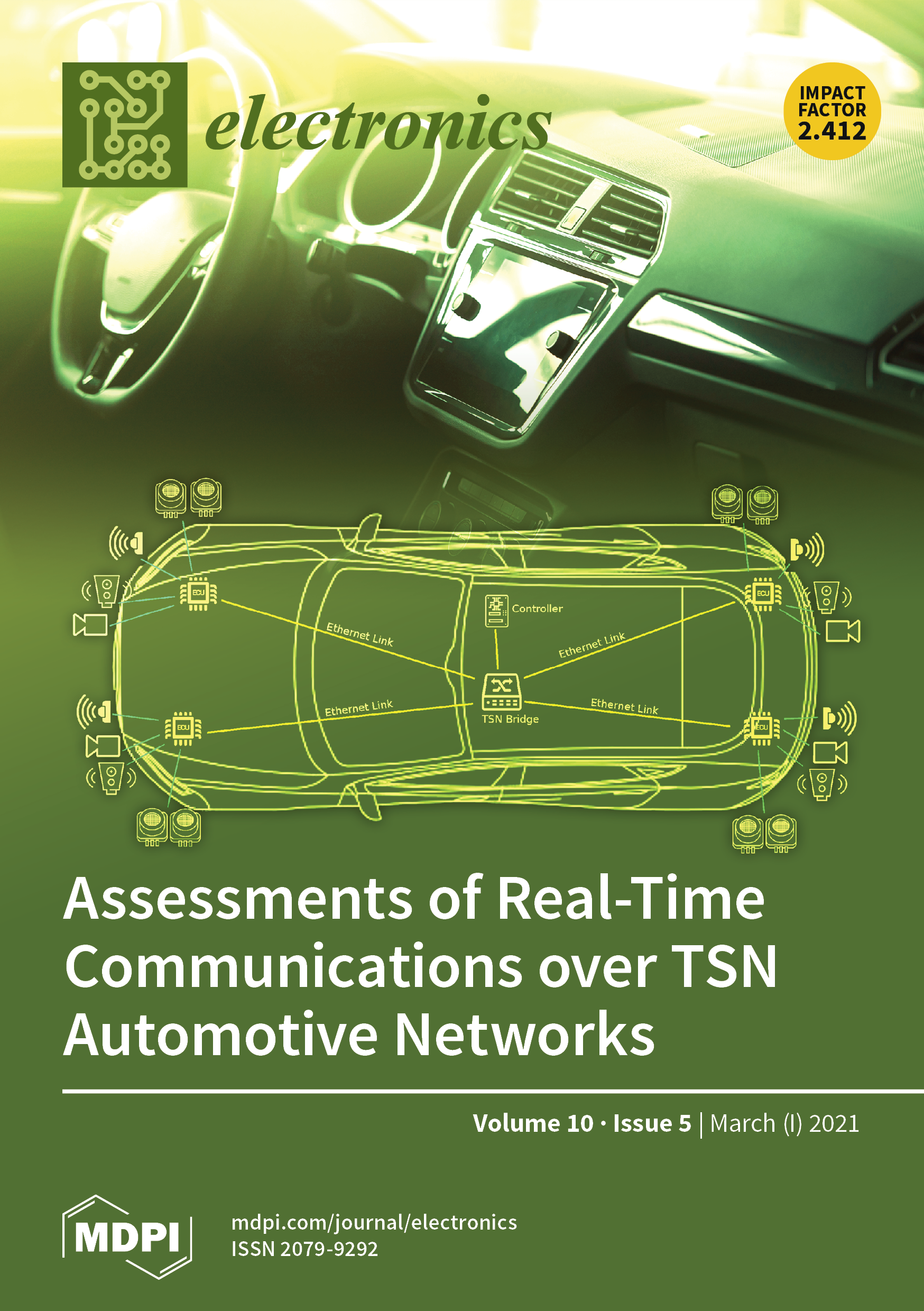 |
“Assessments of Real-Time Communications over TSN Automotive Networks” |
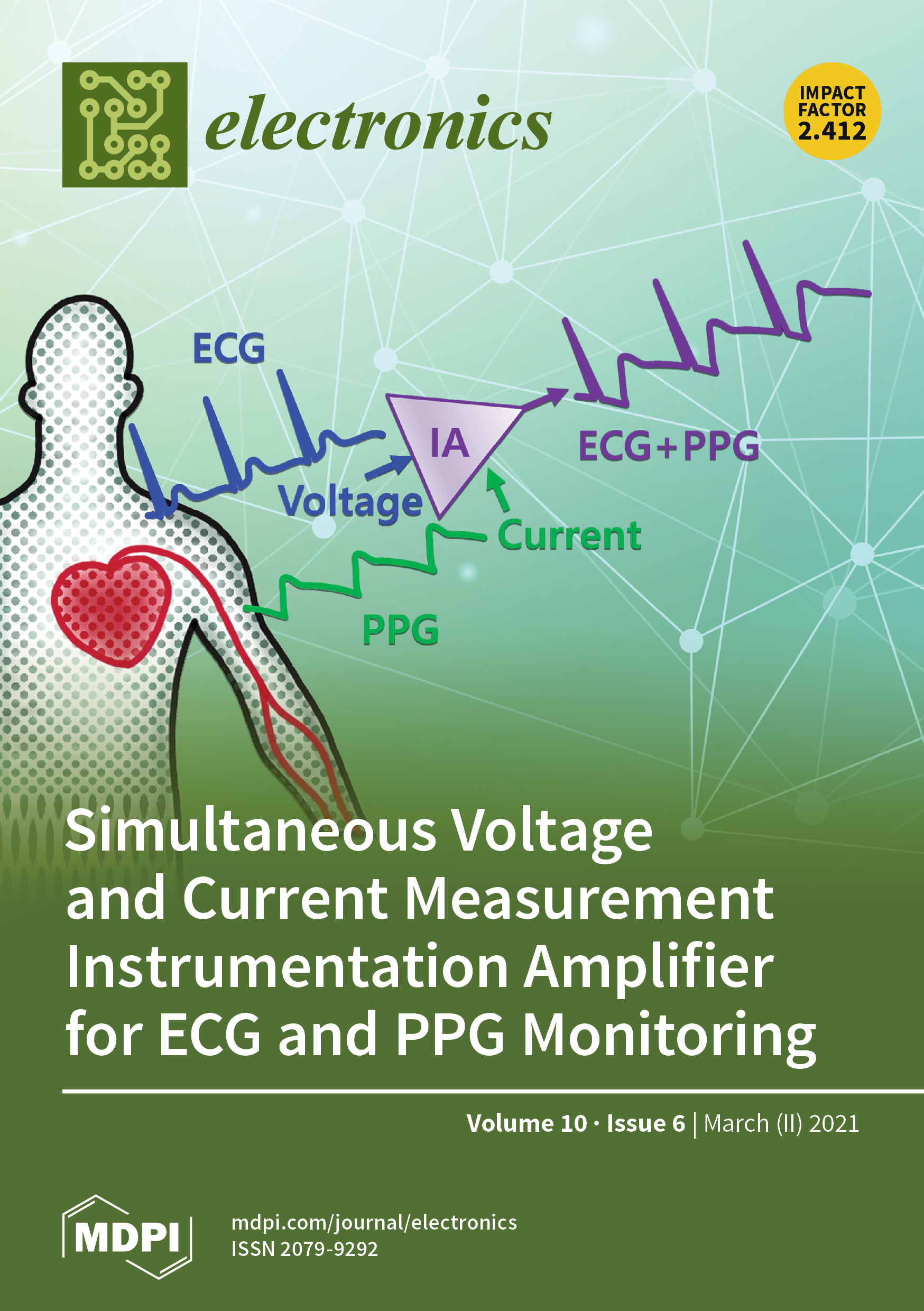 |
“Simultaneous Voltage and Current Measurement Instrumentation Amplifier for ECG and PPG Monitoring” |
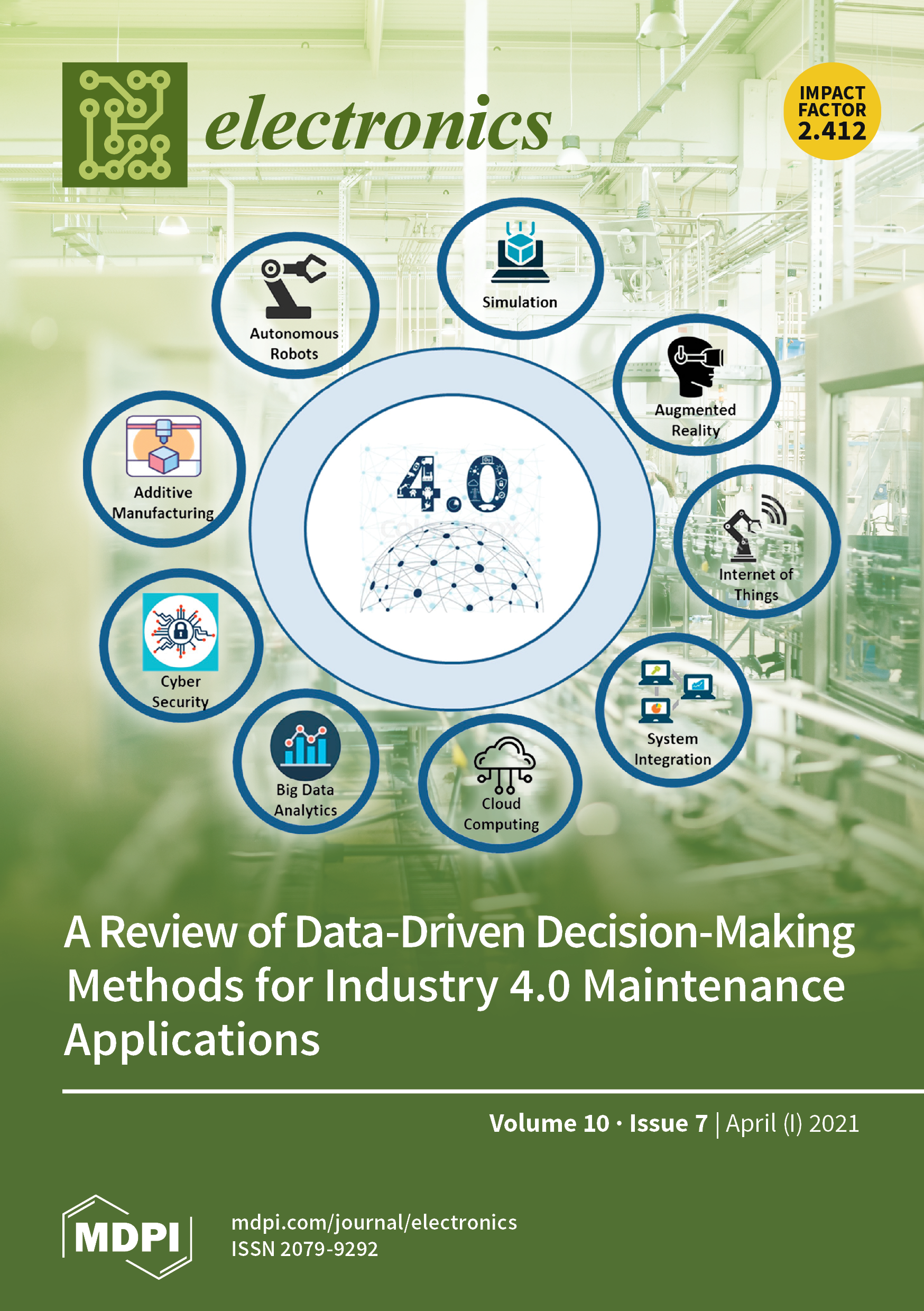 |
“A Review of Data-Driven Decision-Making Methods for Industry 4.0 Maintenance Applications” |
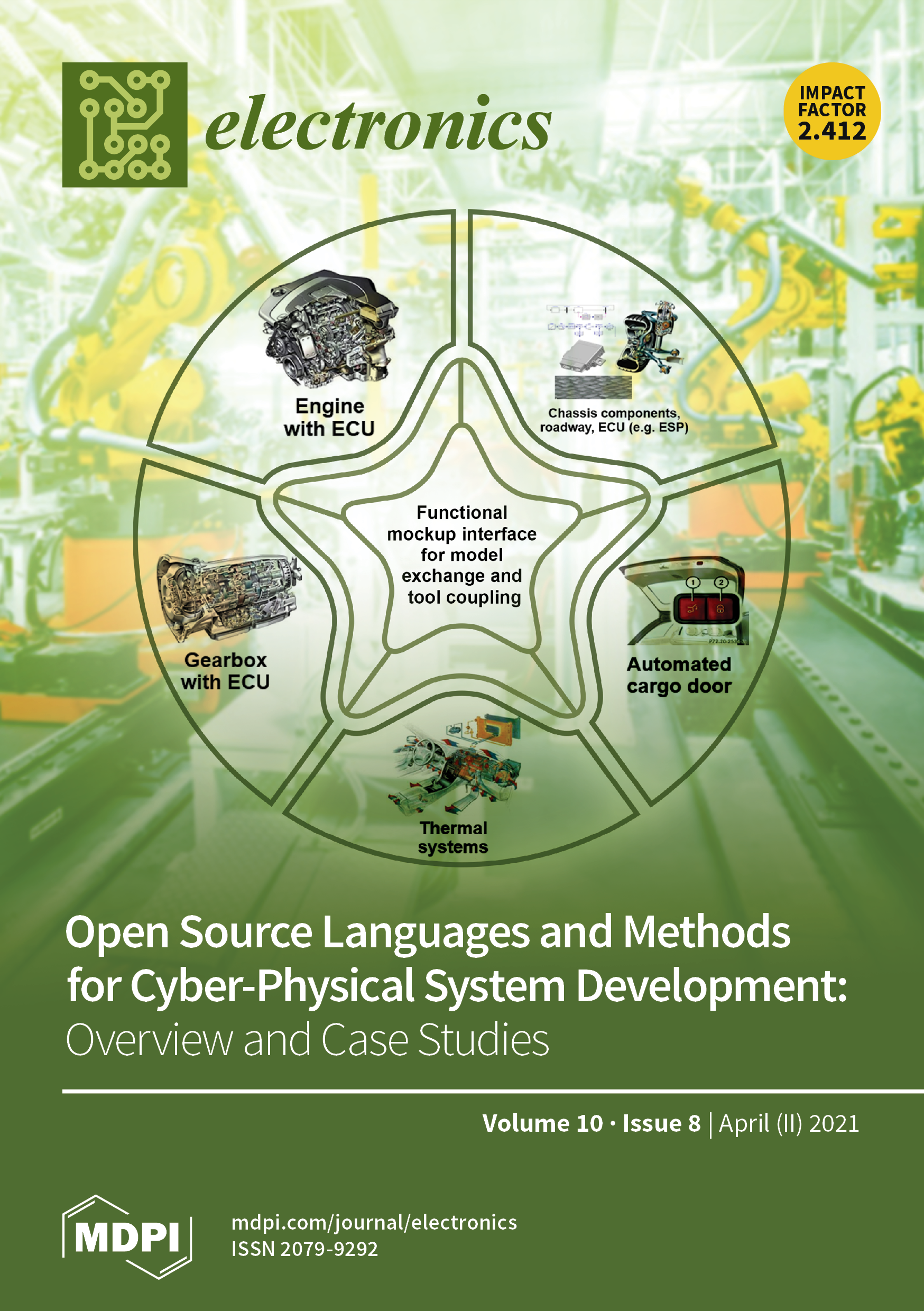 |
“Open Source Languages and Methods for Cyber-Physical System Development: Overview and Case Studies” |
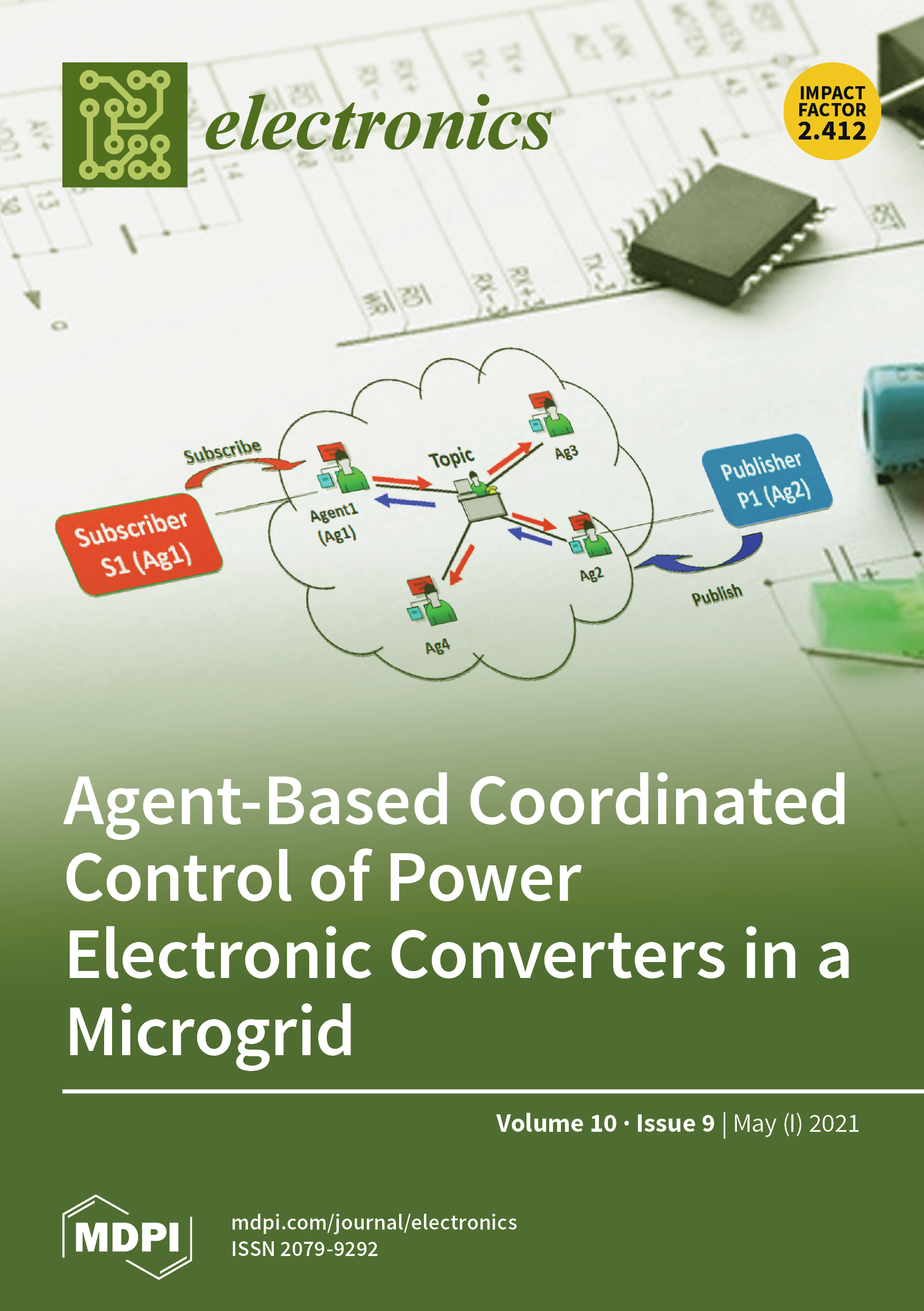 |
“Agent-Based Coordinated Control of Power Electronic Converters in a Microgrid” |
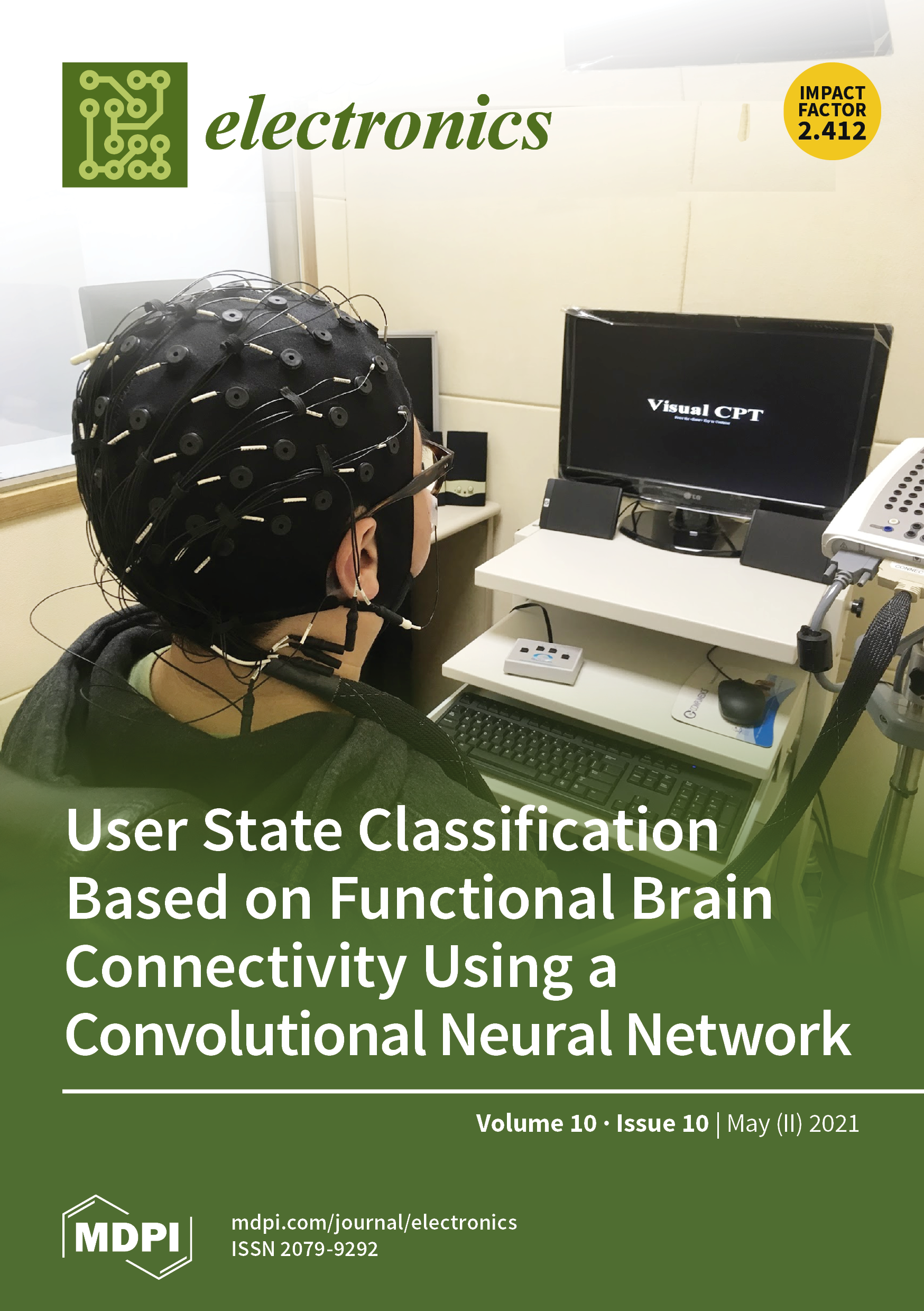 |
“User State Classification Based on Functional Brain Connectivity Using a Convolutional Neural Network” |
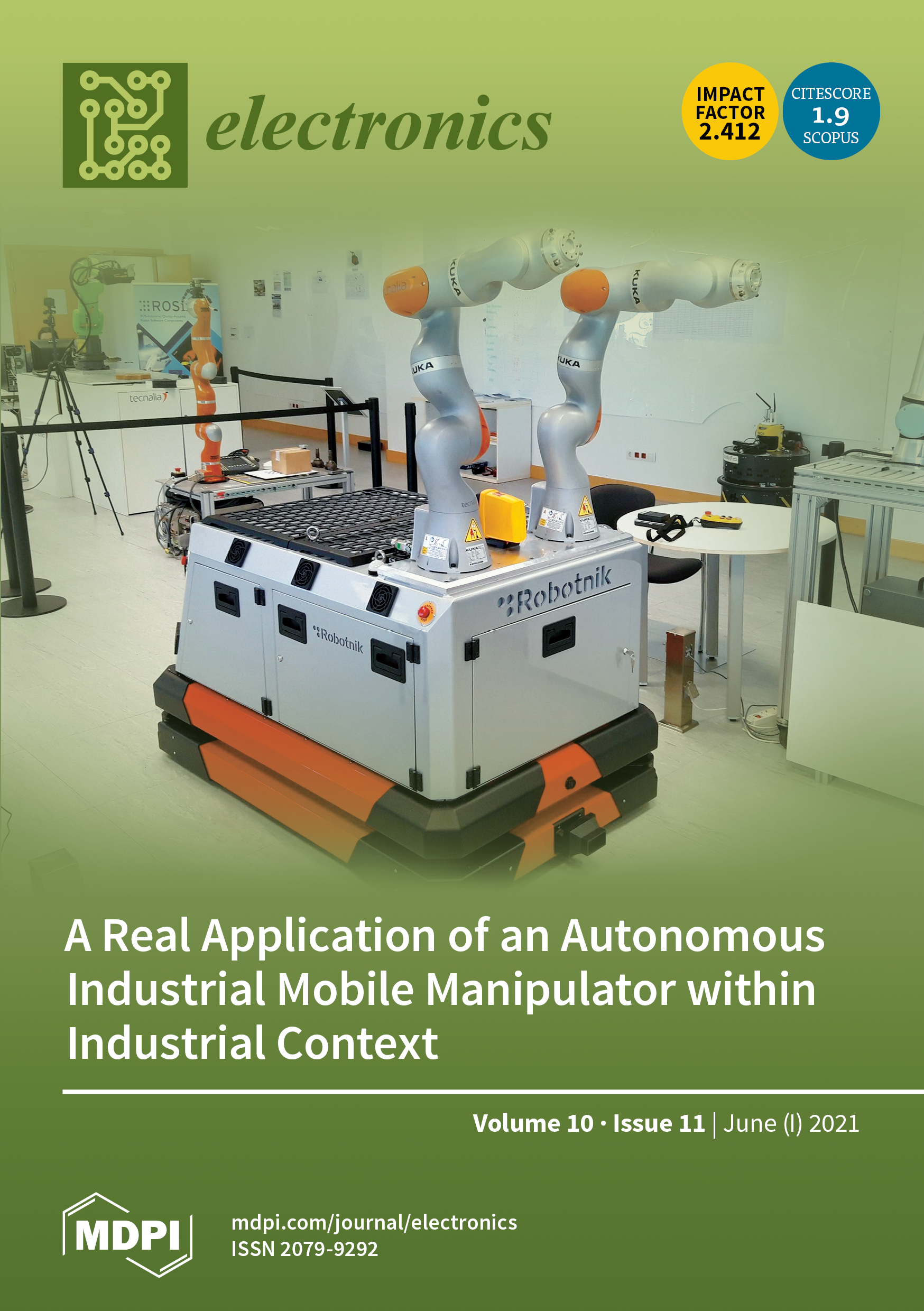 |
“A Real Application of an Autonomous Industrial Mobile Manipulator within Industrial Context” |
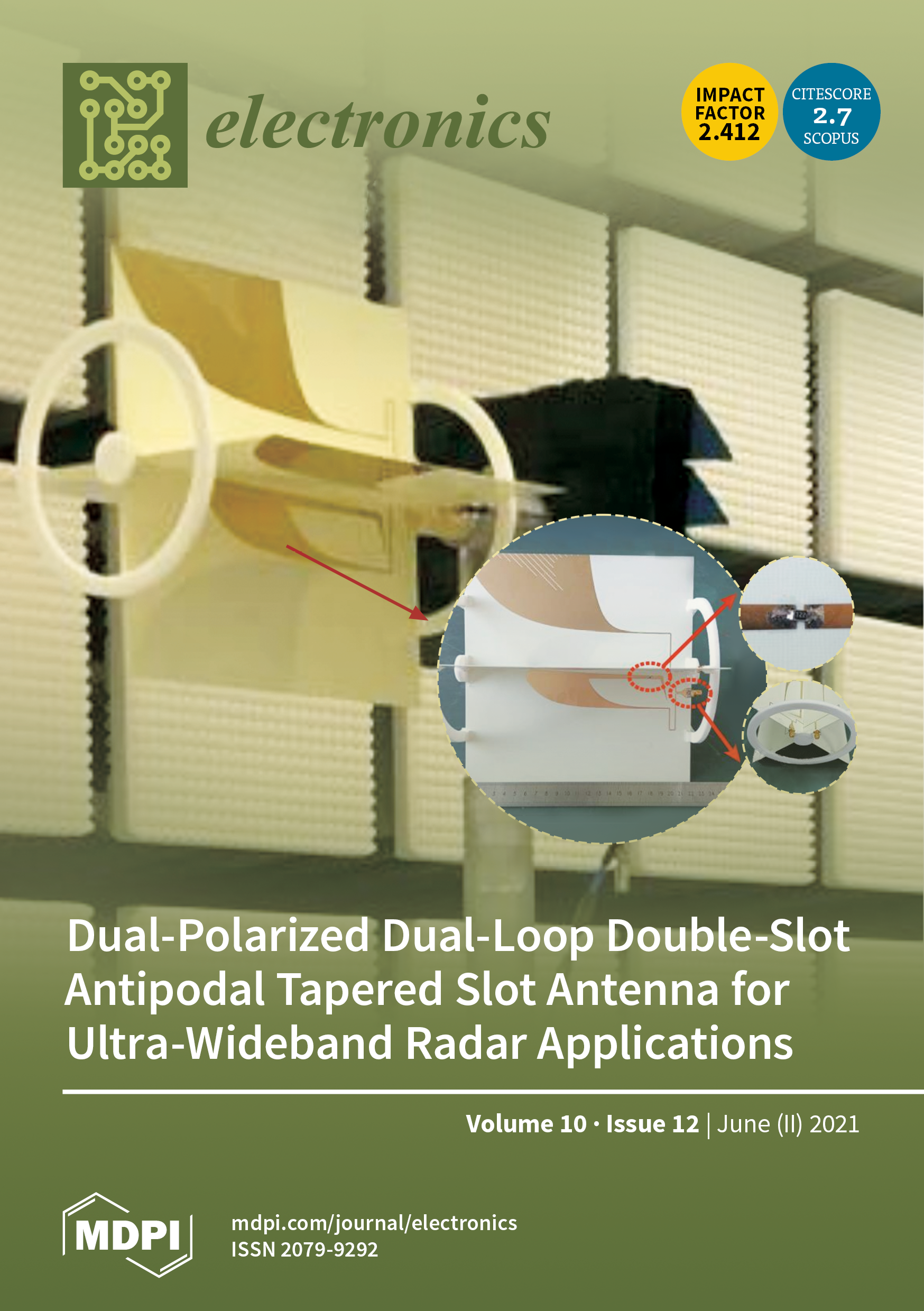 |
“Dual-Polarized Dual-Loop Double-Slot Antipodal Tapered Slot Antenna for Ultra-Wideband Radar Applications” |
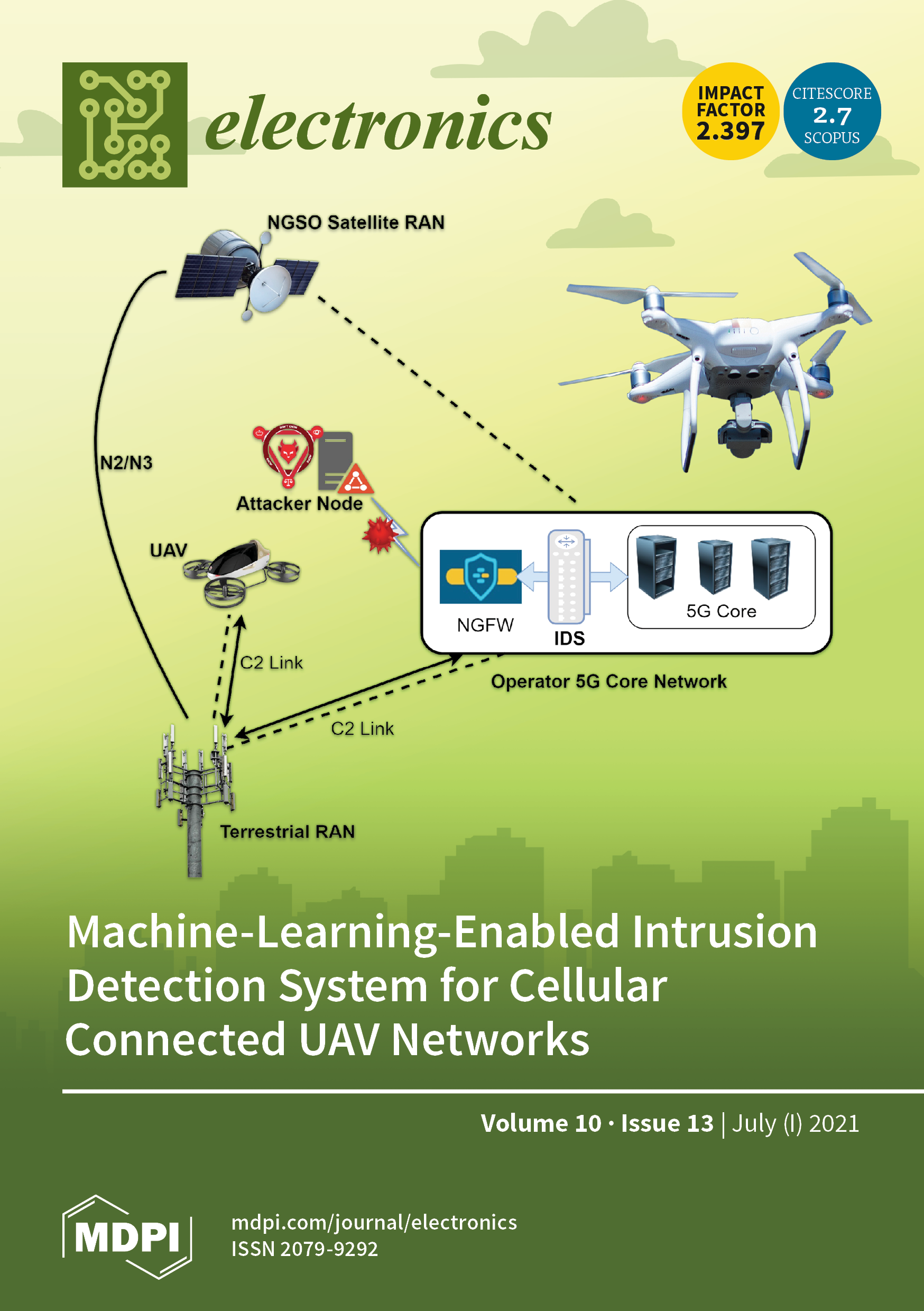 |
“Machine-Learning-Enabled Intrusion Detection System for Cellular Connected UAV Networks” |
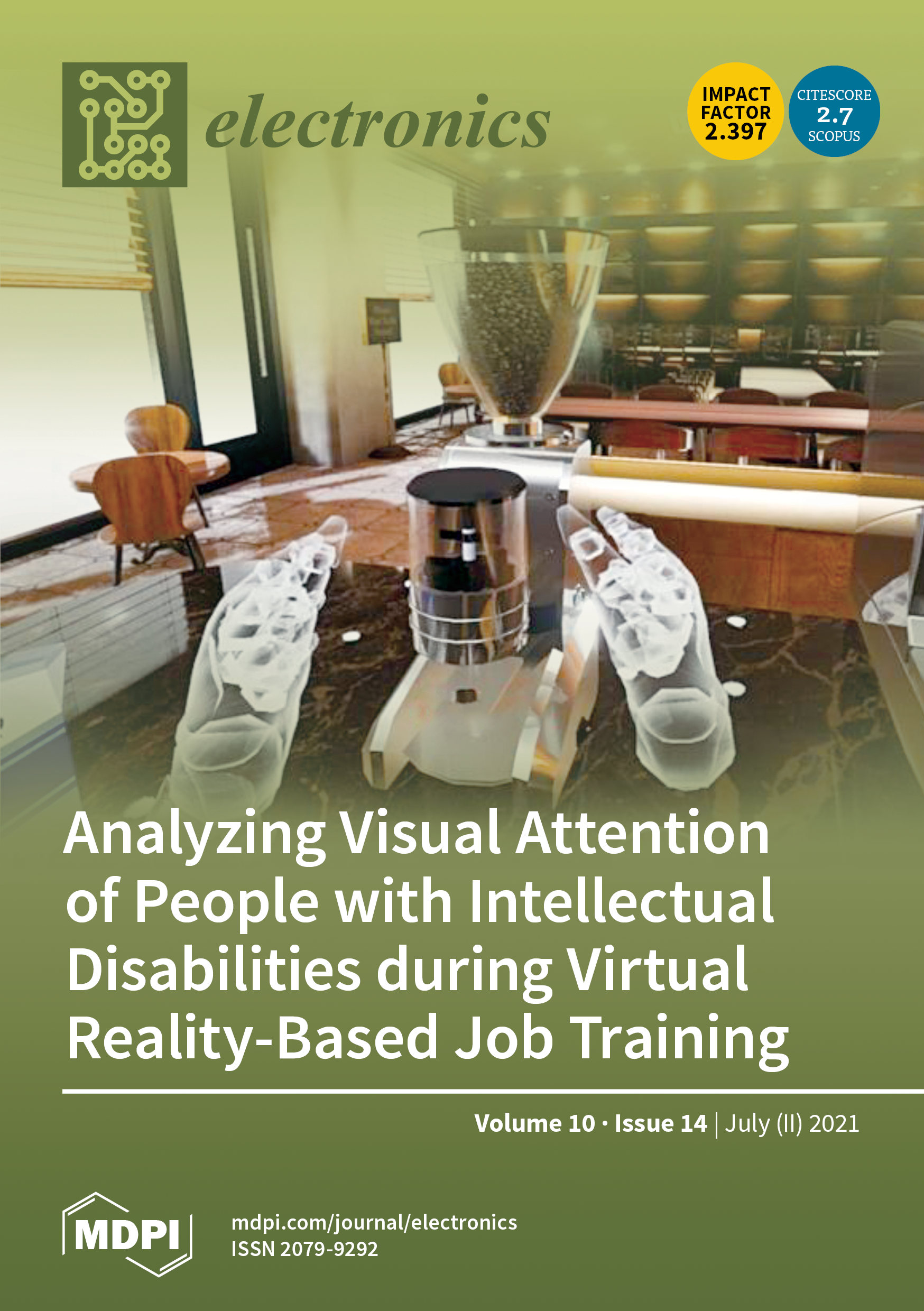 |
“Analyzing Visual Attention of People with Intellectual Disabilities during Virtual Reality-Based Job Training” |
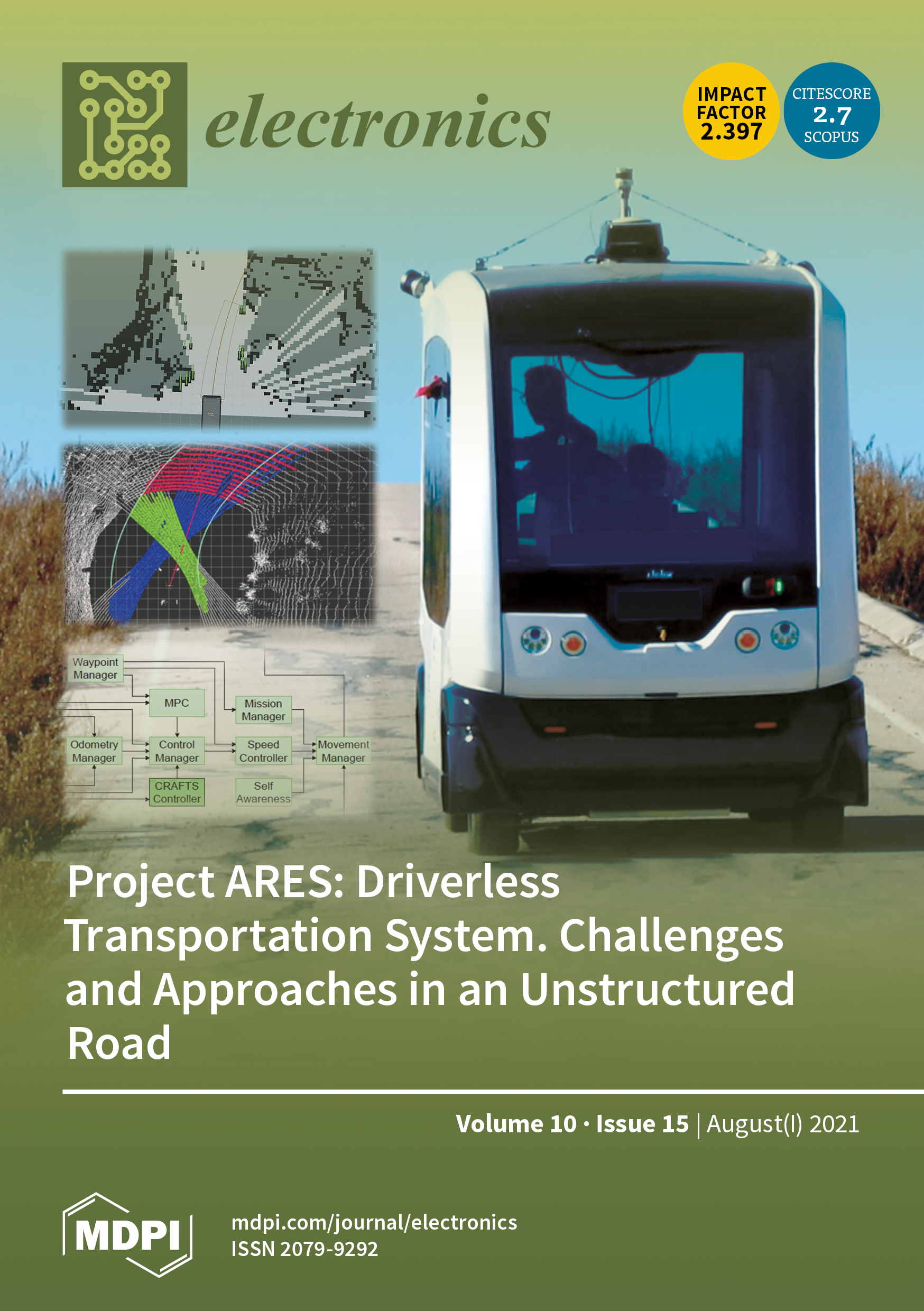 |
“Project ARES: Driverless Transportation System. Challenges and Approaches in an Unstructured Road” |
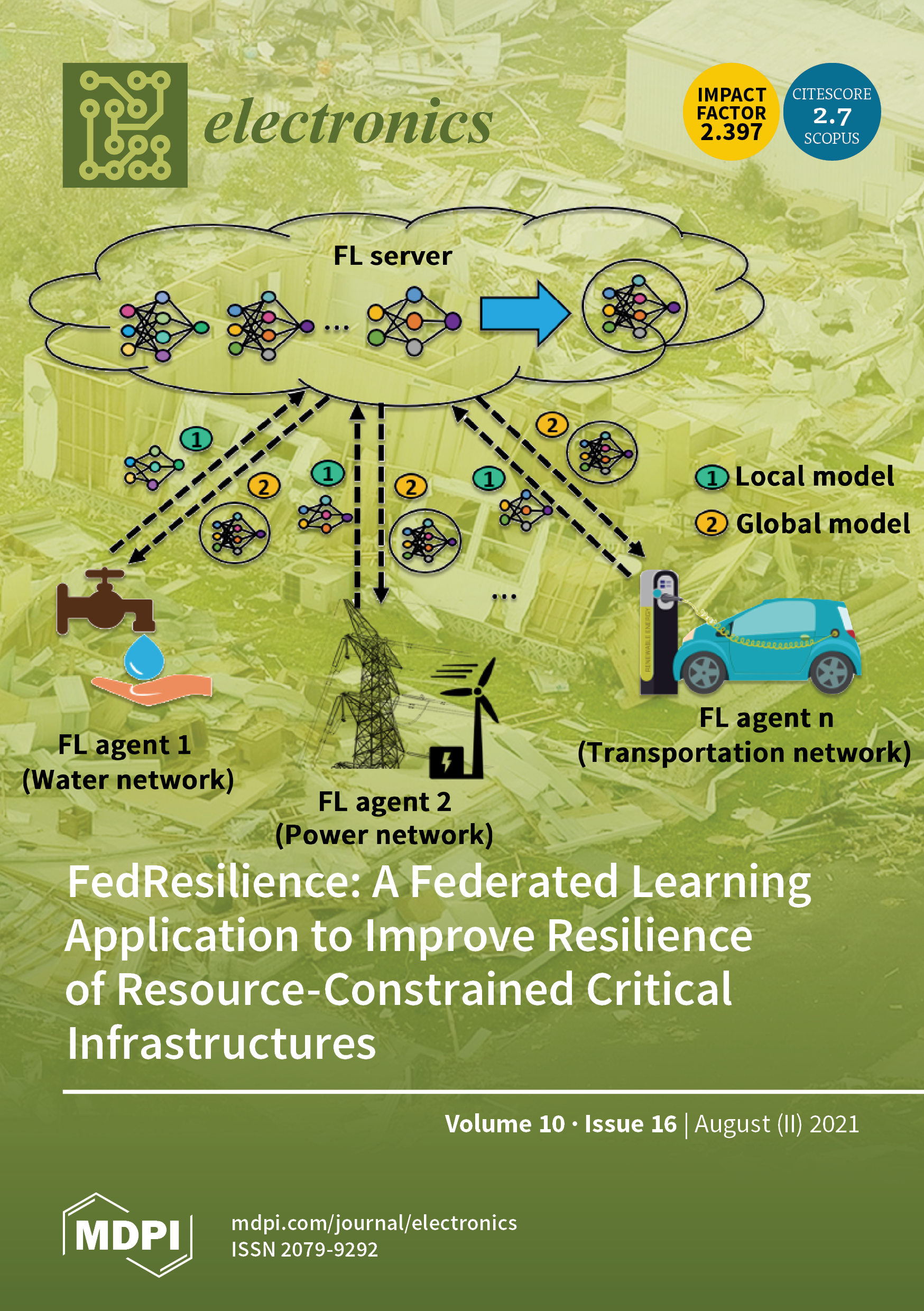 |
“FedResilience: A Federated Learning Application to Improve Resilience of Resource-Constrained Critical Infrastructures” |
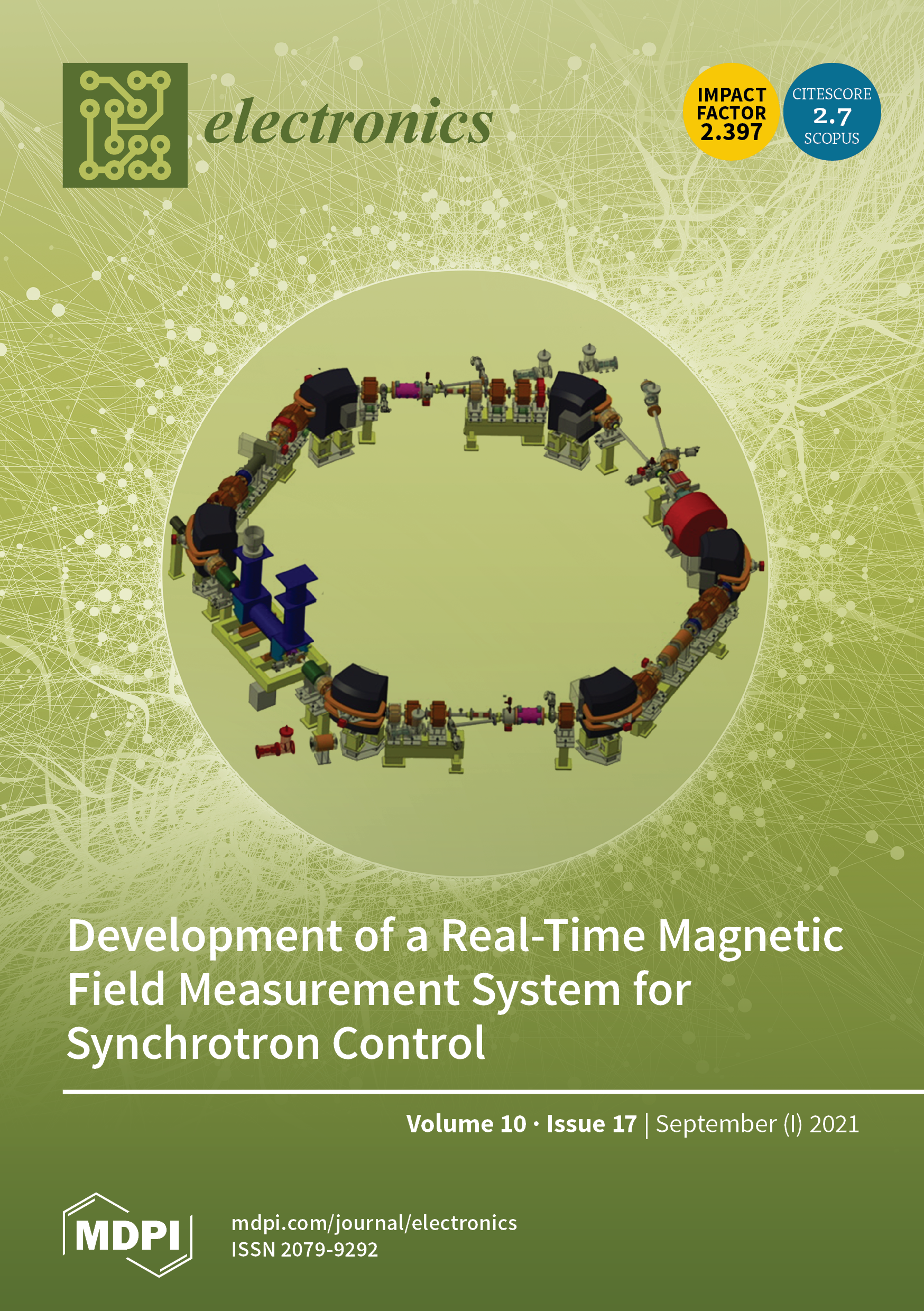 |
“Development of a Real-Time Magnetic Field Measurement System for Synchrotron Control” |
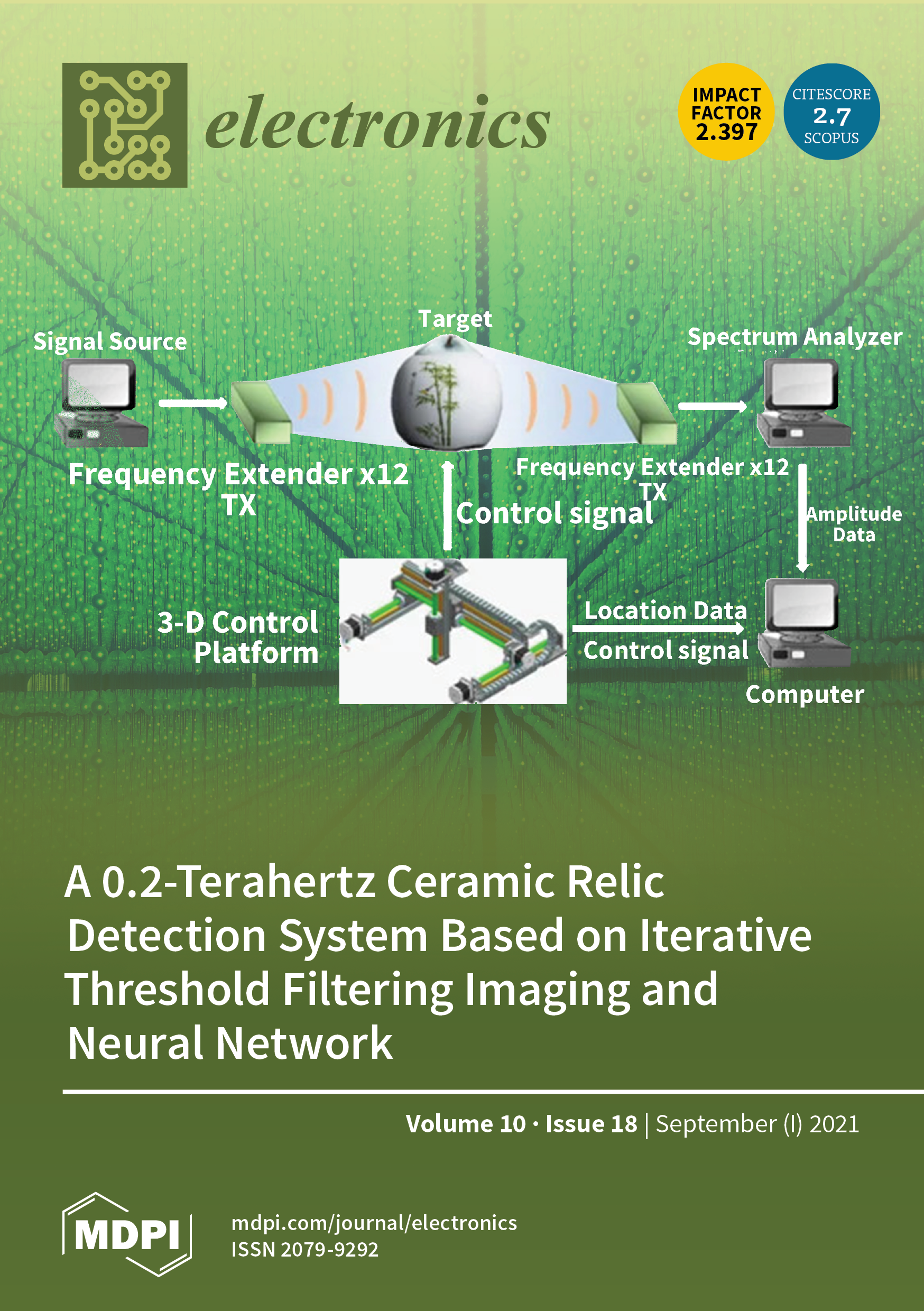 |
“A 0.2-Terahertz Ceramic Relic Detection System Based on Iterative Threshold Filtering Imaging and Neural Network” |
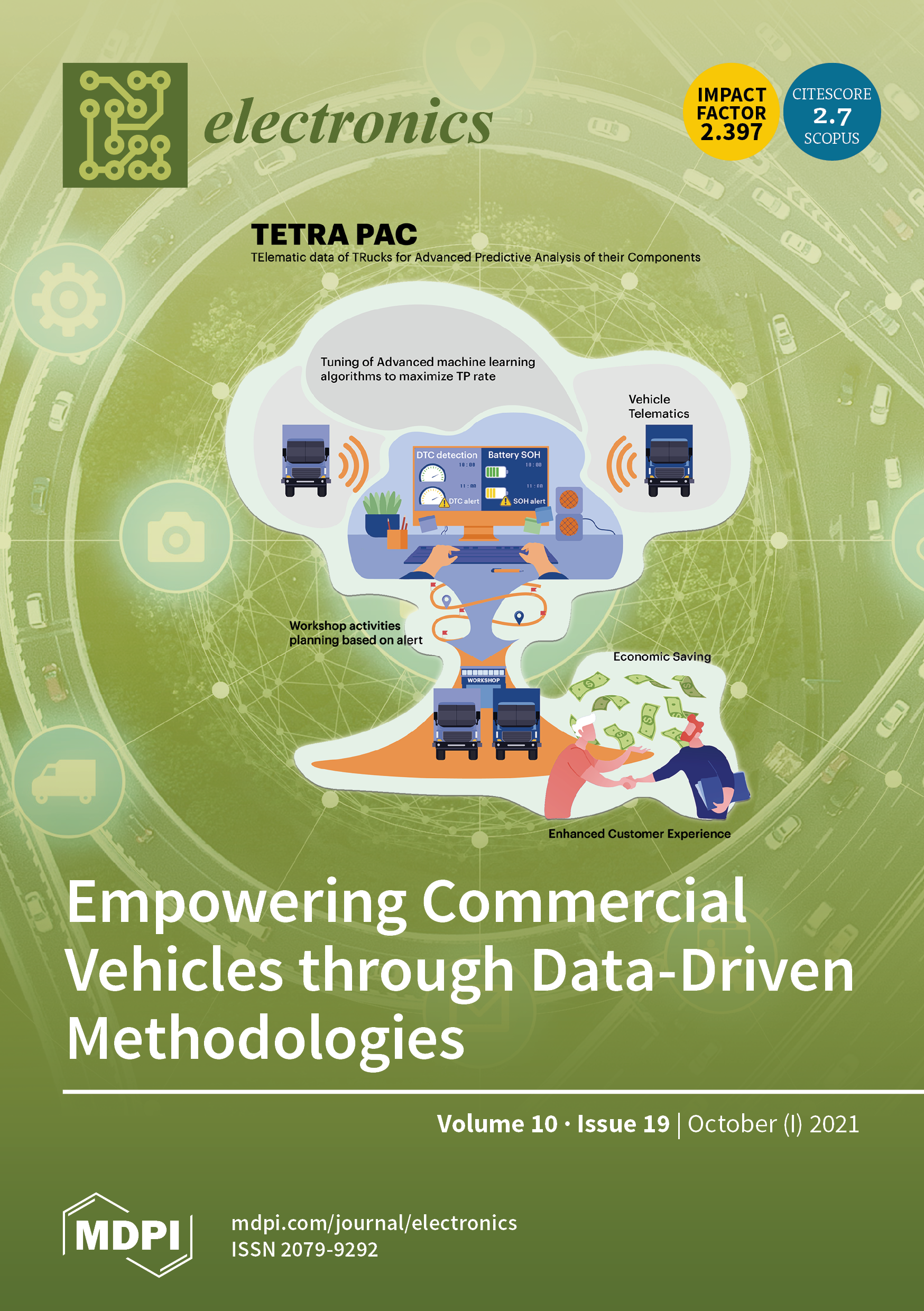 |
“Empowering Commercial Vehicles through Data-Driven Methodologies” |
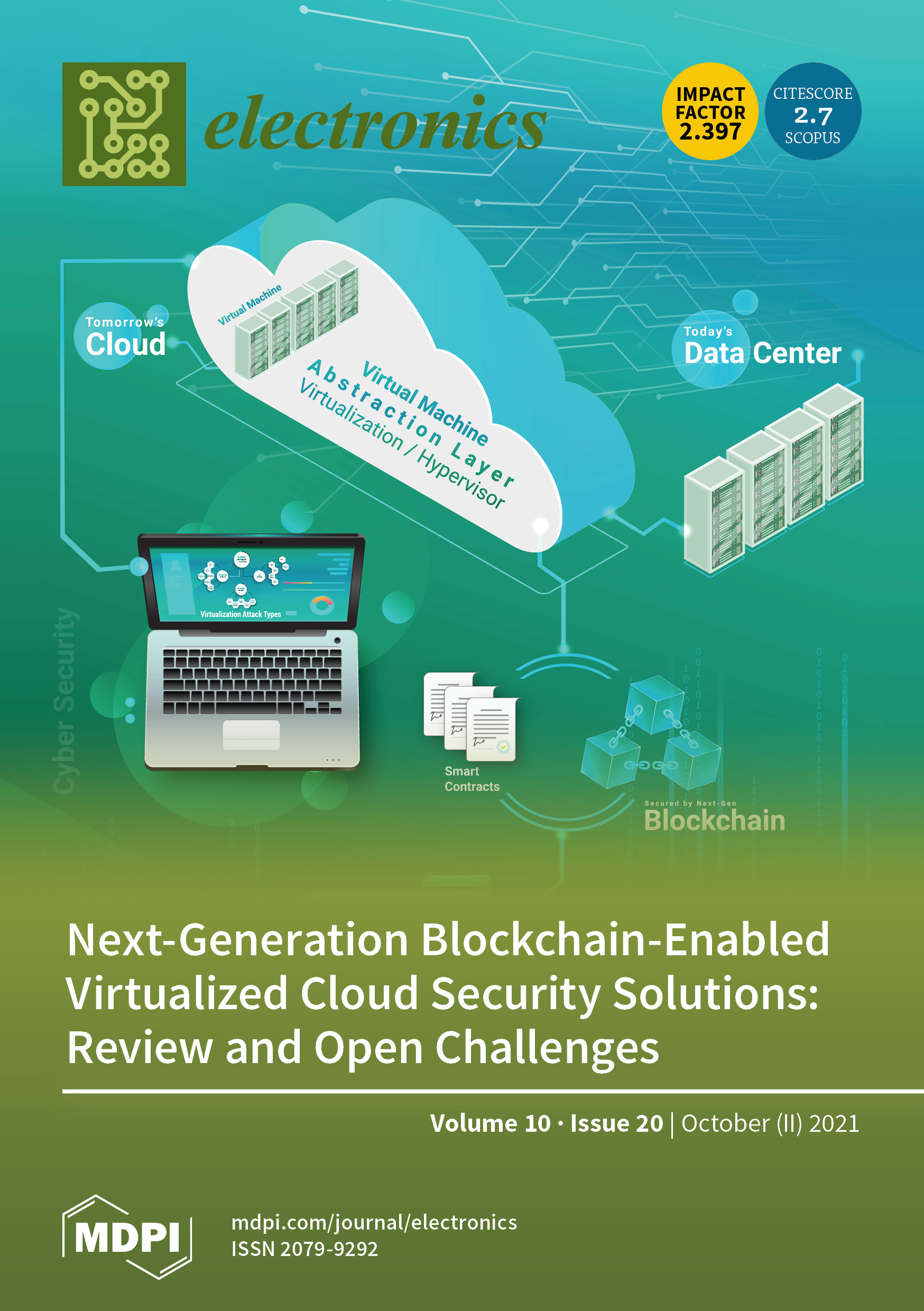 |
“Next-Generation Blockchain-Enabled Virtualized Cloud Security Solutions: Review and Open Challenges” |
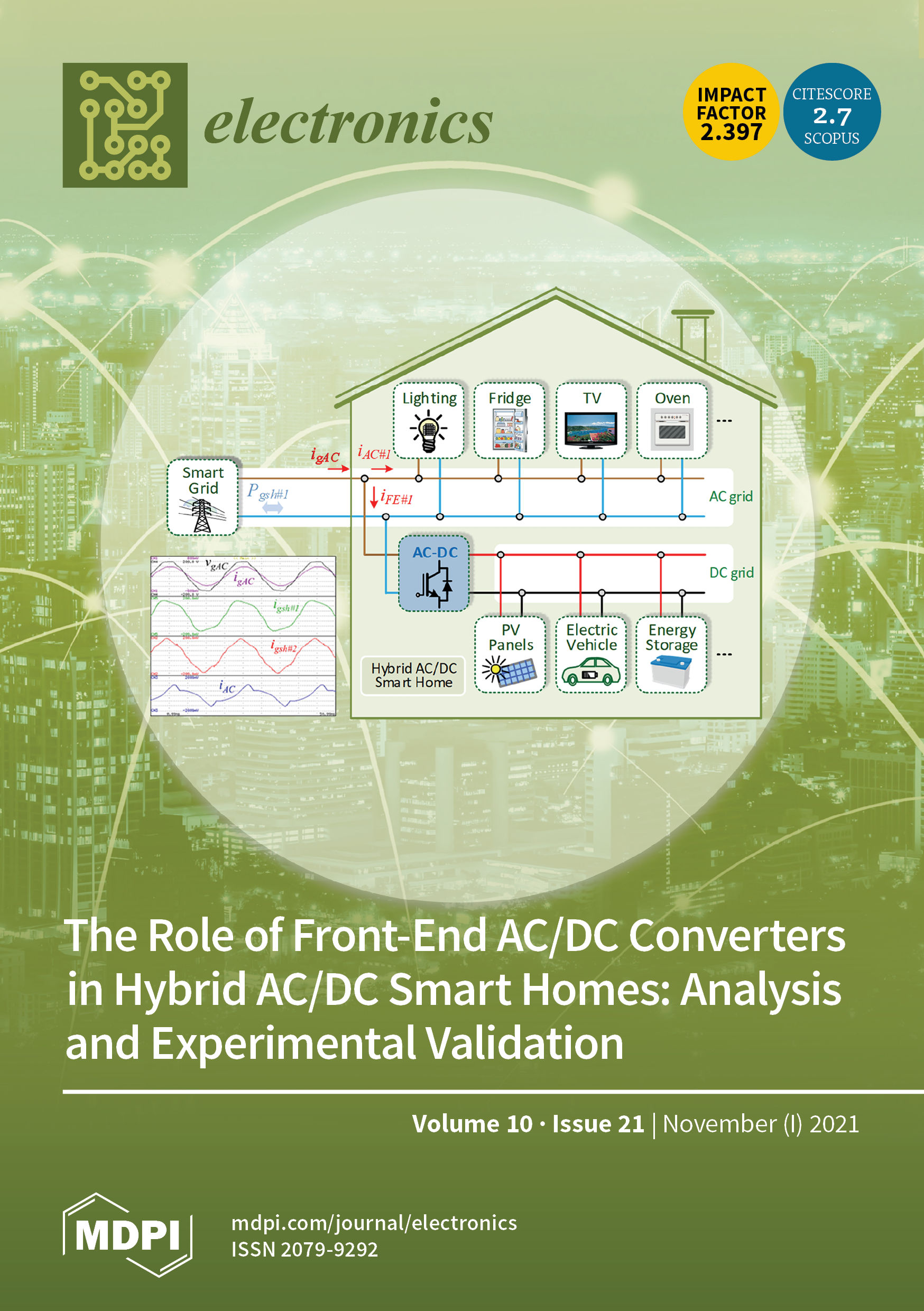 |
“The Role of Front-End AC/DC Converters in Hybrid AC/DC Smart Homes: Analysis and Experimental Validation” |
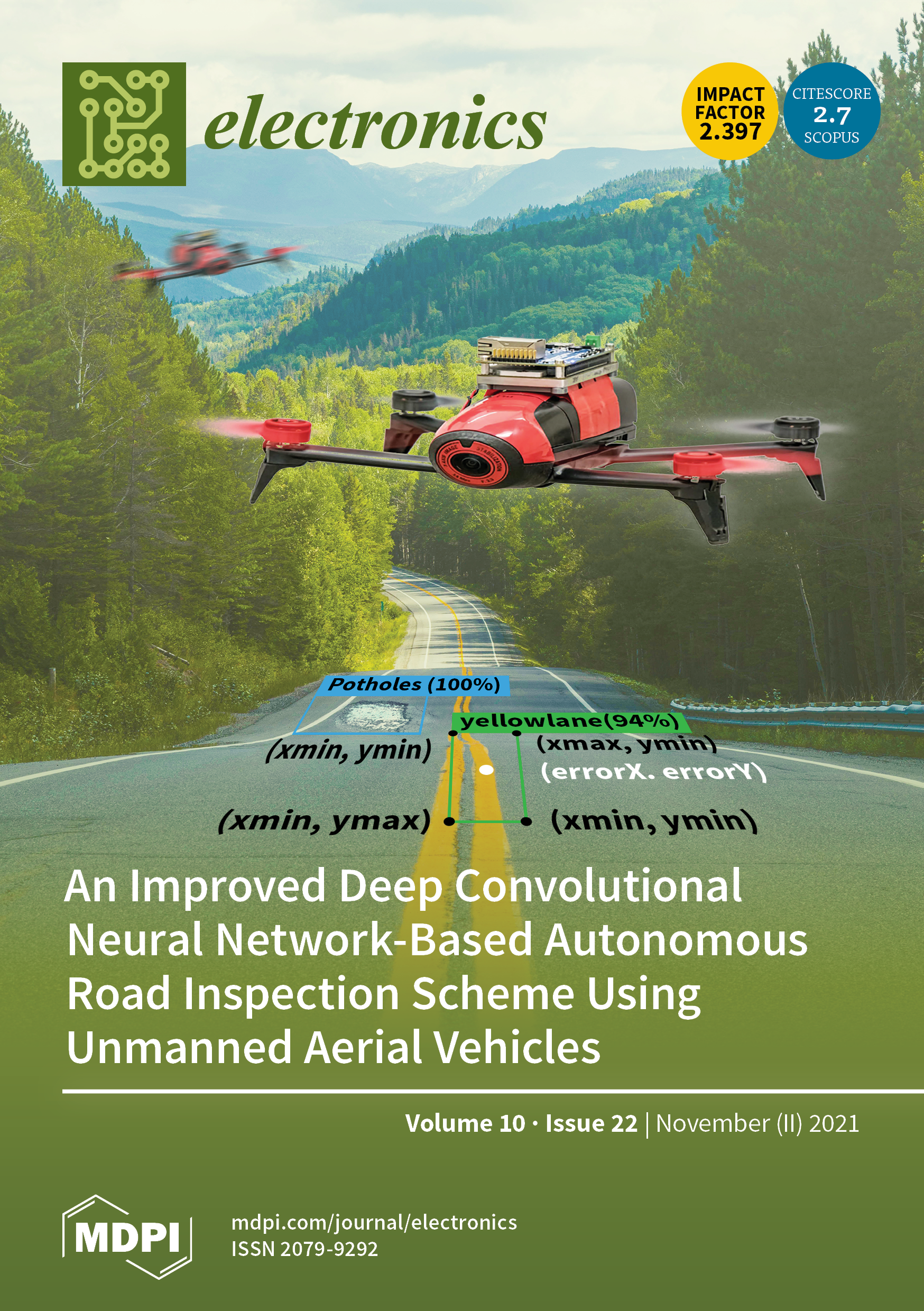 |
“An Improved Deep Convolutional Neural Network-Based Autonomous Road Inspection Scheme Using Unmanned Aerial Vehicles” |
 |
“Prospects of Wireless Energy-Aware Sensors for Smart Factories in the Industry 4.0 Era” |
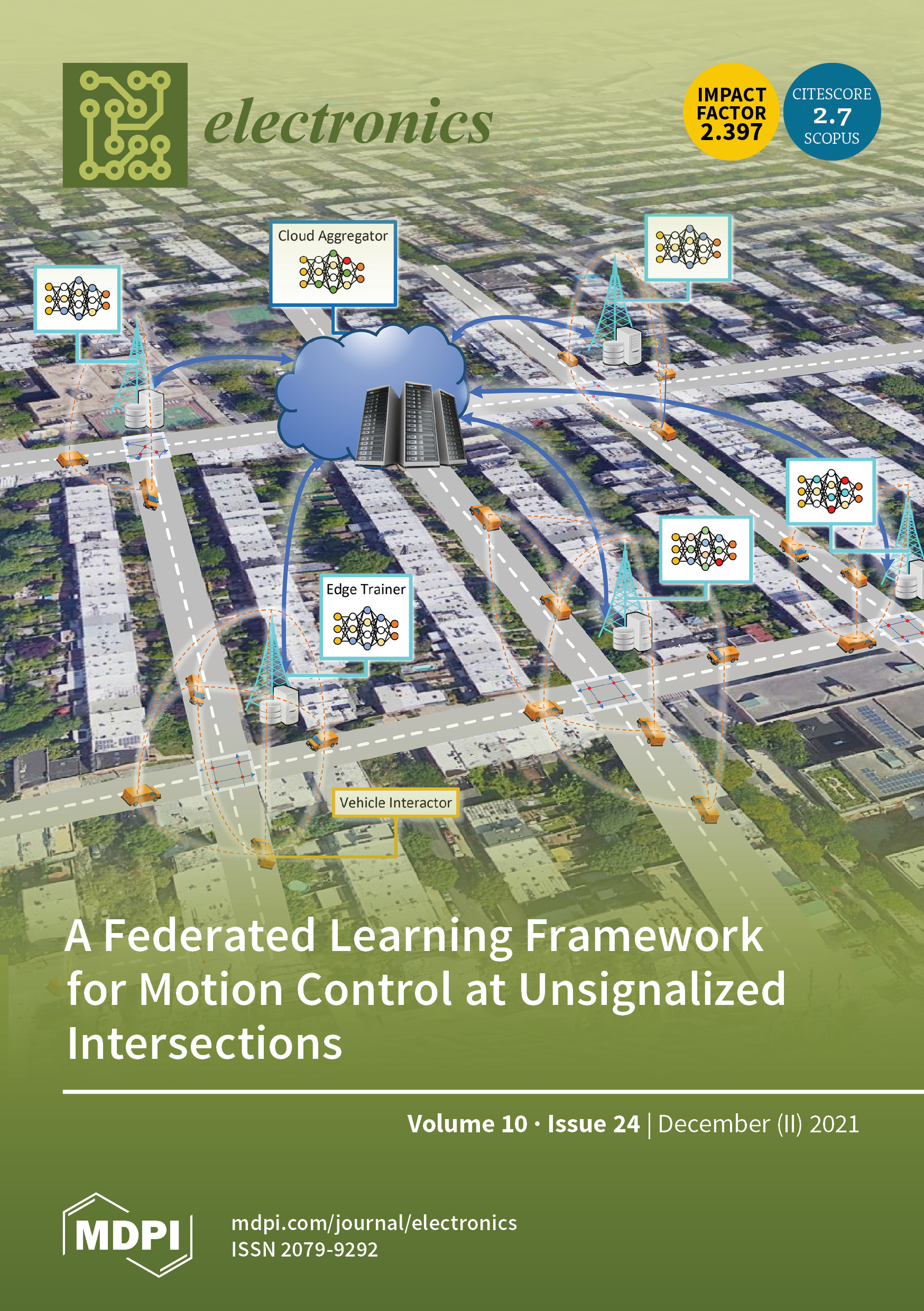 |
“A Traffic-Aware Federated Imitation Learning Framework for Motion Control at Unsignalized Intersections with Internet of Vehicles” |
12 September 2023
Electronics | Highly Cited Papers in 2021 in the Section “Semiconductor Devices”
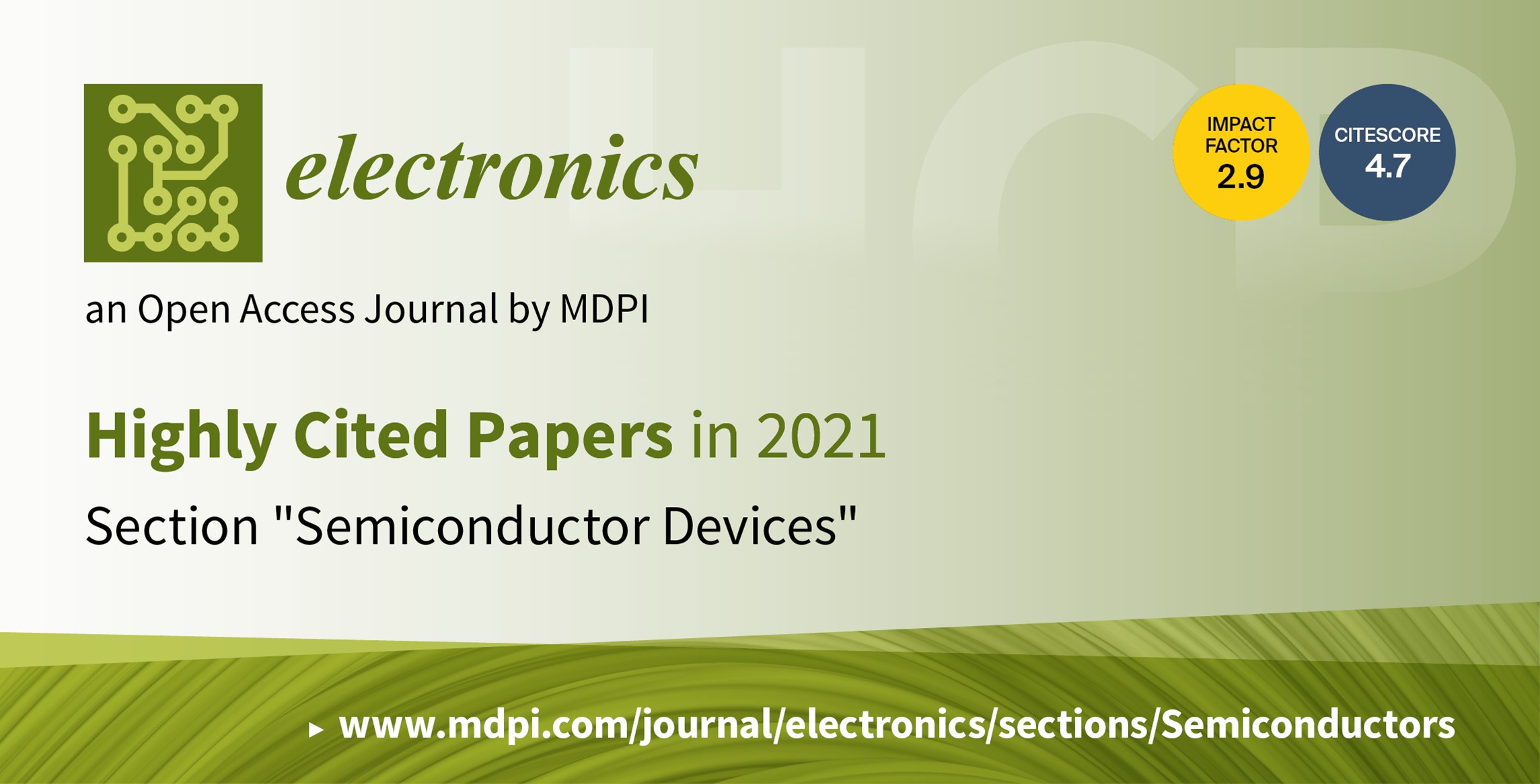
The Section “Semiconductor Devices” of Electronics (ISSN: 2079-9292) publishes original and significant contributions to the theory and performance of semiconductor devices and related materials, including devices, fabrication process, simulation, quantum devices, hybrid devices, flexible electronic devices, novel semiconductors, semiconductor material, and device physics. Reviews on these subjects are published and Special Issues dealing with specific topics are also published.
As they are of open access format, you have free and unlimited access to the full text of all the articles published in our journal. We welcome you to read our most highly cited papers published in 2021 below:
1. “Recent Progress on 3D NAND Flash Technologies”
by Akira Goda
Electronics 2021, 10(24), 3156; https://doi.org/10.3390/electronics10243156
Full text available online: https://www.mdpi.com/2079-9292/10/24/3156
2. “Study of Quantized Hardware Deep Neural Networks Based on Resistive Switching Devices, Conventional versus Convolutional Approaches”
by Rocío Romero-Zaliz, Eduardo Pérez, Francisco Jiménez-Molinos, Christian Wenger and Juan B. Roldán
Electronics 2021, 10(3), 346; https://doi.org/10.3390/electronics10030346
Full text available online: https://www.mdpi.com/2079-9292/10/3/346
3. “In-Memory Computing with Resistive Memory Circuits: Status and Outlook”
by Giacomo Pedretti and Daniele Ielmini
Electronics 2021, 10(9), 1063; https://doi.org/10.3390/electronics10091063
Full text available online: https://www.mdpi.com/2079-9292/10/9/1063
4.“Measurements and Computations of Internal Temperatures of the IGBT and the Diode Situated in the Common Case”
by Paweł Górecki and Krzysztof Górecki
Electronics 2021, 10(2), 210; https://doi.org/10.3390/electronics10020210
Full text available online: https://www.mdpi.com/2079-9292/10/2/210
5.“Analysis of Electrothermal Effects in Devices and Arrays in InGaP/GaAs HBT Technology”
by Vincenzo d’Alessandro, Antonio Pio Catalano, Ciro Scognamillo, Lorenzo Codecasa and Peter J. Zampardi
Electronics 2021, 10(6), 757; https://doi.org/10.3390/electronics10060757
Full text available online: https://www.mdpi.com/2079-9292/10/6/757
7 September 2023
Interview with Dr. Gabriele Patrizi—Winner of Electronics 2022 Best Ph.D. Thesis Award
We are pleased to announce the winner of the Electronics 2022 Best Ph.D. Thesis Award. This award is for a Ph.D. student or recently qualified researcher who has produced a highly anticipated thesis with impressive academic potential.
The award has been granted to “An Innovative Data-Driven Reliability Life Cycle for Complex Systems” by Dr. Gabriele Patrizi, Department of Information Engineering, University of Florence, Florence, Italy.
The winner will receive CHF 800, a certificate, and a chance to publish a paper free of charge after peer review in Electronics (ISSN: 2079-9292) in 2023.

We congratulate Dr. Gabriele Patrizi on his accomplishments. We would like to take this opportunity to thank all the applicants for submitting their exceptional theses and the Award Committee for voting for and supporting this award.
Dr. Gabriele Patrizi is currently a Post-Doctoral Research Fellow of instrumentation and measurement and an Adjunct Lecturer of electric measurements at the University of Florence. His research interests include life cycle reliability, condition monitoring for the fault diagnosis of electronics, data-driven prognostic and health management, and instrumentation and measurement for reliability analyses.
The following is a short interview with Dr. Gabriele Patrizi:
Could you please give us a brief overview of your research topic and the main objectives of your Ph.D. thesis?
I graduated from a master’s course in electronics engineering, and then I started my Ph.D. in electronics and industrial engineering. The actual name of the course is industrial and reliability engineering. But, of course, I tried to bring my background in electrical and electronics engineering with me. My research topics may mainly relate to electric and electronic measurements and reliability engineering, and my thesis tried to merge these two aspects, trying to include data analysis and a measurement technique to improve the reliability analysis of different kinds of systems for hardware electronics tools. At this time, I tried to first study and search for different alternatives to improve the standard reliability analysis method. After some proposed optimization, I tried to implement this technique in different application areas.
What motivated you to pursue this research topic, and how did you come up with your research questions?
I think the first motivation came from the acknowledgements gathered during my master’s thesis. I went to Spain for a four-month research project on reliability and maintenance, and during that period, I worked on a wind turbine with a professor at Luleå University of Technology in Sweden, and it was also at that time that the knowledge of a researcher at the Spanish Research Institute together with my professor's knowledge in Florence really directed my attention to the topic of reliability and maintainability of complex systems because, most of the time, we do not think about how important they are for lots of devices to be as reliable as possible. So, I think that, during that time, the general topic really caught my attention and basically just after my master’s graduation, my supervisors in Florence said that there could be the possibility of having a Ph.D. fellowship here in Florence. So, I submitted the application, and it went well. When I came to this laboratory, which is a two-topic laboratory on reliability and measurements, we decided: OK, let's try to come up with something that could merge these two aspects so that electric and electronic measurements could actually improve the reliability of all systems.
How did you manage your time and prioritize your tasks during your Ph.D. program, and what strategies did you use to stay focused and motivated?
I was still young, and it was obviously difficult to try and study all these aspects, go to work, and at the same time, try to move on with my personal life, and I think that the most important thing that allowed me to reach these results, and at the same time, to live let's say, a happy life was that I actually enjoyed what I was studying, I liked my research topic, and I liked what I was doing. So, I think this is the secret to achieving it, to manage your time properly during a Ph.D., even if sometimes the task seems enormous with respect to your resources. But if you enjoy it and you like what you are doing, you can find the motivation.
What were some of the biggest challenges you faced during your Ph.D. journey, and how did you overcome them?
I have to say that one big challenge was COVID-19 because I started my Ph.D. in November 2018, so I basically had one full year, one full year and a half in a normal situation, and then COVID-19 caused the university to close in Florence for at least four months completely. I mean, there was a possibility to go to the lab, but only for a very specific reason. This was motivated by supervisors, and not only supervisors, but also by the department. So, it was not easy to come to the lab and do the actual practical research. I have to say that I was also a bit lucky because some parts of my work were modeling and simulation, so I found a way to do them, at least partially, at home. But yes, that was one of the biggest challenges, and it was also one of the biggest regrets because it was not possible to go to conferences and workshops and meetings that usually, during a Ph.D., could bring you news, new ideas and new connections to improve your research and activities. So, I think the biggest challenge was probably that.
When and how did you access Electronics? What prompted you to apply for this award, and would you like to share your experience with the journal Electronics?
I discovered the MDPI award basically at the beginning of my Ph.D., trying to do some research on something others have done in my field, and then after, let's say one year, one year and a half, my supervisor received an invitation for a special session on Electronics about “Reliability and Maintainability of Industrial System and Electronic System”. We decided to reply to this invitation, and we sent a little bit of our work. It wasn't basically what was in my Ph.D. dissertation, it was like a little bit of extra work and work from others and from another Ph.D. student at the time. We had a good experience. We published the paper after a couple of review rounds, but everything was very fast and of a good quality, I believe, including the quality of the reviewers, and so on. When I was looking for the publication of the article, I looked a little bit more at the journal’s website because I have to say that I knew the MDPI website, and I knew that there are a lot of journals. I even already cited some papers published on electronics, but before publishing this paper, I had never actually looked into this. So, after the publication of the article, I looked into the website, and I saw that there was this annual reward for a Ph.D. dissertation, and I said: OK, let's make a note about this prize. Who knows? And then after one year, one year and a half when the thesis was finished, I looked into that and said: OK, let's try it. The research went well, so let's also try for the award. I think it was a good decision.
Finally, how do you plan to continue building on your research in the future, and what are your long-term career aspirations?
That's a very difficult question. After my Ph.D., I started a Post Doc-Fellowship here at the University of Florence, and so, basically, it's now one and a half years later that I'm doing the Post-Doc here and I like it. I also have done some teaching here at the Department of Information Engineering of the University of Florence on electrical measurements and electronic measurements, and the aspiration, I think, is to hopefully remain here doing research and teaching activities in Florence and try to explore a little bit more about the integration between these two worlds. I am starting something right now about integrating artificial intelligence to merge these two aspects of reliability and data analysis and electronic measurements. So, probably, I think in the future, I need to integrate artificial intelligence with my research to find a better way for reliability analysis in different fields.
6 September 2023
Recap of Awards Granted to Scholars in 2022
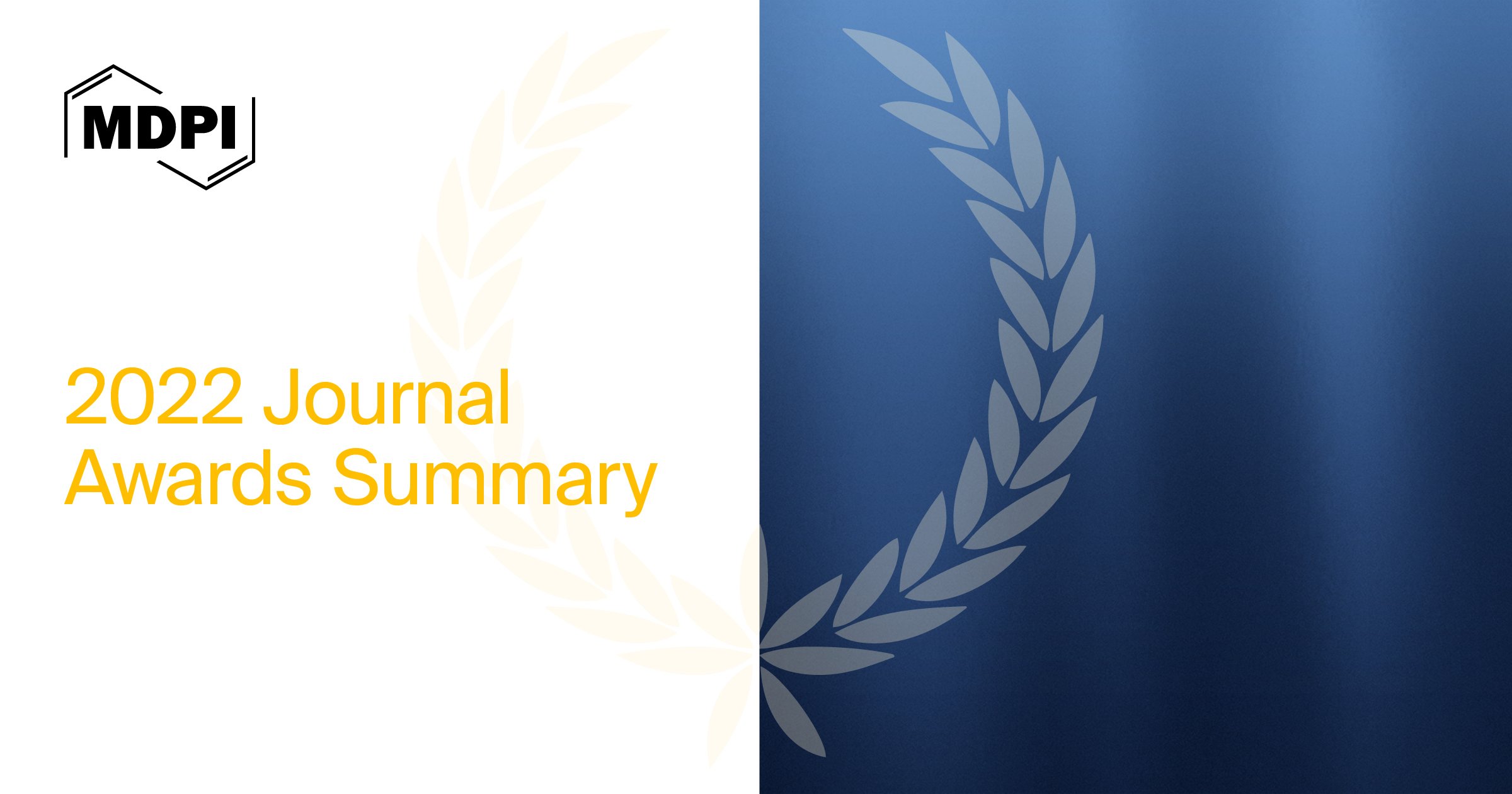
MDPI is committed to supporting the academic community, nurturing talent and advancing science. Awards are an important part of the research landscape and play a vital role in helping academics gain recognition, especially young researchers as they embark on new research avenues.
In 2022, our journals presented a total number of 394 Awards, including Travel Awards, Young Investigator Awards, Best PhD Thesis Awards, Best Paper Awards, and Outstanding Reviewer Awards, with several winners announced for some of the awards. The total prize sum amounted to just under 580,000 Swiss francs (CHF), or approximately 650,000 US dollars. Overall, more than 720 scholars were awarded.
The majority of the awards were dedicated to young researchers in relatively early stages of their careers. This encompassed 66 of the afore-mentioned Travel Awards, 60 Young Investigator Awards, supporting research projects and conference attendance, as well as 51 Best PhD Thesis Awards. Additionally, 113 Best Paper Awards were given by our journals. The selection committees were entrusted with identifying the most impactful and novel research and review articles published in their journal within a given year.
MDPI will continue its support and recognition for the academic community moving forward, sponsoring new awards across disciplines. To learn more about all the awardees and their research projects in your field of study, please visit the following pages:
To explore more MDPI awards, please click here.
5 September 2023
Electronics | Highly Cited Papers in 2022 in the Section “Bioelectronics”
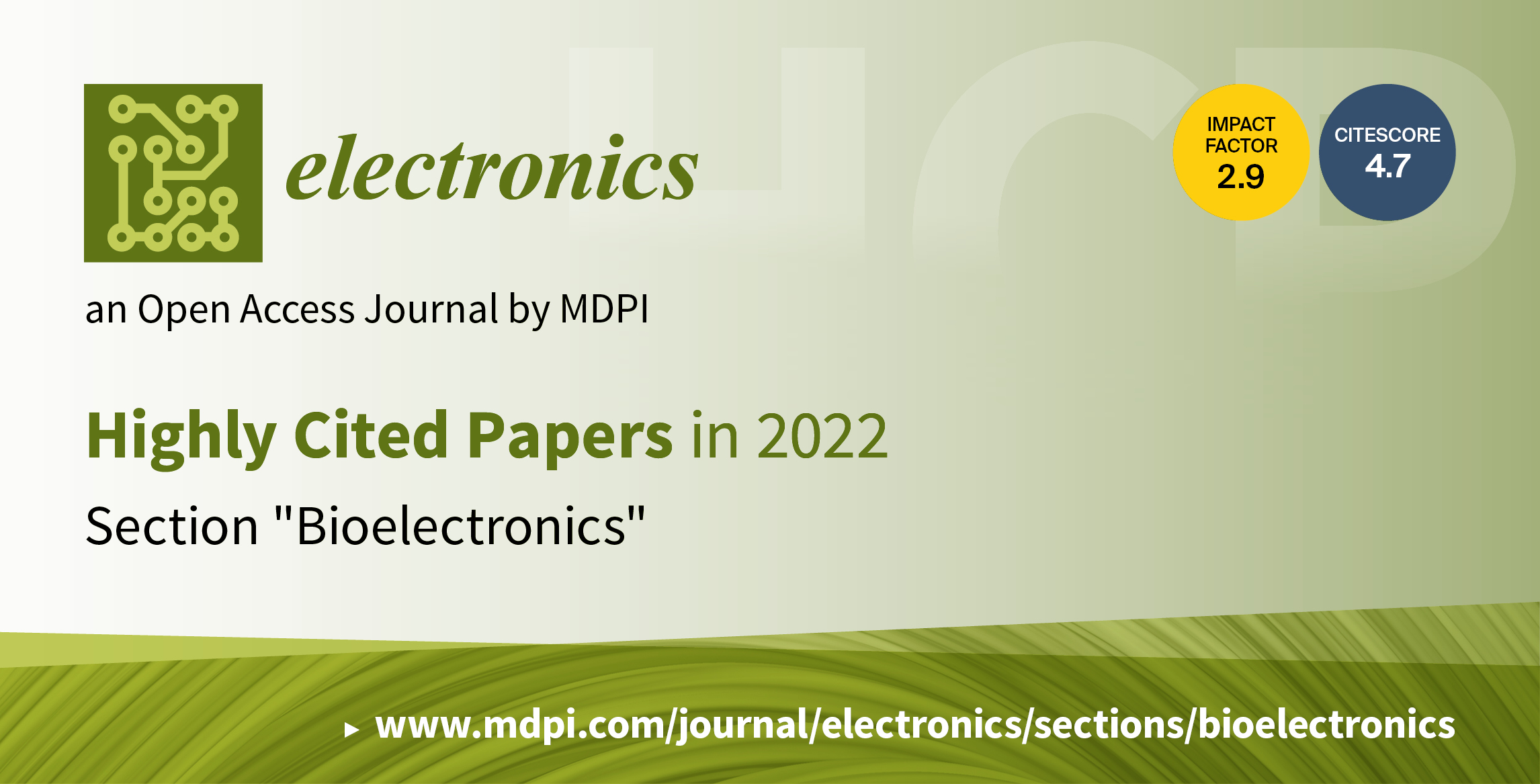
The “Bioelectronics” Section of Electronics (ISSN: 2079-9292) is dedicated to publishing high-quality articles that describe the most significant and cutting-edge research in all areas of bioelectronics sciences.
You have free and unlimited access to the full texts of all the open access articles published in our journal. We welcome you to read our most highly cited papers published in 2022 below:
1. “Depth Estimation Method for Monocular Camera Defocus Images in Microscopic Scenes”
by Yuxi Ban, Mingzhe Liu, Peng Wu, Bo Yang, Shan Liu, Lirong Yin and Wenfeng Zheng
Electronics 2022, 11(13), 2012; https://doi.org/10.3390/electronics11132012
Available online: https://www.mdpi.com/2079-9292/11/13/2012
2. “Improved Image Fusion Method Based on Sparse Decomposition”
by Xiaomei Qin, Yuxi Ban, Peng Wu, Bo Yang, Shan Liu, Lirong Yin, Mingzhe Liu and Wenfeng Zheng
Electronics 2022, 11(15), 2321; https://doi.org/10.3390/electronics11152321
Available online: https://www.mdpi.com/2079-9292/11/15/2321
3. “Wearable Circular Polarized Antennas for Health Care, 5G, Energy Harvesting, and IoT Systems”
by Albert Sabban
Electronics 2022, 11(3), 427; https://doi.org/10.3390/electronics11030427
Available online: https://www.mdpi.com/2079-9292/11/3/427
4. “A Flexible Lightweight Triboelectric Nanogenerator for Protector and Scoring System in Taekwondo Competition Monitoring”
by Fengxin Sun, Yongsheng Zhu, Changjun Jia, Bowen Ouyang, Tianming Zhao, Caixia Li, Ning Ba, Xinxing Li, Song Chen, Tongtong Che and Yupeng Mao
Electronics 2022, 11(9), 1306; https://doi.org/10.3390/electronics11091306
Available online: https://www.mdpi.com/2079-9292/11/9/1306
5. “A Review of Deep Learning Methods for Compressed Sensing Image Reconstruction and Its Medical Applications”
by Yutong Xie and Quanzheng Li
Electronics 2022, 11(4), 586; https://doi.org/10.3390/electronics11040586
Available online: https://www.mdpi.com/2079-9292/11/4/586
6. “Methods for Continuous Blood Pressure Estimation Using Temporal Convolutional Neural Networks and Ensemble Empirical Mode Decomposition”
by Kai Zhou, Zhixiang Yin ,Yu Peng and Zhiliang Zeng
Electronics 2022, 11(9), 1378; https://doi.org/10.3390/electronics11091378
Available online: https://www.mdpi.com/2079-9292/11/9/1378
7. “Improving Cuff-Less Continuous Blood Pressure Estimation with Linear Regression Analysis”
by Valeria Figini, Sofia Galici, Daniele Russo, Ilenia Centonze, Monica Visintin and Guido Pagana
Electronics 2022, 11(9), 1442; https://doi.org/10.3390/electronics11091442
Available online: https://www.mdpi.com/2079-9292/11/9/1442
8. “How to Assess the Measurement Performance of Mobile/Wearable Point-of-Care Testing Devices? A Systematic Review Addressing Sweat Analysis”
by Sarah Tonello, Giulia Abate, Michela Borghetti, Nicola Francesco Lopomo, Mauro Serpelloni and Emilio Sardini
Electronics 2022, 11(5), 761; https://doi.org/10.3390/electronics11050761
Available online: https://www.mdpi.com/2079-9292/11/5/761
9. “A 1.8 V Low-Power Low-Noise High Tunable Gain TIA for CMOS Integrated Optoelectronic Biomedical Applications”
by Guido Di Patrizio Stanchieri, Andrea De Marcellis, Graziano Battisti, Marco Faccio, Elia Palange and Ulkuhan Guler
Electronics 2022, 11(8), 1271; https://doi.org/10.3390/electronics11081271
Available online: https://www.mdpi.com/2079-9292/11/8/1271
10. “Active Mask-Box Scoring R-CNN for Sonar Image Instance Segmentation”
by Fangjin Xu, Jianxing Huang, Jie Wu and Longyu Jiang
Electronics 2022, 11(13), 2048; https://doi.org/10.3390/electronics11132048
Available online: https://www.mdpi.com/2079-9292/11/13/2048
5 September 2023
Meet the Editors | Interview with Prof. Dr. Alessandro Gabrielli—Section Editor-in-Chief of the Section “Microelectronics” in Electronics

In this captivating series, we had the privilege of interviewing the eminent Prof. Dr. Alessandro Gabrielli, Section Editor-in-Chief of the “Microelectronics” Section of Electronics (ISSN: 2079-9292). Renowned for his groundbreaking contributions in applied electronics for high-energy physics experiments, microelectronics, single-event effects (SEE), digital electronics, firmware design and general physics, Prof. Dr. Gabrielli shares his invaluable insights into the inner workings of the journal. The aim of these interviews is to offer a unique perspective on the publishing process, straight from the Section Editor-in-Chief himself.
The following is a short Q&A with Prof. Dr. Alessandro Gabrielli, who shared his vision for the journal with us, as well as his views on the research area and open access publishing:
1. Can you share some information about your academic background?
I am an Associate Professor in the Department of Physics and Astronomy at the University of Bologna, Italy. I hold a Ph.D. in physics, obtained in 2000, which I continued in the same year by becoming an Associated Member of CERN in Geneva for the ALICE and ATLAS experiments. I am the author of more than 900 peer-reviewed publications and over 50 presentations at international conferences. I was also the coordinator for the Bologna Section of the INFN since 2012 for the realization and commissioning of the ROD (ReadOut Driver) card electronics, as part of the Phase-0 upgrade of all the ATLAS Pixel Detector at CERN in Geneva.
2. What are your current interests?
My work primarily revolves around the field of physics, with applications in the design of digital systems with programmable electronic frontier devices (Xilinx UltraScale+ FPGA) for trigger architectures and data acquisition for the ATLAS experiment at CERN in Geneva. I’m also interested in track recognition techniques involving the Hough transform.
3. What made you choose to work with us, knowing that we are an open access digital publisher?
I was initially a reviewer before being asked to join the editorial team. I gladly accepted the invitation because it was a niche area in which I had expertise. I still enjoy reviewing papers and I am generally good at accepting or orienting authors towards publishing. I am happy to have the opportunity to read papers and update myself in various research fields. I believe MDPI can help young researchers gain the necessary experience to publish quality papers. Another thing that I like is that MDPI provides feedback on papers submitted to them, which is helpful for inexperienced researchers. MDPI also has programs like young research awards and travel awards to support the young researcher community.
4. What is the main challenge you face when ensuring the integrity and quality of academic publications?
I will give you a short example: Engineers are closer to the applications of the journal, and they appreciate the speed of publications, the exclusivity of having only a few authors, and the quality of the impact factor. On the other hand, physicists have a more complex system with a publishing committee and policies that prefer publishing in different journals. The main challenge is to meet the intermediate space between science, engineering, and other topics, which the journal Electronics is already doing.
5. Which research topics do you think will be of particular interest to the research community in the coming years?
I suggest focusing on specific topics like artificial intelligence for security, cyber security, or databases for artificial intelligence. The concept of cyber diplomacy is another potential hot topic. We need to be aware of the changes that are happening around us. For example, I changed the name of my electronics course to "electronics for physics of things" to reflect the current trend of changing course names in universities and add new topics such as "electronics for Internet of Things" or "Electronics for Industry 4.0."
We wish Prof. Dr. Alessandro Gabrielli every success in his current position as Section Editor-in-Chief, and we look forward to his future contributions to the journal.
1 September 2023
Electronics | Special Issue Mentor Program
We are pleased to announce the launch of a new initiative—the Electronics Special Issue Mentor Program.
This program is intended to provide an opportunity for early career scientists to enhance their editing, networking, and organizational skills and work closely with our journal to gain more editorial experience. Early career scientists who have novel ideas for new Special Issues will act as Guest Editors under the mentorship of an experienced scientist; this mentor could be a member of the Electronics Editorial Board or may be from other well-established research institutes or laboratories, etc.
If you are interested in this opportunity, please send your Special Issue proposal to the Electronics Editorial Office ([email protected]), and we will discuss the process (i.e., mentor collaboration, Special Issue topic feasibility analysis, etc.) in further detail. When the Special Issue is closed, our office will provide certificates to all of the mentors and to those who complete the program. Younger scholars will be prioritized as candidates for our journal award.
In addition to the new Special Issue Mentor Program, Electronics (ISSN: 2079-9292) will continue to welcome all Special Issue proposals based on hot research topics in the field.
31 August 2023
Meet Us at the Building Simulation 2023 (BS2023), 4–6 September 2023, Shanghai, China

A range of MDPI journals will be attending the Building Simulation 2023 (BS2023). This meeting will be held in Shanghai, China, from 4 to 6 September 2023.
At BS2023, the main themes incorporate macroscope topics concerned with building simulation regarding policy on carbon emission and control, power systems at the metropolis level, energy flow among regional cities, or even mining petascale data.
The conference/technical program will continue to bring together the interests of academics and practitioners, and on top of that, they would like to invite policymakers, in an attempt to reshape the path forward. As a tradition, the themes keep expanding the frontier of building simulation techniques, such as the simulation module from the system to the city, a better understanding of human factors, AI-assisted decision making, and seamless interoperability in modeling and design.
The following MDPI journals will be represented:
- Buildings (leading);
- Architecture;
- Sustainability;
- Electronics;
- Energies;
- Smart Cities.
If you are attending this conference, please feel free to start a conversation with us at our booth (#10-11). Our delegates look forward to meeting you in person and answering any questions that you may have. For more information about the conference, please visit https://bs2023.org/ or contact the Buildings Editorial Office at [email protected].
30 August 2023
MDPI Insights: The CEO’s Letter #3 - Sustainability and Co-opetition

Welcome to the MDPI Insights: The CEO's Letter.
In these monthly letters, I will showcase two key aspects of our work at MDPI: our commitment to empowering researchers and our determination to facilitating open scientific exchange.
Opening Thoughts

Our Commitment to Sustainability
As a pioneer in academic open access publishing since 1996, MDPI has always been dedicated to facilitating scientific exchange across all disciplines. Our approach to open science is guided by principles such as Open Access (OA), Timeliness and Efficiency, Simplicity, High-Quality Service, Flexibility, and a commitment to Sustainability. This commitment involves preserving published papers for the long term and supporting the future of science through partnerships, sponsorships, and awards.
In this edition of the CEO Letter, I will delve into MDPI’s various sustainability initiatives. As a leader in OA publishing, we are able to provide the public with a significant amount of environment-related content at no cost.
MDPI and the Sustainable Development Goals (SDGs)
In 2020, the SDG Publishers Compact was launched to accelerate implementation of the SDGs by promoting content that informs, develops, and inspires action. MDPI joined this initiative in 2021 and subsequently launched the MDPI SDG Hub in 2022, offering free access to recent research within the scope of each of the 17 SDGs. We also support authors from underrepresented communities by waiving publication charges for selected SDG-related papers. Detailed sustainability practices and supported publications are available in the report under each Goal page.
“More than 80% of MDPI articles and reviews published in 2022 relate to the Sustainable Development Goals.” [source: InCites, Accessed on 21.08.2023]
As at August 2023, MDPI boasts 14 journals dedicated to sustainability-related topics. Our first journal in this area, Sustainability, has published over 29,000 articles on the SDGs, accumulating over 240,000 citations (source: InCites, as at 1 January 2023). These journals serve as vital platforms for researchers to share insights and address environmental challenges. In addition:
MDPI journals specializing in sustainability-related topics:
- 2009: Sustainability
- 2012: Resources
- 2013: Climate
- 2014: Environments
- 2016: Recycling
- 2019: Clean Technologies
- 2020: Sustainable Chemistry
- 2021: Wind, Biomass, Conservation, Pollutants, Solar
- 2022: Waste, Microplastics
Read more:
Impactful Research

Highly Cited Articles in Sustainability
In 2022, content published in Sustainability and indexed in Journal Citation Reports (JCR) received nearly 190,000 citations. This highlights the fact that Sustainability publishes highly cited research articles related to environmental sciences and SDG-related topics such as climate action.
We are pleased to share that Sustainability received a 2022 CiteScore of 5.8, marking a 16% increase from the 2021 metric. Specifically, the CiteScore positions Sustainability as follows: Q1 (27 out of 163) in the “Environmental Science (miscellaneous)” category, and Q1 (101 out of 779) in the “Geography Planning and Development” category. For additional journal statistics, please visit here.
“Sustainability received a 2022 CiteScore of 5.8”
While MDPI journals such as Climate and Atmosphere have a distinct focus on atmosphere pollution and its impact on climate processes, journals like Sustainability, Environments, Water, Remote Sensing, and IJERPH publish content related to climate change. These journals have published over 32,300 articles related to SDG 13: Climate Action.
Highly Cited Papers in Sustainability
Below are several highly cited papers published in Sustainability over the past three years. Citation metrics are current as at 15 August 2023.
1. “A Global Assessment: Can Renewable Energy Replace Fossil Fuels by 2050?”Authors: Jerry L. Holechek, Hatim M. E. Geli, Mohammed N. Sawalhah, and Raul Valdez
Sustainability 2022, 14(8), 4792; https://doi.org/10.3390/su14084792
Citations: Crossref (97), Scopus (91), Web of Science (82), Google Scholar (125)
This paper addresses one of the most significant challenges of climate change – achieving Net Zero Carbon by 2050. The meta-analysis suggests that while difficult, this transition is possible through the concerted application of pathways, lifestyle changes, and global cooperation.
2. “Anxiety and the Ecological Crisis: An Analysis of Eco-Anxiety and Climate Anxiety”Author: Panu Pihkala
Sustainability 2020, 12(19), 7836; https://doi.org/10.3390/su12197836
Citations: Crossref (144), Scopus (121), Web of Science (159), Google Scholar (382)
This paper has received substantial media attention, including coverage by The Guardian, BBC, Vice, and CNBC. An interview with Dr. Panu Pihkala, a leading interdisciplinary researcher on the topic, can be found on MDPI’s podcast: Insight Faster, Episode 1.
3. “Impact of Climate Change on Agriculture and Its Mitigation Strategies: A Review”Authors: Gurdeep Singh Malhi, Manpreet Kaur, and Prashant Kaushik
Sustainability 2021, 13(3), 1318; https://doi.org/10.3390/su13031318
Citations: Crossref (207), Scopus (221), Web of Science (186), Google Scholar (355)
This paper reviews literature on climate change, addressing its causes, future projections, impact on agriculture, including plant physiology, growth, productivity, pest infestation, and the economic implications of mitigation strategies.
4. “Impacts of Plastic Pollution on Ecosystem Services, Sustainable Development Goals, and Need to Focus on Circular Economy and Policy Interventions”Authors: Rakesh Kumar, Anurag Verma, Arkajyoti Shome, Rama Sinha, Srishti Sinha, Prakash Kumar Jha, Ritesh Kumar, Pawan Kumar, Shubham, Shreyas Das, Prabhakar Sharma, and P. V. Vara Prasad
Sustainability 2021, 13(17), 9963; https://doi.org/10.3390/su13179963
Citations: Crossref (134), Scopus (136), Web of Science (113), Google Scholar (184)
This review aims to assess the adverse effects of plastic pollution on ecosystems, link the management of plastic with the SDGs, and propose policy measures using transdisciplinary approaches. Empowering communities to reduce plastic use is crucial. Addressing global plastic pollution is a priority.
Sustainability is an international, cross-disciplinary, open access journal that explores environmental, cultural, economic, and social sustainability of human beings. It provides a forward-looking platform for research on sustainability and sustainable development, and is published semi-monthly online by MDPI. Sustainability is affiliated with The Canadian Urban Transit Research & Innovation Consortium (CUTRIC) and The International Council for Research and Innovation in Building and Construction (CIB).
Read more:
- Testimonials: See what our editors and authors say about Sustainability.
Inside MDPI

President of Ireland Authors Editorial in MDPI Journal Sustainability
It’s a very special occasion when the president of a country takes the initiative to write an editorial for a journal. Michael D. Higgins, President of the Republic of Ireland, has contributed his insights to a forthcoming Special Issue in Sustainability:

This Special Issue, focusing on “making sustainable development happen” at grassroots levels, allows for perspectives from, and on, the major world faiths, exploring how challenges have been conceptualised and addressed, in addition to case studies of faith-based sustainability initiatives in practice.
The experience of faith institutions and communities in translating theological and moral commitments to sustainable development into action is now a topic we must examine with urgency; one on which I am so glad this Special Issue focuses.
As President of Ireland, I very much support this Special Issue of Sustainability. It is my great hope that the contents of the papers contained herein will assist in making sustainable development happen at grassroots levels across the world so that we can cooperate together, people of faith and of none, to ensure a just, inclusive and sustainable future for all on our fragile planet.
Read the completed editorial here:
Special Issue “Faith and Sustainable Development: Exploring Practice, Progress and Challenges among Faith Communities and Institutions”: Foreword by the President of Ireland
Author: Michael D. Higgins
Sustainability 2023, 15(12), 9683; https://doi.org/10.3390/su15129683
Coming Together for Science

The World Sustainability Forum 2023
The World Sustainability Forum (WSF) is a biennial MDPI event focused on sustainability. WSF 2023 marks the tenth anniversary of the conference series, taking place on 14 September. For the first time, the event will be hosted as a 24-hour conference across three locations – Singapore, Basel in Switzerland, and Toronto in Canada – alongside virtual streaming.
This unique format allows us to span three time zones, providing live coverage of critical sustainability-related topics throughout the day:
- The Singapore Hub, chaired by Professor Horn Mun Cheah and Associate Professor Renee Tan, will explore “Sustainability for Social and Community Impact”.
- The Basel Hub, chaired by Prof. Dr. Anet Režek Jambrak and Dr. Lela Mélon, will delve into “Sustainability in the industry, and at university and corporate settings”.
- The Toronto Hub, led by Dr. Umberto Berardi, will discuss “The Sustainable Built Environment”.
MDPI Sustainability Foundation: Recognizing Excellence in Sustainability Research
The MDPI Sustainability Foundation supports researchers through two sustainability-focused awards:
- The World Sustainability Award, amounting to USD 100,000, is given to senior researchers.
- The Emerging Sustainability Leader Award, valued at USD 20,000, sponsored by the journal Sustainability, is presented to early-career researchers.
The winners of the Sustainability Foundation will be formally awarded during the WSF2023 on 14 September. Interviews with the award winners and finalists are available below.
2023 World Sustainability Award Winners
Interviews with 2023 Emerging Sustainability Leader Award Finalists
- Dr. Bahareh Kamranzad
- Dr. Youjin Kim
- Dr. Julia Lohmann
As a hybrid event, WSF23 provides scholars with the option to attend in person at one of the conference sites or, for a more sustainable approach, virtually. All sessions will be recorded and archived for future access. Registration is open until 3 September 2023, with in-person and virtual tickets available here.
Read more:
Closing Thoughts
“Co-opetition”: Collaboration Plus Healthy Competition – A Visit to Elsevier
I firmly believe in fostering collaboration and at the same time promoting healthy competition within the academic publishing industry. The market offers ample room for publishers and related companies to provide valuable services and products that enrich the academic community. While MDPI is recognized for its efficient and streamlined processes –thanks to our over 6,000 colleagues, in-house tools, and initiatives that support the author journey – our ethos has always involved learning from and collaborating with other organizations.
MDPI’s Interaction with Elsevier
In January 2023, I had a brief conversation with Judy Verses, President of Global Academic and Government Markets at Elsevier, following her participation in a panel discussion at the Academic Publishers Europe event in Berlin. One of the highlights for me was Judy’s insight into the impact of research, particularly her emphasis on the role of collaboration, including policy and showing the impact of research to influence on funding decisions.
“Such collaborations drive forward-looking strategies to elevate our support for the scholarly community”

Judy and I resumed our discussion in August, when I visited Elsevier's office to review current projects, such as our recent agreement with Science Direct and the continued indexing of MDPI journals in Scopus (indexing database owned by Elsevier). We also explored possible opportunities for the future, including a potential collaboration to expand MDPI’s Scilit data infrastructure. This endeavour aims to aggregate and provide access to scholarly metadata encompassing journal articles, conference papers, books, preprints, and more. While these discussions are ongoing, the underlying principle remains that such collaborations drive forward-looking strategies to elevate our services and support for the scholarly community.
It was great that Judy and I acknowledged the merits of 'co-opetition,' a concept based of the belief that fostering cooperation alongside healthy competition can lead to shared advancements for both individual companies and the industry at large.
‘Fully OA’ Organizations Dedicated to Open Access

MDPI proudly aligns with the ‘Fully OA’ group, a collaborative initiative comprising nine organizations dedicated to Open Access. Our monthly meetings, including an OASPA representative, serve as platforms to share non-confidential information, resources, and projects. These gatherings also facilitate discussions on topics relevant to fully OA organizations. Occasionally, joint actions spring from these interactions, such as collaborative blog posts on pertinent subjects and joint statements, such as a recent response to the House Appropriations Committee.
This display of cooperation among competing entities forms a strategic alliance focused on nurturing the best interests of the OA publishing model.
As I wrap up this third edition of the CEO Letter, I encourage you to seize opportunities for collaboration and contribute to advancing our shared academic culture. As the African proverb has it, “If you want to go fast, go alone; if you want to go far, go together.”
Chief Executive Officer
MDPI AG
29 August 2023
Electronics | Highly Cited Papers in 2021–2022 in the Section “Flexible Electronics”
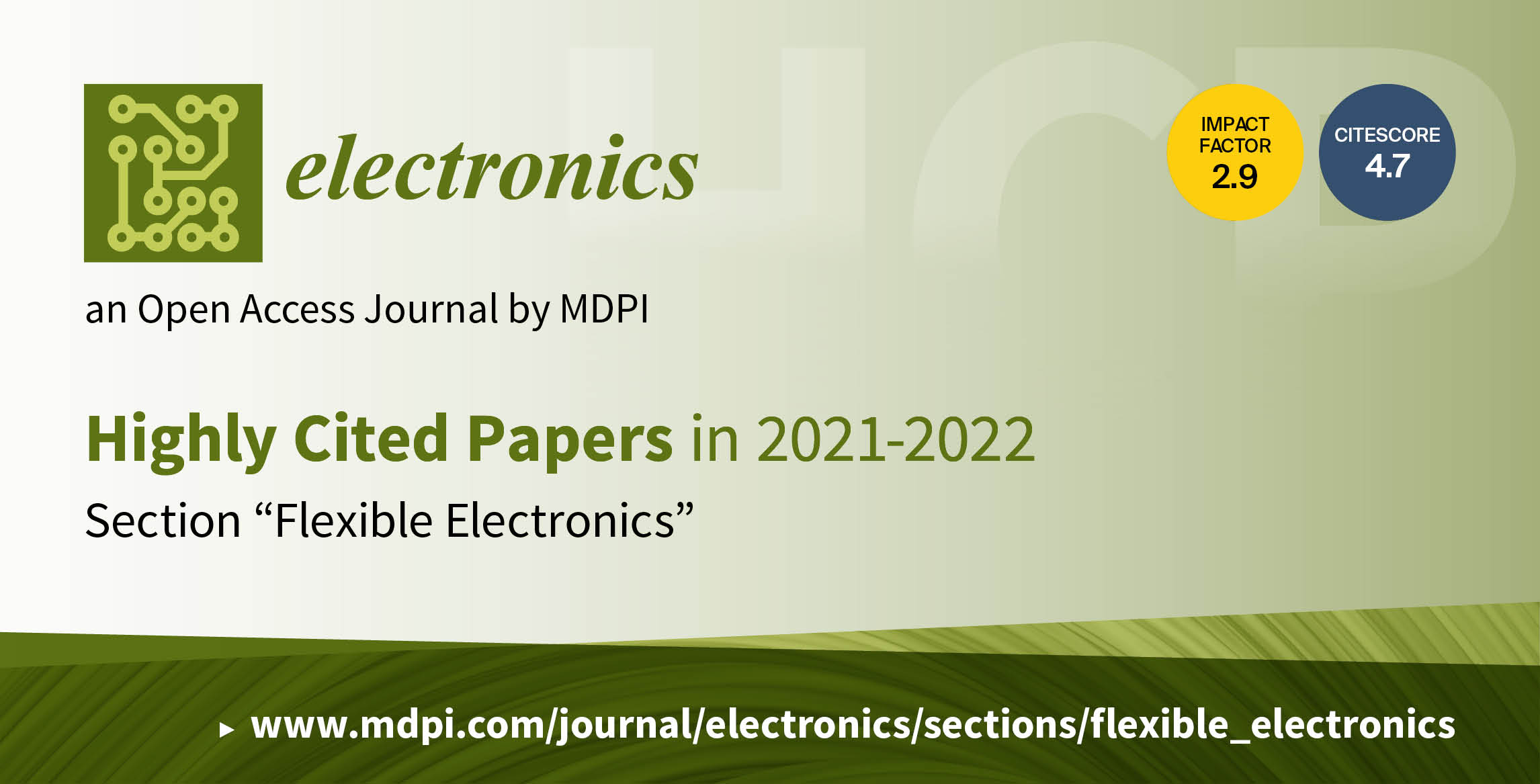
Flexible electronics have been gaining considerable attention in recent decades, not only at the academic level but also at the industrial level. The development of electronic components/systems on highly flexible and possibly conformable substrates could allow the integration of smart functionalities, such as sensing capabilities, communication units, etc., onto any type of surface (paper, fabrics, etc.), opening up a wide range of possible applications.
The aim of this Section is to provide researchers with a highly multidisciplinary platform where they can report and read about: (i) the synthesis and processing of novel materials for flexible electronics; (ii) the chemical and physical properties of materials, from small molecules to solution processable polymers; (iii) the design and fabrication of novel devices based on organic materials such as organic field effect transistors, organic solar cells, or light emitting diodes, but also memory elements, thermoelectric generators, and others; (iv) novel fabrication procedures, with particular attention towards high-throughput and cost-efficient approaches; (v) novel applications, from flexible circuits and displays to smart tags, flexible lab on chip, artificial skin, etc.
You have free and unlimited access to the full texts of all the open access articles published in our journal. We welcome you to read our most highly cited papers published in 2021 and 2022 below:
1. “Textile Triboelectric Nanogenerators with Diverse 3D-Spacer Fabrics for Improved Output Voltage”
by Dae-Hyeon Kwon, Jin-Hyuk Kwon, Jaebum Jeong, Youngju Lee, Swarup Biswas, Dong-Wook Lee, Sohee Lee, Jin-Hyuk Bae and Hyeok Kim
Electronics 2021, 10(8), 937; https://doi.org/10.3390/electronics10080937
Available online: https://www.mdpi.com/2079-9292/10/8/937
2. “Development of Miniaturized Wearable Wristband Type Surface EMG Measurement System for Biometric Authentication”
by Siho Shin, Mingu Kang, Jaehyo Jung and Youn Tae Kim
Electronics 2021, 10(8), 923; https://doi.org/10.3390/electronics10080923
Available online: https://www.mdpi.com/2079-9292/10/8/923
3. “Wash Analyses of Flexible and Wearable Printed Circuits for E-Textiles and Their Prediction of Damages”
by Shahood uz Zaman, Xuyuan Tao, Cédric Cochrane and Vladan Koncar
Electronics 2021, 10(11), 1362; https://doi.org/10.3390/electronics10111362
Available online: https://www.mdpi.com/2079-9292/10/11/1362
4. “Temperature Measurement at Curved Surfaces Using 3D Printed Planar Resistance Temperature Detectors”
by Adam Steckiewicz, Kornelia Konopka, Agnieszka Choroszucho and Jacek Maciej Stankiewicz
Electronics 2021, 10(9), 1100; https://doi.org/10.3390/electronics10091100
Available online: https://www.mdpi.com/2079-9292/10/9/1100
5. “Flexible Fluidic-Type Strain Sensors for Wearable and Robotic Applications Fabricated with Novel Conductive Liquids: A Review”
by Afaque Manzoor Soomro, Bushra Jawed, Jahangeer Badar Soomro, Jamshed Ahmed Ansari, Faheem Ahmed, Muhammad Waqas, Hina Ashraf and Suhail Almani
Electronics 2022, 11(18), 2903; https://doi.org/10.3390/electronics11182903
Available online: https://www.mdpi.com/2079-9292/11/18/2903
25 August 2023
Electronics | Top Cited Review Papers of the Editorial Team in 2021
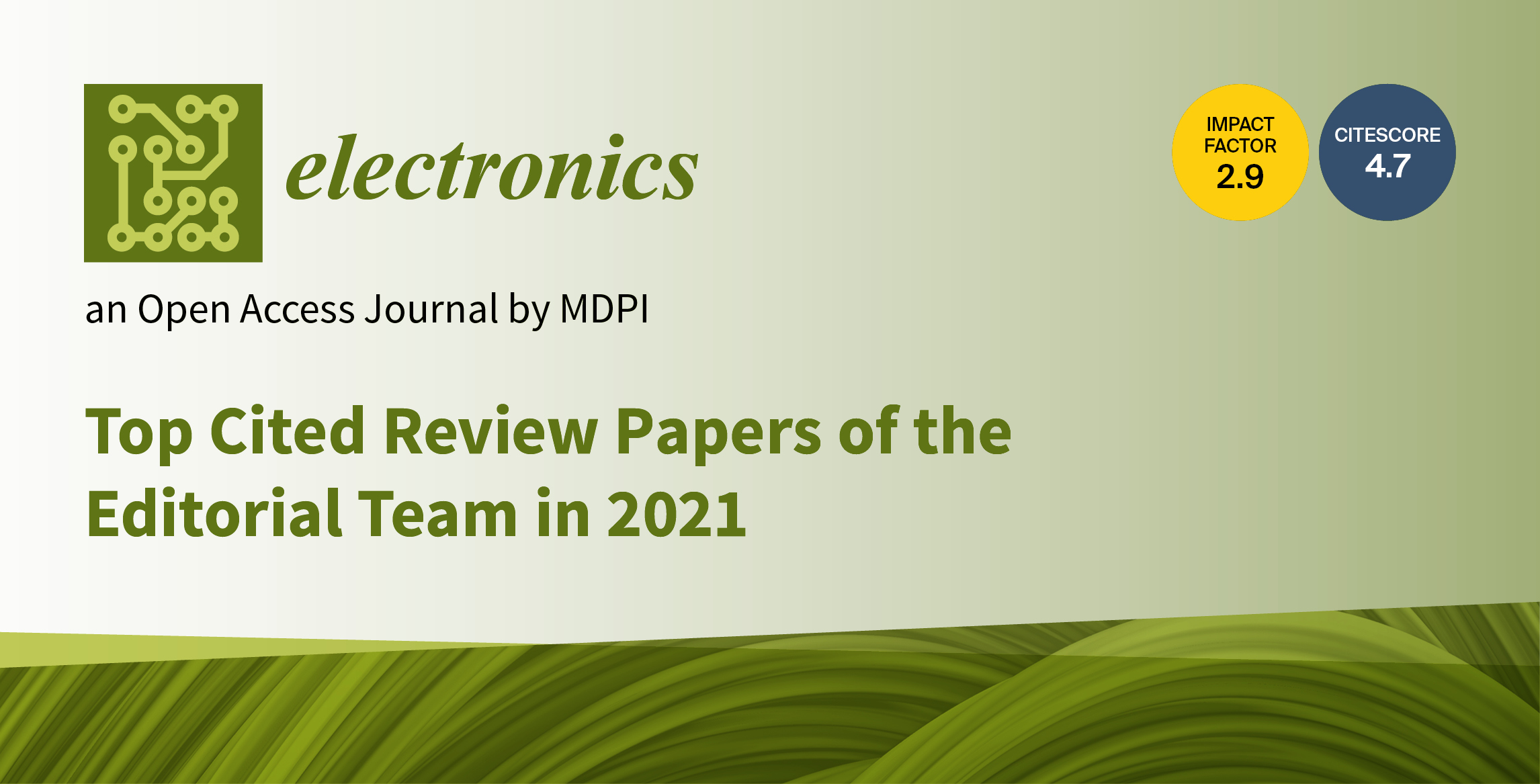
1. “A Review of Data-Driven Decision-Making Methods for Industry 4.0 Maintenance Applications”
by Alexandros Bousdekis, Katerina Lepenioti, Dimitris Apostolou and Gregoris Mentzas
Electronics 2021, 10(7), 828; https://doi.org/10.3390/electronics10070828
Available online: https://www.mdpi.com/2079-9292/10/7/828
Cited by 58 | Viewed by 9054
2. “Machine Learning-Based Data-Driven Fault Detection/Diagnosis of Lithium-Ion Battery: A Critical Review”
by Akash Samanta, Sumana Chowdhuri and Sheldon S. Williamson
Electronics 2021, 10(11), 1309; https://doi.org/10.3390/electronics10111309
Available online: https://www.mdpi.com/2079-9292/10/11/1309
Cited by 48 | Viewed by 6545
3. “Voltage Stability of Power Systems with Renewable-Energy Inverter-Based Generators: A Review”
by Nasser Hosseinzadeh, Asma Aziz, Apel Mahmud, Ameen Gargoom and Mahbub Rabbani
Electronics 2021, 10(2), 115; https://doi.org/10.3390/electronics10020115
Available online: https://www.mdpi.com/2079-9292/10/2/115
Cited by 37 | Viewed by 7344
4. “Embedded Intelligence on FPGA: Survey, Applications and Challenges”
by Kah Phooi Seng, Paik Jen Lee and Li Minn Ang
Electronics 2021, 10(8), 895; https://doi.org/10.3390/electronics10080895
https://www.mdpi.com/2079-9292/10/8/895
Cited by 35 | Viewed by 5993
5. “Estimation of Lithium-Ion Batteries State-Condition in Electric Vehicle Applications: Issues and State of the Art”
by Khaled Laadjal and Antonio J. Marques Cardoso
Electronics 2021, 10(13), 1588; https://doi.org/10.3390/electronics10131588
https://www.mdpi.com/2079-9292/10/13/1588
Cited by 33 | Viewed by 5946
6. “Machine Learning in B5G/6G Networks - State-of-the-art and Future Trends”
by Vasileios Rekkas, Sotirios Sotiroudis, Panagiotis Sarigiannidis, Shaohua Wan, George K. Karagiannidis and Sotirios K. Goudos
Electronics 2021, 10(22), 2786; https://doi.org/10.3390/electronics10222786
Available online: https://www.mdpi.com/2079-9292/10/22/2786
Cited by 30 | Viewed by 5135
7. “Review on Energy Storage Systems in Microgrids”
by Ramy Georgious, Rovan Refaat, Jorge Garcia and Ahmed A. Daoud
Electronics 2021, 10(17), 2134; https://doi.org/10.3390/electronics10172134
Available online: https://www.mdpi.com/2079-9292/10/17/2134
Cited by 26 | Viewed by 3740
8. “Machine Learning Methods for Histopathological Image Analysis: A Review”
by Jonathan de Matos, Steve Tsham Mpinda Ataky, Alceu de Souza Britto, Luiz Eduardo Soares de Oliveira and Alessandro Lameiras Koerich
Electronics 2021, 10(5), 562; https://doi.org/10.3390/electronics10050562
Available online: https://www.mdpi.com/2079-9292/10/5/562
Cited by 24 | Viewed by 3009
9. “Massive MIMO Techniques for 5G and Beyond - Opportunities and Challenges”
by David Borges, Paulo Montezuma, Rui Dinis and Marko Beko
Electronics 2021, 10(14), 1667; https://doi.org/10.3390/electronics10141667
Available online: https://www.mdpi.com/2079-9292/10/14/1667
Cited by 22 | Viewed by 6814
10. “An Overview of Wearable Piezoresistive and Inertial Sensors for Respiration Rate Monitoring”
by Roberto De Fazio, Marco Stabile, Massimo De Vittorio, Ramiro Velázquez and Paolo Visconti
Electronics 2021, 10(17), 2178; https://doi.org/10.3390/electronics10172178
Available online: https://www.mdpi.com/2079-9292/10/17/2178
Cited by 22 | Viewed by 5065
22 August 2023
Meet Us at the 13th International Conference on Indoor Positioning and Indoor Navigation (IPIN 2023), 25–28 September 2023, Nuremberg, Germany
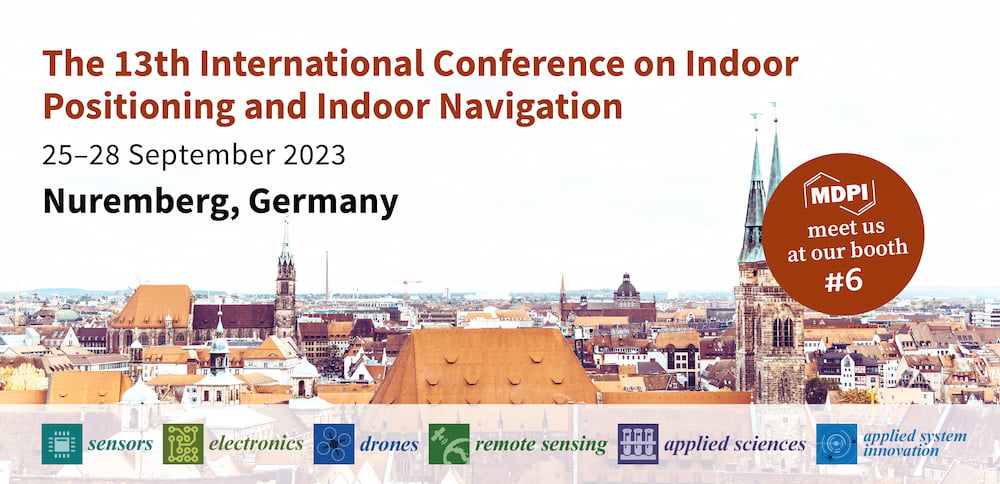
MDPI will be attending the 13th International Conference on Indoor Positioning and Indoor Navigation (IPIN 2023), held in Nuremberg, Germany, from 25 to 28 September 2023.
IPIN 2023 is organized by the Fraunhofer Institute for Integrated Circuits IIS with the support of researchers from the German Aerospace Center (DLR) and the Stuttgart University of Applied Sciences. The conference will be held on-site at Fraunhofer IIS in Nuremberg. Join the 300 expected industrial and academic experts in computer science, electronics and surveying to address this challenge. Discuss, in person, scientific and industrial matters and witness state-of-the-art systems and methods, including the uniquely challenging IPIN competition. During this conference, MDPI will welcome researchers from different backgrounds to visit and share their latest views as well as research with us.
The following MDPI journals will be represented:
If you are attending this conference, please stop by our booth. Our delegates look forward to meeting you in person to answer any questions that you may have. For more information about the conference, please visit the following link: http://www.ipin-conference.org/2023/index.html.
18 August 2023
Meet Us at the China National Computer Congress 2023 (CNCC 2023), 26–28 October 2023, Shenyang, China
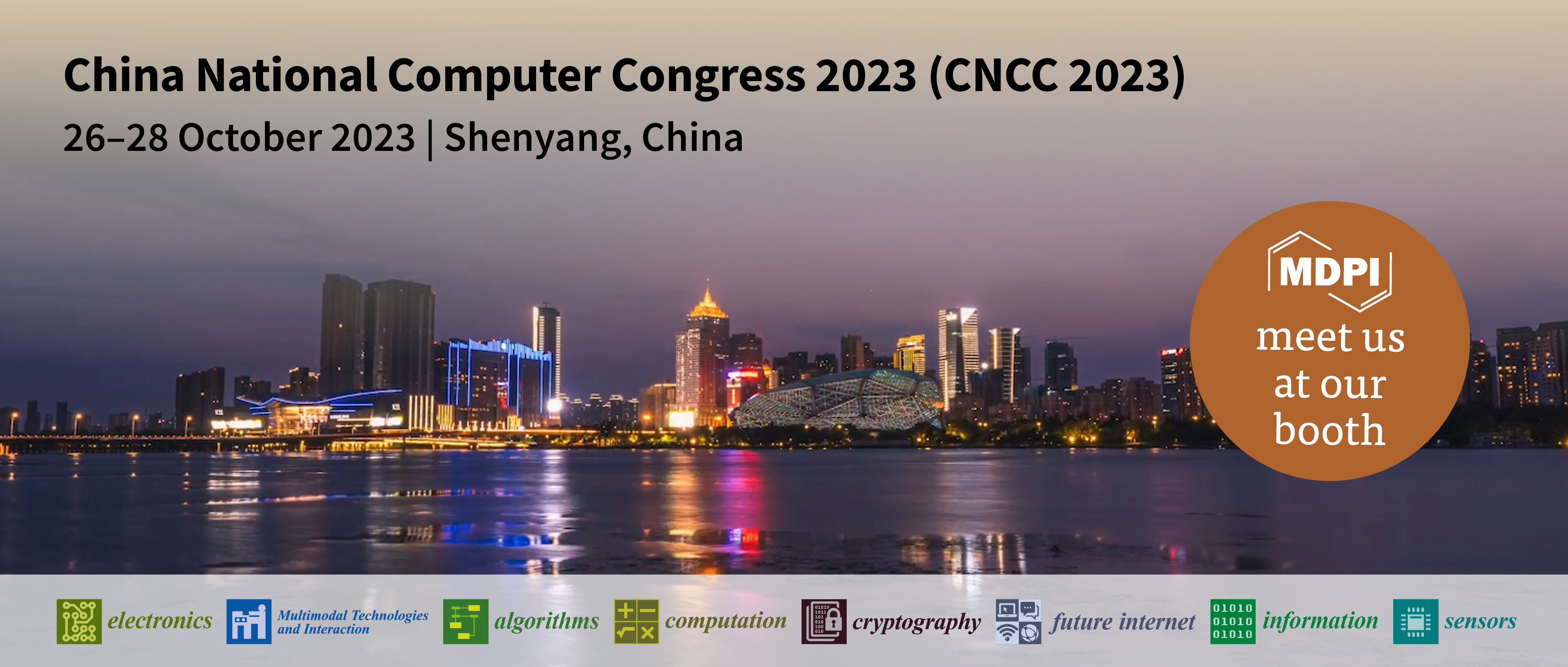
MDPI will be attending the China National Computer Congress 2023 (CNCC 2023) in Shenyang, China, which will take place from 26 to 28 October 2023. CNCC 2023 will explore the latest progress in computer science, artificial intelligence, big data drive, cloud database, quantum computer, and other related research topics. The three-day conference brought together Turing Award winners, academicians of the Chinese Academy of Sciences, top international scholars, and well-known entrepreneurs to discuss cutting-edge trends and share innovations.
The following MDPI journals will be represented:
- Electronics;
- MTI;
- Algorithms;
- Computation;
- Cryptography;
- Future Internet;
- Information;
- Sensors.
If you are attending the conference, please visit our booth. Our delegates look forward to meeting you in person and answering any questions that you may have. For more information about the conference, please visit the following link: https://ccf.org.cn/cncc2023.
16 August 2023
MDPI’s 2022 Young Investigator Awards in Engineering—Winners Announced

MDPI’s Young Investigator Awards recognize promising junior researchers, acknowledge their contributions, and enhance communication among scientists. We are proud to present the winners for the year 2022 in the engineering category. The winners were selected by the journals’ Award Evaluation Committee.
We warmly congratulate the following young investigators for their outstanding contributions. MDPI will continue to provide support and recognition to the academic community.
- Yi Zhang, University of Electronic Science and Technology, China
- Lin Ma, University of North Carolina at Charlotte, USA
- Stefano Cinti, University of Naples Federico II, Italy
- Umberto Berardi, Toronto Metropolitan University, Canada
- Benedetto Nastasi, Sapienza University of Rome, Italy
- Do Kyun Kim, Seoul National University, Republic of Korea
- Fernando Bento, University of Beira Interior, Portugal
- Goshtasp Cheraghian, Humboldt University of Berlin, Germany
- Roman Mykhailyshyn, The University of Texas at Austin, USA
- Pingan Zhu, City University of Hong Kong, China
- Viknesh Andiappan, the Swinburne University of Technology Sarawak Campus, Malaysia
- Wenzhuo Wu, Purdue University, USA
About MDPI Awards:
In order to reward the academic community, especially young researchers and enhance communication among scientists, MDPI journals regularly offer various awards to researchers in specific fields. These awards, serving as a source of inspiration and recognition, help raise the influence of talented individuals who have been credited with outstanding achievements and are making a significant contribution to the advancement of their fields.
To explore more MDPI awards, please click here.
16 August 2023
MDPI’s 2022 Travel Awards in Engineering—Winners Announced
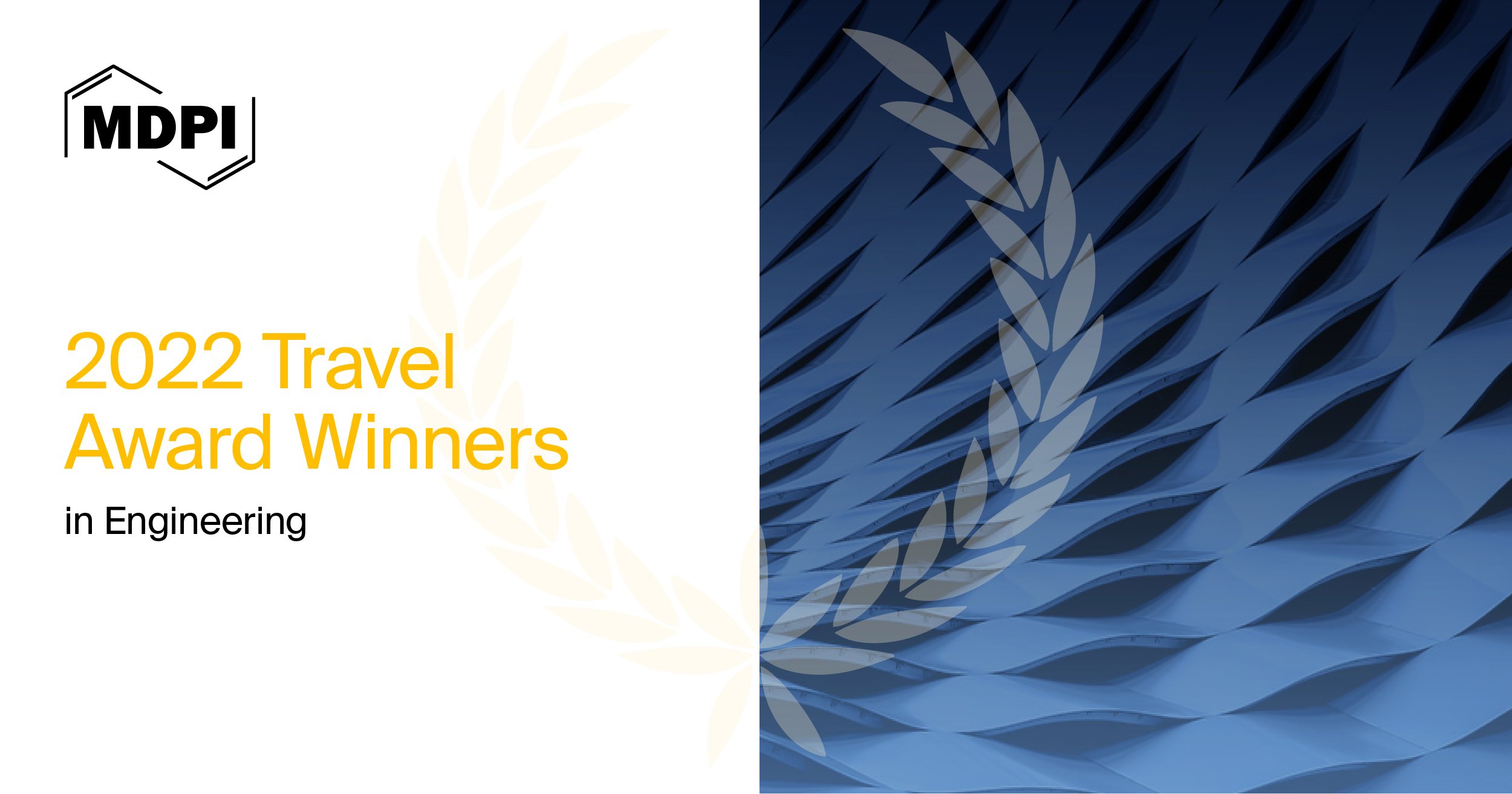
We are proud to recognize the winners of MDPI’s 2022 Travel Awards in the engineering category for their outstanding presentations.
MDPI journals regularly offer travel awards to encourage junior scientists to present their latest research at academic conferences in specific fields, which helps to increase their influence.
The winners mentioned below were carefully selected by the journal editors based on an outline of their research and the work to be presented at an academic conference.
We would like to warmly congratulate the winners of the 2022 Travel Awards and wish them the greatest success with their future research endeavors. MDPI will continue to enhance communication among scientists.
- Dmitry Kireev, University of Texas at Austin, USA
- Danilo D’Angela, University of Naples Federico II, Italy
- Jungsub Kim, Texas A&M University, USA
About MDPI Awards:
In order to reward the academic community, especially young researchers and enhance communication among scientists, MDPI journals regularly offer various awards to researchers in specific fields. These awards, serving as a source of inspiration and recognition, help raise the influence of talented individuals who have been credited with outstanding achievements and are making a significant contribution to the advancement of their fields.
To explore more MDPI awards, please click here.
16 August 2023
MDPI’s 2022 Outstanding Reviewer Awards in Engineering—Winners Announced
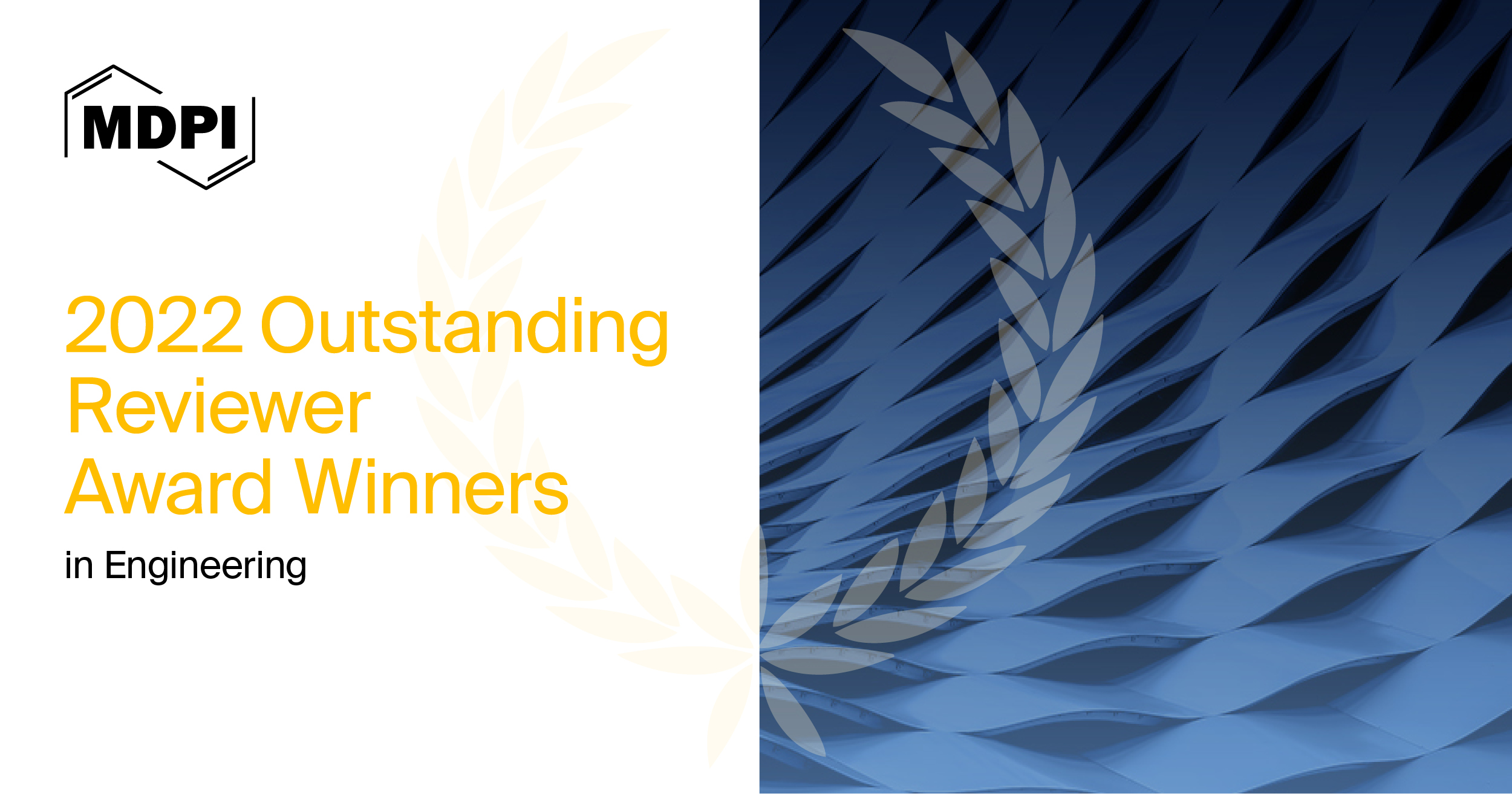
In order to acknowledge our reviewers, who demonstrate diligence, professionalism, and timeliness when generously dedicating their time to reviewing papers, MDPI journals regularly offer outstanding reviewer awards to scholars who participate in the peer review process.
We are proud to recognize the winners for the year 2022 in the engineering category for their outstanding contributions by presenting them with an Outstanding Reviewer Award.
We would like to take this opportunity to congratulate all of the winners on their achievements. MDPI will continue to provide support and recognition to the academic community.
- Chongjing Cao, Shenzhen Institute of Advanced Technology (SIAT), China
- Roman Mykhailyshyn, University of Texas at Austin, USA
- Chiranjibi Sitaula, Monash University, Australia
- Davide Forcellini, 1University of Auckland, New Zealand; 2University of San Marino, San Marino
- Giuseppe Ciaburro, Università degli Studi della Campania Luigi Vanvitelli, Italy
- Yang Song, Norwegian University of Science and Technology, Norway
- Xiaoming Liu, Beijing Institute of Technology, China
- Carlos Torres-Torres, Instituto Politécnico Nacional, Mexico
- Paolo Blecich, University of Rijeka, Croatia
- Łukasz Ścislo, Cracow University of Technology, Poland
- Giorgio Sonnino, Université Libre de Bruxelles (ULB), Belgium
- Luiz Antonio Alcântara Pereira, Federal University of Itajubá (UNIFEI), Brazil
- Cagatay Iris, University of Liverpool, United Kingdom
- Chiemela Victor Amaechi, Lancaster University, United Kingdom
- Denis Istrati, University of Nevada, USA
- Mai The Vu, Sejong University, Korea
- Mina Tadros, University of Lisbon, Portugal
- Chao Fu, Northwestern Polytechnical University, China
- Eduardo Suárez, Universidade de Vigo, Spain
- Jordi-Roger Riba, Universitat Politècnica de Catalunya, Spain
- Catalin Ianasi, Institute of Chemistry “Coriolan Dragulescu”, Romania
- Daniel Ferrández, Polytechnic University of Madrid, Spain
- Kamil Krzysztof Roman, Institute of Technology and Life Sciences in Warsaw, Poland
- Marcin Dębowski, University of Warmia and Mazury in Olsztyn, Poland
- Mariusz Szymanek, University of Life Sciences in Lublin, Poland
- Agustin L. Herrera-May, Universidad Veracruzana, Mexico
- Chiachung Chen, National Chung Hsing University, Taiwan
- Jae-Myung Ryu, Kumoh National Institute of Technology, Republic of Korea
- Sebastian Głowiński, Koszalin Technical University, Poland
- Wei Zhou, University of Waterloo, Canada
About MDPI Awards:
In order to reward the academic community, especially young researchers and enhance communication among scientists, MDPI journals regularly offer various awards to researchers in specific fields. These awards, serving as a source of inspiration and recognition, help raise the influence of talented individuals who have been credited with outstanding achievements and are making a significant contribution to the advancement of their fields.
To explore more MDPI awards, please click here.
16 August 2023
MDPI’s 2022 Best PhD Thesis Awards in Engineering—Winners Announced
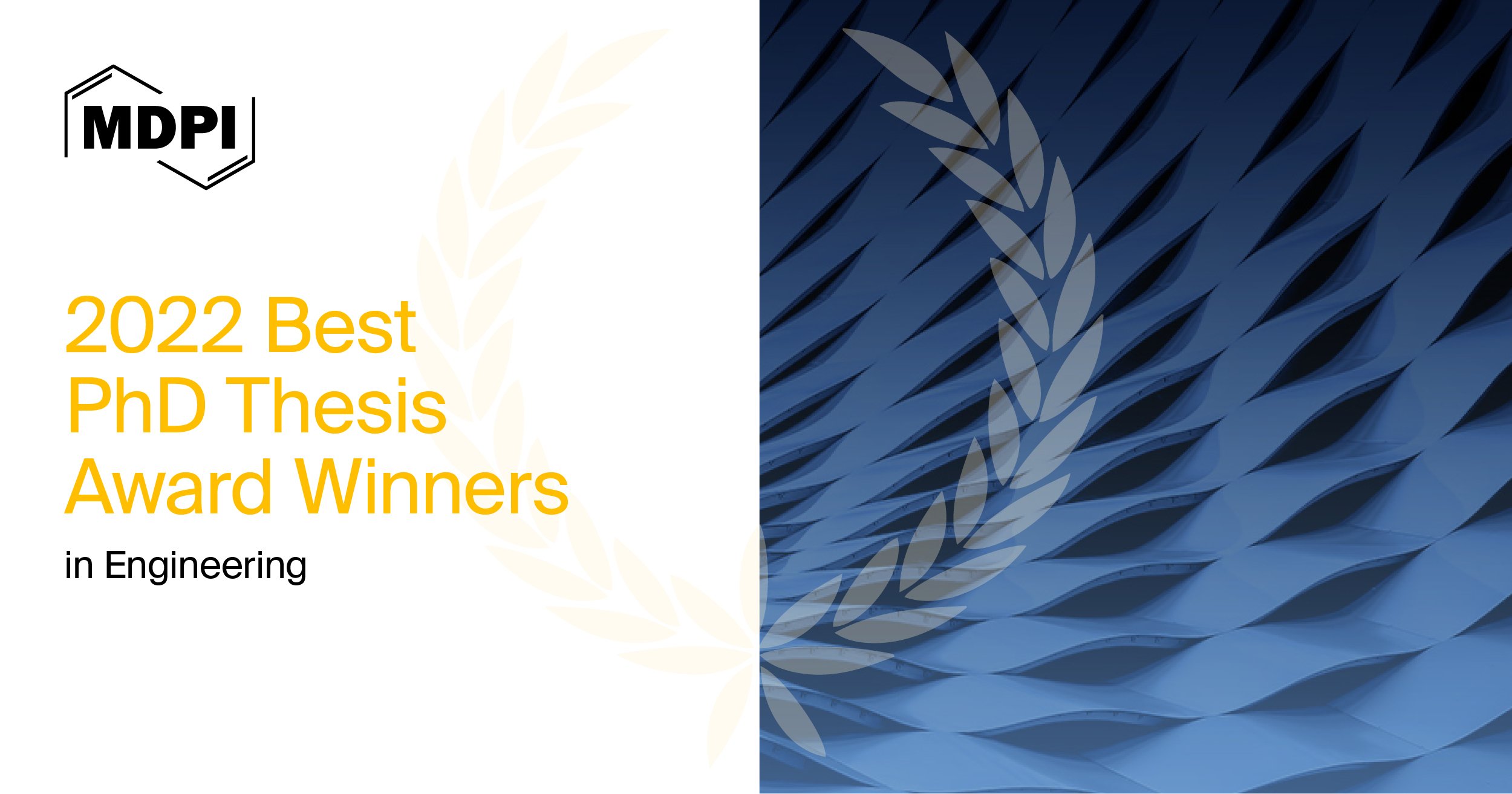
MDPI’s Best PhD Thesis Awards are presented to recognize the young scholars who are judged to have completed the most outstanding PhD thesis in their field of research and to encourage them to continue their excellent work and further contributions to their field.
We would like to warmly congratulate the winners of the 2022 Best PhD Thesis Awards and wish them success with their future research endeavors. MDPI will continue to enhance communication among scientists.
JMSE:
- “Mathematical Modelling of Wave-Induced Motions and Loads on Moored Offshore Structures”
by Changqing Jiang, University of Duisburg-Essen, Germany
- “Experimental Characterization of Frictional Hysteresis for Nonlinear Dynamic Analysis of Jointed Structures”
by Alfredo Fantetti, Imperial College London, UK
- “Sustainable Cultivation of Microalgae Biomass for Bioenergy Production”
by Angela Paul Peter, Xiamen University Malaysia, Malaysia
- “Studying Protein Function with Fluorescent Nanoantennas”
by Scott G. Harroun, Université de Montréal, Canada
About MDPI Awards:
In order to reward the academic community, especially young researchers and enhance communication among scientists, MDPI journals regularly offer various awards to researchers in specific fields. These awards, serving as a source of inspiration and recognition, help raise the influence of talented individuals who have been credited with outstanding achievements and are making a significant contribution to the advancement of their fields.
To explore more MDPI awards, please click here.
16 August 2023
MDPI’s Best Paper Awards in Engineering—Winners in 2022 Announced
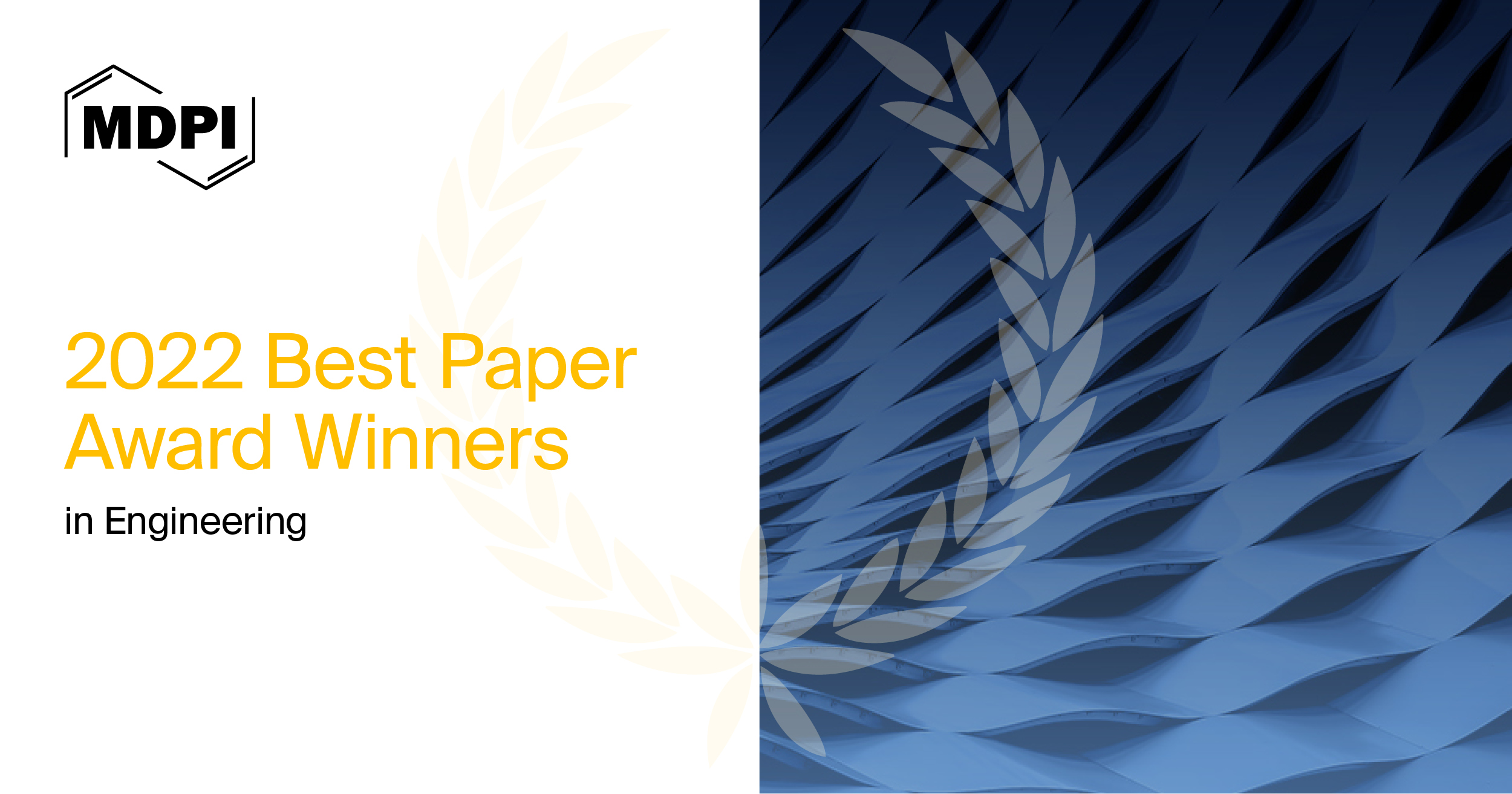
The purpose of our Best Paper Awards is to promote and recognize the most impactful contributions published within MDPI journals.
The editors of each journal carefully selected reviews and research papers through a rigorous judging process based on criteria such as scientific merit, overall impact, and the quality of presentation of the papers published in the journal.
We are honored to present the winners announced for the year 2022 in the engineering category, who were selected from extensive competition, and congratulate the authors for their outstanding scientific publications. MDPI will continue to provide support and recognition to the academic community.
- “Two-Way and Multiple-Way Shape Memory Polymers for Soft Robotics: An Overview”
by Giulia Scalet
Actuators 2020, 9(1), 10; https://doi.org/10.3390/act9010010
- “Low-Cost, Open-Source Mechanical Ventilator with Pulmonary Monitoring for COVID-19 Patients”
by Leonardo Acho, Alessandro N. Vargas and Gisela Pujol-Vázquez
Actuators 2020, 9(3), 84; https://doi.org/10.3390/act9030084
- “Styrenic-Rubber Dielectric Elastomer Actuator with Inherent Stiffness Compensation”
by Giacomo Moretti, Luca Sarina, Lorenzo Agostini, Rocco Vertechy, Giovanni Berselli and Marco Fontana
Actuators 2020, 9(2), 44; https://doi.org/10.3390/act9020044
- “Chromium(III) Removal from Wastewater by Chitosan Flakes”
by Loris Pietrelli, Iolanda Francolini, Antonella Piozzi, Maria Sighicelli, Ilaria Silvestro and Marco Vocciante
Appl. Sci. 2020, 10(6), 1925; https://doi.org/10.3390/app10061925
- “Unravelling the Environmental Application of Biochar as Low-Cost Biosorbent: A Review”
by Antía Fdez-Sanromán, Marta Pazos, Emilio Rosales and María Angeles Sanromán
Appl. Sci. 2020, 10(21), 7810; https://doi.org/10.3390/app10217810
- “Observation of Potential Contaminants in Processed Biomass Using Fourier Transform Infrared Spectroscopy”
by Jingshun Zhuang, Mi Li, Yunqiao Pu, Arthur Jonas Ragauskas and Chang Geun Yoo
Appl. Sci. 2020, 10(12), 4345; https://doi.org/10.3390/app10124345
- “Drug-Resistant Tuberculosis 2020: Where We Stand”
by Angelo Iacobino, Lanfranco Fattorini and Federico Giannoni
Appl. Sci. 2020, 10(6), 2153; https://doi.org/10.3390/app10062153
- “Real-Time Remote Maintenance Support Based on Augmented Reality (AR)”
by Dimitris Mourtzis, Vasileios Siatras and John Angelopoulos
Appl. Sci. 2020, 10(5), 1855; https://doi.org/10.3390/app10051855
- “Dielectric Elastomer Actuator for Soft Robotics Applications and Challenges”
by Jung-Hwan Youn, Seung Mo Jeong, Geonwoo Hwang, Hyunwoo Kim, Kyujin Hyeon, Jihwan Park and Ki-Uk Kyung
Appl. Sci. 2020, 10(2), 640; https://doi.org/10.3390/app10020640
- “Low-Cost Biochar Adsorbents for Water Purification Including Microplastics Removal”
by Virpi Siipola, Stephan Pflugmacher, Henrik Romar, Laura Wendling and Pertti Koukkari
Appl. Sci. 2020, 10(3), 788; https://doi.org/10.3390/app10030788
- “Microstructure and Mechanical Properties of AISI 316L Produced by Directed Energy Deposition-Based Additive Manufacturing: A Review”
by Abdollah Saboori, Alberta Aversa, Giulio Marchese, Sara Biamino, Mariangela Lombardi and Paolo Fino
Appl. Sci. 2020, 10(9), 3310; https://doi.org/10.3390/app10093310
- “Humans-as-a-Sensor for Buildings—Intensive Longitudinal Indoor Comfort Models”
by Prageeth Jayathissa, Matias Quintana, Mahmoud Abdelrahman and Clayton Miller
Buildings 2020, 10(10), 174; https://doi.org/10.3390/buildings10100174
- “Circular Building Design: An Analysis of Barriers and Drivers for a Circular Building Sector”
by Jouri Kanters
Buildings 2020, 10(4), 77; https://doi.org/10.3390/buildings10040077
- “Building Information Modelling (BIM) to Enhance Occupational Safety in Construction Activities: Research Trends Emerging from One Decade of Studies”
by Mario Fargnoli and Mara Lombardi
Buildings 2020, 10(6), 98; https://doi.org/10.3390/buildings10060098
- “A SWOT Analysis of the Use of BIM Technology in the Polish Construction Industry”
by Krzysztof Zima, Edyta Plebankiewicz and Damian Wieczorek
Buildings 2020, 10(1), 16; https://doi.org/10.3390/buildings10010016
- “Durability and Climate Change—Implications for Service Life Prediction and the Maintainability of Buildings”
by Michael A. Lacasse, Abhishek Gaur and Travis V. Moore
Buildings 2020, 10(3), 53; https://doi.org/10.3390/buildings10030053
- “Worker 4.0: The Future of Sensored Construction Sites”
by Diego Calvetti, Pedro Mêda, Miguel Chichorro Gonçalves and Hipólito Sousa
Buildings 2020, 10(10), 169; https://doi.org/10.3390/buildings10100169
- “A Review of Topology Optimisation for Fluid-Based Problems”
by Joe Alexandersen and Casper Schousboe Andreasen
Fluids 2020, 5(1), 29; https://doi.org/10.3390/fluids5010029
- “On the Deterministic Prediction of Water Waves”
by Marco Klein, Matthias Dudek, Günther F. Clauss, Sören Ehlers, Jasper Behrendt, Norbert Hoffman and Miguel Onorato
Fluids 2020, 5(1), 9; https://doi.org/10.3390/fluids5010009
- “On the Effect of Block Roughness in Ogee Spillways with Flip Buckets”
by Rasoul Daneshfaraz, Amir Ghaderi, Aliakbar Akhtari, Silvia Di Francesco
Fluids 2020, 5(4), 182; https://doi.org/10.3390/fluids5040182
- “Marine Application of Fiber Reinforced Composites: A Review”
by Felice Rubino, Antonio Nisticò, Fausto Tucci and Pierpaolo Carlone
J. Mar. Sci. Eng. 2020, 8(1), 26; https://doi.org/10.3390/jmse8010026
- “Numerical Simulation of Large Wave Heights from Super Typhoon Nepartak (2016) in the Eastern Waters of Taiwan”
by Shih-Chun Hsiao, Hongey Chen, Han-Lun Wu, Wei-Bo Chen, Chih-Hsin Chang, Wen-Dar Guo, Yung-Ming Chen and Lee-Yaw Lin
J. Mar. Sci. Eng. 2020, 8(3), 217; https://doi.org/10.3390/jmse8030217
- “Development of Deterministic Artificial Intelligence for Unmanned Underwater Vehicles (UUV)”
by Timothy Sands
J. Mar. Sci. Eng. 2020, 8(8), 578; https://doi.org/10.3390/jmse8080578
- “Effective Application of Solid Lubricants in Spacecraft Mechanisms”
by Jeffrey R. Lince
Lubricants 2020, 8(7), 74; https://doi.org/10.3390/lubricants8070074
- “High-Rate Laser Surface Texturing for Advanced Tribological Functionality”
by Jörg Schille, Lutz Schneider, Stefan Mauersberger, Sylvia Szokup, Sören Höhn, Johannes Pötschke, Friedemann Reiß, Erhard Leidich and Udo Löschner
Lubricants 2020, 8(3), 33; https://doi.org/10.3390/lubricants8030033
- “Size Sorting of Exosomes by Tuning the Thicknesses of the Electric Double Layers on a Micro-Nanofluidic Device”
by Satoko Fujiwara, Kyojiro Morikawa, Tatsuro Endo, Hideaki Hisamoto and Kenji Sueyoshi
Micromachines 2020, 11(5), 458; https://doi.org/10.3390/mi11050458
- “Additive Manufacturing of Sub-Micron to Sub-mm Metal Structures with Hollow AFM Cantilevers”
by Giorgio Ercolano, Cathelijn van Nisselroy, Thibaut Merle, János Vörös, Dmitry Momotenko, Wabe W. Koelmans and Tomaso Zambelli
Micromachines 2020, 11(1), 6; https://doi.org/10.3390/mi11010006
- “A Robotic Biopsy Endoscope with Magnetic 5-DOF Locomotion and a Retractable Biopsy Punch”
by Manh Cuong Hoang, Viet Ha Le, Kim Tien Nguyen, Van Du Nguyen, Jayoung Kim, Eunpyo Choi, Seungmin Bang, Byungjeon Kang, Jong-Oh Park and Chang-Sei Kim
Micromachines 2020, 11(1), 98; https://doi.org/10.3390/mi11010098
- “Development of Fully Flexible Tactile Pressure Sensor with Bilayer Interlaced Bumps for Robotic Grasping Applications”
by Lingfeng Zhu, Yancheng Wang, Deqing Mei and Chengpeng Jiang
Micromachines 2020, 11(8), 770; https://doi.org/10.3390/mi11080770
- “A mm-Sized Free-Floating Wireless Implantable Opto-Electro Stimulation Device”
by Yaoyao Jia, Yan Gong, Arthur Weber, Wen Li and Maysam Ghovanloo
Micromachines 2020, 11(6), 621; https://doi.org/10.3390/mi11060621
- “Advanced Bioethanol Production: From Novel Raw Materials to Integrated Biorefineries”
by Aleta Duque, Cristina Álvarez, Pablo Doménech, Paloma Manzanares and Antonio D. Moreno
Processes 2021, 9(2), 206; https://doi.org/10.3390/pr9020206
- “An Overview on Fault Diagnosis, Prognosis and Resilient Control for Wind Turbine Systems”
by Zhiwei Gao and Xiaoxu Liu
Processes 2021, 9(2), 300; https://doi.org/10.3390/pr9020300
- “Role of Microalgae in the Recovery of Nutrients from Pig Manure”
by Ana Sánchez-Zurano, Martina Ciardi, Tomás Lafarga, José María Fernández-Sevilla, Ruperto Bermejo and Emilio Molina-Grima
Processes 2021, 9(2), 203; https://doi.org/10.3390/pr9020203
- “Applying Lean Six Sigma Methodology to a Pharmaceutical Manufacturing Facility: A Case Study”
by Brian Byrne, Olivia McDermott and John Noonan
Processes 2021, 9(3), 550; https://doi.org/10.3390/pr9030550
- “YOLO-Tomato: A Robust Algorithm for Tomato Detection Based on YOLOv3”
by Guoxu Liu, Joseph Christian Nouaze, Philippe Lyonel Touko Mbouembe and Jae Ho Kim
Sensors 2020, 20(7), 2145; https://doi.org/10.3390/s20072145
- “Piezoelectric Energy Harvesting Solutions: A Review”
by Corina Covaci and Aurel Gontean
Sensors 2020, 20(12), 3512; https://doi.org/10.3390/s20123512
- “Applications of Graphene Quantum Dots in Biomedical Sensors”
by Bhargav D. Mansuriya and Zeynep Altintas
Sensors 2020, 20(4), 1072; https://doi.org/10.3390/s20041072
WEVJ:
- “Beyond the State of the Art of Electric Vehicles: A Fact-Based Paper of the Current and Prospective Electric Vehicle Technologies”
by Joeri Van Mierlo, Maitane Berecibar, Mohamed El Baghdadi, Cedric De Cauwer, Maarten Messagie, Thierry Coosemans, Valéry Ann Jacobs and Omar Hegazy
World Electr. Veh. J. 2021, 12(1), 20; https://doi.org/10.3390/wevj12010020
- “An Overview of Parameter and Cost for Battery Electric Vehicles”
by Adrian König, Lorenzo Nicoletti, Daniel Schröder, Sebastian Wolff, Adam Waclaw and Markus Lienkamp
World Electr. Veh. J. 2021, 12(1), 21; https://doi.org/10.3390/wevj12010021
About MDPI Awards:
In order to reward the academic community, especially young researchers and enhance communication among scientists, MDPI journals regularly offer various awards to researchers in specific fields. These awards, serving as a source of inspiration and recognition, help raise the influence of talented individuals who have been credited with outstanding achievements and are making a significant contribution to the advancement of their fields.
To explore more MDPI awards, please click here.
15 August 2023
Electronics | Highly Cited Papers in 2021 in the Section “Bioelectronics”
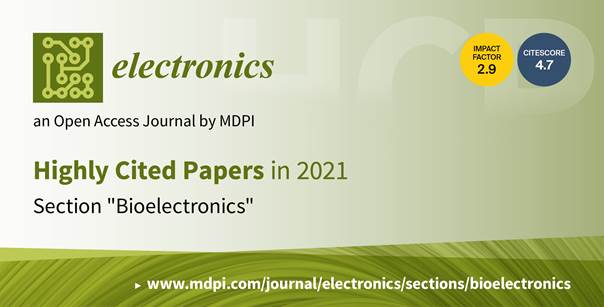
The primary focus of the “Bioelectronics” Section are the topics that seek to exploit electronics knowledge and execution in the field of biology and medicine for health wellness with research efforts that cross disciplines such as chemistry, life science, physics, electrical engineering, and materials science. Bioelectronic research works in a wide context, encompassing, for example, biosensors, bionics and biomaterials, DNA chips, lab-on-a-chip, innovative devices, or advanced signal processes for the prevention, diagnosis, and treatment of physical and mental diseases, robotic devices for patient rehabilitation, bioelectromagnetics, artificial intelligence for improving health, conductive polymers, organic semiconductors, carbon nanotubes, graphene, wearable electronics, and implantable electronics, just to cite a few.
As they are of an open access format, you have free and unlimited access to the full text of all the articles published in our journal. We welcome you to read our most highly cited papers published in 2021 below:
1. “CNN Variants for Computer Vision: History, Architecture, Application, Challenges and Future Scope”
by Dulari Bhatt, Chirag Patel, Hardik Talsania, Jigar Patel, Rasmika Vaghela, Sharnil Pandya, Kirit Modi and Hemant Ghayvat
Electronics 2021, 10(20), 2470; https://doi.org/10.3390/electronics10202470
Available online: https://www.mdpi.com/2079-9292/10/20/2470
2. “Automated Workers’ Ergonomic Risk Assessment in Manual Material Handling Using sEMG Wearable Sensors and Machine Learning”
by Srimantha E. Mudiyanselage, Phuong Hoang Dat Nguyen, Mohammad Sadra Rajabi and Reza Akhavian
Electronics 2021, 10(20), 2558; https://doi.org/10.3390/electronics10202558
Available online: https://www.mdpi.com/2079-9292/10/20/2558
3. “GaborPDNet: Gabor Transformation and Deep Neural Network for Parkinson’s Disease Detection Using EEG Signals”
by Hui Wen Loh, Chui Ping Ooi, Elizabeth Palmer, Prabal Datta Barua, Sengul Dogan, Turker Tuncer, Mehmet Baygin and U. Rajendra Acharya
Electronics 2021, 10(14), 1740; https://doi.org/10.3390/electronics10141740
Available online: https://www.mdpi.com/2079-9292/10/14/1740
4. “Integration and Applications of Fog Computing and Cloud Computing Based on the Internet of Things for Provision of Healthcare Services at Home”
by Muhammad Ijaz, Gang Li, Ling Lin, Omar Cheikhrouhou, Habib Hamam and Alam Noor
Electronics 2021, 10(9), 1077; https://doi.org/10.3390/electronics10091077
Available online: https://www.mdpi.com/2079-9292/10/9/1077
5. “State-of-the-Art Optical Devices for Biomedical Sensing Applications—A Review”
by N. L. Kazanskiy, S. N. Khonina, M. A. Butt, A. Kaźmierczak and R. Piramidowicz
Electronics 2021, 10(8), 973; https://doi.org/10.3390/electronics10080973
Available online: https://www.mdpi.com/2079-9292/10/8/973
6. “An Overview of Wearable Piezoresistive and Inertial Sensors for Respiration Rate Monitoring”
by Roberto De Fazio, Marco Stabile, Massimo De Vittorio, Ramiro Velázquez and Paolo Visconti
Electronics 2021, 10(17), 2178; https://doi.org/10.3390/electronics10172178
Available online: https://www.mdpi.com/2079-9292/10/17/2178
7. “Multiclass ECG Signal Analysis Using Global Average-Based 2-D Convolutional Neural Network Modeling”
by Muhammad Wasimuddin, Khaled Elleithy, Abdelshakour Abuzneid, Miad Faezipour and Omar Abuzaghleh
Electronics 2021, 10(2), 170; https://doi.org/10.3390/electronics10020170
Available online: https://www.mdpi.com/2079-9292/10/2/170
8. “Smart E-Textile Systems: A Review for Healthcare Applications”
by Shahood uz Zaman, Xuyuan Tao, Cedric Cochrane and Vladan Koncar
Electronics 2022, 11(1), 99; https://doi.org/10.3390/electronics11010099
Available online: https://www.mdpi.com/2079-9292/11/1/99
9. “Innovative IoT Solutions and Wearable Sensing Systems for Monitoring Human Biophysical Parameters: A Review”
by Esteban Piacentino, Massimo De Vittorio and Paolo Visconti
Electronics 2021, 10(4), 389; https://doi.org/10.3390/electronics10040389
Available online: https://www.mdpi.com/2079-9292/10/4/389
10. “Deep Learning Methods for Classification of Certain Abnormalities in Echocardiography”
by Imayanmosha Wahlang, Arnab Kumar Maji, Goutam Saha, Prasun Chakrabarti, Michal Jasinski, Zbigniew Leonowicz and Elzbieta Jasinska
Electronics 2021, 10(4), 495; https://doi.org/10.3390/electronics10040495
Available online: https://www.mdpi.com/2079-9292/10/4/495
14 August 2023
Electronics | Call for Special Issue Proposals and Recruiting Guest Editors
Electronics (ISSN: 2079-9292) is an international, peer-reviewed, and open access journal on the science of electronics and its applications. The journal is indexed within Scopus, SCIE (Web of Science), CAPlus/SciFinder, Inspec, and other databases (https://www.mdpi.com/journal/electronics/indexing).
The Electronics Editorial Office is pleased to announce an open call for Special Issue proposals. Special Issues are a space where authors can present their research results with other relevant and exciting work, where readers can find a series of peer-reviewed research papers of interest, and where scholars can gain new knowledge in a research area or even find new collaborators.
Please feel free to write to the Electronics Editorial Office ([email protected]) with Special Issue topics that you wish to see in the journal and/or a proposal for a Special Issue if you are interested in becoming a Guest Editor of Electronics. The Editorial Office will respond to you as soon as possible.
The duties of Guest Editors are as follows:
- Defining the scope of the Special Issue;
- Inviting scholars to submit papers to the Special Issue;
- Promoting the Special Issue from your side;
- Making decisions for articles submitted to the Special Issue.
The benefits of being a Guest Editor include the following:
- A certificate of recognition as a Guest Editor of Electronics;
- A waiver for publication in Electronics;
- A printed book of the Special Issue if a sufficient number of papers is collected;
- An ideal venue for networking and communicating with scholars in the research field. The relationships that you develop will last beyond the publication of your Special Issue, establishing a network for future collaboration.
The Electronics Editorial Office will be responsible for establishing the Special Issue’s website, organizing peer review and author revisions, copy editing and English editing, Special Issue promotion, etc.
Please do not hesitate to contact us ([email protected]) for further details and clarification. We look forward to receiving your proposals.
Electronics Editorial Office
11 August 2023
Electronics | Issue Cover Articles in 2022
Welcome to the 2022 annual selection of articles, where we showcase some of the most notable and impactful research published in Electronics (ISSN: 2079-9292) over the past year. This collection represents a diverse range of topics and disciplines, highlighting the breadth and depth of scholarship within our academic community.
|
|
“Reconfigurable Computing for Reactive Robotics Using Open-Source FPGAs” |
|
|
“Estimation of the Energy Consumption of an All-Terrain Mobile Manipulator for Operations in Steep Vineyards” |
|
|
“A Vacuum Transistor Based on Field-Assisted Thermionic Emission from a Multiwalled Carbon Nanotube” |
|
|
“Solpen: An Accurate 6-DOF Positioning Tool for Vision-Guided Robotics” |
|
|
“A Novel Strategy for Monitoring a PV Junction Box Based on LoRa in a 3 kW Residential PV System” |
|
|
“Connected Heterogenous Multi-Processing Architecture for Digitalization of Freight Railway Transport Applications” |
|
|
“Thin Circularly Polarized Slot Array Antenna for High-Band UWB Applications” |
|
|
“Priority-Aware Conflict Resolution for U-Space” |
|
|
“Design and Demonstration of a 540 V/28 V SiC-Based Resonant DC–DC Converter for Auxiliary Power Supply in More Electric Aircraft” |
|
|
“Quantum Brain Networks: A Perspective” |
|
|
“Virtual Reality for Safe Testing and Development in Collaborative Robotics: Challenges and Perspectives” |
|
|
“Antimonotonicity, Hysteresis and Coexisting Attractors in a Shinriki Circuit with a Physical Memristor as a Nonlinear Resistor” |
|
|
“Numerical Investigation of Signal Launch Imperfections for Edge Mount RF Connectors” |
|
|
“A Fault Clearance and Restoration Approach for MMC-Based MTDC Grid” |
|
|
“Enhanced Machine Learning Approach for Accurate and Fast Resolution of Inverse Scattering Problem in Breast Cancer Detection” |
|
|
“Assessment of the Impact of Emitted Radiated Interference Generated by a Selected Rail Traction Unit on the Operating Process of Trackside Video Monitoring Systems” |
|
|
“Design and Field Test of a Mobile Augmented Reality Human–Machine Interface for Virtual Stops in Shared Automated Mobility On-Demand” |
|
|
“Versatile Electronics for Microwave Holographic RADAR Based on Software Defined Radio Technology” |
|
|
“PUF-PSS: A Physically Secure Privacy-Preserving Scheme Using PUF for IoMT-Enabled TMIS” |
|
|
“Recent Advances in the Characterized Identification of Mono-to-Multi-Layer Graphene and Its Biomedical Applications: A Review” |
|
|
“Resistive High-Voltage Probe with Frequency Compensation by Planar Compensation Electrode Integrated in Printed Circuit Board Design” |
|
|
“3D-Printed Electronic Circuits from Fusible Alloys” |
|
|
“Energy Scheduling and Performance Evaluation of an e-Vehicle Charging Station” |
|
|
“PG-Based Vehicle-In-the-Loop Simulation for System Development and Consistency Validation” |
11 August 2023
Meet Us at the 6th International Conference on Perovskite Solar Cell and Optoelectronics (PSCO 2023), 18–20 September 2023, Oxford, UK
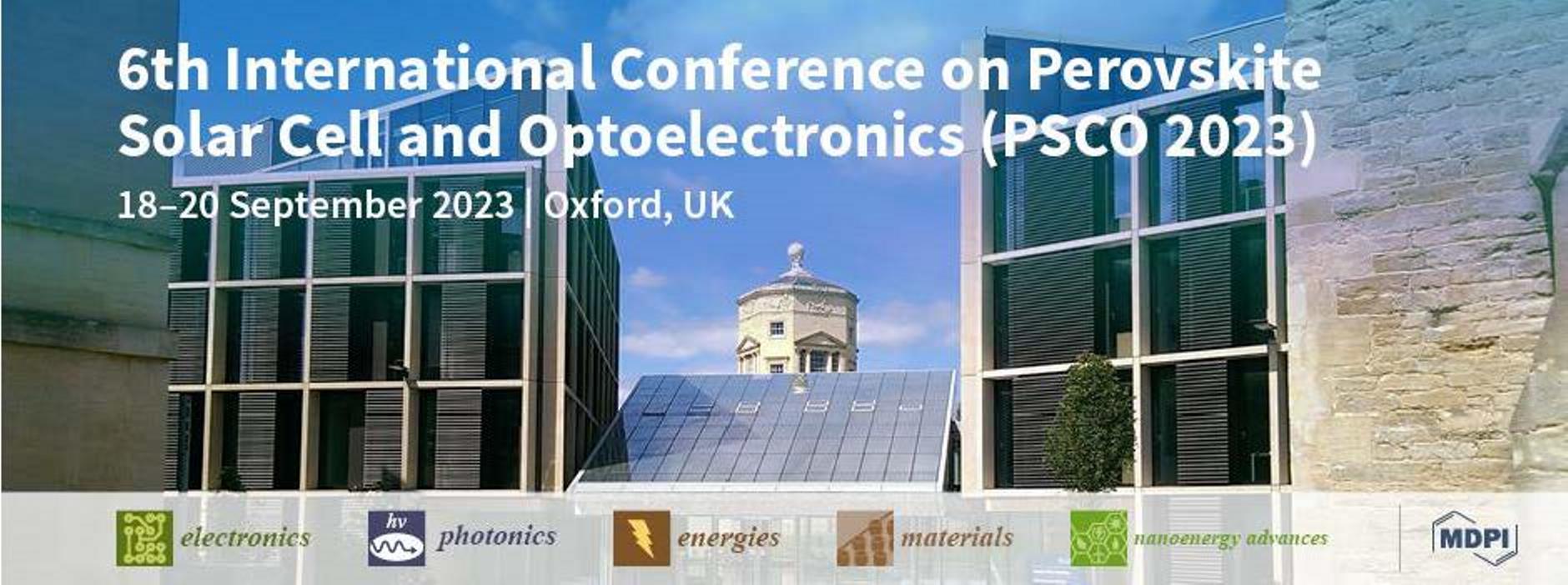
MDPI will be attending the 6th International Conference on Perovskite Solar Cell and Optoelectronics (PSCO 2023) in Oxford, UK, which will take place from 18 to 20 September 2023. The program will include a combination of invited talks, contributing talks and poster presentations in a meeting that will bring a broad spectrum of the community together to discuss and share knowledge on the latest advances in perovskite materials, devices and photophysical and optoelectronic properties and phenomena.
The following MDPI journals will be represented:
If you are attending the conference, please visit our booth. Our delegates look forward to meeting you in person and answering any questions that you may have. For more information about the conference, please visit the following link: https://www.psco-conference.org/.
27 July 2023
MDPI Insights: The CEO’s Letter #2 - Open Peer-Review and IJERPH

Welcome to the MDPI Insights: The CEO's Letter.
In these monthly letters, I will showcase two key aspects of our work at MDPI: our commitment to empowering researchers and our determination to facilitating open scientific exchange.
Opening Thoughts

Open Peer Review Reports
Continuing the topic of openness from my inaugural monthly CEO letter, in these Opening Thoughts, I highlight the growth and importance of open peer-review reports at MDPI. Open peer reports align with the principles of open science, making the publishing process more transparent and facilitating rigorous peer review.
MDPI journals operate an open peer-review option by default, allowing authors to publish review reports and author responses (often referred to as open reports) together with the published paper. Publishing the reviewer reports and author responses together with the article provides greater transparency and trust for readers, as this allows them to track the editorial decision-making process. Open peer-review also encourages reviewers and editors to provide high-quality comments, as these will be made public if the article is accepted for publication.
Start and Growth of Open Peer Review at MDPI
The MDPI journal Life was a pioneer in offering this opportunity to its authors in 2014. The first MDPI article with peer-review reports openly published was a review by the Nobel Laureate Werner Arber, in which the review reports were published as supplementary material. By 2018, open peer-review was available across all MDPI journals. As such, MDPI authors have embraced the open peer-review model, providing a steady increase in the number of MDPI articles. As of 2023, approximately one-third (34.0%) of MDPI articles were published with open review reports.
As at July 2023, the percentage of MDPI articles published with open peer review has increased to 36.2% of the total papers published in 2023 so far, indicating ongoing growth in adoption.
Open peer review continues to play a critical role in the assessment of the peer-review process in Life. For further insights, please see the recent editorial by Dr. Pabulo Henrique Rampelotto, the former Editor-in-Chief of Life, who spearheaded the implementation of the open peer-review process.
Benefits of Open Peer Review
The benefits of open peer review include increased transparency, trust and constructive feedback. To promote open communication further and increase the robustness of the peer-review process, we encourage reviewers to sign their reports so that their name appears on the review report (this process is referred to as open identity). The default option is for reviewers to remain anonymous; however, by signing the reports, reviewers receive direct credit for their contribution to the peer-review process and show their commitment towards open science.
As the leading open access publisher, MDPI remains committed to promoting open peer-review and encourages authors to choose this approach. Our goal is to provide a rigorous and transparent peer-review process that benefits the scientific community, and we believe that open peer-review is a vital step in fostering openness and collaboration in scientific communication.
Impactful Research

MDPI Papers Cited in the News – IJERPH edition
Every month, our corporate marketing team compiles data from Altmetrics to create a list of MDPI papers that have been cited in the news. This list continues to grow as renowned news outlets regularly reference research published by MDPI in their articles.
During 2022, a total of 111,965 MDPI research papers were mentioned in prominent news outlets such as National Geographic, The Washington Post, Forbes, The Guardian, the BBC, CNN, Time, and Harvard Business Review.
Highly Cited Journal Publications
IJERPH, known for publishing impactful research, received the most news mentions among all MDPI journals in 2022, based on Altmetrics data:
- International Journal of Environmental Research and Public Health: 3509 mentions
- Nutrients: 2698 mentions
- International Journal of Molecular Sciences: 1701 mentions
- Journal of Clinical Medicine: 1131 mentions
- Viruses: 1111 mentions
These numbers show the recognition and impact of the articles published in IJERPH. For a more detailed view of the journal’s most cited and viewed papers, you can visit here. In total, IJERPH has garnered over 28,000 mentions in prominent news outlets, and as at July 2023, an impressive count of over 17,000 papers cited 10 times or more. These figures highlight the impactful contribution of IJERPH publications to the scientific community.
Example of Recent Mentions
During May and June 2023, a noteworthy selection of articles from IJERPH was cited in news articles, including:
The Washington Post: “Bringing nature inside can improve your health. Here’s how to do it.”
IJERPH paper: “Physiological Benefits of Viewing Nature: A Systematic Review of Indoor Experiments”
Harvard Business Review: “How to Take Better Breaks at Work, According to Research”
IJERPH paper: “Canine-Assisted Therapy Improves Well-Being in Nurses”
National Geographic: “Lyme disease is spreading fast—but a vaccine may be on the way”
IJERPH paper: “Range Expansion of Tick Disease Vectors in North America: Implications for Spread of Tick-Borne Disease”
Inside MDPI

MDPI Develops an Artificial Intelligence Tool to Enhance the Peer-Review Process
At MDPI, we believe that rigorous peer-review is the corner-stone of high-quality academic publishing. We are grateful to the scholars who generously dedicate their time to peer-review articles submitted to MDPI journals. Their contributions are invaluable to the advancement of science.
Peer-review is a critical part of the publication process, ensuring that MDPI upholds the highest quality standards for the papers we publish. Every manuscript submitted to our journals undergoes a comprehensive peer-review process conducted by subject-matter experts.
To further enhance our peer-review process, our Data Analytics team has developed an Artificial Intelligence (AI) tool designed to support the selection of reviewers. This proprietary tool utilizes Natural Language Processing (NLP), a specially designed AI language model, to extract information from the title and abstract of submitted papers. It then searches our database for similar manuscripts and suggests potential reviewers based on this analysis. Integrated with MDPI's submission system (SuSy), the AI tool cross-references the suggested candidates with our reviewer database to verify their invitation status and availability.
The goal of this tool is to provide better targeted peer-review invitations, reducing the number of emails sent for each paper and increasing the efficiency of our editorial staff.
In the near future, our Data Analytics team plans to deploy similar AI projects to improve other critical aspects of our services, offering an enhanced experience to our authors and readers.
Click here to learn about MDPI’s review process, including procedures, responsibilities, and benefits.
Read more:
Coming Together for Science
The Future of IJERPH

On 5 July 2023, Prof. Dr. Paul B. Tchounwou, the founding Editor-in-Chief of IJERPH, along with five Section Editors in Chief (Prof. Dr. Germán Vicente-Rodríguez, Prof. Dr. Karl Goodkin, Prof. Dr. William A. Toscano, Prof. Dr. Jimmy T. Efird, and Prof. Dr. William Douglas Evans), gathered in Basel to discuss the future of the journal. The meeting provided an opportunity to address the recent decision by The Web of Science to delist IJERPH due to the journal failing the Content Relevance criterion, and propose best strategies that will ensure high scientific rigor as well as a clear scope and aim of IJERPH, going forward.
While the delisting is disappointing for IJERPH, as well as for our authors, academic editors, and the entire scientific community supporting our journal, we see it as an opportunity to reflect and prepare for the future direction of the journal.
Since its launch in 2004, IJERPH’s vision and mission have evolved to be more complete and comprehensive in engaging scientific communities. In light of this, we will refresh the journal’s aims and scope, ensuring they align with the organic expansion of IJERPH. Additionally, we will restructure the journal sections into broader categories, encouraging collaborative research and transdisciplinary approaches for authors. This is designed to foster collaboration and knowledge exchange among diverse fields, contributing to a holistic understanding of health promotion and disease prevention. We are confident that these next steps will enhance the scientific strength and societal impact of our journal.

Journal Achievements
In addition to the productive discussions, we took the time to celebrate some of the remarkable achievements of IJERPH, which I highlight below:
- Founded by Prof. Dr. Paul B. Tchounwou in 2004
- Indexed in PubMed in 2008
- Received its first Impact Factor in 2012
- Published its 5000th paper in 2017
- Over 60,000 papers published as at June 30, 2023
- 131,628,173 paper views in 2018–2022
- Over 28,000 mentions in prominent news outlets
- 17,000 papers cited 10 times or more as at June 30, 2023
- No.1 journal in the 2022 Google Scholar Metrics in the category of Public Health
- Awarded several editions of Young Investigator Awards, Travel Awards, and Outstanding Reviewer Awards since 2018.
These achievements showcase the journal’s significant contributions to the field and its impact on global health. We are proud of the exceptional work accomplished by the IJERPH team and look forward to building upon this success in the years to come.
Closing Thoughts
MDPI’s Impact in Spain

During the past month, I had the opportunity to visit our new office building in Barcelona, where I met with our local colleagues to discuss the ways we serve the scholarly community, particularly in Spain. The multi-functional office plays a vital role in supporting various business needs, including editorial, design, conference management, data analytics, journal relationship management, publishing partnerships, and collaborations with societies.
Spain holds a significant position in MDPI’s global market, ranking as the fourth-largest contributor to the total number of papers published by MDPI as at July 2023, ranking next to Italy, the USA, and China, with Germany completing the top five.
The Numbers
Out of the 1,680,000 total MDPI articles published as at 25 July, almost 80,000 articles are contributed by Spanish authors, representing nearly 40,000 unique authors affiliated with Spanish institutions. Remarkably, over 6,300 of these authors hold editorial board member (EBM) positions within MDPI journals, with 30 of them serving as Editors-in-Chief (EiCs).
Our commitment to working with institutions is very evident in Spain, where we have successfully established over 40 Institutional Open Access Programs (IOAP) with esteemed institutions such as the University of Barcelona, the Autonomous University of Barcelona, Pompeu Fabra University, the University of Navarre, and Complutense University of Madrid.
Over the past five years, we have successfully organized eight in-person conferences in Barcelona, attracting over 1,150 registrations, with two forthcoming events scheduled for 2024. Barcelona's excellent connectivity to international airports makes it easily accessible to participants from around the world. Its welcoming atmosphere provides us with the perfect environment for knowledge-sharing, networking, and contributing to the local economy.
Our growth and presence in Spain are a true testament to the incredible service we provide to the scholarly community and the relationships we foster through responsive and collaborative communication. We look forward to continuing to support Spanish scholars, providing them a valuable and trusted experience with MDPI, the leader in open access publishing.
Testimonials
I close this letter as I did in the first edition, by sharing testimonials from our stakeholders. Here are a few IJERPH testimonials from a Spanish guest editor and an author:
Guest Editor
“I want to thank the kindness, attention and professionalism of the MDPI team throughout the editorial process of the Special Issue. I believe that it is a very professional and quality editorial process.”
- Professor Víctor Arufe-Giráldez, University of A Coruña
Special Issue in International Journal of Environmental Research and Public Health: Physical Activity in Childhood and Adolescence
Special Issue in International Journal of Environmental Research and Public Health: Physical Education: Present and Future
__
Author
“I want to thank the rigor of the revisions made to the manuscripts to improve their quality, the support to the authors for the editor assignment system they have and the follow-up they carry out, for the speed in answering and in carrying out the entire process of the revision, and for doing all this at an affordable price.”
- Dr. María Paz García-Caro, University of Granada
Article in International Journal of Environmental Research and Public Health: Factors Associated with Suicide Attempts and Suicides in the General Population of Andalusia (Spain)
Chief Executive Officer
MDPI AG
25 July 2023
Electronics | Highly Cited Papers in 2022 in the Section “Microelectronics”
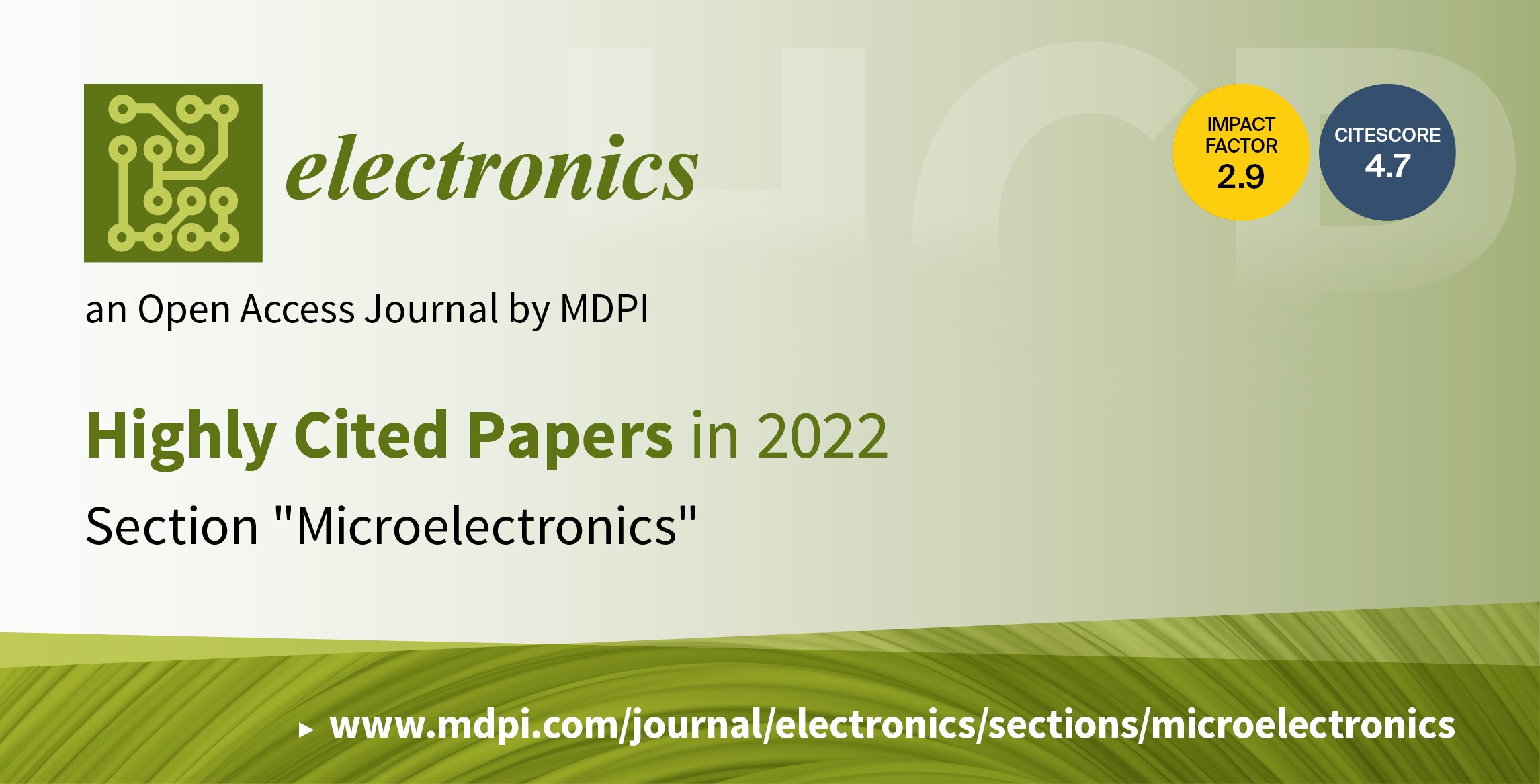
The “Microelectronics” Section is dedicated to publishing original research articles and cutting-edge reviews on the applications of microelectronics in emerging and challenging technologies. Electronics operating in extreme environments, such as a vacuum, space, harsh radiation, extreme cold and other niche applications, advances microelectronic designs.
You have free and unlimited access to the full texts of all of the open access articles published in our journal. We welcome you to read our most highly cited papers published in 2022 below:
1. “Actively MEMS-Based Tunable Metamaterials for Advanced and Emerging Applications”
by Ruijia Xu and Yu-Sheng Lin
Electronics 2022, 11(2), 243; https://doi.org/10.3390/electronics11020243
Available online: https://www.mdpi.com/2079-9292/11/2/243
2. “Reliability of Commercial UVC LEDs: 2022 State-of-the-Art”
by Nicola Trivellin, Davide Fiorimonte, Francesco Piva, Matteo Buffolo, Carlo De Santi, Gaudenzio Meneghesso, Enrico Zanoni and Matteo Meneghini
Electronics 2022, 11(5), 728; https://doi.org/10.3390/electronics11050728
Available online: https://www.mdpi.com/2079-9292/11/5/728
3. “Survey on Fatigue Life Prediction of BGA Solder Joints”
by Baojun Qiu, Jingang Xiong, Han Wang, Shuai Zhou, Xiuding Yang, Zhengpei Lin, Maolin Liu and Nian Cai
Electronics 2022, 11(4), 542; https://doi.org/10.3390/electronics11040542
Available online: https://www.mdpi.com/2079-9292/11/4/542
4. “Compact CMOS Wideband Instrumentation Amplifiers for Multi-Frequency Bioimpedance Measurement: A Design Procedure”
by Israel Corbacho, Juan M. Carrillo, José L. Ausín, Miguel Á. Domínguez, Raquel Pérez-Aloe and Juan Francisco Duque-Carrillo
Electronics 2022, 11(11), 1668; https://doi.org/10.3390/electronics11111668
Available online: https://www.mdpi.com/2079-9292/11/11/1668
5. “Comparison of Total Ionizing Dose Effects in 22-nm and 28-nm FD SOI Technologies”
by Zongru Li, Christopher Jarrett Elash, Chen Jin, Li Chen, Jiesi Xing, Zhiwu Yang and Shuting Shi
Electronics 2022, 11(11), 1757; https://doi.org/10.3390/electronics11111757
Available online: https://www.mdpi.com/2079-9292/11/11/1757
6. “Small-Signal Analysis of All-Si Microring Resonator Photodiode”
by Yiwei Peng, Wayne V. Sorin, Stanley Cheung, Yuan Yuan, Zhihong Huang, Marco Fiorentino and Raymond G. Beausoleil
Electronics 2022, 11(2), 183; https://doi.org/10.3390/electronics11020183
Available online: https://www.mdpi.com/2079-9292/11/2/183
7. “Sensitivity Characterization of Multi-Band THz Metamaterial Sensor for Possible Virus Detection”
by Anja Kovačević, Milka Potrebić and Dejan Tošić
Electronics 2022, 11(5), 699; https://doi.org/10.3390/electronics11050699
Available online: https://www.mdpi.com/2079-9292/11/5/699
8. “Simulated Hough Transform Model Optimized for Straight-Line Recognition Using Frontier FPGA Devices”
by Alessandro Gabrielli, Fabrizio Alfonsi and Francesca Del Corso
Electronics 2022, 11(4), 517; https://doi.org/10.3390/electronics11040517
Available online: https://www.mdpi.com/2079-9292/11/4/517
9. “Study of Breakdown Voltage Stability of Gas-Filled Surge Arresters in the Presence of Gamma Radiation”
by Emilija Živanović, Marija Živković and Sandra Veljković
Electronics 2022, 11(15), 2447; https://doi.org/10.3390/electronics11152447
Available online: https://www.mdpi.com/2079-9292/11/15/2447
10. “Investigation on High-Efficiency Beam-Wave Interaction for Coaxial Multi-Beam Relativistic Klystron Amplifier”
by Limin Sun, Hua Huang, Shifeng Li, Zhengbang Liu, Hu He, Qifan Xiang, Ke He and Xianghe Fang
Electronics 2022, 11(2), 281; https://doi.org/10.3390/electronics11020281
Available online: https://www.mdpi.com/2079-9292/11/2/281
25 July 2023
Electronics | Highly Cited Papers in 2022 in the Section “Industrial Electronics”
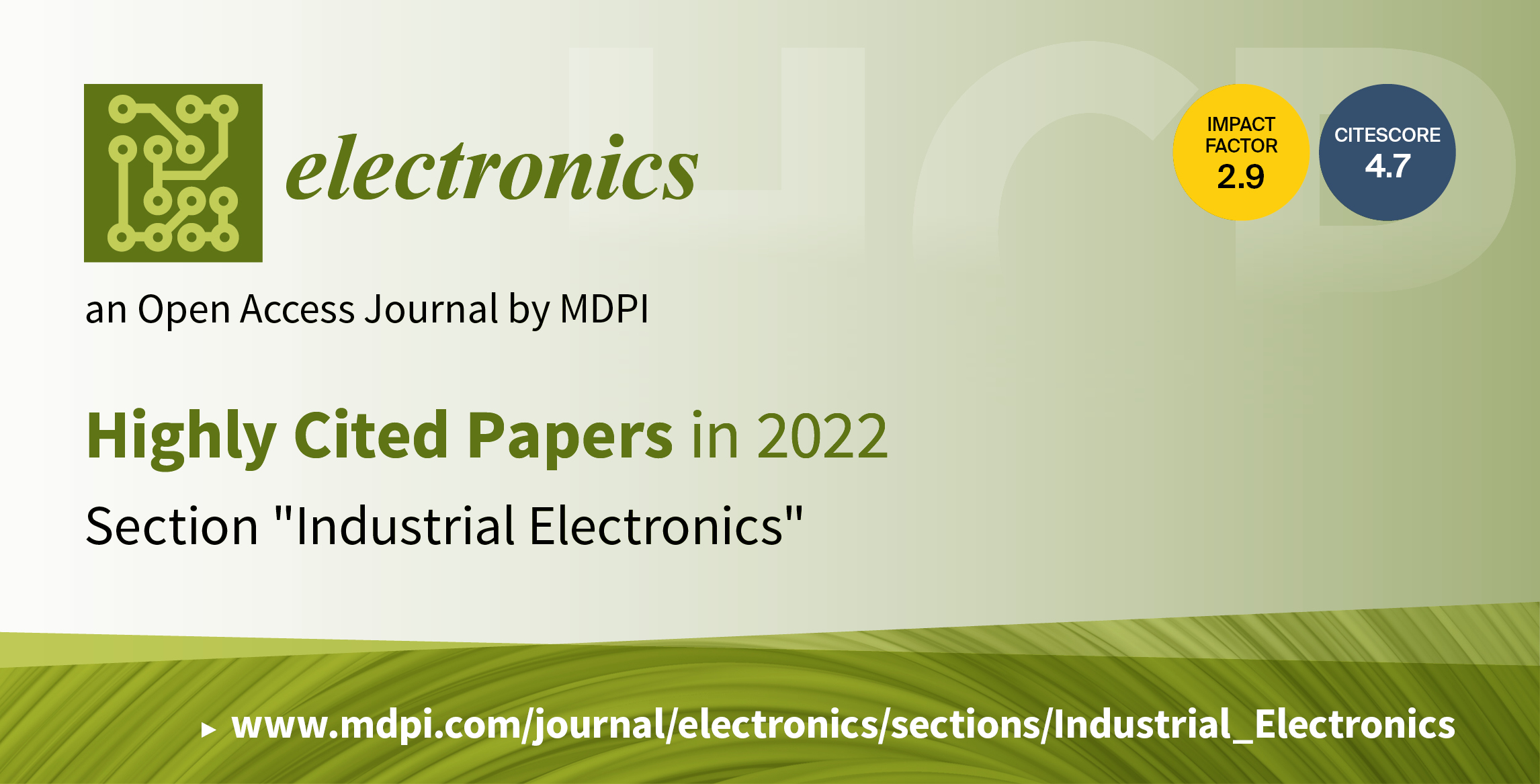
Industrial electronics can be used to improve the efficiency and productivity of industries like energy, transportation, petroleum, chemical, semiconductor, mining, agriculture, and others. As a branch of electronics dealing with power electronic switches, sensors, actuators, meters, intelligent electronic devices (IEDs), automation equipment, semiconductors, nanotechnology, etc., the current emphasis is placed on power conditioning using power semiconductor devices in modernizing industry technology. This Section is devoted to presenting emerging technologies and trends in the industrial electronics sector, publishing original research and state-of-the-art review articles.
You have free and unlimited access to the full text of all the open access articles published in Electronics (ISSN: 2079-9292). We welcome you to read our most highly cited papers published in 2022 below:
1. “Performance of 5G Trials for Industrial Automation”
by Junaid Ansari, Christian Andersson, Peter de Bruin, János Farkas, Leefke Grosjean, Joachim Sachs, Johan Torsner, Balázs Varga, Davit Harutyunyan, Niels König et al.
Electronics 2022, 11(3), 412; https://doi.org/10.3390/electronics11030412
Available online: https://www.mdpi.com/2079-9292/11/3/412
2. “A Systematic Guide for Predicting Remaining Useful Life with Machine Learning”
by Tarek Berghout and Mohamed Benbouzid
Electronics 2022, 11(7), 1125; https://doi.org/10.3390/electronics11071125
Available online: https://www.mdpi.com/2079-9292/11/7/1125
3. “A Risk Curtailment Strategy for Solar PV-Battery Integrated Competitive Power System”
by Arup Das, Subhojit Dawn, Sadhan Gope and Taha Selim Ustun
Electronics 2022, 11(8), 1251; https://doi.org/10.3390/electronics11081251
Available online: https://www.mdpi.com/2079-9292/11/8/1251
4. “An Automated Image Segmentation and Useful Feature Extraction Algorithm for Retinal Blood Vessels in Fundus Images”
by Aws A. Abdulsahib, Moamin A. Mahmoud, Hazleen Aris, Saraswathy Shamini Gunasekaran and Mazin Abed Mohammed
Electronics 2022, 11(9), 1295; https://doi.org/10.3390/electronics11091295
Available online: https://www.mdpi.com/2079-9292/11/9/1295
5. “Evaluation of Production of Digital Twins Based on Blockchain Technology”
by Nada A. Nabeeh, Mohamed Abdel-Basset, Abduallah Gamal and Victor Chang
Electronics 2022, 11(8), 1268; https://doi.org/10.3390/electronics11081268
Available online: https://www.mdpi.com/2079-9292/11/8/1268
6. “Use of Optical Emission Spectroscopy Data for Fault Detection of Mass Flow Controller in Plasma Etch Equipment”
by Hyukjoon Kwon and Sang Jeen Hong
Electronics 2022, 11(2), 253; https://doi.org/10.3390/electronics11020253
Available online: https://www.mdpi.com/2079-9292/11/2/253
7. “Emotion Recognition from EEG Signals Using Recurrent Neural Networks”
by M. Kalpana Chowdary, J. Anitha and D. Jude Hemanth
Electronics 2022, 11(15), 2387; https://doi.org/10.3390/electronics11152387
Available online: https://www.mdpi.com/2079-9292/11/15/2387
8. “Feasible Evaluation and Implementation of Shunt Active Filter for Harmonic Mitigation in Induction Heating System”
by Rahul Raman, Pradip Kumar Sadhu, Ritesh Kumar, Shriram Srinivasarangan Rangarajan, Umashankar Subramaniam, Edward Randolph Collins and Tomonobu Senjyu
Electronics 2022, 11(21), 3464; https://doi.org/10.3390/electronics11213464
Available online: https://www.mdpi.com/2079-9292/11/21/3464
9. “Microgrid Emergence, Integration, and Influence on the Future Energy Generation Equilibrium—A Review”
by Sabrina Lee Chartier, Vinod Kumar Venkiteswaran, Shriram S. Rangarajan, Edward Randolph Collins and Tomonobu Senjyu
Electronics 2022, 11(5), 791; https://doi.org/10.3390/electronics11050791
Available online: https://www.mdpi.com/2079-9292/11/5/791
10. “Prototype of 5G Integrated with TSN for Edge-Controlled Mobile Robotics”
by Pierre Kehl, Junaid Ansari, Mohammad Hossein Jafari, Paul Becker, Joachim Sachs, Niels König, Amon Göppert and Robert H. Schmitt
Electronics 2022, 11(11), 1666; https://doi.org/10.3390/electronics11111666
Available online: https://www.mdpi.com/2079-9292/11/11/1666
21 July 2023
Meet the Editors | Prof. Dr. Giovanni Crupi Appointed Section Editor-in-Chief of Section “Microwave and Wireless Communications” in Electronics

In this captivating series, we had the privilege of interviewing the eminent Prof. Dr. Giovanni Crupi who was appointed Section Editor-in-Chief earlier this year for the Section “Microwave and Wireless Communications” of Electronics (IF 2.9, CiteScore 3.7, ISSN: 2079-9292). Bringing unparalleled expertise to drive innovation and advancements in the field and renowned for his groundbreaking contributions in microwave electronics engineering, focusing on the characterization and modeling of microwave transistors for circuit design and wireless applications, as well as that of microwave sensors for bioengineering applications, Dr. Crupi shares his invaluable insights and takes us on an exclusive journey into the inner workings of the journal. Through these interviews, our aim is to offer a unique perspective on the publishing process, straight from the Section Editor-in-Chief himself.
The following is a short Q&A with Prof. Dr. Giovanni Crupi, who shared his vision for the journal with us, as well as his views of the research area and open access publishing:
1. Can you share with us some information about your academic background?
I received my Ph.D. degree in 2006 from the University of Messina, Italy. Since 2005, I have had the privilege of being a repeat Visiting Scientist at KU Leuven and IMEC, both located in Leuven, Belgium. These experiences have enriched my academic journey significantly. At present, I hold the position of Associate Professor at the University of Messina, Italy. It is a role that I find fulfilling as I engage in various scholarly activities and contribute to the academic community. Throughout my career, I have had the opportunity to author or coauthor over 250 publications in esteemed international journals and conferences, enabling me to share my research findings and insights with a wider audience. I am also the Editor-in-Chief of the Wiley International Journal of Numerical Modelling: Electronic Networks, Devices and Fields, Section Editor-in-Chief of the MDPI Electronics, and Associate Editor of the IEEE Transactions on Electron Devices, IEEE Microwave and Wireless Technology Letters, and IEEE Access.
2. What are your current research interests?
In terms of my current research focus, I am actively engaged in various areas of electronic engineering, particularly in microwave and wireless communications. My endeavors involve exploring theoretical concepts, developing practical applications, and contributing to the advancement of the field. It is an exciting journey, and I am fortunate to be involved in such meaningful and impactful research endeavors.
3. What made you choose to work with us knowing that we are an open access digital publisher?
I gladly accepted the invitation to lead the “Microwave and Wireless Communications” Section, since this is a vibrant and fascinating segment of the electronics, in which I have been working since my master’s thesis. I believe that all of us have the responsibility to contribute to the betterment of the publishing process by ensuring fairness, inclusiveness, multidisciplinarity, dissemination, and sustainability. Involvement at different editorial levels is an essential part of our commitment to support the global transition toward open access publishing in a healthy way, without leaving developing countries and emerging economies behind.
I really believe that open access is the way forward, as it presents a tremendous opportunity to provide free access to information for emerging nations. It is truly the future of academic publishing. In recent years, I have observed a positive trend where many universities have started funding researchers to publish their papers in open access formats. This shift towards open access not only promotes the dissemination of knowledge but also ensures that valuable research findings are accessible to a wider audience, including those in less privileged regions. By removing financial barriers and enabling free access to information, we can contribute to the growth and development of academic communities worldwide.
4. Electronics is an open access publication. How do you think open access impacts authors?
I am particularly enthusiastic about the impact this movement can have on emerging nations and authors, as it empowers researchers and students in those regions to benefit from the wealth of knowledge available. The ability to freely access information without financial constraints can foster innovation, collaboration, and ultimately contribute to bridging the knowledge gap between countries. Embracing open access as the future of publishing aligns with my vision of promoting equitable access to information and supporting the advancement of academic communities globally. Right now, we are entering a new era of scientific publications, mostly owing to global transition toward open access to make research openly and freely available. By opening new frontiers, open access publishing is rapidly and profoundly changing the traditional concept of research publication. The open access process is aimed primarily at facilitating the widest possible dissemination, at empowering the development of multidisciplinary research, and at maximizing the impact of research for future generations, but at the same time this might bring adverse side effects, just as any medication can.
To meet the new challenges and great opportunities brought by this extraordinary revolution, we all needed to keep an open mind, to not miss out on this amazing opportunity, while keeping eyes wide open, to minimize any potential side effect and to make sure that this transition provides access to a better future for us all, without leaving anyone behind.
5. What is your vision for the “Microwave and Wireless Communications” Section?
Throughout the years, microwave wireless communication technologies have greatly evolved and nowadays are experiencing a tremendous growth, driven by an explosive broadening of their applications. My belief is that competence, curiosity, passion, enthusiasm, experience, synergistic teamwork, and communication across disciplinary boundaries are essential for effectively strengthening the connectivity between the extraordinary progress of these amazing technologies and the market expansion of their fast-evolving applications. This would enable us to build together a better future for the benefit of humankind. In this dynamic and exciting scenario, I am of the opinion that “Microwave and Wireless Communications” Section can play a key role in the advancement of the journal Electronics.
6. Which research topics do you think will be of particular interest to the research community in the coming years?
From my perspective, I believe that three research topics will capture significant interest from the research community in the coming years. Firstly, microwave transistors are expected to be a focal point as scientists strive to enhance miniaturization and efficiency of electronic devices to support the ubiquitous development of green wireless communication systems. Secondly, microwave sensors for engineering applications are gaining momentum due to their wide range of practical uses, going from wearable smart sensors for IoT enabled personalized healthcare to remote sensing for structural health monitoring. Thirdly, quantum computing has emerged as a cutting-edge field with immense potential for solving complex problems, and I anticipate it will continue to draw substantial attention from researchers.
These are three important strategic topics, but my belief is that defining and developing each strategic research topic strictly requires a multidisciplinary approach to promote our unwavering commitment to the environment, society and the economy, which constitute the three intertwined pillars to ensure a responsible and sustainable progress for making the world a better place to live for our future generations to come.
We wish Dr. Giovanni Crupi every success in his new current position as Section Editor-in-Chief, and we look forward to his contributions to the journal.
19 July 2023
Electronics | Highly Cited Papers in 2021 in the Section “Industrial Electronics”
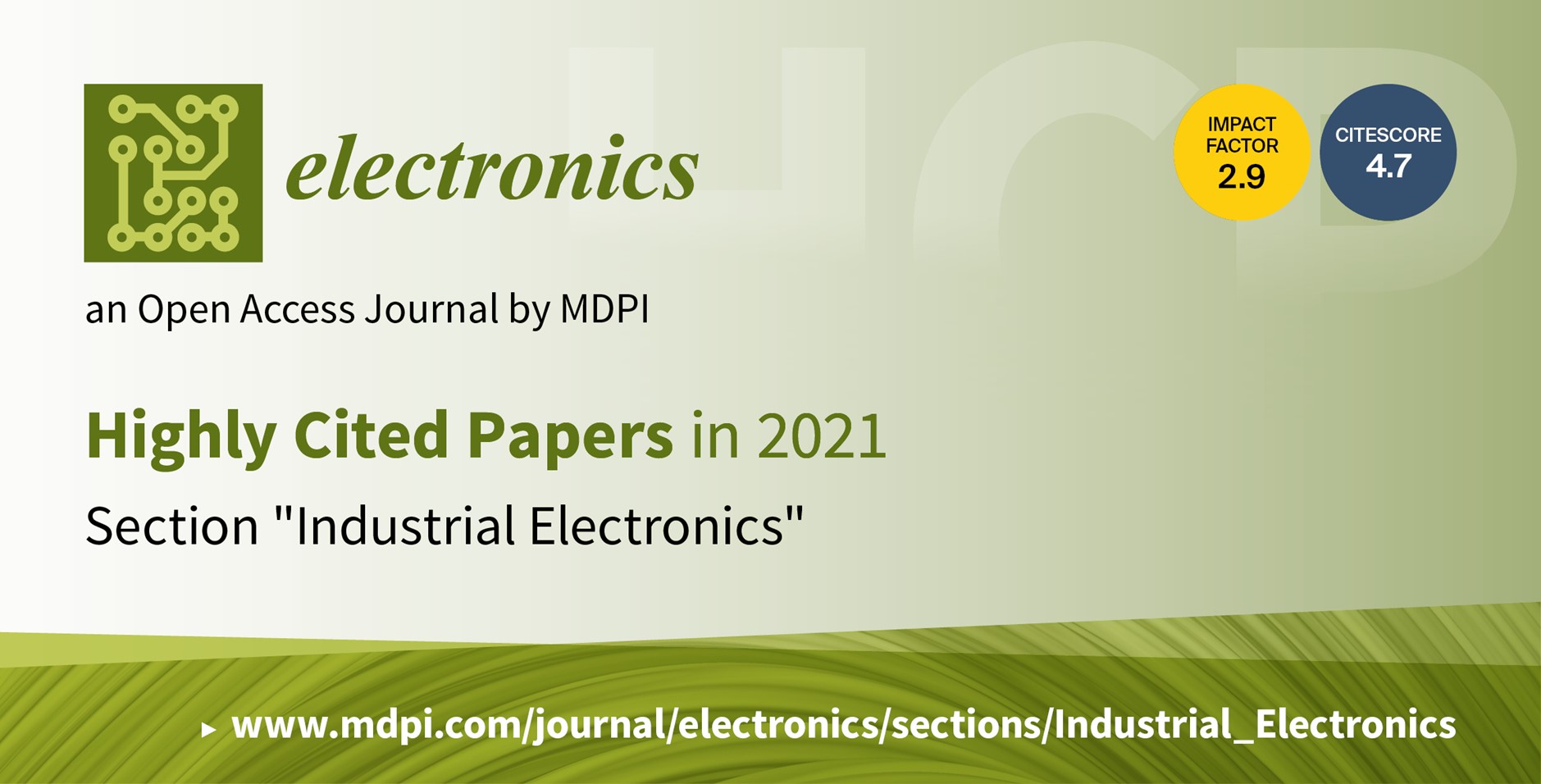
Industrial electronics plays a vital role in improving the efficiency and productivity of industries like energy, transportation, petroleum, chemical, semiconductor, mining, agriculture, and others. As a branch of electronics dealing with power electronic switches, sensors, actuators, meters, intelligent electronic devices (IEDs), automation equipment, semiconductors, nanotechnology, etc., current emphasis is placed on power conditioning using power semiconductor devices in modernizing industry technology. This Section of the journal Electronics (ISSN: 2079-9292) is devoted to presenting the emerging technologies and trends in the industrial electronics sector, publishing original research and state-of-the-art review articles.
As they are of open access format, you have free and unlimited access to the full text of all the articles published in our journal. We welcome you to read our most highly cited papers published in 2021 below:
1. “Artificial Intelligence-Based Decision-Making Algorithms, Internet of Things Sensing Networks, and Deep Learning-Assisted Smart Process Management in Cyber-Physical Production Systems”
by Mihai Andronie, George Lăzăroiu, Mariana Iatagan, Cristian Uță, Roxana Ștefănescu and Mădălina Cocoșatu
Electronics 2021, 10(20), 2497; https://doi.org/10.3390/electronics10202497
Available online: https://www.mdpi.com/2079-9292/10/20/2497
2. “Smart Manufacturing and Tactile Internet Based on 5G in Industry 4.0: Challenges, Applications and New Trends”
by Dimitris Mourtzis, John Angelopoulos and Nikos Panopoulos
Electronics 2021, 10(24), 3175; https://doi.org/10.3390/electronics10243175
Available online: https://www.mdpi.com/2079-9292/10/24/3175
3. “Solid-State DC Circuit Breakers and Their Comparison in Modular Multilevel Converter Based-HVDC Transmission System”
by Gul Ahmad Ludin, Mohammad Amin Amin, Hidehito Matayoshi, Shriram S. Rangarajan, Ashraf M. Hemeida, Hiroshi Takahashi and Tomonobu Senjyu
Electronics 2021, 10(10), 1204; https://doi.org/10.3390/electronics10101204
Available online: https://www.mdpi.com/2079-9292/10/10/1204
4. “Review on Energy Storage Systems in Microgrids”
by Ramy Georgious, Rovan Refaat, Jorge Garcia and Ahmed A. Daoud
Electronics 2021, 10(17), 2134; https://doi.org/10.3390/electronics10172134
Available online: https://www.mdpi.com/2079-9292/10/17/2134
5. “DC Nanogrids for Integration of Demand Response and Electric Vehicle Charging Infrastructures: Appraisal, Optimal Scheduling and Analysis”
by Salwan Ali Habeeb, Marcos Tostado-Véliz, Hany M. Hasanien, Rania A. Turky, Wisam Kaream Meteab and Francisco Jurado
Electronics 2021, 10(20), 2484; https://doi.org/10.3390/electronics10202484
Available online: https://www.mdpi.com/2079-9292/10/20/2484
6. “Discrete Human Activity Recognition and Fall Detection by Combining FMCW RADAR Data of Heterogeneous Environments for Independent Assistive Living”
by Umer Saeed, Syed Yaseen Shah, Syed Aziz Shah, Jawad Ahmad, Abdullah Alhumaidi Alotaibi, Turke Althobaiti, Naeem Ramzan, Akram Alomainy and Qammer H. Abbasi
Electronics 2021, 10(18), 2237; https://doi.org/10.3390/electronics10182237
Available online: https://www.mdpi.com/2079-9292/10/18/2237
7. “Hybrid Workload Enabled and Secure Healthcare Monitoring Sensing Framework in Distributed Fog-Cloud Network”
by Abdullah Lakhan, Qurat-ul-ain Mastoi, Mazhar Ali Dootio, Fehaid Alqahtani, Ibrahim R. Alzahrani, Fatmah Baothman, Syed Yaseen Shah, Syed Aziz Shah, Nadeem Anjum, Qammer Hussain Abbasi et al.
Electronics 2021, 10(16), 1974; https://doi.org/10.3390/electronics10161974
Available online: https://www.mdpi.com/2079-9292/10/16/1974
8. “IoT Security Challenges: Cloud and Blockchain, Postquantum Cryptography, and Evolutionary Techniques”
by Ondrej Gallo, Roderik Ploszek, Peter Špaček and Pavol Zajac
Electronics 2021, 10(21), 2647; https://doi.org/10.3390/electronics10212647
Available online: https://www.mdpi.com/2079-9292/10/21/2647
9. “Design and Implementation of LoRa Based IoT Scheme for Indonesian Rural Area”
by Setya Widyawan Prakosa, Muhamad Faisal, Yudhi Adhitya, Jenq-Shiou Leu, Mario Köppen and Cries Avian
Electronics 2021, 10(1), 77; https://doi.org/10.3390/electronics10010077
Available online: https://www.mdpi.com/2079-9292/10/1/77
10. “Wind Turbine Operation Curves Modelling Techniques”
by Davide Astolfi
Electronics 2021, 10(3), 269; https://doi.org/10.3390/electronics10030269
Available online: https://www.mdpi.com/2079-9292/10/3/269
19 July 2023
Electronics | Highly Cited Papers in 2021 in the Section “Microelectronics”

The Section “Microelectronics” of Electronics (ISSN: 2079-9292) is dedicated to publishing original research articles and cutting-edge reviews for the applications of microelectronics in emerging, frontier and challenging technologies. The operation of electronics in extreme environments, such as a vacuum, space, harsh radiation, extreme cold and other niche applications, is pushing microelectronic design beyond the frontier of standard electronics.
As they are of open access format, you have free and unlimited access to the full text of all the articles published in our journal. We welcome you to read our most highly cited papers published in 2021 below:
1. “Sheet Resistance Measurements of Conductive Thin Films: A Comparison of Techniques”
by Mira Naftaly, Satyajit Das, John Gallop, Kewen Pan, Feras Alkhalil, Darshana Kariyapperuma, Sophie Constant, Catherine Ramsdale and Ling Hao
Electronics 2021, 10(8), 960; https://doi.org/10.3390/electronics10080960
Available online: https://www.mdpi.com/2079-9292/10/8/960
2. “AlGaN Channel High Electron Mobility Transistors with Regrown Ohmic Contacts”
by Idriss Abid, Jash Mehta, Yvon Cordier, Joff Derluyn, Stefan Degroote, Hideto Miyake and Farid Medjdoub
Electronics 2021, 10(6), 635; https://doi.org/10.3390/electronics10060635
Available online: https://www.mdpi.com/2079-9292/10/6/635
3. “A Unified and Open LTSPICE Memristor Model Library”
by Valeri Mladenov
Electronics 2021, 10(13), 1594; https://doi.org/10.3390/electronics10131594
Available online: https://www.mdpi.com/2079-9292/10/13/1594
4. “UV-Based Technologies for SARS-CoV2 Inactivation: Status and Perspectives”
by Nicola Trivellin, Francesco Piva, Davide Fiorimonte, Matteo Buffolo, Carlo De Santi, Viviana Teresa Orlandi, Fabrizio Dughiero, Gaudenzio Meneghesso, Enrico Zanoni and Matteo Meneghini
Electronics 2021, 10(14), 1703; https://doi.org/10.3390/electronics10141703
Available online: https://www.mdpi.com/2079-9292/10/14/1703
5. “A New Cost-Efficient Design of a Reversible Gate Based on a Nano-Scale Quantum-Dot Cellular Automata Technology”
by Saeid Seyedi, Akira Otsuki and Nima Jafari Navimipour
Electronics 2021, 10(15), 1806; https://doi.org/10.3390/electronics10151806
Available online: https://www.mdpi.com/2079-9292/10/15/1806
6. “A Novel OTA Architecture Exploiting Current Gain Stages to Boost Bandwidth and Slew-Rate”
by Francesco Centurelli, Riccardo Della Sala, Pietro Monsurrò, Giuseppe Scotti and Alessandro Trifiletti
Electronics 2021, 10(14), 1638; https://doi.org/10.3390/electronics10141638
Available online: https://www.mdpi.com/2079-9292/10/14/1638
7. “Effects of Active Layer Thickness on the Electrical Characteristics and Stability of High-Mobility Amorphous Indium–Gallium–Tin Oxide Thin-Film Transistors”
by Hyun-Seok Cha, Hwan-Seok Jeong, Seong-Hyun Hwang and Hyuck-In Kwon
Electronics 2021, 10(11), 1295; https://doi.org/10.3390/electronics10111295
Available online: https://www.mdpi.com/2079-9292/10/11/1295
8. “All-Dielectric Metasurface for Sensing Microcystin-LR”
by Binze Ma, Ao Ouyang, Juechen Zhong, Pavel A. Belov, Ravindra Kumar Sinha, Weiping Qian, Pintu Ghosh and Qiang Li
Electronics 2021, 10(11), 1363; https://doi.org/10.3390/electronics10111363
Available online: https://www.mdpi.com/2079-9292/10/11/1363
9. “Low-Toxicity Perovskite Applications in Carbon Electrode Perovskite Solar Cells—A Review”
by Maria Bidikoudi, Carmen Simal and Elias Stathatos
Electronics 2021, 10(10), 1145; https://doi.org/10.3390/electronics10101145
Available online: https://www.mdpi.com/2079-9292/10/10/1145
10. “Inner Spacer Engineering to Improve Mechanical Stability in Channel-Release Process of Nanosheet FETs”
by Khwang-Sun Lee and Jun-Young Park
Electronics 2021, 10(12), 1395; https://doi.org/10.3390/electronics10121395
Available online: https://www.mdpi.com/2079-9292/10/12/1395
12 July 2023
Meet the Editors | Interview with Prof. Dr. Flavio Canavero—Editor-in-Chief of Electronics

In this captivating series, we had the privilege of interviewing the eminent Prof. Dr. Flavio Canavero, Editor-in-Chief of the prestigious Electronics journal (ISSN: 2079-9292). Renowned for his groundbreaking contributions in signal integrity and EMC design issues, interconnect modeling, the black-box characterization of digital integrated circuits, statistics, and uncertainty quantification in EMC, Prof. Dr. Canavero shares his invaluable insights and takes us on an exclusive journey into the inner workings of the journal. Through these interviews, our aim is to offer a unique perspective on the publishing process, straight from the Editors themselves.
The following is a short Q&A with Prof. Canavero, who shared his vision for the journal with us, as well as his views of the research area and open access publishing:
1. Can you share with us some information about your academic background?
I received my Ph.D. in 1986 from the Georgia Institute of Technology, USA. Throughout my career, I have had the privilege of authoring or co-authoring over 300 papers that have been published in esteemed international journals and conference proceedings. In addition to my research endeavors, I have actively engaged in various service activities both within my current institution and on an international scale. At Politecnico di Torino, I have held several prominent roles, including serving as the Director of the Electronics Department from 1993 to 1999, Vice Rector for Organization from 2001 to 2005, and Head of the Doctoral School from 2012 to 2018. Beyond my institution, I have contributed to the advancement of doctoral education as a member of the Steering Committee of the Council for Doctoral Education (CDE) of the European University Association (EUA).
2. What are your current research interests?
In my work, I am immersed in the fascinating realm of circuits and systems theory, with a strong focus on signal integrity and EMC design issues.
3. How has your experience been as an Editor-in-Chief so far and what made you choose to work with us, knowing that we are an open access digital publisher?
As the Editor-in-Chief, my experience with the journal has been quite positive so far. Being retired, I now have more time to devote to the development and management of the journal, which has been very rewarding in recent years.
Regarding my decision to work with an open access digital publisher, in the past, I was involved with other journals where I had to handle all the editorial work and I couldn’t give more time to promoting and developing the journal. Instead, in my current role as the Section Editor-in-Chief of the journal Electronics, I do not have to worry about many details of the editorial process, as they are effectively handled by the well-trained and capable staff of the journal. This is actually a positive aspect as it ensures a more transparent and inclusive decision-making process, leaving me with more time to handle more important issues within the journal. I am very satisfied with my current position and the expertise that I bring to the journal.
4. Which research topics do you think will be of particular interest to the research community in the coming years?
I think we should place more emphasis on integrated devices utilized in various domains. These devices play a crucial role in enabling advanced technologies and applications across different industries. By highlighting their importance, we can provide valuable insights and promote advancements in this area. Another captivating topic that warrants attention is the utilization of artificial intelligence (AI) for storing and efficiently taking advantage of electric power. With the growing need for sustainable energy solutions, AI can significantly contribute to optimizing power storage and consumption. Exploring this intersection of AI and electric power management can lead to innovative approaches and solutions in the field.
Furthermore, it is essential to closely monitor the interface between humans and machines. As technology continues to evolve, the control and interaction between humans and AI-driven devices become increasingly significant. By focusing on the development of control devices for AI, we can enhance the user experience, ensure safety, and drive progress in this critical aspect of human–machine interaction. Overall, by concentrating on hardware equipment, integrated devices, AI-powered power management, and the interface between humans and machines, the journal Electronics can stay at the forefront of advancements in the field and provide valuable insights for researchers and practitioners alike.
5. What are your expectations for Electronics?
I think that citations play a crucial role in assessing the influence and significance of published research. I expect that authors who have previously published with us and achieved good citation metrics will continue to contribute impactful papers. This creates a positive cycle, as their future publications are likely to generate further citations and contribute to the journal's success. I also expect authors to ensure that they provide a robust and well-explained methodology to support their findings. By emphasizing the need for good reports, focusing on completeness and structure in article writing, and emphasizing the importance of a clear methodology, we can enhance the quality of submissions and help authors to improve their chances of publication.
We wish Prof. Dr. Flavio Canavero every success in his current position as Editor-in-Chief, and we look forward to his contributions to the journal.
11 July 2023
MDPI’s Newly Launched Journals in June 2023
With the first issue released in June 2023, five new MDPI journals disseminating multi-disciplinary science are due to launch, which will cover the subjects of medicine & pharmacology, biology and physical sciences.
The newly launched journals will be overseen by professional Editorial Board Members and Editors to ensure an accurate and rapid publication, rigorous peer review and broad visibility.
Please feel free to browse and discover more about the new journals below.
| Journal | Founding Editor-in-Chief | Journal topics (selected) |
| Prof. Dr. Jun Ma, Peking University, China| Editorial | view inaugural issue | growth and development; diet and nutrients; school health promotion policies and practices; child health and care; adolescent health and wellbeing | view journal scope | submit an article |
|
| Prof. Dr. Bernd Rehm, Griffith University, Australia | Editorial | view inaugural issue | DNA and gene synthesis; synthetic transcription factors; protein engineering; viral engineering; metabolic engineering | view journal scope | submit an article | |
| Prof. Dr. Varsha Gandhi, University of Texas MD Anderson Cancer Center, USA | Editorial | view inaugural issue | lymphatics; cancers associated with lymphocytes and lymphoblasts; lymphatic tissues; lymphoma; lymphoid leukemia | view journal scope | submit an article | |
| Dr. Bradley Turner, University of Melbourne, Australia | Editorial | view inaugural issue | multiple sclerosis; amyotrophic lateral sclerosis; primary lateral sclerosis; atherosclerosis; systemic sclerosis | view journal scope | submit an article | |
 |
Prof. Dr. Clemens Burda, Case Western Reserve University, USA | Editorial | view inaugural issue | Gamma ray, X-ray, and UV–Vis spectroscopies; NIR/mid-infrared/Raman spectroscopy; microwave and THz spectroscopy; high-resolution gas-phase atomic, molecular, and cluster spectroscopy; MS, NMR, and EPR spectroscopy | view journal scope | submit an article |
We wish to thank everyone who has supported the development of open access publishing. You are welcome to submit an application to the New Journal Committee ([email protected]) if you would like to create more new journals.
3 July 2023
MDPI Insights: The CEO’s Letter #1 - Open Access and Impactful Research

Welcome to the MDPI Insights: The CEO's Letter.
In these monthly letters, I will showcase two key aspects of our work at MDPI: our commitment to empowering researchers and our determination to facilitating open scientific exchange.
Opening Thoughts
The Future is Open, and MDPI is Leading the Way
I strongly believe in a future that embraces openness, where open source, open information, and open access (OA) take center stage. This belief that led me to join MDPI in 2020, and I am honored to have recently been appointed as Chief Executive Officer (CEO). In this capacity, and operating in close liaison with Dr. Lin and MDPI’s senior management, I shall work to build on Dr. Lin’s achievements of the past quarter-century. In this role, I will focus on communication initiatives to promote MDPI's remarkable work and continue to build our company as a trusted leader in OA publishing. For over two decades, MDPI has been at the forefront of reshaping the academic publishing landscape, with OA surpassing subscription-based publishing in 2020. This trajectory is deeply rooted in our history and reflects our unwavering commitment and vision for an open future.
1 Million Published Articles
2023 began with a remarkable achievement for MDPI, as we became the first OA publisher to reach the milestone of 1 million published articles. This represents 2.7 million unique authors who have trusted us with their work, or about a third of all researchers worldwide. As the world's most cited OA publisher, we are proud in sharing these significant milestones.
Our mission remains unchanged: to make science open and accessible to all. We understand the importance of knowledge access, empowering researchers to stay at the forefront of a rapidly changing world. Our diverse range of journals covers a wide spectrum of disciplines, offering cutting-edge insights, trusted tools, and crucial knowledge to address global challenges.
Liberating Science
As the world’s leading OA publisher, MDPI is actively liberating science. We are committed to eliminating the frustrations researchers and the general public face when accessing information, ensuring it is not locked behind paywalls. We firmly believe that everyone has a right to information, and our commitment to open access publishing drives our work.
In this inaugural edition of Insights: The CEO's Letter, I draw inspiration from the upcoming 20th anniversary of the Berlin Declaration on Open Access. Its stated mission reminds us that true impact is achieved when knowledge is widely and readily available to society:
"Our mission of disseminating knowledge is only half complete if the information is not made widely and readily available to society”
Impactful Research

MDPI Publishes Impactful Research: Recognized by Leading Indexing Databases
MDPI journals are indexed in every single top database in the world.
As of June 2023, we have 214 journals indexed within Web of Science, 223 indexed within Scopus, 87 indexed within PubMed and PMC, and 17 indexed within MEDLINE, and these numbers increase every month. We constantly strive to expand the coverage of our journals within leading multi-disciplinary and scope-specific databases, resulting in an incredibly broad range of journals that are indexed within a variety of databases. MDPI has active relationships with approximately 65 well-known databases around the world, and we continue to expand our portfolio every year so that your work can be found, cited, and referenced with ease.
Continued Growth of MDPI Journals
The 2022 Scopus and Web of Science journal citation metrics were officially released in June, and I am pleased to report that 31 MDPI journals received their first CiteScore, taking the total number of journals with a CiteScore to 216. The number of MDPI journals receiving an Impact Factor (IF) also continues to grow with 111 receiving their first, by being covered in the ESCI, bringing our total number of journals with an IF to 208 of which 41 journals received an IF above 4.0. Looking at 2022 CiteScores in the Scopus database, 80% of MDPI journals have a score that ranks them in Q1 or Q2 in at least one subject category.
Publishing impactful science would not be possible without all of our authors, editors and reviewers. Thank you for your contribution and continued support! Together we share the latest scientific insights faster and ensure that your work is accessible to all.
Read more
Inside MDPI

Preprints.org: Clarivate adds the Preprint Citation Index to the Web of Science
At MDPI, we are dedicated to driving the advancement of science. Through our initiative, Preprints.org, researchers can publish their work and gain valuable feedback from the broader research community, ensuring rapid progress in their respective fields. This is particularly crucial during times of health and climate challenges, where timely dissemination of findings is essential.
Increased Visibility for Preprints
I am pleased to share that Clarivate recognizes the significance of preprints and has taken a crucial step to enhance their visibility. Clarivate has added the Preprint Citation Index to the Web of Science, encompassing preprints published not only on Preprints.org but also on other reputable repositories.
Looking ahead, the future of preprints appears promising, bolstered by the recent indexing announcement from the Web of Science. As a result, preprints will receive increased visibility, serving as a valuable resource for staying informed about the latest research developments.
Read more
What are Preprints?
The Pros and Cons of Preprints
Preprints and COVID-19
Preprints—The Future of Open Access Publishing?
Coming Together for Science

The First International Conference on Antioxidants: Sources, Methods, Health Benefits and Industrial Applications
In this edition of ‘Coming Together for Science,’ I am pleased to highlight the First International Conference on Antioxidants organized by our conference team in the beautiful city of Barcelona, Spain. The conference attracted over 130 attendees, who engaged in 42 talks, and 89 poster presentations spread across several sessions.
Working Together
Under the leadership of Prof. Dr. Alessandra Napolitano (Department of Chemical Sciences, University of Naples ‘Federico II’, Naples, Italy) and Prof. Dr. Rosa M. Lamuela Raventos (Department of Nutrition, Food Sciences and Gastronomy, University of Barcelona, Spain) as chairs, and supported by the committee members, 10 invited keynote speakers, poster presenters, and all the attendees, this dedicated group of academics came together to discuss the natural sources, methodologies, health benefits, and industrial applications of antioxidants.
Especially noteworthy is the positive feedback received from attendees, with 94% rating the overall organization of the conference as good or excellent. I particularly love the picture above, capturing the gathering of some of the participants. You can browse through more photos in the event gallery located here.
Managing Events With Sciforum
If you are considering hosting your own academic event, I highly recommend checking out Sciforum, MDPI's event management platform. Sciforum simplifies the entire process, making it easy to host your own event by allowing you to focus on what really matters: Science!
Read more
Closing Thoughts
 Stefan Tochev, Dr. Shu-Kun Lin, Dr. Eric O. Freed, Peter Roth, Wynne Wang, Allison Yang
Stefan Tochev, Dr. Shu-Kun Lin, Dr. Eric O. Freed, Peter Roth, Wynne Wang, Allison Yang
Viruses and Editorial Quality: Acknowledging the Dedication of our Viruses Journal Team
During a June meeting with Dr. Eric O. Freed, the founding and current Editor-in-Chief of our journal Viruses, I was reminded of the exceptional dedication of our editorial board. Meeting with Eric is a pleasure, as he has a strong commitment and clear vision for the journal. Over the course of two days, we gained a deep understanding of the journal’s expectations and focus on strategic growth, editorial board representation, and engagement.
I am pleased to share that Viruses holds a CiteScore of 7.1 (an increase of 7.57% versus the 2021 metric) and an Impact Factor of 4.7. You can view the journal statistics here. Viruses publishes highly cited papers, and is indexed in renowned databases such as Scopus, SCIE (Web of Science), PubMed, and others, and maintains affiliations with prestigious societies. Moreover, the Viruses team has recently announced an exciting upcoming event titled ‘Viruses 2024 – A World of Viruses,’ scheduled to take place in Barcelona, Spain, from 14–16 February 2024.
Testimonials
If you notice my enthusiasm regarding our editorial service, it’s because the surveys and testimonials we receive speak volumes about the experiences of our authors, reviewers, and guest editors who collaborate with MDPI. The purpose of these letters is to highlight the exceptional work that we do and the experiences we create for the scholars – thus, let me end with this testimonial from an author:
“It was a great pleasure to publish in Viruses Special Issue [Emerging Viruses in Aquaculture]. The submission process was easy. Guest editors were very helpful and provided all the guidance and support as needed. The handling of the manuscript by the Editorial Team was very fast, efficient, and professional. The reviewer’s comments were insightful, and the publication processes were remarkably rapid.”
– Ms. Magdalena Stachnik, Państwowy Instytut Weterynaryjny | PIWet
Article in Viruses: Emerging Viral Pathogens in Sturgeon Aquaculture in Poland: Focus on Herpesviruses and Mimivirus Detection
Chief Executive Officer
MDPI AG
30 June 2023
Electronics Receives an Increased Impact Factor of 2.9
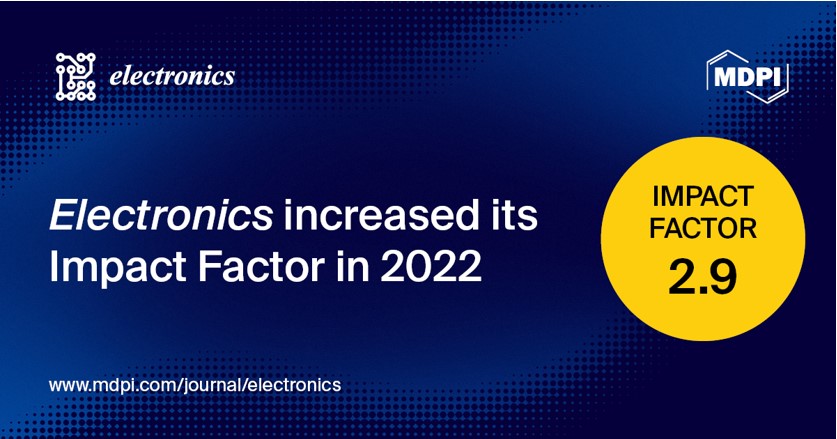
We are pleased to inform you that Electronics (ISSN: 2079-9292) received an updated Impact Factor of 2.9 in the June 2022 release of the Journal Citation Reports®.
Electronics now ranks as follows:
- 131/275 (Q2) in the "Electronical & Electronic Engineering" category;
- 71/159 (Q2) in the "Applied Physics" category;
- 99/158 (Q3) in the "Information Systems, Computer Science" category.
For more journal statistics, please visit: https://www.mdpi.com/journal/electronics/stats.
We would like to extend our sincerest gratitude to all the authors, editors, and reviewers for their valuable contributions, which have enabled us to make great achievements!
28 June 2023
2022 Impact Factors for MDPI Journals
The 2022 citation metrics have been released in the Journal Citation Reports (JCR), and we’re pleased to announce the following results for MDPI journals:

We are thrilled to announce that 90% of our ranked MDPI journals, specifically 86 out of 96 (captured in the table below), are performing above average in Q1 or Q2. This year, Clarivate has expanded its Impact Factor (IF) awards to include journals in the Emerging Sources Citation Index (ESCI) and the Arts and Humanities Citation Index (AHCI), providing greater transparency for the full set of journals indexed in the Web of Science Core Collection. As a result, 111 of MDPI journals have received their first IF in 2023, with 37 journals surpassing an IF of 3.0. In total, 208 MDPI journals have been honored with an IF.
Clarivate explains that by "expanding the coverage but holding to highly selective standards, the [Impact Factor] is now a reliable indicator of trustworthiness, as well as a measure of scholarly impact, at the journal level."
Please visit our blog post where we discuss the release of the latest citation metrics with our Indexing Manager, Dr. Constanze Schelhorn, to find out what's different this time around and how to make use of different metrics available.
| Journal | Impact Factor | Rank Quartile | Category |
| Vaccines | 7.8 | Q1 | Immunology |
| Medicine, Research & Experimental | |||
| Antioxidants | 7.0 | Q1 | Food Science & Technology |
| Biochemistry & Molecular Biology | |||
| Chemistry, Medicinal | |||
| Cells | 6.0 | Q2 | Cell Biology |
| Nutrients | 5.9 | Q1 | Nutrition & Dietetics |
| International Journal of Molecular Sciences | 5.6 | Q1 | Biochemistry & Molecular Biology |
| Q2 | Chemistry, Multidisciplinary | ||
| Journal of Theoretical and Applied Electronic Commerce Research | 5.6 | Q2 | Business |
| Biomolecules | 5.5 | Q1 | Biochemistry & Molecular Biology |
| Biosensors | 5.4 | Q1 | Chemistry, Analytical |
| Instruments & Instrumentation | |||
| Q2 | Nanoscience & Nanotechnology | ||
| Fractal and Fractional | 5.4 | Q1 | Mathematics, Interdisciplinary Applications |
| Marine Drugs | 5.4 | Q1 | Chemistry, Medicinal |
| Pharmacology & Pharmacy | |||
| Pharmaceutics | 5.4 | Q1 | Pharmacology & Pharmacy |
| Nanomaterials | 5.3 | Q1 | Physics, Applied |
| Q2 | Chemistry, Multidisciplinary | ||
| Materials Science, Multidisciplinary | |||
| Nanoscience & Nanotechnology | |||
| Cancers | 5.2 | Q2 | Oncology |
| Foods | 5.2 | Q1 | Food Science & Technology |
| Polymers | 5.0 | Q1 | Polymer Science |
| Remote Sensing | 5.0 | Q1 | Geosciences, Multidisciplinary |
| Q2 | Remote Sensing | ||
| Imaging Science & Photographic Technology | |||
| Environmental Sciences | |||
| Antibiotics | 4.8 | Q1 | Pharmacology & Pharmacy |
| Q2 | Infectious Diseases | ||
| Drones | 4.8 | Q2 | Remote Sensing |
| Journal of Functional Biomaterials | 4.8 | Q2 | Engineering, Biomedical |
| Materials Science, Biomaterials | |||
| Biomedicines | 4.7 | Q1 | Pharmacology & Pharmacy |
| Q2 | Biochemistry & Molecular Biology | ||
| Medicine, Research & Experimental | |||
| Journal of Fungi | 4.7 | Q2 | Mycology |
| Microbiology | |||
| Viruses | 4.7 | Q2 | Virology |
| Bioengineering | 4.6 | Q2 | Engineering, Biomedical |
| Gels | 4.6 | Q1 | Polymer Science |
| Molecules | 4.6 | Q2 | Chemistry, Multidisciplinary |
| Biochemistry & Molecular Biology | |||
| Pharmaceuticals | 4.6 | Q2 | Pharmacology & Pharmacy |
| Chemistry, Medicinal | |||
| Toxics | 4.6 | Q1 | Toxicology |
| Q2 | Environmental Sciences | ||
| Biomimetics | 4.5 | Q1 | Engineering, Multidisciplinary |
| Q2 | Materials Science, Biomaterials | ||
| Microorganisms | 4.5 | Q2 | Microbiology |
| Plants | 4.5 | Q1 | Plant Sciences |
| Biology | 4.2 | Q2 | Biology |
| Chemosensors | 4.2 | Q2 | Instruments & Instrumentation |
| Chemistry, Analytical | |||
| Electrochemistry | |||
| Membranes | 4.2 | Q2 | Engineering, Chemical |
| Materials Science, Multidisciplinary | |||
| Chemistry, Physical | |||
| Polymer Science | |||
| Toxins | 4.2 | Q1 | Toxicology |
| Q2 | Food Science & Technology | ||
| Metabolites | 4.2 | Q2 | Biochemistry & Molecular Biology |
| Batteries | 4.0 | Q2 | Electrochemistry |
| Materials Science, Multidisciplinary | |||
| Q3 | Energy & Fuels | ||
| Catalysts | 3.9 | Q2 | Chemistry, Physical |
| Journal of Clinical Medicine | 3.9 | Q2 | Medicine, General & Internal |
| Land | 3.9 | Q2 | Environmental Studies |
| Sensors | 3.9 | Q2 | Instruments & Instrumentation |
| Chemistry, Analytical | |||
| Engineering, Electrical & Electronic | |||
| Sustainability | 3.9 | Q2 | Environmental Sciences (SCIE) |
| Environmental Studies (SSCI) | |||
| Q3 | Green & Sustainable Science & Technology (SCIE) | ||
| Green & Sustainable Science & Technology (SSCI) | |||
| Buildings | 3.8 | Q2 | Construction & Building Technology |
| Engineering, Civil | |||
| Agronomy | 3.7 | Q1 | Agronomy |
| Q2 | Plant Sciences | ||
| Fermentation | 3.7 | Q2 | Biotechnology & Applied Microbiology |
| Pathogens | 3.7 | Q2 | Microbiology |
| Agriculture | 3.6 | Q1 | Agronomy |
| Diagnostics | 3.6 | Q2 | Medicine, General & Internal |
| Genes | 3.5 | Q2 | Genetics & Heredity |
| Journal of Intelligence | 3.5 | Q2 | Psychology, Multidisciplinary |
| Lubricants | 3.5 | Q2 | Engineering, Mechanical |
| Processes | 3.5 | Q2 | Engineering, Chemical |
| Coatings | 3.4 | Q2 | Materials Science, Coatings & Films |
| Physics, Applied | |||
| Q3 | Materials Science, Multidisciplinary | ||
| ISPRS International Journal of Geo-Information | 3.4 | Q2 | Geography, Physical |
| Q3 | Computer Science, Information Systems | ||
| Remote Sensing | |||
| Materials | 3.4 | Q2 | Metallurgy & Metallurgical Engineering |
| Physics, Applied | |||
| Physics, Condensed Matter | |||
| Q3 | Materials Science, Multidisciplinary | ||
| Chemistry, Physical | |||
| Micromachines | 3.4 | Q2 | Instruments & Instrumentation |
| Physics, Applied | |||
| Chemistry, Analytical | |||
| Q3 | Nanoscience & Nanotechnology | ||
| Water | 3.4 | Q2 | Water Resources |
| Environmental Sciences | |||
| Brain Sciences | 3.3 | Q3 | Neurosciences |
| Energies | 3.2 | Q3 | Energy & Fuels |
| Fire | 3.2 | Q1 | Forestry |
| Q2 | Ecology | ||
| Life | 3.2 | Q2 | Biology |
| Current Issues in Molecular Biology | 3.1 | Q3 | Biochemistry & Molecular Biology |
| Horticulturae | 3.1 | Q1 | Horticulture |
| Animals | 3.0 | Q1 | Agriculture, Dairy & Animal Science |
| Veterinary Sciences | |||
| Insects | 3.0 | Q1 | Entomology |
| Atmosphere | 2.9 | Q3 | Meteorology & Atmospheric Sciences |
| Environmental Sciences | |||
| Electronics | 2.9 | Q2 | Engineering, Electrical & Electronic |
| Physics, Applied | |||
| Q3 | Computer Science, Information Systems | ||
| Forests | 2.9 | Q1 | Forestry |
| Inorganics | 2.9 | Q2 | Chemistry, Inorganic & Nuclear |
| Journal of Marine Science and Engineering | 2.9 | Q1 | Engineering, Marine |
| Q2 | Oceanography | ||
| Engineering, Ocean | |||
| Metals | 2.9 | Q2 | Metallurgy & Metallurgical Engineering |
| Q3 | Materials Science, Multidisciplinary | ||
| Tropical Medicine and Infectious Disease | 2.9 | Q2 | Tropical Medicine |
| Parasitology | |||
| Q3 | Infectious Diseases | ||
| Universe | 2.9 | Q2 | Astronomy & Astrophysics |
| Physics, Particles & Fields | |||
| Healthcare | 2.8 | Q2 | Health Policy & Services (SSCI) |
| Q3 | Health Care Sciences & Services (SCIE) | ||
| Applied Sciences | 2.7 | Q2 | Engineering, Multidisciplinary |
| Physics, Applied | |||
| Q3 | Chemistry, Multidisciplinary | ||
| Materials Science, Multidisciplinary | |||
| Crystals | 2.7 | Q2 | Crystallography |
| Q3 | Materials Science, Multidisciplinary | ||
| Entropy | 2.7 | Q2 | Physics, Multidisciplinary |
| Magnetochemistry | 2.7 | Q2 | Chemistry, Inorganic & Nuclear |
| Q3 | Chemistry, Physical | ||
| Materials Science, Multidisciplinary | |||
| Symmetry | 2.7 | Q2 | Multidisciplinary Sciences |
| Actuators | 2.6 | Q2 | Instruments & Instrumentation |
| Engineering, Mechanical | |||
| Aerospace | 2.6 | Q1 | Engineering, Aerospace |
| Behavioral Sciences | 2.6 | Q2 | Psychology, Multidisciplinary |
| Current Oncology | 2.6 | Q3 | Oncology |
| Machines | 2.6 | Q2 | Engineering, Mechanical |
| Q3 | Engineering, Electrical & Electronic | ||
| Medicina | 2.6 | Q3 | Medicine, General & Internal |
| Separations | 2.6 | Q3 | Chemistry, Analytical |
| Minerals | 2.5 | Q2 | Mining & Mineral Processing |
| Mineralogy | |||
| Geochemistry & Geophysics | |||
| Children | 2.4 | Q2 | Pediatrics |
| Diversity | 2.4 | Q2 | Biodiversity Conservation |
| Q3 | Ecology | ||
| Journal of Cardiovascular Development and Disease | 2.4 | Q3 | Cardiac & Cardiovascular Systems |
| Mathematics | 2.4 | Q1 | Mathematics |
| Photonics | 2.4 | Q3 | Optics |
| Veterinary Sciences | 2.4 | Q1 | Veterinary Sciences |
| Fishes | 2.3 | Q2 | Marine & Freshwater Biology |
| Fisheries | |||
| Axioms | 2.0 | Q2 | Mathematics, Applied |
| Systems | 1.9 | Q2 | Social Sciences, Interdisciplinary |
| Tomography | 1.9 | Q3 | Radiology, Nuclear Medicine & Medical Imaging |
Note: The Journal of Personalized Medicine's Impact Factor was omitted in the original release and will be assigned separately. Please find the data on the journal webpage in due course.
Source: 2022 Journal Impact Factors, Journal Citation Reports TM (Clarivate, 2023)
21 June 2023
Meet the Editors | Interview with Dr. Yoichi Hayashi—Section Editor-in-Chief of Section “Artificial Intelligence” in Electronics

In this captivating series, we had the privilege of interviewing the eminent Dr. Yoichi Hayashi, Section Editor-in-Chief of the “Artificial Intelligence” Section of the prestigious Electronics journal (ISSN: 2079-9292). Renowned for his groundbreaking contributions in artificial intelligence, deep neural networks, fuzzy logic, rule extraction, ensemble systems, computational intelligence, data science, and medical informatics, Dr. Hayashi shares his invaluable insights and takes us on an exclusive journey into the inner workings of the journal. Through these interviews, we aim to offer a unique perspective on the publishing process, straight from the Section Editors-in-Chief.
The following is a short Q&A with Dr. Yoichi Hayashi, who shared his vision for the journal with us, as well as his views of the research area and open access publishing:
1. Can you share with us some information about your academic background?
I received my Dr. Eng. degree in systems engineering from the Tokyo University of Science in 1984. Following that, in 1986, I joined the Computer Science Department of Ibaraki University in Japan as an Assistant Professor. Since 1996, I have been a Full Professor at the Computer Science Department of Meiji University in Tokyo. Throughout my career, I have had the privilege of serving as a Visiting Professor at the University of Alabama in Birmingham, USA, and the University of Canterbury in New Zealand. I have authored over 230 published computer science papers.
2. What are your current research interests?
My research interests primarily revolve around deep learning, particularly focusing on the black-box nature of deep neural networks and shallow neural networks. I am dedicated to exploring the transparency, interpretability, and explainability of deep neural networks, as well as developing methodologies for rule extraction. Additionally, I am involved in the development of high-performance classifiers, advanced data mining techniques, big data analytics, and their applications in the field of medical informatics.
3. What advice would you offer to a beginning editor of a journal?
I believe a beginning editor should pay attention to the referee’s reports. Also, I think it's important to provide timely and constructive feedback and try not to rush the reviewer’s process.
4. What is the main challenge for ensuring the integrity and quality of academic publications?
I think a key factor is providing comprehensive and prompt feedback to authors. Professors and scholars greatly value feedback on their research and ensuring that this feedback is thorough and timely can make a significant difference. By offering valuable input to authors, the journal establishes a reputation as a platform that values and supports scholarly research. This, in turn, encourages more submissions and contributes to the growth and recognition of the journal.
5. Which research topics do you think will be of particular interest to the research community in the coming years?
In recent years, several emerging areas have gained significant prominence and offer exciting avenues for exploration. One such area is Core AI, which encompasses the fundamental principles and concepts underlying artificial intelligence. Understanding and advancing the core aspects of AI can lead to breakthroughs in various applications and domains. Machine learning algorithms and deep learning techniques are also areas deserving of attention. These approaches have revolutionized the field by enabling systems to learn from data and make intelligent decisions. Further advancements in these techniques hold tremendous potential for enhancing the capabilities of AI systems.
The field of AI offers a plethora of fascinating topics and directions to explore. Core AI, machine learning algorithms, deep learning, NLP, computer vision, robotics, deep neural networks, cognitive computing, knowledge representation, reasoning, and reinforcement learning are all areas that deserve increased attention as they hold immense potential for shaping the future of AI and driving innovation across various domains.
We wish Dr. Yoichi Hayashi every success in his current position as Section Editor-in-Chief, and we look forward to his contributions to the journal.
16 June 2023
Meet Us at the 22nd International Conference on Solid-State Sensors, Actuators and Microsystems (Transducers 2023), 25–29 June 2023, Kyoto, Japan
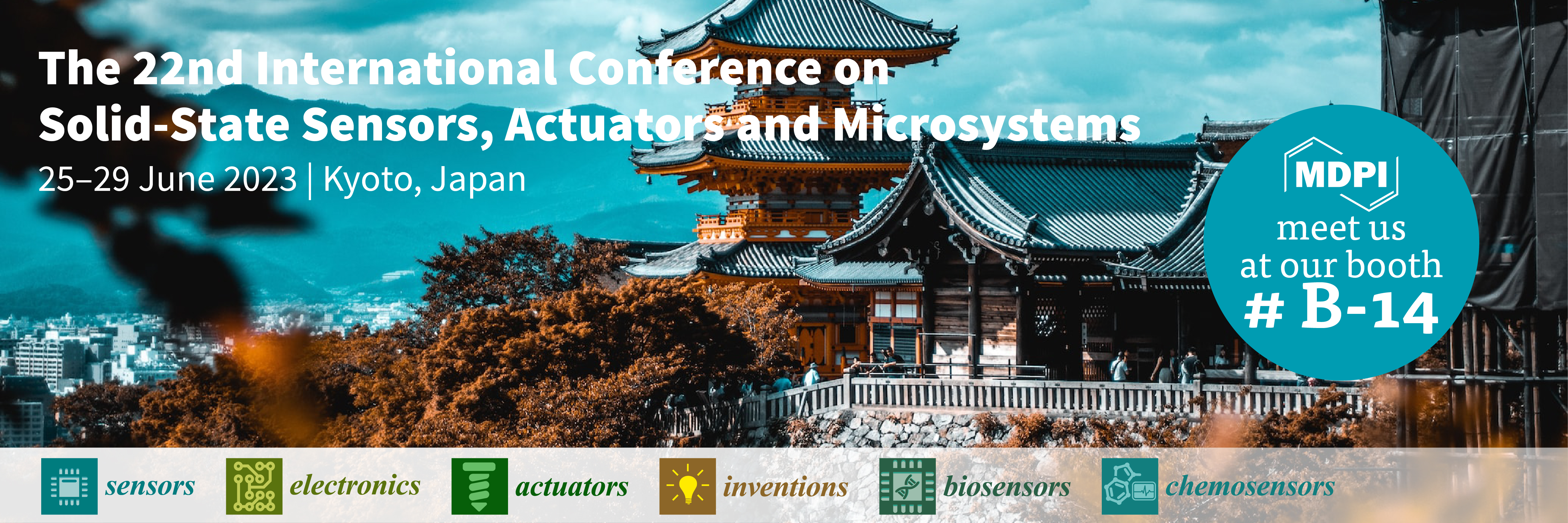
MDPI is attending the 22nd International Conference on Solid-State Sensors, Actuators and Microsystems (Transducers 2023). The event will be held at the Kyoto International Conference Center in Kyoto, Japan, from 25 to 29 June 2023. The conference aims to enhance the collective knowledge of the global transducers technical community by providing an inclusive forum for communication, education, and collaboration.
Representatives of the following MDPI journals will be attending:
If you are also attending this conference, please feel free to stop by our booth (#B-14). Our delegates look forward to meeting you in person to answer any questions you may have. For more information about the conference, please visit: https://transducers2023.org/.
15 June 2023
Meet Us at the 6th International Conference on Nanoenergy and Nanosystems (NENS 2023), 17–19 June 2023, Beijing, China
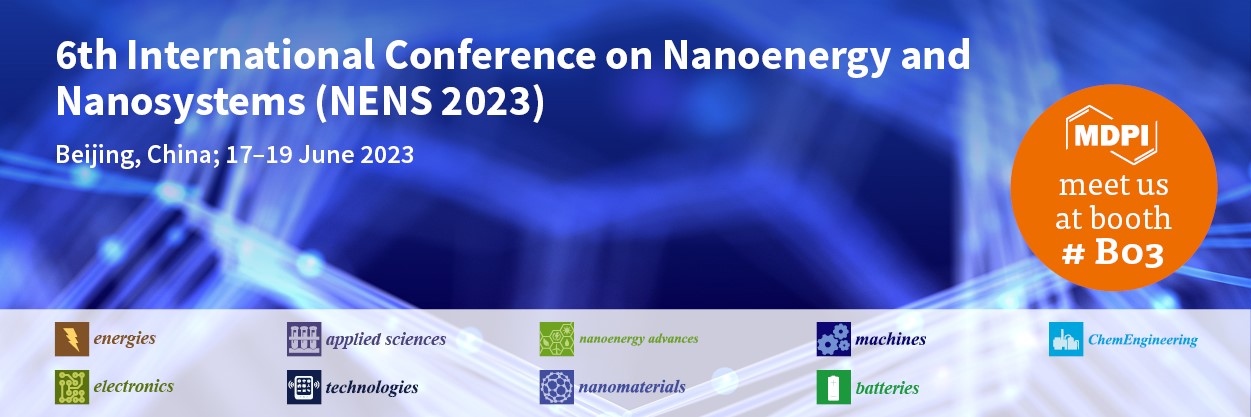
MDPI will be attending the 6th International Conference on Nanoenergy and Nanosystems (NENS 2023), held in Beijing, China, from 17 to 19 June 2023. Starting in 2014, NENS has been organized once every two years by the Beijing Institute of Nanoenergy and Nanosystems, Chinese Academy of Sciences (BINN, CAS). The conference has attracted high-profile scholars from around the world to deliver plenary and invited talks. This conference will provide a platform for scientists to exchange scientific information, build relationships, and possibly establish collaborations. During this conference, MDPI will welcome researchers from different backgrounds to visit and share their latest views as well as research with us.
The following MDPI journals will be represented:
- Energies;
- Applied Sciences;
- Nanoenergy Advances;
- Machines;
- ChemEngineering;
- Electronics;
- Technologies;
- Nanomaterials;
- Batteries.
If you are attending this conference, please stop by our booth. Our delegates look forward to meeting you in person to answer any questions that you may have. For more information about the conference, please visit the following link: http://www.nens.cn/.
14 June 2023
Electronics Webinar | New Insights in Power Electronics and Industrial Electronics, Held on 25 June 2023

On 25 June 2023, MDPI and the journal Electronics (ISSN: 2079-9292) organized a webinar New Insights in Power Electronics and Industrial Electronics. Power electronics and industrial electronics are critical to the efficient operation of modern power systems, manufacturing processes, and transportation systems. The webinar explores the latest trends and their significance for the development of the world in the future.
Prof. Dr. S. M. Muyeen first thanked everyone who participated in the webinar. Prof. Mohamed Benbouzid and Prof. Jen-Hao Teng delivered captivating presentations that shed light on the latest advancements in the field. Their expertise and knowledge enriched our understanding and sparked thought-provoking discussions. We express our gratitude to both speakers for their valuable contributions. The success of the event would not have been possible without the active engagement of the participants and the efforts of the organizing committee. We look forward to exploring more exciting topics in power electronics and industrial electronics together in the future.
Please note that this webinar is associated with a Special Issue in Electronics entitled “Section Collection Series: New Horizons and Recent Advances in Power Electronics”. The deadline for submissions is 31 December 2023.
You can watch the recorded webinar at the following link: https://youtu.be/huhDMAXzuIc.
Webinar Chair and Keynote Speakers:
- Prof. Dr. S. M. Muyeen, Department of Electrical Engineering, Qatar University, Doha, Qatar;
- Prof. Dr. Mohamed Benbouzid, Institut de Recherche Dupuy de Lôme (UMR CNRS 6027 IRDL), University of Brest, Brest, France;
- Prof. Dr. Jen-Hao Teng, Department of Electrical Engineering, National Sun Yat-sen University, Kaohsiung, Taiwan.
14 June 2023
Meet Us at the 5th International Symposium on Multimodal Transportation (ISMT 2023), 19–21 July 2023, Dalian, China

MDPI will be attending the 5th International Symposium on Multimodal Transportation (ISMT 2023) in Dalian, China, which will take place from 19 to 21 July 2023. The International Symposium on Multimodal Transportation aims to promote frontier studies and technologies in transportation system modeling, optimization, and management. It provides an opportunity to share knowledge and exchange ideas on state-of-the-art topics, covering all modes of multimodal transportation systems (e.g., road, rail, air, maritime, and the integration of them).
The following MDPI journals will be represented:
- Electronics;
- Systems;
- Inventions;
- Future Transportation.
If you are attending the conference, please visit our booth. Our delegates look forward to meeting you in person and answering any questions that you may have. For more information about the conference, please visit the following link: http://www.csmmt.org.cn/ISMT/.
14 June 2023
The 8th Asia Pacific Conference on Optics Manufacture and 3rd International Forum of Young Scientists on Advanced Optical Manufacturing, 4–6 Aug 2023, Shenzhen, China

As exhibitors, a range of MDPI journals will be attending the 8th Asia Pacific Conference on Optics Manufacture and 2021 International Forum of Young Scientists on Advanced Optical Manufacturing. This meeting will be held in Shenzhen, China, from 4 to 6 August 2023.
Aerospace, space observation, nano-lithography, synchrotron radiation, high-end optical measuring instruments, and many other fields currently demand advanced optical manufacturing technology. Advanced optical manufacturing technology is developing towards optical intelligent manufacturing and has thus far demonstrated multidisciplinary collaborative development such as ultra-precision manufacturing, precision measurement, intelligent sensing and control, and materials science.
The 8th Asia Pacific Conference on Optics Manufacture (APCOM202) and 3rd International Forum of Young Scientists on Advanced Optical Manufacturing (YSAOM2023) will be held in Shenzhen, China, from 4 to 6 August 2023 by the Chinese Society for Optical Engineering (CSOE). The aim of this event is to build an industry–university–research platform for both application and technology. The conference focuses on the latest development of advanced optical manufacturing technologies and equipment, invites experts of all levels of experience in related fields to make speeches, and provides a platform for cooperation and exchange for related practitioners and graduate students.
The following MDPI journals will be represented:
If you are attending this conference, please feel free to start a conversation with us at our booth. Our delegates look forward to meeting you in person and answering any questions that you may have.
For more information about the conference, please visit: https://b2b.csoe.org.cn/meeting/YSAOM2023.html#233_242.
13 June 2023
Electronics Receives an Increased CiteScore of 4.7
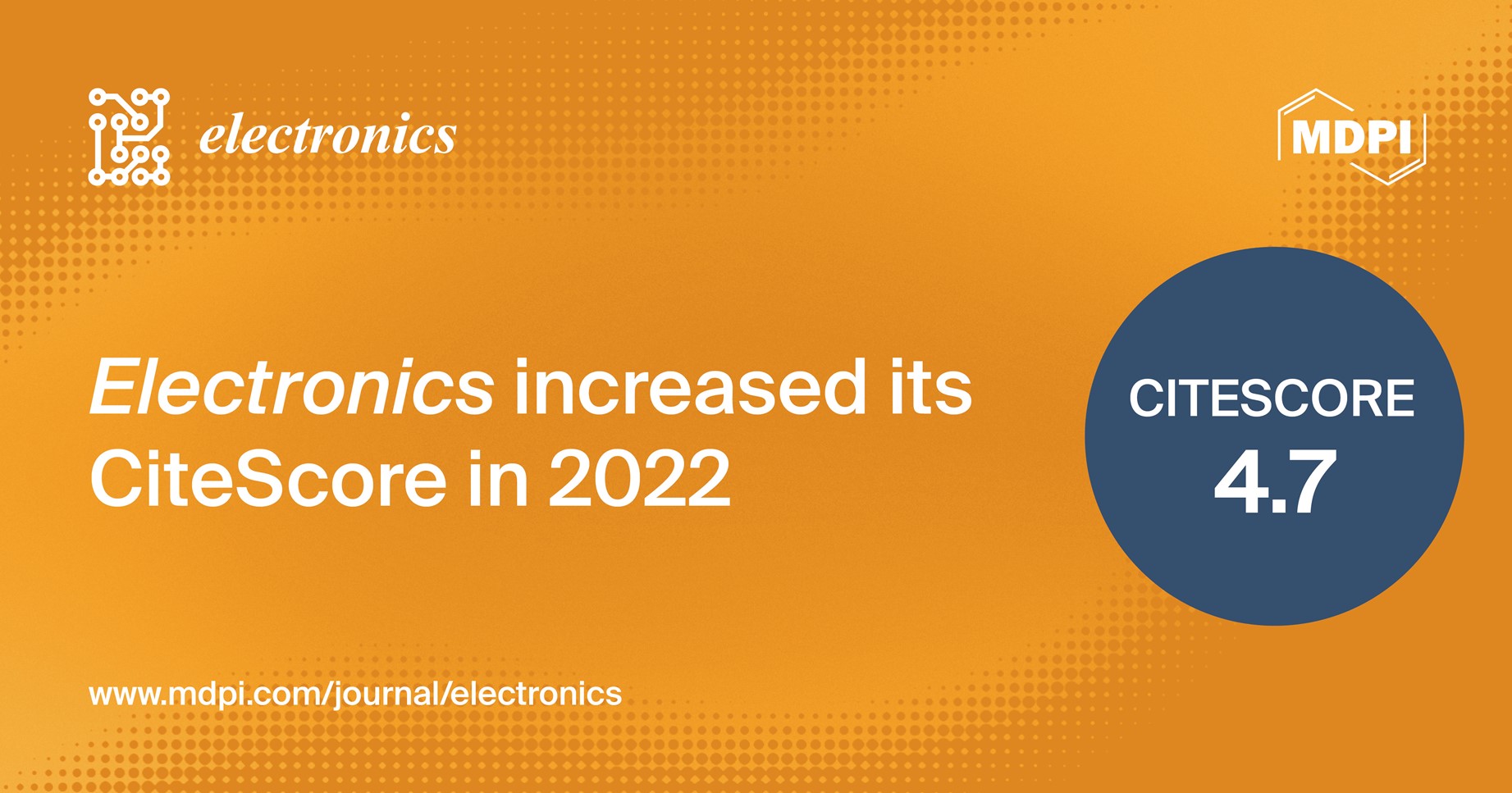
We are pleased to announce that Electronics (ISSN: 2079-9292) has received an increased CiteScore of 4.7 for 2022, which is a 27% increase from last year, and it has been growing steadily. Electronics ranks Q2 (248/738) in the "Electrical & Electronic Engineering" category and Q2 (129/379) in the "Computer Networks and Communications" category. More details can be found here.
We would like to extend our sincerest gratitude to all the authors, reviewers and editors who have supported us and contributed their time to the journal.
For more information or to submit to our journal, please visit the following link: https://www.mdpi.com/journal/electronics.
9 June 2023
Meet the Editors | Interview with Dr. Juan M. Corchado—Section Editor-in-Chief of the Section “Computer Science & Engineering” in Electronics

In this captivating series, we had the privilege of interviewing the eminent Dr. Juan M. Corchado, Section Editor-in-Chief of the “Computer Science & Engineering” Section of Electronics (ISSN: 2079-9292). Renowned for his groundbreaking contributions in artificial intelligence, machine learning, blockchain, IoT, fog computing, edge computing, smart cities, smart grids, sentiment analysis, and bioinformatics, Dr. Corchado shares his invaluable insights and takes us on an exclusive journey into the inner workings of the journal. Through these interviews, our aim is to offer a unique perspective on the publishing process, straight from the Section Editor-in-Chief himself.
The following is a short Q&A with Dr. Juan M. Corchado, who shared his vision for the journal with us, as well as his views on the research area and open access publishing.
1. Can you share with us some information about your academic background?
I hold a Ph.D. in computer science from the esteemed University of Salamanca, Spain, as well as another in artificial intelligence from the University of the West of Scotland. Throughout my academic journey, I have been fortunate enough to serve as the Dean of the Faculty of Science not once, but twice. Additionally, I had the privilege of holding the esteemed position of Vice-Rector for Research and Transfer from 2013 to 2017, along with the role of Director of the Science Park at the University of Salamanca. Currently, I am deeply involved in various cutting-edge initiatives. I proudly serve as the director of the IOT Digital Innovation Hub and hold the esteemed position of president at the AIR Institute.
2. What are your current interests?
My work primarily revolves around groundbreaking projects centered on artificial intelligence, machine learning, blockchain, IoT, fog computing, edge computing, smart cities, smart grids, sentiment analysis, and bioinformatics. Leveraging my extensive experience, I was recently appointed as a trustee of the prestigious AstraZeneca Foundation, a position I hold with great honor and responsibility.
3. What made you choose to work with us knowing that we are an open access digital publisher?
In my view, I strongly believe that open access represents the future of publishing. I hold a positive stance towards the concept of providing free access to information. It is worth noting that one of the requirements for European projects is to publish research in an open access format. This presents a remarkable opportunity to contribute to the development of countries that may not have the same level of access to resources.
4. Electronics is an open access publication. How do you think open access impacts authors?
From the Section Editor-in-Chief perspective, I see open access as the way forward for the future of publishing. The idea of enabling unrestricted access to valuable information resonates with me and aligns with my vision for fostering knowledge dissemination. I believe that authors are the key foundation for open access. I am genuinely content with the work and contributions that our authors make to the scientific community. Their dedication and commitment to advancing knowledge are commendable. It is through their collective efforts that we can foster a vibrant and impactful scholarly environment.
5. What is the main challenge in ensuring the integrity and quality of academic publications?
In my role as the Section Editor-in-Chief, I strongly encourage authors to upload their code and other supplementary materials on platforms like GitHub. Doing so not only facilitates easy reference for readers, but also enhances the credibility of their work. By making these resources readily accessible, authors contribute to the transparency and reproducibility of their research, which is highly valued in the scientific community.
6. Which research topics do you think will be of particular interest to the research community in the coming years?
I’m aware that there are numerous automated tools, including options like ChatGPT, that facilitate the creation of PowerPoint presentations. However, it's important to acknowledge that the advancements in AI extend far beyond just these tools. Exciting developments are occurring in various other AI-related areas. Some notable examples include the emergence of data lakes, the implementation of federated learning, the integration of AI in blockchain technology, and the continuous development of new models.
We wish Dr. Juan M. Corchado every success in his current position as Section Editor-in-Chief, and we look forward to his future contributions to the journal.
7 June 2023
Electronics | Highly Cited Papers in 2022 in the Section “Artificial Intelligence”

The Section “Artificial Intelligence” mainly covers topics of interest within unique hardware-based deep learning AI and algorithmic deep learning AI using machine learning. The purpose of this Section is to bring together researchers and engineers from both academia and the industry to present novel ideas and solid research on the hardware and algorithmic aspects of advanced applications of deep learning-based AI.
As they are of open access format, you have free and unlimited access to the full text of all the articles published in our journal. We welcome you to read our most highly cited papers published in 2022 below:
1. “A Survey of Recommendation Systems: Recommendation Models, Techniques, and Application Fields”
by Hyeyoung Ko, Suyeon Lee, Yoonseo Park and Anna Choi
Electronics 2022, 11(1), 141; https://doi.org/10.3390/electronics11010141
Available online: https://www.mdpi.com/2079-9292/11/1/141
2. “User OCEAN Personality Model Construction Method Using a BP Neural Network”
by Xiaomei Qin, Zhixin Liu, Yuwei Liu, Shan Liu, Bo Yang, Lirong Yin, Mingzhe Liu and Wenfeng Zheng
Electronics 2022, 11(19), 3022; https://doi.org/10.3390/electronics11193022
Available online: https://www.mdpi.com/2079-9292/11/19/3022
3. “Hybridizing of Whale and Moth-Flame Optimization Algorithms to Solve Diverse Scales of Optimal Power Flow Problem”
by Mohammad H. Nadimi-Shahraki, Ali Fatahi, Hoda Zamani, Seyedali Mirjalili and Diego Oliva
Electronics 2022, 11(5), 831; https://doi.org/10.3390/electronics11050831
Available online: https://www.mdpi.com/2079-9292/11/5/831
4. “Recent Advances in Harris Hawks Optimization: A Comparative Study and Applications”
by Abdelazim G. Hussien, Laith Abualigah, Raed Abu Zitar, Fatma A. Hashim, Mohamed Amin, Abeer Saber, Khaled H. Almotairi and Amir H. Gandomi
Electronics 2022, 11(12), 1919; https://doi.org/10.3390/electronics11121919
Available online: https://www.mdpi.com/2079-9292/11/12/1919
5. “Applying Data Mining and Artificial Intelligence Techniques for High Precision Measuring of the Two-Phase Flow’s Characteristics Independent of the Pipe’s Scale Layer”
by Abdulilah Mohammad Mayet, Ahmed S. Salama, Seyed Mehdi Alizadeh, Slavko Nesic, John William Grimaldo Guerrero, Ehsan Eftekhari-Zadeh, Ehsan Nazemi and Abdullah M. Iliyasu
Electronics 2022, 11(3), 459; https://doi.org/10.3390/electronics11030459
Available online: https://www.mdpi.com/2079-9292/11/3/459
6. “Enhanced Credit Card Fraud Detection Model Using Machine Learning”
by Noor Saleh Alfaiz and Suliman Mohamed Fati
Electronics 2022, 11(4), 662; https://doi.org/10.3390/electronics11040662
Available online: https://www.mdpi.com/2079-9292/11/4/662
7. “A Survey of Trajectory Planning Techniques for Autonomous Systems”
by Imran Mir, Faiza Gul, Suleman Mir, Mansoor Ahmed Khan, Nasir Saeed, Laith Abualigah, Belal Abuhaija and Amir H. Gandomi
Electronics 2022, 11(18), 2801; https://doi.org/10.3390/electronics11182801
Available online: https://www.mdpi.com/2079-9292/11/18/2801
8. “Effect of Feature Selection on the Accuracy of Music Popularity Classification Using Machine Learning Algorithms”
by Faheem Khan, Ilhan Tarimer, Hathal Salamah Alwageed, Buse Cennet Karadağ, Muhammad Fayaz, Akmalbek Bobomirzaevich Abdusalomov and Young-Im Cho
Electronics 2022, 11(21), 3518; https://doi.org/10.3390/electronics11213518
Available online: https://www.mdpi.com/2079-9292/11/21/3518
9. “Hybrid CNN and XGBoost Model Tuned by Modified Arithmetic Optimization Algorithm for COVID-19 Early Diagnostics from X-ray Images”
by Miodrag Zivkovic, Nebojsa Bacanin, Milos Antonijevic, Bosko Nikolic, Goran Kvascev, Marina Marjanovic and Nikola Savanovic
Electronics 2022, 11(22), 3798; https://doi.org/10.3390/electronics11223798
Available online: https://www.mdpi.com/2079-9292/11/22/3798
10. “A Review of Machine Learning Techniques in Analog Integrated Circuit Design Automation”
by Rayan Mina, Chadi Jabbour and George E. Sakr
Electronics 2022, 11(3), 435; https://doi.org/10.3390/electronics11030435
Available online: https://www.mdpi.com/2079-9292/11/3/435
6 June 2023
Topics Webinar | Smart Manufacturing and Industry 5.0, 15 June 2023

Welcome message by Dr. Dimitris Mourtzis, the webinar chair:
We welcome you to our webinar Smart Manufacturing and Industry 5.0. We will explore how the integration of advanced technologies is reshaping the manufacturing sector. Industry 5.0 represents a paradigm shift, where humans and intelligent machines collaborate in a seamless ecosystem. Our expert speakers will discuss the principles, trends, and transformative potential of smart manufacturing. We will delve into automation, AI, big data, and IoT, optimizing production and enabling real-time decision making. We will also highlight the importance of human workers in Industry 5.0, where collaborative robots, augmented reality, and cognitive computing unlock new possibilities. Therefore, we invite you to join us on this interesting webinar to uncover the potential of smart manufacturing and Industry 5.0, gain valuable insights, participate in stimulating discussions, and envision the future of manufacturing.
Date: 15 June 2023 at 9:00 a.m. CEST | 15:00 p.m. CST Asia
Register now for free!
Program:
|
Speaker/Presentation |
Time in CEST |
Time in EDT |
|
Dr. Dimitris Mourtzis Chair Introduction |
09:00–09:10 a.m. |
15:00–15:10 p.m. |
|
Dr. Pai Zheng Towards Mutual Cognitive Human–Robot Collaboration in Manufacturing |
9:10–9:30 a.m. |
15:10–15:30 p.m. |
|
Dr. Ang Liu AI-driven Engineering Design |
9:30–9:50 a.m. |
15:30–15:50 p.m. |
|
Dr. Dimitris Mourtzis Industrial Metaverse: Challenges & Opportunities |
9:50–10:10 a.m. |
15:50–16:10 p.m. |
|
Dr. Dimitris Mourtzis Closing of Webinar |
10:25–10:30 a.m. |
16:25–16:30 p.m. |
After registering, you will receive a confirmation email containing information on how to join the webinar. Registrations with academic institutional email addresses will be prioritized.
Unable to attend? Register anyway and we’ll let you know when the recording is available to watch.
Webinar Chair and Keynote Speakers:
- Dimitris Mourtzis, Department of Mechanical Engineering and Aeronautics, University of Patras, Patras, Greece;
- Pai Zheng, Department of Industrial and Systems Engineering, The Hong Kong Polytechnic University, Hong Kong Special Administrative Region of China;
- Ang Liu, The University of New South Wales, Kensington, Australia.
Relevant Topic:
“Smart Manufacturing and Industry 5.0”
Abstract submission deadline: 30 September 2023
Manuscript submission deadline: 30 November 2023
1 June 2023
Electronics | Highly Cited Papers in 2022 in the Section “Electrical and Autonomous Vehicles”
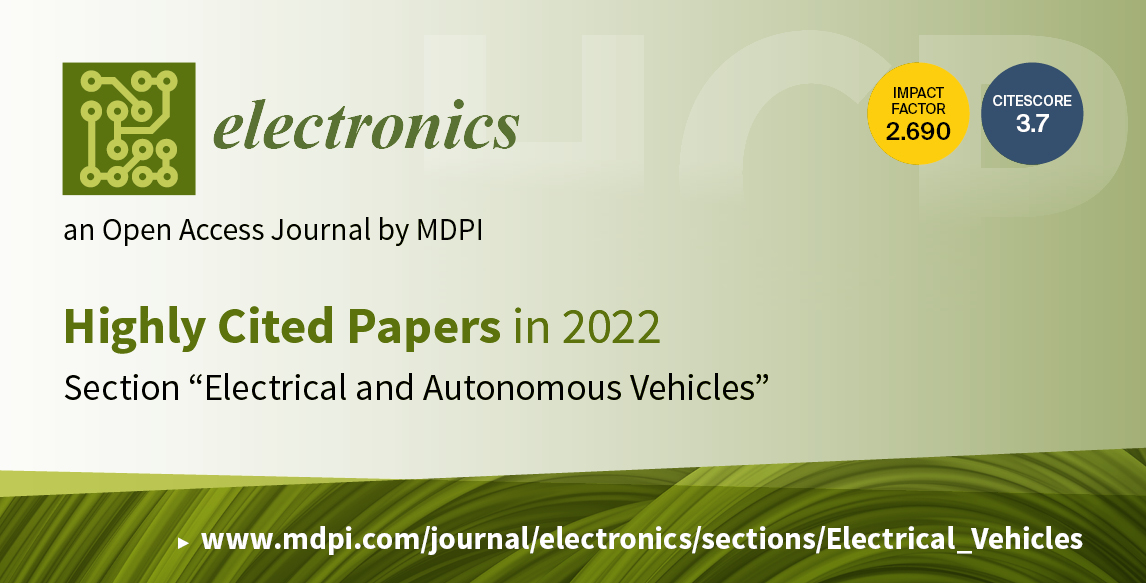
This Section of Electronics (ISSN: 2079-9292), entitled “Electrical and Autonomous Vehicles”, addresses the various different perspectives on the design, development, and usage of electric and autonomous vehicles, as well as their impact on people’s lives, on cities, and on power and energy systems. We welcome papers on innovative scientific and technical developments, sound case studies, and reviews that are relevant and/or related to the Section.
As they are of open access format, you have free and unlimited access to the full text of all of the articles published in our journal. We welcome you to read our most highly cited papers published in 2022 below.
1. “A Path Planning Method for Underground Intelligent Vehicles Based on an Improved RRT* Algorithm”
by Hao Wang, Guoqing Li, Jie Hou, Lianyun Chen and Nailian Hu
Electronics 2022, 11(3), 294; https://doi.org/10.3390/electronics11030294
Available online: https://www.mdpi.com/2079-9292/11/3/294
2. “Autonomous Traffic System for Emergency Vehicles”
by Mamoona Humayun, Maram Fahhad Almufareh and Noor Zaman Jhanjhi
Electronics 2022, 11(4), 510; https://doi.org/10.3390/electronics11040510
Available online: https://www.mdpi.com/2079-9292/11/4/510
3. “Adaptive Fuzzy PID Control Strategy for Vehicle Active Suspension Based on Road Evaluation”
by Shi-Yuan Han, Jia-Feng Dong, Jin Zhou and Yue-Hui Chen
Electronics 2022, 11(6), 921; https://doi.org/10.3390/electronics11060921
Available online: https://www.mdpi.com/2079-9292/11/6/921
4. “Autonomous Maneuver Decision Making of Dual-UAV Cooperative Air Combat Based on Deep Reinforcement Learning”
by Jinwen Hu, Luhe Wang, Tianmi Hu, Chubing Guo and Yanxiong Wang
Electronics 2022, 11(3), 467; https://doi.org/10.3390/electronics11030467
Available online: https://www.mdpi.com/2079-9292/11/3/467
5. “Intelligent Speed Control and Performance Investigation of a Vector Controlled Electric Vehicle Considering Driving Cycles”
by Adel Oubelaid, Nabil Taib, Srete Nikolovski, Turki E. A. Alharbi, Toufik Rekioua, Aymen Flah and Sherif S. M. Ghoneim
Electronics 2022, 11(13), 1925; https://doi.org/10.3390/electronics11131925
Available online: https://www.mdpi.com/2079-9292/11/13/1925
6. “Novel Multi-Vehicle Motion-Based Model of Trolleybus Grids towards Smarter Urban Mobility”
by Riccardo Barbone, Riccardo Mandrioli, Mattia Ricco, Rudolf Francesco Paternost, Vincenzo Cirimele and Gabriele Grandi
Electronics 2022, 11(6), 915; https://doi.org/10.3390/electronics11060915
Available online: https://www.mdpi.com/2079-9292/11/6/915
7. “Power Electronics Converter Technology Integrated Energy Storage Management in Electric Vehicles: Emerging Trends, Analytical Assessment and Future Research Opportunities”
by Molla Shahadat Hossain Lipu, Md. Sazal Miah, Shaheer Ansari, Sheikh Tanzim Meraj, Kamrul Hasan, Rajvikram Madurai Elavarasan, Abdullah Al Mamun, Muhammad Ammirrul A. M. Zainuri and Aini Hussain
Electronics 2022, 11(4), 562; https://doi.org/10.3390/electronics11040562
Available online: https://www.mdpi.com/2079-9292/11/4/562
8. “A Novel Airspace Planning Algorithm for Cooperative Target Localization”
by Yi Mao, Yongwen Zhu, Zhili Tang and Zhijie Chen
Electronics 2022, 11(18), 2950; https://doi.org/10.3390/electronics11182950
Available online: https://www.mdpi.com/2079-9292/11/18/2950
9. “Performance Evaluation of VANET Routing Protocols in Madinah City”
by Mohammad A. R. Abdeen, Abdurrahman Beg, Saud Mohammad Mostafa, AbdulAziz AbdulGhaffar, Tarek R. Sheltami and Ansar Yasar
Electronics 2022, 11(5), 777; https://doi.org/10.3390/electronics11050777
Available online: https://www.mdpi.com/2079-9292/11/5/777
10. “Expressway Speed Prediction Based on Electronic Toll Collection Data”
by Fumin Zou, Qiang Ren, Junshan Tian, Feng Guo, Shibin Huang, Lyuchao Liao and Jinshan Wu
Electronics 2022, 11(10), 1613; https://doi.org/10.3390/electronics11050777
Available online: https://www.mdpi.com/2079-9292/11/10/1613
25 May 2023
Meet Us at the 7th Scientific Meeting of Ph.D. Students (JPhD2023), 7–9 June 2023, Barcelona, Spain

MDPI will be presenting at the 7th Scientific Meeting of Ph.D. Students at the UAB campus (JPhD2023). The event will be held at the Sala d'Actes Institut de Ciència de Materials de Barcelona in Barcelona, Spain, from 7 to 9 June 2023.
JPhD2023 aims to facilitate the exchange of knowledge about scientific research from different fields, sharing of research works and communication among the Ph.D. students of the BNC-b in an academic and scientific environment.
MDPI Speaker

Dr. Gabriel Martínez Edo
Presentation theme: MDPI Open Access & Peer Review Process
Dr. Gabriel Martínez Edo holds a bachelor’s degree in chemistry (2013) and a master’s degree in pharmaceutical chemistry (2015) from the IQS school of Engineering, Universitat Ramon Llull (Barcelona, Spain). He completed his Ph.D. (2020) in chemistry and chemical engineering at the same institution focusing on the use of nanomaterials as drug delivery systems.
He joined MDPI in June 2020 as Assistant Editor and Section Managing Editor for the journal Nanomaterials. In 2021, he was appointed Managing Editor of the journal Nanomanufacturing, a position he held until his recent appointment as Journal Relations Specialist.
If you are also attending this conference, please feel free to stop by our booth. Our delegates look forward to meeting you in person to answer any questions you may have. For more information about the conference, please visit: https://jphd.icmab.es/.
Relevant Journals:
17 May 2023
Electronics | Highly Cited Papers in 2021 in the Section “Electrical and Autonomous Vehicles”
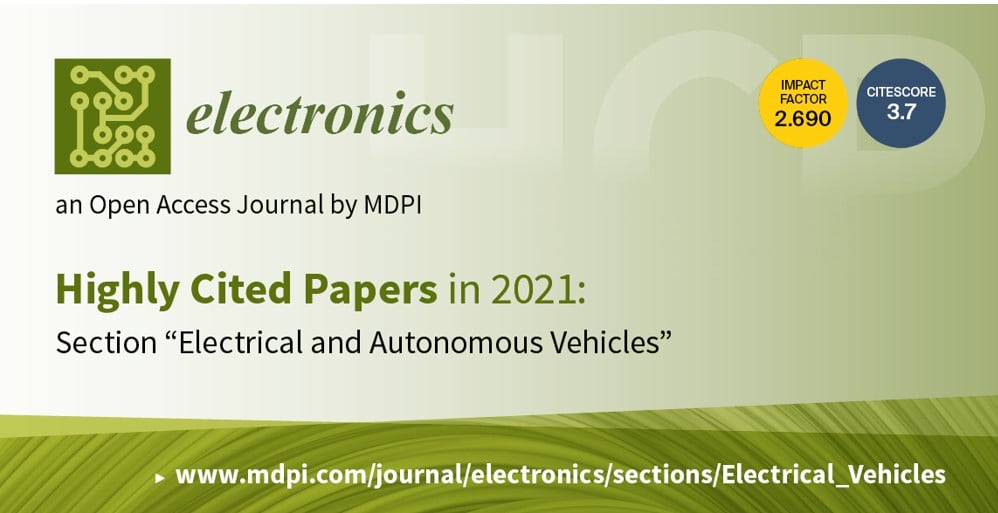
This Section “Electrical and Autonomous Vehicles” addresses the different perspectives of design, development, and usage of electric and autonomous vehicles, as well as their impact on people’s lives, on cities, and on power and energy systems. We welcome papers on innovative scientific and technical developments, sound case studies, and reviews that are relevant and/or related to the Section “Electrical and Autonomous Vehicles”.
As they are of open access format, you have free and unlimited access to the full text of all of the articles published in our journal. We welcome you to read our most highly cited papers published in 2021 below.
1. “Review of Electric Vehicle Technologies, Charging Methods, Standards and Optimization Techniques”
by Syed Muhammad Arif, Tek Tjing Lie, Boon Chong Seet, Soumia Ayyadi and Kristian Jensen
Electronics 2021, 10(16), 1910; https://doi.org/10.3390/electronics10161910
Available online: https://www.mdpi.com/2079-9292/10/16/1910
2. “A Simulated Annealing Algorithm and Grid Map-Based UAV Coverage Path Planning Method for 3D Reconstruction”
by Sichen Xiao Azar, Xiaojun Tan and Jinping Wang
Electronics 2021, 10(7), 853; https://doi.org/10.3390/electronics10070853
Available online: https://www.mdpi.com/2079-9292/10/7/853
3. “A Survey of Trust Management in the Internet of Vehicles”
by Sarah Ali Siddiqui, Adnan Mahmood, Quan Z. Sheng, Hajime Suzuki and Wei Ni
Electronics 2021, 10(18), 2223; https://doi.org/10.3390/electronics10182223
Available online: https://www.mdpi.com/2079-9292/10/18/2223
4. “Machine-Learning-Enabled Intrusion Detection System for Cellular Connected UAV Networks”
by Rakesh Shrestha, Atefeh Omidkar, Sajjad Ahmadi Roudi, Robert Abbas and Shiho Kim
Electronics 2021, 10(13), 1549; https://doi.org/10.3390/electronics10131549
Available online: https://www.mdpi.com/2079-9292/10/13/1549
5. “Is There a Predisposition towards the Use of New Technologies within the Traffic Field of Emerging Countries? The Case of the Dominican Republic”
by Francisco Alonso, Mireia Faus, Cristina Esteban and Sergio A. Useche
Electronics 2021, 10(10), 1208; https://doi.org/10.3390/electronics10101208
Available online: https://www.mdpi.com/2079-9292/10/10/1208
6. “An Enhanced Multicell-to-Multicell Battery Equalizer Based on Bipolar-Resonant LC Converter”
by Xuan Luo, Longyun Kang, Chusheng Lu, Jinqing Linghu, Hongye Lin and Bihua Hu
Electronics 2021, 10(3), 293; https://doi.org/10.3390/electronics10030293
Available online: https://www.mdpi.com/2079-9292/10/3/293
7. “A Survey on Deep Learning Based Approaches for Scene Understanding in Autonomous Driving”
by Zhiyang Guo, Yingping Huang, Xing Hu, Hongjian Wei and Baigan Zhao
Electronics 2021, 10(4), 471; https://doi.org/10.3390/electronics10040471
Available online: https://www.mdpi.com/2079-9292/10/4/471
8. “UAV-Assisted Data Collection in Wireless Sensor Networks: A Comprehensive Survey”
by Minh T. Nguyen, Cuong V. Nguyen, Hai T. Do, Hoang T. Hua, Thang A. Tran, An D. Nguyen, Guido Ala and Fabio Viola
Electronics 2021, 10(21), 2603; https://doi.org/10.3390/electronics10212603
Available online: https://www.mdpi.com/2079-9292/10/21/2603
9. “Machine Learning-Based Vehicle Trajectory Prediction Using V2V Communications and On-Board Sensors”
by Dongho Choi, Janghyuk Yim, Minjin Baek and Sangsun Lee
Electronics 2021, 10(4), 420; https://doi.org/10.3390/electronics10040420
Available online: https://www.mdpi.com/2079-9292/10/4/420
10. “Reliable Vehicle Data Storage Using Blockchain and IPFS”
by Hyoeun Ye and Sejin Park
Electronics 2021, 10(10), 1130; https://doi.org/10.3390/electronics10101130
Available online: https://www.mdpi.com/2079-9292/10/10/1130
17 May 2023
Electronics | Highly Cited Papers in 2021 in the Section “Artificial Intelligence”
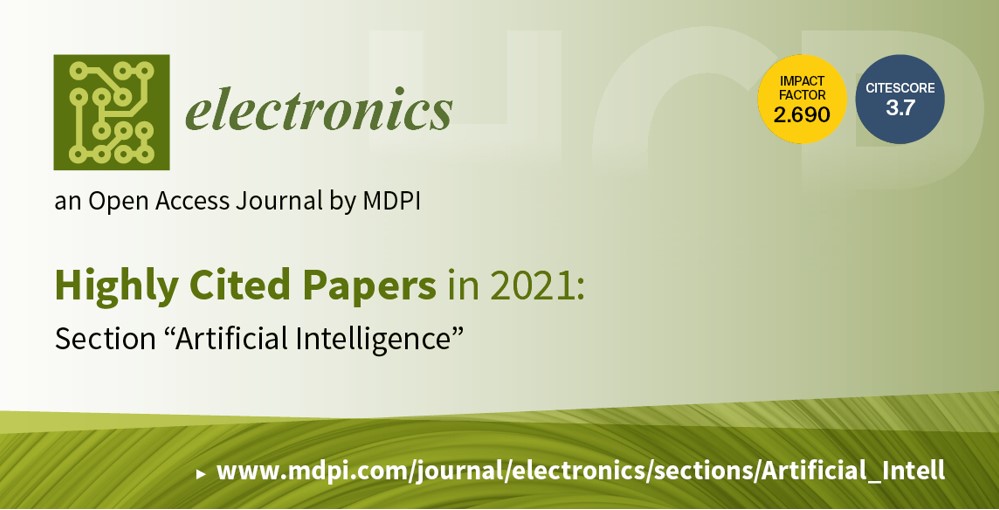
The Section “Artificial Intelligence” mainly covers topics of interest within unique hardware-based deep learning AI and algorithmic deep learning AI using machine learning. The purpose of this Section is to bring together researchers and engineers, from both academia and industry, to present novel ideas and solid research on the hardware and algorithmic aspects of advanced applications of deep-learning-based AI.
As they are of open access format, you have free and unlimited access to the full text of all the articles published in our journal. We welcome you to read our most highly cited papers published in 2021 below:
1. “Biometric User Identification Based on Human Activity Recognition Using Wearable Sensors: An Experiment Using Deep Learning Models”
by Sakorn Mekruksavanich and Anuchit Jitpattanakul
Electronics 2021, 10(3), 308; https://doi.org/10.3390/electronics10030308
Available online: https://www.mdpi.com/2079-9292/10/3/308
2. “Artificial Neural Networks Based Optimization Techniques: A Review”
by Maher G. M. Abdolrasol, S. M. Suhail Hussain, Taha Selim Ustun, Mahidur R. Sarker, Mahammad A. Hannan, Ramizi Mohamed, Jamal Abd Ali, Saad Mekhilef and Abdalrhman Milad
Electronics 2021, 10(21), 2689; https://doi.org/10.3390/electronics10212689
Available online: https://www.mdpi.com/2079-9292/10/21/2689
3. “An Advanced CNN-LSTM Model for Cryptocurrency Forecasting”
by Ioannis E. Livieris, Niki Kiriakidou, Stavros Stavroyiannis and Panagiotis Pintelas
Electronics 2021, 10(3), 287; https://doi.org/10.3390/electronics10030287
Available online: https://www.mdpi.com/2079-9292/10/3/287
4. “Deep Convolutional Neural Network with RNNs for Complex Activity Recognition Using Wrist-Worn Wearable Sensor Data”
by Sakorn Mekruksavanich and Anuchit Jitpattanakul
Electronics 2021, 10(14), 1685; https://doi.org/10.3390/electronics10141685
Available online: https://www.mdpi.com/2079-9292/10/14/1685
5. “Novel Control Strategy for Enhancing Microgrid Operation Connected to Photovoltaic Generation and Energy Storage Systems”
by Dina Emara, Mohamed Ezzat, Almoataz Y. Abdelaziz, Karar Mahmoud, Matti Lehtonen and Mohamed M. F. Darwish
Electronics 2021, 10(11), 1261; https://doi.org/10.3390/electronics10111261
Available online: https://www.mdpi.com/2079-9292/10/11/1261
6. “Improved YOLOv3 Network for Insulator Detection in Aerial Images with Diverse Background Interference”
by Chuanyang Liu Yiquan Wu, Jingjing Liu and Zuo Sun
Electronics 2021, 10(7), 771; https://doi.org/10.3390/electronics10070771
Available online: https://www.mdpi.com/2079-9292/10/7/771
7. “EWOA-OPF: Effective Whale Optimization Algorithm to Solve Optimal Power Flow Problem”
by Mohammad H. Nadimi-Shahraki, Shokooh Taghian, Seyedali Mirjalili, Laith Abualigah, Mohamed Abd Elaziz and Diego Oliva
Electronics 2021, 10(23), 2975; https://doi.org/10.3390/electronics10232975
Available online: https://www.mdpi.com/2079-9292/10/23/2975
8. “Concrete Cracks Detection and Monitoring Using Deep Learning-Based Multiresolution Analysis”
by Ahcene Arbaoui Abdeldjalil Ouahabi, Sébastien Jacques and Madina Hamiane
Electronics 2021, 10(15), 1772; https://doi.org/10.3390/electronics10151772
Available online: https://www.mdpi.com/2079-9292/10/15/1772
9. “A Survey on Machine Learning-Based Performance Improvement of Wireless Networks: PHY, MAC and Network Layer”
by Merima Kulin, Tarik Kazaz, Eli De Poorter and Ingrid Moerman
Electronics 2021, 10(3), 318; https://doi.org/10.3390/electronics10030318
Available online: https://www.mdpi.com/2079-9292/10/3/318
10. “Review on Generative Adversarial Networks: Focusing on Computer Vision and Its Applications”
by Sung-Wook Park, Jae-Sub Ko, Jun-Ho Huh and Jong-Chan Kim
Electronics 2021, 10(10), 1216; https://doi.org/10.3390/electronics10101216
Available online: https://www.mdpi.com/2079-9292/10/10/1216
14 May 2023
2023 World Telecommunication and Information Society Day
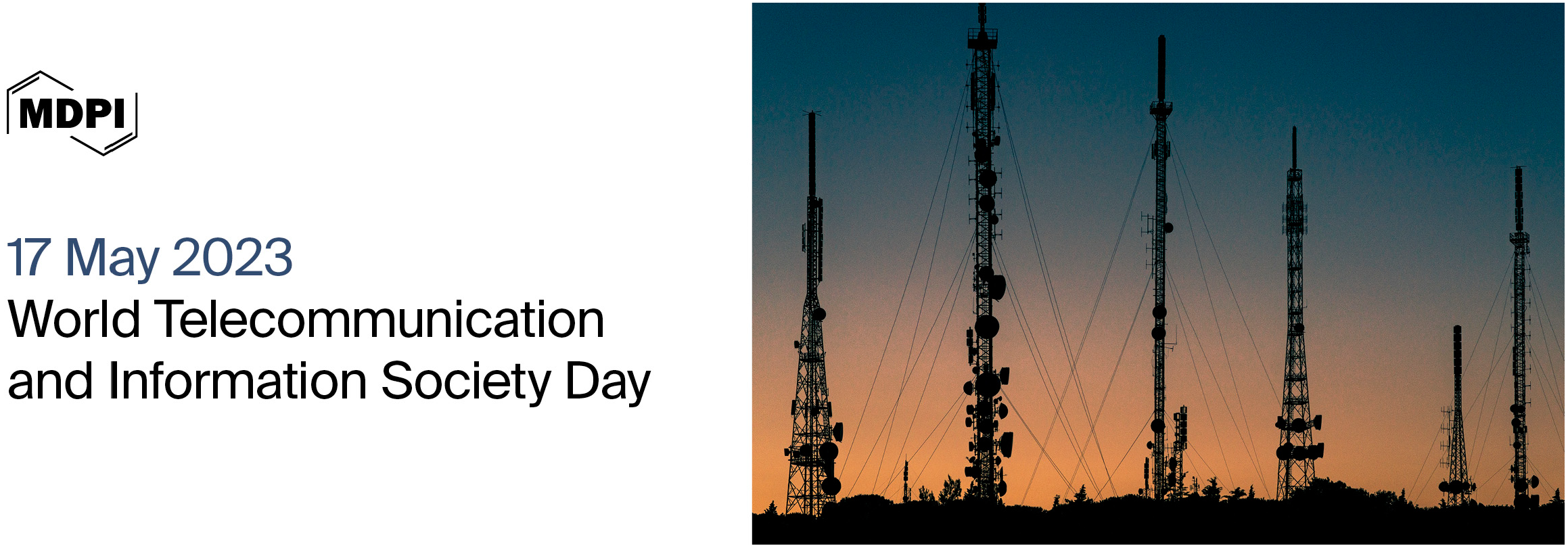
The purpose of the World Telecommunication and Information Society Day is to help raise awareness of the possibilities that the use of the Internet and other information and communication technologies (ICTs) can bring to societies and economies, as well as of ways to bridge the digital divide. 17 May marks the anniversary of the signing of the first International Telegraph Convention and the creation of the International Telecommunication Union (ITU).
This year, World Telecommunication and Information Society Day focuses on “Empowering the least developed countries (LDCs) through information and communication technologies.” As the world becomes increasingly adept at leveraging the Internet for value creation, LDCs risk falling further behind. To further explore the information about digital transformation in these LDCs and communication technologies in the rest of the world on the 2023 World Telecommunication and Information Society Day, we have gathered academic research from several journals on the topic of digital communication, all of which are open access, enabling practitioners, policymakers and people around the world to access and share up-to-date scientific knowledge.
Let us celebrate the World Telecommunication and Information Society Day together.

|
ParlTech: Transformation Framework for the Digital Parliament |
|
|
Impactful Digital Twin in the Healthcare Revolution |
|
|
Managerial Practices for the Digital Transformation of Manufacturers |
|
|
Blockchain-Enabled IoT for Rural Healthcare: Hybrid-Channel Communication with Digital Twinning |
|
|
Applied Data Science for Social Good |
The Digital Transformation of Healthcare |

23 April 2023
Electronics 2022 Best Ph.D. Thesis Award—Winner Announced
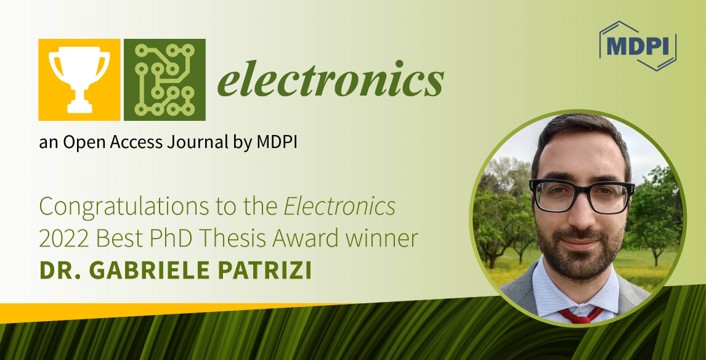
As the Editor-in-Chief of Electronics (ISSN: 2079-9292), it is my great pleasure to announce the winner of the Electronics 2022 Best Ph.D. Thesis Award—Dr. Gabriele Patrizi, from the Department of Information Engineering, University of Florence, Florence, Italy. This award is for a Ph.D. student or recently qualified Ph.D. who has produced a highly anticipated thesis with great academic potential.
The award has been granted for the following thesis:
“An Innovative Data-Driven Reliability Life Cycle for Complex Systems”
Dr. Gabriele Patrizi will receive CHF 800, a certificate, and a chance to publish a paper free of charge after peer review in Electronics in 2023.
On behalf of the evaluation committee—Prof. Dr. Ke Guan, Prof. Dr. Joao Soares, Prof. Dr. Valeri Mladenov, Prof. Dr. Stefanos Kollias, Prof. Dr. Amir H Gandomi, Prof. Dr. George A Tsihrintzis, and Prof. Dr. Martin Reisslein—I would like to take this opportunity to congratulate the winner on his accomplishment. We would also like to thank all the applicants for submitting their exceptional theses and the Award Committee for voting and helping with this award.
Prof. Dr. Flavio Canavero
Editor-in-Chief, Electronics
21 April 2023
Electronics | Highly Cited Papers in 2022 from the Section “Systems & Control Engineering”
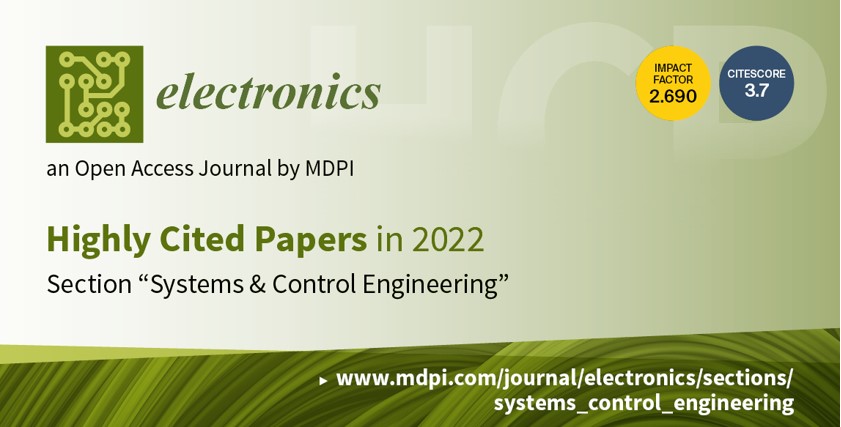
The Section “Systems & Control Engineering” is devoted to publishing focused articles related to control aspects of electronics and engineering systems, more specifically including theoretical developments and applications of control engineering as embedded control systems, mechatronics, smart systems, power systems, electrical circuits, and computer science, for the enhancement of electronics systems and processes. We hope to present state-of-the-art technologies in this Section.
The Section “Systems & Control Engineering” follows the same Open Access format as the rest of Electronics, meaning that you have free and unlimited access to the full text of all of the articles published in our journal. We welcome you to read our most highly cited papers published in 2022 below:
1. “Analysing Factory Workers’ Acceptance of Collaborative Robots: A Web-Based Tool for Company Representatives”
by Marco Baumgartner, Tobias Kopp and Steffen Kinkel
Electronics 2022, 11(1), 145; https://doi.org/10.3390/electronics11010145
Available online: https://www.mdpi.com/2079-9292/11/1/145
2. “Multiparameter Identification of Permanent Magnet Synchronous Motor Based on Model Reference Adaptive System—Simulated Annealing Particle Swarm Optimization Algorithm”
by Guoyong Su, Pengyu Wang, Yongcun Guo, Gang Cheng, Shuang Wang and Dongyang Zhao
Electronics 2022, 11(1), 159; https://doi.org/10.3390/electronics11010159
Available online: https://www.mdpi.com/2079-9292/11/1/159
3. “A Systematic Simulation-Based Multi-Criteria Decision-Making Approach for the Evaluation of Semi–Fully Flexible Machine System Process Parameters”
by Thirupathi Samala, Vijaya Kumar Manupati, Jose Machado, Shubham Khandelwal and Katarzyna Antosz
Electronics 2022, 11(2), 233; https://doi.org/10.3390/electronics11020233
Available online: https://www.mdpi.com/2079-9292/11/2/233
4. “An Extreme Learning Machine Based Adaptive VISMA for Stability Enhancement of Renewable Rich Power Systems”
by Herlambang Setiadi, Rakibuzzaman Shah, Md Rabiul Islam, Dimas Anton Asfani, Tigor Hamonangan Nasution, Muhammad Abdillah, Prisma Megantoro and Awan Uji Krismanto
Electronics 2022, 11(2), 247; https://doi.org/10.3390/electronics11020247
Available online: https://www.mdpi.com/2079-9292/11/2/247
5. “Power Quality Monitoring Strategy Based on an Optimized Multi-Domain Feature Selection for the Detection and Classification of Disturbances in Wind Generators”
by David A. Elvira-Ortiz, Juan J. Saucedo-Dorantes, Roque A. Osornio-Rios, Daniel Morinigo-Sotelo and Jose A. Antonino-Daviu
Electronics 2022, 11(2), 287; https://doi.org/10.3390/electronics11020287
Available online: https://www.mdpi.com/2079-9292/11/2/287
6. “Neighboring-Pixel-Based Maximum Power Point Tracking Algorithm for Partially Shaded Photovoltaic (PV) Systems”
by Huma Rehman, Ali Faisal Murtaza, Hadeed Ahmed Sher, Abdullah M. Noman, Abdullrahman A. Al-Shamma’a, Abdulaziz Alkuhayli and Filippo Spertino
Electronics 2022, 11(3), 359; https://doi.org/10.3390/electronics11030359
Available online: https://www.mdpi.com/2079-9292/11/3/359
7. “Assessment of Thermophysical Performance of Ester-Based Nanofluids for Enhanced Insulation Cooling in Transformers"
by Suhaib Ahmad Khan, Mohd Tariq, Asfar Ali Khan, Basem Alamri and Lucian Mihet-Popa
Electronics 2022, 11(3), 376; https://doi.org/10.3390/electronics11030376
Available online: https://www.mdpi.com/2079-9292/11/3/376
8. “Bin-Picking Solution for Randomly Placed Automotive Connectors Based on Machine Learning Techniques”
by Pedro Torres, Janis Arents, Hugo Marques and Paulo Marques
Electronics 2022, 11(3), 476; https://doi.org/10.3390/electronics11030476
Available online: https://www.mdpi.com/2079-9292/11/3/476
9. “A Novel Deep Learning Model for Detection of Severity Level of the Disease in Citrus Fruits”
by Poonam Dhiman, Vinay Kukreja, Poongodi Manoharan, Amandeep Kaur, M. M. Kamruzzaman, Imed Ben Dhaou and Celestine Iwendi
Electronics 2022, 11(3), 495; https://doi.org/10.3390/electronics11030495
Available online: https://www.mdpi.com/2079-9292/11/3/495
10. “A Novel Fixed-Time Trajectory Tracking Strategy of Unmanned Surface Vessel Based on the Fractional Sliding Mode Control Method”
by Dong Chen, Jundong Zhang and Zhongkun Li
Electronics 2022, 11(5), 726; https://doi.org/10.3390/electronics11050726
Available online: https://www.mdpi.com/2079-9292/11/5/726
11. “Sensorless Control of Seven-Phase PMSM Drives Using NSV-SVPWM with Minimum Current Distortion”
by Kamel Saleh and Mark Sumner
Electronics 2022, 11(5), 792; https://doi.org/10.3390/electronics11050792
Available online: https://www.mdpi.com/2079-9292/11/5/792
12. “Model Reference Adaptive Control of Marine Permanent Magnet Propulsion Motor Based on Parameter Identification”
by Yubo Huang, Jundong Zhang, Dong Chen and Jiahao Qi
Electronics 2022, 11(7), 1012; https://doi.org/10.3390/electronics11071012
Available online: https://www.mdpi.com/2079-9292/11/7/1012
13. “Vertiport Operations Modeling, Agent-Based Simulation and Parameter Value Specification”
by Lukas Preis and Mirko Hornung
Electronics 2022, 11(7), 1071; https://doi.org/10.3390/electronics11071071
Available online: https://www.mdpi.com/2079-9292/11/7/1071
14. “Modeling and Extended State Observer-Based Backstepping Control of Underwater Electro Hydrostatic Actuator with Pressure Compensator and External Load”
by Yong Nie, Jiajia Liu, Zhenhua Lao and Zheng Chen
Electronics 2022, 11(8), 1286; https://doi.org/10.3390/electronics11081286
Available online: https://www.mdpi.com/2079-9292/11/8/1286
15. “Improved Rapidly Exploring Random Tree with Bacterial Mutation and Node Deletion for Offline Path Planning of Mobile Robot”
by Aphilak Lonklang and János Botzheim
Electronics 2022, 11(9), 1459; https://doi.org/10.3390/electronics11091459
Available online: https://www.mdpi.com/2079-9292/11/9/1459
16. “Numerical Solutions of a Differential System Considering a Pure Hybrid Fuzzy Neutral Delay Theory”
by Prasantha Bharathi Dhandapani, Jayakumar Thippan, Carlos Martin-Barreiro, Víctor Leiva and Christophe Chesneau
Electronics 2022, 11(9), 1478; https://doi.org/10.3390/electronics11091478
Available online: https://www.mdpi.com/2079-9292/11/9/1478
17. “Energy Management Strategies for Hybrid Energy Storage Systems Based on Filter Control: Analysis and Comparison”
by Germán Andrés Ramos and Ramon Costa-Castelló
Electronics 2022, 11(10), 1631; https://doi.org/10.3390/electronics11101631
Available online: https://www.mdpi.com/2079-9292/11/10/1631
18. “Automatic Weight Prediction System for Korean Cattle Using Bayesian Ridge Algorithm on RGB-D Image”
by Myung Hwan Na, Wan Hyun Cho, Sang Kyoon Kim and In Seop Na
Electronics 2022, 11(10), 1663; https://doi.org/10.3390/electronics11101663
Available online: https://www.mdpi.com/2079-9292/11/10/1663
19. “Analysis of a User Interface Based on Multimodal Interaction to Control a Robotic Arm for EOD Applications”
by Denilson V. Goyzueta, Joseph Guevara M., Andrés Montoya A., Erasmo Sulla E., Yuri Lester S., Pari L. and Elvis Supo C.
Electronics 2022, 11(11), 1690; https://doi.org/10.3390/electronics11111690
Available online: https://www.mdpi.com/2079-9292/11/11/1690
20. “A Combined Model Incorporating Improved SSA and LSTM Algorithms for Short-Term Load Forecasting”
by Mingchong Han, Jianwei Zhong, Pu Sang, Honghua Liao and Aiguo Tan
Electronics 2022, 11(12), 1835; https://doi.org/10.3390/electronics11121835
Available online: https://www.mdpi.com/2079-9292/11/12/1835
21. “Path Planning Algorithm and Application Research of an Indoor Substation Wheeled Robot Navigation System”
by Jianxin Ren, Tao Wu, Xiaohua Zhou, Congcong Yang, Jiahui Sun, Mingshuo Li, Huayang Jiang and Anfeng Zhang
Electronics 2022, 11(12), 1838; https://doi.org/10.3390/electronics11121838
Available online: https://www.mdpi.com/2079-9292/11/12/1838
22. “Deep Reinforcement Learning for Intelligent Dual-UAV Reconnaissance Mission Planning”
by Xiaoru Zhao, Rennong Yang, Ying Zhang, Mengda Yan and Longfei Yue
Electronics 2022, 11(13), 2031; https://doi.org/10.3390/electronics11132031
Available online: https://www.mdpi.com/2079-9292/11/13/2031
23. “Assessing Artificial Intelligence Technology Acceptance in Managerial Accounting”
by Anca Antoaneta Vărzaru
Electronics 2022, 11(14), 2256; https://doi.org/10.3390/electronics11142256
Available online: https://www.mdpi.com/2079-9292/11/14/2256
24. “A Modified Active-Disturbance-Rejection Control with Sliding Modes for an Uncertain System by Using a Novel Reaching Law”
by Dong Zhang, Tao Wu, Shangyao Shi and Zhen Dong
Electronics 2022, 11(15), 2392; https://doi.org/10.3390/electronics11152392
Available online: https://www.mdpi.com/2079-9292/11/15/2392
25. “A New Decentralized PQ Control for Parallel Inverters in Grid-Tied Microgrids Propelled by SMC-Based Buck–Boost Converters”
by Ali M. Jasim, Basil H. Jasim and Bogdan-Constantin Neagu
Electronics 2022, 11(23), 3917; https://doi.org/10.3390/electronics11233917
Available online: https://www.mdpi.com/2079-9292/11/23/3917
20 April 2023
Electronics | Highly Cited Papers in 2022 in the Section “Networks”
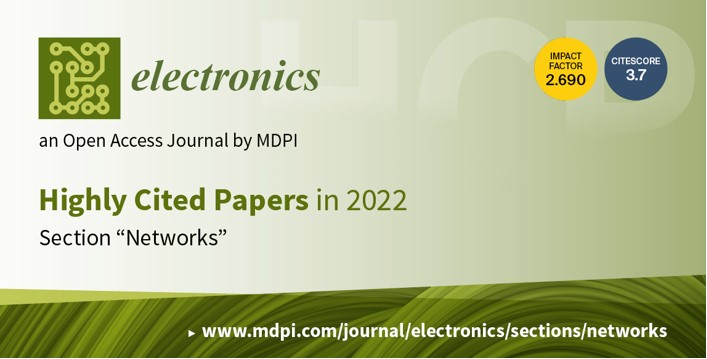
The Section “Networks” provides full coverage of all topics of interest involved in the networking area. The purpose of this Section is to bring together researchers, engineers, and students from academia and industry to present novel ideas and solid research about the theoretical and practical aspects in the application domains of computer communications and networks.
As all of the articles published in our journal are of an open access format, you have free and unlimited access to the full text. We welcome you to read our most highly cited papers published in 2022 listed below:
1. “Threat Analysis and Distributed Denial of Service (DDoS) Attack Recognition in the Internet of Things (IoT)”
by Mohammed Hasan Ali, Mustafa Musa Jaber, Sura Khalil Abd, Amjad Rehman, Mazhar Javed Awan, Robertas Damaševičius and Saeed Ali Bahaj
Electronics 2022, 11(3), 494; https://doi.org/10.3390/electronics11030494
Available online: https://www.mdpi.com/2079-9292/11/3/494
2. “IMIDS: An Intelligent Intrusion Detection System against Cyber Threats in IoT”
by Kim-Hung Le, Minh-Huy Nguyen, Trong-Dat Tran and Ngoc-Duan Tran
Electronics 2022, 11(4), 524; https://doi.org/10.3390/electronics11040524
Available online: https://www.mdpi.com/2079-9292/11/4/524
3. “Deep Learning-Based Object Detection and Scene Perception under Bad Weather Conditions”
by Teena Sharma, Benoit Debaque, Nicolas Duclos, Abdellah Chehri, Bruno Kinder and Paul Fortier
Electronics 2022, 11(4), 563; https://doi.org/10.3390/electronics11040563
Available online: https://www.mdpi.com/2079-9292/11/4/563
4. “Securing Drug Distribution Systems from Tampering Using Blockchain”
by Mamoona Humayun, Noor Zaman Jhanjhi, Mahmood Niazi, Fathi Amsaad and Isma Masood
Electronics 2022, 11(8), 1195; https://doi.org/10.3390/electronics11081195
Available online: https://www.mdpi.com/2079-9292/11/8/1195
5. “Cooperative SWIPT THz-NOMA/6G Performance Analysis”
by Haider W. Oleiwi and Hamed Al-Raweshidy
Electronics 2022, 11(6), 873; https://doi.org/10.3390/electronics11060873
Available online: https://www.mdpi.com/2079-9292/11/6/873
6. “CMT-SCTP and MPTCP Multipath Transport Protocols: A Comprehensive Review”
by Parul Tomar, Gyanendra Kumar, Lal Pratap Verma, Varun Kumar Sharma, Dimitris Kanellopoulos, Sur Singh Rawat and Youseef Alotaibi
Electronics 2022, 11(15), 2384; https://doi.org/10.3390/electronics11152384
Available online: https://www.mdpi.com/2079-9292/11/15/2384
7. “Lightweight Challenge-Response Authentication in SDN-Based UAVs Using Elliptic Curve Cryptography”
by Muhammad Usman, Rashid Amin, Hamza Aldabbas and Bader Alouffi
Electronics 2022, 11(7), 1026; https://doi.org/10.3390/electronics11071026
Available online: https://www.mdpi.com/2079-9292/11/7/1026
8. “Blockchain-Enabled: Multi-Layered Security Federated Learning Platform for Preserving Data Privacy”
by Zeba Mahmood and Vacius Jusas
Electronics 2022, 11(10), 1624; https://doi.org/10.3390/electronics11101624
Available online: https://www.mdpi.com/2079-9292/11/10/1624
9. “An Intelligent System to Detect Advanced Persistent Threats in Industrial Internet of Things (I-IoT)”
by Safdar Hussain Javed, Maaz Bin Ahmad, Muhammad Asif, Sultan H. Almotiri, Khalid Masood and Mohammad A. Al Ghamdi
Electronics 2022, 11(5), 742; https://doi.org/10.3390/electronics11050742
Available online: https://www.mdpi.com/2079-9292/11/5/742
10. “Machine Learning for Radio Resource Management in Multibeam GEO Satellite Systems”
by Flor G. Ortiz-Gomez, Lei Lei, Eva Lagunas, Ramon Martinez, Daniele Tarchi, Jorge Querol, Miguel A. Salas-Natera and Symeon Chatzinotas
Electronics 2022, 11(7), 992; https://doi.org/10.3390/electronics11070992
Available online: https://www.mdpi.com/2079-9292/11/7/992
11. “A Visual Cryptography-Based Watermarking Approach for the Detection and Localization of Image Forgery”
by Moataz Z. Salim, Ali J. Abboud and Remzi Yildirim
Electronics 2022, 11(1), 136; https://doi.org/10.3390/electronics11010136
Available online: https://www.mdpi.com/2079-9292/11/1/136
12. “BiGRU-CNN Neural Network Applied to Electric Energy Theft Detection”
by Lucas Duarte Soares, Altamira de Souza Queiroz, Gloria P. López, Edgar M. Carreño-Franco, Jesús M. López-Lezama and Nicolás Muñoz-Galeano
Electronics 2022, 11(5), 693; https://doi.org/10.3390/electronics11050693
Available online: https://www.mdpi.com/2079-9292/11/5/693
13. “A Comprehensive Review of Channel Modeling for Land Mobile Satellite Communications”
by Mauro Tropea and Floriano De Rango
Electronics 2022, 11(5), 820; https://doi.org/10.3390/electronics11050820
Available online: https://www.mdpi.com/2079-9292/11/5/820
14. “Effectiveness Evaluation of Different IDSs Using Integrated Fuzzy MCDM Model”
by Hashem Alyami, Md Tarique Jamal Ansari, Abdullah Alharbi, Wael Alosaimi, Majid Alshammari, Dhirendra Pandey, Alka Agrawal, Rajeev Kumar and Raees Ahmad Khan
Electronics 2022, 11(6), 859; https://doi.org/10.3390/electronics11060859
Available online: https://www.mdpi.com/2079-9292/11/6/859
15. “Beyond Perceptual Thresholds and Personal Preference: Towards Novel Research Questions and Methodologies of Quality of Experience Studies on Light Field Visualization”
by Peter A. Kara, Roopak R. Tamboli, Edris Shafiee, Maria G. Martini, Aniko Simon and Mary Guindy
Electronics 2022, 11(6), 953; https://doi.org/10.3390/electronics11060953
Available online: https://www.mdpi.com/2079-9292/11/6/953
16. “SAGMAD—A Signature Agnostic Malware Detection System Based on Binary Visualisation and Fuzzy Sets”
by Betty Saridou, Joseph Ryan Rose, Stavros Shiaeles and Basil Papadopoulos
Electronics 2022, 11(7), 1044; https://doi.org/10.3390/electronics11071044
Available online: https://www.mdpi.com/2079-9292/11/7/1044
17. “Statistical Channel Model and Systematic Random Linear Network Coding Based QoS Oriented and Energy Efficient UWSN Routing Protocol”
by Pramod Halebeedu Basavaraju, Gururaj Harinahalli Lokesh, Gowtham Mohan, Noor Zaman Jhanjhi and Francesco Flammini
Electronics 2022, 11(16), 2590; https://doi.org/10.3390/electronics11162590
Available online: https://www.mdpi.com/2079-9292/11/16/2590
18. “An Approach to Combine the Power of Deep Reinforcement Learning with a Graph Neural Network for Routing Optimization”
by Bo Chen, Di Zhu, Yuwei Wang and Peng Zhang
Electronics 2022, 11(3), 368; https://doi.org/10.3390/electronics11030368
Available online: https://www.mdpi.com/2079-9292/11/3/368
19. “A Novel Android Botnet Detection System Using Image-Based and Manifest File Features”
by Suleiman Y. Yerima and Abul Bashar
Electronics 2022, 11(3), 486; https://doi.org/10.3390/electronics11030486
Available online: https://www.mdpi.com/2079-9292/11/3/486
20. “Overview of Prospects for Service-Aware Radio Access towards 6G Networks”
by Zixiao Zhao, Qinghe Du, Dawei Wang, Xiao Tang and Houbing Song
Electronics 2022, 11(8), 1262; https://doi.org/10.3390/electronics11081262
Available online: https://www.mdpi.com/2079-9292/11/8/1262
13 April 2023
Electronics | Highly Cited Papers in 2021 in the Section “Systems & Control Engineering”
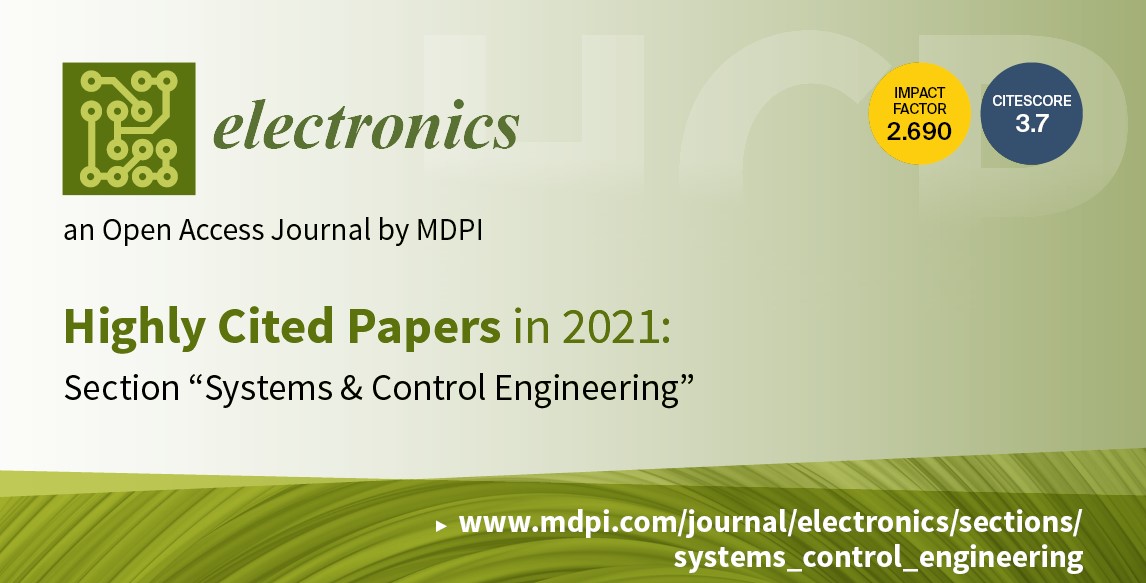
The “Systems & Control Engineering” Section provides the field of electrical and computer engineering with a unified paradigm for designing controllers in a variety of application domains. Initially developed in the context of electrical engineering, this dynamic field has come to represent an essential enabling and supporting technology for a wide range of sectors (energy, transport, manufacturing, biology, defense, robotics, etc.).
As they are of an Open Access format, you have free and unlimited access to the full text of all of the articles published in our journal. We welcome you to read our most highly cited papers published in 2021 listed below:
1. “A Genetic Algorithm Optimized RNN-LSTM Model for Remaining Useful Life Prediction of Turbofan Engine”
by Kwok Tai Chui, Brij B. Gupta and Pandian Vasant
Electronics 2021, 10(3), 285; https://doi.org/10.3390/electronics10030285
Available online: https://www.mdpi.com/2079-9292/10/3/285
2. “Multi-Objective Energy Management of a Micro-Grid Considering Stochastic Nature of Load and Renewable Energy Resources”
by Deyaa Ahmed, Mohamed Ebeed, Abdelfatah Ali, Ali S. Alghamdi and Salah Kamel
Electronics 2021, 10(4), 403; https://doi.org/10.3390/electronics10040403
Available online: https://www.mdpi.com/2079-9292/10/4/403
3. “Machine Learning-Based Data-Driven Fault Detection/Diagnosis of Lithium-Ion Battery: A Critical Review”
by Akash Samanta, Sumana Chowdhuri and Sheldon S. Williamson
Electronics 2021, 10(11), 1309; https://doi.org/10.3390/electronics10111309
Available online: https://www.mdpi.com/2079-9292/10/11/1309
4. “Bearing Fault Classification Using Ensemble Empirical Mode Decomposition and Convolutional Neural Network”
by Rafia Nishat Toma, Cheol-Hong Kim and Jong-Myon Kim
Electronics 2021, 10(11), 1248; https://doi.org/10.3390/electronics10111248
Available online: https://www.mdpi.com/2079-9292/10/11/1248
5. “Security of Things Intrusion Detection System for Smart Healthcare”
by Celestine Iwendi, Joseph Henry Anajemba, Cresantus Biamba and Desire Ngabo
Electronics 2021, 10(12), 1375; https://doi.org/10.3390/electronics10121375
Available online: https://www.mdpi.com/2079-9292/10/12/1375
6. “A Cost-Efficient MFCC-Based Fault Detection and Isolation Technology for Electromagnetic Pumps”
by Ugochukwu Ejike Akpudo and Jang-Wook Hur
Electronics 2021, 10(4), 439; https://doi.org/10.3390/electronics10040439
Available online: https://www.mdpi.com/2079-9292/10/4/439
7. “On-line Detection and Classification of PMSM Stator Winding Faults Based on Stator Current Symmetrical Components Analysis and the KNN Algorithm”
by Przemyslaw Pietrzak and Marcin Wolkiewicz
Electronics 2021, 10(15), 1786; https://doi.org/10.3390/electronics10151786
Available online: https://www.mdpi.com/2079-9292/10/15/1786
8. “An Autonomous Grape-Harvester Robot: Integrated System Architecture”
by Eleni Vrochidou, Konstantinos Tziridis, Alexandros Nikolaou, Theofanis Kalampokas, George A. Papakostas, Theodore P. Pachidis, Spyridon Mamalis, Stefanos Koundouras and Vassilis G. Kaburlasos
Electronics 2021, 10(9), 1056; https://doi.org/10.3390/electronics10091056
Available online: https://www.mdpi.com/2079-9292/10/9/1056
9. “OATCR: Outdoor Autonomous Trash-Collecting Robot Design Using YOLOv4-Tiny”
by Medhasvi Kulshreshtha, Sushma S. Chandra, Princy Randhawa, Georgios Tsaramirsis, Adil Khadidos and Alaa O. Khadidos
Electronics 2021, 10(18), 2292; https://doi.org/10.3390/electronics10182292
Available online: https://www.mdpi.com/2079-9292/10/18/2292
10. “State of the Art of Urban Smart Vertical Farming Automation System: Advanced Topologies, Issues and Recommendations”
by Mohamad Hanif Md Saad, Nurul Maisarah Hamdan and Mahidur R. Sarker
Electronics 2021, 10(12), 1422; https://doi.org/10.3390/electronics10121422
Available online: https://www.mdpi.com/2079-9292/10/12/1422
11. “Design of Integrated Autonomous Driving Control System That Incorporates Chassis Controllers for Improving Path Tracking Performance and Vehicle Stability”
by Taewon Ahn, Yongki Lee and Kihong Park
Electronics 2021, 10(2), 144; https://doi.org/10.3390/electronics10020144
Available online: https://www.mdpi.com/2079-9292/10/2/144
12. “Multi-Objective Sizing Optimization of Hybrid Renewable Energy Microgrid in a Stand-Alone Marine Context”
by Wenqiang Zhu, Jiang Guo and Guo Zhao
Electronics 2021, 10(2), 174; https://doi.org/10.3390/electronics10020174
Available online: https://www.mdpi.com/2079-9292/10/2/174
13. “Chaos-Based Secure Communications in Biomedical Information Application”
by Teh-Lu Liao, Hsin-Chieh Chen, Chiau-Yuan Peng and Yi-You Hou
Electronics 2021, 10(3), 359; https://doi.org/10.3390/electronics10030359
Available online: https://www.mdpi.com/2079-9292/10/3/359
14. “DWT-LSTM-Based Fault Diagnosis of Rolling Bearings with Multi-Sensors”
by Kai Gu, Yu Zhang, Xiaobo Liu, Heng Li and Mifeng Ren
Electronics 2021, 10(17), 2076; https://doi.org/10.3390/electronics10172076
Available online: https://www.mdpi.com/2079-9292/10/17/2076
15. “Synthesis of a Path-Planning Algorithm for Autonomous Robots Moving in a Game Environment during Collision Avoidance”
by Józef Lisowski
Electronics 2021, 10(6), 675; https://doi.org/10.3390/electronics10060675
Available online: https://www.mdpi.com/2079-9292/10/6/675
16. “Optimization of a 3D-Printed Permanent Magnet Coupling Using Genetic Algorithm and Taguchi Method”
by Ekaterina Andriushchenko, Ants Kallaste, Anouar Belahcen, Toomas Vaimann, Anton Rassõlkin, Hamidreza Heidari and Hans Tiismus
Electronics 2021, 10(4), 494; https://doi.org/10.3390/electronics10040494
Available online: https://www.mdpi.com/2079-9292/10/4/494
17. “Open Source Control Device for Industry 4.0 Based on RAMI 4.0”
by Pablo F. S. Melo, Eduardo P. Godoy, Paolo Ferrari and Emiliano Sisinni
Electronics 2021, 10(7), 869; https://doi.org/10.3390/electronics10070869
Available online: https://www.mdpi.com/2079-9292/10/7/869
18. “Analysis of Obstacle Avoidance Strategy for Dual-Arm Robot Based on Speed Field with Improved Artificial Potential Field Algorithm”
by Hui Zhang, Yongfei Zhu, Xuefei Liu and Xiangrong Xu
Electronics 2021, 10(15), 1850; https://doi.org/10.3390/electronics10151850
Available online: https://www.mdpi.com/2079-9292/10/15/1850
19. “A Novel S-Box Dynamic Design Based on Nonlinear-Transform of 1D Chaotic Maps”
by Wenhao Yan and Qun Ding
Electronics 2021, 10(11), 1313; https://doi.org/10.3390/electronics10111313
Available online: https://www.mdpi.com/2079-9292/10/11/1313
20. “Research on the Coordinated Control of Regenerative Braking System and ABS in Hybrid Electric Vehicle Based on Composite Structure Motor”
by Qiwei Xu, Chuan Zhou, Hong Huang and Xuefeng Zhang
Electronics 2021, 10(3), 223; https://doi.org/10.3390/electronics10030223
Available online: https://www.mdpi.com/2079-9292/10/3/223
13 April 2023
Electronics | Highly Cited Papers in 2021 in the Section “Networks”
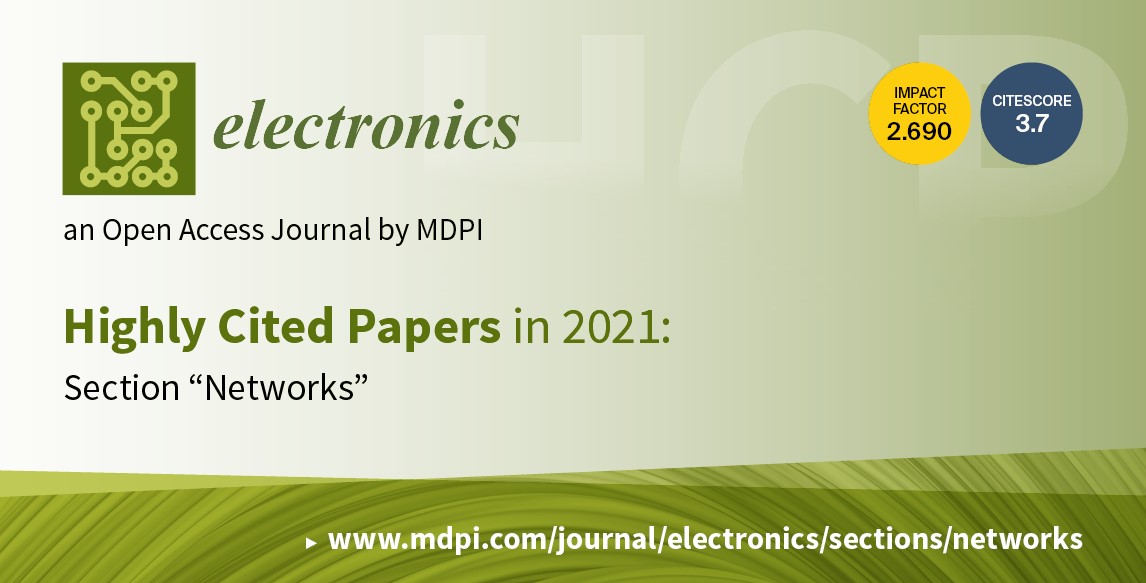
The “Networks” Section provides full coverage of all topics of interest involved in the networking area. The purpose of this Section is to bring together researchers, engineers, and students from academia and industry to present novel ideas and solid research about the theoretical and practical aspects in the application domains of computer communications and networks.
As they are of an Open Access format, you have free and unlimited access to the full text of all of the articles published in our journal. We welcome you to read our most highly cited papers published in 2021 listed below:
1. “Deep Learning-Based Intrusion Detection for Distributed Denial of Service Attack in Agriculture 4.0”
by Mohamed Amine Ferrag, Lei Shu, Hamouda Djallel and Kim-Kwang Raymond Choo
Electronics 2021, 10(11), 1257; https://doi.org/10.3390/electronics10111257
Available online: https://www.mdpi.com/2079-9292/10/11/1257
2. “Machine Learning in Wireless Sensor Networks for Smart Cities: A Survey”
by Himanshu Sharma Ahteshamul Haque and Frede Blaabjerg
Electronics 2021, 10(9), 1012; https://doi.org/10.3390/electronics10091012
Available online: https://www.mdpi.com/2079-9292/10/9/1012
3. “Internet of Things (IoT) Based Indoor Air Quality Sensing and Predictive Analytic—A COVID-19 Perspective”
by Rafia Mumtaz, Syed Mohammad Hassan Zaidi, Muhammad Zeeshan Shakir, Uferah Shafi, Muhammad Moeez Malik, Ayesha Haque, Sadaf Mumtaz and Syed Ali Raza Zaidi
Electronics 2021, 10(2), 184; https://doi.org/10.3390/electronics10020184
Available online: https://www.mdpi.com/2079-9292/10/2/184
4. “Wireless Sensor Networks for Smart Cities: Network Design, Implementation and Performance Evaluation”
by Ala’ Khalifeh, Khalid A. Darabkh, Ahmad M. Khasawneh, Issa Alqaisieh, Mohammad Salameh, Ahmed AlAbdala, Shams Alrubaye, Anwar Alassaf, Samer Al-HajAli, Radi Al-Wardat et al.
Electronics 2021, 10(2), 218; https://doi.org/10.3390/electronics10020218
Available online: https://www.mdpi.com/2079-9292/10/2/218
5. “Ensemble-Based Classification Using Neural Networks and Machine Learning Models for Windows PE Malware Detection”
by Robertas Damaševičius, Algimantas Venčkauskas, Jevgenijus Toldinas and Šarūnas Grigaliūnas
Electronics 2021, 10(4), 485; https://doi.org/10.3390/electronics10040485
Available online: https://www.mdpi.com/2079-9292/10/4/485
6. “A Recommendation Engine for Predicting Movie Ratings Using a Big Data Approach”
by Mazhar Javed Awan, Rafia Asad Khan, Haitham Nobanee, Awais Yasin, Syed Muhammad Anwar, Usman Naseem and Vishwa Pratap Singh
Electronics 2021, 10(10), 1215; https://doi.org/10.3390/electronics10101215
Available online: https://www.mdpi.com/2079-9292/10/10/1215
7. “A Novel Adaptive Battery-Aware Algorithm for Data Transmission in IoT-Based Healthcare Applications”
by Hina Magsi, Ali Hassan Sodhro, Mabrook S. Al-Rakhami, Noman Zahid, Sandeep Pirbhulal and Lei Wang
Electronics 2021, 10(4), 367; https://doi.org/10.3390/electronics10040367
Available online: https://www.mdpi.com/2079-9292/10/4/367
8. “A Low Area High Speed FPGA Implementation of AES Architecture for Cryptography Application”
by Thanikodi Manoj Kumar, Kasarla Satish Reddy, Stefano Rinaldi, Bidare Divakarachari Parameshachari and Kavitha Arunachalam
Electronics 2021, 10(16), 2023; https://doi.org/10.3390/electronics10162023
Available online: https://www.mdpi.com/2079-9292/10/16/2023
9. “Machine Learning Approach Equipped with Neighbourhood Component Analysis for DDoS Attack Detection in Software-Defined Networking”
by Özgür Tonkal, Hüseyin Polat, Erdal Başaran, Zafer Cömert and Ramazan Kocaoğlu
Electronics 2021, 10(11), 1227; https://doi.org/10.3390/electronics10111227
Available online: https://www.mdpi.com/2079-9292/10/11/1227
10. “Blockchain Technology for Secured Healthcare Data Communication among the Non-Terminal Nodes in IoT Architecture in 5G Network”
by Parvathaneni Naga Srinivasu, Akash Kumar Bhoi, Soumya Ranjan Nayak, Muhammad Raheel Bhutta and Marcin Woźniak
Electronics 2021, 10(12), 1437; https://doi.org/10.3390/electronics10121437
Available online: https://www.mdpi.com/2079-9292/10/12/1437
11. “Android Mobile Malware Detection Using Machine Learning: A Systematic Review”
by Janaka Senanayake, Harsha Kalutarage and Mhd Omar Al-Kadri
Electronics 2021, 10(13), 1606; https://doi.org/10.3390/electronics10131606
Available online: https://www.mdpi.com/2079-9292/10/13/1606
12. “Towards a Blockchain Assisted Patient Owned System for Electronic Health Records”
by Tomilayo Fatokun, Avishek Nag and Sachin Sharma
Electronics 2021, 10(5), 580; https://doi.org/10.3390/electronics10050580
Available online: https://www.mdpi.com/2079-9292/10/5/580
13. “Masked Face Recognition Using Deep Learning: A Review”
by Ahmad Alzu’bi, Firas Albalas, Tawfik AL-Hadhrami, Lojin Bani Younis and Amjad Bashayreh
Electronics 2021, 10(21), 2666; https://doi.org/10.3390/electronics10212666
Available online: https://www.mdpi.com/2079-9292/10/21/2666
14. “A Survey on Applications of Reinforcement Learning in Flying Ad-Hoc Networks”
by Sifat Rezwan and Wooyeol Choi
Electronics 2021, 10(4), 449; https://doi.org/10.3390/electronics10040449
Available online: https://www.mdpi.com/2079-9292/10/4/449
15. “Blockchain-Based Security Mechanism for the Medical Data at Fog Computing Architecture of Internet of Things”
by Desire Ngabo, Dong Wang, Celestine Iwendi, Joseph Henry Anajemba, Lukman Adewale Ajao and Cresantus Biamba
Electronics 2021, 10(17), 2110; https://doi.org/10.3390/electronics10172110
Available online: https://www.mdpi.com/2079-9292/10/17/2110
16. “Multi-Layer Latency Aware Workload Assignment of E-Transport IoT Applications in Mobile Sensors Cloudlet Cloud Networks”
by Abdullah Lakhan, Mazhar Ali Dootio, Tor Morten Groenli, Ali Hassan Sodhro and Muhammad Saddam Khokhar
Electronics 2021, 10(14), 1719; https://doi.org/10.3390/electronics10141719
Available online: https://www.mdpi.com/2079-9292/10/14/1719
17. “Fake News Data Exploration and Analytics”
by Mazhar Javed Awan, Awais Yasin, Haitham Nobanee, Ahmed Abid Ali, Zain Shahzad, Muhammad Nabeel, Azlan Mohd Zain and Hafiz Muhammad Faisal Shahzad
Electronics 2021, 10(19), 2326; https://doi.org/10.3390/electronics10192326
Available online: https://www.mdpi.com/2079-9292/10/19/2326
18. “Secured Big Data Analytics for Decision-Oriented Medical System Using Internet of Things”
by Amjad Rehman, Khalid Haseeb, Tanzila Saba, Jaime Lloret and Usman Tariq
Electronics 2021, 10(11), 1273; https://doi.org/10.3390/electronics10111273
Available online: https://www.mdpi.com/2079-9292/10/11/1273
19. “Secure Watermarking Schemes and Their Approaches in the IoT Technology: An Overview”
by Raniyah Wazirali, Rami Ahmad, Ahmed Al-Amayreh, Mohammad Al-Madi and Ala’ Khalifeh
Electronics 2021, 10(14), 1744; https://doi.org/10.3390/electronics10141744
Available online: https://www.mdpi.com/2079-9292/10/14/1744
20. “INTIME: A Machine Learning-Based Framework for Gathering and Leveraging Web Data to Cyber-Threat Intelligence”
by Paris Koloveas, Thanasis Chantzios, Sofia Alevizopoulou, Spiros Skiadopoulos and Christos Tryfonopoulos
Electronics 2021, 10(7), 818; https://doi.org/10.3390/electronics10070818
Available online: https://www.mdpi.com/2079-9292/10/7/818
12 April 2023
2023 International Day of Human Space Flight
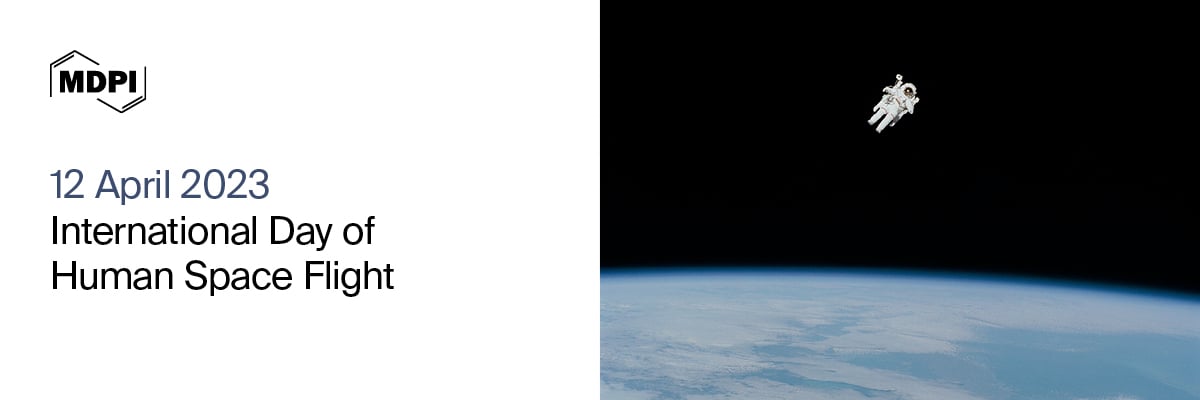
The International Day of Human Space Flight commemorates the first manned space flight by the Soviet citizen Yuri Gagarin on 12 April 1961. This day was declared the International Day of Human Space Flight in 2011 by the United Nations General Assembly resolution, to celebrate the beginning of the human space age. It reaffirms the important contribution of space science and technology in achieving sustainable development goals and increasing the well-being of countries and people, as well as ensuring the realization of their aspiration to preserve outer space for peaceful purposes.
In the course of human exploration of space, we have established many remarkable achievements and breakthrough milestones:
- In 1957, the first human-made Earth satellite, Sputnik I, was launched into outer space;
- In 1961, Yuri Gagarin became the first person to orbit the Earth;
- In 1969, Neil Armstrong became the first human to set foot upon the surface of the Moon;
- In 1996, the first spacecraft in human history successfully landed on Mars;
- In 1998, the International Space Station, a 16-nation international space program, launched for the first time;
- In 2009, the Kepler space telescope was launched, which has helped humans find thousands of exoplanets;
- In 2015, SpaceX successfully launched its Falcon 9 rocket and recovered the first stage.
To further explore the information about space on the 2023 International Day of Human Space Flight, we have gathered academic research from several journals on the topic of space flight, all of which are open access, enabling practitioners, policymakers and people around the world to access and share up-to-date scientific knowledge.
Let us celebrate the International Day of Human Space Flight together.

 |
 |
 |
 |
 |
 |
 |
 |
 |
 |
 |
 |


| Whirl Tower Demonstration of an SMA Blade Twist System Actuators 2022, 11(6), 141; https://doi.org/10.3390/act11060141 |
|
| A Tutorial and Review on Flight Control Co-Simulation Using Matlab/Simulink and Flight Simulators Automation 2022, 3(3), 486-510; https://doi.org/10.3390/automation3030025 |
|
| Reconfigurable Fault-Tolerant Control for Spacecraft Formation Flying Based on Iterative Learning Algorithms Appl. Sci. 2022, 12(5), 2485; https://doi.org/10.3390/app12052485 |
|
| Wilderness Search for Lost Persons Using a Multimodal Aerial-Terrestrial Robot Team Robotics 2022, 11(3), 64; https://doi.org/10.3390/robotics11030064 |
|
|
|
|
| Special Issue: Advances in CubeSat Sails and Tethers | Special Issue: Aerospace Mechanisms and Actuation |
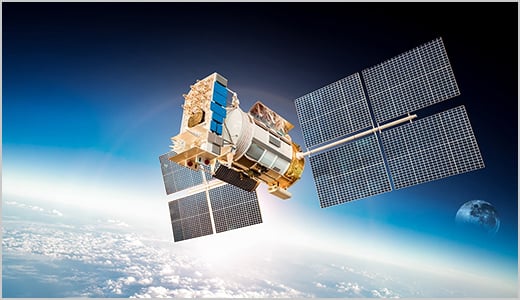 |
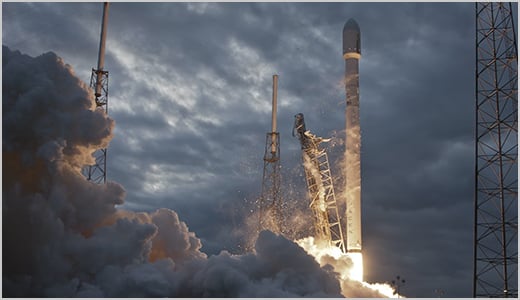 |
| Special Issue: Advanced Fault Diagnosis and Fault-Tolerant Control Technology of Spacecraft | Special Issue: Smart Sensors and Devices: Recent Advances and Applications |
 |
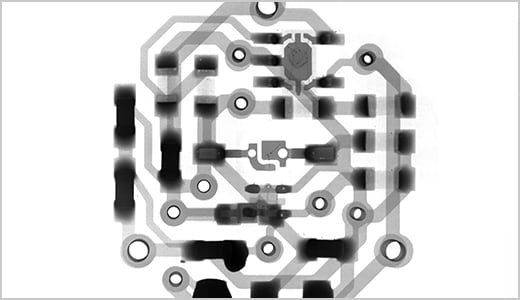 |


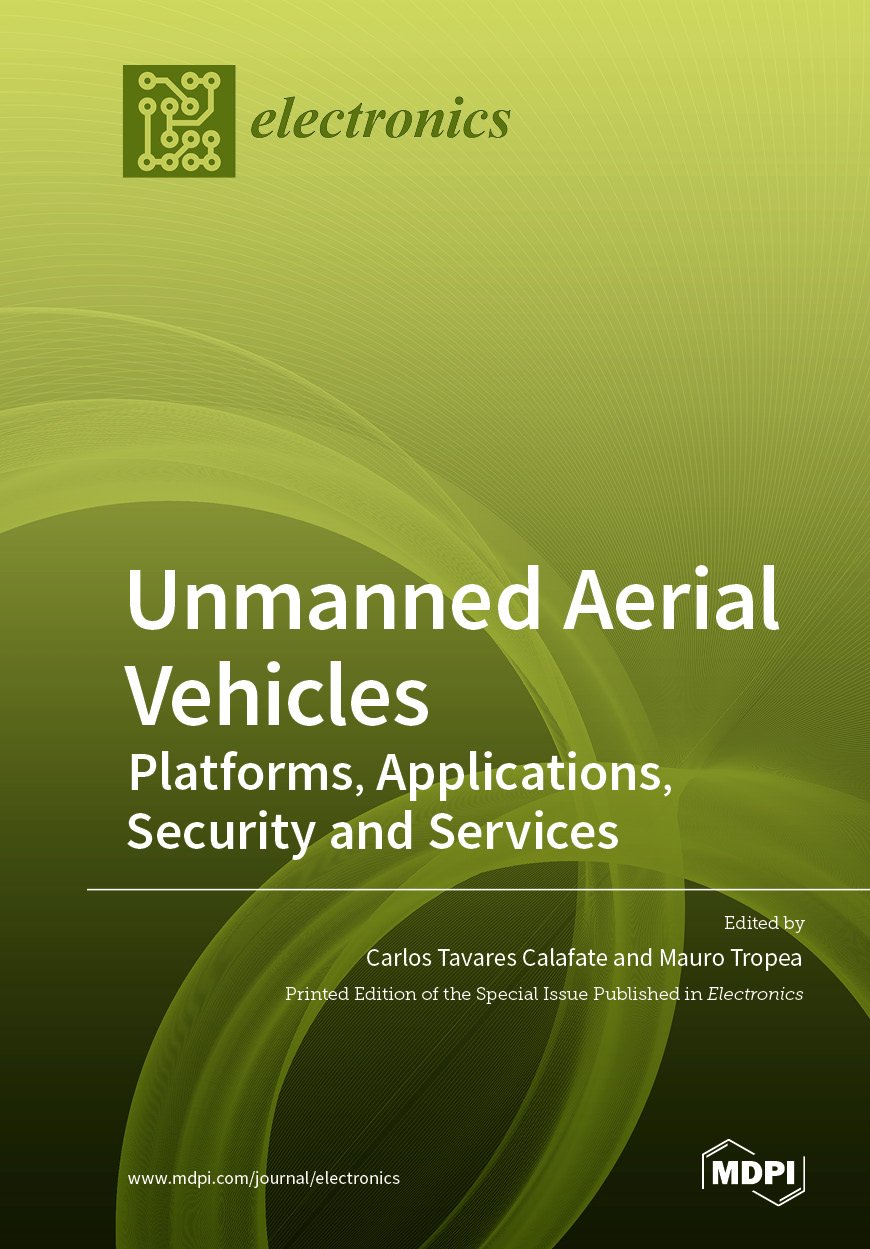 |
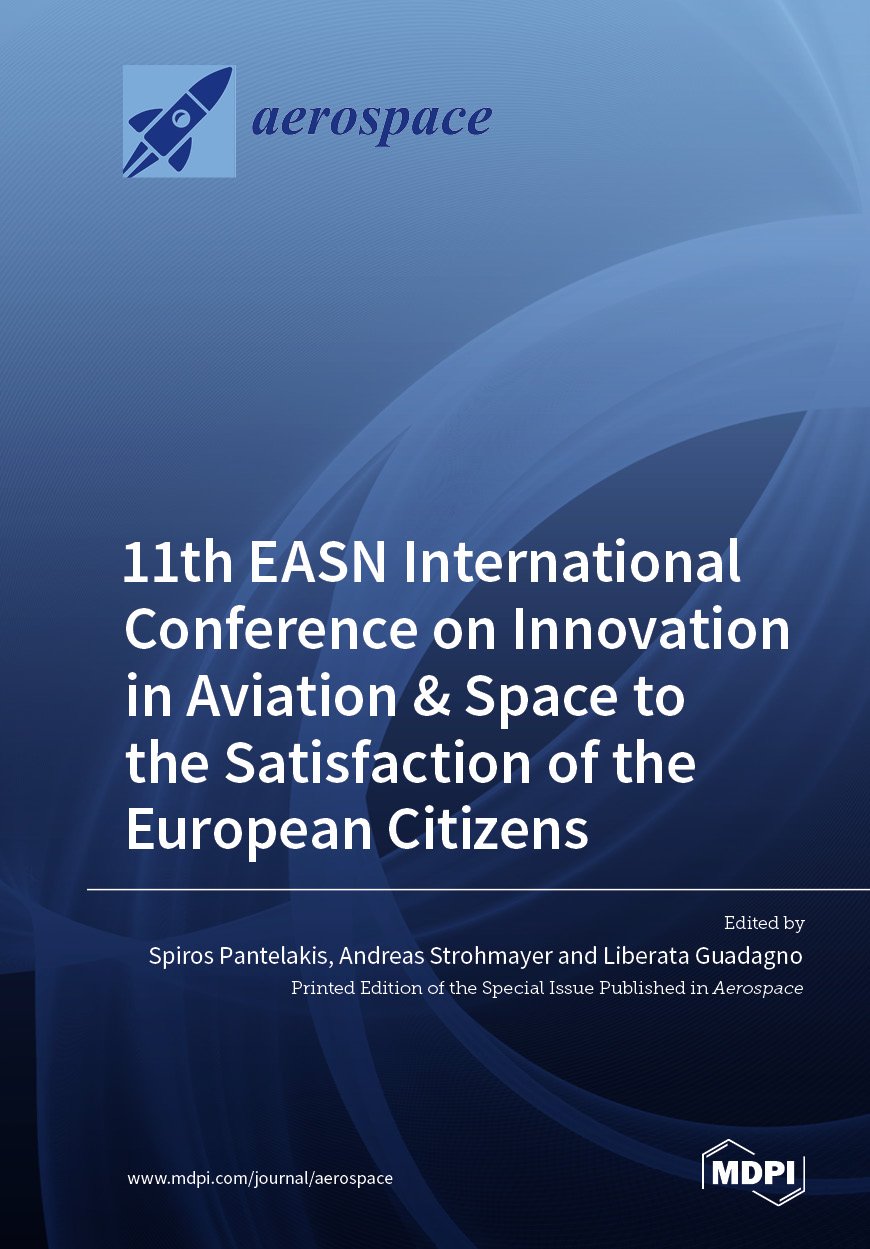 |
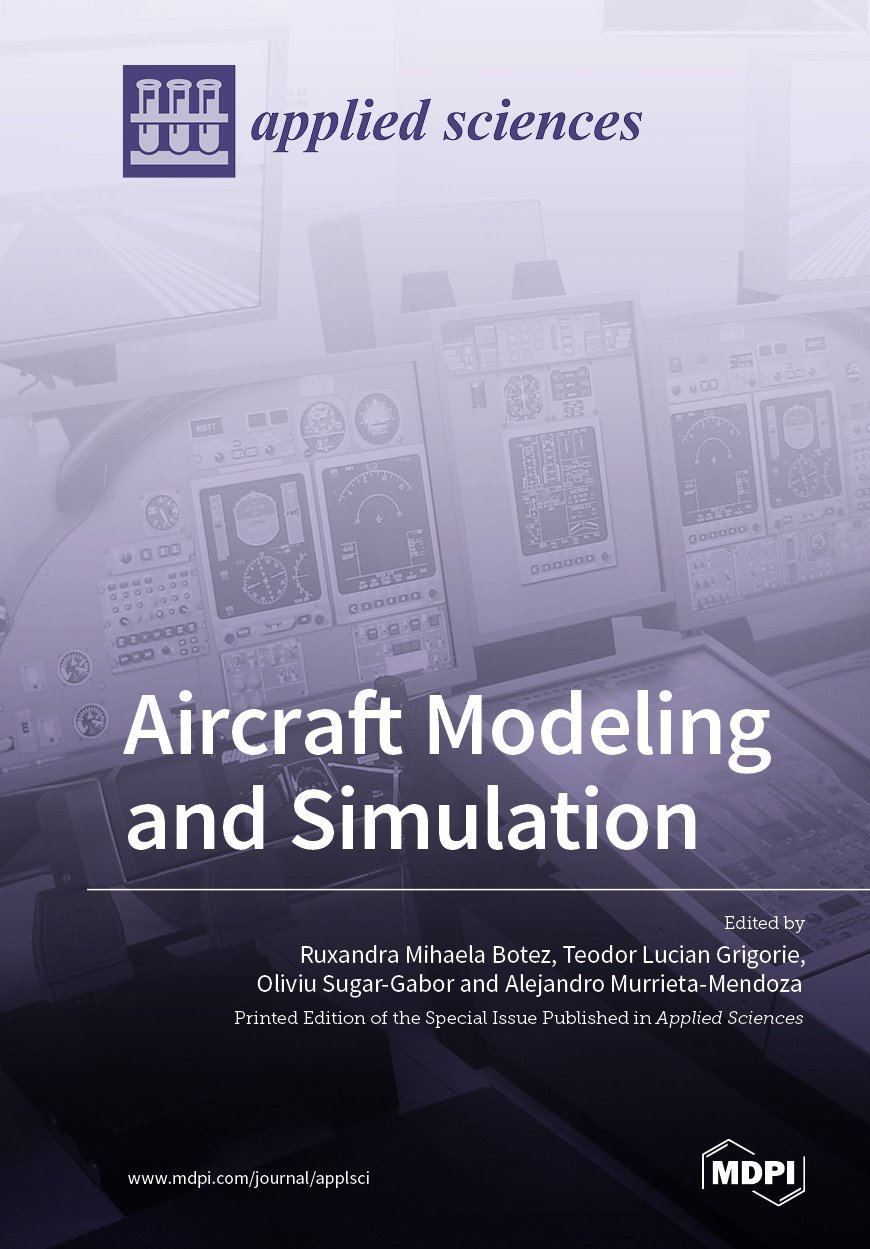 |
31 March 2023
Electronics 2023 Best Paper Award—Winners Announced
We are pleased to announce the winners of the Electronics 2023 Best Paper Award. All papers published in Electronics (ISSN: 2079-9292) from 1 January 2021 to 31 December 2021 were considered for the award. After a thorough evaluation of the originality and significance of the papers, citations, and downloads, three winners were selected.
One Review:
“Evaluating the Quality of Machine Learning Explanations: A Survey on Methods and Metrics”
by Jianlong Zhou, Amir H. Gandomi, Fang Chen and Andreas Holzinger
Electronics 2021, 10(5), 593; doi:10.3390/electronics10050593
Two Articles:
“A Real-Time Detection Algorithm for Kiwifruit Defects Based on YOLOv5”
by Jia Yao, Jiaming Qi, Jie Zhang, Hongmin Shao, Jia Yang and Xin Li
Electronics 2021, 10(14), 1711; doi:10.3390/electronics10141711
“Automated Workers’ Ergonomic Risk Assessment in Manual Material Handling Using sEMG Wearable Sensors and Machine Learning”
by Srimantha E. Mudiyanselage, Phuong Hoang Dat Nguyen, Mohammad Sadra Rajabi and Reza Akhavian
Electronics 2021, 10(20), 2558; doi:10.3390/electronics10202558
Each winner will receive CHF 500 and a chance to publish a paper free of charge after peer review in Electronics before the end of 2023.
Please join us in congratulating the winners of the Electronics 2023 Best Paper Award. We would also like to take this opportunity to thank all our authors for their continued support of Electronics.
This announcement is delivered on behalf of the Assessment Committee—Prof. Dr. Flavio Canavero, Prof. Dr. Nurul I. Sarkar, Dr. Giambattista Gruosso and Prof. Dr. Lei Zhang.
Electronics Editorial Office
31 March 2023
Electronics | Highly Cited Papers in 2022 in the Section “Power Electronics”
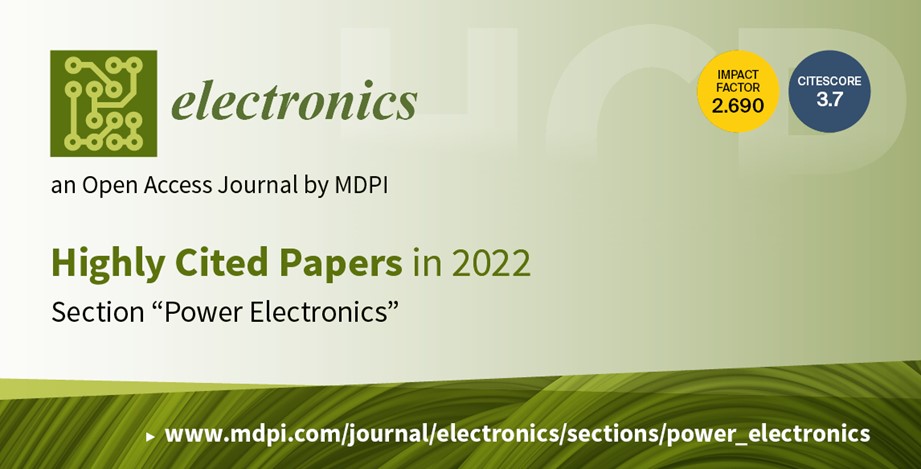
Power electronics has emerged as a key technology in the conversion and control of electrical power in multiple applications: electric drives and generators, renewable energy systems, energy storage systems, smart cities, smart grids, power systems, transport (vehicles, aircraft, ships, and others), industrial, medical, military, telecommunications, and consumable and home apparatus.
The Section “Power Electronics” is devoted to publishing original research and state-of-the-art review papers on emerging technologies and trends in power electronics, including components, circuits, design, modeling, simulation, control, implementation, testing, and analysis of power electronics and their applications.
As Electronics (ISSN: 2079-9292) is in an Open Access format, you have free and unlimited access to the full text of all of the articles published in our journal. We welcome you to read our most highly cited papers published in 2022 listed below:
- “Learning-Based Methods for Cyber Attacks Detection in IoT Systems: A Survey on Methods, Analysis, and Future Prospects”
by Usman Inayat, Muhammad Fahad Zia, Sajid Mahmood, Haris M. Khalid and Mohamed Benbouzid
Electronics 2022, 11(9), 1502; https://doi.org/10.3390/electronics11091502
Available online: https://www.mdpi.com/2079-9292/11/9/1502
- “Parameter Extraction of Solar Module Using the Sooty Tern Optimization Algorithm”
by Abha Singh, Abhishek Sharma, Shailendra Rajput, Amit Kumar Mondal, Amarnath Bose and Mangey Ram
Electronics 2022, 11(4), 564; https://doi.org/10.3390/electronics11040564
Available online: https://www.mdpi.com/2079-9292/11/4/564
- “Accurate Photovoltaic Models Based on an Adaptive Opposition Artificial Hummingbird Algorithm”
by Abdelhady Ramadan, Salah Kamel, Mohamed H. Hassan, Emad M. Ahmed and Hany M. Hasanien
Electronics 2022, 11(3), 318; https://doi.org/10.3390/electronics11030318
Available online: https://www.mdpi.com/2079-9292/11/3/318
- “A Survey on Capacitor Voltage Control in Neutral-Point-Clamped Multilevel Converters”
by Salvador Alepuz, Sergio Busquets-Monge, Joan Nicolás-Apruzzese, Àlber Filbà-Martínez, Josep Bordonau, Xibo Yuan and Samir Kouro
Electronics 2022, 11(4), 527; https://doi.org/10.3390/electronics11040527
Available online: https://www.mdpi.com/2079-9292/11/4/527
- “New High-Gain Transformerless DC/DC Boost Converter System”
by Hassan Yousif Ahmed, Omar Abdel-Rahim and Ziad M. Ali
Electronics 2022, 11(5), 734; https://doi.org/10.3390/electronics11050734
Available online: https://www.mdpi.com/2079-9292/11/5/734
- “A Review of Wireless Power Transfer Systems for Electric Vehicle Battery Charging with a Focus on Inductive Coupling”
by Iman Okasili, Ahmad Elkhateb and Timothy Littler
Electronics 2022, 11(9), 1355; https://doi.org/10.3390/electronics11091355
Available online: https://www.mdpi.com/2079-9292/11/9/1355
- “Coordinated Control of Voltage Balancers for the Regulation of Unbalanced Voltage in a Multi-Node Bipolar DC Distribution Network”
by Chunsheng Guo, Yuhong Wang and Jianquan Liao
Electronics 2022, 11(1), 166; https://doi.org/10.3390/electronics11010166
Available online: https://www.mdpi.com/2079-9292/11/1/166
- “Diagnosis and Fault Detection of Rotor Bars in Squirrel Cage Induction Motors Using Combined Park’s Vector and Extended Park’s Vector Approaches”
by Mustapha Messaoudi, Aymen Flah, Abdullah Alhumaidi Alotaibi, Ahmed Althobaiti, Lassaad Sbita and Claude Ziad El-Bayeh
Electronics 2022, 11(3), 380; https://doi.org/10.3390/electronics11030380
Available online: https://www.mdpi.com/2079-9292/11/3/380
- “Direct Sliding Mode Control for Dynamic Instabilities in DC-Link Voltage of Standalone Photovoltaic Systems with a Small Capacitor”
by Ibrahim Al-Wesabi, Zhijian Fang, Zhiguo Wei and Hanlin Dong
Electronics 2022, 11(1), 133; https://doi.org/10.3390/electronics11010133
Available online: https://www.mdpi.com/2079-9292/11/1/133
- “Digital Technology Implementation in Battery-Management Systems for Sustainable Energy Storage: Review, Challenges, and Recommendations”
by Gopal Krishna, Rajesh Singh, Anita Gehlot, Shaik Vaseem Akram, Neeraj Priyadarshi and Bhekisipho Twala
Electronics 2022, 11(17), 2695; https://doi.org/10.3390/electronics11172695
Available online: https://www.mdpi.com/2079-9292/11/17/2695
- “Threat Modeling of a Smart Grid Secondary Substation”
by Filip Holik, Lars Halvdan Flå, Martin Gilje Jaatun, Sule Yildirim Yayilgan and Jørn Foros
Electronics 2022, 11(6), 850; https://doi.org/10.3390/electronics11060850
Available online: https://www.mdpi.com/2079-9292/11/6/850
- “An Investigation on Hybrid Particle Swarm Optimization Algorithms for Parameter Optimization of PV Cells”
by Abha Singh, Abhishek Sharma, Shailendra Rajput, Amarnath Bose and Xinghao Hu
Electronics 2022, 11(6), 909; https://doi.org/10.3390/electronics11060909
Available online: https://www.mdpi.com/2079-9292/11/6/909
- “Performance Evaluation of Solar-PV-Based Non-Isolated Switched-Inductor and Switched-Capacitor High-Step-Up Cuk Converter”
by Neeraj Priyadarshi, Mahajan Sagar Bhaskar, Farooque Azam, Mayank Singh, Dheeraj Kumar Dhaked, Ibrahim B. M. Taha and Mohamed G. Hussien
Electronics 2022, 11(9), 1381; https://doi.org/10.3390/electronics11091381
Available online: https://www.mdpi.com/2079-9292/11/9/1381
- “Renewable Energy Micro-Grid Interfacing: Economic and Environmental Issues”
by Adel A. Abou El-Ela, Ragab A. El-Sehiemy, Sohir M. Allam, Abdullah M. Shaheen, Nadia A. Nagem and Adel M. Sharaf
Electronics 2022, 11(5), 815; https://doi.org/10.3390/electronics11050815
Available online: https://www.mdpi.com/2079-9292/11/5/815
- “Hardware-in-the-Loop Simulations: A Historical Overview of Engineering Challenges”
by Franc Mihalič, Mitja Truntič and Alenka Hren
Electronics 2022, 11(15), 2462; https://doi.org/10.3390/electronics11152462
Available online: https://www.mdpi.com/2079-9292/11/15/2462
- “Design of Open-Ended Structure Wideband PCB Rogowski Coil Based on New Winding Method”
by Qinghua Tan, Wenbin Zhang, Xiangyu Tan, Le Yang, Yanan Ren and Yang Hu
Electronics 2022, 11(3), 381; https://doi.org/10.3390/electronics11030381
Available online: https://www.mdpi.com/2079-9292/11/3/381
- “New Modulation Technique in Smart Grid Interfaced Multilevel UPQC-PV Controlled via Fuzzy Logic Controller”
by Hassan Kenjrawy, Carlo Makdisie, Issam Houssamo and Nabil Mohammed
Electronics 2022, 11(6), 919; https://doi.org/10.3390/electronics11060919
Available online: https://www.mdpi.com/2079-9292/11/6/919
- “Requirements for Energy-Harvesting-Driven Edge Devices Using Task-Offloading Approaches”
by Meriam Ben Ammar, Imed Ben Dhaou, Dhouha El Houssaini, Salwa Sahnoun, Ahmed Fakhfakh and Olfa Kanoun
Electronics 2022, 11(3), 383; https://doi.org/10.3390/electronics11030383
Available online: https://www.mdpi.com/2079-9292/11/3/383
- “High-Voltage Drivers Based on Forming Lines with Extended Quasi-Rectangular Pulses for High-Power Microwave Oscillators”
by Vladislav V. Rostov, Alexei S. Stepchenko, Pavel V. Vykhodtsev and Ruslan V. Tsygankov
Electronics 2022, 11(3), 406; https://doi.org/10.3390/electronics11030406
Available online: https://www.mdpi.com/2079-9292/11/3/406
- “Multiple-Output DC–DC Converters: Applications and Solutions”
by Salvador P. Litrán, Eladio Durán, Jorge Semião and Cristian Díaz-Martín
Electronics 2022, 11(8), 1258; https://doi.org/10.3390/electronics11081258
Available online: https://www.mdpi.com/2079-9292/11/8/1258
27 March 2023
Meet Us at the 2023 IEEE 6th International Conference on Electronics Technology (ICET 2023), 12–15 May 2023, Chengdu, China
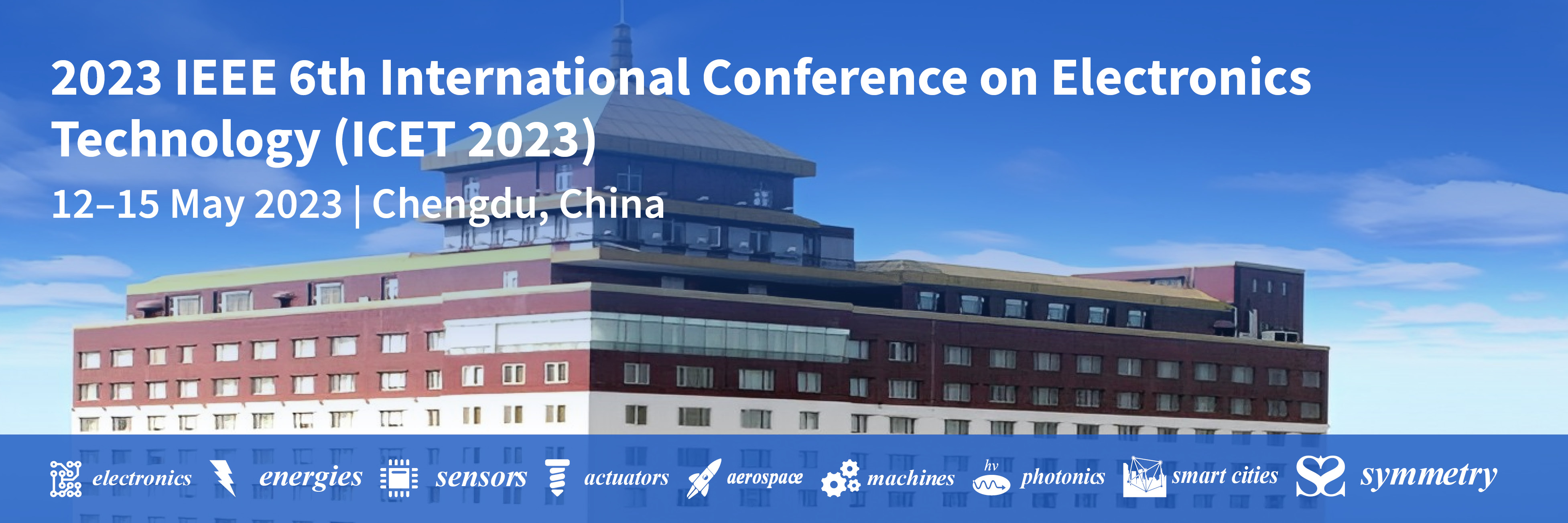
MDPI will be attending the 2023 IEEE 6th International Conference on Electronics Technology (ICET 2023) in Chengdu, China, which will take place from 12 to 15 May 2023. The primary aim of ICET 2023 is to offer an academic platform for senior and young scientists from all over the world to exchange research ideas and share knowledge, development, and experiences on topics related to their experimental and theoretical work in the very widespread field of electronics and micro/nanoelectronics technology and electronic packaging in a convenient and multicultural atmosphere.
The following MDPI journals will be represented:
- Electronics;
- Energies;
- Sensors;
- Actuators;
- Aerospace;
- Machines;
- Photonics;
- Smart Cities;
- Symmetry.
If you are attending this conference, please visit our booth. Our delegates look forward to meeting you in person and answering any questions that you may have. For more information about the conference, please visit the following link: http://icet.net//.
22 March 2023
Electronics | Highly Cited Papers in 2022 in the Section “Microwave and Wireless Communications”
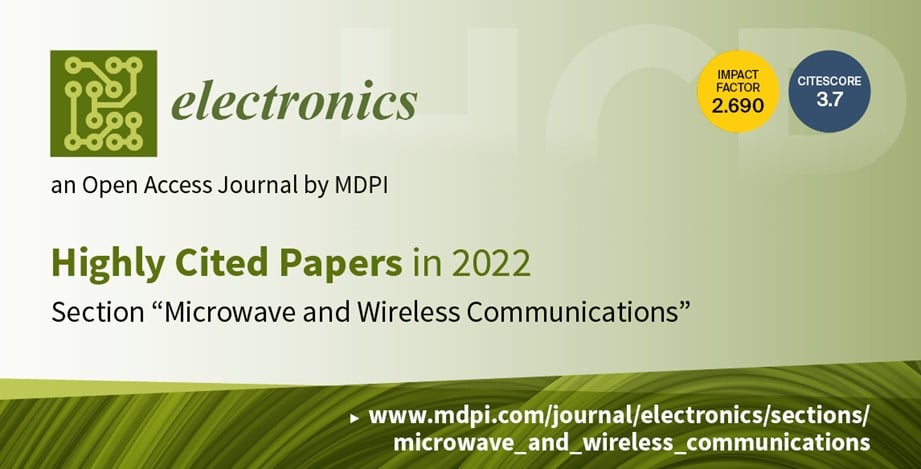
The Section “Microwave and Wireless Communications” invites advanced theories and technologies across a wide spectrum. These can be related to microwave and millimeter wave communication, including radar sensor, etc., which may be a fundament or application, element or system, hardware or software, methodology theory or measurement. We hope to present state-of-the-art technologies in this Section.
As Electronics is an Open Access format, you have free and unlimited access to the full text of all the articles published in our journal. We welcome you to read our most highly cited papers published in 2022 below:
1. “A Road towards 6G Communication—A Review of 5G Antennas, Arrays, and Wearable Devices”
by Muhammad Ikram, Kamel Sultan, Muhammad Faisal Lateef and Abdulrahman S. M. Alqadami
Electronics 2022, 11(1), 169; https://doi.org/10.3390/electronics11010169
Available online: https://www.mdpi.com/2079-9292/11/1/169
2. “A Survey on LoRaWAN Technology: Recent Trends, Opportunities, Simulation Tools and Future Directions”
by Mukarram A. M. Almuhaya, Waheb A. Jabbar, Noorazliza Sulaiman and Suliman Abdulmalek
Electronics 2022, 11(1), 164; https://doi.org/10.3390/electronics11010164
Available online: https://www.mdpi.com/2079-9292/11/1/164
3. “A Novel Meander Bowtie-Shaped Antenna with Multi-Resonant and Rejection Bands for Modern 5G Communications”
by Yanal S. Faouri, Sarosh Ahmad, Naser Ojaroudi Parchin, Chan Hwang See and Raed Abd-Alhameed
Electronics 2022, 11(5), 821; https://doi.org/10.3390/electronics11050821
Available online: https://www.mdpi.com/2079-9292/11/5/821
4. “AlexNet Convolutional Neural Network for Disease Detection and Classification of Tomato Leaf”
by Hsing-Chung Chen, Agung Mulyo Widodo, Andika Wisnujati, Mosiur Rahaman, Jerry Chun-Wei Lin, Liukui Chen and Chien-Erh Weng
Electronics 2022, 11(6), 951; https://doi.org/10.3390/electronics11060951
Available online: https://www.mdpi.com/2079-9292/11/6/951
5. “A Multi-Slot Two-Antenna MIMO with High Isolation for Sub-6 GHz 5G/IEEE802.11ac/ax/C-Band/X-Band Wireless and Satellite Applications”
by Abdullah G. Alharbi, Jayshri Kulkarni, Arpan Desai, Chow-Yen-Desmond Sim and Ajay Poddar
Electronics 2022, 11(3), 473; https://doi.org/10.3390/electronics11030473
Available online: https://www.mdpi.com/2079-9292/11/3/473
6. “High-Isolation MIMO Antenna for 5G Millimeter-Wave Communication Systems”
by Muhammad Bilal, Syeda Iffat Naqvi, Niamat Hussain, Yasar Amin and Nam Kim
Electronics 2022, 11(6), 962; https://doi.org/10.3390/electronics11060962
Available online: https://www.mdpi.com/2079-9292/11/6/962
7. “Recent Studies Utilizing Artificial Intelligence Techniques for Solving Data Collection, Aggregation and Dissemination Challenges in Wireless Sensor Networks: A Review”
by Walid Osamy, Ahmed M. Khedr, Ahmed Salim, Amal Ibrahim AlAli and Ahmed A. El-Sawy
Electronics 2022, 11(3), 313; https://doi.org/10.3390/electronics11030313
Available online: https://www.mdpi.com/2079-9292/11/3/313
8. “Design and Characterization of Compact Broadband Antenna and Its MIMO Configuration for 28 GHz 5G Applications”
by Musa Hussain, Esraa Mousa Ali, Syed Muhammad Rizvi Jarchavi, Abir Zaidi, Ali Imran Najam, Abdullah Alhumaidi Alotaibi, Ahmed Althobaiti and Sherif S. M. Ghoneim
Electronics 2022, 11(4), 523; https://doi.org/10.3390/electronics11040523
Available online: https://www.mdpi.com/2079-9292/11/4/523
9. “Recent Developments and Challenges on Beam Steering Characteristics of Reconfigurable Transmitarray Antennas”
by Qasim Ali, Waseem Shahzad, Iftikhar Ahmad, Shozab Safiq, Xi Bin, Syed Muzahir Abbas and Houjun Sun
Electronics 2022, 11(4), 587; https://doi.org/10.3390/electronics11040587
Available online: https://www.mdpi.com/2079-9292/11/4/587
10. “Mobility Management Issues and Solutions in 5G-and-Beyond Networks: A Comprehensive Review”
by Maraj Uddin Ahmed Siddiqui, Faizan Qamar, Muhammad Tayyab, MHD Nour Hindia, Quang Ngoc Nguyen and Rosilah Hassan
Electronics 2022, 11(9), 1366; https://doi.org/10.3390/electronics11091366
Available online: https://www.mdpi.com/2079-9292/11/9/1366
11. “A Survey on CubeSat Missions and Their Antenna Designs”
by Sining Liu, Panagiotis Ioannis Theoharis, Raad Raad, Faisel Tubbal, Angelos Theoharis, Saeid Iranmanesh, Suhila Abulgasem, Muhammad Usman Ali Khan and Ladislau Matekovits
Electronics 2022, 11(13), 2021; https://doi.org/10.3390/electronics11132021
Available online: https://www.mdpi.com/2079-9292/11/13/2021
12. “Counteracting Selfish Nodes Using Reputation Based System in Mobile Ad Hoc Networks”
by Muhammad Fayaz, Gulzar Mehmood, Ajab Khan, Sohail Abbas, Muhammad Fayaz and Jeonghwan Gwak
Electronics 2022, 11(2), 185; https://doi.org/10.3390/electronics11020185
Available online: https://www.mdpi.com/2079-9292/11/2/185
13. “Indoor Positioning System Based on Bluetooth Low Energy Technology and a Nature-Inspired Optimization Algorithm”
by Primož Bencak, Darko Hercog and Tone Lerher
Electronics 2022, 11(3), 308; https://doi.org/10.3390/electronics11030308
Available online: https://www.mdpi.com/2079-9292/11/3/308
14. “Performance Analysis of Multi-User MIMO Schemes under Realistic 3GPP 3-D Channel Model for 5G mmWave Cellular Networks”
by Daniel Gaetano Riviello, Francesco Di Stasio and Riccardo Tuninato
Electronics 2022, 11(3), 330; https://doi.org/10.3390/electronics11030330
Available online: https://www.mdpi.com/2079-9292/11/3/330
15. “A Compact Sub-GHz Wide Tunable Antenna Design for IoT Applications”
by Rifaqat Hussain, Saad I. Alhuwaimel, Abdullah M. Algarni, Khaled Aljaloud and Niamat Hussain
Electronics 2022, 11(7), 1074; https://doi.org/10.3390/electronics11071074
Available online: https://www.mdpi.com/2079-9292/11/7/1074
16. “A Review on SIW and Its Applications to Microwave Components”
by Augustine O. Nwajana and Emenike Raymond Obi
Electronics 2022, 11(7), 1160; https://doi.org/10.3390/electronics11071160
Available online: https://www.mdpi.com/2079-9292/11/7/1160
17. “A New mm-Wave Antenna Array with Wideband Characteristics for Next Generation Communication Systems”
by Mehr E Munir, Abdullah G. Al Harbi, Saad Hassan Kiani, Mohamed Marey, Naser Ojaroudi Parchin, Jehanzeb Khan, Hala Mostafa, Javed Iqbal, Muhammad Abbas Khan and Chan Hwang See et al.
Electronics 2022, 11(10), 1560; https://doi.org/10.3390/electronics11101560
Available online: https://www.mdpi.com/2079-9292/11/10/1560
18. “Energy-Efficient Routing Protocols for Wireless Sensor Networks: Architectures, Strategies, and Performance”
by Trupti Mayee Behera, Umesh Chandra Samal, Sushanta Kumar Mohapatra, Mohammad S. Khan, Bhargav Appasani, Nicu Bizon and Phatiphat Thounthong
Electronics 2022, 11(15), 2282; https://doi.org/10.3390/electronics11152282
Available online: https://www.mdpi.com/2079-9292/11/15/2282
19. “Interference Challenges and Management in B5G Network Design: A Comprehensive Review”
by Osamah Thamer Hassan Alzubaidi, MHD Nour Hindia, Kaharudin Dimyati, Kamarul Ariffin Noordin, Amelia Natasya Abdul Wahab, Faizan Qamar and Rosilah Hassan
Electronics 2022, 11(18), 2842; https://doi.org/10.3390/electronics11182842
Available online: https://www.mdpi.com/2079-9292/11/18/2842
20. “Enhanced Millimeter-Wave 3-D Imaging via Complex-Valued Fully Convolutional Neural Network”
by Handan Jing, Shiyong Li, Ke Miao, Shuoguang Wang, Xiaoxi Cui, Guoqiang Zhao and Houjun Sun
Electronics 2022, 11(1), 147; https://doi.org/10.3390/electronics11010147
Available online: https://www.mdpi.com/2079-9292/11/1/147
22 March 2023
Recruiting Editorial Board Members for Section “Artificial Intelligence Circuits and Systems (AICAS)” in Electronics
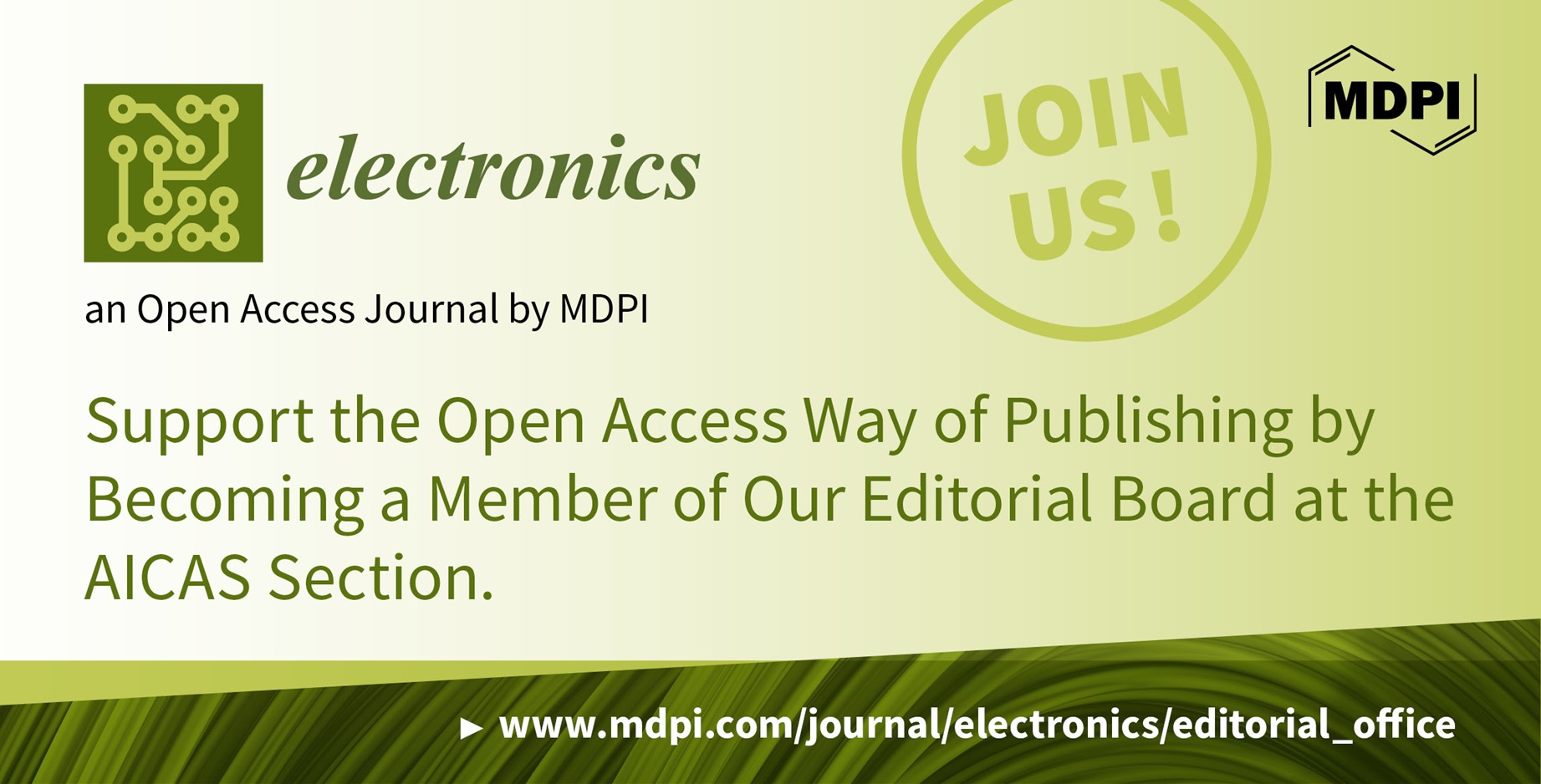
The “Artificial Intelligence Circuits and Systems (AICAS)” Section in Electronics (ISSN: 2079-9292) is focused on publications that are related to circuits and systems for artificial intelligence. The Section covers topics of interest within hardware-based deep learning AI and algorithmic deep learning AI using machine learning. It is dedicated to the publication of articles not only from the listed areas but also from similar or related areas. We encourage the submission of original contributions derived from theoretical and/or application-oriented research studies.
The subject areas of interest include, but are not limited to, the following:
- Circuits and systems for artificial intelligence;
- Tools/platforms for artificial intelligence;
- Artificial intelligence computing;
- Advanced neural network design;
- Neuromorphic processors;
- Deep learning algorithms;
- Machine learning algorithms;
- Cloud artificial intelligence computing platforms;
- Hardware accelerators;
- Hardware design for artificial intelligence systems;
- Design automation for artificial intelligence systems;
- Emerging applications of artificial intelligence;
- Medical applications of artificial intelligence;
- Autonomous vehicle applications of artificial intelligence;
- Smart cities and environmental applications of artificial intelligence.
If you are an active researcher in the field and are passionate about participating in cutting-edge research publications, please do not hesitate to contact us about joining the board and contributing to this section.
For more information, please visit https://www.mdpi.com/journal/electronics/sections/AICAS.
If you have any questions, please contact the Managing Editor Ms. Queena Cui ([email protected]).
17 March 2023
Electronics | Highly Cited Papers in 2021 in The Section “Microwave and Wireless Communications”
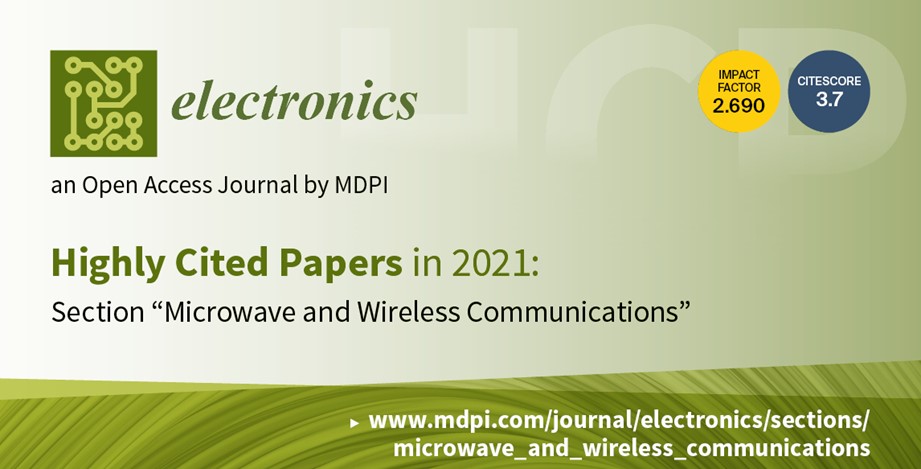
In the Section “Microwave and Wireless Communication”, we would like to invite advanced theories and technologies across a wide spectrum. These can be related to microwave and millimeter wave communication, including radar sensor, etc., which may be a fundament or application, element or system, hardware or software, methodology theory or measurement. We hope to present the state-of-the-art technologies in this Section.
As they are in an Open Access format, you have free and unlimited access to the full text of all the articles published in our journal. We welcome you to read our most highly cited papers published in 2021 below:
1. “Ubiquitous Vehicular Ad-Hoc Network Computing Using Deep Neural Network with IoT-Based Bat Agents for Traffic Management”
by Srihari Kannan, Gaurav Dhiman, Yuvaraj Natarajan, Ashutosh Sharma, Sachi Nandan Mohanty, Mukesh Soni, Udayakumar Easwaran, Hamidreza Ghorbani, Alia Asheralieva and Mehdi Gheisari
Electronics 2021, 10(7), 785; https://doi.org/10.3390/electronics10070785
Available online: https://www.mdpi.com/2079-9292/10/7/785
2. “A Quad-Port Dual-Band MIMO Antenna Array for 5G Smartphone Applications”
by Jianlin Huang, Guiting Dong, Jing Cai, Han Li and Gui Liu
Electronics 2021, 10(5), 542; https://doi.org/10.3390/electronics10050542
Available online: https://www.mdpi.com/2079-9292/10/5/542
3. “Infinity Shell Shaped MIMO Antenna Array for mm-Wave 5G Applications”
by Mian Muhammad Kamal, Shouyi Yang, Xin-cheng Ren, Ahsan Altaf, Saad Hassan Kiani, Muhammad Rizwan Anjum, Amjad Iqbal, Muhammad Asif and Sohail Imran Saeed
Electronics 2021, 10(2), 165; https://doi.org/10.3390/electronics10020165
Available online: https://www.mdpi.com/2079-9292/10/2/165
4. “A 28 GHz Broadband Helical Inspired End-Fire Antenna and Its MIMO Configuration for 5G Pattern Diversity Applications”
by Hijab Zahra, Wahaj Abbas Awan, Wael Abd Ellatif Ali, Niamat Hussain, Syed Muzahir Abbas and Subhas Mukhopadhyay
Electronics 2021, 10(4), 405; https://doi.org/10.3390/electronics10040405
Available online: https://www.mdpi.com/2079-9292/10/4/405
5. “Dynamic Route Discovery Using Modified Grasshopper Optimization Algorithm in Wireless Ad-Hoc Visible Light Communication Network”
by Sharmila Vadivel, Srinivas Konda, Kavitha Rani Balmuri, Andrzej Stateczny and B. D. Parameshachari
Electronics 2021, 10(10), 1176; https://doi.org/10.3390/electronics10101176
Available online: https://www.mdpi.com/2079-9292/10/10/1176
6. “A Flexible and Pattern Reconfigurable Antenna with Small Dimensions and Simple Layout for Wireless Communication Systems Operating over 1.65–2.51 GHz”
by Adnan Ghaffar, Xue Jun Li, Wahaj Abbas Awan, Aqeel Hussain Naqvi, Niamat Hussain, Mohammad Alibakhshikenari and Ernesto Limiti
Electronics 2021, 10(5), 601; https://doi.org/10.3390/electronics10050601
Available online: https://www.mdpi.com/2079-9292/10/5/601
7. “Design and Synthesis of Multi-Mode Bandpass Filter for Wireless Applications”
by Satheeshkumar Palanisamy, Balakumaran Thangaraju, Osamah Ibrahim Khalaf, Youseef Alotaibi and Saleh Alghamdi
Electronics 2021, 10(22), 2853; https://doi.org/10.3390/electronics10222853
Available online: https://www.mdpi.com/2079-9292/10/22/2853
8. “Design and Realization of a Frequency Reconfigurable Antenna with Wide, Dual, and Single-Band Operations for Compact Sized Wireless Applications”
by Wahaj Abbas Awan, Syeda Iffat Naqvi, Wael Abd Ellatif Ali, Niamat Hussain, Amjad Iqbal, Huy Hung Tran, Mohammad Alibakhshikenari and Ernesto Limiti
Electronics 2021, 10(11), 1321; https://doi.org/10.3390/electronics10111321
Available online: https://www.mdpi.com/2079-9292/10/11/1321
9. “Design of a MIMO Antenna with High Gain and Enhanced Isolation for WLAN Applications”
by He Peng, Ruixing Zhi, Qichao Yang, Jing Cai, Yi Wan and Gui Liu
Electronics 2021, 10(14), 1659; https://doi.org/10.3390/electronics10141659
Available online: https://www.mdpi.com/2079-9292/10/14/1659
10. “8-Port Semi-Circular Arc MIMO Antenna with an Inverted L-Strip Loaded Connected Ground for UWB Applications”
by Tathababu Addepalli, Arpan Desai, Issa Elfergani, N. Anveshkumar, Jayshri Kulkarni, Chemseddine Zebiri, Jonathan Rodriguez and Raed Abd-Alhameed
Electronics 2021, 10(12), 1476; https://doi.org/10.3390/electronics10121476
Available online: https://www.mdpi.com/2079-9292/10/12/1476
11. “Compact Quad-Element High-Isolation Wideband MIMO Antenna for mm-Wave Applications”
by Daniyal Ali Sehrai, Muhammad Asif, Nosherwan Shoaib, Muhammad Ibrar, Saeedullah Jan, Mohammad Alibakhshikenari, Ali Lalbakhsh and Ernesto Limiti
Electronics 2021, 10(11), 1300; https://doi.org/10.3390/electronics10111300
Available online: https://www.mdpi.com/2079-9292/10/11/1300
12. “Leveraging Machine-Learning for D2D Communications in 5G/Beyond 5G Networks”
by Sherief Hashima, Basem M. ElHalawany, Kohei Hatano, Kaishun Wu and Ehab Mahmoud Mohamed
Electronics 2021, 10(2), 169; https://doi.org/10.3390/electronics10020169
Available online: https://www.mdpi.com/2079-9292/10/2/169
13. “E-Shaped H-Slotted Dual Band mmWave Antenna for 5G Technology”
by Kiran Raheel, Ahsan Altaf, Arbab Waheed, Saad Hassan Kiani, Daniyal Ali Sehrai, Faisel Tubbal and Raad Raad
Electronics 2021, 10(9), 1019; https://doi.org/10.3390/electronics10091019
Available online: https://www.mdpi.com/2079-9292/10/9/1019
14. “Donut-Shaped mmWave Printed Antenna Array for 5G Technology”
by Mian Muhammad Kamal, Shouyi Yang, Saad Hassan Kiani, Muhammad Rizwan Anjum, Mohammad Alibakhshikenari, Zulfiqar Ali Arain, Abdul Aleem Jamali, Ali Lalbakhsh and Ernesto Limiti
Electronics 2021, 10(12), 1415; https://doi.org/10.3390/electronics10121415
Available online: https://www.mdpi.com/2079-9292/10/12/1415
15. “A Textile EBG-Based Antenna for Future 5G-IoT Millimeter-Wave Applications”
by EL May Wissem, Imen Sfar, Lotfi Osman and Jean-Marc Ribero
Electronics 2021, 10(2), 154; https://doi.org/10.3390/electronics10020154
Available online: https://www.mdpi.com/2079-9292/10/2/154
16. “Survey of Millimeter-Wave Propagation Measurements and Models in Indoor Environments”
by Ahmed Al-Saman, Michael Cheffena, Olakunle Elijah, Yousef A. Al-Gumaei, Sharul Kamal Abdul Rahim and Tawfik Al-Hadhrami
Electronics 2021, 10(14), 1653; https://doi.org/10.3390/electronics10141653
Available online: https://www.mdpi.com/2079-9292/10/14/1653
17. “A Novel Hook-Shaped Antenna Operating at 28 GHz for Future 5G mmwave Applications”
by Mian Muhammad Kamal, Shouyi Yang, Saad Hassan Kiani, Daniyal Ali Sehrai, Mohammad Alibakhshikenari, Mujeeb Abdullah, Francisco Falcone, Ernesto Limiti and Mehre Munir
Electronics 2021, 10(6), 673; https://doi.org/10.3390/electronics10060673
Available online: https://www.mdpi.com/2079-9292/10/6/673
18. “Research Challenges and Opportunities in Drone Forensics Models”
by Arafat Al-Dhaqm, Richard A. Ikuesan, Victor R. Kebande, Shukor Razak and Fahad M. Ghabban
Electronics 2021, 10(13), 1519; https://doi.org/10.3390/electronics10131519
Available online: https://www.mdpi.com/2079-9292/10/13/1519
19. “Massive MIMO Techniques for 5G and Beyond—Opportunities and Challenges”
by David Borges, Paulo Montezuma, Rui Dinis and Marko Beko
Electronics 2021, 10(14), 1667; https://doi.org/10.3390/electronics10141667
Available online: https://www.mdpi.com/2079-9292/10/14/1667
20. “Design and Analysis of Wideband Flexible Self-Isolating MIMO Antennas for Sub-6 GHz 5G and WLAN Smartphone Terminals”
by Jayshri Kulkarni, Abdullah G. Alharbi, Arpan Desai, Chow-Yen-Desmond Sim and Ajay Poddar
Electronics 2021, 10(23), 3031; https://doi.org/10.3390/electronics10233031
Available online: https://www.mdpi.com/2079-9292/10/23/3031
17 March 2023
Electronics | Highly Cited Papers in 2021 in the Section “Power Electronics”

The Section “Power Electronics” is devoted to publishing original research and state-of-the-art review papers on emerging technologies and trends in power electronics, including components, circuits, design, modeling, simulation, control, implementation, testing, and analysis of power electronics and its applications.
As Electronics is of Open Access format, you have free and unlimited access to the full text of all articles published in our journal. We welcome you to read our most highly cited papers published in 2021 below:
1. “Role of Wide Bandgap Materials in Power Electronics for Smart Grids Applications”
by Javier Ballestín-Fuertes, Jesús Muñoz-Cruzado-Alba, José F. Sanz-Osorio and Erika Laporta-Puyal
Electronics 2021, 10(6), 677; https://doi.org/10.3390/electronics10060677
Available online: https://www.mdpi.com/2079-9292/10/6/677
2. “Review of Electric Vehicle Converter Configurations, Control Schemes and Optimizations: Challenges and Suggestions”
by Molla S. Hossain Lipu, Mohammad Faisal, Shaheer Ansari, Mahammad A. Hannan, Tahia F. Karim, Afida Ayob, Aini Hussain, Md. Sazal Miah and Mohamad Hanif Md Saad
Electronics 2021, 10(4), 477; https://doi.org/10.3390/electronics10040477
Available online: https://www.mdpi.com/2079-9292/10/4/477
3. “Fuzzy Logic-Based Direct Power Control Method for PV Inverter of Grid-Tied AC Microgrid without Phase-Locked Loop”
by Shameem Ahmad, Saad Mekhilef, Hazlie Mokhlis, Mazaher Karimi, Alireza Pourdaryaei, Tofael Ahmed, Umme Kulsum Jhuma and Suhail Afzal
Electronics 2021, 10(24), 3095; https://doi.org/10.3390/electronics10243095
Available online: https://www.mdpi.com/2079-9292/10/24/3095
4. “Voltage Stability of Power Systems with Renewable-Energy Inverter-Based Generators: A Review”
by Nasser Hosseinzadeh, Asma Aziz, Apel Mahmud, Ameen Gargoom and Mahbub Rabbani
Electronics 2021, 10(2), 115; https://doi.org/10.3390/electronics10020115
Available online: https://www.mdpi.com/2079-9292/10/2/115
5. “An Effective Method for Parameter Estimation of a Solar Cell”
by Abhishek Sharma, Abhinav Sharma, Moshe Averbukh, Vibhu Jately and Brian Azzopardi
Electronics 2021, 10(3), 312; https://doi.org/10.3390/electronics10030312
Available online: https://www.mdpi.com/2079-9292/10/3/312
6. “A Novel Solution Methodology Based on a Modified Gradient-Based Optimizer for Parameter Estimation of Photovoltaic Models”
by Mohamed H. Hassan, Salah Kamel, M. A. El-Dabah and Hegazy Rezk
Electronics 2021, 10(4), 472; https://doi.org/10.3390/electronics10040472
Available online: https://www.mdpi.com/2079-9292/10/4/472
7. “Electric Vehicles Charging Stations’ Architectures, Criteria, Power Converters, and Control Strategies in Microgrids”
by Dominic Savio Abraham, Rajesh Verma, Lakshmikhandan Kanagaraj, Sundar Rajan Giri Thulasi Raman, Narayanamoorthi Rajamanickam, Bharatiraja Chokkalingam, Kamalesh Marimuthu Sekar and Lucian Mihet-Popa
Electronics 2021, 10(16), 1895; https://doi.org/10.3390/electronics10161895
Available online: https://www.mdpi.com/2079-9292/10/16/1895
8. “Optimal Placement and Sizing of D-STATCOM in Radial and Meshed Distribution Networks Using a Discrete-Continuous Version of the Genetic Algorithm”
by Cristian Mateo Castiblanco-Pérez, David Esteban Toro-Rodríguez, Oscar Danilo Montoya and Diego Armando Giral-Ramírez
Electronics 2021, 10(12), 1452; https://doi.org/10.3390/electronics10121452
Available online: https://www.mdpi.com/2079-9292/10/12/1452
9. “Estimation of Lithium-Ion Batteries State-Condition in Electric Vehicle Applications: Issues and State of the Art”
by Khaled Laadjal and Antonio J. Marques Cardoso
Electronics 2021, 10(13), 1588; https://doi.org/10.3390/electronics10131588
Available online: https://www.mdpi.com/2079-9292/10/13/1588
10. “Trends and Challenges in Multi-Level Inverter with Reduced Switches”
by Ganesh Kumar Srinivasan, Marco Rivera, Vijayaraja Loganathan, Dhanasekar Ravikumar and Balaji Mohan
Electronics 2021, 10(4), 368; https://doi.org/10.3390/electronics10040368
Available online: https://www.mdpi.com/2079-9292/10/4/368
11. “Parameter Extraction of Photovoltaic Module Using Tunicate Swarm Algorithm”
by Abhishek Sharma, Ankit Dasgotra, Sunil Kumar Tiwari, Abhinav Sharma, Vibhu Jately and Brian Azzopardi
Electronics 2021, 10(8), 878; https://doi.org/10.3390/electronics10080878
Available online: https://www.mdpi.com/2079-9292/10/8/878
12. “Reduction of Losses and Operating Costs in Distribution Networks Using a Genetic Algorithm and Mathematical Optimization”
by Fabio Edison Riaño, Jonathan Felipe Cruz, Oscar Danilo Montoya, Harold R. Chamorro and Lazaro Alvarado-Barrios
Electronics 2021, 10(4), 419; https://doi.org/10.3390/electronics10040419
Available online: https://www.mdpi.com/2079-9292/10/4/419
13. “Review of Power Converter Impact of Electromagnetic Energy Harvesting Circuits and Devices for Autonomous Sensor Applications”
by Mahidur R. Sarker, Mohamad Hanif Md Saad, José Luis Olazagoitia and Jordi Vinolas
Electronics 2021, 10(9), 1108; https://doi.org/10.3390/electronics10091108
Available online: https://www.mdpi.com/2079-9292/10/9/1108
14. “A New Approach for Power Losses Evaluation of IGBT/Diode Module”
by Hossein Hafezi and Roberto Faranda
Electronics 2021, 10(3), 280; https://doi.org/10.3390/electronics10030280
Available online: https://www.mdpi.com/2079-9292/10/3/280
15. “A Sustainable Energy Distribution Configuration for Microgrids Integrated to the National Grid Using Back-to-Back Converters in a Renewable Power System”
by Reza Alayi, Farhad Zishan, Mahdi Mohkam, Siamak Hoseinzadeh, Saim Memon and Davide Astiaso Garcia
Electronics 2021, 10(15), 1826; https://doi.org/10.3390/electronics10151826
Available online: https://www.mdpi.com/2079-9292/10/15/1826
16. “SPSO Based Optimal Integration of DGs in Local Distribution Systems under Extreme Load Growth for Smart Cities”
by Mian Rizwan, Muhammad Waseem, Rehan Liaqat, Intisar Ali Sajjad, Udaya Dampage, Saleh H. Salmen, Sami Al Obaid, Mohamed A. Mohamed and Andres Annuk
Electronics 2021, 10(20), 2542; https://doi.org/10.3390/electronics10202542
Available online: https://www.mdpi.com/2079-9292/10/20/2542
17. “A Comprehensive Survey on Cyber-Physical Smart Grid Testbed Architectures: Requirements and Challenges”
by Abdallah A. Smadi, Babatunde Tobi Ajao, Brian K. Johnson, Hangtian Lei, Yacine Chakhchoukh and Qasem Abu Al-Haija
Electronics 2021, 10(9), 1043; https://doi.org/10.3390/electronics10091043
Available online: https://www.mdpi.com/2079-9292/10/9/1043
18. “Energy-Efficient Fuzzy Management System for Internet of Things Connected Vehicular Ad Hoc Networks”
by Imran Memon, Mohammad Kamrul Hasan, Riaz Ahmed Shaikh, Jamel Nebhen, Khairul Azmi Abu Bakar, Eklas Hossain and Muhammad Hanif Tunio
Electronics 2021, 10(9), 1068; https://doi.org/10.3390/electronics10091068
Available online: https://www.mdpi.com/2079-9292/10/9/1068
19. “Two Decades of Condition Monitoring Methods for Power Devices”
by Giovanni Susinni, Santi Agatino Rizzo and Francesco Iannuzzo
Electronics 2021, 10(6), 683; https://doi.org/10.3390/electronics10060683
Available online: https://www.mdpi.com/2079-9292/10/6/683
20. “Comparison of Different Design Alternatives for Hardware-in-the-Loop of Power Converters”
by Elyas Zamiri, Alberto Sanchez, Marina Yushkova, Maria Sofia Martínez-García and Angel de Castro
Electronics 2021, 10(8), 926; https://doi.org/10.3390/electronics10080926
Available online: https://www.mdpi.com/2079-9292/10/8/926
13 March 2023
MDPI’s Newly Launched Journals in December 2022
As a leading open access publisher, MDPI provides scholars with a high-quality and rich academic exchange platform by continuously expanding into new and exciting research areas.
In December 2022, MDPI launched five new journals, covering multiple subjects such as life sciences, biology, medicine and pharmacology, social sciences and humanities. These new journals are being edited by established scholars across the world.
|
Journal |
Founding Editor-in-Chief |
Journal Topics (Selected) |
|
Prof. Dr. Fabio Gresta, University of Messina, Italy| Editorial | view inaugural issue |
grass/forage/turf production; grassland management; pasture monitoring; grazing and livestock; grass agro-ecosystems| view journal scope | submit an article |
|
|
Prof. Dr. Christos G. Athanassiou, University of Thessaly, Greece| Editorial | view inaugural issue |
pesticides; fungicides; herbicides; fertilizers; soil conditioners| view journal scope | submit an article |
|
|
Prof. Dr. Stephen H. Safe, Texas A&M University, USA| Editorial | view inaugural issue |
receptor structure; receptor function; receptor signaling; receptor expression and regulation; receptor interactions with drugs| view journal scope | submit an article |
|
|
Dr. Jean Jacques Vanden Eynde, University of Mons-UMONS, Belgium| Editorial | view inaugural issue |
drug discovery; medicinal chemistry; preclinical and clinical research; marketed drugs; intellectual property and regulatory affairs| view journal scope | submit an article |
|
|
Prof. Dr. Heather Kanuka, University of Alberta, Canada| Editorial | view inaugural issue |
higher education; tertiary education; policy and practice in higher education; educational leadership in higher education; educational administration and management in higher education| view journal scope | submit an article |
If you are interested in creating more open access journals with us to publish cutting-edge research, please send your journal proposal application to [email protected].
7 March 2023
Displaying Co-Authors’ Email Addresses on the Webpage of Published Papers
MDPI is pleased to announce that we now display the co-authors’ email addresses in addition to the corresponding author’s email address on the webpage of published papers, protected by Captcha. For more information about this change, please visit the journal’s instructions for authors page.
We believe this change will facilitate academic discussions and advance our cause of open science and research. The corresponding authors are responsible for communicating with their co-authors and indicating in our system (https://susy.mdpi.com/) if co-authors would prefer for their email addresses not to be displayed.
7 March 2023
Electronics | Highly Cited Papers in 2022 from the “Circuit and Signal Processing” Section
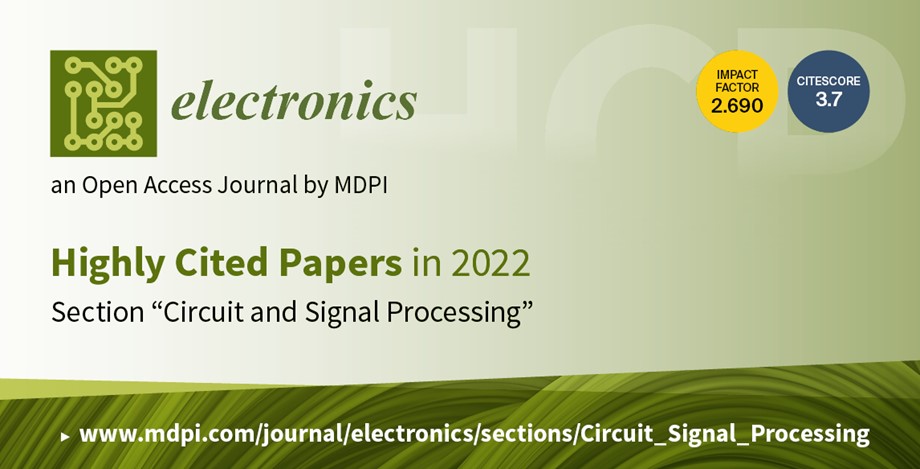
The aim of the “Circuit and Signal Processing” Section is to host significant and original contributions and state-of-the-art review articles in this field of research. The scope of this Section is broad, ranging from mathematical foundations to practical engineering applications, measurement techniques, compliance verification, and reliability studies.
As they are published in an Open Access format, you have free and unlimited access to the full text of all of the articles in our journal. We welcome you to read our most highly cited papers published in 2022:
1. “A New Memristive Neuron Map Model and Its Network’s Dynamics under Electrochemical Coupling”by Balamurali Ramakrishnan, Mahtab Mehrabbeik, Fatemeh Parastesh, Karthikeyan Rajagopal and Sajad Jafari
Electronics 2022, 11(1), 153; https://doi.org/10.3390/electronics11010153
Available online: https://www.mdpi.com/2079-9292/11/1/153
2. “Ultra-Wideband Graphene-Based Micro-Sized Circular Patch-Shaped Yagi-like MIMO Antenna for Terahertz Wireless Communication”
by Mohammad Arif Sobhan Bhuiyan and Vishal Sorathiya
Electronics 2022, 11(9), 1305; https://doi.org/10.3390/electronics11091305
Available online: https://www.mdpi.com/2079-9292/11/9/1305
3. “CMOS Low-Dropout Voltage Regulator Design Trends: An Overview”
by Mohammad Arif Sobhan Bhuiyan, Md. Rownak Hossain, Khairun Nisa’ Minhad, Fahmida Haque, Mohammad Shahriar Khan Hemel, Omar Md Dawi, Mamun Bin Ibne Reaz and Kelvin J. A. Ooi
Electronics 2022, 11(2), 193; https://doi.org/10.3390/electronics11020193
Available online: https://www.mdpi.com/2079-9292/11/2/193
4. “New Resistor-Less Electronically Controllable ±C Simulator Employing VCII, DVCC, and a Grounded Capacitor”
by Giuseppe Ferri, Leila Safari, Gianluca Barile, Massimo Scarsella and Vincenzo Stornelli
Electronics 2022, 11(2), 286; https://doi.org/10.3390/electronics11020286
Available online: https://www.mdpi.com/2079-9292/11/2/286
5. “A New Realization of Electronically Tunable Multiple-Input Single-Voltage Output Second-Order LP/BP Filter Using VCII”
by Leila Safari, Gianluca Barile, Giuseppe Ferri, Mattia Ragnoli and Vincenzo Stornelli
Electronics 2022, 11(4), 646; https://doi.org/10.3390/electronics11040646
Available online: https://www.mdpi.com/2079-9292/11/4/646
6. “Volatile Memristor in Leaky Integrate-and-Fire Neurons: Circuit Simulation and Experimental Study”
by Natasa M. Samardzic, Jovan S. Bajic, Dalibor L. Sekulic and Stanisa Dautovic
Electronics 2022, 11(6), 894; https://doi.org/10.3390/electronics11060894
Available online: https://www.mdpi.com/2079-9292/11/6/894
7. “Harvesting Systems for RF Energy: Trends, Challenges, Techniques, and Tradeoffs”
by Surajo Muhammad, Jun Jiat Tiang, Sew Kin Wong, Ali H. Rambe, Ismahayati Adam, Amor Smida, Mohamed Ibrahim Waly, Amjad Iqbal, Adamu Saidu Abubakar and Mohd Najib Mohd Yasin
Electronics 2022, 11(6), 959; https://doi.org/10.3390/electronics11060959
Available online: https://www.mdpi.com/2079-9292/11/6/959
8. “A Different Approach for Maximum Power Point Tracking (MPPT) Using Impedance Matching through Non-Isolated DC-DC Converters in Solar Photovoltaic Systems”
by Deepak Verma, Savita Nema, Rakeshwri Agrawal, Yashwant Sawle and Alok Kumar
Electronics 2022, 11(7), 1053; https://doi.org/10.3390/electronics11071053
Available online: https://www.mdpi.com/2079-9292/11/7/1053
9. “Signals Recognition by CNN Based on Attention Mechanism”
by Feng Tian, Li Wang and Meng Xia
Electronics 2022, 11(13), 2100; https://doi.org/10.3390/electronics11132100
Available online: https://www.mdpi.com/2079-9292/11/13/2100
10. “Holistic Research on Blockchain’s Consensus Protocol Mechanisms with Security and Concurrency Analysis Aspects of CPS”
by Aniruddha Bhattacharjya, Remigiusz Wisniewski and Venkatram Nidumolu
Electronics 2022, 11(17), 2760; https://doi.org/10.3390/electronics11172760
Available online: https://www.mdpi.com/2079-9292/11/17/2760
11. “Electronically Adjustable Grounded Memcapacitor Emulator Based on Single Active Component with Variable Switching Mechanism”
by Predrag B. Petrović
Electronics 2022, 11(1), 161; https://doi.org/10.3390/electronics11010161
Available online: https://www.mdpi.com/2079-9292/11/1/161
12. “Realization of an Electronically Tunable Resistor-Less Floating Inductance Simulator Using VCII”
by Leila Safari, Gianluca Barile, Davide Colaiuda, Vincenzo Stornelli and Giuseppe Ferri
Electronics 2022, 11(3), 312; https://doi.org/10.3390/electronics11030312
Available online: https://www.mdpi.com/2079-9292/11/3/312
13. “Learnable Wavelet Scattering Networks: Applications to Fault Diagnosis of Analog Circuits and Rotating Machinery”
by Varun Khemani, Michael H. Azarian and Michael G. Pecht
Electronics 2022, 11(3), 451; https://doi.org/10.3390/electronics11030451
Available online: https://www.mdpi.com/2079-9292/11/3/451
14. “Energy-Efficient Respiratory Anomaly Detection in Premature Newborn Infants”
by Ankita Paul, Md. Abu Saleh Tajin, Anup Das, William M. Mongan and Kapil R. Dandekar
Electronics 2022, 11(5), 682; https://doi.org/10.3390/electronics11050682
Available online: https://www.mdpi.com/2079-9292/11/5/682
15. “Fast Design Space Exploration and Multi-Objective Optimization of Wide-Band Noise-Canceling LNAs”
by Karim Elmeligy and Hesham Omran
Electronics 2022, 11(5), 816; https://doi.org/10.3390/electronics11050816
Available online: https://www.mdpi.com/2079-9292/11/5/816
16. “Inverse Analog Filters: History, Progress, and Unresolved Issues”
by Raj Senani, Data Ram Bhaskar and Ajishek Raj
Electronics 2022, 11(6), 841; https://doi.org/10.3390/electronics11060841
Available online: https://www.mdpi.com/2079-9292/11/6/841
17. “The Design Considerations and Challenges in MOS-Based Temperature Sensors: A Review”
by Shuang Xie
Electronics 2022, 11(7), 1019; https://doi.org/10.3390/electronics11071019
Available online: https://www.mdpi.com/2079-9292/11/7/1019
18. “An Overview of Direction-of-Arrival Estimation Methods Using Adaptive Directional Time-Frequency Distributions”
by Pranav Kumar Eranti and Buket D. Barkana
Electronics 2022, 11(9), 1321; https://doi.org/10.3390/electronics11091321
Available online: https://www.mdpi.com/2079-9292/11/9/1321
19. “The Enhanced Energy Density of rGO/TiO2 Based Nanocomposite as Electrode Material for Supercapacitor”
by Palani Anandhi, Santhanam Harikrishnan, Veerabadran Jawahar Senthil Kumar, Wen-Cheng Lai and Alaa El Din Mahmoud
Electronics 2022, 11(11), 1792; https://doi.org/10.3390/electronics11111792
Available online: https://www.mdpi.com/2079-9292/11/11/1792
20. “GAINESIS: Generative Artificial Intelligence NEtlists SynthesIS”
by Konstantinos G. Liakos, Georgios K. Georgakilas, Fotis C. Plessas and Paris Kitsos
Electronics 2022, 11(2), 245; https://doi.org/10.3390/electronics11020245
Available online: https://www.mdpi.com/2079-9292/11/2/245
2 March 2023
Electronics | Highly Cited Papers in 2022 in the Section “Computer Science & Engineering”
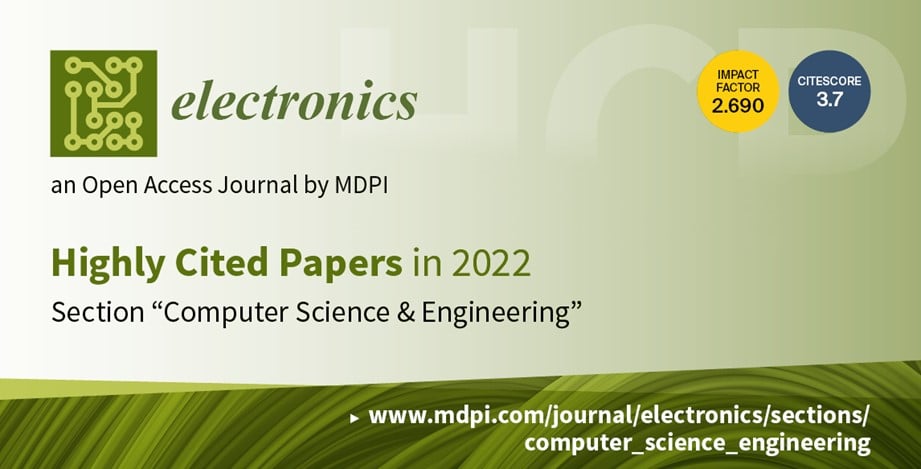
For publication in the “Computer Science & Engineering” Section, we would like to invite submissions on advanced theories and technologies across a wide spectrum of research. These can be related to computer science and engineering, including deep tech, edge computing, fog computing, artificial intelligence, machine learning, deep learning, emotional systems, Fintech, blockchain, IoT, Industry 4.0, smart cities, smart grids, intelligent textiles, distributed computing, as well as other chief technologies in this field. We hope to present state-of-the-art technologies in this Section.
As they are published in an Open Access format, you have free and unlimited access to the full text of all the articles published in our journal. We encourage you to read our most highly cited papers published in 2022 listed below.
1. “A Systematic Review of the Applications of Multi-Criteria Decision Aid Methods (1977–2022)”
by Marcio Pereira Basílio, Valdecy Pereira, Helder Gomes Costa, Marcos Santos and Amartya Ghosh
Electronics 2022, 11(11), 1720; https://doi.org/10.3390/electronics11111720
Available online: https://www.mdpi.com/2079-9292/11/11/1720
2. “A Hybrid Deep Learning-Based Approach for Brain Tumor Classification”
by Asaf Raza, Huma Ayub, Javed Ali Khan, Ijaz Ahmad, Ahmed S. Salama, Yousef Ibrahim Daradkeh, Danish Javeed, Ateeq Ur Rehman and Habib Hamam
Electronics 2022, 11(7), 1146; https://doi.org/10.3390/electronics11071146
Available online: https://www.mdpi.com/2079-9292/11/7/1146
3. “VoRtex Metaverse Platform for Gamified Collaborative Learning”
by Aleksandar Jovanović and Aleksandar Milosavljević
Electronics 2022, 11(3), 317; https://doi.org/10.3390/electronics11030317
Available online: https://www.mdpi.com/2079-9292/11/3/317
4. “Blockchain for IoT Applications: Taxonomy, Platforms, Recent Advances, Challenges and Future Research Directions”
by Abdelzahir Abdelmaboud, Abdelmuttlib Ibrahim Abdalla Ahmed, Mohammed Abaker, Taiseer Abdalla Elfadil Eisa, Hashim Albasheer, Sara Abdelwahab Ghorashi and Faten Khalid Karim
Electronics 2022, 11(4), 630; https://doi.org/10.3390/electronics11040630
Available online: https://www.mdpi.com/2079-9292/11/4/630
5. “A Deep Learning Model for Network Intrusion Detection with Imbalanced Data”
by Yanfang Fu, Yishuai Du, Zijian Cao, Qiang Li and Wei Xiang
Electronics 2022, 11(6), 898; https://doi.org/10.3390/electronics11060898
Available online: https://www.mdpi.com/2079-9292/11/6/898
6. “Detecting Cybersecurity Attacks in Internet of Things Using Artificial Intelligence Methods: A Systematic Literature Review”
by Mujaheed Abdullahi, Yahia Baashar, Hitham Alhussian, Ayed Alwadain, Norshakirah Aziz, Luiz Fernando Capretz and Said Jadid Abdulkadir
Electronics 2022, 11(2), 198; https://doi.org/10.3390/electronics11020198
Available online: https://www.mdpi.com/2079-9292/11/2/198
7. “Machine-Learning-Based Darknet Traffic Detection System for IoT Applications”
by Qasem Abu Al-Haija, Moez Krichen and Wejdan Abu Elhaija
Electronics 2022, 11(4), 556; https://doi.org/10.3390/electronics11040556
Available online: https://www.mdpi.com/2079-9292/11/4/556
8. “Forensic Analysis on Internet of Things (IoT) Device Using Machine-to-Machine (M2M) Framework”
by Muhammad Shoaib Mazhar, Yasir Saleem, Ahmad Almogre, Jehangir Arshad, Mujtaba Hussain Jaffery, Ateeq Ur Rehman, Muhammad Shafiq and Habib Hamam
Electronics 2022, 11(7), 1126; https://doi.org/10.3390/electronics11071126
Available online: https://www.mdpi.com/2079-9292/11/7/1126
9. “A Lightweight and Practical Anonymous Authentication Protocol Based on Bit-Self-Test PUF”
by Yang An, Yuejiao Zhang, Wenjun Cao, Zhiyan Tong and Zhangqing He
Electronics 2022, 11(5), 772; https://doi.org/10.3390/electronics11050772
Available online: https://www.mdpi.com/2079-9292/11/5/772
10. “A Survey on Efficient Convolutional Neural Networks and Hardware Acceleration”
by Deepak Ghimire, Dayoung Kil and Seong-heum Kim
Electronics 2022, 11(6), 945; https://doi.org/10.3390/electronics11060945
Available online: https://www.mdpi.com/2079-9292/11/6/945
11. “Classification and Analysis of Pistachio Species with Pre-Trained Deep Learning Models”
by Dilbag Singh, Yavuz Selim Taspinar, Ramazan Kursun, Ilkay Cinar, Murat Koklu, Ilker Ali Ozkan and Heung-No Lee
Electronics 2022, 11(7), 981; https://doi.org/10.3390/electronics11070981
Available online: https://www.mdpi.com/2079-9292/11/7/981
12. “Automatic Face Mask Detection System in Public Transportation in Smart Cities Using IoT and Deep Learning”
by Tamilarasan Ananth Kumar, Rajendrane Rajmohan, Muthu Pavithra, Sunday Adeola Ajagbe, Rania Hodhod and Tarek Gaber
Electronics 2022, 11(6), 904; https://doi.org/10.3390/electronics11060904
Available online: https://www.mdpi.com/2079-9292/11/6/904
13. “The Role of Quality Measurements in Enhancing the Usability of Mobile Learning Applications during COVID-19”
by Mohammed Amin Almaiah, Fahima Hajjej, Rima Shishakly, Abdalwali Lutfi, Ali Amin and Ali Bani Awad
Electronics 2022, 11(13), 1951; https://doi.org/10.3390/electronics11131951
Available online: https://www.mdpi.com/2079-9292/11/13/1951
14. Determinants Influencing the Continuous Intention to Use Digital Technologies in Higher Education
by Mohammed Amin Almaiah, Raghad Alfaisal, Said A. Salloum, Shaha Al-Otaibi, Omar Said Al Sawafi, Rana Saeed Al-Maroof, Abdalwali Lutfi, Mahmaod Alrawad, Ahmed Al Mulhem and Ali Bani Awad
Electronics 2022, 11(18), 2827; https://doi.org/10.3390/electronics11182827
Available online: https://www.mdpi.com/2079-9292/11/18/2827
15. “Optimized Deep Learning Algorithms for Tomato Leaf Disease Detection with Hardware Deployment”
by Hesham Tarek, Hesham Aly, Saleh Eisa and Mohamed Abul-Soud
Electronics 2022, 11(1), 140; https://doi.org/10.3390/electronics11010140
Available online: https://www.mdpi.com/2079-9292/11/1/140
16. “A Machine Learning Method for Detection of Surface Defects on Ceramic Tiles Using Convolutional Neural Networks”
by Okeke Stephen, Uchenna Joseph Maduh and Mangal Sain
Electronics 2022, 11(1), 55; https://doi.org/10.3390/electronics11010055
Available online: https://www.mdpi.com/2079-9292/11/1/55
17. “Recent Advances in Pulse-Coupled Neural Networks with Applications in Image Processing”
by Haoran Liu, Mingzhe Liu, Dongfen Li, Wenfeng Zheng, Lirong Yin and Ruili Wang
Electronics 2022, 11(20), 3264; https://doi.org/10.3390/electronics11203264
Available online: https://www.mdpi.com/2079-9292/11/20/3264
18. “Factors Influencing Students’ Continuous Intentions for Using Micro-Lectures in the Post-COVID-19 Period: A Modification of the UTAUT-2 Approach”
by Tommy Tanu Wijaya and Robert Weinhandl
Electronics 2022, 11(13), 1924; https://doi.org/10.3390/electronics11131924
Available online: https://www.mdpi.com/2079-9292/11/13/1924
19. “IoMT-Based Platform for E-Health Monitoring Based on the Blockchain”
by Jalel Ktari, Tarek Frikha, Nader Ben Amor, Leila Louraidh, Hela Elmannai and Monia Hamdi
Electronics 2022, 11(15), 2314; https://doi.org/10.3390/electronics11152314
Available online: https://www.mdpi.com/2079-9292/11/15/2314
20. “BAIV: An Efficient Blockchain-Based Anonymous Authentication and Integrity Preservation Scheme for Secure Communication in VANETs”
by Azees Maria, Arun Sekar Rajasekaran, Fadi Al-Turjman, Chadi Altrjman and Leonardo Mostarda
Electronics 2022, 11(3), 488; https://doi.org/10.3390/electronics11030488
Available online: https://www.mdpi.com/2079-9292/11/3/488
27 February 2023
Recruiting Editorial Board Members for Section “Semiconductor Devices” in Electronics
The “Semiconductor Devices” Section in Electronics (ISSN: 2079-9292) publishes original and significant contributions to the theory and performance of semiconductor devices and related materials, including devices, fabrication processes, simulation, quantum devices, hybrid devices, flexible electronic devices, novel semiconductors, semiconductor material, and device physics. Reviews on these subjects are published, and Special Issues dealing with specific topics are also published.
Topics of interest include but are not limited to the following:
- Semiconductor device applications;
- Fabrication processing;
- Simulation (theory);
- Quantum devices;
- Hybrid electronic and semiconductor devices;
- Semiconductor devices for energy;
- Flexible devices;
- Semiconductor material and device physics;
- Novel semiconductor;
- 2D materials for devices;
- New technology for semiconductor devices;
- Semiconductor optoelectronic and photonic devices and processing.
If you are an active researcher in the field and are passionate about participating in cutting-edge research publications, please do not hesitate to contact us about joining the board and contributing to this Section.
For more information, please visit: https://www.mdpi.com/journal/electronics/sections/Semiconductors.
If you have any questions, please contact Section Managing Editor Ms. Hebbe Tian ([email protected]).
17 February 2023
Electronics | Highly Cited Papers in 2021 in the Section “Circuit and Signal Processing”
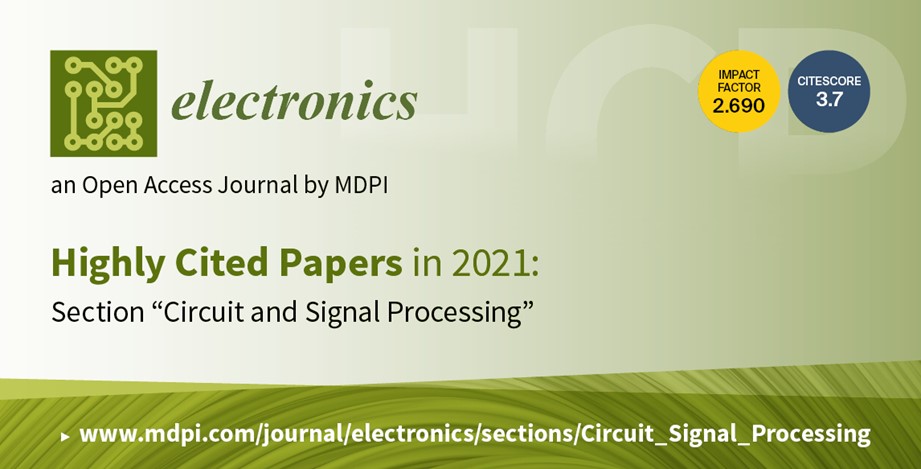
The aim of the “Circuit and Signal Processing” Section is to host significant and original contributions and state-of-the-art review articles in this field of research. The scope of this Section is broad, ranging from mathematical foundations to practical engineering applications, measurement techniques, compliance verification, and reliability studies.
As they are published in an open access format, you have free and unlimited access to the full text of all of the articles in our journal. We welcome you to read our most highly cited papers published in 2021:
1. “A New RBF Neural Network-Based Fault-Tolerant Active Control for Fractional Time-Delayed Systems”
by Bo Wang et al.
Electronics 2021, 10(12), 1501; https://doi.org/10.3390/electronics10121501
Available online: https://www.mdpi.com/2079-9292/10/12/1501
2. “Efficient Chaos-Based Substitution-Box and Its Application to Image Encryption”
by Ahmed A. Abd El-Latif et al.
Electronics 2021, 10(12), 1392; https://doi.org/10.3390/electronics10121392
Available online: https://www.mdpi.com/2079-9292/10/12/1392
3. “Dynamic Analysis of the Switched-Inductor Buck-Boost Converter Based on the Memristor”
by Yan Yang et al.
Electronics 2021, 10(4), 452; https://doi.org/10.3390/electronics10040452
Available online: https://www.mdpi.com/2079-9292/10/4/452
4. “Self-Biased and Supply-Voltage Scalable Inverter-Based Operational Transconductance Amplifier with Improved Composite Transistors”
by Luis Henrique Rodovalho et al.
Electronics 2021, 10(8), 935; https://doi.org/10.3390/electronics10080935
Available online: https://www.mdpi.com/2079-9292/10/8/935
5. “The Contribution of Machine Learning and Eye-Tracking Technology in Autism Spectrum Disorder Research: A Systematic Review”
by Konstantinos-Filippos Kollias et al.
Electronics 2021, 10(23), 2982; https://doi.org/10.3390/electronics10232982
Available online: https://www.mdpi.com/2079-9292/10/23/2982
6. “Structural Decomposition in FSM Design: Roots, Evolution, Current State—A Review”
by Alexander Barkalov et al.
Electronics 2021, 10(10), 1174; https://doi.org/10.3390/electronics10101174
Available online: https://www.mdpi.com/2079-9292/10/10/1174
7. “Inductance Simulators and Their Application to the 4th Order Elliptic Lowpass Ladder Filter Using CMOS VD-DIBAs”
by Winai Jaikla et al.
Electronics 2021, 10(6), 684; https://doi.org/10.3390/electronics10060684
Available online: https://www.mdpi.com/2079-9292/10/6/684
8. “A Neural Network Classifier with Multi-Valued Neurons for Analog Circuit Fault Diagnosis”
by Igor Aizenberg et al.
Electronics 2021, 10(3), 349; https://doi.org/10.3390/electronics10030349
Available online: https://www.mdpi.com/2079-9292/10/3/349
9. “A Comparison of Deep Learning Methods for Timbre Analysis in Polyphonic Automatic Music Transcription”
by Carlos Hernandez-Olivan et al.
Electronics 2022, 10(7), 810; https://doi.org/10.3390/electronics10070810
Available online: https://www.mdpi.com/2079-9292/10/7/810
10. “Noise Efficient Integrated Amplifier Designs for Biomedical Applications”
by Sebastian Simmich et al.
Electronics 2021, 10(13), 1522; https://doi.org/10.3390/electronics10131522
Available online: https://www.mdpi.com/2079-9292/10/13/1522
11. “Ultralow Voltage FinFET- Versus TFET-Based STT-MRAM Cells for IoT Applications”
by Esteban Garzón et al.
Electronics 2021, 10(15), 1756; https://doi.org/10.3390/electronics10151756
Available online: https://www.mdpi.com/2079-9292/10/15/1756
12. “Acoustic Anomaly Detection of Mechanical Failures in Noisy Real-Life Factory Environments”
by Yuki Tagawa et al.
Electronics 2021, 10(19), 2329; https://doi.org/10.3390/electronics10192329
Available online: https://www.mdpi.com/2079-9292/10/19/2329
13. “Skyrmion Logic-In-Memory Architecture for Maximum/Minimum Search”
by Luca Gnoli et al.
Electronics 2021, 10(2), 155; https://doi.org/10.3390/electronics10020155
Available online: https://www.mdpi.com/2079-9292/10/2/155
14. “Reconfigurable Binary Neural Network Accelerator with Adaptive Parallelism Scheme”
by Jaechan Cho et al.
Electronics 2022, 10(3), 230; https://doi.org/10.3390/electronics10030230
Available online: https://www.mdpi.com/2079-9292/10/3/230
15. “Speech Processing for Language Learning: A Practical Approach to Computer-Assisted Pronunciation Teaching”
by Natalia Bogach et al.
Electronics 2021, 10(3), 235; https://doi.org/10.3390/electronics10030235
Available online: https://www.mdpi.com/2079-9292/10/3/235
16. “The Impact of State-of-the-Art Techniques for Lossless Still Image Compression”
by Md. Atiqur Rahman et al.
Electronics 2021, 10(3), 360; https://doi.org/10.3390/electronics10030360
Available online: https://www.mdpi.com/2079-9292/10/3/360
17. “Low-Complexity High-Throughput QC-LDPC Decoder for 5G New Radio Wireless Communication”
by Tram Thi Bao Nguyen et al.
Electronics 2021, 10(4), 516; https://doi.org/10.3390/electronics10040516
Available online: https://www.mdpi.com/2079-9292/10/4/516
18. “The Frequency and Real-Time Properties of the Microcontroller Implementation of Fractional-Order PID Controller”
by Krzysztof Oprzędkiewicz et al.
Electronics 2021, 10(5), 524; https://doi.org/10.3390/electronics10050524
Available online: https://www.mdpi.com/2079-9292/10/5/524
19. “An Interpretable Deep Learning Model for Automatic Sound Classification”
by Pablo Zinemanas et al.
Electronics 2021, 10(7), 850; https://doi.org/10.3390/electronics10070850
Available online: https://www.mdpi.com/2079-9292/10/7/850
by Vladimir L. Petrović et al.
Electronics 2021, 10(9), 1106; https://doi.org/10.3390/electronics10091106
Available online: https://www.mdpi.com/2079-9292/10/9/1106
17 February 2023
Electronics | Highly Cited Papers in 2021 in the Section “Computer Science & Engineering”
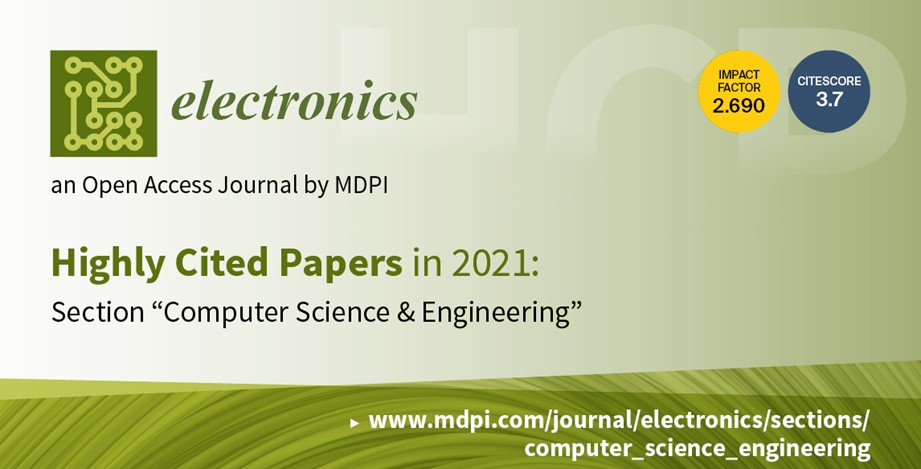
The primary focus of the “Computer Science & Engineering” Section is the field of advanced computer science and engineering. It presents high-quality papers that address state-of-the-art technology, including deep tech, edge computing, fog computing, artificial intelligence, machine learning, deep learning, emotional systems, fintech, blockchain, the IoT, Industry 4.0, smart cities, smart grids, intelligent textiles, and distributed computing, as well as other chief technologies in this field.
As they are published in an open access format, you have free and unlimited access to the full text of all the articles published in our journal. We welcome you to read our most highly cited papers published in 2021:
1. “A Comparative Analysis of Object Detection Metrics with a Companion Open-Source Toolkit”
by Rafael Padilla et al.
Electronics 2021, 10(3), 279; https://doi.org/10.3390/electronics10030279
Available online: https://www.mdpi.com/2079-9292/10/3/279
2. “Identification of Plant-Leaf Diseases Using CNN and Transfer-Learning Approach”
by Sk Mahmudul Hassan et al.
Electronics 2021, 10(12), 1388; https://doi.org/10.3390/electronics10121388
Available online: https://www.mdpi.com/2079-9292/10/12/1388
3. “Evaluating the Quality of Machine Learning Explanations: A Survey on Methods and Metrics”
by Jianlong Zhou et al.
Electronics 2021, 10(5), 593; https://doi.org/10.3390/electronics10050593
Available online: https://www.mdpi.com/2079-9292/10/5/593
4. “Drone Deep Reinforcement Learning: A Review”
by Ahmad Taher Azar et al.
Electronics 2021, 10(9), 999; https://doi.org/10.3390/electronics10090999
Available online: https://www.mdpi.com/2079-9292/10/9/999
5. “A Review of Data-Driven Decision-Making Methods for Industry 4.0 Maintenance Applications”
by Alexandros Bousdekis et al.
Electronics 2021, 10(7), 828; https://doi.org/10.3390/electronics10070828
Available online: https://www.mdpi.com/2079-9292/10/7/828
6. “A Real-Time Detection Algorithm for Kiwifruit Defects Based on YOLOv5”
by Jia Yao et al.
Electronics 2021, 10(14), 1711; https://doi.org/10.3390/electronics10141711
Available online: https://www.mdpi.com/2079-9292/10/14/1711
7. “Hyperledger Healthchain: Patient-Centric IPFS-Based Storage of Health Records”
by Vinodhini Mani et al.
Electronics 2021, 10(23), 3003; https://doi.org/10.3390/electronics10233003
Available online: https://www.mdpi.com/2079-9292/10/23/3003
8. “Image-Based Malware Classification Using VGG19 Network and Spatial Convolutional Attention”
by Mazhar Javed Awan et al.
Electronics 2021, 10(19), 2444; https://doi.org/10.3390/electronics10192444
Available online: https://www.mdpi.com/2079-9292/10/19/2444
9. “A Consolidated Review of Path Planning and Optimization Techniques: Technical Perspectives and Future Directions”
by Faiza Gul et al.
Electronics 2021, 10(18), 2250; https://doi.org/10.3390/electronics10182250
Available online: https://www.mdpi.com/2079-9292/10/18/2250
10. “Advances in Meta-Heuristic Optimization Algorithms in Big Data Text Clustering”
by Laith Abualigah et al.
Electronics 2021, 10(2), 101; https://doi.org/10.3390/electronics10020101
Available online: https://www.mdpi.com/2079-9292/10/2/101
11. “Facial Emotion Recognition Using Transfer Learning in the Deep CNN”
by M. A. H. Akhand et al.
Electronics 2021, 10(9), 1036; https://doi.org/10.3390/electronics10091036
Available online: https://www.mdpi.com/2079-9292/10/9/1036
12. “Botnet Attack Detection Using Local Global Best Bat Algorithm for Industrial Internet of Things”
by Abdullah Alharbi et al.
Electronics 2021, 10(11), 1341; https://doi.org/10.3390/electronics10111341
Available online: https://www.mdpi.com/2079-9292/10/11/1341
13. “SDN-Enabled Hybrid DL-Driven Framework for the Detection of Emerging Cyber Threats in IoT”
by Danish Javeed et al.
Electronics 2021, 10(8), 918; https://doi.org/10.3390/electronics10080918
Available online: https://www.mdpi.com/2079-9292/10/8/918
14. “A Machine Learning Approach for Anomaly Detection in Industrial Control Systems Based on Measurement Data”
by Sohrab Mokhtari et al.
Electronics 2021, 10(4), 407; https://doi.org/10.3390/electronics10040407
Available online: https://www.mdpi.com/2079-9292/10/4/407
15. “Real-Time Face Mask Detection Method Based on YOLOv3”
by Xinbei Jiang et al.
Electronics 2021, 10(7), 837; https://doi.org/10.3390/electronics10070837
Available online: https://www.mdpi.com/2079-9292/10/7/837
16. “Smart Home Battery for the Multi-Objective Power Scheduling Problem in a Smart Home Using Grey Wolf Optimizer”
by Sharif Naser Makhadmeh et al.
Electronics 2021, 10(4), 447; https://doi.org/10.3390/electronics10040447
Available online: https://www.mdpi.com/2079-9292/10/4/447
17. “A Review on Speech Emotion Recognition Using Deep Learning and Attention Mechanism”
by Eva Lieskovská et al.
Electronics 2021, 10(10), 1163; https://doi.org/10.3390/electronics10101163
Available online: https://www.mdpi.com/2079-9292/10/10/1163
18. “Towards Secure Fog Computing: A Survey on Trust Management, Privacy, Authentication, Threats and Access Control”
by Abdullah Al-Noman Patwary et al.
Electronics 2021, 10(10), 1171; https://doi.org/10.3390/electronics10101171
Available online: https://www.mdpi.com/2079-9292/10/10/1171
19. “A Novel Approach for Network Intrusion Detection Using Multistage Deep Learning Image Recognition”
by Jevgenijus Toldinas et al.
Electronics 2021, 10(15), 1854; https://doi.org/10.3390/electronics10151854
Available online: https://www.mdpi.com/2079-9292/10/15/1854
20. “A Review of Plant Phenotypic Image Recognition Technology Based on Deep Learning”
by Jianbin Xiong et al.
Electronics 2021, 10(1), 81; https://doi.org/10.3390/electronics10010081
Available online: https://www.mdpi.com/2079-9292/10/1/81
16 February 2023
Increasing Visibility for Preprints.org – Clarivate adds the Preprint Citation Index to the Web of Science
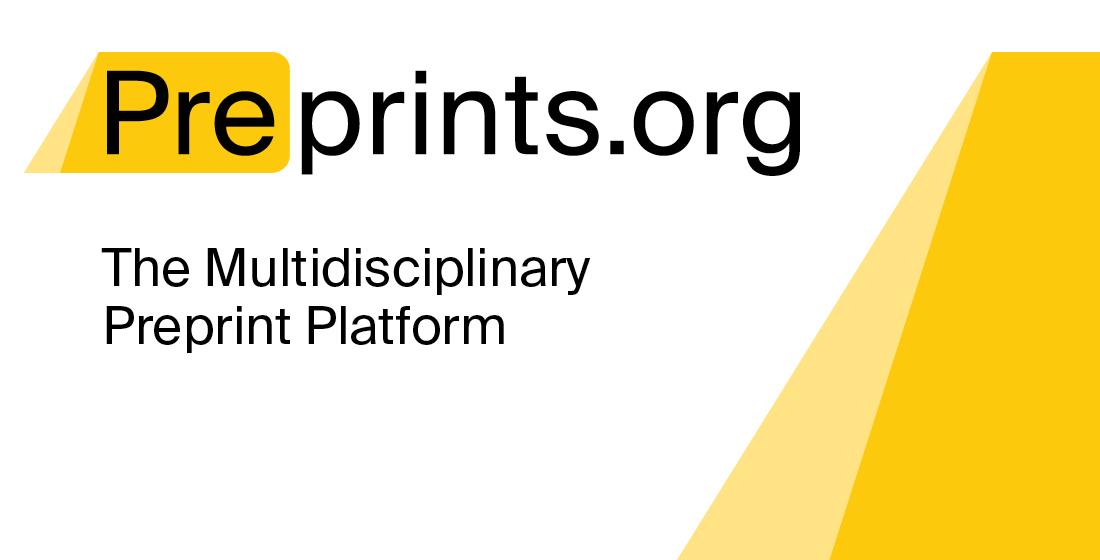
On 9 February 2023, Clarivate, a global leader in providing trusted insights and analytics, added the Preprint Citation Index to the Web of Science platform, streamlining the research process by allowing researchers to locate and link to preprints alongside other trusted content in the database.
The Preprint Citation Index will act as a bridge to connect cutting-edge preprints with peer-reviewed journal articles published within the Web of Science Core Collection. Alerts can be easily set to monitor new research across several repositories and authors will also be able to include preprints on their Web of Science Research Profile to more accurately display their various research outputs.
As of its launch, the Preprint Citation Index will provide nearly two million preprints from various repositories, including MDPI’s own Preprints.org.
MDPI's Preprints Platform – Preprints.org
To advance Open Science and the fast dissemination of research, MDPI offers researchers a free multidisciplinary preprint platform. Preprints.org accepts submissions from all research areas and offers authors high visibility, permanent archiving, article-level Metrics and immediately citable content by assigning a Digital Object Identifier (DOI) to all preprints.
During submission to any MDPI journal, authors have the option to share their research as a preprint. After an initial screening, the manuscript is available online in 48 hours or less. Once online, preprints can be downloaded, shared, commented on, and cited, providing authors maximum visibility.
We invite you to join the ranks of the over 100k researchers using Preprints.org and share your research.
For more information, please visit Preprints.org.
9 February 2023
Meet Us at the 7th Asian Conference on Artificial Intelligence Technology (ACAIT 2023), 3–5 November 2023, Jiaxing, China

Conference title: The 7th Asian Conference on Artificial Intelligence Technology (ACAIT 2023)
Date: 3–5 November 2023
Location: Jiaxing, China
Website: https://www.acaitconf.com/
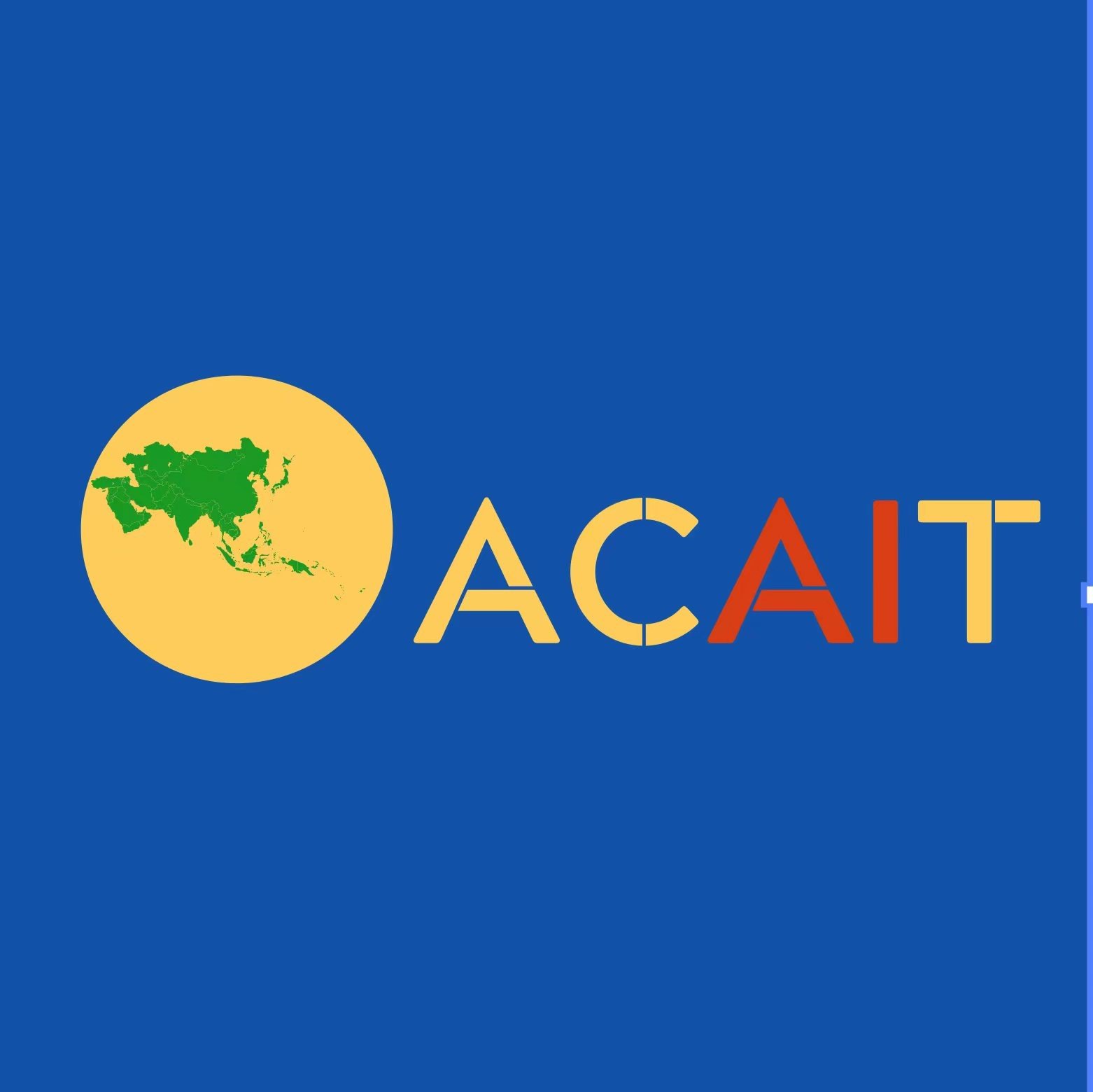
We are honored to host the 7th Asian Conference on Artificial Intelligence Technology in Jiaxing, China (ACAIT 2023). The city lies in the northeast of Zhejiang Province, where national high-end manufacturing industries including new energy vehicles and auto core parts, smart grid and new material industries have developed.
Under the theme of “Intelligence Creation, Welcome Future”, we are preparing plenary & keynote presentations and special sessions for scientists and engineers to present their latest research findings in this rapidly-changing field. We would like you to enjoy not only the research side of the conference, but also the hospitality of Jiaxing and its citizens. We are looking forward to seeing you at ACAIT 2023.
Scope:
The program committee of ACAIT 2023 invites the submission of papers for the technical program of the conference. High-quality original submissions are welcome from research results and applications of all areas of AI including but not limited to the following areas:
- Image Analysis;
- Video Analysis;
- Medical Image Processing;
- Intelligent Vehicles;
- Machine Learning;
- Data Mining;
- Knowledge Representation and Reasoning;
- Multimodality Information Fusion;
- Natural Language Processing;
- Swarm Intelligence;
- Intelligent Robot and Systems;
- Intelligent Control;
- Smart Medical Systems;
- Autonomous Systems;
- Other AI-enabled Applications.
Contact:
Tel: 023-62561406
Email: [email protected]
9 February 2023
Meet Us at the Fourth International Conference on Energy Storage Materials, 13–16 April 2023, Shenzhen, China
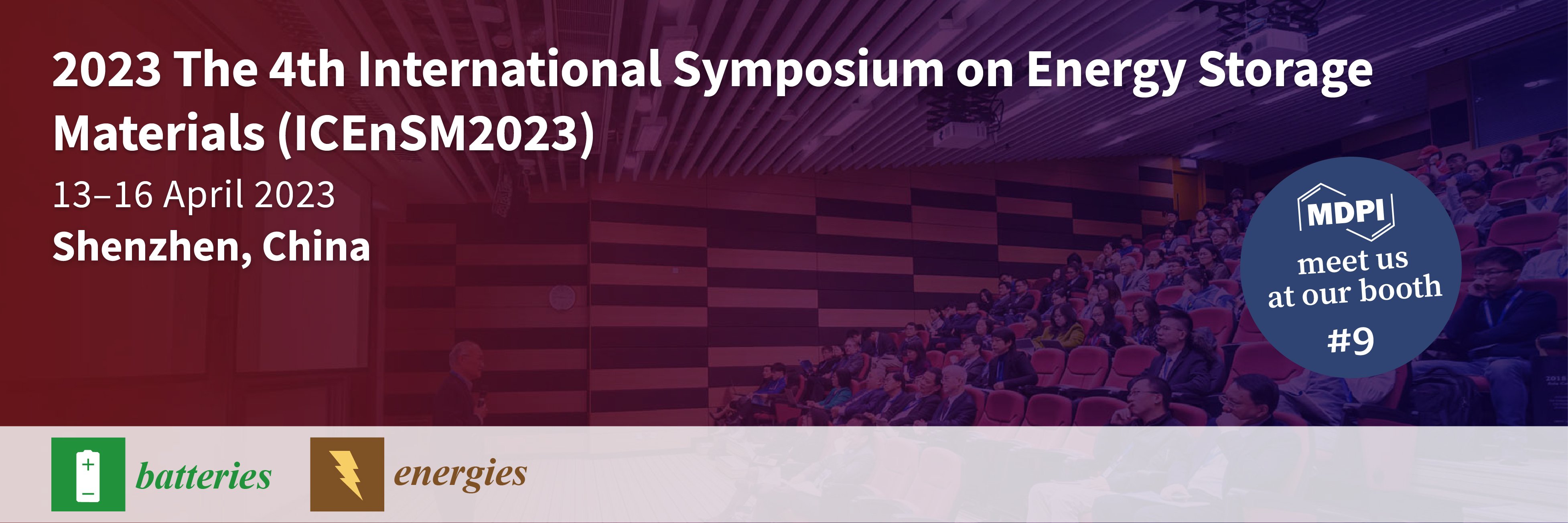
Conference: The Fourth International Conference on Energy Storage Materials
Date: 13–16 April 2023
MDPI will be attending the Fourth International Conference on Energy Storage Materials as the exhibitor. With the theme of advanced energy storage materials and energy storage devices, this seminar invites well-known scholars and industry professionals from around the world to discuss the latest research progress and industrial development status and trends in advanced energy storage materials and devices from academic and industrial perspectives in order to promote the application process of energy storage materials and energy storage devices. The conference is held annually.
The following MDPI journals will be represented:
- Batteries;
- Energies;
- Sustainability;
- Materials;
- Electronics;
- Nanomaterials;
- Inorganics;
- Crystals;
- AppliedChem;
- Membranes;
- Electrochem;
- Applied Sciences;
- Metals;
- Molecules.
If you are attending this conference, please feel free to start a conversation with us at our booth: #9. Our delegates look forward to meeting you in person and answering any questions that you may have. For more information about the conference, please visit http://www.icensm.ac.cn/eindex.html.
31 January 2023
Meet Us at the IEEE International Conference on Robotics and Automation (ICRA 2023), 29 May–2 June 2023, London, UK
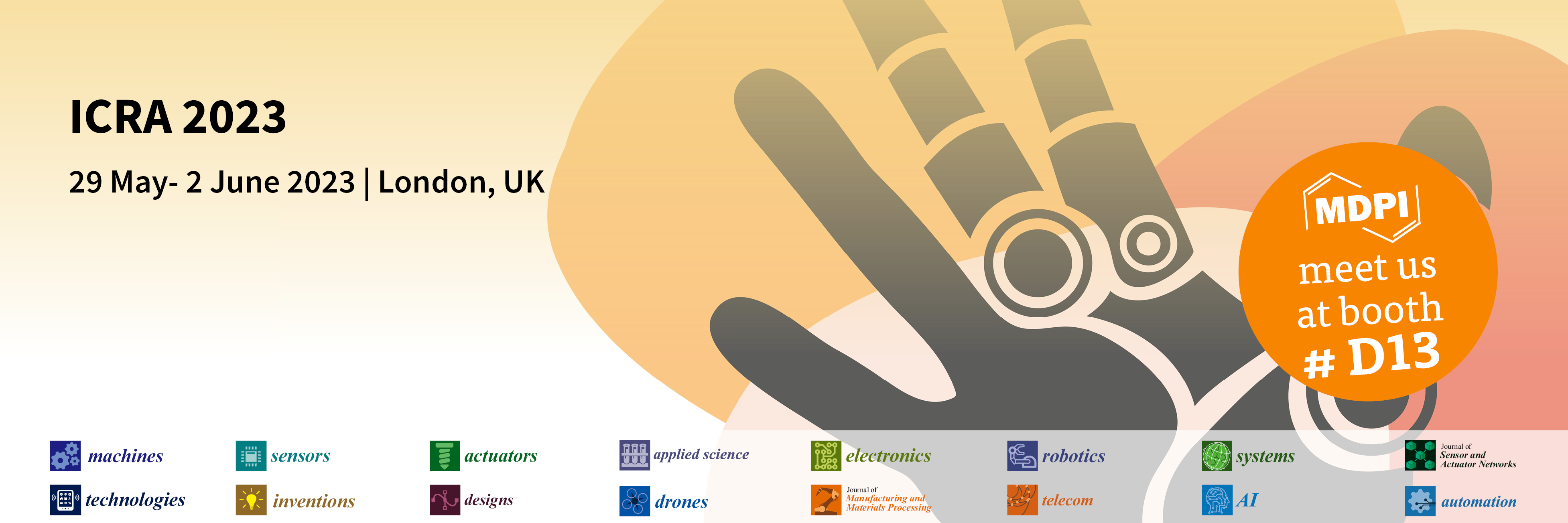
Conference: IEEE International Conference on Robotics and Automation (ICRA 2023)
Date: 29 May–2 June 2023
Place: London, UK
Machines (ISSN: 2075-1702) will be attending ICRA 2023 as an exhibitor. This meeting will take place from 29 May to 2 June 2023 in London, UK.
The largest and most prestigious event of the year in the robotics and automation calendar, the 2023 IEEE International Conference on Robotics and Automation (ICRA) will bring together the world's top academics, researchers, and industry representatives. With the conference taking place in the UK for the first time, London will provide the perfect backdrop to this world-class event.
The following MDPI journals will be represented:
- Machines;
- Sensors;
- Actuators;
- Applied Sciences;
- Electronics;
- Robotics;
- Systems;
- JSAN;
- Technologies;
- Inventions;
- Designs;
- Drones;
- JMMP;
- Telecom;
- AI;
- Automation.
If you are planning to attend this conference, please do not hesitate to start an online conversation with us. Our delegates look forward to meeting you in person and answering any questions that you may have. For more information about the conference, please visit the following website: https://www.icra2023.org/.
20 January 2023
Meet Us at the XII Reunión del Grupo de Física de la Materia Condensada de la RSEF (GEFES 2023), 1–3 February 2023, Salamanca, Spain
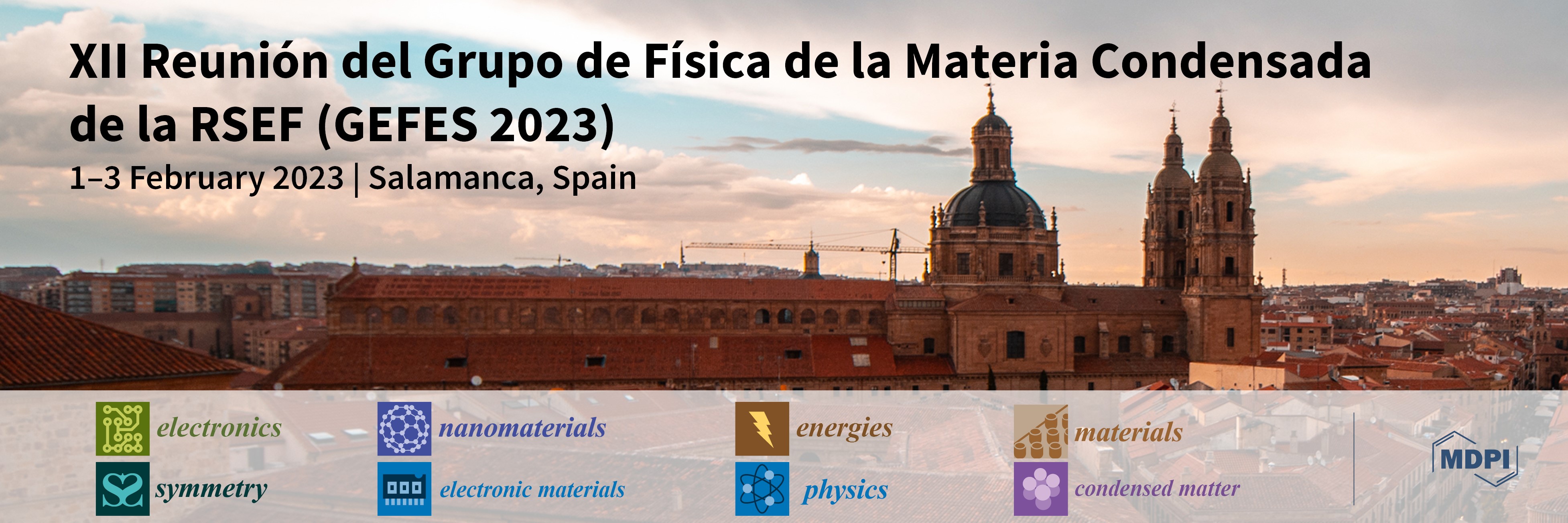
MDPI will be attending the XII Reunión del grupo de física de la materia condensada de la RSEF (GEFES 2023) in Salamanca, Spain, which will take place from 1 to 3 February 2023. The GEFES 2023 is the annual meeting of GEFES, the Condensed Matter Physics Division of the Spanish Royal Physics Society. The theme of GEFES 2023 is to review the condensed matter physics research achievements of the society in the past year and discuss the opportunities and challenges in the field.
The following MDPI journals will be represented:
- Electronics;
- Nanomaterials;
- Energies;
- Materials;
- Symmetry;
- Electronic Materials;
- Physics;
- Condensed Matter.
If you are attending this conference, please visit our booth. Our delegates look forward to meeting you in person and answering any questions that you may have. For more information about the conference, please visit the following link: https://gefes2023.es/.
22 December 2022
Special Issue Mentor Program
We are pleased to announce the launch of a new initiative—the MDPI Special Issue Mentor Program.
This program will enable early career researchers (who must hold a Ph.D. in a related field) to experience editing a Special Issue in MDPI journals, under the mentorship of our experienced Editorial Board Members or other experienced scientists. The mentor program will provide an excellent opportunity for early career scientists to gain editorial experience, and to cultivate their ability to edit scientific research.
The mentee’s responsibilities include:
- Proposing a Special Issue title and assisting the mentor in preparing a summary (around 200–400 words) and 3–10 keywords describing the background, importance, and goal of the Issue;
- Writing a brief promotion plan for the Special Issue;
- Preparing a list of scholars who may be interested in the Issue and personally e-mailing invitations on behalf of Guest Editors;
- Writing an editorial for the online Special Issue together with the mentor.
The mentor’s responsibilities include:
- Conducting a final check before the Special Issue is published online;
- Performing editorial control of the Special Issue and quality control of the publications, both of which must be carried out in a timely manner;
- Providing suggestions to younger scholars if they have any doubts or concerns regarding submissions;
- Organizing video calls with young scholars and the Editorial Office regularly to discuss problems and improvement suggestions for the Special Issue;
- Making and submitting decisions regarding submissions with the assistance of mentees.
Certificates and awards:
After the Special Issue closes, the Editorial Office will provide official certificates for all the mentors and early career researchers.
If you are interested in this opportunity, please send your Special Issue proposal to the Editorial Office of a journal you choose, and we will discuss the process (i.e., mentor collaboration, Special Issue topic feasibility analysis, etc.) in further detail. The full list of MDPI journals is as follows: https://www.mdpi.com/about/journals.
In addition to the new Special Issue Mentor Program, we will continue to welcome all Special Issue proposals focusing on hot research topics.
14 December 2022
"Thanks a Million!" – One Million Articles Published in MDPI Journals
MDPI has just become the first open access (OA) publisher to reach the milestone of one million articles published. That is one million articles freely available to all, to circulate and build upon! We are proud to share this special moment with the global scientific community.
This landmark has been reached thanks to the immeasurable support of more than 600,000 expert reviewers, 66,000 editorial board members and 6700 hard-working colleagues across MDPI’s global offices.
Within more than 25 years of publishing, our journals received 2.1 million manuscripts and generated 4.6 million peer review reports to get to one million papers published.
Reaching the milestone of one million articles published reinforces our mission to remove any existing barriers and to make scientific research accessible to all. Since its inception, MDPI’s goal has been to create reliable processes to make science open. This is a path towards facilitating the dissemination of novel insights in scientific communities.
Regular feedback from authors and reviewers shows that our service is greatly appreciated and needed. At the same time, the feedback helps us identify areas for further improvement.
As it stands, a significant share of published research findings remain closed access. More than half of the content published with the most well-known legacy publishers stays behind a paywall, and that is not including articles published in hybrid OA journals, or made available months or years after publication.
A new policy announced by the US administration in August 2022 requires that, as of January 2026, all US federally funded research be made freely and immediately available after publication. While the new policy does not mandate articles be published under an open access license, it is aligned with the open access movement in removing all barriers to research. Similarly, some of the most advanced research institutions in the world intend to have all funded research articles published in open access by 2025.
MDPI is proud to be the leading agent of the transition to open access.
"Thanks a Million" to all the contributors!
8 December 2022
MDPI Sustainability Foundation: New Look and Nominations for the 2023 Sustainability Awards Now Open

We are pleased to announce that the website of the MDPI Sustainability Foundation has been revamped! For the past couple of months, our UX UI team and front-end developers have been working hard to launch the website in time for the opening of the Sustainability Awards nominations.
The website is not the only thing that has had a remodeling. Indeed, the format of the Emerging Sustainability Leader Award (ESLA) has been updated. ESLA is now a competition open to individual researchers or start-ups founded by researchers under the age of 35. Nominee applications will go through 2 rounds of selection until the final 3 are decided. The finalists will then be invited to give pitch presentations during the Award Ceremony to win either first place (10,000 USD) or runner-up (2 x 5000 USD).
The World Sustainability Award, on the other hand, remains the same: a total prize money of 100,000 USD is up for grabs by senior individual researchers or groups of researchers from the international research community.
Nominations for both the World Sustainability Award and the Emerging Sustainability Leader award are now open! Check out our new website for more information on how to nominate.
23 November 2022
Electronics | 2022 Young Investigator Award—Winner Announced
We are pleased to announce that the winner of the Electronics 2022 Young Investigator Award is Dr. Houqiang Fu.

Dr. Houqiang Fu is an assistant professor at the School of Electrical, Computer and Energy Engineering at Arizona State University, Temple, USA. Dr. Fu’s research interests are exploring novel materials and developing next-generation electronic and photonic/optoelectronic devices as well as systems to address critical societal needs in regard to energy efficiency, computing, communication, and sensing, which are at the interdisciplinary intersection of electrical engineering, materials science, photonics, and physics. Dr. Fu received his Ph.D. degree in electrical engineering from Arizona State University (ASU) in 2019, and he has an outstanding publication record; his work has been chronicled in over 160 journal and conference publications, 4 book chapters, 2 granted patents, and 10 pending patents. His research has been featured by many media outlets, including IEEE Spectrum, Semiconductor Today, Compound Semiconductor, and Silicon Valley Microelectronics, and has been collectively cited more than 16,000 times (Hirsch index of 25). He is a rising star in the field of third-generation wide-bandgap semiconductor materials and devices, in addition to their optoelectronic applications. Despite his young age, Dr. Fu has been the recipient of several academic prizes, including the 2021 ISU Regents Innovation Fund Award, the 2019 Palais Outstanding Doctoral Award (the highest honor for ASU ECEE Ph.D. graduates), and the 2018 ASU Outstanding Research Award. Please join us in congratulating Dr. Fu for his outstanding achievements.
As the awardee, Dr. Fu will receive an honorarium of CHF 2000, a certificate, and an offer to publish one paper free of charge in Electronics (ISSN: 2079-9292) after peer review before the end of June 2023.
On behalf of the Assessment Committee Members—Dr. Xiongfeng Ma, Prof. Dr. Boris Andrievsky, Prof. Dr. Elias Stathatos, Dr. Nikolay Hinov, and Prof. Dr. Kiat Seng Yeo—we congratulate the winner on his accomplishments. We would also like to thank all of the nominators from various fields of study for their participation as well as all of the Award Committee Members for their evaluation of the abundant excellent nominations.
Prof. Dr. Flavio Canavero
Editor-in-Chief of Electronics
7 November 2022
Electronics | 2022 Travel Awards—Winners Announced
As the Editor-in-Chief of Electronics (ISSN: 2079-9292), I am pleased to announce the winners of the Electronics Travel Awards for 2022. The awards have been granted to Mr. Gia Quoc Bao Tran and Dr. Nishu Gupta.
Name: Gia Quoc Bao Tran
Affilaition: Ph.D. student at Ecole Nationale Supérieure des Mines de Paris, Université PSL, France
Research interests: observer design for hybrid dynamical systems
Name: Nishu Gupta
Affilaition: Postdoctoral researcher at the Faculty of Information Technology and Electrical Engineering, Norwegian University of Science and Technology, Norway
Research interests: autonomous vehicles; edge computing; smart wireless systems; Internet of things; deep learning; ad hoc networks
Each winner will receive CHF 800 and a certificate.
With so many high-quality applicants, the evaluation process and final decision were challenging. We would like to thank all of the applicants for submitting their diverse and fascinating range of research topics.
On behalf of the Assessment Committee—Dr. Maysam Abbod, Dr. Francisco Falcone, Dr. Ping-Feng Pai and Prof. Dr. Giulio Antonini—we congratulate the winners on their accomplishments.
Prof. Dr. Flavio Canavero
Editor-in-Chief, Electronics
27 October 2022
Meet Us at the 2022 IEEE Transportation Electrification Conference and Expo, Asia-Pacific (ITEC-AP 2022), 28–31 October 2022, Haining, China

MDPI will be attending the 2022 IEEE Transportation Electrification Conference and Expo, Asia-Pacific (ITEC-AP 2022) in Haining, China, which will take place from 28 to 31 October 2022. The ITEC-AP 2022 is organized by Zhejiang University, and aims to provide a forum for sharing knowledge, experience, and ideas in electrical technologies for transportation. Technical sessions, tutorials, exhibitors, and industry activities are planned.
The following MDPI journals will be represented:
- Electronics;
- Machines;
- Actuators;
- Future Transportation;
- Electricity;
- Smart Cities;
- Sustainability;
- Vehicles.
If you are attending this conference, please feel free to stop by our booth. Our delegates look forward to meeting you in person to answer any questions that you may have. For more information about the conference, please visit the following link: https://www.itec-ap2022.com/.
28 September 2022
Peer Review Week 2022 – Research Integrity: Creating and Supporting Trust in Research
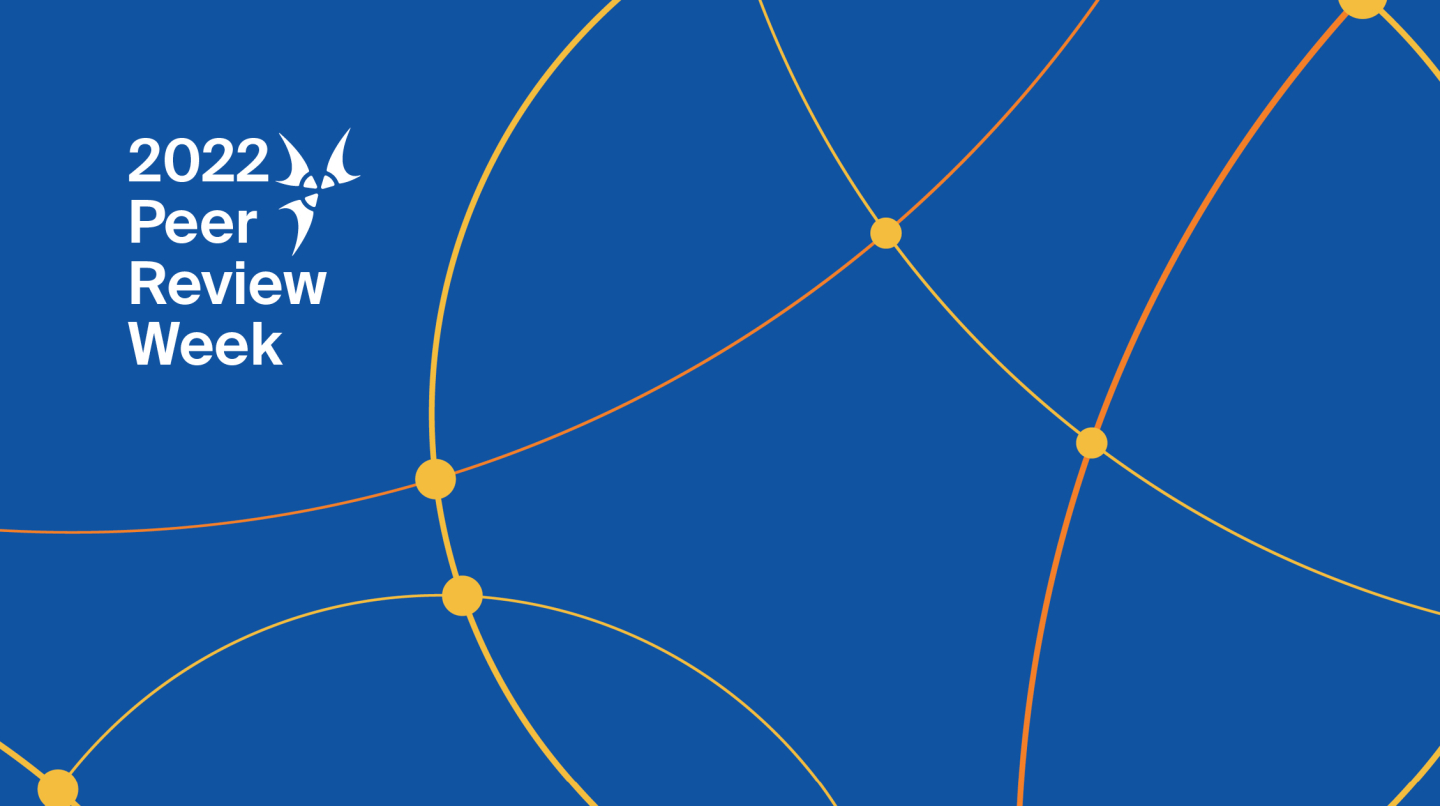
Peer Review Week began 19 September 2022 under the theme of “Research Integrity: Creating and Supporting Trust in Research”. Through various blog articles, podcast, and webinar, we discussed this crucial subject throughout the week, celebrating the essential role peer review plays in maintaining research quality.
To begin, we held a Webinar on the topic. Professor Peter W. Choate and Dr. Emmanuel Obeng-Gyasi joined Dr. Ioana Craciun, one of MDPI’s scientific officers, for an in-depth discussion.
We invite you to view the event recording:
During the week, the MDPI Blog in a series articles highlighted how good Peer Review safeguards research integrity. The following topics were covered:
- Peer Review Week 2022
- Research Integrity
- What We’ve Learned About Peer Review Reports
- 4 Steps to the Perfect Peer Review Report
- How to Write the Perfect Peer Review Report: An Interview
- Inviting Great Peer Reviewers
In a new edition of Insight Faster, an MDPI podcast, we were delighted to talk to the co-chairs of the Peer Review Week committee, Jayashree Rajagopalan (Senior Manager of Global Community Engagement for CACTUS) and Danielle Padula (Head of Marketing and Community Development at Scholastica) to get their take on this year’s event and its related topics.
You can find the Podcast here.
We hope you enjoy the contents!
28 September 2022
Meet Us at the 6th Micro-Nano Optical Technology and Application Conference, 21–23 October 2022, Nanjing, China
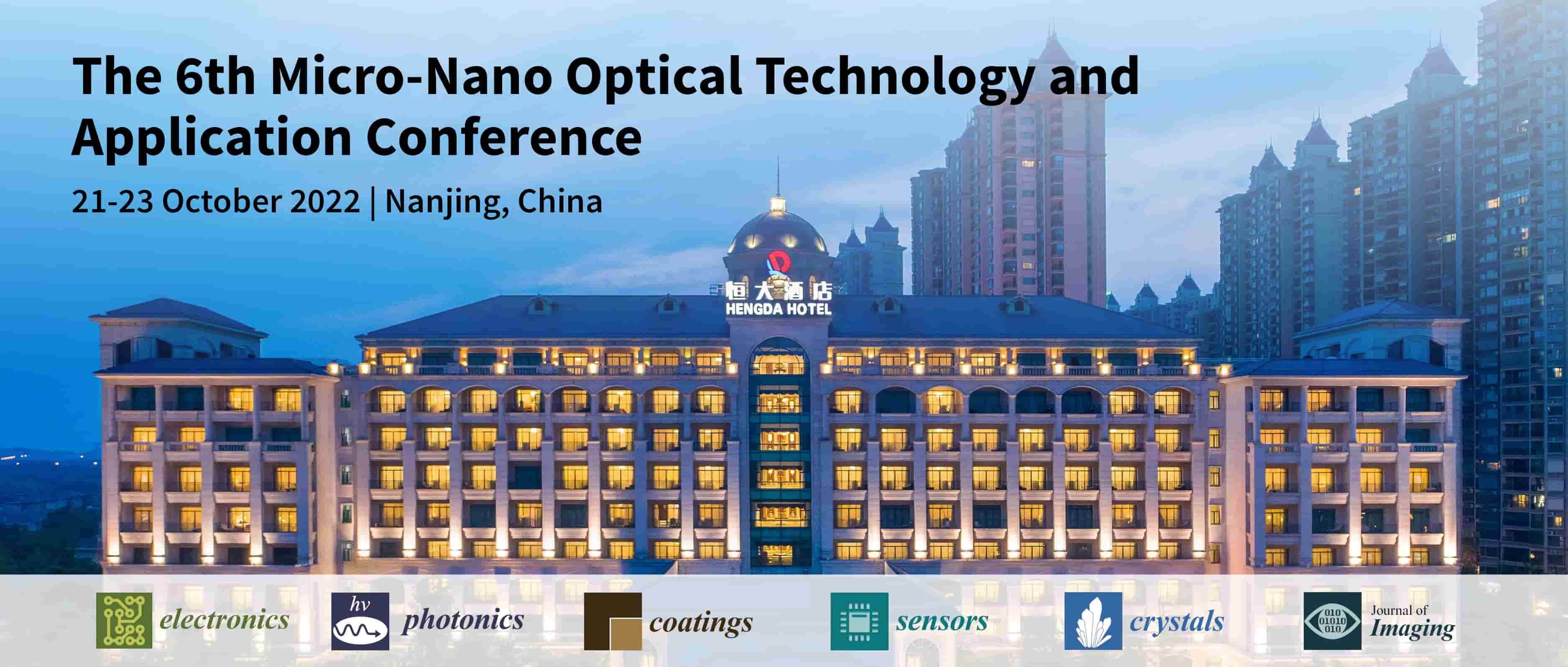
MDPI will be attending the 6th Micro-Nano Optical Technology and Application Conference (MOTA2022) in Nanjing, China, which will take place from 21 to 23 October 2022. The MOTA2022 is organized by the Chinese Society for Optical Engineering, aiming to build a communication platform between researchers and industrial application teams, as well as promote scientific research progress and the industrialization development of micro-nano optics.
The following MDPI journals will be represented:
- Electronics (leading journal);
- Photonics (leading journal);
- Coatings;
- Sensors;
- Crystals;
- Journal of Imaging.
If you are attending this conference, please feel free to stop by our booth. Our delegates look forward to meeting you in person to answer any questions that you may have.
For more information about the conference, please visit the following link: https://b2b.csoe.org.cn/meeting/MOTA2022.html.
23 September 2022
Meet Us at the 2022 IET International Conference on Engineering Technologies and Applications, 14–16 October 2022, Changhua, Taiwan

It is our great pleasure to invite you to participate in the 2022 IET International Conference on Engineering Technologies and Applications, which will be held from 14 to 16 October 2022, in Changhua, Taiwan.
The IET International Conference provides a platform for professionals, young scholars, and industry researchers to exchange the latest ideas in science and technology. The main theme of the IET ICETA 2022 is “Emerging Technologies and Applications for Smart Life”, allowing participants to discuss the recent applications regarding engineering technology and innovations.
The scope of the conference includes, but is not limited to, the following:
- Artificial intelligence, machine learning, and deep learning;
- Internet of things;
- Audio/video systems and signal processing;
- Intelligent manufacturing;
- Semiconductors and integrated circuits;
- Green energy;
- Mechatronic integration;
- Communications and networks;
- Automation and control;
- Vehicle-to-everything and autonomous vehicles;
- Big data and clouds;
- Advanced computing and data sciences;
- RF and microwave;
- Power devices and systems;
- Security and privacy;
- Computer software and hardware;
- Consumer electronics;
- Virtual reality, augmented reality, mixed reality, and cinematic reality;
- Optoelectronic materials, devices, circuits, and systems;
- Embedded systems;
- Advanced materials and devices;
- Sensors and actuators;
- Sustainable development;
- Technology and education;
- Advanced technologies and applications.
13 September 2022
Electronics | Highly Cited Papers in 2021 in the Section “Electronic Multimedia”
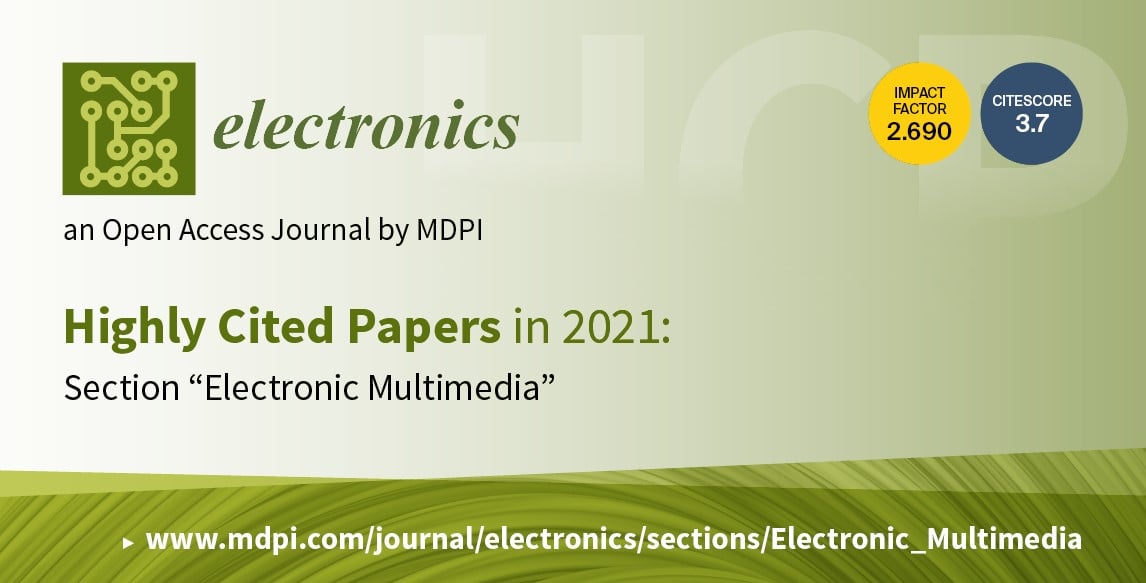
The Section “Electronic Multimedia” reports on electronic multimedia technology, tools, and the applications of electronic multimedia, including, but not limited to, circuits, networking, signal processing, systems, software, and systems integration.
As they are of an open access format, you have free and unlimited access to the full text of all the articles published in our journal. We welcome you to read our most highly cited papers published in 2021 listed below:
1. “A Two-Stage GAN for High-Resolution Retinal Image Generation and Segmentation”
by Paolo Andreini et al.
Electronics 2021, 11(1), 60; https://doi.org/10.3390/electronics11010060
Available online: https://www.mdpi.com/2079-9292/11/1/60
2. “A Survey on QoE-Oriented VR Video Streaming: Some Research Issues and Challenges”
by Jinjia Ruan and Dongliang Xie
Electronics 2021, 10(17), 2155; https://doi.org/10.3390/electronics10172155
Available online: https://www.mdpi.com/2079-9292/10/17/2155
3. “Semi-Supervised Machine Condition Monitoring by Learning Deep Discriminative Audio Features”
by Iordanis Thoidis et al.
Electronics 2021, 10(20), 2471; https://doi.org/10.3390/electronics10202471
Available online: https://www.mdpi.com/2079-9292/10/20/2471
4. “Using Flipped Classroom to Improve the Learning Effectiveness of Digital Logic Courses”
by Tuan-Yung Han et al.
Electronics 2021, 10(13), 1602; https://doi.org/10.3390/electronics10131602
Available online: https://www.mdpi.com/2079-9292/10/13/1602
5. “Segmentation of Aorta 3D CT Images Based on 2D Convolutional Neural Networks”
by Simone Bonechi et al.
Electronics 2021, 10(20), 2559; https://doi.org/10.3390/electronics10202559
Available online: https://www.mdpi.com/2079-9292/10/20/2559
13 September 2022
Electronics | Highly Cited Papers in 2021 in the Section “Quantum Electronics”
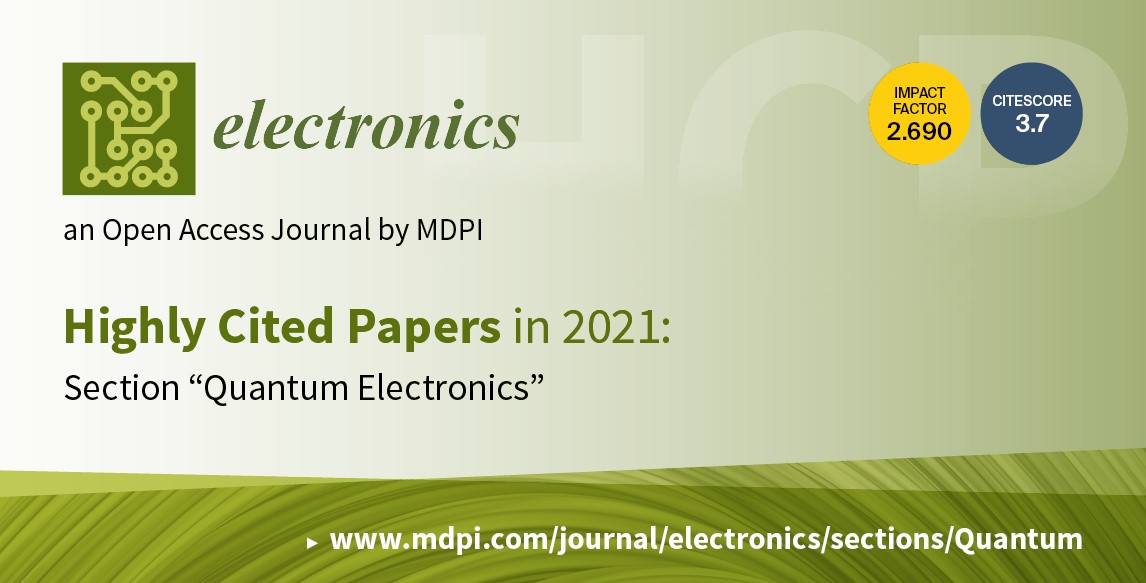
The “Quantum Electronics” Section publishes original and significant contributions to the theory and experimental implementations on the topic of quantum electronics. More specifically, articles will be considered on superconducting circuits, semiconductor qubits, NV centers, and electron qubits in general. Connections to atomic, molecular, and optical physics, as well as to mechatronic systems (i.e., robots and drones) when combined with quantum science, are also welcome. We will also consider the relation to quantum artificial intelligence and quantum machine learning of electronic quantum systems. Reviews on these subjects as well as Special Issues dealing with specific topics are also published.
As they are of an open access format, you have free and unlimited access to the full text of all the articles published in our journal. We welcome you to read our most highly cited papers published in 2021 listed below:
1. “T-Count Optimized Quantum Circuit Designs for Single-Precision Floating-Point Division”
by S. S. Gayathri et al.
Electronics 2021, 10(6), 703; https://doi.org/10.3390/electronics10060703
Available online: https://www.mdpi.com/2079-9292/10/6/703
2. “Automated Quantum Hardware Selection for Quantum Workflows”
by Benjamin Weder et al.
Electronics 2021, 10(8), 984; https://doi.org/10.3390/electronics10080984
Available online: https://www.mdpi.com/2079-9292/10/8/984
3. “Coreset Clustering on Small Quantum Computers”
by Teague Tomesh et al.
Electronics 2021, 10(14), 1690; https://doi.org/10.3390/electronics10141690
Available online: https://www.mdpi.com/2079-9292/10/14/1690
4. “Design of a 20 T Class REBCO Insert in a 15 T Low Temperature Superconducting Magnet”
by Liangjun Shao et al.
Electronics 2021, 10(14), 1741; https://doi.org/10.3390/electronics10141741
Available online: https://www.mdpi.com/2079-9292/10/14/1741
5. “Low-Power Multiplexer Structures Targeting Efficient QCA Nanotechnology Circuit Designs”
by Amjad Almatrood et al.
Electronics 2021, 10(16), 1885; https://doi.org/10.3390/electronics10161885
Available online: https://www.mdpi.com/2079-9292/10/16/1885
13 September 2022
Electronics | Highly Cited Papers in 2021 in the Section “Industrial Electronics”
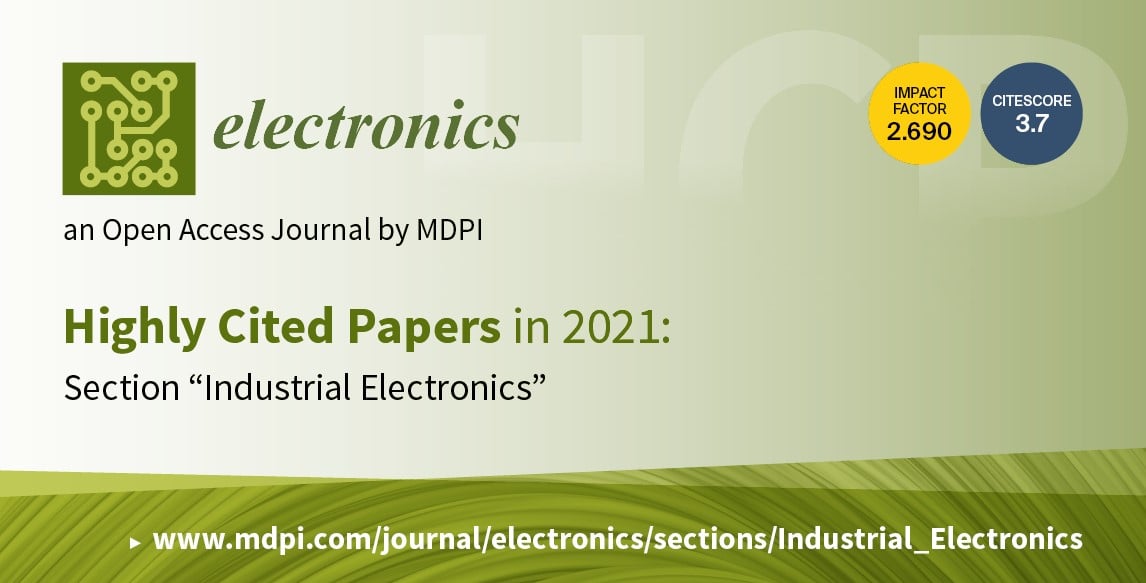
Industrial electronics play a vital role in improving the efficiency and productivity of the energy, transportation, petroleum, chemical, semiconductor, mining, agriculture, and other industries. As a branch of electronics dealing with power electronic switches, sensors, actuators, meters, intelligent electronic devices (IEDs), automation equipment, semiconductors, nanotechnology, etc., the current emphasis is placed on power conditioning using power semiconductor devices in modernizing industry technology. This Section is devoted to presenting the emerging technologies and trends in the industrial electronics sector, publishing original research and state-of-the-art review articles.
As they are of an open access format, you have free and unlimited access to the full text of all the articles published in our journal. We welcome you to read our most highly cited papers published in 2021 listed below:
1. “Solid-State DC Circuit Breakers and Their Comparison in Modular Multilevel Converter Based-HVDC Transmission System”
by Gul Ahmad Ludin et al.
Electronics 2021, 10(10), 1204; https://doi.org/10.3390/electronics10101204
Available online: https://www.mdpi.com/2079-9292/10/10/1204
2. “DC Nanogrids for Integration of Demand Response and Electric Vehicle Charging Infrastructures: Appraisal, Optimal Scheduling and Analysis”
by Salwan Ali Habeeb et al.
Electronics 2021, 10(20), 2484; https://doi.org/10.3390/electronics10202484
Available online: https://www.mdpi.com/2079-9292/10/20/2484
3. “Design and Implementation of LoRa Based IoT Scheme for Indonesian Rural Area”
by Setya Widyawan Prakosa et al.
Electronics 2021, 10(1), 77; https://doi.org/10.3390/electronics10010077
Available online: https://www.mdpi.com/2079-9292/10/1/77
4. “Wind Turbine Operation Curves Modelling Techniques”
by Davide Astolfi
Electronics 2021, 10(3), 269; https://doi.org/10.3390/electronics10030269
Available online: https://www.mdpi.com/2079-9292/10/3/269
5. “A Simplified Output Feedback Controller for the DC-DC Boost Power Converter”
by Satyajit Chincholkar et al.
Electronics 2021, 10(4), 493; https://doi.org/10.3390/electronics10040493
Available online: https://www.mdpi.com/2079-9292/10/4/493
6. “Hybrid Workload Enabled and Secure Healthcare Monitoring Sensing Framework in Distributed Fog-Cloud Network”
by Abdullah Lakhan et al.
Electronics 2021, 10(16), 1974; https://doi.org/10.3390/electronics10161974
Available online: https://www.mdpi.com/2079-9292/10/16/1974
7. “Artificial Intelligence-Based Decision-Making Algorithms, Internet of Things Sensing Networks, and Deep Learning-Assisted Smart Process Management in Cyber-Physical Production Systems”
by Mihai Andronie et al.
Electronics 2021, 10(20), 2497; https://doi.org/10.3390/electronics10202497
Available online: https://www.mdpi.com/2079-9292/10/20/2497
8. “Advancing Logistics 4.0 with the Implementation of a Big Data Warehouse: A Demonstration Case for the Automotive Industry”
by Nuno Silva et al.
Electronics 2021, 10(18), 2221; https://doi.org/10.3390/electronics10182221
Available online: https://www.mdpi.com/2079-9292/10/18/2221
9. “Sequence to Point Learning Based on an Attention Neural Network for Nonintrusive Load Decomposition”
by Mingzhi Yang et al.
Electronics 2021, 10(14), 1657; https://doi.org/10.3390/electronics10141657
Available online: https://www.mdpi.com/2079-9292/10/14/1657
10. “Review on Energy Storage Systems in Microgrids”
by Ramy Georgious et al.
Electronics 2021, 10(17), 2134; https://doi.org/10.3390/electronics10172134
Available online: https://www.mdpi.com/2079-9292/10/17/2134
13 September 2022
Electronics | Highly Cited Papers in 2021 in the Section “Power Electronics”

The “Power Electronics” Section is devoted to publishing original research and state-of-the-art review papers on emerging technologies and trends in power electronics, including components, circuits, design, modelling, simulation, control, implementation, testing and analysis of power electronics and their applications.
As they are of open access format, you have free and unlimited access to the full text of all articles published in our journal. We welcome you to read our most highly cited papers published in 2021 listed below:
1. “Role of Wide Bandgap Materials in Power Electronics for Smart Grids Applications”
by Javier Ballestín-Fuertes et al.
Electronics 2021, 10(6), 677; https://doi.org/10.3390/electronics10060677
Available online: https://www.mdpi.com/2079-9292/10/6/677
2. “An Effective Method for Parameter Estimation of a Solar Cell”
by Abhishek Sharma et al.
Electronics 2021, 10(3), 312; https://doi.org/10.3390/electronics10030312
Available online: https://www.mdpi.com/2079-9292/10/3/312
3. “Review of Electric Vehicle Converter Configurations, Control Schemes and Optimizations: Challenges and Suggestions”
by Molla S. Hossain Lipu et al.
Electronics 2021, 10(4), 477; https://doi.org/10.3390/electronics10040477
Available online: https://www.mdpi.com/2079-9292/10/4/477
4. “Parameter Extraction of Photovoltaic Module Using Tunicate Swarm Algorithm”
by Abhishek Sharma et al.
Electronics 2021, 10(8), 878; https://doi.org/10.3390/electronics10080878
Available online: https://www.mdpi.com/2079-9292/10/8/878
5. “Energy-Efficient Fuzzy Management System for Internet of Things Connected Vehicular Ad Hoc Networks”
by Imran Memon et al.
Electronics 2021, 10(9), 1068; https://doi.org/10.3390/electronics10091068
Available online: https://www.mdpi.com/2079-9292/10/9/1068
6. “Reduction of Losses and Operating Costs in Distribution Networks Using a Genetic Algorithm and Mathematical Optimization”
by Fabio Edison Riaño et al.
Electronics 2021, 10(4), 419; https://doi.org/10.3390/electronics10040419
Available online: https://www.mdpi.com/2079-9292/10/4/419
7. “A Novel Solution Methodology Based on a Modified Gradient-Based Optimizer for Parameter Estimation of Photovoltaic Models”
by Mohamed H. Hassan et al.
Electronics 2021, 10(4), 472; https://doi.org/10.3390/electronics10040472
Available online: https://www.mdpi.com/2079-9292/10/4/472
8. “Optimal Placement and Sizing of D-STATCOM in Radial and Meshed Distribution Networks Using a Discrete-Continuous Version of the Genetic Algorithm”
by Cristian Mateo Castiblanco-Pérez et al.
Electronics 2021, 10(12), 1452; https://doi.org/10.3390/electronics10121452
Available online: https://www.mdpi.com/2079-9292/10/12/1452
9. “Voltage Stability of Power Systems with Renewable-Energy Inverter-Based Generators: A Review”
by Nasser Hosseinzadeh et al.
Electronics 2021, 10(2), 115; https://doi.org/10.3390/electronics10020115
Available online: https://www.mdpi.com/2079-9292/10/2/115
10. “A New Approach for Power Losses Evaluation of IGBT/Diode Module”
by Hossein Hafezi and Roberto Faranda
Electronics 2021, 10(3), 280; https://doi.org/10.3390/electronics10030280
Available online: https://www.mdpi.com/2079-9292/10/3/280
11. “Reliability Analysis and Repair Activity for the Components of 350 kW Inverters in a Large Scale Grid-Connected Photovoltaic System”
by Filippo Spertino et al.
Electronics 2021, 10(5), 564; https://doi.org/10.3390/electronics10050564
Available online: https://www.mdpi.com/2079-9292/10/5/564
12. “Estimation of Lithium-Ion Batteries State-Condition in Electric Vehicle Applications: Issues and State of the Art”
by Khaled Laadjal and Antonio J. Marques Cardoso
Electronics 2021, 10(13), 1588; https://doi.org/10.3390/electronics10131588
Available online: https://www.mdpi.com/2079-9292/10/13/1588
13. “Electric Vehicles Charging Stations’ Architectures, Criteria, Power Converters, and Control Strategies in Microgrids”
by Dominic Savio Abraham et al.
Electronics 2021, 10(16), 1895; https://doi.org/10.3390/electronics10161895
Available online: https://www.mdpi.com/2079-9292/10/16/1895
14. “Trends and Challenges in Multi-Level Inverter with Reduced Switches”
by Ganesh Kumar Srinivasan et al.
Electronics 2021, 10(4), 368; https://doi.org/10.3390/electronics10040368
Available online: https://www.mdpi.com/2079-9292/10/4/368
15. “System Level Simulation of Microgrid Power Electronic Systems”
by Michal Frivaldsky et al.
Electronics 2021, 10(6), 644; https://doi.org/10.3390/electronics10060644
Available online: https://www.mdpi.com/2079-9292/10/6/644
16. “Two Decades of Condition Monitoring Methods for Power Devices”
by Giovanni Susinni et al.
Electronics 2021, 10(6), 683; https://doi.org/10.3390/electronics10060683
Available online: https://www.mdpi.com/2079-9292/10/6/683
17. “A New SOC Estimation for LFP Batteries: Application in a 10 Ah Cell (HW 38120 L/S) as a Hysteresis Case Study”
by Younghwi Ko and Woojin Choi
Electronics 2021, 10(6), 705; https://doi.org/10.3390/electronics10060705
Available online: https://www.mdpi.com/2079-9292/10/6/705
18. “A Sustainable Energy Distribution Configuration for Microgrids Integrated to the National Grid Using Back-to-Back Converters in a Renewable Power System”
by Reza Alayi et al.
Electronics 2021, 10(15), 1826; https://doi.org/10.3390/electronics10151826
Available online: https://www.mdpi.com/2079-9292/10/15/1826
19. “Economic and Ecological Design of Hybrid Renewable Energy Systems Based on a Developed IWO/BSA Algorithm”
by Mohammed Kharrich et al.
Electronics 2021, 10(6), 687; https://doi.org/10.3390/electronics10060687
Available online: https://www.mdpi.com/2079-9292/10/6/687
20. “Research on Control Strategy of Isolated DC Microgrid Based on SOC of Energy Storage System”
by Jiechao Lv et al.
Electronics 2021, 10(7), 834; https://doi.org/10.3390/electronics10070834
Available online: https://www.mdpi.com/2079-9292/10/7/834
13 September 2022
Electronics | Highly Cited Papers in 2021 in the Section “Semiconductor Devices”
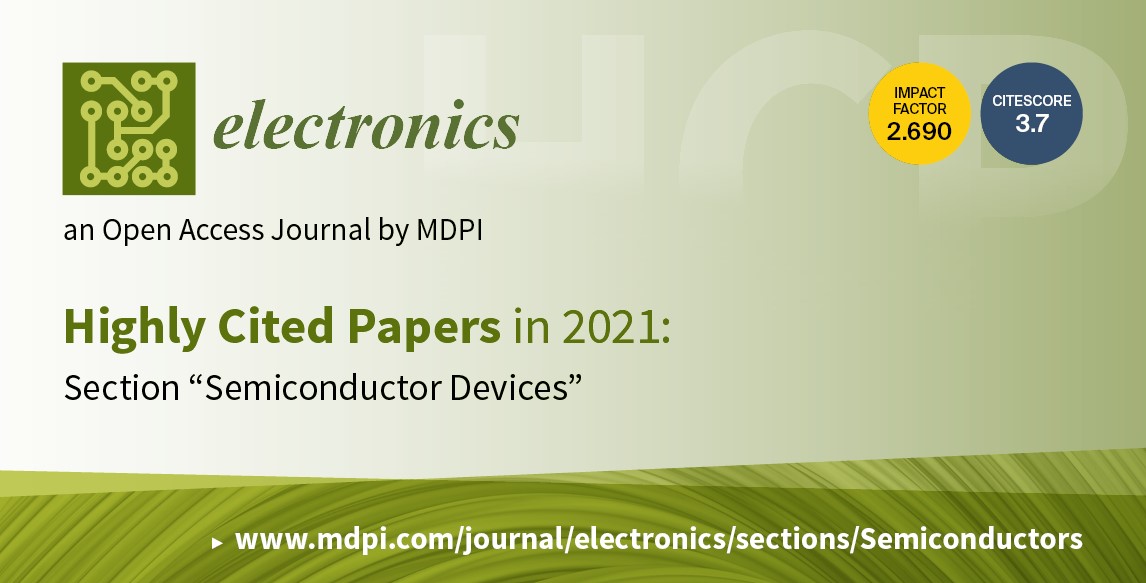
The “Semiconductor Devices” Section publishes original and significant contributions around the theory and performance of semiconductor devices and related materials, including devices, fabrication processes, simulations, quantum devices, hybrid devices, flexible electronic devices, novel semiconductors, semiconductor materials, and device physics. We publish reviews on these subjects and Special Issues that deal with specific topics.
As they are of open access format, you have free and unlimited access to the full text of all articles published in our journal. We welcome you to read our most highly cited papers published in 2021 listed below:
1. “In-Memory Computing with Resistive Memory Circuits: Status and Outlook”
by Giacomo Pedretti and Daniele Ielmini
Electronics 2021, 10(9), 1063; https://doi.org/10.3390/electronics10091063
Available online: https://www.mdpi.com/2079-9292/10/9/1063
2. “Study of Quantized Hardware Deep Neural Networks Based on Resistive Switching Devices, Conventional versus Convolutional Approaches”
by Rocío Romero-Zaliz et al.
Electronics 2021, 10(3), 346; https://doi.org/10.3390/electronics10030346
Available online: https://www.mdpi.com/2079-9292/10/3/346
3. “Carbon Nanotube Field Effect Transistor (CNTFET) and Resistive Random Access Memory (RRAM) Based Ternary Combinational Logic Circuits”
by Furqan Zahoor et al.
Electronics 2021, 10(1), 79; https://doi.org/10.3390/electronics10010079
Available online: https://www.mdpi.com/2079-9292/10/1/79
4. “Measurements and Computations of Internal Temperatures of the IGBT and the Diode Situated in the Common Case”
by Paweł Górecki and Krzysztof Górecki
Electronics 2021, 10(2), 210; https://doi.org/10.3390/electronics10020210
Available online: https://www.mdpi.com/2079-9292/10/2/210
5. “Influence of Selected Factors on Thermal Parameters of the Components of Forced Cooling Systems of Electronic Devices”
by Krzysztof Posobkiewicz and Krzysztof Górecki
Electronics 2021, 10(3), 340; https://doi.org/10.3390/electronics10030340
Available online: https://www.mdpi.com/2079-9292/10/3/340
6. “Multi-Level Switching of Al-Doped HfO2 RRAM with a Single Voltage Amplitude Set Pulse”
by Jinfu Lin et al.
Electronics 2021, 10(6), 731; https://doi.org/10.3390/electronics10060731
Available online: https://www.mdpi.com/2079-9292/10/6/731
7. “Optimization of Multi-Level Operation in RRAM Arrays for In-Memory Computing”
by Eduardo Pérez et al.
Electronics 2021, 10(9), 1084; https://doi.org/10.3390/electronics10091084
Available online: https://www.mdpi.com/2079-9292/10/9/1084
8. “Recent Progress on 3D NAND Flash Technologies”
by Akira Goda
Electronics 2021, 10(24), 3156; https://doi.org/10.3390/electronics10243156
Available online: https://www.mdpi.com/2079-9292/10/24/3156
9. “A Compact Modular 5 GW Pulse PFN-Marx Generator for Driving HPM Source”
by Haoran Zhang et al.
Electronics 2021, 10(5), 545; https://doi.org/10.3390/electronics10050545
Available online: https://www.mdpi.com/2079-9292/10/5/545
10. “Analysis of Electrothermal Effects in Devices and Arrays in InGaP/GaAs HBT Technology”
by Vincenzo d’Alessandro et al.
Electronics 2021, 10(6), 757; https://doi.org/10.3390/electronics10060757
Available online: https://www.mdpi.com/2079-9292/10/6/757
13 September 2022
Electronics | Highly Cited Papers in 2021 in the Section “Optoelectronics”
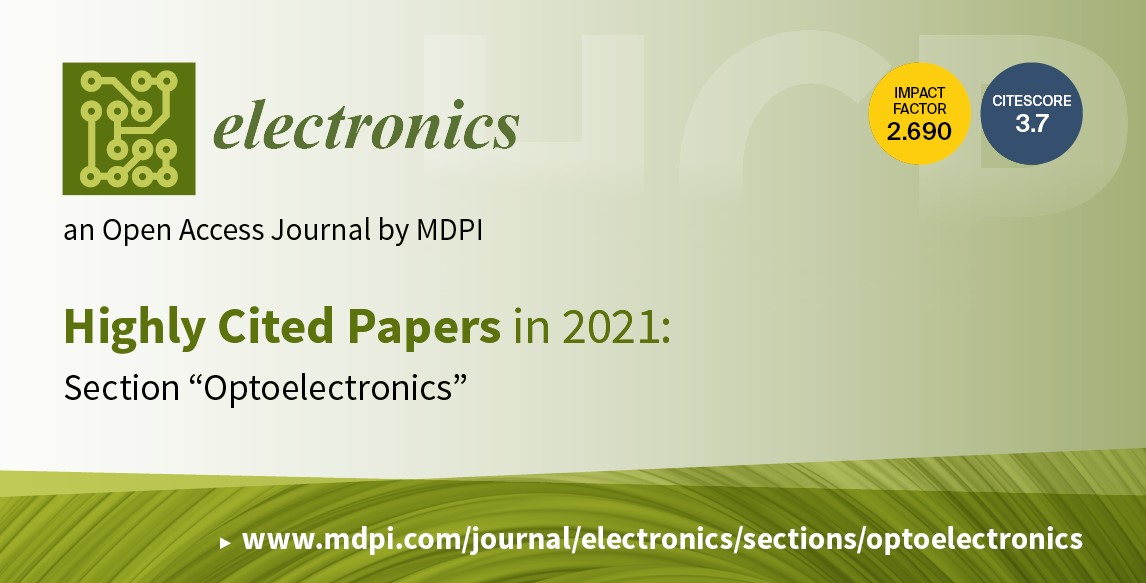
The “Optoelectronics” Section addresses the following topics and considers mostly experimental work or theoretical/simulation work, either directly linked to or supporting the following fields: nanoelectronic and photonic devices, as well as their fabrication; microsystems, microdevices (e.g., sensors and nanoenergy devices), and their fabrication.
As they are of an open access format, you have free and unlimited access to the full text of all the articles published in our journal. We welcome you to read our most highly cited papers published in 2021 listed below:
1. “Metal-Insulator-Metal Waveguide-Based Racetrack Integrated Circular Cavity for Refractive Index Sensing Application”
by Muhammad A. Butt et al.
Electronics 2021, 10(12), 1419; https://doi.org/10.3390/electronics10121419
Available online: https://www.mdpi.com/2079-9292/10/12/1419
2. “Toward a Scalable Fabrication of Perovskite Solar Cells under Fully Ambient Air Atmosphere: From Spin-Coating to Inkjet-Printing of Perovskite Absorbent Layer”
by Aggeliki Karavioti et al.
Electronics 2021, 10(16), 1904; https://doi.org/10.3390/electronics10161904
Available online: https://www.mdpi.com/2079-9292/10/16/1904
3. “A Review of the Reliability of Integrated IR Laser Diodes for Silicon Photonics”
by Matteo Buffolo et al.
Electronics 2021, 10(22), 2734; https://doi.org/10.3390/electronics10222734
Available online: https://www.mdpi.com/2079-9292/10/22/2734
4. “Perylene Based Solution Processed Single Layer WOLED with Adjustable CCT and CRI”
by Volkan Bozkus et al.
Electronics 2021, 10(6), 725; https://doi.org/10.3390/electronics10060725
Available online: https://www.mdpi.com/2079-9292/10/6/725
5. “Effects of Varying the Fin Width, Fin Height, Gate Dielectric Material, and Gate Length on the DC and RF Performance of a 14-nm SOI FinFET Structure”
by Nour El I. Boukortt et al.
Electronics 2021, 11(1), 91; https://doi.org/10.3390/electronics11010091
Available online: https://www.mdpi.com/2079-9292/11/1/91
8 September 2022
Electronics | Highly Cited Papers in 2021 in the Section “Flexible Electronics”

Flexible electronics have been attracting considerable attention in recent decades, not only at the academic but also at the industrial level. The development of electronic components/systems on highly flexible and possibly conformable substrates could allow the integration of smart functionalities, such as sensing capabilities, communication units, etc., onto any type of surface (paper, fabrics, etc.), opening up a wide range of possible applications.
As our journal follows an open access format, you have free and unlimited access to the full text of all the articles published in it. We welcome you to read our most highly cited papers published in 2021 listed below:
1. “Development of Miniaturized Wearable Wristband Type Surface EMG Measurement System for Biometric Authentication”
by Siho Shin et al.
Electronics 2021, 10(8), 923; https://doi.org/10.3390/electronics10080923
Available online: https://www.mdpi.com/2079-9292/10/8/923
2. “Textile Triboelectric Nanogenerators with Diverse 3D-Spacer Fabrics for Improved Output Voltage”
by Dae-Hyeon Kwon et al.
Electronics 2021, 10(8), 937; https://doi.org/10.3390/electronics10080937
Available online: https://www.mdpi.com/2079-9292/10/8/937
3. “Temperature Measurement at Curved Surfaces Using 3D Printed Planar Resistance Temperature Detectors”
by Adam Steckiewicz et al.
Electronics 2021, 10(9), 1100; https://doi.org/10.3390/electronics10091100
Available online: https://www.mdpi.com/2079-9292/10/9/1100
4. “Washable, Low-Temperature Cured Joints for Textile-Based Electronics”
by Jerzy Szalapak et al.
Electronics 2021, 10(22), 2749; https://doi.org/10.3390/electronics10222749
Available online: https://www.mdpi.com/2079-9292/10/22/2749
by Manoj Meda et al.
Electronics 2021, 10(13), 1568; https://doi.org/10.3390/electronics10131568
Available online: https://www.mdpi.com/2079-9292/10/13/1568
8 September 2022
Electronics | Highly Cited Papers in 2021 in the Section “Microwave and Wireless Communications”
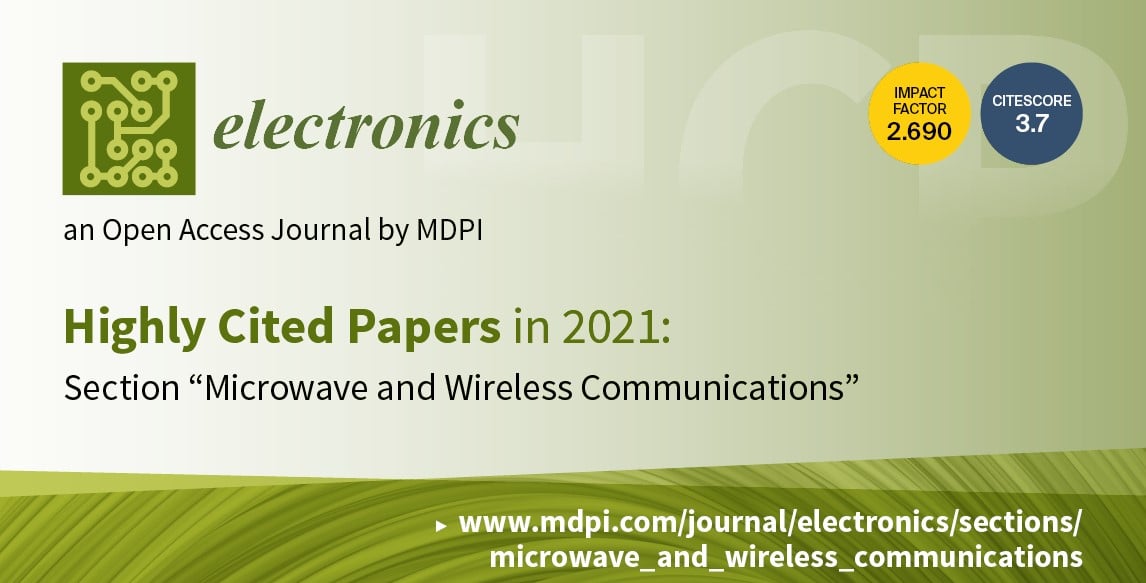
For publication in the “Microwave and Wireless Communications” Section, we would like to invite submissions on advanced theories and technologies across a wide spectrum of research. These can be related to microwave and millimeter-wave communications, including radar sensors, etc., fundamental applications, elements or systems, hardware or software, and methodology theories or measurements. We hope to present state-of-the-art technologies in this Section.
As they are published in an open access format, you have free and unlimited access to the full text of all the articles published in our journal. We welcome you to read our most highly cited papers published in 2021 listed below:
1. “Ubiquitous Vehicular Ad-Hoc Network Computing Using Deep Neural Network with IoT-Based Bat Agents for Traffic Management”
by Srihari Kannan et al.
Electronics 2021, 10(7), 785; https://doi.org/10.3390/electronics10070785
Available online: https://www.mdpi.com/2079-9292/10/7/785
2. “A Quad-Port Dual-Band MIMO Antenna Array for 5G Smartphone Applications”
by Jianlin Huang et al.
Electronics 2021, 10(5), 542; https://doi.org/10.3390/electronics10050542
Available online: https://www.mdpi.com/2079-9292/10/5/542
3. “Infinity Shell Shaped MIMO Antenna Array for mm-Wave 5G Applications”
by Mian Muhammad Kamal et al.
Electronics 2021, 10(2), 165; https://doi.org/10.3390/electronics10020165
Available online: https://www.mdpi.com/2079-9292/10/2/165
4. “A 28 GHz Broadband Helical Inspired End-Fire Antenna and Its MIMO Configuration for 5G Pattern Diversity Applications”
by Hijab Zahra et al.
Electronics 2021, 10(4), 405; https://doi.org/10.3390/electronics10040405
Available online: https://www.mdpi.com/2079-9292/10/4/405
5. “Dynamic Route Discovery Using Modified Grasshopper Optimization Algorithm in Wireless Ad-Hoc Visible Light Communication Network”
by Sharmila Vadivel et al.
Electronics 2021, 10(10), 1176; https://doi.org/10.3390/electronics10101176
Available online: https://www.mdpi.com/2079-9292/10/10/1176
6. “Leveraging Machine-Learning for D2D Communications in 5G/Beyond 5G Networks”
by Sherief Hashima et al.
Electronics 2021, 10(2), 169; https://doi.org/10.3390/electronics10020169
Available online: https://www.mdpi.com/2079-9292/10/2/169
7. “Compact Quad-Element High-Isolation Wideband MIMO Antenna for mm-Wave Applications”
by Daniyal Ali Sehrai et al.
Electronics 2021, 10(11), 1300; https://doi.org/10.3390/electronics10111300
Available online: https://www.mdpi.com/2079-9292/10/11/1300
8. “E-Shaped H-Slotted Dual Band mmWave Antenna for 5G Technology”
by Kiran Raheel et al.
Electronics 2021, 10(9), 1019; https://doi.org/10.3390/electronics10091019
Available online: https://www.mdpi.com/2079-9292/10/9/1019
9. “Design and Synthesis of Multi-Mode Bandpass Filter for Wireless Applications”
by Satheeshkumar Palanisamy et al.
Electronics 2021, 10(22), 2853; https://doi.org/10.3390/electronics10222853
Available online: https://www.mdpi.com/2079-9292/10/22/2853
10. “Design and Realization of a Frequency Reconfigurable Antenna with Wide, Dual, and Single-Band Operations for Compact Sized Wireless Applications”
by Wahaj Abbas Awan et al.
Electronics 2021, 10(11), 1321; https://doi.org/10.3390/electronics10111321
Available online: https://www.mdpi.com/2079-9292/10/11/1321
11. “8-Port Semi-Circular Arc MIMO Antenna with an Inverted L-Strip Loaded Connected Ground for UWB Applications”
by Tathababu Addepalli et al.
Electronics 2021, 10(12), 1476; https://doi.org/10.3390/electronics10121476
Available online: https://www.mdpi.com/2079-9292/10/12/1476
12. “Design of a MIMO Antenna with High Gain and Enhanced Isolation for WLAN Applications”
by He Peng et al.
Electronics 2021, 10(14), 1659; https://doi.org/10.3390/electronics10141659
Available online: https://www.mdpi.com/2079-9292/10/14/1659
13. “Multi-Monostatic Interferometric Radar for Bridge Monitoring”
by Lapo Miccinesi et al.
Electronics 2021, 10(3), 247; https://doi.org/10.3390/electronics10030247
Available online: https://www.mdpi.com/2079-9292/10/3/247
14. “Edge Computing for Data Anomaly Detection of Multi-Sensors in Underground Mining”
by Chunde Liu et al.
Electronics 2021, 10(3), 302; https://doi.org/10.3390/electronics10030302
Available online: https://www.mdpi.com/2079-9292/10/3/302
15. “Donut-Shaped mmWave Printed Antenna Array for 5G Technology”
by Mian Muhammad Kamal et al.
Electronics 2021, 10(12), 1415; https://doi.org/10.3390/electronics10121415
Available online: https://www.mdpi.com/2079-9292/10/12/1415
16. “A Textile EBG-Based Antenna for Future 5G-IoT Millimeter-Wave Applications”
by EL May Wissem et al.
Electronics 2021, 10(2), 154; https://doi.org/10.3390/electronics10020154
Available online: https://www.mdpi.com/2079-9292/10/2/154
17. “A Flexible and Pattern Reconfigurable Antenna with Small Dimensions and Simple Layout for Wireless Communication Systems Operating over 1.65–2.51 GHz”
by Adnan Ghaffar et al.
Electronics 2021, 10(5), 601; https://doi.org/10.3390/electronics10050601
Available online: https://www.mdpi.com/2079-9292/10/5/601
18. “Research Challenges and Opportunities in Drone Forensics Models”
by Arafat Al-Dhaqm et al.
Electronics 2021, 10(13), 1519; https://doi.org/10.3390/electronics10131519
Available online: https://www.mdpi.com/2079-9292/10/13/1519
19. “Survey of Millimeter-Wave Propagation Measurements and Models in Indoor Environments”
by Ahmed Al-Saman et al.
Electronics 2021, 10(14), 1653; https://doi.org/10.3390/electronics10141653
Available online: https://www.mdpi.com/2079-9292/10/14/1653
20. “Miniaturized Antipodal Vivaldi Antenna with Improved Bandwidth Using Exponential Strip Arms”
by Mohammad Mahdi Honari et al.
Electronics 2021, 10(1), 83; https://doi.org/10.3390/electronics10010083
Available online: https://www.mdpi.com/2079-9292/10/1/83
8 September 2022
Electronics | Highly Cited Papers in 2021 in the Section “Artificial Intelligence Circuits and Systems (AICAS)”
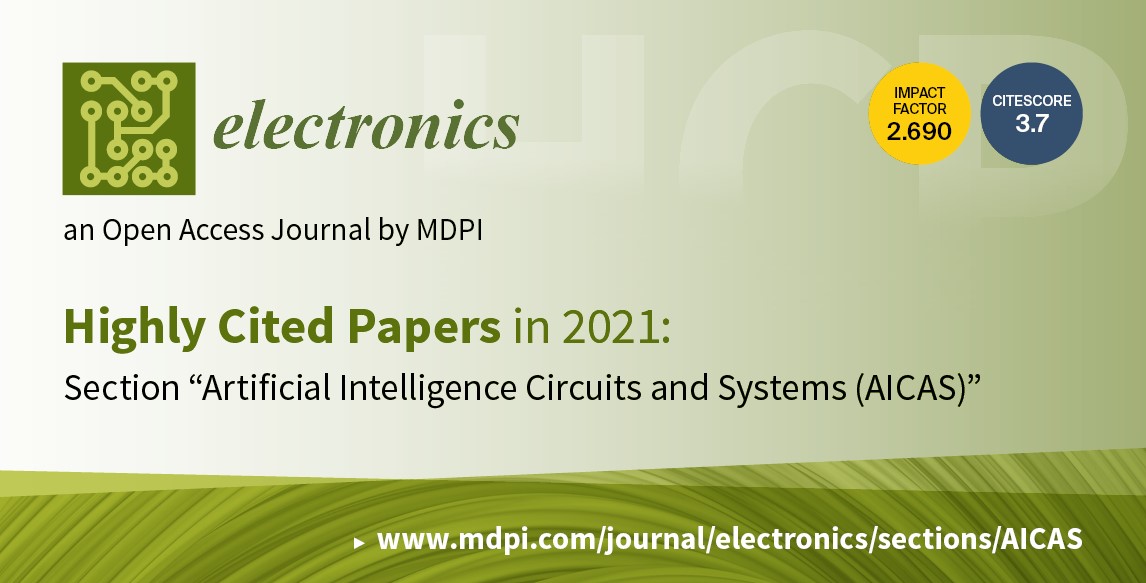
The “Artificial Intelligence Circuits and Systems” Section is focused on publications that are related to circuits and systems for artificial intelligence. This Section covers topics of interest within hardware-based deep learning AI and algorithmic deep learning AI using machine learning.
As they are of an open access format, you have free and unlimited access to the full text of all the articles published in our journal. We welcome you to read our most highly cited papers published in 2021 listed below:
1. “FPGA Implementation for CNN-Based Optical Remote Sensing Object Detection”
by Ning Zhang et al.
Electronics 2021, 10(3), 282; https://doi.org/10.3390/electronics10030282
Available online: https://www.mdpi.com/2079-9292/10/3/282
2. “Accelerating Neural Network Inference on FPGA-Based Platforms—A Survey”
by Ran Wu et al.
Electronics 2021, 10(9), 1025; https://doi.org/10.3390/electronics10091025
Available online: https://www.mdpi.com/2079-9292/10/9/1025
3. “FPGA Accelerator for Gradient Boosting Decision Trees”
by Adrián Alcolea et al.
Electronics 2021, 10(3), 314; https://doi.org/10.3390/electronics10030314
Available online: https://www.mdpi.com/2079-9292/10/3/314
4. “A Novel Hybrid Approach Based on Deep CNN to Detect Glaucoma Using Fundus Imaging”
by Rabbia Mahum et al.
Electronics 2021, 11(1), 26; https://doi.org/10.3390/electronics11010026
Available online: https://www.mdpi.com/2079-9292/11/1/26
5. “Design and Implementation of Deep Learning Based Contactless Authentication System Using Hand Gestures”
by Aveen Dayal et al.
Electronics 2021, 10(2), 182; https://doi.org/10.3390/electronics10020182
Available online: https://www.mdpi.com/2079-9292/10/2/182
6. “Forest Fire Smoke Recognition Based on Anchor Box Adaptive Generation Method”
by Enting Zhao et al.
Electronics 2021, 10(5), 566; https://doi.org/10.3390/electronics10050566
Available online: https://www.mdpi.com/2079-9292/10/5/566
7. “Underwater Target Recognition Based on Improved YOLOv4 Neural Network”
by Lingyu Chen et al.
Electronics 2021, 10(14), 1634; https://doi.org/10.3390/electronics10141634
Available online: https://www.mdpi.com/2079-9292/10/14/1634
8. “Recurrent Neural Network for Human Activity Recognition in Embedded Systems Using PPG and Accelerometer Data”
by Michele Alessandrini et al.
Electronics 2021, 10(14), 1715; https://doi.org/10.3390/electronics10141715
Available online: https://www.mdpi.com/2079-9292/10/14/1715
9. “Gaining a Sense of Touch Object Stiffness Estimation Using a Soft Gripper and Neural Networks”
by Michal Bednarek et al.
Electronics 2021, 10(1), 96; https://doi.org/10.3390/electronics10010096
Available online: https://www.mdpi.com/2079-9292/10/1/96
10. “Device-Free Crowd Counting Using Multi-Link Wi-Fi CSI Descriptors in Doppler Spectrum”
by Ramon F. Brena et al.
Electronics 2021, 10(3), 315; https://doi.org/10.3390/electronics10030315
Available online: https://www.mdpi.com/2079-9292/10/3/315
8 September 2022
Electronics | Highly Cited Papers in 2021 in the Section “Microelectronics”
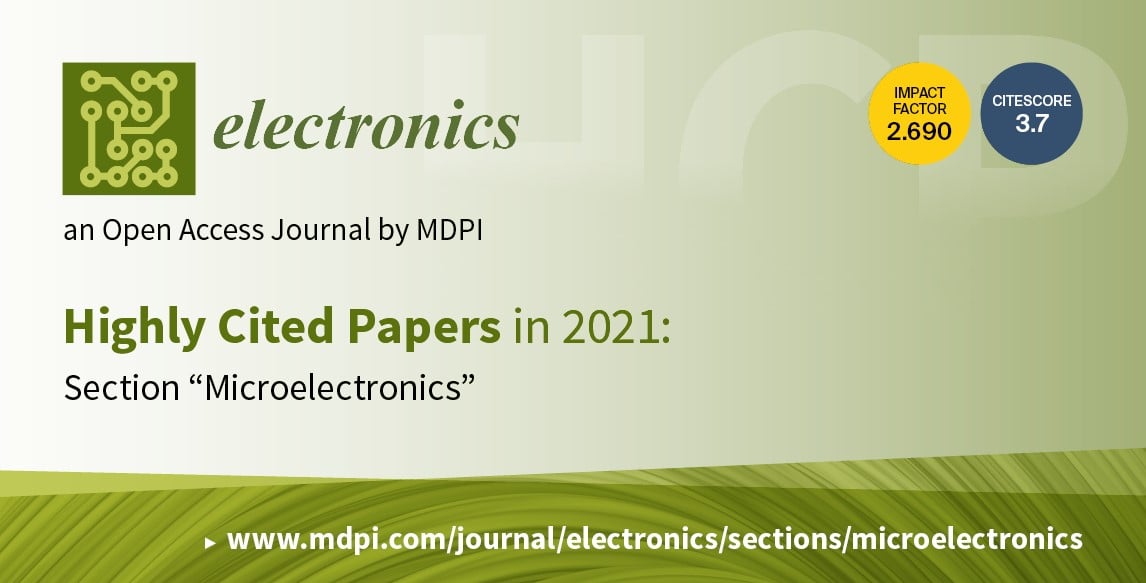
The “Microelectronics” Section is dedicated to publishing original research articles and cutting-edge reviews for the applications of microelectronics in emerging, frontier, and challenging technologies. Electronics operating in extreme environments, such as vacuum, space, harsh radiation, extreme cold, and other niche applications, are today pushing microelectronic design beyond the frontier of standard electronics.
As our journal follows an open access format, you have free and unlimited access to the full text of all the articles published in it. We welcome you to read our most highly cited papers published in 2021 listed below:
1. “A Unified and Open LTSPICE Memristor Model Library”
by Valeri Mladenov
Electronics 2021, 10(13), 1594; https://doi.org/10.3390/electronics10131594
Available online: https://www.mdpi.com/2079-9292/10/13/1594
2. “Sheet Resistance Measurements of Conductive Thin Films: A Comparison of Techniques”
by Mira Naftaly et al.
Electronics 2021, 10(8), 960; https://doi.org/10.3390/electronics10080960
Available online: https://www.mdpi.com/2079-9292/10/8/960
3. “A New Cost-Efficient Design of a Reversible Gate Based on a Nano-Scale Quantum-Dot Cellular Automata Technology”
by Saeid Seyedi et al.
Electronics 2021, 10(15), 1806; https://doi.org/10.3390/electronics10151806
Available online: https://www.mdpi.com/2079-9292/10/15/1806
4. “AlGaN Channel High Electron Mobility Transistors with Regrown Ohmic Contacts”
by Idriss Abid et al.
Electronics 2021, 10(6), 635; https://doi.org/10.3390/electronics10060635
Available online: https://www.mdpi.com/2079-9292/10/6/635
5. “UV-Based Technologies for SARS-CoV2 Inactivation: Status and Perspectives”
by Nicola Trivellin et al.
Electronics 2021, 10(14), 1703; https://doi.org/10.3390/electronics10141703
Available online: https://www.mdpi.com/2079-9292/10/14/1703
6. “A Novel OTA Architecture Exploiting Current Gain Stages to Boost Bandwidth and Slew-Rate”
by Francesco Centurelli et al.
Electronics 2021, 10(14), 1638; https://doi.org/10.3390/electronics10141638
Available online: https://www.mdpi.com/2079-9292/10/14/1638
7. “Influence of Active Channel Layer Thickness on SnO2 Thin-Film Transistor Performance”
by Do Won Kim et al.
Electronics 2021, 10(2), 200; https://doi.org/10.3390/electronics10020200
Available online: https://www.mdpi.com/2079-9292/10/2/200
8. “A Triple-Cascode X-Band LNA Design with Modified Post-Distortion Network”
by Cheng Cao et al.
Electronics 2021, 10(5), 546; https://doi.org/10.3390/electronics10050546
Available online: https://www.mdpi.com/2079-9292/10/5/546
9. “Effects of Active Layer Thickness on the Electrical Characteristics and Stability of High-Mobility Amorphous Indium–Gallium–Tin Oxide Thin-Film Transistors”
by Dae-Hwan Kim et al.
Electronics 2021, 10(11), 1295; https://doi.org/10.3390/electronics10111295
Available online: https://www.mdpi.com/2079-9292/10/11/1295
10. “All-Dielectric Metasurface for Sensing Microcystin-LR”
by Binze Ma et al.
Electronics 2021, 10(11), 1363; https://doi.org/10.3390/electronics10111363
Available online: https://www.mdpi.com/2079-9292/10/11/1363
8 September 2022
Electronics | Highly Cited Papers in 2021 in the Section “Electrical and Autonomous Vehicles”
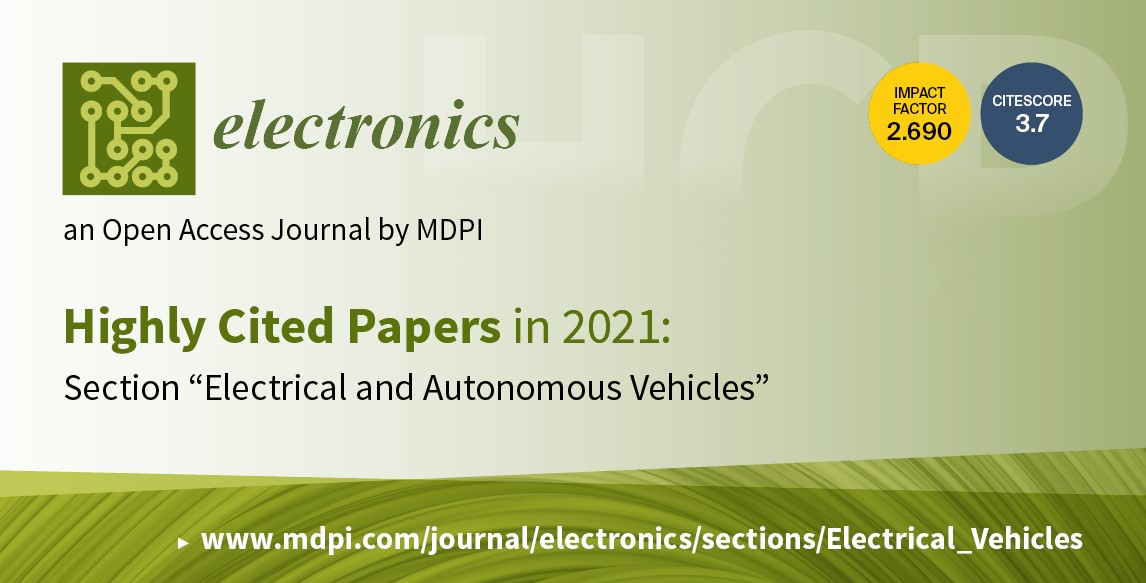
The “Electrical and Autonomous Vehicles” Section addresses the different perspectives on the design, development, and usage of electric and autonomous vehicles, as well as their impact on people’s lives, on cities, and on power as well as energy systems. We welcome papers on innovative scientific and technical developments, sound case studies, and reviews which are relevant and/or related to “Electrical and Autonomous Vehicles”. As they are of an open access format, you have free and unlimited access to the full text of all the articles published in our journal. We welcome you to read our most highly cited papers published in 2021 listed below:
1. “Review of Electric Vehicle Technologies, Charging Methods, Standards and Optimization Techniques”
by Syed Muhammad Arif et al.
Electronics 2021, 10(16), 1910; https://doi.org/10.3390/electronics10161910
Available online: https://www.mdpi.com/2079-9292/10/16/1910
2. “Is There a Predisposition towards the Use of New Technologies within the Traffic Field of Emerging Countries? The Case of the Dominican Republic”
by Francisco Alonso et al.
Electronics 2021, 10(10), 1208; https://doi.org/10.3390/electronics10101208
Available online: https://www.mdpi.com/2079-9292/10/10/1208
3. “An Enhanced Multicell-to-Multicell Battery Equalizer Based on Bipolar-Resonant LC Converter”
by Xuan Luo et al.
Electronics 2021, 10(3), 293; https://doi.org/10.3390/electronics10030293
Available online: https://www.mdpi.com/2079-9292/10/3/293
4. “A Simulated Annealing Algorithm and Grid Map-Based UAV Coverage Path Planning Method for 3D Reconstruction”
by Sichen Xiao Azar et al.
Electronics 2021, 10(7), 853; https://doi.org/10.3390/electronics10070853
Available online: https://www.mdpi.com/2079-9292/10/7/853
5. “A Survey of Trust Management in the Internet of Vehicles”
by Sarah Ali Siddiqui et al.
Electronics 2021, 10(18), 2223; https://doi.org/10.3390/electronics10182223
Available online: https://www.mdpi.com/2079-9292/10/18/2223
6. “Ego-Motion Estimation Using Recurrent Convolutional Neural Networks through Optical Flow Learning”
by Baigan Zhao et al.
Electronics 2021, 10(3), 222; https://doi.org/10.3390/electronics10030222
Available online: https://www.mdpi.com/2079-9292/10/3/222
7. “Machine Learning-Based Vehicle Trajectory Prediction Using V2V Communications and On-Board Sensors”
by Dongho Choi et al.
Electronics 2021, 10(4), 420; https://doi.org/10.3390/electronics10040420
Available online: https://www.mdpi.com/2079-9292/10/4/420
8. “An Optimization Model for Energy Community Costs Minimization Considering a Local Electricity Market between Prosumers and Electric Vehicles”
by Ricardo Faia et al.
Electronics 2021, 10(2), 129; https://doi.org/10.3390/electronics10020129
Available online: https://www.mdpi.com/2079-9292/10/2/129
9. “Deep Feature-Level Sensor Fusion Using Skip Connections for Real-Time Object Detection in Autonomous Driving”
by Vijay John et al.
Electronics 2021, 10(4), 424; https://doi.org/10.3390/electronics10040424
Available online: https://www.mdpi.com/2079-9292/10/4/424
10. “A Survey on Deep Learning Based Approaches for Scene Understanding in Autonomous Driving”
by Zhiyang Guo et al.
Electronics 2021, 10(4), 471; https://doi.org/10.3390/electronics10040471
Available online: https://www.mdpi.com/2079-9292/10/4/471
7 September 2022
Electronics | Highly Cited Papers in 2021 in the Section “Bioelectronics”

The primary focus of the “Bioelectronics” Section are topics that seek to utilize electronic knowledge and execution in the field of biology and medicine for health wellness with research efforts that cross disciplines, such as chemistry, life science, physics, electrical engineering, and materials science. Bioelectronic research works in a wide context, encompassing, for example, biosensors, bionics and biomaterials, DNA chips, lab-on-a-chip, innovative devices or advanced signal processes for the prevention, diagnosis, and treatment of physical and mental diseases, robotic devices for patient rehabilitation, bioelectromagnetics, artificial intelligence for improving health, conductive polymers, organic semiconductors, carbon nanotubes, graphene, wearable electronics, and implantable electronics, just to cite a few.
As they are published in an open access format, you have free and unlimited access to the full text of all the articles in our journal. We welcome you to read our most highly cited papers published in 2021:
1. “CNN Variants for Computer Vision: History, Architecture, Application, Challenges and Future Scope”
by Dulari Bhatt et al.
Electronics 2021, 10(20), 2470; https://doi.org/10.3390/electronics10202470
Available online: https://www.mdpi.com/2079-9292/10/20/2470
2. “Automated Workers’ Ergonomic Risk Assessment in Manual Material Handling Using sEMG Wearable Sensors and Machine Learning”
by Srimantha E. Mudiyanselage et al.
Electronics 2021, 10(20), 2558; https://doi.org/10.3390/electronics10202558
Available online: https://www.mdpi.com/2079-9292/10/20/2558
3. “State-of-the-Art Optical Devices for Biomedical Sensing Applications—A Review”
by N. L. Kazanskiy et al.
Electronics 2021, 10(8), 973; https://doi.org/10.3390/electronics10080973
Available online: https://www.mdpi.com/2079-9292/10/8/973
4. “Multiclass ECG Signal Analysis Using Global Average-Based 2-D Convolutional Neural Network Modeling”
by Muhammad Wasimuddin et al.
Electronics 2021, 10(2), 170; https://doi.org/10.3390/electronics10020170
Available online: https://www.mdpi.com/2079-9292/10/2/170
5. “Integration and Applications of Fog Computing and Cloud Computing Based on the Internet of Things for Provision of Healthcare Services at Home”
by Muhammad Ijaz et al.
Electronics 2021, 10(9), 1077; https://doi.org/10.3390/electronics10091077
Available online: https://www.mdpi.com/2079-9292/10/9/1077
6. “An Overview of Wearable Piezoresistive and Inertial Sensors for Respiration Rate Monitoring”
by Roberto De Fazio et al.
Electronics 2021, 10(17), 2178; https://doi.org/10.3390/electronics10172178
Available online: https://www.mdpi.com/2079-9292/10/17/2178
7. “Generating Synthetic ECGs Using GANs for Anonymizing Healthcare Data”
by Esteban Piacentino et al.
Electronics 2021, 10(4), 389; https://doi.org/10.3390/electronics10040389
Available online: https://www.mdpi.com/2079-9292/10/4/389
8. “Deep Learning Methods for Classification of Certain Abnormalities in Echocardiography”
by Imayanmosha Wahlang et al.
Electronics 2021, 10(4), 495; https://doi.org/10.3390/electronics10040495
Available online: https://www.mdpi.com/2079-9292/10/4/495
9. “Bone Metastasis Detection in the Chest and Pelvis from a Whole-Body Bone Scan Using Deep Learning and a Small Dataset”
by Da-Chuan Cheng et al.
Electronics 2021, 10(10), 1201; https://doi.org/10.3390/electronics10101201
Available online: https://www.mdpi.com/2079-9292/10/10/1201
10. “GaborPDNet: Gabor Transformation and Deep Neural Network for Parkinson’s Disease Detection Using EEG Signals”
by Hui Wen Loh et al.
Electronics 2021, 10(14), 1740; https://doi.org/10.3390/electronics10141740
Available online: https://www.mdpi.com/2079-9292/10/14/1740
7 September 2022
Electronics | Highly Cited Papers in 2021 in the Section “Artificial Intelligence”
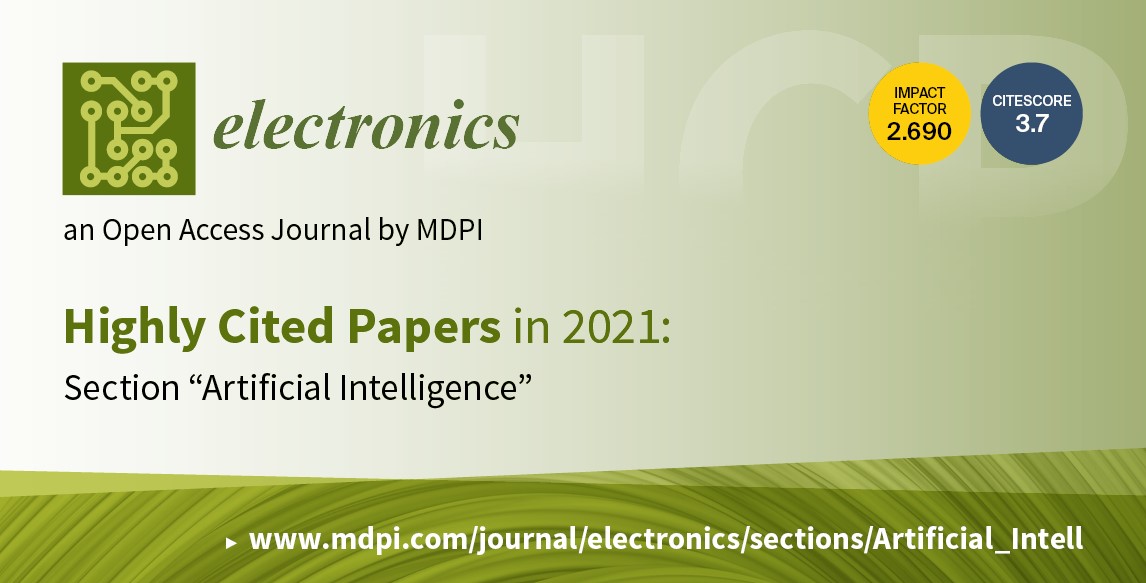
The Section “Artificial Intelligence” mainly covers topics of interest within unique hardware-based deep learning AI and algorithmic deep learning AI using machine learning. The purpose of this Section is to bring together researchers and engineers, from both academia and industry, to present novel ideas and solid research on the hardware and algorithmic aspects of advanced applications of deep-learning-based AI.
As they are published in an open access format, you have free and unlimited access to the full text of all of the articles published in our journal. We welcome you to read our most highly cited papers published in 2021 below:
1. “Biometric User Identification Based on Human Activity Recognition Using Wearable Sensors: An Experiment Using Deep Learning Models”
by Sakorn Mekruksavanich and Anuchit Jitpattanakul
Electronics 2021, 10(3), 308; https://doi.org/10.3390/electronics10030308
Available online: https://www.mdpi.com/2079-9292/10/3/308
2. “Novel Control Strategy for Enhancing Microgrid Operation Connected to Photovoltaic Generation and Energy Storage Systems”
by Dina Emara et al.
Electronics 2021, 10(11), 1261; https://doi.org/10.3390/electronics10111261
Available online: https://www.mdpi.com/2079-9292/10/11/1261
3. “Deep Convolutional Neural Network with RNNs for Complex Activity Recognition Using Wrist-Worn Wearable Sensor Data”
by Sakorn Mekruksavanich and Anuchit Jitpattanakul
Electronics 2021, 10(14), 1685; https://doi.org/10.3390/electronics10141685
Available online: https://www.mdpi.com/2079-9292/10/14/1685
4. “Artificial Neural Networks Based Optimization Techniques: A Review”
by Maher G. M. Abdolrasol et al.
Electronics 2021, 10(21), 2689; https://doi.org/10.3390/electronics10212689
Available online: https://www.mdpi.com/2079-9292/10/21/2689
5. “An Advanced CNN-LSTM Model for Cryptocurrency Forecasting”
by Ioannis E. Livieris et al.
Electronics 2021, 10(3), 287; https://doi.org/10.3390/electronics10030287
Available online: https://www.mdpi.com/2079-9292/10/3/287
6. “A Fuzzy Logic Model for Hourly Electrical Power Demand Modeling”
by Marco Antonio Islas et al.
Electronics 2021, 10(4), 448; https://doi.org/10.3390/electronics10040448
Available online: https://www.mdpi.com/2079-9292/10/4/448
7. “A Survey on Machine Learning-Based Performance Improvement of Wireless Networks: PHY, MAC and Network Layer”
by Merima Kulin et al.
Electronics 2021, 10(3), 318; https://doi.org/10.3390/electronics10030318
Available online: https://www.mdpi.com/2079-9292/10/3/318
8. “Improved YOLOv3 Network for Insulator Detection in Aerial Images with Diverse Background Interference”
by Chuanyang Liu et al.
Electronics 2021, 10(7), 771; https://doi.org/10.3390/electronics10070771
Available online: https://www.mdpi.com/2079-9292/10/7/771
9. “Concrete Cracks Detection and Monitoring Using Deep Learning-Based Multiresolution Analysis”
by Ahcene Arbaoui et al.
Electronics 2021, 10(15), 1772; https://doi.org/10.3390/electronics10151772
Available online: https://www.mdpi.com/2079-9292/10/15/1772
10. “EWOA-OPF: Effective Whale Optimization Algorithm to Solve Optimal Power Flow Problem”
by Mohammad H. Nadimi-Shahraki et al.
Electronics 2021, 10(23), 2975; https://doi.org/10.3390/electronics10232975
Available online: https://www.mdpi.com/2079-9292/10/23/2975
5 September 2022
Electronics | Call for Special Issue Proposal
Electronics (ISSN 2079-9292) is an international, peer-reviewed, and open access journal on the science of electronics and its applications. It publishes reviews, research articles, short communications, and letters. Our aim is to encourage scientists to publish their experimental and theoretical results in as much detail as possible. There is no restriction on the length of the papers.
The Electronics editorial team is pleased to announce this open call for Special Issue proposals, which gives a group of authors the opportunity to work on an interconnected set of papers on an innovative topic. We would like to solicit high-quality proposals, which will be evaluated by a competitive procedure on a rolling basis throughout the year.
Proposals within the scope of the journal are welcome. For more details, please see the following link: https://www.mdpi.com/journal/electronics/about.
If you would like to propose a Special Issue topic for this journal, please click on the following link and complete and submit the form: https://www.mdpi.com/journalproposal/sendproposalspecialissue/electronics. Our editors will get back to you shortly.
The duties and benefits of acting as a Guest Editor are as follows:
- Publishing both a review paper and a research paper free of charge in the Special Issue, in addition to a potential discount for additional papers that you invite;
- Redefining the title and scope of the Special Issue;
- Circulating the call for papers for the Special Issue and inviting submissions;
- Making decisions on whether a manuscript can be accepted based on the reports that we collect;
- Promoting the Special Issue and increasing its visibility at related academic conferences;
- If ten or more papers are published in the Special Issue, we can make a Special Issue book and send a hard copy to each Guest Editor.
The Editorial Office will take care of setting up the Special Issue website, arrange the promotional materials, assist with invitations to contribute papers, and take care of the rest of the administrative tasks associated with peer review, including inviting reviewers, collating reports, contacting authors, and professional production before publication.
Please do not hesitate to contact the Editorial Office ([email protected]) for further details and clarification.
We look forward to receiving your proposals.
Electronics Editorial Office
1 September 2022
Meet Us at the Seventh International Conference on Data Mining and Big Data (DMBD'2022), 21–24 November 2022, Beijing, China

The Seventh International Conference on Data Mining and Big Data (DMBD'2022) is an international forum allowing researchers and practitioners to exchange the latest theories, algorithms, models, and applications of data mining and big data, as well as artificial intelligence techniques. Data mining refers to examining big data sets to look for relevant or pertinent information. Big data contains huge amounts of data and information and is worthy of in-depth research.
DMBD'2022 is the seventh event, following the Guangzhou, Belgrade, Chiang Mai, Shanghai, Fukuoka and Bali events, at which hundreds of delegates from all over the world gathered to share their latest achievements, innovative ideas, and marvelous designs and their implementations.
This year's main theme is FinTech, and we will pay particular attention to technologies and applications in this area. We will also hold a quantitative trading competition.
The main topics of the conference are as follows:
1. FinTech- Quantitative investment;
- Market microstructure;
- Fraud detection;
- Risk prediction;
- Credit modeling;
- Individual financing;
- Financial theories;
- Financial activities modeling;
- Financial intelligent system.
- Machine learning;
- Statistical learning;
- Supervised learning;
- Unsupervised, self-supervised learning;
- Few-shot learning;
- Transfer learning;
- Reinforcement learning;
- Meta learning;
- Systems for data mining;
- Mining text, semi-structured, spatiotemporal, streaming, graph, web, multimedia data;
- Personalization and recommendation systems;
- Case-based reasoning;
- Similarity-based reasoning.
- Data models and architectures;
- Security, privacy, and trust;
- Data protection and integrity;
- Identity theft, data loss and leakage;
- Legal and ethical issues;
- Data analytics and metrics;
- Data representation and structures;
- Data management and processing;
- Data capturing and acquisition;
- Tools and technologies QoS in big data.
- Social networks analysis;
- Data searching and mining;
- Visualization of data;
- Personal data logging and quantified self;
- Context-aware data;
- Data economics;
- Applications of data mining and big data;
- Methodologies and use cases;
- Usability issues;
- Storages and network requirements;
- Network models and protocols;
- Big data in cloud and IoT;
- Techniques for big data processing.
28 July 2022
Meet Us at the 9th International Symposium on Microwave, Antenna, Propagation and EMC Technologies for Wireless Communications (MAPE 2022), 26–29 August 2022, Chengdu, China

The 9th International Symposium on Microwave, Antenna, Propagation, and EMC Technologies for Wireless Communications (MAPE 2022) will be held from 26 to 29 August 2022, in Chengdu, China. MAPE 2022 is sponsored by the University of Electronic Science and Technology of China and Beijing Jiaotong University and is technically supported by the IEEE Antennas and Propagation Society. MAPE was initiated to celebrate the 20th anniversary of the foundation of IEEE Beijing Section in 2005. After several years, it has become the flagship wireless event of the IEEE Beijing Section, geared toward wireless communication industry professionals interested in the latest research and design.
This symposium will provide a multi-discipline forum allowing researchers and technologists in the fields of microwave, antenna, propagation, and EMC technologies to present new ideas and contributions in the form of technical papers and panel discussions on applications in the ever-growing area of wireless communications, such as 6G, NB-IoT, and LoRa.
Scope:
The topics of the symposium will cover all aspects of the theory and techniques of microwaves, antennas, propagation, and EMC necessary for wireless communications. Potential topics include, but are not limited to, the following:
- Systems and Services:
- Mobile Satellite Communication;
- WLANs;
- Wireless Sensors and Ad Hoc Networks;
- MIMO Technologies;
- UWB and Impulse Radio;
- Space—Time Channel Characterization and Modeling;
- Terahertz Imaging and Sources;
- Cyber Electromagnetics;
- Internet of Things;
- High-Power Microwave Systems.
- Microwave Electronics:
- Passive and Active Circuits;
- Power Amplifiers, Linearization, and Active Components;
- MMICs and Microwave Circuits;
- Microwave and Millimeter Wave ICs;
- Millimeter Wave and Sub-Millmeter Wave Components;
- Circuits and Systems.
- Antennas:
- Microstrip and Printed Antennas;
- Active and Integrated Antennas;
- Array Antennas, Phased Arrays, and Feeding Circuits;
- Mobile and Base Station Antennas;
- Adaptive and Smart Antennas;
- Ultra-Wideband, Broadband, and Multi-band Antennas;
- Reconfigurable Antennas and Arrays;
- Millimeter Wave and Sub-Millimeter Wave Antennas;
- MEMS/Nanotechnology for Antennas.
- Propagation:
- Mobile and Indoor Propagation;
- Millimeter and Optical Wave Propagation;
- Earth-Space and Terrestrial Propagation;
- Ionospheric Propagation;
- Propagation and Channel Characterization;
- Diversity Techniques and Fading Countermeasures;
- Signal Separation and Interference Rejection;
- Random Media and Rough Surfaces.
- Electromagnetics:
- Electromagnetic Theory;
- Complex Media and Artificial Media;
- Computational Electromagnetics;
- Biomedical Application of Electromagnetic Waves;
- EM-Plasma Interaction;
- Space–Time Modulated Electromagnetics.
- EMC Technologies:
- EMC Sources: Electromagnetic Environment, Lightning, Intentional EMI and EMP, High Power Electromagnetics, ESD, and UWB;
- EMC of Components and Integrated Circuits, PCB, Electronic Packaging and Integration;
- EMC in Power Systems and Power Quality;
- System Level EMC;
- EMC in Power Electronics;
- EMC in Smart Grids;
- EMC in Internet of Things;
- EMC in Communications: Wired and Wireless Communications, 6G, UWB, and Power Line Communications;
- EMC Standards, Management, and Regulations;
- EMC in Aerospace.
For further information, please refer to the conference website, or contact us via [email protected].
11 July 2022
MDPI’s 2021 Best Paper Awards in “Engineering”—Winners Announced
The purpose of our Best Paper Awards is to promote and recognize the most impactful contributions published within MDPI journals.
The academic editors of each journal carefully selected reviews and research papers through a rigorous judging process based on criteria such as the scientific merit, overall impact, and the quality of presentation of the papers published in the journal.
We are honored to present the winners in the “Engineering” category, who were selected amongst extensive competition, and congratulate the authors for their outstanding scientific publications.
- “Position Control of Pneumatic Actuators Using Three-Mode Discrete-Valued Model Predictive Control”
by Haitao Qi, Gary M. Bone and Yile Zhang
Actuators 2019, 8(3), 56; doi: 10.3390/act8030056 - “Review of Electrothermal Actuators and Applications”
by Alissa Potekhina and Changhai Wang
Actuators 2019, 8(4), 69; doi: 10.3390/act8040069
- “Pre-Lithiation Strategies for Rechargeable Energy Storage Technologies: Concepts, Promises and Challenges”
by Florian Holtstiege, Peer Bärmann, Roman Nölle, Martin Winter and Tobias Placke
Batteries 2018, 4(1), 4; doi: 10.3390/batteries4010004 - “A Critical Review of Lithium-Ion Battery Recycling Processes from a Circular Economy Perspective”
by Omar Velázquez-Martínez, Johanna Valio, Annukka Santasalo-Aarnio, Markus Reuter and Rodrigo Serna-Guerrero
Batteries 2019, 5(4), 68; doi: 10.3390/batteries5040068 - “Critical Review of the Use of Reference Electrodes in Li-Ion Batteries: A Diagnostic Perspective”
by Rinaldo Raccichini, Marco Amores and Gareth Hinds
Batteries 2019, 5(1), 12; doi: 10.3390/batteries5010012 - “Life Cycle Analysis of Lithium-Ion Batteries for Automotive Applications”
by Qiang Dai, Jarod C. Kelly, Linda Gaines and Michael Wang
Batteries 2019, 5(2), 48; doi 10.3390/batteries5020048 - “Design Strategies for High Power vs. High Energy Lithium Ion Cells”
by Michael J. Lain, James Brandon and Emma Kendrick
Batteries 2019, 5(4), 64; doi: 10.3390/batteries5040064
- “Influence of Humidity on NO2-Sensing and Selectivity of Spray-CVD Grown ZnO Thin Film above 400 °C”
by Roussin Lontio Fomekong and Bilge Saruhan
Chemosensors 2019, 7(3), 42; doi: 10.3390/chemosensors7030042 - “Low Molecular Weight Fluorescent Probes (LMFPs) to Detect the Group 12 Metal Triad”
by Ashley D. Johnson, Rose M. Curtis and Karl J. Wallace
Chemosensors 2019, 7(2), 22; doi: 10.3390/chemosensors7020022
Journal of Marine Science and Engineering:
- “Marine Application of Fiber Reinforced Composites: A Review”
by Felice Rubino, Antonio Nisticò, Fausto Tucci and Pierpaolo Carlone
Mar. Sci. Eng. 2020, 8(1), 26; doi: 10.3390/jmse8010026 - “Numerical Simulation of Large Wave Heights from Super Typhoon Nepartak (2016) in the Eastern Waters of Taiwan”
by Shih-Chun Hsiao, Hongey Chen, Han-Lun Wu, Wei-Bo Chen, Chih-Hsin Chang, Wen-Dar Guo, Yung-Ming Chen and Lee-Yaw Lin
Mar. Sci. Eng. 2020, 8(3), 217; doi: 10.3390/jmse8030217 - “Development of Deterministic Artificial Intelligence for Unmanned Underwater Vehicles (UUV)”
by Timothy Sands
Mar. Sci. Eng. 2020, 8(8), 578; doi: 10.3390/jmse8080578
- “Solid Lubrication with MoS2: A Review”
by Mohammad R. Vazirisereshk, Ashlie Martini, David A. Strubbe and Mehmet Z. Baykara
Lubricants 2019, 7(7), 57; doi:10.3390/lubricants7070057 - “Investigations of the Friction Losses of Different Engine Concepts. Part 1: A Combined Approach for Applying Subassembly-Resolved Friction Loss Analysis on a Modern Passenger-Car Diesel Engine”
by Christoph Knauder, Hannes Allmaier, David E. Sander and Theodor Sams
Lubricants 2019, 7(5), 39; doi: 10.3390/lubricants7050039 - “A Discussion on Present Theories of Rubber Friction, with Particular Reference to Different Possible Choices of Arbitrary Roughness Cutoff Parameters”
by Andrea Genovese, Flavio Farroni, Antonio Papangelo and Michele Ciavarella
Lubricants 2019, 7(10), 85; doi: 10.3390/lubricants7100085
- “4D Printing of Multi-Hydrogels Using Direct Ink Writing in a Supporting Viscous Liquid”
by Takuya Uchida and Hiroaki Onoe
Micromachines 2019, 10(7), 433; doi: 10.3390/mi10070433 - “Enhanced Photocatalytic Performance and Mechanism of Au@CaTiO3 Composites with Au Nanoparticles Assembled on CaTiO3 Nanocuboids”
by Yuxiang Yan, Hua Yang, Zao Yi, Ruishan Li and Xiangxian Wang
Micromachines 2019, 10(4), 254; doi: 10.3390/mi10040254 - “Three-Dimensionally Structured Flexible Fog Harvesting Surfaces Inspired by Namib Desert Beetles”
by Jun Kyu Park and Seok Kim
Micromachines 2019, 10(3), 201; doi: 10.3390/mi10030201
- “Accelerating Biologics Manufacturing by Modeling or: Is Approval under the QbD and PAT Approaches Demanded by Authorities Acceptable without a Digital-Twin?”
by Steffen Zobel-Roos, Axel Schmidt, Fabian Mestmäcker, Mourad Mouellef, Maximilian Huter, Lukas Uhlenbrock, Martin Kornecki, Lara Lohmann, Reinhard Ditz and Jochen Strube
Processes 2019, 7(2), 94; doi: 10.3390/pr7020094 - “Multiscale Agent-Based and Hybrid Modeling of the Tumor Immune Microenvironment”
by Kerri-Ann Norton, Chang Gong, Samira Jamalian and Aleksander S. Popel
Processes 2019, 7(1), 37; doi: 10.3390/pr7010037 - “Dynamic Flowsheet Model Development and Sensitivity Analysis of a Continuous Pharmaceutical Tablet Manufacturing Process Using the Wet Granulation Route”
by Nirupaplava Metta, Michael Ghijs, Elisabeth Schäfer, Ashish Kumar, Philippe Cappuyns, Ivo Van Assche, Ravendra Singh, Rohit Ramachandran, Thomas De Beer, Marianthi Ierapetritou and Ingmar Nopens
Processes 2019, 7(4), 234; doi: 10.3390/pr7040234
- “A Decentralized Privacy-Preserving Healthcare Blockchain for IoT”
by Ashutosh Dhar Dwivedi, Gautam Srivastava, Shalini Dhar and Rajani Singh
Sensors 2019, 19(2), 326; doi: 10.3390/s19020326 - “The Progress of Glucose Monitoring—A Review of Invasive to Minimally and Non-Invasive Techniques, Devices and Sensors”
by Wilbert Villena Gonzales, Ahmed Toaha Mobashsher and Amin Abbosh
Sensors 2019, 19(4), 800; doi: 10.3390/s19040800 - “Contact-Based Methods for Measuring Respiratory Rate”
by Carlo Massaroni, Andrea Nicolò, Daniela Lo Presti, Massimo Sacchetti, Sergio Silvestri and Emiliano Schena
Sensors 2019, 19(4), 908; doi: 10.3390/s19040908
World Electric Vehicle Journal:
- “Dynamic Wireless Power Transfer Charging Infrastructure for Future EVs: From Experimental Track to Real Circulated Roads Demonstrations”
by Stéphane Laporte, Gérard Coquery, Virginie Deniau, Alexandre De Bernardinis and Nicolas Hautière
World Electr. Veh. J. 2019, 10(4), 84; doi: 10.3390/wevj10040084
11 July 2022
MDPI’s 2021 Young Investigator Awards in “Engineering”—Winners Announced
MDPI’s Young Investigator Awards recognize promising junior researchers, acknowledge their contributions, and enhance communication among scientists. We are proud to present the winners for the year 2021 in the “Engineering” category. The winners were selected by the journals’ editors.
We warmly congratulate the awarded Young Investigators for their outstanding contributions. MDPI will continue to provide support and recognition to the academic community.
- Amay J. Bandodkar, North Carolina State University, USA.
- Andrew S. Paluch, Miami University, USA.
- Mindy Levine, Ariel University, Israel.
- Amir H. Gandomi, University of Technology Sydney, Australia.
Journal of Marine Science and Engineering:
- Tiago Fazeres-Ferradosa, University of Porto, Portugal.
- Chen Lv, Nanyang Technological University (NTU), Singapore;
- Ignacio Gonzalez-Prieto, University of Malaga (UMA), Spain;
- Ning Sun, Nankai University, China.
- Anton Rassõlkin, Tallinn University of Technology, Estonia.
- Qammer H. Abbasi, Queen Mary University of London, UK;
- Chi Hwan Lee, Purdue University, USA.
11 July 2022
MDPI’s 2021 Travel Awards in “Engineering”—Winners Announced
We are proud to recognize the winners of MDPI’s 2021 Travel Awards in the “Engineering” category for their outstanding presentations and to present them with the prize.
MDPI journals regularly offer travel awards to encourage talented junior scientists to present their latest research at academic conferences in specific fields, which helps to increase their influence.
The winners mentioned below were carefully selected by the journal editors based on an outline of their research and the work to be presented at an academic conference.
We would like to warmly congratulate the winners of this year’s Travel Awards and wish them the greatest success with their future research endeavors. MDPI will continue to enhance communication among scientists.
- Matthew Wei Ming Tan, Nanyang Technological University, Singapore.
- Márcia de Sousa Oliveira, University of León, Spain;
- Caroline Sarah Taylor, University of Sheffield, UK;
- Raquel Viveiros, NOVA University of Lisbon, Portugal;
- Alfonso González Briones, University of Salamanca, Spain;
- Alen Horvat, University Carlos III Madrid, Spain;
- Marie Švecová, University of Chemistry and Technology, Czech Republic;
- Venanzio Giannella, University of Salerno, Italy;
- Michaël Lobet, University of Namur, Belgium;
- Lam Thi Ngoc Tran, National Research Council, Italy;
- Hanfei Mei, University of South Carolina, USA.
- Mert Nakip, Polish Academy of Sciences, Poland.
- Mengdi Bao, Rochester Institute of Technology, USA;
Yichi Su, Stanford University, USA.
- Karthik Panchabikesan, Concordia University, Canada;
- Xiaolei Yuan, Tongji University, China.
- Verónica Montes García, Université de Strasbourg & CNRS, France.
- Peng Hang, Nanyang Technological University, Singapore;
- Alfonso González Briones, University of Salamanca, Spain.
- Alberto Zingaro, Politecnico di Milano, Italy;
- Sarah E. Morris, Auburn University, USA.
- Angelo Aloisio, University of L’Aquila, Italy;
- André Filipe Castanheira Alves Furtado, University of Porto, Portugal.
Journal of Low Power Electronics and Applications:
- Tommaso Zanotti, University of Modena and Reggio Emilia, Italy.
Journal of Manufacturing and Materials Processing:
- Nagalingam Arun Prasanth, Rolls-Royce@NTU Corporate Lab, Singapore.
- Muhammad Jamil, Nanjing University of Aeronautics and Astronautics (NUAA), China;
- Mariagrazia Tristano, Sheffield Hallam University, UK.
- Michele Schlich, University of Cagliari, Italy;
- Álvaro Santana Mayor, University of La Laguna, Spain.
- Eleonora Macchia, Åbo Akademi University, Finland;
- Alfonso Gonzalez Briones, University of Salamanca, Spain;
- Saúl Vallejos Calzada, University of Burgos, Spain;
- Ana Novo, University of Vigo, Spain;
- Yalin Liu, Macau University of Science and Technology, China;
- Marilena Giglio, Politecnico of Bari, Italy;
- Yuzhi Shi, Nanyang Technological University (NTU), Singapore.
11 July 2022
MDPI’s 2021 Outstanding Reviewer Awards in “Engineering”—Winners Announced
In order to acknowledge our reviewers, who so generously dedicate their time to reviewing papers and demonstrate diligence, professionalism, and timeliness when reviewing manuscripts, MDPI journals regularly offer outstanding reviewer awards to scholars who participate in the peer-review process.
We are proud to recognize the winners for the year 2021 in the “Engineering” category for their outstanding contributions among extensive competition by presenting them with an Outstanding Reviewer Award.
We would like to take this opportunity to congratulate all of the winners on their achievement. MDPI will continue to provide support and recognition to the academic community.
- Ryszard Dindorf, Kielce University of Technology, Poland.
- Khaled Giasin, University of Portsmouth, UK;
- Jakub Krzysztof Grabski, University of Technology, Poland;
- Marcos Tostado-Véliz, University of Jaén, Spain;
- Luigi Pugliese, University of Calabria, Italy;
- Francesco Bennardo, University of Catanzaro, Italy;
- Heriberto Perez-Acebo, University of the Basque Country UPV/EHU, Spain.
- Amir Hatamie, University of Gothenburg, Sweden.
- Francesco Fiorito, Polytechnic University of Bari, Italy;
- Paul G. O’Brien, York University, Canada.
- Verónica Montes García, University of Strasbourg, France.
- Piotr Gierlak, Rzeszow University of Technology, Poland;
- Sebastian A. Nugroho, University of Michigan, USA;
- Viorel Paleu, Gheorghe Asachi Technical University of Iasi, Romania.
- Marcin Dębowski, University of Warmia and Mazury in Olsztyn, Poland;
- Bartłomiej Zieniuk, Warsaw University of Life Sciences, Poland;
- Zbigniew Nadolny, Poznan University of Technology, Poland;
- Attila Egedy, University of Pannonia, Hungary;
- Seok-Ho Rhi, Chungbuk National University, Korea.
- Hojong Choi, Kumoh National Institute of Technology, Korea;
- Li Fu, Hangzhou Dianzi University, China;
- Leonardo De Mello Honorio, Federal University of Juiz De Fora Juiz De Fora, Brazil;
- Mario Versaci, Mediterranea University, Italy;
- Robertas Damasevicius, Kaunas University of Technology, Lithuania.
8 July 2022
Electronics | 5th Webinar on Advanced Techniques for Low Power and Ultra Low Power ICs, 14 July 2022

Date: 14 July 2022
Time: 3:00 p.m. CEST | 9:00 a.m. EDT | 9:00 p.m. CST Asia
Webinar ID: 890 5218 6355
Register for free here: https://electronics-5.sciforum.net/#registration
In this webinar, the focus will be on advanced techniques for the design of effective and reliable low-power and ultra-low-power integrated circuits attributed to our invited speakers. Audience members will have the opportunity to expand their knowledge and engage in a Q&A with the speakers.
Chair:

Name: Prof. Dr. Anna Richelli
Affiliation: Editorial Board Member of the Section “Circuit and Signal Processing” in Electronics
Interests: design of ultra-low-voltage analog circuits; electromagnetic interference analysis in integrated circuits; integrated voltage converters; CMOS operational amplifiers
Speakers:

Name: Dr. Pedro Filipe Leite Correia de Toledo
Affiliation: Topical Advisory Panel Member of the Section “Circuit and Signal Processing” in Electronics
Presentation title: “Nanoscale Digital-Based Analog Processing: How to Design Analog Building Blocks Using Only Digital Gates”
Dr. Pedro Filipe Leite Correia de Toledo is an Electronic Engineer with more than ten years of experience developing CMOS RF/Analog Integrated Circuits. Currently, he is a Mixed-Signal IC designer in Synopsys, working in SERDES designs with sub-10nm CMOS technology. He has received a Ph.D. at Polito and UFRGS (Joint-Degree Ph.D.) working with digital-based analog processing for IoT applications. He has finished his M.Sc. degree in microelectronics from UFRGS, working with low thermal sensitivity analog applications based on ZTC and GZTC MOSFET bias point modeling. He has also received a BSEE (2010), and an RF IC Designer Specialization Course (IC-Brazil Program–2011) at the Federal University of Pernambuco (UFPE) and the Federal University of Rio Grande do Sul (UFRGS), respectively. He has also won the award for the best master's thesis in the design, CAD, and IC Test category in 2015 from the Brazilian Society of Microelectronics (SBMICRO). In 2019, he was awarded the Best Student Paper Award of the 2019 IEEE International Conference on Electronics, Circuits, and Systems (ICECS 2019). He possesses a sound understanding of fundamental principles and trends in electronic engineering. He can work and study at the same time, and is eager to learn and adapt to new environments, products, and projects.

Name: Dr. Roberto Rubino
Affiliation: Department of Electronics and Telecommunications, Politecnico di Torino, 10129 Turin, Italy
Presentation title: “Relaxation Digital to Analog Converter”
Dr. Roberto Rubino received his B.Sc. degree and his M.Sc. degree in electronic engineering at Politecnico di Torino, Italy. Currently, he is continuing his research as a Ph.D. student in Politecnico di Torino, as part of the research activity on "Ultra-Low Power, Mostly Digital, Integrated Interfaces for the Internet of Things".

Name: Prof. Dr. Inhee Lee
Affiliation: Editorial Board Member of the Section “Circuit and Signal Processing” in Electronics
Presentation title: “Millimeter-Scale Smart Sensing System”
Prof. Dr. Inhee Lee received his B.Sc. and M.Ss. degrees in electrical and electronic engineering from Yonsei University, Seoul, Korea, in 2006 and 2008, respectively, and a Ph.D. degree in electrical engineering from the University of Michigan, Ann Arbor, MI, USA, in 2014. From 2015 to 2019, he was with the University of Michigan as an assistant research scientist. In 2019, he joined the University of Pittsburgh as an assistant professor. His research includes adaptive circuit/system design, ultra-low-power power management circuits, and energy-efficient sensor interface circuits. Additionally, he is developing millimeter-scale or even smaller sensing/computing systems for ecological, biomedical, energy exploration, and internet-of-things applications.
For any questions about the webinar, please send an email to [email protected].
28 June 2022
2021 Impact Factors - Released
The 2021 citation metrics have been released in the Journal Citation Reports (JCR), and we’re pleased to announce the following results for MDPI journals:

| Journal | Impact Factor | Rank | Category |
| Antioxidants | 7.675 | Q1 | Food Science & Technology |
| Biochemistry & Molecular Biology | |||
| Chemistry, Medicinal | |||
| Cells | 7.666 | Q2 | Cell Biology |
| Nutrients | 6.706 | Q1 | Nutrition & Dietetics |
| Cancers | 6.575 | Q1 | Oncology |
| Pharmaceutics | 6.525 | Q1 | Pharmacology & Pharmacy |
| International Journal of Molecular Sciences | 6.208 | Q1 | Biochemistry & Molecular Biology |
| Q2 | Chemistry, Multidisciplinary | ||
| Marine Drugs | 6.085 | Q1 | Chemistry, Medicinal |
| Pharmacology & Pharmacy | |||
| Biomolecules | 6.064 | Q2 | Biochemistry & Molecular Biology |
| Batteries * | 5.938 | Q2 | Electrochemistry |
| Energy & Fuels | |||
| Materials Science, Multidisciplinary | |||
| Viruses | 5.818 | Q2 | Virology |
| Biosensors | 5.743 | Q1 | Chemistry, Analytical |
| Instruments & Instrumentation | |||
| Q2 | Nanoscience & Nanotechnology | ||
| Journal of Fungi | 5.724 | Q1 | Mycology |
| Q2 | Microbiology | ||
| Nanomaterials | 5.719 | Q1 | Physics, Applied |
| Q2 | Chemistry, Multidisciplinary | ||
| Materials Science, Multidisciplinary | |||
| Nanoscience & Nanotechnology | |||
| Metabolites | 5.581 | Q2 | Biochemistry & Molecular Biology |
| Foods | 5.561 | Q1 | Food Science & Technology |
| Drones * | 5.532 | Q2 | Remote Sensing |
| Remote Sensing | 5.349 | Q1 | Geosciences, Multidisciplinary |
| Imaging Science & Photographic Technology | |||
| Q2 | Remote Sensing | ||
| Environmental Sciences | |||
| Journal of Theoretical and Applied Electronic Commerce Research | 5.318 | Q2 | Business |
| Antibiotics | 5.222 | Q1 | Pharmacology & Pharmacy |
| Q2 | Infectious Diseases | ||
| Pharmaceuticals | 5.215 | Q1 | Pharmacology & Pharmacy |
| Q2 | Chemistry, Medicinal | ||
| Biology | 5.168 | Q1 | Biology |
| Fermentation | 5.123 | Q2 | Biotechnology & Applied Microbiology |
| Toxins | 5.075 | Q1 | Toxicology |
| Q2 | Food Science & Technology | ||
| Bioengineering * | 5.046 | Q2 | Engineering, Biomedical |
| Polymers | 4.967 | Q1 | Polymer Science |
| Journal of Clinical Medicine | 4.964 | Q2 | Medicine, General & Internal |
| Vaccines | 4.961 | Q2 | Immunology |
| Medicine, Research & Experimental | |||
| Molecules | 4.927 | Q2 | Chemistry, Multidisciplinary |
| Biochemistry & Molecular Biology | |||
| Microorganisms | 4.926 | Q2 | Microbiology |
| Journal of Functional Biomaterials * | 4.901 | Q2 | Engineering, Biomedical |
| Materials Science, Biomaterials | |||
| Biomedicines | 4.757 | Q2 | Medicine, Research & Experimental |
| Pharmacology & Pharmacy | |||
| Biochemistry & Molecular Biology | |||
| Plants | 4.658 | Q1 | Plant Sciences |
| International Journal of Environmental Research and Public Health | 4.614 | Q1 | Public, Environmental & Occupational Health (SSCI) |
| Q2 | Public, Environmental & Occupational Health (SCIE) | ||
| Environmental Sciences (SCIE) | |||
| Membranes | 4.562 | Q1 | Polymer Science |
| Q2 | Engineering, Chemical | ||
| Materials Science, Multidisciplinary | |||
| Chemistry, Physical | |||
| Pathogens | 4.531 | Q2 | Microbiology |
| Catalysts | 4.501 | Q2 | Chemistry, Physical |
| Toxics | 4.472 | Q2 | Toxicology |
| Environmental Sciences | |||
| Gels | 4.432 | Q1 | Polymer Science |
| Journal of Cardiovascular Development and Disease | 4.415 | Q2 | Cardiac & Cardiovascular Systems |
| Chemosensors | 4.229 | Q1 | Instruments & Instrumentation |
| Q2 | Chemistry, Analytical | ||
| Q3 | Electrochemistry | ||
| Genes | 4.141 | Q2 | Genetics & Heredity |
| Diagnostics | 3.992 | Q2 | Medicine, General & Internal |
| Agronomy | 3.949 | Q1 | Agronomy |
| Plant Sciences | |||
| Land | 3.905 | Q2 | Environmental Studies |
| Sustainability | 3.889 | Q2 | Environmental Sciences (SCIE) |
| Environmental Studies (SSCI) | |||
| Q3 | Green & Sustainable Science & Technology (SCIE) | ||
| Q4 | Green & Sustainable Science & Technology (SSCI) | ||
| Sensors | 3.847 | Q2 | Instruments & Instrumentation |
| Chemistry, Analytical | |||
| Engineering, Electrical & Electronic | |||
| Materials | 3.748 | Q1 | Metallurgy & Metallurgical Engineering |
| Q2 | Physics, Applied | ||
| Physics, Condensed Matter | |||
| Q3 | Materials Science, Multidisciplinary | ||
| Chemistry, Physical | |||
| Biomimetics * | 3.743 | Q2 | Engineering, Multidisciplinary |
| Q3 | Materials Science, Biomaterials | ||
| Tropical Medicine and Infectious Disease * | 3.711 | Q1 | Tropical Medicine |
| Q2 | Parasitology | ||
| Q3 | Infectious Diseases | ||
| Lubricants * | 3.584 | Q2 | Engineering, Mechanical |
| Fractal and Fractional | 3.577 | Q1 | Mathematics, Interdisciplinary Applications |
| Water | 3.530 | Q2 | Water Resources |
| Q3 | Environmental Sciences | ||
| Micromachines | 3.523 | Q2 | Instruments & Instrumentation |
| Physics, Applied | |||
| Chemistry, Analytical | |||
| Q3 | Nanoscience & Nanotechnology | ||
| Journal of Personalized Medicine | 3.508 | Q2 | Medicine, General & Internal |
| Health Care Sciences & Services | |||
| Agriculture | 3.408 | Q1 | Agronomy |
| Processes | 3.352 | Q2 | Engineering, Chemical |
| Separations | 3.344 | Q2 | Chemistry, Analytical |
| Magnetochemistry | 3.336 | Q2 | Chemistry, Inorganic & Nuclear |
| Q3 | Chemistry, Physical | ||
| Materials Science, Multidisciplinary | |||
| Brain Sciences | 3.333 | Q3 | Neurosciences |
| Buildings | 3.324 | Q2 | Construction & Building Technology |
| Engineering, Civil | |||
| Forests | 3.282 | Q1 | Forestry |
| Energies | 3.252 | Q3 | Energy & Fuels |
| Life | 3.251 | Q2 | Biology |
| Coatings | 3.236 | Q2 | Materials Science, Coatings & Films |
| Physics, Applied | |||
| Q3 | Materials Science, Multidisciplinary | ||
| Animals | 3.231 | Q1 | Agriculture, Dairy & Animal Science |
| Veterinary Sciences | |||
| Journal of Intelligence * | 3.176 | Q2 | Psychology, Multidisciplinary |
| Fishes | 3.170 | Q1 | Marine & Freshwater Biology |
| Q2 | Fisheries | ||
| Healthcare | 3.160 | Q2 | Health Policy & Services (SSCI) |
| Health Care Sciences & Services (SCIE) | |||
| Inorganics * | 3.149 | Q2 | Chemistry, Inorganic & Nuclear |
| Insects | 3.139 | Q1 | Entomology |
| Atmosphere | 3.110 | Q3 | Meteorology & Atmospheric Sciences |
| Environmental Sciences | |||
| Current Oncology | 3.109 | Q3 | Oncology |
| ISPRS International Journal of Geo-Information | 3.099 | Q2 | Geography, Physical |
| Q3 | Computer Science, Information Systems | ||
| Remote Sensing | |||
| Diversity | 3.029 | Q2 | Biodiversity Conservation |
| Ecology | |||
| Tomography | 3.000 | Q3 | Radiology, Nuclear Medicine & Medical Imaging |
| Current Issues in Molecular Biology | 2.976 | Q3 | Biochemistry & Molecular Biology |
| Medicina | 2.948 | Q3 | Medicine, General & Internal |
| Symmetry | 2.940 | Q2 | Multidisciplinary Sciences |
| Horticulturae | 2.923 | Q1 | Horticulture |
| Machines | 2.899 | Q2 | Engineering, Mechanical |
| Engineering, Electrical & Electronic | |||
| Systems * | 2.895 | Q2 | Social Sciences, Interdisciplinary |
| Applied Sciences | 2.838 | Q2 | Engineering, Multidisciplinary |
| Physics, Applied | |||
| Q3 | Chemistry, Multidisciplinary | ||
| Materials Science, Multidisciplinary | |||
| Children | 2.835 | Q2 | Pediatrics |
| Minerals | 2.818 | Q2 | Mining & Mineral Processing |
| Mineralogy | |||
| Geochemistry & Geophysics | |||
| Universe | 2.813 | Q2 | Astronomy & Astrophysics |
| Q3 | Physics, Particles & Fields | ||
| Journal of Marine Science and Engineering | 2.744 | Q1 | Engineering, Marine |
| Q2 | Oceanography | ||
| Engineering, Ocean | |||
| Entropy | 2.738 | Q2 | Physics, Multidisciplinary |
| Fire * | 2.726 | Q2 | Forestry |
| Q3 | Ecology | ||
| Metals | 2.695 | Q2 | Metallurgy & Metallurgical Engineering |
| Q3 | Materials Science, Multidisciplinary | ||
| Electronics | 2.690 | Q3 | Engineering, Electrical & Electronic |
| Computer Science, Information Systems | |||
| Physics, Applied | |||
| Crystals | 2.670 | Q2 | Crystallography |
| Q3 | Materials Science, Multidisciplinary | ||
| Aerospace | 2.660 | Q1 | Engineering, Aerospace |
| Mathematics | 2.592 | Q1 | Mathematics |
| Photonics | 2.536 | Q3 | Optics |
| Actuators | 2.523 | Q2 | Instruments & Instrumentation |
| Q3 | Engineering, Mechanical | ||
| Veterinary Sciences | 2.518 | Q2 | Veterinary Sciences |
| Behavioral Sciences * | 2.286 | Q3 | Psychology, Multidisciplinary |
| Axioms * | 1.824 | Q2 | Mathematics, Applied |
For more information on Impact Factors and what it means to index academic journals, please visit our related blog posts.
* Journals given their first Impact Factor in 2022
Source: 2021 Journal Impact Factors, Journal Citation Reports TM (Clarivate, 2022)
23 June 2022
Electronics 2021 Best Ph.D. Thesis Award—Winner Announced
Dear colleagues,
As the Editor-in-Chief of Electronics (ISSN: 2079-9292), it is my pleasure to announce the winner of the Electronics 2021 Best Ph.D. Thesis Award. This prize was aimed at awarding a Ph.D. student who has produced a highly anticipated academic potential thesis.
The award has been granted to:
- “Low Dose Analytical Electron Microscopy of Hybrid Perovskite Photovoltaic Devices”
by Felix Utama Kosasih, University of Cambridge, UK
The winner will receive CHF 800, a certificate, and an offer to publish a featured paper in Electronics with the article processing charge (APC) waived before the end of 2022.
On behalf of the evaluation committee, Prof. Dr. Leonardo Pantoli, Prof. Dr. Olivier Sename and Prof. Dr. Rashid Mehmood, I would like to congratulate the winner on his accomplishment. We would also like to take this opportunity to thank all the nominated research groups of the above exceptional thesis for their contributions to Electronics and thank the award committee for voting and helping with this award.
Prof. Dr. Flavio Canavero
Editor-in-Chief, Electronics
9 June 2022
2021 CiteScores - Released
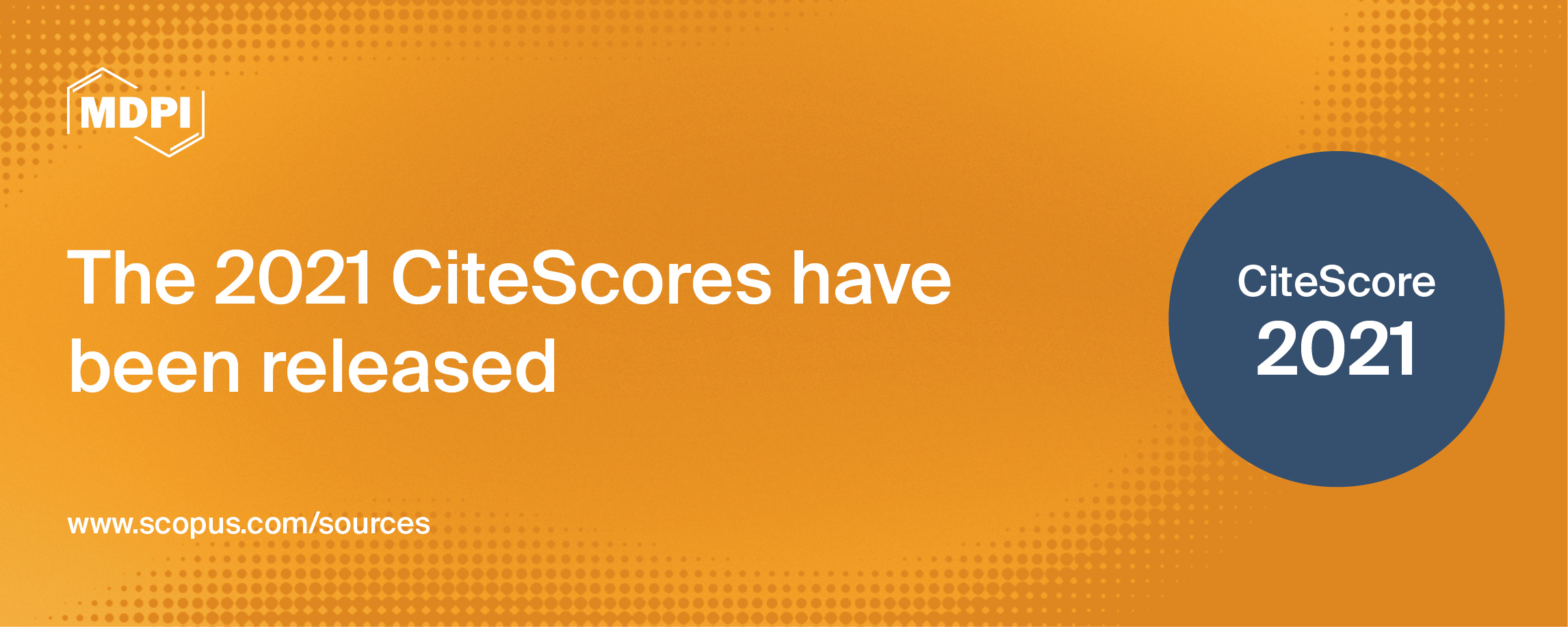
The 2021 citation metrics have been officially released in Scopus!
We are pleased to announce that 182 MDPI journals are included, of which:
● 21 journals received their first CiteScore.
● 85% of journals increased their CiteScore from 2020.
● 155 journals (85%) ranked above average, in at least one category.
The following 65 MDPI journals (36%) ranked among the top 25% of journals, in at least one category:
|
Journal |
CiteScore |
Quartile |
Category |
|
10.1 |
Q1 |
Genetics |
|
|
10.0 |
Q1 |
Biomedical Engineering |
|
|
8.1 |
Q1 |
Pharmacology, Toxicology and Pharmaceutics (miscellaneous) |
|
|
7.9 |
Q1 |
Electrical and Electronic Engineering |
|
|
7.9 |
Q1 |
Nutrition and Dietetics |
|
|
7.4 |
Q1 |
General Earth and Planetary Sciences |
|
|
7.2 |
Q1 |
Computer Science Applications |
|
|
6.9 |
Q1 |
Inorganic Chemistry |
|
|
6.9 |
Q1 |
Computer Networks and Communications |
|
|
6.7 |
Q1 |
General Biochemistry, Genetics and Molecular Biology |
|
|
6.6 |
Q1 |
General Chemical Engineering |
|
|
6.6 |
Q1 |
Health, Toxicology and Mutagenesis |
|
|
6.6 |
Q1 |
Infectious Diseases |
|
|
6.5 |
Q1 |
Food Science |
|
|
6.5 |
Q1 |
Civil and Structural Engineering |
|
|
6.4 |
Q1 |
Nature and Landscape Conservation |
|
|
6.4 |
Q1 |
Instrumentation |
|
|
6.1 |
Q1 |
Management Information Systems |
|
|
5.9 |
Q1 |
Chemistry (miscellaneous) |
|
|
5.7 |
Q1 |
Polymers and Plastics |
|
|
5.6 |
Q1 |
Engineering (miscellaneous) |
|
|
5.5 |
Q1 |
General Environmental Science |
|
|
5.5 |
Q1 |
Urban Studies |
|
|
5.4 |
Q2 |
Computer Networks and Communications |
|
|
5.3 |
Q1 |
Food Science |
|
|
5.3 |
Q1 |
Plant Science |
|
|
5.2 |
Q1 |
Ecology, Evolution, Behavior and Systematics |
|
|
5.2 |
Q1 |
General Engineering |
|
|
Journal of Open Innovation: Technology, Market, and Complexity |
5.1 |
Q1 |
Development |
|
5.0 |
Q1 |
Chemistry (miscellaneous) |
|
|
5.0 |
Q1 |
Control and Optimization |
|
|
5.0 |
Q1 |
Geography, Planning and Development |
|
|
5.0 |
Q1 |
Geography, Planning and Development |
|
|
4.9 |
Q1 |
Forestry |
|
|
4.9 |
Q1 |
Control and Optimization |
|
|
4.9 |
Q1 |
Soil Science |
|
|
4.8 |
Q1 |
General Earth and Planetary Sciences |
|
|
4.8 |
Q1 |
Mechanical Engineering |
|
|
4.8 |
Q1 |
Public Health, Environmental and Occupational Health |
|
|
4.8 |
Q1 |
Geography, Planning and Development |
|
|
International Journal of Environmental Research and Public Health |
4.5 |
Q1 |
Public Health, Environmental and Occupational Health |
|
4.5 |
Q1 |
Physical Therapy, Sports Therapy and Rehabilitation |
|
|
4.4 |
Q1 |
Mathematical Physics |
|
|
4.4 |
Q1 |
General Medicine |
|
|
4.3 |
Q1 |
General Mathematics |
|
|
4.2 |
Q1 |
Surgery |
|
|
4.1 |
Q1 |
Health Professions (miscellaneous) |
|
|
4.1 |
Q1 |
Plant Science |
|
|
4.0 |
Q1 |
General Engineering |
|
|
4.0 |
Q1 |
Forestry |
|
|
4.0 |
Q1 |
Education |
|
|
3.9 |
Q1 |
General Pharmacology, Toxicology and Pharmaceutics |
|
|
3.9 |
Q1 |
Applied Mathematics |
|
|
3.8 |
Q1 |
Development |
|
|
3.8 |
Q1 |
Architecture |
|
|
3.8 |
Q1 |
Metals and Alloys |
|
|
3.5 |
Q1 |
Communication |
|
|
3.4 |
Q1 |
General Social Sciences |
|
|
2.9 |
Q1 |
General Mathematics |
|
|
2.8 |
Q1 |
Analysis |
|
|
2.7 |
Q1 |
General Veterinary |
|
|
2.6 |
Q1 |
Algebra and Number Theory |
|
|
1.8 |
Q1 |
Conservation |
|
|
1.0 |
Q1 |
Religious Studies |
|
|
0.9 |
Q1 |
Philosophy |
Source: 2021 CiteScores™ (Elsevier)
7 June 2022
Electronics 2021 Best Paper Awards for Anniversary Special Issues—Winners Announced
Dear colleagues,
As the Editor-in-Chief of Electronics (ISSN: 2079-9292), I am pleased to announce the winners of the “Electronics 2021 Best Paper Award for Anniversary Special Issues”.
The awards have been granted to the authors of the following two research articles:
“Towards Human Stress and Activity Recognition: A Review and a First Approach Based on Low-Cost Wearables”
by Juan Antonio Castro-García, Alberto Jesús Molina-Cantero, Isabel María Gómez-González, Sergio Lafuente-Arroyo and Manuel Merino-Monge
Electronics 2022, 11(1), 155; doi:10.3390/electronics11010155
This article was featured in the Special Issue “10th Anniversary of Electronics: Recent Advances in Computer Science & Engineering”.
“Semi-Automatic Guidance vs. Manual Guidance in Agriculture: A Comparison of Work Performance in Wheat Sowing”
by Antonio Scarfone, Rodolfo Picchio, Angelo del Giudice, Francesco Latterini, Paolo Mattei, Enrico Santangelo and Alberto Assirelli
Electronics 2021, 10(7), 825; doi:10.3390/electronics10070825
This article was featured in the Special Issue “10th Anniversary of Electronics: New Advances in Systems and Control Engineering”.
Each winner will receive CHF 500, a certificate, and the opportunity to publish a paper free of charge in Electronics in 2022 after undergoing the normal peer-review procedure.
On behalf of the Assessment Committee members Prof. Lei Zhang, Prof. Mohamed Benbouzid, and Prof. José L. Abellán, I congratulate the winners on their accomplishments. I would also like to take this opportunity to thank all the nominated research groups for their contributions to Electronics and the Award Committee for their efforts in the evaluation process.
Prof. Dr. Flavio Canavero
Editor-in-Chief of Electronics
1 June 2022
Recruiting Topical Advisory Panel Members for Electronics
The journal Electronics (ISSN 2079-9292) is recruiting for a newly created position—Topical Advisory Panel Member. The main responsibility of the new members of the Topical Advisory Panel is to provide support to Guest Editors and Section Board Members regularly. For more details, please visit the following website: https://www.mdpi.com/editors.
Electronics is an international, peer-reviewed, open access journal on the science of electronics and its applications and is published semimonthly online by MDPI. The Polish Society of Applied Electromagnetics (PTZE) is affiliated with Electronics. The aims and scope of the journal can be found at the following link: https://www.mdpi.com/journal/electronics/about.
Each year, the members’ performance is evaluated, and outstanding members are promoted to the Editorial Board by the Editor-in-Chief.
To qualify as a Topical Advisory Panel Member, applicants must:
- Have expertise and experience in a field related to the journal;
- Be within approximately 10 years of receiving a Ph.D.;
- Have at least 6 published papers in the last 5 years as first author or corresponding author;
- Currently hold an independent research position in academia or a government institute.
If you are interested in this position, please apply here, or send an email to [email protected] with your academic CV.
We look forward to hearing from you.
Electronics Editorial Office
1 June 2022
Electronics | Top 20 Cited Papers in 2020
1. “A Novel PCA-Firefly-Based XGBoost Classification Model for Intrusion Detection in Networks Using GPU”
Sweta Bhattacharya et al.
Electronics 2020, 9(2), 219; https://doi.org/10.3390/electronics9020219
Available online: https://www.mdpi.com/2079-9292/9/2/219
2. “Early Detection of Diabetic Retinopathy Using PCA-Firefly-Based Deep Learning Model”
Thippa Reddy Gadekallu et al.
Electronics 2020, 9(2), 274; https://doi.org/10.3390/electronics9020274
Available online: https://www.mdpi.com/2079-9292/9/2/274
3. “A Blockchain-Based Smart Contract System for Healthcare Management”
Asma Khatoon
Electronics 2020, 9(1), 94; https://doi.org/10.3390/electronics9010094
Available online: https://www.mdpi.com/2079-9292/9/1/94
4. “Past, Present, and Future of Face Recognition: A Review”
Insaf Adjabi et al.
Electronics 2020, 9(8), 1188; https://doi.org/10.3390/electronics9081188
Available online: https://www.mdpi.com/2079-9292/9/8/1188
5. “Sentiment Analysis Based on Deep Learning: A Comparative Study”
Nhan Cach Dang et al.
Electronics 2020, 9(3), 483; https://doi.org/10.3390/electronics9030483
Available online: https://www.mdpi.com/2079-9292/9/3/483
6. “4-Port MIMO Antenna with Defected Ground Structure for 5G Millimeter Wave Applications”
Mahnoor Khalid et al.
Electronics 2020, 9(1), 71; https://doi.org/10.3390/electronics9010071
Available online: https://www.mdpi.com/2079-9292/9/1/71
7. “Challenges and Applications of Emerging Nonvolatile Memory Devices”
Writam Banerjee
Electronics 2020, 9(6), 1029; https://doi.org/10.3390/electronics9061029
Available online: https://www.mdpi.com/2079-9292/9/6/1029
8. “Role of IoT Technology in Agriculture: A Systematic Literature Review”
Muhammad Shoaib Farooq et al.
Electronics 2020, 9(2), 319; https://doi.org/10.3390/electronics9020319
Available online: https://www.mdpi.com/2079-9292/9/2/319
9. “CNN-Based Network Intrusion Detection against Denial-of-Service Attacks”
Jiyeon Kim et al.
Electronics 2020, 9(6), 916; https://doi.org/10.3390/electronics9060916
Available online: https://www.mdpi.com/2079-9292/9/6/916
10. “Open Innovation Engineering—Preliminary Study on the New Entrance of Technology to the Market”
JinHyo Joseph Yun et al.
Electronics 2020, 9(5), 791; https://doi.org/10.3390/electronics9050791
Available online: https://www.mdpi.com/2079-9292/9/5/791
11. “Blockchain-Based Smart Contracts for Internet of Medical Things in e-Healthcare”
Ashutosh Sharma et al.
Electronics 2020, 9(10), 1609; https://doi.org/10.3390/electronics9101609
Available online: https://www.mdpi.com/2079-9292/9/10/1609
12. “Object Detection Algorithm Based on Improved YOLOv3”
Liquan Zhao and Shuaiyang Li
Electronics 2020, 9(3), 537; https://doi.org/10.3390/electronics9030537
Available online: https://www.mdpi.com/2079-9292/9/3/537
13. “A Comprehensive Review of Li-Ion Battery Materials and Their Recycling Techniques”
Hee-Je Kim et al.
Electronics 2020, 9(7), 1161; https://doi.org/10.3390/electronics9071161
Available online: https://www.mdpi.com/2079-9292/9/7/1161
14. “A Novel High Gain Wideband MIMO Antenna for 5G Millimeter Wave Applications”
Daniyal Ali Sehrai et al.
Electronics 2020, 9(6), 1031; https://doi.org/10.3390/electronics9061031
Available online: https://www.mdpi.com/2079-9292/9/6/1031
15. “Hybrid Intrusion Detection System Based on the Stacking Ensemble of C5 Decision Tree Classifier and One Class Support Vector Machine”
Ansam Khraisat et al.
Electronics 2020, 9(1), 173; https://doi.org/10.3390/electronics9010173
Available online: https://www.mdpi.com/2079-9292/9/1/173
16. “Deep Learning Models for Classification of Red Blood Cells in Microscopy Images to Aid in Sickle Cell Anemia Diagnosis”
Laith Alzubaidi et al.
Electronics 2020, 9(3), 427; https://doi.org/10.3390/electronics9030427
Available online: https://www.mdpi.com/2079-9292/9/3/427
17. “The k-means Algorithm: A Comprehensive Survey and Performance Evaluation”
Mohiuddin Ahmed et al.
Electronics 2020, 9(8), 1295; https://doi.org/10.3390/electronics9081295
Available online: https://www.mdpi.com/2079-9292/9/8/1295
18. “SMO-DNN: Spider Monkey Optimization and Deep Neural Network Hybrid Classifier Model for Intrusion Detection”
Neelu Khare et al.
Electronics 2020, 9(4), 692; https://doi.org/10.3390/electronics9040692
Available online: https://www.mdpi.com/2079-9292/9/4/692
19. “Deep Learning-Based Stacked Denoising and Autoencoder for ECG Heartbeat Classification”
Siti Nurmaini et al.
Electronics 2020, 9(1), 135; https://doi.org/10.3390/electronics9010135
Available online: https://www.mdpi.com/2079-9292/9/1/135
20. “Power Quality Assessment of Grid-Connected PV System in Compliance with the Recent Integration Requirements”
Ali Q. Al-Shetwi et al.
Electronics 2020, 9(2), 366; https://doi.org/10.3390/electronics9020366
Available online: https://www.mdpi.com/2079-9292/9/2/366
27 May 2022
Electronics | Top 20 Cited Papers in 2021
“A Comparative Analysis of Object Detection Metrics with a Companion Open-Source Toolkit”
Rafael Padilla et al.
Electronics 2021, 10(3), 279; https://doi.org/10.3390/electronics10030279
Available online: https://www.mdpi.com/2079-9292/10/3/279
“Biometric User Identification Based on Human Activity Recognition Using Wearable Sensors: An Experiment Using Deep Learning Models”
Sakorn Mekruksavanich and Anuchit Jitpattanakul
Electronics 2021, 10(3), 308; https://doi.org/10.3390/electronics10030308
https://www.mdpi.com/2079-9292/10/3/308
“Identification of Plant-Leaf Diseases Using CNN and Transfer-Learning Approach”
Sk Mahmudul Hassan et al.
Electronics 2021, 10(12), 1388; https://doi.org/10.3390/electronics10121388
https://www.mdpi.com/2079-9292/10/12/1388
“A Review of Data-Driven Decision-Making Methods for Industry 4.0 Maintenance Applications”
Alexandros Bousdekis et al.
Electronics 2021, 10(7), 828; https://doi.org/10.3390/electronics10070828
https://www.mdpi.com/2079-9292/10/7/828
“Novel Control Strategy for Enhancing Microgrid Operation Connected to Photovoltaic Generation and Energy Storage Systems”
Dina Emara et al.
Electronics 2021, 10(11), 1261; https://doi.org/10.3390/electronics10111261
https://www.mdpi.com/2079-9292/10/11/1261
“Infinity Shell Shaped MIMO Antenna Array for mm-Wave 5G Applications”
Mian Muhammad Kamal et al.
Electronics 2021, 10(2), 165; https://doi.org/10.3390/electronics10020165
https://www.mdpi.com/2079-9292/10/2/165
“Evaluating the Quality of Machine Learning Explanations: A Survey on Methods and Metrics”
Jianlong Zhou et al.
Electronics 2021, 10(5), 593; https://doi.org/10.3390/electronics10050593
https://www.mdpi.com/2079-9292/10/5/593
“A New RBF Neural Network-Based Fault-Tolerant Active Control for Fractional Time-Delayed Systems”
Bo Wang et al.
Electronics 2021, 10(12), 1501; https://doi.org/10.3390/electronics10121501
https://www.mdpi.com/2079-9292/10/12/1501
“Advances in Meta-Heuristic Optimization Algorithms in Big Data Text Clustering”
Laith Abualigah et al.
Electronics 2021, 10(2), 101; https://doi.org/10.3390/electronics10020101
https://www.mdpi.com/2079-9292/10/2/101
“Drone Deep Reinforcement Learning: A Review”
Ahmad Taher Azar et al.
Electronics 2021, 10(9), 999; https://doi.org/10.3390/electronics10090999
https://www.mdpi.com/2079-9292/10/9/999
“An Advanced CNN-LSTM Model for Cryptocurrency Forecasting”
Ioannis E. Livieris et al.
Electronics 2021, 10(3), 287; https://doi.org/10.3390/electronics10030287
https://www.mdpi.com/2079-9292/10/3/287
“A Quad-Port Dual-Band MIMO Antenna Array for 5G Smartphone Applications”
Jianlin Huang et al.
Electronics 2021, 10(5), 542; https://doi.org/10.3390/electronics10050542
https://www.mdpi.com/2079-9292/10/5/542
“Dynamic Route Discovery Using Modified Grasshopper Optimization Algorithm in Wireless Ad-Hoc Visible Light Communication Network”
Sharmila Vadivel et al.
Electronics 2021, 10(10), 1176; https://doi.org/10.3390/electronics10101176
https://www.mdpi.com/2079-9292/10/10/1176
“A Recommendation Engine for Predicting Movie Ratings Using a Big Data Approach”
Mazhar Javed Awan et al.
Electronics 2021, 10(10), 1215; https://doi.org/10.3390/electronics10101215
https://www.mdpi.com/2079-9292/10/10/1215
“Deep Convolutional Neural Network with RNNs for Complex Activity Recognition Using Wrist-Worn Wearable Sensor Data”
Sakorn Mekruksavanich and Anuchit Jitpattanakul
Electronics 2021, 10(14), 1685; https://doi.org/10.3390/electronics10141685
https://www.mdpi.com/2079-9292/10/14/1685
“An Effective Method for Parameter Estimation of a Solar Cell”
Abhishek Sharma et al.
Electronics 2021, 10(3), 312; https://doi.org/10.3390/electronics10030312
https://www.mdpi.com/2079-9292/10/3/312
“Multi-Objective Energy Management of a Micro-Grid Considering Stochastic Nature of Load and Renewable Energy Resources”
Deyaa Ahmed et al.
Electronics 2021, 10(4), 403; https://doi.org/10.3390/electronics10040403
https://www.mdpi.com/2079-9292/10/4/403
“Smart Home Battery for the Multi-Objective Power Scheduling Problem in a Smart Home Using Grey Wolf Optimizer”
Sharif Naser Makhadmeh et al.
Electronics 2021, 10(4), 447; https://doi.org/10.3390/electronics10040447
https://www.mdpi.com/2079-9292/10/4/447
“A Fuzzy Logic Model for Hourly Electrical Power Demand Modeling”
Marco Antonio Islas et al.
Electronics 2021, 10(4), 448; https://doi.org/10.3390/electronics10040448
https://www.mdpi.com/2079-9292/10/4/448
“Botnet Attack Detection Using Local Global Best Bat Algorithm for Industrial Internet of Things”
Abdullah Alharbi et al.
Electronics 2021, 10(11), 1341; https://doi.org/10.3390/electronics10111341
https://www.mdpi.com/2079-9292/10/11/1341
20 April 2022
Prof. Dr. Ray-Hua Horng Appointed Section Editor-in-Chief of Section "Semiconductor Devices" in Electronics
We are pleased to announce that Prof. Dr. Ray-Hua Horng has been appointed Editor-in-Chief of the "Semiconductor Devices" Section in Electronics (ISSN 2079-9292).
Prof. Dr. Ray-Hua Horng is a full professor at the Institute of Electronics at the National Yang Ming Chiao Tung University, Hsinchu, Taiwan. She received a B.S. degree in electrical engineering from the National Cheng Kung University, Tainan, Taiwan, in 1987, and a Ph.D. degree in electrical engineering from the National Sun Yat-sen University, Kaohsiung, Taiwan, in 1993. She is an active scientist in the field of green photonics devices. She has introduced outstanding innovations to the process of fabrication of high-performance LEDs and solar cells based on III–V quaternary semiconductors materials, III–V nitrides, and wide-bandgap oxide materials covering all aspects of development, from material growth and characterization and device design and fabrication to the stage of patent coverage and technology transfer.
She has a very strong relationship with the industry and extensive experience in technology transfer. She has a remarkable record of publications: over 500 articles in SCI journals and 500 papers in conference proceedings, with an H-index of 47, a total of 7910 citations of her published articles, and a rich portfolio of over 150 patents.
Her research activities have focused on material growth of III–V quaternary semiconductors via MOCVD, III–V nitride compounds, wide-bandgap oxide materials, and device fabrication of LEDs and semiconductor devices (containing HEMTs, deep-UV photodiodes, deep-UV phototransistor, and gas sensors), and nanotechnology fabrication processes for LEDs and high-efficiency solar cells.
The following is a short Q&A with Prof. Dr. Ray-Hua Horng, who shared her vision for the journal with us as well as her views of the research area and open access publishing:
1. What appealed to you about the journal that made you interested in the role of Section Editor-in-Chief?
Nowadays, electronics play a very important role in developing science and technology. This subject covers advanced materials, devices, processing, systems, etc. Because it is so comprehensive, the "Semiconductor Devices" Section in Electronics offers a platform for authors to share new research results. Because semiconductor devices are currently a trending subject, I am very glad to take the role of Section Editor-in-Chief of this Section.
2. What is your vision for the journal?
Advanced semiconductor devices lead to breakthroughs in science and technology. Therefore, I hope the "Semiconductor Devices" Section can become an important platform for publishing papers about advancing semiconductor material, device, and circuit design and processing.
3. What does the future of this field of research look like?
The future of semiconductor devices could be developed to further reduce the size of semiconductor devices to overcome Moor’s law for Si-based devices using a 3D package, new 2D material and related devices, wide-bandgap material for power devices, and 5G applications and quantum devices.
4. What do you think of the development of open access in the publishing field?
Open access means that researchers can easily access new research. This leads to new technology being announced more quickly, which contributes to improving the abovementioned Section.
We warmly welcome Prof. Dr. Ray-Hua Horng in her new role as Section Editor-in-Chief, and we look forward to her guidance in helping the “Semiconductor Devices” Section of Electronics reach many more milestones.
19 April 2022
Meet the Editors | Interview with Prof. Dr. Juan-Carlos Cano—Section Editor-in-Chief of the Section “Networks” in Electronics
Prof. Dr. Juan-Carlos Cano has been a University Professor at the Polytechnic University of Valencia (UPV) since November 7, 2011, in the area of computer architecture and technology, and his research is developed in the area of communications networks. He has five research "sexenios" (six-year terms), one of which is for knowledge transfer. He is an author of more than 400 papers, and at present, his Google Scholar h-index is 46.

Name: Prof. Dr. Juan-Carlos Cano
Email: [email protected]
Affiliation: Department of Computer Engineering, Universitat Politècnica de València, 46022 Valencia, Spain
Homepage: http://www.disca.upv.es/jucano
Research Keywords: mobile ad hoc networks; vehicular networks; mobile communication; computer networks; wireless networks; MANETs; VANETs
The following is a short Q&A with Prof. Dr. Juan-Carlos Cano, who shared his vision for the journal with us, as well as his views of the research area and open access publishing:
1. Can you briefly share your research results?
To date, I have published more than 400 papers in international journals and congresses, highlighting 95 articles in international journals with the JCR impact index (more than 50 in Q1), 125 articles from congresses classified as CORE or SCIE, and more than 150 articles in international congresses (mainly IEEE and ACM and IFIP), of which I would highlight those published in IEEE Transactions on Mobile Computing, which in 2003 was in the number 1 position by impact index in the “Communications” category.
2. Can you briefly share your teaching activity?
As for my teaching activity, I have received the award for Teaching Excellence by the Social Council of the UPV and the Generalitat Valenciana. At present (since June 2021), I am the Vice-Rector for Teaching Staff and Academic Organization, at the Universitat Politécnica de Valencia.
3. What is your vision for the “Networks” Section?
“Networks” contains many different fields of computer communications and networks while providing full coverage of all topics of interest involved in the networking area. I also support new emerging topics in the field of networks and hope this Section will publish more and more high-quality papers.
4. What do you think of the development of Open Access in the publishing field?
I support Open Access, and Open Access increases the possibility for researchers from all over the world to read scientific literature.
15 April 2022
Meet Us at the 2022 4th Asia Symposium on Image Processing, 23–25 June 2022, Guangzhou, China

The 2022 4th Asia Symposium on Image Processing will be held in Guangzhou, China from 23 to 25 June 2022. The conference aims to provide a forum for researchers, practitioners and professionals from the industry, academia and the government to discuss research, development and professional practice in image processing. We welcome scholars and researchers working in the field of image processing from all over the world to attend the conference and share their experiences and lessons with other enthusiasts and develop opportunities for cooperation.
Topics of interest for submission include but are not limited to:
|
|
If you have any questions regarding the conference, please contact us by email ([email protected]) or via the conference Twitter account (Electronics Twitter: @Electronics_MDPI).
15 April 2022
Meet Us at the 2022 4th International Artificial Intelligence Technology Conference, 4–6 August 2022, Dalian, China

The 2022 4th International Artificial Intelligence Technology Conference aims to provide a forum for researchers, practitioners, and professionals from the industry, academia and the government to discuss research, development and professional practices in artificial intelligence technology. AITC 2022 is the workshop of SPML 2022. It will be held together with SPML 2022 in Dalian, China, from 4 to 6 August 2022. We welcome scholars and researchers working in the field of artificial intelligence technology from all over the world to attend and share their experiences and lessons with other enthusiasts and develop opportunities for cooperation.
Topics of interest for submission include but are not limited to:
- AI algorithms;
- Artificial Intelligence tools and applications;
- Automatic control;
- Bioinformatics;
- Natural language processing;
- CAD design and testing;
- Computer vision and speech understanding;
- Data mining and machine learning tools;
- Fuzzy logic;
- Heuristic and AI planning strategies and tools;
- Computational theories of learning;
- Hybrid intelligent systems;
- Information retrieval;
- Intelligent system architectures;
- Knowledge representation;
- Knowledge-based systems;
- Mechatronics;
- Multimedia and cognitive informatics;
- Neural networks;
- Parallel processing;
- Pattern recognition;
- Pervasive computing and ambient intelligence;
- Programming languages;
- Reasoning and evolution;
- Recent trends and developments;
- Robotics;
- Semantic web techniques and technologies;
- Soft computing theory and applications;
- Software and hardware architectures;
- Web intelligence applications and search.
If you have any questions regarding the conference, please contact us by email ([email protected]), or via conference twitter account (Electronics Twitter: @Electronics_MDPI).
28 March 2022
Meet Us at the 19th International Conference on Cooperative Design, Visualization and Engineering (CDVE), 25–28 September 2022, Krakow, Poland

It is our great pleasure to invite you to participate in the 19th International Conference on Cooperative Design, Visualization and Engineering (www.cdve.org), which will be held from 25 to 28 September 2022 in Krakow, Poland.
Recently, many important technologies have emerged or reached a new stage of development, such as cloud computing, machine learning, blockchain, the Internet of Things, big data, and mobile computing. This new computing landscape opens a wider possibility to access social media, e-business, e-learning, e-finance, crowdsourcing, and many other online services. We are excited to see that the scale and popularity have reached a level that our human society has never experienced before.
The prestigious CDVE conferences have been and will still be a unique meeting point for experts, researchers, developers, and practitioners in cooperative design, visualization, engineering, and other cooperative application areas. The CDVE conferences provide an opportunity for researchers to publish their research results, get inspired by peer researchers, and develop their professional networks. Many past participants established pivotal cooperation relationships in their research during the conference. You are most welcome to join us!
Within the scope of the conference are all the application areas concerning multiple users, multiple locations, multiple units, and multiple sensors, including but not limited to the following:
Cooperative design (CD):
- Multiple users, multiple location collaborative design applications;
- Concurrent design, collaborative editing, real-time user interactions;
- Cooperative User Experience (UX) design.
Cooperative visualization (CV):
- System architecture, prototypes, user interfaces for CV: web applications, textual and multimedia 2D, 3D desktop interfaces, 3D virtual world environments, and multiple user embedded systems;
- Visualization for multiple users, multiple locations, concurrent visualization;
- Cooperative visual analytics and communication.
Cooperative engineering (CE):
- Collaborative process planning, scheduling, control, conformance testing and interoperability checking, cooperative decision making;
- Human–machine interfaces, frameworks, reference models, architectures, tools and systems for CE;
- Concurrent prototyping, manufacturing, and engineering;
- Concurrent process modeling, product modeling, reference models, business models, data representations, and standards.
Cooperative applications (CA):
- Human–computer interface for cooperative working;
- Cooperation between humans and autonomous systems;
- Social networks;
- Crowdsourcing;
- Collective intelligence;
- Cooperative learning.
Basic theories, methods, and technologies that support CDVE (BT):
- Modeling of group behavior;
- Distributed systems, grid systems, real-time systems, groupware;
- Cloud computing, edge computing for cooperative work;
- Fog computing for cooperative storage, cooperative working;
- Big data processing, fusion;
- Multi-sensor data processing, fusion.
16 March 2022
Electronics | Special Issue Mentor Program
We are pleased to announce the launch of a new initiative, the Special Issue Mentor Program.
This program intends to provide an opportunity for early career scientists to enhance their editing, networking, and organizational skills and to work closely with our journal to gain more editorial experience. Early career scientists who have novel ideas for new Special Issues of Electronics (ISSN: 2079-9292) will act as Guest Editors under the mentorship of an experienced scientist; this mentor could be a member of the Electronics Editorial Board or may be from other well-established research institutes or laboratories, etc.
Early career scientist’s responsibilities:
- Providing a CV that includes a list of publications;
- Proposing a Special Issue title and prepare a short introduction;
- Writing a brief promotion plan for the Special Issue;
- Writing an editorial for the online Special Issue;
- Reviewing and making decisions for submissions under the mentorship of our Editorial Board Members.
Mentor’s responsibilities:
- Conducting a final check before the Special Issue is published online;
- Co-editing Special Issues with younger scholars and performing quality control for the publications in the SI;
- Providing suggestions to younger scholars if they have doubts or concerns regarding submissions;
- Organizing video calls with young scholars and the office regularly to discuss problems and improvement suggestions for the Special Issue.
Certificates and awards:
When the Special Issue is closed, the Editorial Office will provide official certificates for all of the mentors. The young scholars involved in the program will be prioritized as candidates for Electronics Young Investigator Awards in the future.
If you are interested in this opportunity, please send your Special Issue proposal to the Electronics Editorial Office ([email protected]), and we will discuss the process (mentor collaboration, Special Issue topic feasibility analysis, etc.) in further detail.
In addition to the new Special Issue Mentor Program, Electronics will continue to welcome all Special Issue proposals based on hot research topics as usual.
Electronics Editorial Office
15 March 2022
Dr. Sergio Busquets-Monge Appointed Editor-in-Chief of Section "Electrical and Autonomous Vehicles" in Electronics
We are pleased to announce that Dr. Sergio Busquets-Monge has been appointed Editor-in-Chief of the Section “Electrical and Autonomous Vehicles” in Electronics (ISSN 2079-9292).
Dr. Sergio Busquets-Monge is an Associate Professor at the Electronic Engineering Department at the Universitat Politècnica de Catalunya—BarcelonaTech (UPC), Barcelona, Spain. He acquired his M.S. degree in electrical engineering and Ph.D. degree in electronic engineering at UPC, Barcelona, in 1999 and 2006, respectively, and an M.S. degree in electrical engineering at Virginia Polytechnic Institute and State University, Blacksburg, VA, USA, in 2001. He works in the area of power electronics applied to electric vehicles and renewable energy systems. His current research interests include modular and scalable power converter design and multilevel conversion for electric vehicles.
He has been involved in more than 30 funded research projects in the area of power electronics, involving the development of novel topologies, modeling, modulations, controls, applications, and design optimization. He is currently participating as principal investigator in two European research and innovation projects and one research national project focused on the development of novel power electronics technology for electric vehicles.
He is the author of more than 100 works, including more than 35 papers in international scientific journals and more than 65 papers in international scientific conferences, with an h-index of 30.
The following is a short Q&A with Dr. Sergio Busquets-Monge, who shared his vision for the journal with us, as well as his views of the research area and open access publishing:
1. What appealed to you about the journal that made you want to take the role as its Section Editor-in-Chief?
The Electronics journal is relatively young, but with the potential to become a consolidated reference journal with a good reputation in the future. I agree with the general publishing policy, which I believe is well-aligned with the current and future needs of the research community: publish articles in open access, a quick peer review and publication process to guarantee a minimum quality but without forcing large revision changes that require substantial time and efforts and do not typically bring significant added value, fast publication of the research results to speed-up the global community research advancements, possibility to comment online the articles to dynamically establish their significance, foster the exchange of ideas, foster collaboration, etc.
The participation of known researchers in my field within the Editorial Board also helped raise confidence in the journal’s opportunities.
I have personally spent much more time preparing and reviewing my own publications in traditional journals than doing the corresponding technical research. This does not seem right. I want to explore other editorial options.
2. What is your vision for the journal?
I think the journal should follow its current editorial policy, outlined above, to convince the community of the advantages of this approach. I think that in the future it is possible to transform journals into some sort of research social networks for researchers, where traditional papers are mixed with video presentations, comments, etc. From this point of view, maybe the journal should try to promote and facilitate the incorporation of video presentations of the articles to make them more appealing.
Eventually, if a good portion of highly reputed researchers find value in this novel publication approach, others will follow.
3. What does the future of this field of research look like?
Very promising. Electronics, and particularly power electronics, are enabling technologies for the current technological challenges. Electrical and autonomous vehicles are key in the current transportation and energy revolution. Very few technologies are so important for the current society goals.
4. What do you think of the development of open access in the publishing field?
I think it is fundamental. For the sake of humanity, knowledge should end up being open to everyone, not only those who can afford paying a subscription fee. A big portion of the research is funded with the taxes paid by the whole society. Therefore, the benefit for the whole society should be maximized.
We warmly welcome Dr. Sergio Busquets-Monge in his new role as Section Editor-in-Chief, and we look forward to his guidance in helping “Electrical and Autonomous Vehicles” reach many more milestones.
10 December 2021
Meet Us at the 2022 2nd Power System and Green Energy Conference (PSGEC 2022), Shanghai, China, 25–27 August 2022

It is our great pleasure to invite you to participate in the 2022 2nd Power System and Green Energy Conference (PSGEC 2022) (https://www.psgec.org/), which will take place from 25 to 27 August 2022 in Shanghai, China.
With the development of the world’s economy, the environment has suffered serious pollution and damage. To prevent a global climate disaster, the large-scale development and utilization of green energy have become an important part of the energy strategy of many countries around the world. Currently, green energy, such as wind power and solar power, is developing rapidly and has played an important role in the energy supply. However, the operation of the power system is facing a major challenge in terms of the integration of green energy due to its randomness and fluctuation.
This conference focuses on the latest research on the power system and green energy and is dedicated to promoting exchanges and discussions among scientists, scholars, researchers, and engineers from power industry concerning the above topic. Thus, we hope to promote the development of the power system and green energy.
PSGEC 2022 is being organized by Shanghai Jiao Tong University, with technical support from IEEE PES Chongqing Chapter; support from Southeast University and Shanghai University of Electric Power; and media support from the Journals Center, China Electric Power Research Institute, and MDPI’s Electronics.
We welcome prospective authors to submit their new research or technological contributions to PSGEC 2022 in order to share their valuable experience with scientists and students from around the world.
The topics of PSGEC 2022 include but are not limited to:
- AI Applications in Power Systems;
- Diagnostics and Condition Monitoring;
- Distributed Generation;
- Electrical Machines and Transformers;
- Electricity Market and Power System Economics;
- Energy Storage, Fuel Cell Technologies, and Trends;
- Electrical Vehicles, Grid to Vehicle (G2V) and Vehicle to Grid (V2G);
- Energy Efficiency;
- Energy Management;
- High Voltage Systems;
- HVDC and FACTS Devices;
- Industrial Automation and Control;
- Modeling and Simulation;
- Modeling Cyber-physical Smart Grids and Demand Response Management;
- Power Electronics and Drives;
- Power Engineering Education;
- Power Quality (PQ);
- Power System Operation and Planning;
- Power System Reliability;
- Power Systems Control and Protection;
- Renewable Energy including Modelling, Operation, Control, and Integration;
- Safe and Resiliency through Community-Scale Micro-Grids;
- Solar Power Systems, Energy and Water Management and Sustainability;
- Smart Grid Development;
- Sustainable Energy Technologies;
- Transmission and Distribution.
22 November 2021
722 MDPI Editorial Board Members Receiving "2021 Highly Cited Researchers" Distinction
It is our great honor to congratulate the Editorial Board Members and Editors in MDPI's journals who have been distinguished as 2021 Highly Cited Researchers by Clarivate, according to Web of Science data. We herewith express our gratitude for the immense impact the named researchers continue to make on scientific progress and on our journals' development.
Clarivate's annual list of Highly Cited ResearchersTM identifies the most highly cited scientists for the past decade. Their impactful papers are among the top 1 per cent in the citation distribution of one or more of 22 fields analyzed in the "Essential Science Indicators", distinguishing them as hugely influential among their peers.
| Abate, Antonio Abatzoglou, John T. Abbaszadeh, Mostafa Acharya, U. Rajendra Acharya, Viral V. Agarwal, Ravi P. Ahn, Myung-Ju Airoldi, Laura Ali, Imran Allakhverdiev, Suleyman I. Aluko, Rotimi E. Anasori, Babak Andersson, Dan I. Andes, David Anker, Stefan D. Apergis, Nicholas Ariga, Katsuhiko Arqub, Omar Abu Aschner, Michael Assaraf, Yehuda G. Astruc, Didier Atala, Anthony Atanasov, Atanas G. Atangana, Abdon Bahram, Mohammad Bakris, George L. Balandin, Alexander A. Baleanu, Dumitru Balsamo, Gianpaolo Bando, Yoshio Banks, William A. Bansal-Travers, Maansi Barba, Francisco J. Barros, Lillian Basit, Abdul W. Baskonus, Haci Mehmet Bassetti, Matteo Battino, Maurizio Bell, Jordana T. Bellomo, Nicola Benediktsson, Jon Atli Benelli, Giovanni Benjakul, Soottawat Bhatnagar, Amit Biddle, Stuart J. H. Biondi, Antonio Biondi-Zoccai, Giuseppe Bjarnsholt, Thomas Blaabjerg, Frede Blaschke, Thomas Blay, Jean-Yves Blumwald, Eduardo Blunt, John W. Boffetta, Paolo Bogers, Marcel Bonomo, Robert A. Bowman, David M.J.S. Boyer, Cyrille Brestic, Marian Brevik, Eric C. Buhalis, Dimitrios Burdick, Jason A. Byrd, John C. Cabeza, Luisa F. Cai, Xingjuan Cai, Jianchao Calhoun, Vince D. Calin, George Cao, Jinde Cao, Guozhong Carvalho, Andre F. Castellanos-Gomez, Andres Cerqueira, Miguel Ângelo Parente Ribeiro Chang, Jo-Shu Chang, Chih-Hao Chastin, Sebastien Chau, Kwok-wing Chemat, Farid Chen, Xiaobo Chen, YangQuan Chen, Jianmin Chen, Chaoji Chen, Min Chen, Qi Chen, Jun Chen, Xi Chen, Peng Chen, Yulin Chen, Bo Chen, Chen Chen, Zhi-Gang Chen, Wei-Hsin Chen, Gang Chen, Yongsheng Chen, Xiang Chen, Yimin Chen, Runsheng Chen, Lidong Chen, Shaowei Chen, Qian Chen, Yu Chen, Shuangming Chiclana, Francisco Cho, Sun Young Choi, Wonyong Chowdhary, Anuradha Choyke, Peter L. Cichocki, Andrzej Corella, Dolores Corma, Avelino Cortes, Javier Cortes, Jorge Costanza, Robert Crommie, Michael F. Cui, Yi Cui, Haiying Cui, Qinghua Cummings, Kenneth Michael Dai, Shifeng Dai, Sheng Daiber, Andreas Davis, Steven J. Dawson, Ted M. de la Fuente-Nunez, Cesar Decker, Eric Andrew Dekel, Avishai Demaria, Marco Deng, Yong Deng, Xiangzheng DePinho, Ronald A. Desneux, Nicolas Dimopoulos, Meletios-Athanasios Ding, Aijun Dionysiou, Dionysios D. Dokmeci, Mehmet Remzi Dolgui, Alexandre Dong, Fan Dou, Shi Xue Dou, Letian Du, Qian Du, Bo Dube, Shanta Rishi Dufresne, Alain Dummer, Reinhard Dupont, Didier Edwards, David Elaissari, Abdelhamid Elhoseny, Mohamed Ellahi, Rahmat Ellis, Erle C. ElMasry, Gamal Esteller, Manel Estévez, Mario Fabbro, Doriano Facchetti, Antonio Fan, Zhanxi Fang, Chuanglin Fasano, Alessio Fečkan, Michal Felser, Claudia Feng, Liangzhu Fensholt, Rasmus Ferdinandy, Péter Fernandez-Lafuente, Roberto Ferreira, Isabel C. F. R. Filippi, Massimo Fisher, Helen Fortino, Giancarlo Fosso Wamba, Samuel Franceschi, Claudio Fujita, Hamido Fujita, Masayuki Gai, Francesco Gaisford, Simon Galanakis, Charis M. Galluzzi, Lorenzo Galvano, Fabio Gan, Ren-You Gan, Lihua Gandomi, Amir H. Gao, Bin Gao, Feng Gao, Minrui Gao, Huijun Gao, Wei Gao, Huile Garbe, Claus Garcia, Hermenegildo Gasbarrini, Antonio Gasco, Laura Gautret, Philippe Geng, Yong Gerdts, Gunnar Geschwind, Daniel H. Ghadimi, Noradin Ghaffari, Roozbeh Ghamisi, Pedram Giampieri, Francesca Glick, Bernard R. Gnant, Michael Goel, Ajay Gogotsi, Yury Goldewijk, Kees Klein Gong, Jinlong Gong, Yongji Govindan, Kannan Granato, Daniel Grancini, Giulia Green, Douglas R. Grosso, Giuseppe Gu, Ke Guan, Cao Guastella, Adam J. Guerrero, Josep M. Gui, Guan Guizani, Mohsen Guo, Zaiping Gupta, Rangan Gutzmer, Ralf Haase, Dagmar Habibi-Yangjeh, Aziz Hagemann, Stefan Hagger, Martin Hamblin, Michael R. Hammoudeh, Shawkat Han, Heesup Hanes, Justin Harrison, Roy M. Hartung, Hans-Peter Hasanuzzaman, Mirza He, Jr-Hau He, Hongwen He, Jiaqing He, Debiao Henseler, Jörg Herrera, Francisco Herrera-Viedma, Enrique Hetz, Claudio Ho Kim, Jung Holmes, Elaine Hossain, Ekram Hsueh, Po-Ren Hu, Xiaosong Hu, Wenbin Huang, Jianping Huang, Hongwei Huang, Yu Huang, Jianying Huang, Peng Huang, Baibiao Huang, Shaoming Hubacek, Klaus |
Iqbal, Hafiz M. N. |
Saad, Fred |
The full list of 2021 Highly Cited Researchers can be accessed at the following webpage in the Web of ScienceTM https://recognition.webofscience.com/awards/highly-cited/2021/.
--- Highly Cited Researchers (HCR) is a Clarivate product.
16 November 2021
Topical Advisory Panel Established to Support Editorial Board
Academic editors play a crucial role in leading our journals and ensuring that each article undergoes a robust and timely peer-review. With the launch of Topics this year and addition of Topic Editors to our family of academic editors, we decided it would be a good time to restructure our academic boards, thus providing more clarity and support for each role. MDPI is pleased to announce the launch of a new position—Topical Advisory Panel Member, that will replace the previous position of Topics Board Member. The Topical Advisory Panel will be comprised of early career researchers eager to gain experience in editorial work.
The main responsibility of the new members of the Topical Advisory Panel is to regularly provide support to Guest Editors, Topic Editors, and Section Board Members. The responsibilities of the Topical Advisory Panel are available here: https://www.mdpi.com/editors.
Each year, the members’ performances are evaluated, and outstanding members are promoted to the Editorial Board by the Editor-in-Chief.
To qualify as a Topical Advisory Panel Member, applicants must:
- Have expertise and experience in the field related to the journal;
- Have received a Ph.D. in the last 10 years, approximately;
- Have at least 6-8 published papers in the last 5 years as first author or corresponding author;
- Currently hold an independent research position in academia or a government institute.
If you are interested in this role, please contact the editorial office by email.
We look forward to hearing from you soon.
3 November 2021
Welcome to the World Engineers Summit (WES) 2021, Singapore, 10–12 November 2021

In November 2021, The Institution of Engineers, Singapore (IES) will host the World Engineers Summit 2021 (www.wes-ies.org) from 10 to 12 November 2021 in Singapore. The fifth biennial conference will continue to advance engineering-centric discussions on sustainable, climate-resilient, and low-carbon urban developments.
Themed “Engineering towards a Post-Pandemic Sustainable World”, WES 2021 will offer the international engineering community, along with scientists, academics, business leaders, policymakers, and researchers, a timely opportunity to exchange knowledge and ideas to support the world’s recovery from the COVID-19 pandemic.
It will focus on creating, mobilizing, and realizing innovative engineering solutions to address challenges arising from the global crisis; create new economic frontiers; and capture new opportunities in sustainability.
The summit will deliver a rich program comprising keynote addresses by leading field experts and discussions along six tracks:
- Sustainable Living through Technology;
- Future Engineering and Industry 4.0;
- Artificial Intelligence (AI) and Digitalization;
- Sustainable Urban Mobility;
- Engineering Education;
- Impact of New Technologies on Productization, Safety, and Human Factors Practice.
Join us at WES 2021 to be part of the action to drive positive change towards a better, sustainable future.
25 October 2021
Open Access Week 2021 | It Matters How We Open Knowledge: Building Structural Equity, 25–31 October

Founded in 1996, MDPI was one of the first fully Open Access publisher. Over 25 years MDPI has grown to become the largest Open Access publisher globally, publishing over 160,000 articles across more than 350 journals in 2020. At the core, MDPI was founded in response to a pressing need of fast publication and inclusion. The scholar was set at the centre of the publication process for the first time. Acting as a service provider, rather than a product provider, MDPI exists to help scientists achive their objective to disseminate research results. At MDPI, we believe scientists deserve a better service from the publishing world.
The International Open Access Week (Open Access Week), founded by the SPARC (the Scholarly Publishing and Academic Resources Coalition) Alliance and student partners in 2008, has been successfully running for 13 years. As an advocate and pioneer of open access publishing, MDPI actively responds to the call of International Open Access Week. This year’s theme of “It Matters How We Open Knowledge: Building Structural Equity” highlights the Recommendation’s call for equitable participation from all authors and readers.
For the last 25 years, MDPI has been committed to disseminating open research. Here is a video showing MDPI’s Commitment to Equity, Inclusion and Diversity for More than 25 Years.
International Open Access Week is an important opportunity to catalyze new conversations, create connections across and between communities that can facilitate this co-design, and advance progress in the building of more equitable foundations for opening knowledge—discussions and actions that need to be continued, year in and year out. MDPI has always aimed to provide professional and efficient publishing services to scholars around the world.
Our mission is to make scientific research accessible to everyone; this year, we interview and hold discussions with open science ambassadors on how to build an equal and inclusive environment for open science. Academic editors help us collaborate with more institutions to advocate for open access ideas.
Besides this, our scientific community is a key driver of our success and MDPI’s remarkable growth. Despite the pandemic, we have prepared online conferences and workshops to gather scholars from different communities.
The Basel Sustainable Publishing online forum provides an equal opportunity for stakeholders and researchers from multi-cultural environments to exchange ideas and eliminate barriers to participation.
Conference date: 25 October 2021, online
Conference website: https://bspf2021.sciforum.net/
Main topics: MDPI discusses the current dilemma of open access science from various perspectives such as governments, libraries, and publishers, and related measures on how to change the status quo of discrimination from a global perspective.
We aim to support equality, inclusion, diversity, and accessibility in scholarly communications. We collaborate with universities and key laboratories and have scholarly communications with researchers, teachers, and students on open access workshops.

- 25 October 2021
Energies journal and Institute of Mechanics, Chinese Academy of Sciences
- 28 October 2021
Machines journal and State Key Laboratory of Traction Power, Southwest Jiaotong University
- 29 October 2021
Processes journal and Beijing Institute of Technology
- 29 October 2021
Coatings journal and Wuhan University of Technology
MDPI is committed to providing open access and high-quality publishing services for scholars and promoting rapid dissemination of academic achievements. We hope to promote the practices and policies of open access publishing and diversify the dissemination of academic achievements.
15 October 2021
Meet Us Virtually at the 2nd International Conference on Industrial IoT, Big Data and Supply Chain (IIoTBDSC 2021), 15–17 October 2021

Conference name: The 2nd International Conference on Industrial IoT, Big Data and Supply Chains (IIoTBDSC 2021)
Date: 15–17 October 2021
Website: http://iiotbdsc.com/2021/
Conference Special Issue:
The Industrial Internet of Things (IIoT) is a platform that allows a network of devices (sensors, smart meters, etc.) to communicate, analyze data, and process information collaboratively in the service of individuals or organizations. Big data (BD) has core values of volume, velocity, variety, and veracity. Supply chains require modern advancement and support from IIoT and big data, to make all services efficient, fast, accurate, and reliable. These three can combine and work together to produce greater impacts and contributions as follows. The first is the issues surrounding IIoT devices, their interconnectedness, and the services they may offer, including the efficient, effective and secure analysis of the data IIoT produces. Often, machine learning and other advanced techniques, models and tools, and issues of security and trust are related. The maturity of IoT technologies can grow and become part of our everyday lives. Second, BD can be jointly used with machine learning, AI, statistical, and other advanced techniques, models, and methods, which can create value for people and organizations adopting it. Forecasting, deep analysis, and analytics can help to identify weaknesses and make improvements based on different analyses. Third, suppliers can learn of updates on their stocks and demands. Manufacturers and transport companies know the workloads, destinations, and resource distributions. Finally, customers can learn of real-time updates on the delivery of their goods. Investors can make better decisions on their goods, resources, sales, and management. Supply chains can achieve a greater sustainable ecosystem with the help of IIoT and big data.
This conference brings experts, practitioners, scientists, and decision-makers from academia and industry together. We aim to foster a strong, lively, and well-connected international research community. We welcome innovative ideas, concepts, services, techniques, research outputs, and business practices.
Selected papers from IIoTBDSC 2021 and all the external contributions in this field are welcome in this Special Issue: https://www.mdpi.com/journal/electronics/special_issues/conference_iiotbdsc2021.
Scopes:
Area 1: Industrial Internet of Things (IIoT) Fundamentals and Applications:
- Software architecture and middleware;
- Context-awareness and location awareness;
- Performance evaluation and modeling;
…
Area 2: Big Data Research and Multi-Discipline Services:
- Big data fundamentals: volume, velocity, variety, veracity, and value;
- Modeling, experiments, sharing technologies and platforms;
- Analytics, intelligence, and knowledge engineering;
…
Area 3: Supply Chain Fundamentals:
- Strategic supply-chain management;
- Sustainable supply-chain management;
- Green supply-chain management;
…
Area 4: Advanced Supply Chains and IIoT–BD Integration:
- Optimization and decision making: methods and algorithms;
- Inventory control, production planning, and scheduling;
- Artificial intelligence and expert systems;
…
Area 5: Emerging Areas:
- The integration of high-tech and services (in any of AI, IoT, big data, blockchain, etc.);
- The latest developments in blockchain;
- The latest developments in mobile payment technologies with AI, IoT, big data, and blockchain;
…
Contact:
Conference Secretary: Sunny Zhang
Submission Email: [email protected]
Submission Guidelines:
Submission link:
https://susy.mdpi.com/user/manuscripts/upload/62ecda0a807a292a8434b0c463ceaff7/1
Instructions for authors:
https://www.mdpi.com/journal/electronics/instructions
A template Word file:
https://www.mdpi.com/files/word-templates/electronics-template.dot
A template LaTeX file:
https://www.mdpi.com/authors/latex.
If you have any questions, please contact [email protected] or at [email protected].
23 September 2021
2020 MDPI Top Reviewer Award—Winners Announced
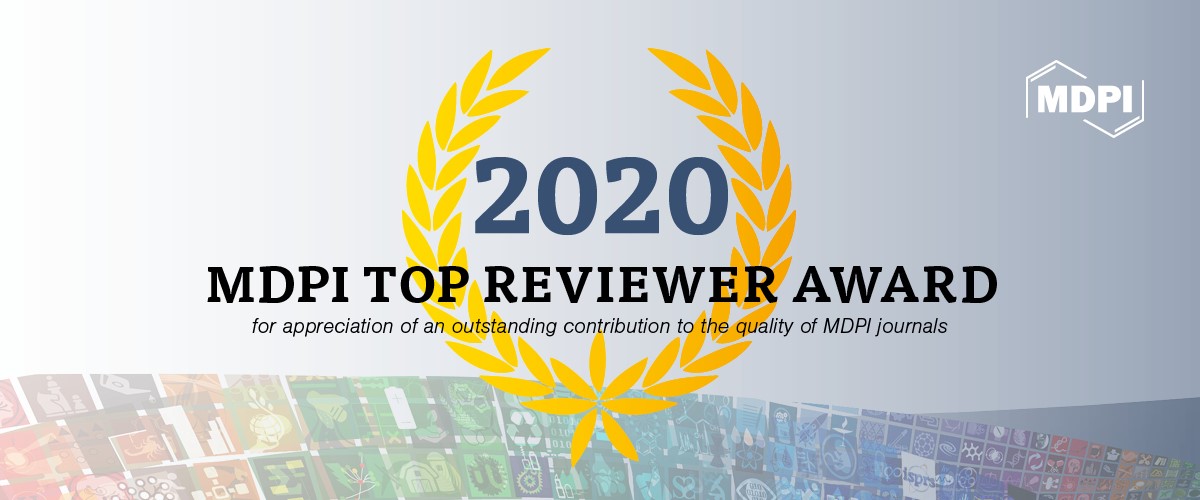
Rigorous peer-review is the cornerstone of high-quality academic publishing. Over 369,916 scholars served as reviewers for MDPI journals in 2020. We are extremely appreciative of all those who made a contribution to the editorial process in this capacity. At the beginning of every year, journal editorial offices publish a list of all reviewers’ names to express our gratitude. In addition, this year, the MDPI Top Reviewer Award was announced, to recognize the very best reviewers for their expertise and dedication, and their high-quality, and timely review reports. We are pleased to announce the following winners of the 2020 MDPI Top Reviewer Award:
- Adriana Burlea-Schiopoiu;
- Alban Kuriqi;
- Álvaro González-Vila;
- Alessandro Alaimo;
- Alexey Beskopylny;
- Alexander Yu Churyumov;
- Alberto Fernández-Isabel;
- Andrea Mastinu;
- Antonios N. Papadopoulos;
- Anton Rassõlkin;
- Antonio Humberto Hamad Minervino;
- Arkadiusz Matwijczuk;
- Artur Słomka;
- Baojie He;
- Bartłomiej Potaniec;
- Bojan Đurin;
- Camilo Arturo Rodriguez Diaz;
- Carmelo Maria Musarella;
- Chiachung Chen;
- Chiman Kwan;
- Cristian Busu;
- Danil Pimenov;
- Dan-Cristian Dabija;
- Delfín Ortega-Sánchez;
- Demetrio Antonio Zema;
- Denis Butusov;
- Elena Lucchi;
- Gaurab Dutta;
- Livia Anastasiu;
- M. R. Safaei.
For more information about how to become a reviewer of MDPI journals, please see: www.mdpi.com/reviewers.
23 September 2021
Electronics | Accepted for Coverage within Two New Categories of the Journal Citation Reports (JCR)
22 September 2021
MDPI Joins SDG Publishers Compact

UN's 17 Sustainable Development Goals (SDGs) are the blueprint to achieve a better and more sustainable future for all. In 2020 the SDG Publishers Compact was launched, aimed to inspire publishers and accelerate progress to achieve the 17 goals by 2030. Members of the programme are committed to support the publication of materials that will promote and inspire actions towards SDGs.
MDPI is an eager advocate of SDGs and has already been supporting the programme by creating Special Issues and publishing a series of books on SDGs prior to joining the Compact in 2021. MDPI's Sustainability Foundation initiated the World Sustainability Awards in 2016. We fully support UN's goals to promote sustainable actions that make the world a better place for all and, as part of its commitment, we will focus our actions on SDG10: Reduced Inequalities whilst promoting all 17 SDGs. For more details, please visit the programme’s website: https://www.un.org/sustainabledevelopment/sdg-publishers-compact/.
Joining this initiative was a unanimous decision. MDPI has in its core values the dissemination of science for all, breaking the wall between research access and under-represented members of the scientific community and the general population. To support this initiative further and continue to support under-represented scientists, MDPI will take a series of actions that will be announced once ready.
The first action MDPI takes is to nominate Dr. Liliane Auwerter as the coordinator of the programme. Dr. Auwerter studied Environmental Process Technology (UTFPR, Brazil), obtained her MSc degree in Water and Environmental Engineering (University of Surrey, UK) and in 2020 completed her PhD in self-healing low-friction materials for water transport (Imperial College London, UK), always focusing on diverse scientific projects that would potentially bring sustainability to industrial processes. As a student in Brazil, she engaged in volunteering activities focused on environmental education and took part in the Millennial Development Goals meetings held at the university.
For more information, please contact:
Dr. Liliane Auwerter
Scientific Officer
[email protected]
18 September 2021
Meet Us at the 4th International Conference on Information Technologies and Electrical Engineering (ICITEE2021), Changsha, Hunan, China, 29–31 October 2021

Conference name: The 4th International Conference on Information Technologies and Electrical Engineering (ICITEE2021)
Date: 29–31 October 2021
Place: Changsha, Hunan, China
Website: http://www.iciteeconference.com/2021/menu/home
The 4th International Conference on Information Technologies and Electrical Engineering (ICITEE2021) will be held from 29 to 31 October, 2021, in Changsha, Hunan, China. A key aspect of this conference is the strong mixture of academia and industry.
The ICITEE2021 aims to bring together innovative academics and industrial experts in the field of information technology and electrical engineering in a common forum. The primary goal of the conference is to promote research and developmental activities in this field, while another goal is to promote scientific information interchange between researchers, developers, engineers, students, and practitioners working all around the world.
The conference will be held every year to make it an ideal platform for people to share their views on and experiences in information technology and electrical engineering and related areas.
Research papers related to all areas of engineering, technology, applied sciences, computer science, electrical and mechanical engineering, information technology, telecommunication, etc., are invited to this international conference, which is expected to be attended by authors from various countries. People without published papers can also participate in this conference.
Scope:
Topic 1: Software Engineering
- Software Agent Technology;
- Middleware Design Techniques;
- Reliability and Modeling Analysis;
- E-Government Engineering;
- Modeling with UML;
- Cost Modeling and Analysis;
- Component-Based Software Engineering;
- Mobile/Wireless Computing;
- Computer and Software Engineering;
- Communication Systems and Networks;
- Parallel and Distributed Computing;
- Technology Transfer;
- Data Mining and Knowledge Recovery;
- Safety and Security Critical Software;
- Business Process Reengineering and Science;
- Artificial Intelligence Reengineering, Reverse Engineering;
- Design and Process Engineering and Science;
- Design Patterns and Frameworks;
- Software Process Models Process Management and Improvement;
- Software Architecture;
- Software Testing Techniques;
- Telecommunications;
- Economic and Financial Systems;
- Software Reuse and Metrics;
- Healthcare Engineering;
- Requirements Engineering;
- Object-Oriented Technology;
- Distributed Intelligence Systems.
Topic 2: Information Science
- Information systems;
- Management Information Systems;
- Information systems planning and management;
- Adoption of information technology in organizations;
- Human factors in information systems;
- Knowledge acquisition, expert systems;
- Systems analysis and design methods;
- Object-oriented enterprise modeling;
- Knowledge based systems to support database design;
- Automated mediation in group support systems;
- Distributed information systems, electronic commerce;
- Software copyright infringements;
- Accounting and Financial Information System;
- Internet Technology;
- Auditing and IT Governance;
- Information Quality and Strategy;
- Decision Support System;
- Information Systems;
- E-Commerce;
- IT Education and Society;
- Knowledge Management;
- Enterprise Information Systems—ERP;
- Public Policy Management;
- Engineering and Software Development;
- Free software;
- IT and IS Security;
- Information and Communication Technology;
- Communication;
- IT and IS Innovation;
- Digital business and digital marketing;
- Software agents;
- Social media.
Topic 3: Electrical Engineering
- Biomedical Engineering;
- Computer and AI Applications in Power Industry;
- Control Science and Control Engineering;
- Distributed Generation, Fuel Cells and Renewable Energy Systems;
- Electric vehicle technologies;
- Electrotechnologies;
- High Voltage and Insulation Technology;
- Intelligent control systems;
- Power Quality and Electromagnetic Compatibility;
- Automation and Instrument and Meter;
- Signal and Communication Processing;
- Advanced Power Semiconductors;
- Analogue and Digital Signal Processing;
- Electrical Machinery and Electrical Apparatus;
- Electromagnetic compatibility;
- Materials for Electrotechnics;
- Measuring Technology and Instruments;
- Mechatronics and Robotics;
- Nuclear Energy;
- Power Electronics and Power Drives;
- Power Engineering Education;
- Power Market;
- Power Optimization;
- Power Quality and Electromagnetic Compatibility;
- Power System and its Automation;
- Power System Reliability and Security;
- Power Systems Communication;
- Power Systems Deregulation;
- Predictive control;
- Process control;
- Real-time control;
- Renewable Energy;
- Computation Intelligence in Electrical Engineering.
Topic 4: Automation Control
- Modeling of Complex Systems;
- Optimal Control;
- Linear Systems;
- Discrete Event Systems;
- Adaptive Control;
- Nonlinear Systems and Control;
- Learning Systems;
- Fuzzy and Neural Systems;
- Intelligent and AI Based Control;
- Estimation and Identification;
- Real-time Systems;
- Fault Detection;
- Sensor/data fusion;
- Process Control and Instrumentation;
- Robotics;
- Motion Control;
- Automated Guided Vehicles;
- Flexible Manufacturing Systems;
- Control Education;
- Integrated Manufacturing;
- Control Applications;
- Factory Modeling and Automation;
- Process Automation;
- Petri-Nets and Applications;
- Man-machine Interactions;
- Micro and Nano Systems;
- Smart Structures;
- Sensor networks, networked control;
- Multi-agent systems.
Important Dates:
Conference: 29–31 October 2021
Full Paper Submission Deadline: 30 September 2021
Notification of Acceptance: 15 October 2021
Camera Ready Delivery Deadline: 25 October 2021
Contact:
Name: Dr. Yang
Tel: 027-87153536
QQ: 2318143869
Email: [email protected]
14 September 2021
Meet Us at the 11th International Conference & Exhibition on Green Flexible & Printed Electronics Industry, Athens, Greece, 11–12 October 2021
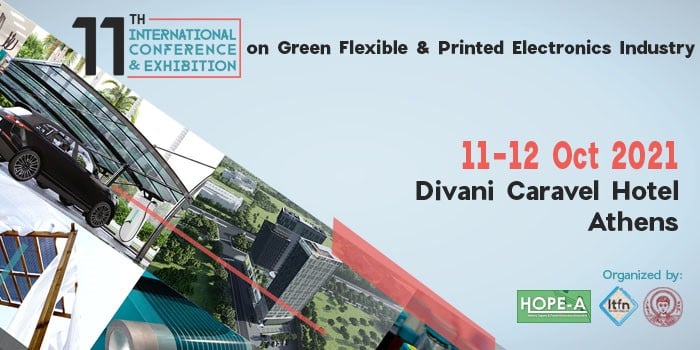
It is our great pleasure to invite you to participate in the 11th International Conference & Exhibition on Green Flexible & Printed Electronics Industry (www.ltfn.gr/conference) that will take place from 11 to 12 October 2021 at the Divani Caravel Hotel in Athens, Greece.
The international conference is organized by the Hellenic Organic & Printed Electronics Association (HOPE-A, www.hope-a.com) and the Nanotechnology Lab LTFN (www.ltfn.gr).
This international conference will bring together key industrial players, end-users, entrepreneurs, investors, top-class scientists, engineers, policy makers, politicians and representatives from the national, European and international authorities to discuss, network, do business and establish the strategy and policy for boosting the rapidly evolving hundred-billion euro green flexible and printed electronics industry in green energy, renewable technologies, fuel cells, green hydrogen, energy autonomous systems, lighting, electronics and communications, automotive industry, electrical vehicles, buildings, smart cities, agriculture, intelligent packaging and security, healthcare, wearables, IoT, etc., with the aim of contributing to a green, digital, decarbonized and circular economy society and planet.
The topics to be discussed include:
- Flexible organic and printed electronics and photonics;
- Green and renewable energy;
- 3rd generation photovoltaics;
- Bioenergy, fuel cells and green hydrogen generation;
- Energy storage and batteries;
- Flexible lighting and displays;
- Energy and lighting for smart buildings, smart cities, automotive, greenhouses, healthcare, IoT;
- Energy autonomous systems in consumer electronics, smart packaging, tourism, defense, etc.;
- Energy production and energy autonomy in agriculture and food production;
- 3D printing electronics in system integration of functional products and solutions;
- Advanced materials, semiconductors, electrodes, high-barrier materials, inks and bioinks;
- Sensors, biosensors in wearables, IoT, health, agriculture, etc.;
- Manufacturing, nano-manufacturing and processes of FPEs, bioelectronics, etc.;
- Smart textiles, fashion and wearables;
- Intelligent and smart packaging, safety and security;
- Machines, tools, lasers, automation systems, robotics, analytics and AI for zero-defect manufacturing;
- Machines and tools for digital transformation of the industry;
- FPEs in green deal and decarbonization global activities and policies;
- Clusters and associations in flexible and printed electronics worldwide;
- Flexible and printed electronics entrepreneurial activities;
- Markets, funding and commercialization opportunities.
1 September 2021
Meet Us at the 6th Optoelectronics Global Conference (OGC 2021) in Shenzhen, China, 15–18 September 2021
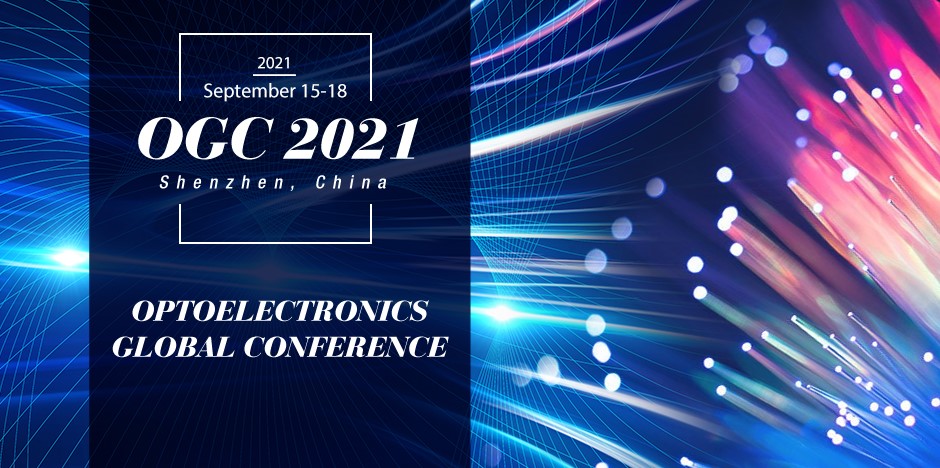
MDPI will be attending the 6th Optoelectronics Global Conference (OGC 2021), hosted by the IEEE Photonics Society, Guangzhou Photonics Chapter, and Southern University of Science and Technology, which will be held from Wednesday, 15 September, until Saturday, 18 September, 2021, at the Shenzhen World Exhibition & Convention Center, China.
OGC aims to promote the interaction and exchange of various disciplines among professionals in academia and industry at home and abroad. In addition, it also serves to turn technologies into industrial applications. OGC will be an ideal platform for scholars, researchers and professionals to exchange insights and discuss the development of the optoelectronics industry. It will be a perfect gathering to learn about new perspectives, technologies and trends which might push the boundaries of technology and eventually create a broader future for optoelectronics applications.
The topics covered will include precision optics, optical communications, lasers, infrared applications, and fiber sensors.
The following MDPI journals will be represented:
If you are also attending this conference, please feel free to stop by our booth. Our delegates look forward to meeting you in person to answer any questions you may have. For more information about the conference, please visit http://www.ipsogc.org/index.html.
3 August 2021
Announcement on Japanese Consumption Tax (JCT)
This serves to announce to our valued authors based in Japan that value-added tax, or consumption tax will now be imposed on article processing fees and other service fees for all papers submitted, or resubmitted (assigned new paper IDs), effective from 15 August 2021. The change is in accordance with the Japanese "Act for Partial Revision of the Income Tax Act and Other Acts" (Act No. 9 of 2015), which includes a revision of consumption taxation on cross-border supplies of services such as digital content distribution.
For additional information from the National Tax Agency please see here ("Cross-border supplies of electronic services").
Contact: Setsuko Nishihara, MDPI Tokyo
9 July 2021
Meet Us at the 12th International Conference on Information Optics and Photonics (CIOP 2021), Xi’an, China, 23–26 July 2021
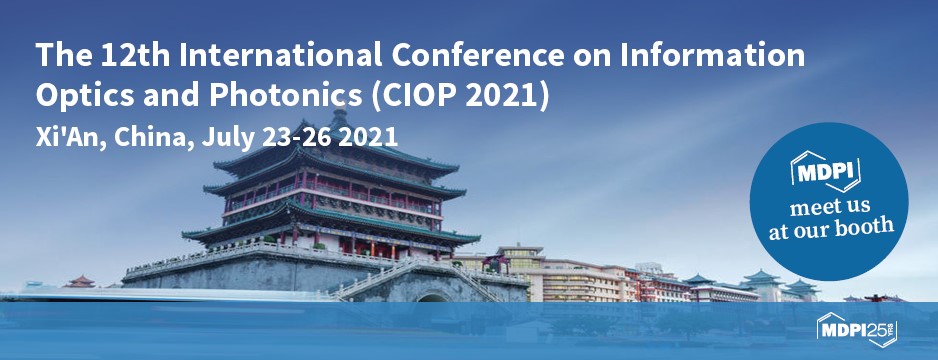
MDPI will be attending the 12th International Conference on Information Optics and Photonics (CIOP 2021), Xi’an, China, 23–26 July 2021.
CIOP, an annual conference with comprehensive topics on optics and photonics, was initiated in 2007 by Chinese Laser Press, Shanghai Institute of Optics and Fine Mechanics, Chinese Academy of Sciences. The 12th International Conference on Information Optics and Photonics (CIOP2021) will be held on 23–26 July 2021 in Xi'an, China.
The following MDPI journals will be represented:
- Applied Sciences (leading journal);
- Electronics;
- Photonics;
- Fibers;
- Optics.
If you are also attending this conference, please feel free to stop by our booth. Our delegates look forward to meeting you in person to answer any questions you may have. For more information about the conference, please visit: https://www.researching.cn/EN/EventMain/CIOP2021.
30 June 2021
Meet Us at the CCF Conference on Artificial Intelligence (CCFAI 2021), Yantai, China, 22–25 July 2021
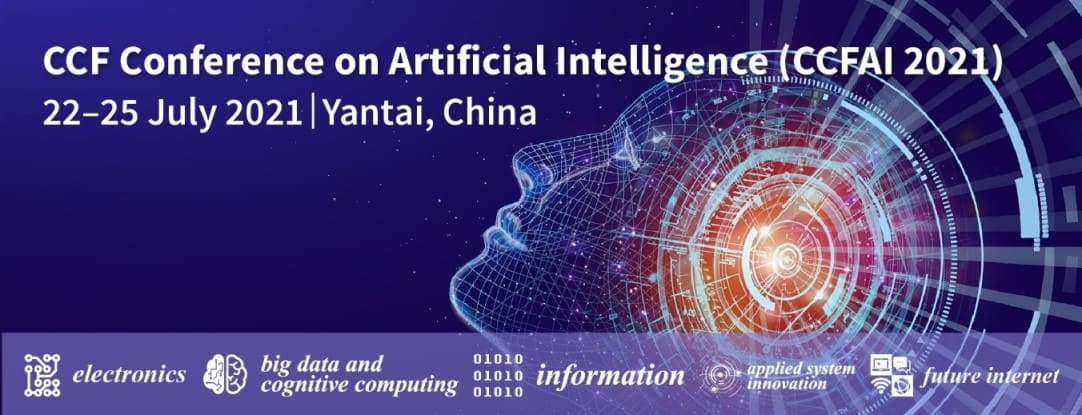
MDPI will be attending the 2021 CCF Conference on Artificial Intelligence (CCFAI 2021), which is to be held in Yantai, China, on 22–25 July 2021. As one of the most important academic conferences in the field of artificial intelligence in China, CCFAI aims to provide an interactive communication platform for practitioners in artificial intelligence, accelerating the exchange of latest research results and knowledge, as well as improving the research level in artificial intelligence.
The following MDPI journals will be represented at the meeting:
If you are attending this conference, please feel free to stop by our booth. Our delegates are looking forward to meeting you in person and answering any questions you may have.
For more information about the conference, please visit: https://ccfai2021.ytu.edu.cn/.
30 June 2021
2020 Impact Factors - Released
The 2020 citation metrics have been officially released in the Journal Citation Reports (JCR)!
We are pleased to announce that 85 MDPI journals are included, of which:
- 10 journals received their first impact factor
- 96% of journals increased their impact factor from 2019
- 32 journals (38%) ranked among the top 25% of journals, in at least one category
| Journal | Impact Factor | Rank | Category |
| Cancers | 6.639 | Q1 | • Oncology |
| Cells | 6.600 | Q2 | • Cell Biology |
| Pharmaceutics | 6.321 | Q1 | • Pharmacology & Pharmacy |
| Antioxidants | 6.313 | Q1 | • Food Science & Technology |
| • Biochemistry & Molecular Biology | |||
| • Chemistry, Medicinal | |||
| Biomedicines | 6.081 | Q1 | • Medicine, Research & Experimental |
| • Pharmacology & Pharmacy | |||
| • Biochemistry & Molecular Biology | |||
| International Journal of Molecular Sciences | 5.924 | Q1 | • Biochemistry & Molecular Biology |
| Q2 | • Chemistry, Multidisciplinary | ||
| Pharmaceuticals | 5.863 | Q1 | • Pharmacology & Pharmacy |
| • Chemistry, Medicinal | |||
| Journal of Fungi | 5.816 | Q1 | • Mycology |
| • Microbiology | |||
| Nutrients | 5.719 | Q1 | • Nutrition & Dietetics |
| Biosensors | 5.519 | Q1 | • Chemistry, Analytical |
| • Instruments & Instrumentation | |||
| Q2 | • Nanoscience & Nanotechnology | ||
| Marine Drugs | 5.118 | Q1 | • Chemistry, Medicinal |
| • Pharmacology & Pharmacy | |||
| Biology | 5.079 | Q1 | • Biology |
| Nanomaterials | 5.076 | Q1 | • Physics, Applied |
| Q2 | • Chemistry, Multidisciplinary | ||
| • Materials Science, Multidisciplinary | |||
| • Nanoscience & Nanotechnology | |||
| Viruses | 5.048 | Q2 | • Virology |
| Journal of Personalized Medicine | 4.945 | Q1 | • Medicine, General & Internal |
| • Health Care Sciences & Services | |||
| Metabolites | 4.932 | Q2 | • Biochemistry & Molecular Biology |
| Biomolecules | 4.879 | Q2 | • Biochemistry & Molecular Biology |
| Remote Sensing | 4.848 | Q1 | • Geosciences, Multidisciplinary |
| Q2 | • Remote Sensing | ||
| • Imaging Science & Photographic Technology | |||
| • Environmental Sciences | |||
| Gels * | 4.702 | Q1 | • Polymer Science |
| Antibiotics | 4.639 | Q2 | • Infectious Diseases |
| • Pharmacology & Pharmacy | |||
| Toxins | 4.546 | Q1 | • Toxicology |
| • Food Science & Technology | |||
| Vaccines | 4.422 | Q2 | • Immunology |
| • Medicine, Research & Experimental | |||
| Molecules | 4.412 | Q2 | • Chemistry, Multidisciplinary |
| • Biochemistry & Molecular Biology | |||
| Foods | 4.350 | Q2 | • Food Science & Technology |
| Polymers | 4.329 | Q1 | • Polymer Science |
| Journal of Clinical Medicine | 4.242 | Q1 | • Medicine, General & Internal |
| Toxics | 4.146 | Q2 | • Toxicology |
| • Environmental Sciences | |||
| Catalysts | 4.146 | Q2 | • Chemistry, Physical |
| Microorganisms | 4.128 | Q2 | • Microbiology |
| Membranes | 4.106 | Q1 | • Polymer Science |
| Q2 | • Engineering, Chemical | ||
| • Materials Science, Multidisciplinary | |||
| • Chemistry, Physical | |||
| Genes | 4.096 | Q2 | • Genetics & Heredity |
| Fermentation * | 3.975 | Q2 | • Biotechnology & Applied Microbiology |
| Journal of Cardiovascular Development and Disease * | 3.948 | Q2 | • Cardiac & Cardiovascular Systems |
| Plants | 3.935 | Q1 | • Plant Sciences |
| Life | 3.817 | Q2 | • Biology |
| Diagnostics | 3.706 | Q2 | • Medicine, General & Internal |
| Current Oncology | 3.677 | Q3 | • Oncology |
| Materials | 3.623 | Q1 | • Metallurgy & Metallurgical Engineering |
| Q2 | • Materials Science, Multidisciplinary | ||
| • Chemistry, Physical | |||
| • Physics, Applied | |||
| • Physics, Condensed Matter | |||
| Sensors | 3.576 | Q1 | • Instruments & Instrumentation |
| Q2 | • Chemistry, Analytical | ||
| • Engineering, Electrical & Electronic | |||
| Pathogens | 3.492 | Q2 | • Microbiology |
| Agronomy | 3.417 | Q1 | • Agronomy |
| • Plant Sciences | |||
| Chemosensors | 3.398 | Q2 | • Instruments & Instrumentation |
| • Chemistry, Analytical | |||
| Q3 | • Electrochemistry | ||
| Land | 3.398 | Q2 | • Environmental Studies |
| Brain Sciences | 3.394 | Q3 | • Neurosciences |
| International Journal of Environmental Research and Public Health | 3.390 | Q1 | • Public, Environmental & Occupational Health (SSCI) |
| Q2 | • Public, Environmental & Occupational Health (SCIE) | ||
| • Environmental Sciences (SCIE) | |||
| Tomography | 3.358 | Q2 | • Radiology, Nuclear Medicine & Medical Imaging |
| Fractal and Fractional * | 3.313 | Q1 | • Mathematics, Interdisciplinary Applications |
| Sustainability | 3.251 | Q2 | • Environmental Sciences (SCIE) |
| • Environmental Studies (SSCI) | |||
| Q3 | • Green & Sustainable Science & Technology (SCIE) | ||
| • Green & Sustainable Science & Technology (SSCI) | |||
| Water | 3.103 | Q2 | • Water Resources |
| • Environmental Sciences | |||
| Journal of Theoretical and Applied Electronic Commerce Research | 3.049 | Q3 | • Business |
| Energies | 3.004 | Q3 | • Energy & Fuels |
| Agriculture | 2.925 | Q1 | • Agronomy |
| ISPRS International Journal of Geo-Information | 2.899 | Q2 | • Geography, Physical |
| • Computer Science, Information Systems | |||
| Q3 | • Remote Sensing | ||
| Micromachines | 2.891 | Q2 | • Instruments & Instrumentation |
| • Physics, Applied | |||
| Q3 | • Chemistry, Analytical | ||
| • Nanoscience & Nanotechnology | |||
| Coatings | 2.881 | Q2 | • Materials Science, Coatings & Films |
| • Physics, Applied | |||
| Q3 | • Materials Science, Multidisciplinary | ||
| Children | 2.863 | Q2 | • Pediatrics |
| Processes | 2.847 | Q3 | • Engineering, Chemical |
| Separations | 2.777 | Q3 | • Chemistry, Analytical |
| Insects | 2.769 | Q1 | • Entomology |
| Animals | 2.752 | Q1 | • Agriculture, Dairy & Animal Science |
| • Veterinary Sciences | |||
| Symmetry | 2.713 | Q2 | • Multidisciplinary Sciences |
| Atmosphere | 2.686 | Q3 | • Meteorology & Atmospheric Sciences |
| • Environmental Sciences | |||
| Applied Sciences | 2.679 | Q2 | • Engineering, Multidisciplinary |
| • Physics, Applied | |||
| Q3 | • Chemistry, Multidisciplinary | ||
| • Materials Science, Multidisciplinary | |||
| Photonics | 2.676 | Q2 | • Optics |
| Buildings * | 2.648 | Q2 | • Construction & Building Technology |
| • Engineering, Civil | |||
| Healthcare | 2.645 | Q2 | • Health Policy & Services (SSCI) |
| Q3 | • Health Care Sciences & Services (SCIE) | ||
| Minerals | 2.644 | Q2 | • Mining & Mineral Processing |
| • Mineralogy | |||
| • Geochemistry & Geophysics | |||
| Forests | 2.634 | Q1 | • Forestry |
| Crystals | 2.589 | Q2 | • Crystallography |
| Q3 | • Materials Science, Multidisciplinary | ||
| Entropy | 2.524 | Q2 | • Physics, Multidisciplinary |
| Diversity | 2.465 | Q2 | • Biodiversity Conservation |
| Q3 | • Ecology | ||
| Journal of Marine Science and Engineering | 2.458 | Q2 | • Oceanography |
| • Engineering, Marine | |||
| • Engineering, Ocean | |||
| Medicina | 2.430 | Q2 | • Medicine, General & Internal |
| Machines * | 2.428 | Q2 | • Engineering, Mechanical |
| Q3 | • Engineering, Electrical & Electronic | ||
| Electronics | 2.397 | Q3 | • Engineering, Electrical & Electronic |
| • Computer Science, Information Systems | |||
| • Physics, Applied | |||
| Fishes * | 2.385 | Q2 | • Fisheries |
| • Marine & Freshwater Biology | |||
| Metals | 2.351 | Q2 | • Metallurgy & Metallurgical Engineering |
| Q3 | • Materials Science, Multidisciplinary | ||
| Horticulturae * | 2.331 | Q1 | • Horticulture |
| Veterinary Sciences * | 2.304 | Q1 | • Veterinary Sciences |
| Universe | 2.278 | Q3 | • Physics, Particles & Fields |
| • Astronomy & Astrophysics | |||
| Mathematics | 2.258 | Q1 | • Mathematics |
| Magnetochemistry | 2.193 | Q3 | • Chemistry, Inorganic & Nuclear |
| • Chemistry, Physical | |||
| • Materials Science, Multidisciplinary | |||
| Current Issues in Molecular Biology | 2.081 | Q4 | • Biochemistry & Molecular Biology |
| Actuators | 1.994 | Q3 | • Instruments & Instrumentation |
| • Engineering, Mechanical | |||
| Aerospace * | 1.659 | Q2 | • Engineering, Aerospace |
* Journals given their first Impact Factor in 2021
Source: 2020 Journal Impact Factors, Journal Citation Reports ® (Clarivate, 2021)
21 June 2021
Meet Us at the China Instrument and Control Society Annual Meeting, Shanghai, China, 27–29 August 2021
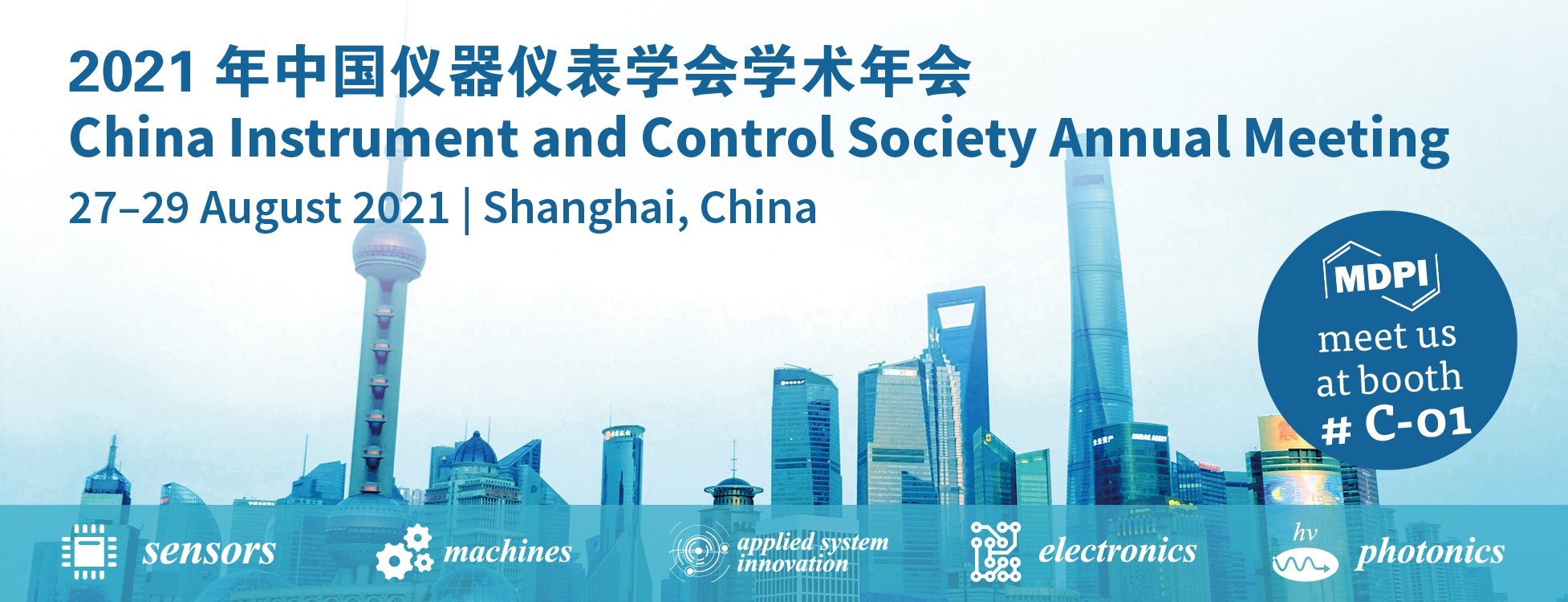
MDPI will be attending the China Instrument and Control Society Annual Meeting, which is to be held in Shanghai, China, on 27–29 August 2021. The conference invites experts and students who are engaged in the study of instrumentation to participate in an in-depth discussion on the basic research direction, technological innovation, and industrial path of the instrumentation discipline.
The following MDPI journals will be represented at the meeting:
If you are attending this conference, please feel free to stop by our booth: C-01. Our delegates are looking forward to meeting you in person and answering any questions you may have. For more information about the conference, please visit: http://meeting.cis.org.cn/.
21 June 2021
Electronics Receives Updated CiteScore of 2.7
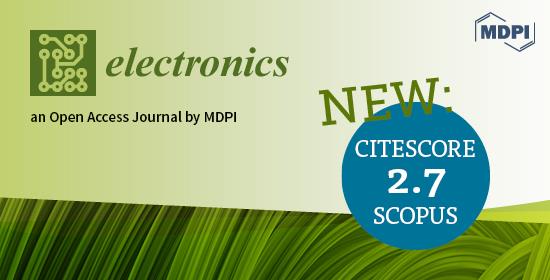
We are pleased to report that the CiteScore of Electronics has increased to 2.7 (from 1.9). For full details of the current CiteScore release, please refer to the journal’s Source profile (https://www.scopus.com/sourceid/21100829272).
18 June 2021
Electronics Special Issue “Recent Advances in Microelectronics Devices and Integrated Circuit” Is Open for Submission Now!

This Special Issue is edited by Dr. Teo Tee Hui and Prof. Dr. I-Chyn Wey. This Special Issue focuses on novel methodological developments in the field of advanced microelectronics and the design of the related integrated circuits.
Potential topics in computationally intelligent devices areas include, but are not limited to, the following:
- artificial intelligence technologies in direct memory;
- deep-learning-driven procession unit;
- display/motor driver;
- sensor interface;
- parallel computing;
- cryptography in quantum computing devices and circuits;
- novel design directions and improve devices, circuits, system performance, as well as processes;
- limitations of applying artificial intelligence to certain problems and specific domains.
Moreover, this SI is cooperated by the IEEE 14th International Symposium on Embedded Multicore/Manycore Systems-on-Chip: MCSoC 2021, it will be held in Singapore, 20–23 December 2021. ( https://www.mcsoc-forum.org/ )
Selected papers from MCSoC 2021 and all the external contributions in this field are welcome in this Special Issue.
Important Dates for Conference:
Abstract submission: 25 June 2021
Full paper submission: 25 June 2021 (extended)
Acceptance notification: 30 July 2021
Camera-ready paper: 10 August 2021
Conference: 20–23 December 2021
Important Dates for Special Issue:
Submission deadline: 31 May 2022
Conference logo:
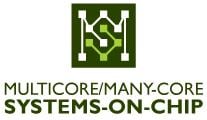

For more information, please refer to the Special Issue:
https://www.mdpi.com/journal/electronics/special_issues/microelectron_devices_integr_circuits
Conference website .https://www.mcsoc-forum.org/
Submission Guidelines
Submission link: https://susy.mdpi.com/user/manuscripts/upload/62ecda0a807a292a8434b0c463ceaff7/1
Instructions for authors:
https://www.mdpi.com/journal/electronics/instructions
A template Word file:
https://www.mdpi.com/files/word-templates/electronics-template.dot
A template LaTeX file:
https://www.mdpi.com/authors/latex.
If you have any questions, please contact joy.li @mdpi.com; [email protected]
10 June 2021
Recruiting Editorial Board Members for the New Sections “Electronic Materials” and “Electronic Multimedia” of Electronics
Electronics has just launched two new Sections: “Electronic Materials” and “Electronic Multimedia”. If you are an active researcher in the field and are passionate about participating in cutting-edge research publications, please do not hesitate to contact us about joining the board and contributing to the Sections.
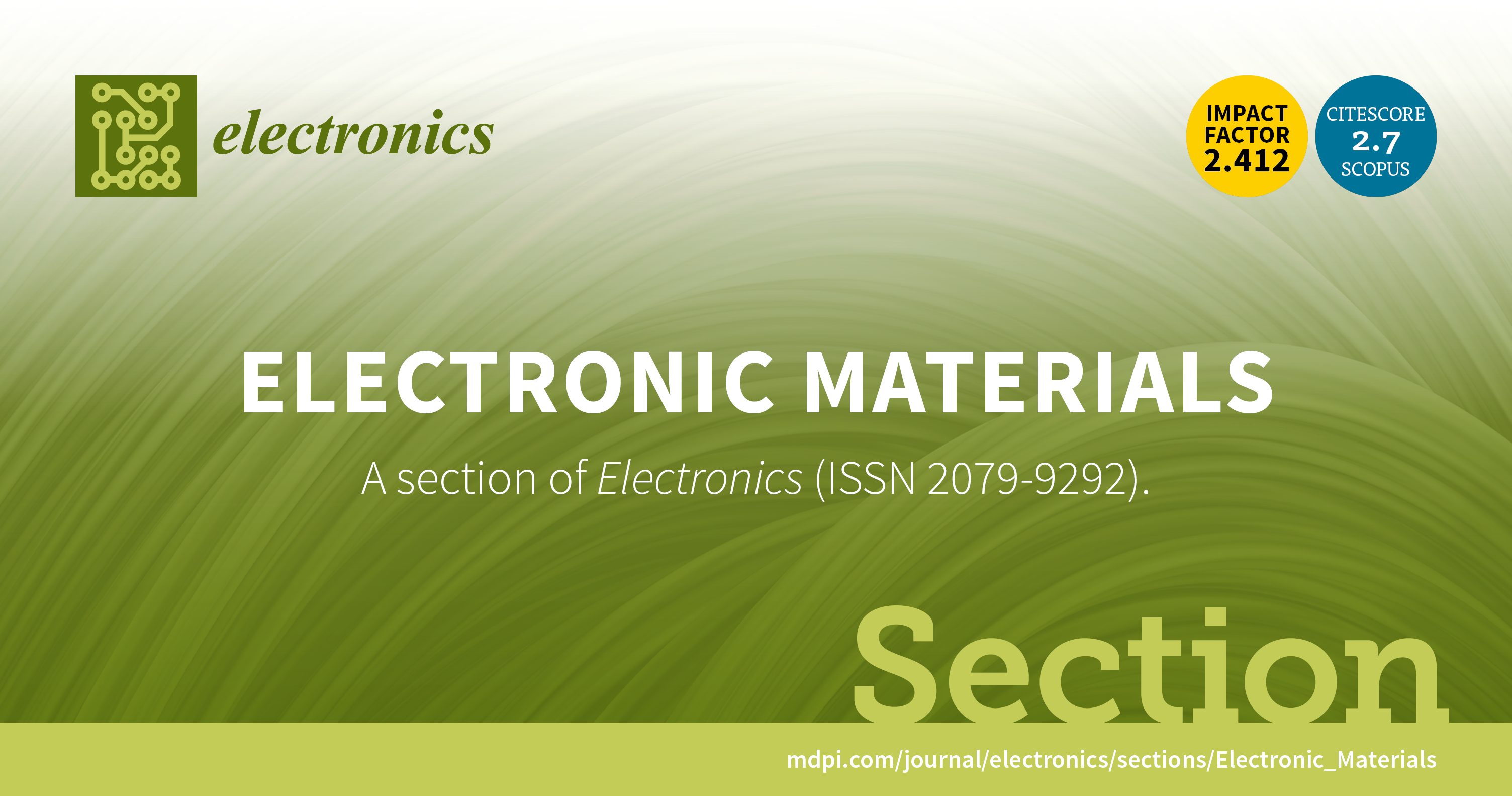
The Section “Electronic Materials” (https://www.mdpi.com/journal/electronics/sections/Electronic_Materials) reports on the science, technology, and applications of electronic materials that are used in electrical industries, electronics and microelectronics, as well as the substances used in the construction of integrated circuits, circuit boards, packaging materials, communication cables, optical fibers, displays, and various controlling and monitoring devices.
The main topics of this Section include but are not limited to the following:
- Electronic materials science and technology;
- Energy storage and conversion materials;
- Nanoscale science and technology;
- Organic materials and thin-film technology;
- Oxide semiconductors and dielectrics;
- Wide bandgap semiconductors.
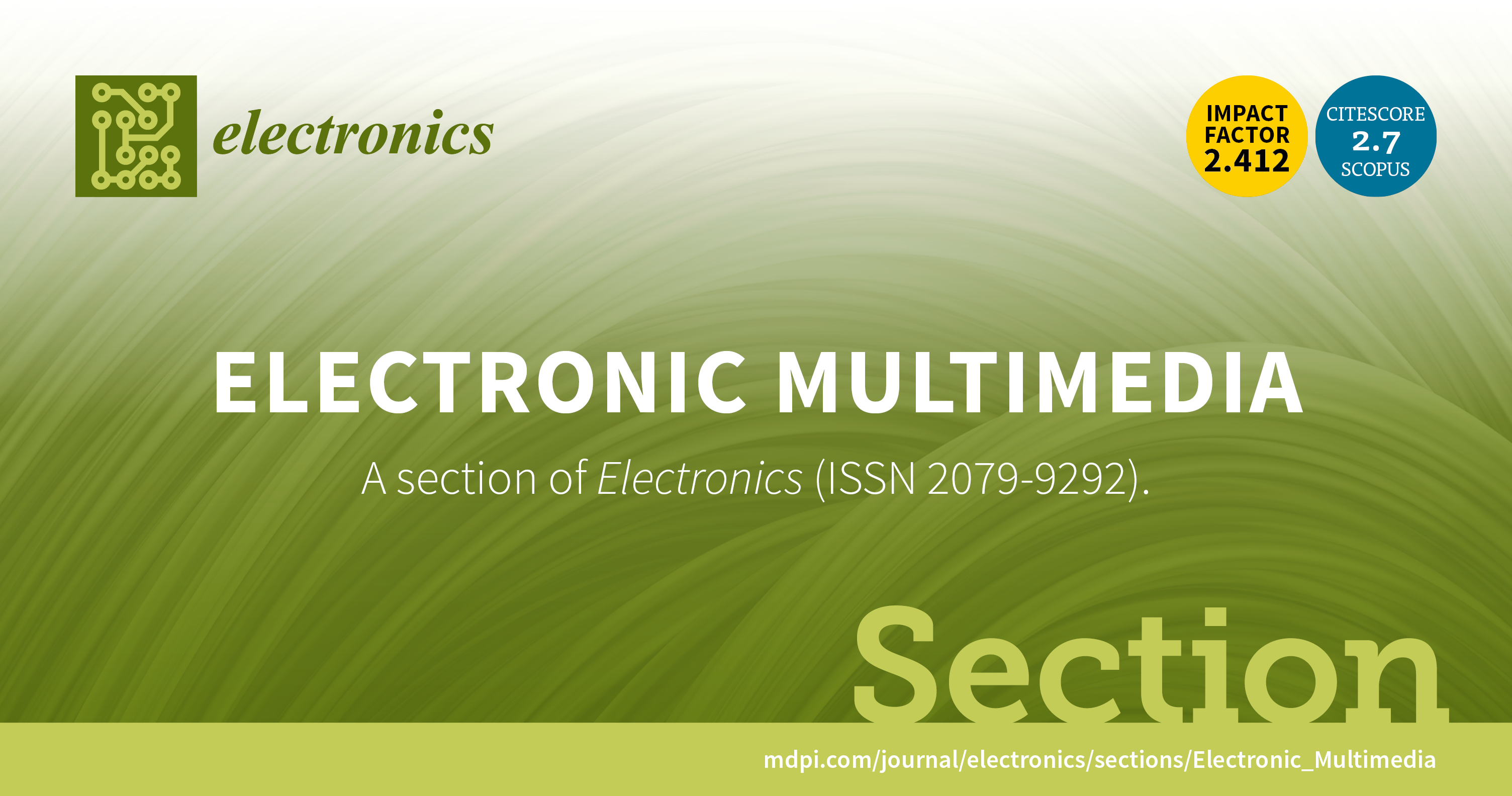
The Section “Electronic Multimedia” (https://www.mdpi.com/journal/electronics/sections/Electronic_Multimedia) reports on electronic multimedia technology, tools, and applications of electronic multimedia, including but not limited to circuits, networking, signal processing, systems, software, and system integration.
The main topics of this Section include but are not limited to the following:
- Electronic multimedia systems;
- Electronic multimedia communications;
- Electronic multimedia processing;
- Electronic multimedia applications.
If you have any questions, please contact [email protected].
28 April 2021
Book Builder—Compile a Customized E-Book from Your Favorite MDPI Open Access Content
MDPI Books recently released Book Builder, a new online tool to conveniently arrange, design and produce an eBook from any content published in MDPI journals. Book Builder offers two functions: on the one hand (1) Selections, available to every registered user of MDPI; on the other hand (2) Special Issue Reprints, which can be used exclusively by Guest Editors of Special Issues.
Selections
In just a matter of a few clicks, all users are now able to assemble books from MDPI articles and receive instantaneous feedback in the form of a fully produced and compiled book (PDF), which can be downloaded or ordered as print copy. Selections can include any paper published with MDPI, picking and combining content from different journals and special issues.
This way, the user may for example choose to compile an ebook focusing around a particular topic, or assemble articles from a group of others.
We invite you to make yourself familiar with the new tool! The Book Builder can be found here: https://www.mdpi.com/books/book_builder.
Special Issue Reprints
The Book Builder allows Guest Editors of MDPI journals to create a reprint from a successfully completed Special Issue or Topical Collection in book format. If you are a Guest Editor for an MDPI journal, you can use the new tool to create an PDF document which includes all articles published in the Special Issue as well as a book cover and table of contents.
For Special Issues containing a minimum of 5 articles, the Guest Editor can request its publication on the MDPI Book platform. Published reprints are assigned an ISBN and DOI.
In addition to the PDF copy of the Reprint Book, as a token of our gratitude, MDPI offers every Guest Editor one (1) complimentary print copy (via print-on-demand). All contributors benefit from a discount on orders of any additional print copies, to share with colleagues or libraries or others.
In line with our organization's values, MDPI Books publishes all content in open access, promoting the exchange of ideas and knowledge in a globalized world. MDPI Books encompasses all the benefits of open access—high availability and visibility, as well as wide and rapid dissemination. MDPI Books are distributed under the terms and conditions of the Creative Commons Attribution License, meaning as an author you retain the copyright for your work. In addition, with MDPI Books you can complement the digital version of your work with a high-quality printed counterpart.
If you are interested in editing a book volume or series, or have a monograph manuscript to be considered for publication, please submit your proposal online and look at our Information for Authors.
Contact: Laura Wagner, MDPI Books Manager (email)
26 April 2021
Electronics | 2021 Young Investigator Award—Winner Announced
Dear Colleagues,
We are pleased to announce that the winner of the Electronics 2021 Young Investigator Award is Dr. Amir H. Gandomi.
Dr. Amir H. Gandomi is a Professor of Data Science at the Faculty of Engineering & Information Technology, University of Technology Sydney, Australia. Dr. Gandomi’s research interests are in artificial intelligence, big data analytics, machine learning, genetic programming, evolutionary computation, and their applications in smarts cities and systems. Dr. Gandomi received his PhD in 2015 and has an outstanding publication record, comprising more than 200 publications in peer-reviewed international journals, which have been collectively cited more than 20,000 times (Hirsch index of 66). He is clearly a rising star in the field of Computational Intelligence and Data Analytics. Despite his young age, Dr. Gandomi has been the recipient of several academic prizes, including the Discovery Early Career Researcher Award for AUD 400,000, the BEACON distinguished research fellowship for USD 120,000, and the Highly Cited Researcher Award for four consecutive years, 2017 to 2020. This is an outstanding achievement in today’s competitive environment. Please join us in congratulating Dr. Gandomi for his outstanding achievements.
As the awardee, Dr. Amir H. Gandomi will receive an honorarium of CHF 1800, a certificate and an offer to publish a paper free of charge without a fixed deadline in Electronics after peer review.
We would like to thank all the nominators from various fields of study for their participation and all the Award Committee Members for their evaluation of the abundant excellent nominations.
Electronics 2021 Young Investigator Award Evaluation Committee
23 April 2021
Meet Us at 2021 IEEE 4th International Conference on Electronics Technology (ICET), Chengdu, China, 7–10 May 2021
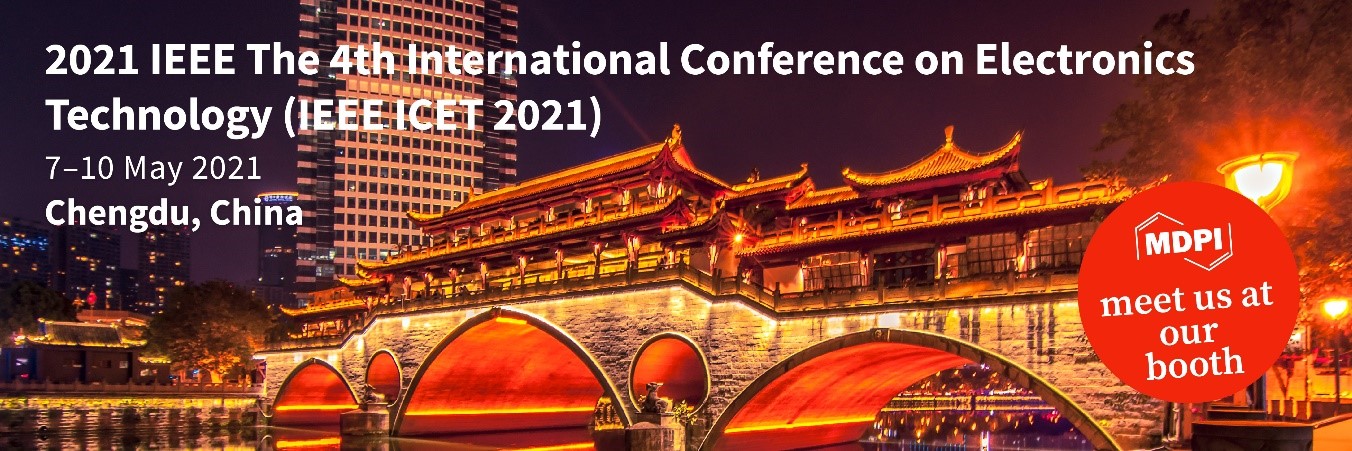
ICET is the premier conference held yearly in Chengdu, China. Its primary aim is to offer senior and young scientists, from academic communities, electronic industries and from all over the world, the opportunity to exchange research ideas and share new knowledge, development and experiences on topics related to their experimental and theoretical work in the very widespread field of electronics and micro/nanoelectronics technology and electronic packaging in a convenient and multicultural atmosphere.
The following MDPI journals will be represented:
If you are attending this conference, please feel free to stop by our booth. Our delegates look forward to meeting you in person to answer any questions you may have.
For more information about the conference, please visit: http://icet.net/.
16 April 2021
Electronics | 3rd Webinar on Low Dimensional Materials for Optoelectronic Applications
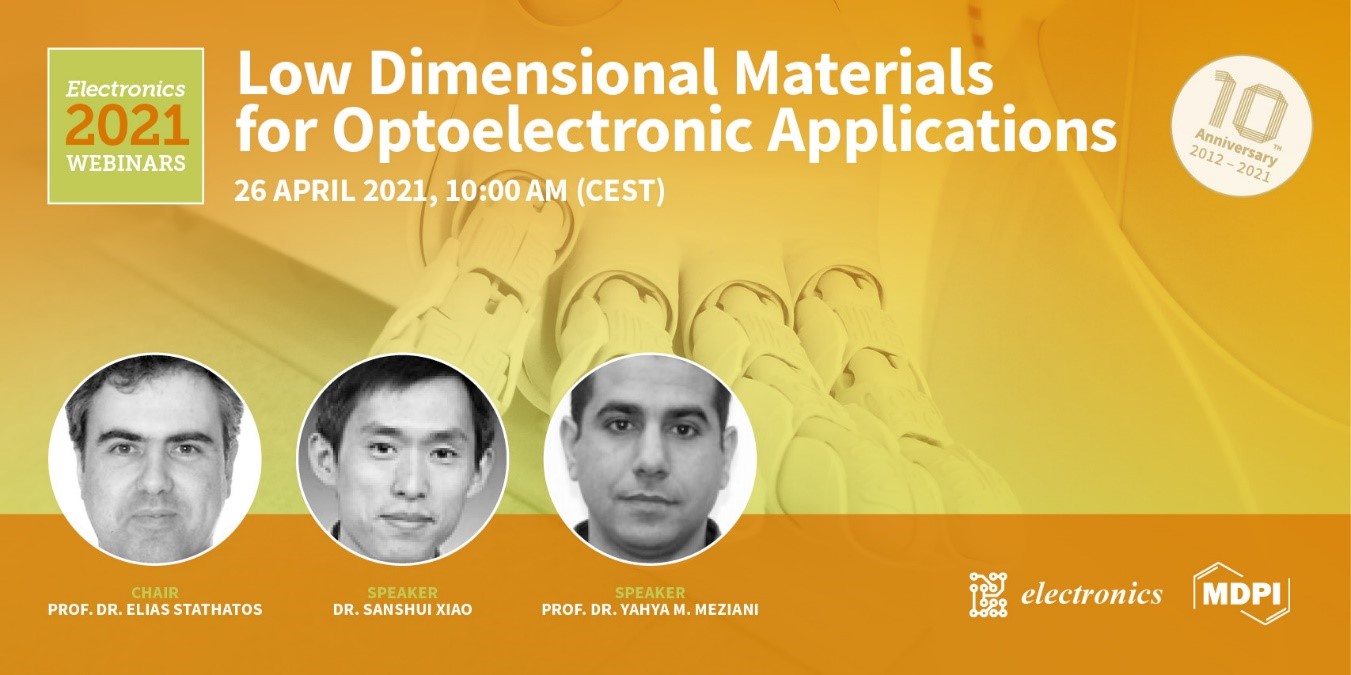
This webinar will address issues related to the latest achievements in Low Dimensional Materials for Optoelectronic Applications attributed to our invited speakers. Audience members will have the opportunity to expand their knowledge and engage in a Q&A with the speakers.
Date: 26 April 2021
Time: 10 a.m. (CEST)
Webinar ID: 856 9742 8566
Register for free here: https://electronics-3.sciforum.net/#webinar_registration
Chair:
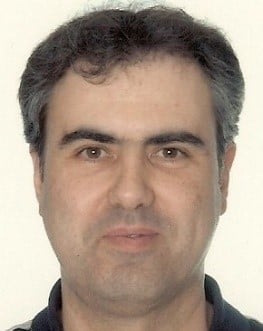
Prof. Dr. Elias Stathatos
Section Editor-in-Chief of “Microelectronics and Optoelectronics” in Electronics
Interests: nanostructured semiconductors; third-generation photovoltaics, including perovskite and dye-sensitized solar cells; organic electronics
Speakers:

Dr. Sanshui Xiao
EBM of Section “Microelectronics and Optoelectronics” of Electronics
Presentation Title: Integrated 2D-Material-Based Optoelectronic Devices
Sanshui Xiao obtained his PhD degree at Zhejiang University in 2004, and he is now an Associate Professor at the Technical University of Denmark. His current research interests mainly focus on the exploration of fundamental physics of light–matter interactions and the development of 2D-material-based optoelectronic devices. He has published more than 120 journal papers with a total citation of 4000 and an h-index of 33 (Google scholar). He has co-organized several sessions at SPIE, PIERS, AME, and EMN conferences and obtained the European Optics Prize from the European Optical Society in 2008. He is a senior member of OSA and SPIE, and also serves as the Topical Editor for Applied Optics.
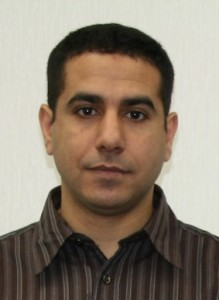
Prof. Dr. Yahya M. Meziani
EBM of Section “Microelectronics and Optoelectronics” of Electronics
Presentation Title: 2D-Material-Based Devices for Terahertz Technology
Dr. Yahya Meziani is currently working as an Associate Professor at the Department of Applied Physics, Salamanca University. He has previously worked as a researcher for Tohoku University, Japan, and for Montpellier 2 University, France. Dr. Meziani has been conducting research on the Quantum Hall effect phenomenon and its application for the conservation of the Ohm unit. His research focuses on the development of new electronic devices that can emit and/or detect terahertz radiation at room temperature. He is author and co-author of more than 90 scientific publications. He has a h-index of 19 according to Web of Science.
For any questions about the webinar, please send an email to [email protected].
15 April 2021
MDPI Celebrates Company Milestone With 25th Anniversary Page
"We exist to help scientists achieve their own objectives"

In June of this year, MDPI will celebrate the 25th anniversary of its foundation. To mark this significant milestone, we have created a 25th Anniversary page on our website that evokes the development of our company over the past quarter-century.
MDPI has been a pioneer of Open Access publishing ever since the concept was first created.
In a wide-ranging interview, our CEO Delia Mihaila reflects on the company’s 25th anniversary and its contribution to the world of scientific publishing.
Delia considers how MDPI has evolved since starting life in 1996 as a visionary ‘project’ run out of an apartment in Basel, Switzerland, by Dr. Shu-Kun Lin. A chemist who was passionate about the long-term preservation of rare chemical sample, Dr. Lin was determined to help scholars publish their findings as quickly as possible and make their research results available to as wide a readership as possible worldwide. That determination remains unchanged 25 years later.
Today, MDPI is an international organization with over 4,000 employees based on three continents and in ten countries, and ranks among the world's top four academic publishers.
MDPI's mission is to accelerate access to new scientific research, delivering insight faster for researchers worldwide. Read more here about the company's remarkable success story and what the Open Access publishing model can offer the global scientific community.
8 April 2021
Electronics | 2021 Travel Awards – Winners Announced
As Editor-in-Chief of Electronics, I am pleased to announce the winners of the Electronics Travel Awards for 2021. The awards have been granted to: Dr. Peng Hang and Dr. Alfonso González Briones.
- Peng Hang
Research Fellow at Nanyang Technological University, Singapore
Research interest: vehicle dynamics and control; decision making; motion planning and control of automated and connected vehicles (CAVs)
- Alfonso González Briones
Postdoctoral Fellow at University of Salamanca, Spain
Research interest: energy optimization in households and intelligent buildings
With so many high-quality applicants, the evaluation process and final decision were challenging. We would like to thank all the applicants for submitting their diverse and fascinating range of research topics. On behalf of the Assessment Committee, I congratulate the winners on their accomplishments.
Prof. Dr. Flavio Canavero
Editor-in-Chief, Electronics
2 April 2021
Recruiting Editorial Board Members for Section “Circuit and Signal Processing” in Electronics
The alliance of computers and telecommunications, defining the high-tech revolution of our time, is characterized by the convergence of the basic concepts of digital, analog, and mixed circuits (and systems), which enable the present devices to perform their intended function having major direct and indirect impacts on our lives. In this age of digital electronics, the importance of analog circuitry and signal processing concepts is essential for the progress of the field and for new developments.
The aim of the “Circuits and Signal Processing” Section is to host significant and original contributions and state-of-the-art review articles in this field of research. The scope of this section is broad, ranging from mathematical foundations to practical engineering applications, measurement techniques, compliance verification, and reliability studies.
Topics of interest include but are not limited to:
- Circuits and systems for the Internet of things (IoT);
- Circuits and systems for 5G networks;
- Circuits and systems of Radio Frequency (RF) applications;
- Analog, digital, and mixed signal processing building blocks;
- Non-linear circuits and systems;
- Amplifiers, filters, oscillators;
- Circuits and systems for biomedical applications;
- Power and energy circuits and systems;
- Multimedia systems and signal processing.
If you are an active researcher in the field and are passionate about participating in cutting-edge research publications, please do not hesitate to contact us about joining the board and contributing to this section.
For more information, please visit: https://www.mdpi.com/journal/electronics/sections/Circuit_Signal_Processing.
If you have any questions, please contact [email protected].
2 April 2021
Electronics | 2021 Travel Awards and Young Investigator Award—Winners Announcement Date Extension
Electronics is holding the Travel Awards to sponsor two Postdocs to attend a relevant conference of their choice in 2021, as well as the Young Investigator Award, which will be awarded to one young investigator in recognition of their excellence in the research field of electronics and its applications.
In order to take all applications into full consideration and make the evaluation decisions in a fair way, the date of winners announcement for the Electronics 2021 Travel Awards and Electronics 2021 Young Investigator Award has been extended to April 2021. Please pay attention to the Journal website for updates.
26 March 2021
Prof. Dr. Costas Psychalinos Appointed Section Editor-in-Chief of the New Section "Circuit and Signal Processing" in Electronics
We are pleased to announce that Professor Costas Psychalinos has been appointed as Section Editor-in-Chief of "Circuit and Signal Processing" in Electronics.

Costas Psychalinos received his B.Sc. and Ph.D. degrees in Physics and Electronics from the University of Patras, Greece, in 1986 and 1991, respectively. From 1993 to 1995, he worked as Post-Doctoral Researcher in the VLSI Design Laboratory, University of Patras. From 1996 to 2000, he was an Adjunct Lecturer at the Department of Computer Engineering and Informatics, University of Patras. From 2000 to 2004, he served as Assistant Professor at the Electronics Laboratory, Department of Physics, Aristotle University of Thessaloniki, Greece. From 2004, he serves as Faculty Member at the Electronics Laboratory, Department of Physics, University of Patras, Greece, and, currently, he is a full Professor.
His research area is in the development of CMOS analog integrated circuits, including fractional-order circuits and systems, continuous and discrete-time analog filters, amplifiers, and low voltage/low power building blocks for analog signal processing.
He serves as Area Editor of the International Journal of Electronics and Communications (AEUE), and Editor of the International Journal of Circuit Theory and Applications.
He is Associate Editor of the Circuits Systems and Signal Processing journal, and the Journal of Advanced Research. He is a member of the Editorial Board of the Microelectronics journal, Analog Integrated Circuits and Signal Processing journal, MDPI’s Fractal & Fractional journal, and Journal of Low Power Electronics.
He is an IEEE Senior Member and, also, Member of the Nonlinear Circuits and Systems Technical Committee of the IEEE CAS Society.
We would like to warmly welcome Professor Psychalinos as Section Editor-in-Chief and look forward to developing the Section "Circuit and Signal Processing" under his leadership.
22 March 2021
Recruiting Editorial Board Members for Section “Electrical and Autonomous Vehicles” in Electronics
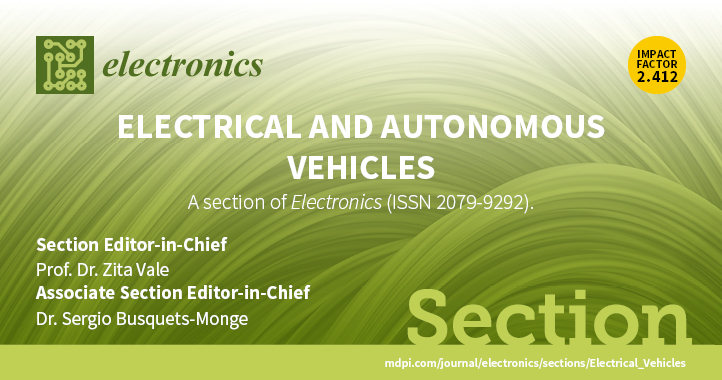
The transportation sector is of the utmost importance for both today’s society and future societies, with great impacts on the economy and people’s life comfort. A profound transformation of the sector is underway in technological terms, namely with a consistently increasing trend towards transportation electrification and to autonomous vehicles.
Section “Electrical and Autonomous Vehicles” addresses the different perspectives of design, development, and usage of electric and autonomous vehicles, as well as their impact on people’s lives, on cities, and on power and energy systems.
The Section welcomes papers on innovative scientific and technical developments, sound case studies, and reviews that are relevant and/or related to “Electrical and Autonomous Vehicles”.
If you are an active researcher in the field and are passionate about participating in cutting-edge research publications, please do not hesitate to contact us about joining the board and contributing to this section.
For more information, please visit: https://www.mdpi.com/journal/electronics/sections/Electrical_Vehicles.
If you have any questions, please contact [email protected].
19 March 2021
Recruiting Editorial Board Members for Section “Microwave and Wireless Communications” in Electronics
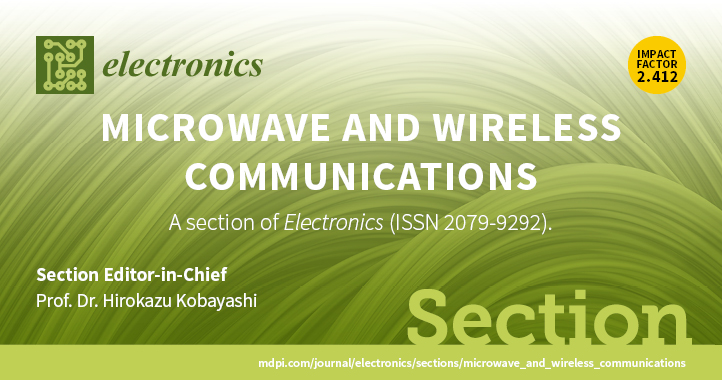
Our journal Electronics (ISSN 2079-9292) is now recruiting new Editorial Board Members for the section “Microwave and Wireless Communications” (https://www.mdpi.com/journal/electronics/sections/microwave_and_wireless_communications). For this section, we are inviting advanced theories and technologies across a wide spectrum. These can be related to microwave and millimeter wave communication, including radar sensors, etc., which may be fundament or application, element or system, hardware or software, methodology theory or measurement. We hope to present state-of-the-art technologies in this section.
Subject areas of interest include, without being limited to, the following:
- General wireless communication technology;
- General microwave theory and technology, including antennae;
- General radar technology;
- Communication and radar signal processing;
- Micro/millimeter wave imaging technology;
- Micro/millimeter wave sensing technology;
- Micro/millimeter wave network technology;
- Micro/millimeter wave medical application;
- Electromagnetic scattering and propagation;
- Micro/millimeter wave measurement technology.
You are welcome to join our section Editorial Board Members and contribute to this section!
For more information, please visit: https://www.mdpi.com/journal/electronics/sections/microwave_and_wireless_communications.
If you have any questions, please contact [email protected].
19 March 2021
Prof. Dr. Lucas Lamata Appointed Section Editor-in-Chief of the New Section "Quantum Electronics" in Electronics
We are pleased to announce that Professor Lucas Lamata has been appointed as Section Editor-in-Chief of "Quantum Electronics" in Electronics. His term started at the beginning of March 2021.

Lucas Lamata graduated in Theoretical Physics in 2003 from Universidad Complutense de Madrid and received his PhD with Honors in Quantum Information Theory in 2007 from Universidad Autónoma de Madrid, having carried out his PhD research at the Spanish Council for Scientific Research (CSIC) in Madrid, Spain. Latterly, he was a Humboldt Research Fellow and a Max-Planck Postdoctoral Fellow from 2007 to 2011 at the Max-Planck Institute of Quantum Optics in Garching, Germany. From 2011 to 2019, he worked at the University of the Basque Country in Bilbao, Spain, first with a Marie Curie IEF Fellowship, and subsequently with a Ramón y Cajal tenure track position and a permanent staff scientist position. Since 2019, he has been an Associate Professor of Theoretical Physics at Departamento de Física Atómica, Molecular y Nuclear, Universidad de Sevilla, Sevilla, Spain.
His research interests are focused on quantum optics, quantum information, and quantum technologies, with many developments in the fields of quantum simulations, quantum computation, and quantum machine learning. As a theoretician, he has worked in proposals and their experimental realizations with several experimental groups worldwide, among other quantum platforms in trapped ions and superconducting circuits.
He is the author of more than 100 papers in indexed journals (a list of his publications can be found here). He has been an invited speaker in many international conferences in countries including the USA, Germany, the UK, China, Japan, and Australia. Regarding his refereeing and editorial experience, he is a frequent reviewer of more than 60 indexed journals, including Nature, Nature Materials, Nature Communications, Physical Review X, and Physical Review Letters, and an Editorial Board Member for six prestigious scientific journals: Machine Learning: Science and Technology (IOP), Quantum Machine Intelligence (Springer), Electronics (MDPI), Quantum Reports (MDPI), PLOS ONE, and Quantum Measurements and Quantum Metrology (De Gruyter).
He has also organized several Special Issues for journals from MDPI, Wiley (Advanced Quantum Technologies), Springer, and ACTA Press.
We would like to warmly welcome Professor Lamata as Section Editor-in-Chief and look forward to developing the Section "Quantum Electronics" under his leadership.
18 March 2021
Professor Flavio Canavero Appointed Editor-in-Chief for Electronics
We are pleased to announce that Professor Flavio Canavero has been appointed Editor-in-Chief for Electronics (ISSN 2079-9292).

Flavio Canavero is Full Professor at the Department of Electronics and Telecommunications of Politecnico di Torino. He received his diploma in Electronics Engineering in 1977 from Politecnico di Torino, and his PhD in 1986 from Georgia Institute of Technology. He works in the area of circuits and systems theory, with special interest in signal integrity and EMC design issues. To date, he has authored or coauthored more than 300 papers published in international journals and conference proceedings.
During his scientific career, he has been involved in various service activities both at the level of his institution and for many international organizations. At Politecnico di Torino, he has been Director of the Electronics Department (1993–1999), Vice Rector for Organization (2001–2005), and Head of the Doctoral School (2012–2018). At the international level, he has been a member of the Steering Committee of the Council for doctoral Education (CDE) of the European University Association (EUA), a member of the Board of Directors of the IEEE EMC Society (2012–2015), and VP of Communication Services for the same Society. He has been the Editor-in-Chief of IEEE Transactions on Electromagnetic Compatibility (2004–2006) and the Technical Editor of the IEEE Electromagnetic Compatibility Newsletter. Between 2005 and 2008, he was the Chair of the International Union of Radio Science (URSI) Commission E (Noise and Interference). He has been also a Member of the IEEE Fellow Committee and of the IEEE Press Editorial Board. He has been the Organizer of the Workshop on Signal Propagation on Interconnects (SPI) during 2001–2003 and 2007. He is currently a Member of the Editorial Boards for several scientific journals and a Member of the Scientific Steering Committees of several International Conferences in the field of EMC and electrical performance of interconnects and packages.
He has been Invited Visiting Professor at Okayama University (Japan), ESIGELEC (Engineering School in Rouen, France), University of Rennes and INSA (Rennes, France), University of Ghent (Belgium), University of Science and Technology of Lille (France), and University of Clermont-Ferrand (France).
For over a decade, he has been serving as Principal Investigator or Local Coordinator of several research projects supported by EU. In addition, he has been responsible for many research contracts with industrial companies globally.
Flavio Canavero is a Fellow of the Institute of Electrical and Electronics Engineers (IEEE) and a Fellow of the International Union of Radio Science (URSI). He has been the recipient of the prestigious Richard R. Stoddard Award for Outstanding Performance (the highest recognition of scientific merit bestowed by IEEE EMCS), and of the Honored Member Award of EMC Society (highest recognitions of service merit). He has been the recipient of IBM and Intel Research Awards; he was presented the award for the best paper contributed to the journal IEEE Transactions on Advanced Packaging for the year 2007, and has received several best paper awards for work presented at the following conferences: EMC Roma 1996, EMC-Zurich in Singapore 2006, EPEPS in Austin 2010 and San Jose 2013, EMC Europe in Angers (F) 2017, CEM in Paris (F) 2018, and SPI in Chambéry (F) 2019.
Some of his selected publications may be accessed at
https://iris.polito.it/browse?type=author&authority=rp19434&authority_lang=en&sort_by=2&order=DESC#.XlSGy_wRXIU
10 March 2021
Journal Selector: Helping to Find the Right MDPI Journal for Your Article
At MDPI, we strive to make your online publication process seamless and efficient. To achieve this, our team is continuously developing tools and features to make the user experience useful and convenient.
As the number of academic papers continues to grow, so does the need to analyze and work with them on a large scale. This prompted us to design a new feature aimed at helping researchers find journals that are relevant to their publication by matching their abstract topic. In this regard, we designed a similarity model that automatically identifies the most suitable academic journals for your paper.
We are pleased to introduce Journal Selector, a new feature that measures similarity in academic contexts. By simply entering the title and/or abstract into our Journal Selector, the author will see a list of the most related scientific journals published by MDPI. This method helps authors select the correct journals for their papers, highlighting the time of publication and citability.
The methodology is known as representation learning, where words are represented as vectors in hyperspace. Representation helps us differentiate between different concepts within articles, and in turn, helps us identify similarities between them.
We used an advanced machine learning model to better capture the semantic meanings of words. This helps the algorithm make better predictions by leveraging scientific text representation. In turn, this ensures high precision, helping authors decide which journal they should submit their paper to.
The goal is to support authors to publish their work in the most suitable journal for their research, as fast as possible, accelerating their career progress.
Contact: Andrea Perlato, Head of Data Analytics, MDPI (email)
5 March 2021
Brief Profile | Section Editor-in-Chief of “Power Electronics” in Electronics—Prof. Dr. Luis M. Fernández-Ramírez
Prof. Dr. Luis M. Fernández-Ramírez received his M.Sc. degree in Electrical Engineering from the University of Seville, Seville, Spain, in 1997, and his Ph.D. degree in Industrial Engineering from the University of Cadiz, Cadiz, in 2004.
From 1997 to 2000, he worked in a company dedicated to the design, manufacture, installation, maintenance, and operation of wind turbines and wind farms. In 2000, he joined the University of Cadiz, Spain, where he is currently an Associate Professor at the Department of Electrical Engineering.
He has been Academic Secretary of the Higher Polytechnic School of Algeciras, Academic Director of the Chair of Generation Endesa/Spain E.ON, and is currently Coordinator of the Ph.D. Program in Sustainable and Energy Engineering and Head of the Research Group in Sustainable and Renewable Electrical Technologies (SURET) at the University of Cadiz.
He has more than 20 years of research experience in the development of electrical, electronic, and control technologies in the field of smart grids, renewable energies (wind and photovoltaic energy), energy storage systems, hydrogen (fuel cell and electrolyzer), battery and fuel cell electric vehicles and charging stations, power converters, and intelligent energy control/management systems.
He has published more than 130 scientific papers in peer-reviewed international journals and conferences, and 5 book chapters in prestigious publishers. He has been involved in national and international research projects.
He serves as an Editorial Board Member and Guest Editor of several international journals, a Scientific Committee Member of several international conferences, a reviewer for international journals and conferences, and an evaluator of national and international research projects.
He is a Senior Member of several societies of the Institute of Electrical and Electronics Engineers (IEEE Education Society, IEEE Power & Energy Society, and IEEE Industrial Electronics Society), where he serves as a member of several IEEE Committees.
5 March 2021
Recruiting Editors for Section “Microelectronics and Optoelectronics” in Electronics
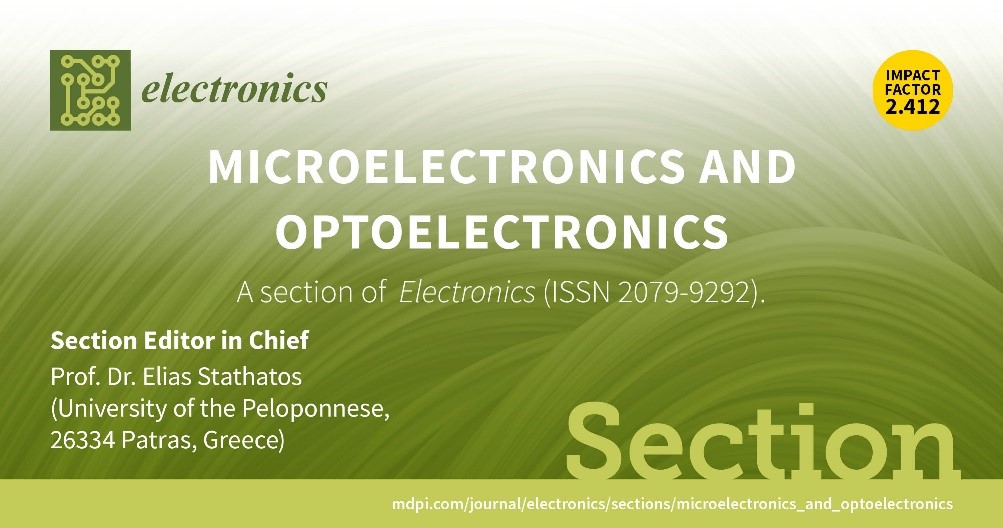
“Microelectronics and Optoelectronics” is focused on the fabrication of electronic, photonic, bioelectronic, electromechanics, and fluidic devices and systems, and their applications in the broad areas of electronics, photonics, energy, and the environment. This section will also cover the expanding interdisciplinary field of integrated nanoelectronics and photonics and micro- and nano-biosystems. The purpose of this section is to bring together researchers and engineers, from both researchers in academia and professionals in industry, to present the novel ideas and new research.
Subject areas of interest include, without being limited to the following:
- Microelectronics processing and materials;
- Micro- and nanoengineering, fabrication, technology, and manufacturing;
- Nanoelectronic and photonic devices and their fabrication;
- Microsystems, microdevices (e.g., sensors and nanoenergy devices) and their fabrication;
- Microfluidics, sensors, as well as integrated chip and their fabrication.
You are welcome to join our section Editorial Board Members and contribute to this section.
For more information, please visit
https://www.mdpi.com/journal/electronics/sections/microelectronics_and_optoelectronics.
If you have any questions, please contact [email protected].
4 March 2021
Recruiting Journal Board Members for Section “Networks” in Electronics
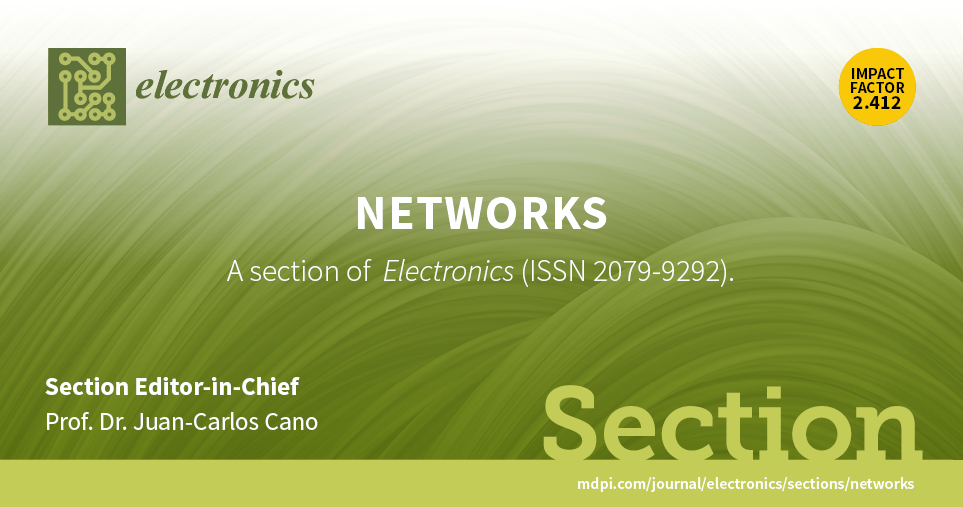
The “Networks” section provides full coverage of all topics of interest involved in the networking area. The purpose of this section is to bring together researchers, engineers, and students from academia and industry to present novel ideas and solid research about the theoretical and practical aspects in the application domains of computer communications and networks.
The primary focus of the section is on the analysis, modeling, design, simulation, and implementation of computer networks, from wired systems to wireless systems. The section will also serve to attract research concerning the application of networking architectures and scenarios to emerging research topics, such as IoT, smart cities, edge computing, ITS, and unmanned aerial vehicles, among others.
If you are an active researcher in the field and are passionate about participating in cutting-edge research publications, please do not hesitate to contact us about joining the Board and contributing to this section.
For more information, please visit https://www.mdpi.com/journal/electronics/sections/networks.
If you have any questions, please contact [email protected].
22 February 2021
Recruiting Editorial Board Members for Section “Organic Electronics” in Electronics

“Organic Electronics” has been receiving increasing attention on both an academic and industrial level as a new branch of electronics that enables various innovative fields of application. The aim of this section is to provide researchers with a highly multidisciplinary platform in which they can report and read about:
(i) The chemical and physical properties of materials, from small molecules to solution-processable polymers;
(ii) The design and fabrication of novel devices based on organic materials, such as organic field effect transistors, organic solar cells or light emitting diodes, memory elements, thermoelectric generators, and others;
(iii) The development and optimization of novel fabrication procedures, from the vapor or liquid phase, with particular attention being paid to high-throughput and cost-effective approaches;
(iv) Employment of the aforementioned devices in the realization of novel applications, from flexible circuits and displays to smart tags, flexible lab-on-a-chip, artificial skin, etc.
If you are an active researcher in the field and are passionate about participating in cutting-edge research publications, please do not hesitate to contact us about joining the Editorial Board and contribute to this section.
For more information, please visit https://www.mdpi.com/journal/electronics/sections/organic_electronics.
If you have any questions, please contact [email protected].
18 February 2021
Industrial Electronics Section EB Recruiting
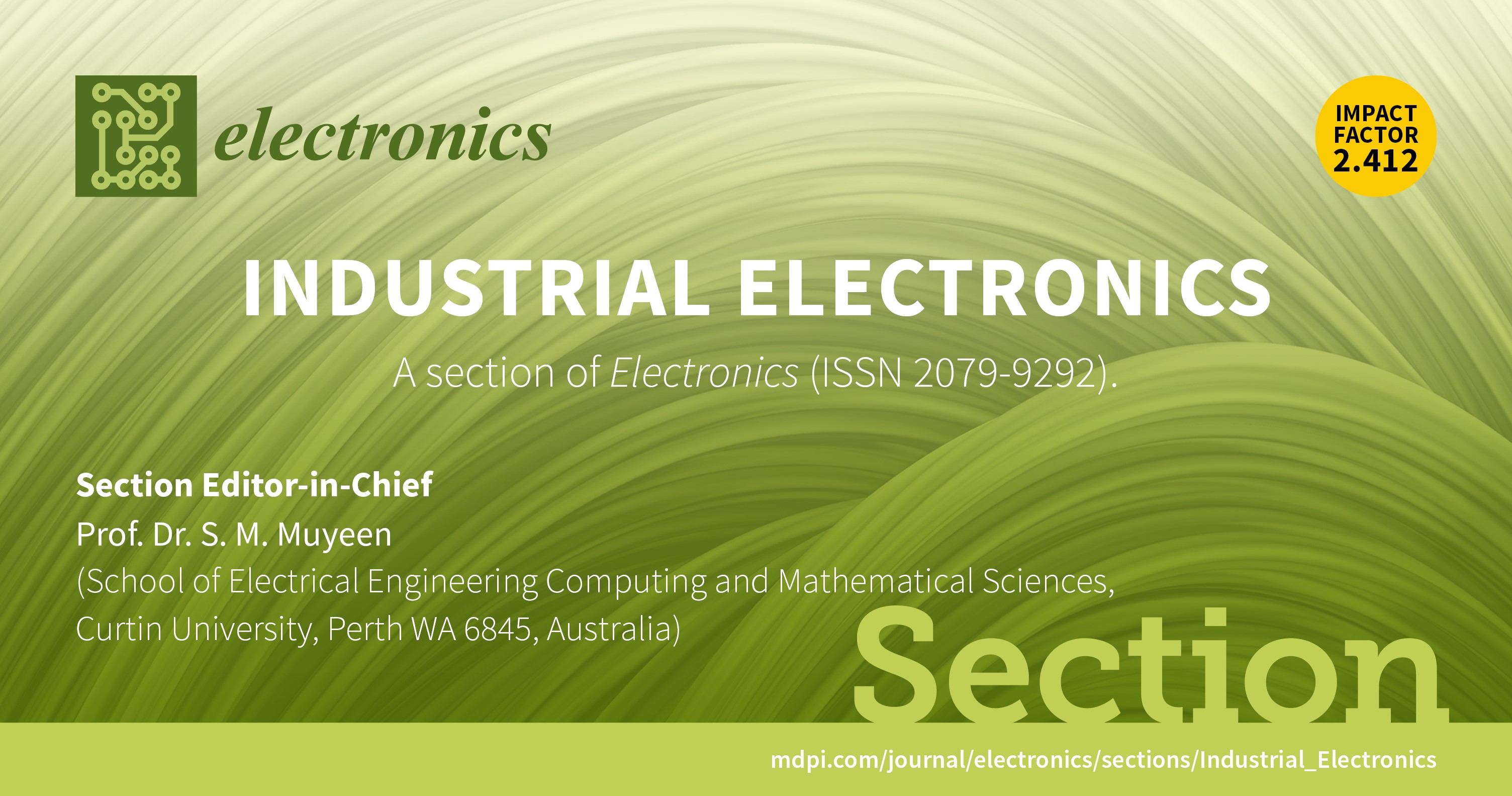
Industrial electronics play a vital role in improving the efficiency and productivity of industries like energy, transportation, petroleum, chemical, semiconductor, mining, agriculture, and others. As a branch of electronics dealing with power electronic switches, sensors, actuators, meters, intelligent electronic devices (IEDs), automation equipment, semiconductors, nanotechnology, etc., emphasis is currently placed on power conditioning using power semiconductor devices in modernizing industry technology.
This section is devoted to presenting the emerging technologies and trends in the industrial electronics sector and includes original research and state-of-the-art review articles. The main research area includes applications of industrial electronics and its control, computation, and communication to enrich industrial systems and processes. All submissions are subject to a peer-review process. We encourage the submission of original contributions derived from theoretical- and/or application-oriented research studies.
The subject areas of interest include but are not limited to:
- Industrial electronics and controls;
- Industrial drives;
- Industrial electronics for renewable energy grid interfacing;
- Automotive industry electronics and associated controls.
You are welcome to join our section Editorial Board Members and contribute to this section.
For more information, please visit https://www.mdpi.com/journal/electronics/sections/Industrial_Electronics
If you have any questions, please contact [email protected].
3 February 2021
Electronics | 2020 Outstanding Reviewer Awards—Winners Announced
We are pleased to announce the winners of the Electronics 2020 Outstanding Reviewer Awards. The Electronics Editorial Board and Editorial Team would like to gratefully acknowledge the time and energy dedicated by reviewers in checking the manuscripts submitted to Electronics. It is due to their efforts that the high quality of the journal and quick turnaround are maintained.
Prof. Dr. Byeong Yong Kong
Affiliation: Division of Electrical, Electronic, and Control Engineering, Kongju National University, Cheonan, Korea
Research Interests: VLSI signal processing; digital systems; system on chip (SoC); wireless communications
Prof. Emilio Matricciani
Affiliation: Department of Electronics, Information, and Bioengineering, Politecnico di Milano, Milan, Italy
Research Interests: satellite communication; deep-space communication; orbits; propagation; fade countermeasures; mobile and fixed users
Prof. Dr. Paolo Mercorelli
Affiliation: Institute of Product and Process Innovation, Leuphana University of Lueneburg, Lueneburg, Germany
Research Interests: control systems; mechatronics; actuators; engine control; signal processing; wavelets; Kalman filter; energy control
For more information about Electronics awards, please see the following link: https://www.mdpi.com/journal/electronics/awards.
3 February 2021
Electronics | 2020 Best Paper Awards—Winners Announced
Dear colleagues,
We are pleased to announce the winners of the Electronics 2020 Best Paper Awards. All papers published in 2019 in Electronics were considered for the award. After a thorough evaluation of the originality and significance of the papers, citations, and downloads, the two winning papers, which were nominated by the journal’s Award Committee, have been selected and they are the following:
Article
Assessment of Dual Frequency GNSS Observations from a Xiaomi Mi 8 Android Smartphone and Positioning Performance Analysis
By Umberto Robustelli, Valerio Baiocchi, and Giovanni Pugliano
Electronics 2019, 8(1), 91.
Review
A State-of-the-Art Survey on Deep Learning Theory and Architectures
By Md Zahangir Alom, Tarek M. Taha, Chris Yakopcic, Stefan Westberg, Paheding Sidike, Mst Shamima Nasrin, Mahmudul Hasan, Brian C. Van Essen, Abdul A. S. Awwal, and Vijayan K. Asari
Electronics 2019, 8(3), 292.
The authors will receive an award of 400 CHF, a certificate, and an opportunity to publish one paper free of charge before 31 December 2021, after the normal peer review procedure.
We believe the above papers represent valuable contributions to Electronics and the scientific literature. Please join us in congratulating the winners of Electronics 2020 Best Paper Awards. We would also like to take this opportunity to thank all our authors for their continued support.
26 January 2021
Electronics 2021 Best Paper Award for Special Issue “Women in Electronics”
Dear Colleagues,
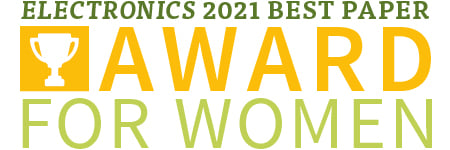
In 2021, Electronics is celebrating its 10th anniversary. Since its first paper published in 2011, Electronics has received important support and excellent contributions from female scientists. They have served as our Editorial Board Members, Guest Editors, Topic Editors, authors, and reviewers.
To celebrate and highlight the achievements of women in the research area of electronics, Electronics is pleased to announce that the “Electronics 2021 Best Paper Award for Women” will be launched and granted to one best paper published in the “Women in Electronics” Special Issue. The paper will be selected after thorough evaluation by the Journal Award Committee.
Eligibility for the Award:
– Open to all career levels;
– ONLY submissions in “Women in Electronics” will be considered.
Selection Criteria:
The papers will be selected by the journal Award Committee according to the following criteria (data source: Web of Science (Clarivate Analytics)):
– Scientific merit and broad impact;
– Relevance to the journal’s field;
– Originality of the research objectives and/or the ideas presented;
– Creativity of the study design or uniqueness of the approaches and concepts;
– Clarity of presentation;
– Citation and download rates by 28 February 2022.
The award will consist of the following:
– 500 Swiss Francs;
– A certificate;
– An opportunity for the winner to publish her next submission in Electronics free of charge in 2022.
The winners will be announced on the journal website in March 2022.
If you want to know more about the Special Issue and submit your paper, please follow this link: https://www.mdpi.com/journal/electronics/special_issues/women_electronics
Kind regards,
Electronics Editorial Office
25 December 2020
Electronics Has Become a Semimonthly Publication
We are pleased to announce that Electronics became a semimonthly publication on 1 January, 2021. A semimonthly publication allows papers to be indexed in Web of Science and other indexing databases on a semimonthly basis rather than every month, and they become searchable and are cited earlier. We also acknowledge the many valuable publications from our authors and the important contribution of our dedicated reviewers.
22 December 2020
Electronics Celebrates Its 10th Year of Publication in 2021
It has been almost ten years since the first paper was published in Electronics back in 2011. We are very proud to have reached this very important milestone of the 10th anniversary of the journal. To celebrate this momentous occasion, we launched a series of special content and events. Scholars, academic scientists, researchers, and professional groups are welcome to join us, whether by submiting original contributions and/or review papers, applying to join our Editorial board, and participating in the celebration events.
Anniversary Special Issues
10th Anniversary of Electronics: Advances in Microwave and Wireless Communications
https://www.mdpi.com/journal/electronics/special_issues/10th_microwave
10th Anniversary of Electronics: Advances in Networks
https://www.mdpi.com/journal/electronics/special_issues/10th_anniversary_advances_networks
10th Anniversary of Electronics: New Advances in Systems and Control Engineering
https://www.mdpi.com/journal/electronics/special_issues/10th_Anniversary_System_Control
10th Anniversary of Electronics: Recent Advances in Microelectronics and Optoelectronics
https://www.mdpi.com/journal/electronics/special_issues/10th_microelectronics_optoelectronics
10th Anniversary of Electronics: Advances in Circuit and Signal Processing
https://www.mdpi.com/journal/electronics/special_issues/10th_circuit_signal
10th Anniversary of Electronics: Hot topics in Bioelectronics
https://www.mdpi.com/journal/electronics/special_issues/anniversary_bioelectronics
10th Anniversary of Electronics: Recent Advances in Power Electronics
https://www.mdpi.com/journal/electronics/special_issues/10_power_electronics
10th Anniversary of Electronics—Hot Topic in Artificial Intelligence Circuits and Systems
https://www.mdpi.com/journal/electronics/special_issues/HTIAICAS_electronics
10th Anniversary of Electronics: Recent Advances in Computer Science & Engineering
https://www.mdpi.com/journal/electronics/special_issues/10th_Anniver_Computer_Engineering
10th Anniversary of Electronics: Related Researches in Electrical and Autonomous Vehicles
https://www.mdpi.com/journal/electronics/special_issues/EAV
10th Anniversary of Electronics: Recent Advances in Semiconductor Devices
https://www.mdpi.com/journal/electronics/special_issues/Semiconductor_Devices
Best Paper Awards for Anniversary Special Issues
Eligibility for the awards:
– Two papers published in the 10th Anniversary Special Issues;
– Both research articles and review articles will be considered.
Selection criteria:
The papers will be selected by the journal award committee according to the originality, novelty and scientific contributions in the field.
Prizes:
The award will consist of a certificate and 500 Swiss Francs. Each winner has the option to publish a paper free of charge in Electronics, after the normal peer-review procedure.
The winners will be announced 3 months after the submission deadline.
22 December 2020
Electronics 2021 Travel Awards—Open for Application
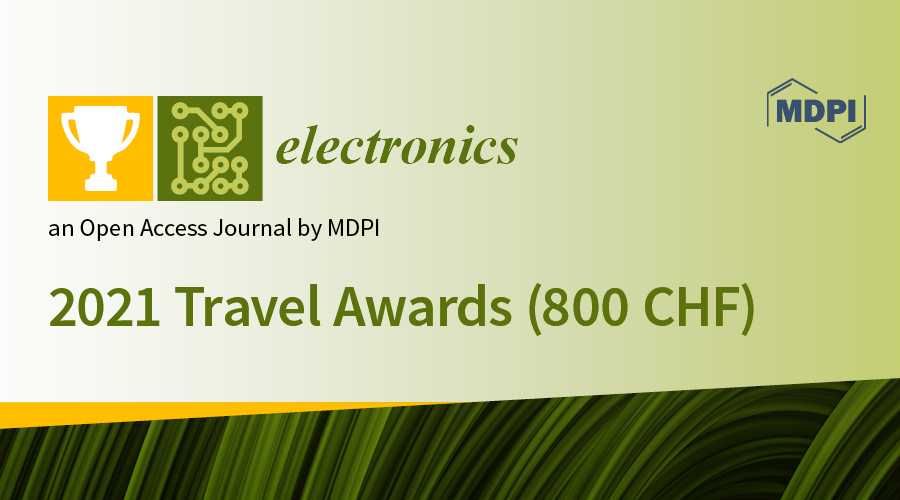
Dear colleagues,
We are accepting applications for the Electronics 2021 Travel Award, to be presented to two postdoctoral fellows to attend a conference in 2021. The award will be amount of CHF 800 (Swiss francs), to partially cover the transportation costs to a conference of the applicant’s choice.
All nominations and applications will be assessed by an Evaluation Committee composed of senior scholars in the field.
Candidate Requirements:
– Must be a postdoctoral fellow within the research field of electronics.
– Will participate in an international conference in 2021 (poster or oral presentation).
– Will be asked to acknowledge the support of the journal Electronics during their presentation.
Required Documents:
– An abstract and conference details (no more than one page).
– A CV (no more than three pages), including a one-page statement from the candidate describing their research interests and a list of publications.
– A letter of recommendation from their supervisor or principal investigator (PI). The supervisor or PI should sign and confirm that the applicant fulfills all of the above requirements.
Please submit your application at the following link (https://www.mdpi.com/journal/electronics/awards/submit/966) by 28 February 2021.
The winner of this award will be announced on the journal website on 31 March 2021.
22 December 2020
Electronics 2021 Young Investigator Award—Open for Nomination
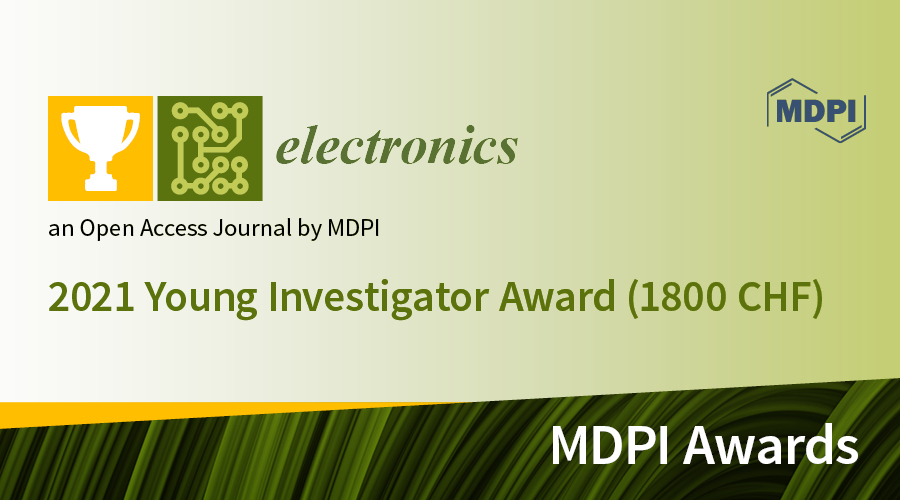
Dear colleagues,
We are pleased to launch the 2021 Electronics Young Investigator Award. This prize will be given to a young investigator in recognition of their excellence in the research field of electronics and its applications.
All nominations and applications will be assessed by an Evaluation Committee consisting of senior scholars in the field.
Candidate Eligibility and Requirements:
– Must have received a Ph.D. degree within the past 10 years within the scope of Electronics (https://www.mdpi.com/journal/electronics/about).
– Must be 40 years of age or under (as of 31 December 2020).
List of Documents Needed for Application:
– A detailed curriculum vitae, including an updated publication list and a list of the researcher’s own research grants.
– A detailed publication list from 2020, including authors, titles, and journals.
– A list of conferences that the candidate attended in 2020 as well as the research results presented.
– A scanned copy of the candidate’s doctorate certificate.
– Signed nomination letters from two established senior scientists.
The Award:
– CHF 1800 (Swiss francs).
– An offer to publish a paper free of charge without a fixed deadline in Electronics.
– A certificate.
The candidates should be nominated by a senior expert in the field rather than send applications themselves. The letter should highlight their achievements and contributions to the field. Additional references will be requested by the committee if necessary.
Candidate nomination application materials should be submitted via the link (https://www.mdpi.com/journal/electronics/awards/submit/967).
We welcome nominations for this award until 28 February 2021.
The winner will be announced on the Electronics website by the end of March 2021.
15 December 2020
MDPI adopts C4DISC principles to improve diversity and inclusion in scholarly communications
MDPI is proud to adopt the principles of the Coalition for Diversity & Inclusion in Scholarly Communications (C4DISC) to support building equity, inclusion, diversity, and accessibility in scholarly communications.
The C4DISC represents organizations and individuals working in scholarly communications and is focused on addressing issues of diversity and inclusion within the publishing industry.
MDPI’s Managing Editors encourage the Editors-in-Chief and Associate Editors to appoint diverse expert Editorial Boards. This is also reflective in our multi-national and inclusive workplace. We are proud to create equal opportunities without regard to gender, ethnicity, geographic location, sexual orientation, age, disability, political beliefs, religion, or socio-economic status. There is no place for discrimination in our workplace and editors of MDPI journals are to uphold these principles in high regard.
Representatives from C4DISC meet monthly, and have started to implement initiatives to shed light and improve on the lack of diversity in scholarly communications. Some of the initiatives include developing a joint statement of principles; conducting market research; providing training resources, best practices, toolkits, and documentation for our collective memberships; and establishing outreach programs, curricula, events, and publications.
The Coalition is committed to:
- eliminating barriers to participation, extending equitable opportunities across all stakeholders, and ensuring that our practices and policies promote equitable treatment and do not allow, condone, or result in discrimination;
- creating and maintaining an environment that respects diverse traditions, heritages, and experiences;
- promoting diversity in all staff, volunteers, and audiences, including full participation in programs, policy formulation, and decision-making;
- raising awareness about career opportunities in our industries to groups who are currently underrepresented in the workforce;
- supporting our members in achieving diversity and inclusion within their organizations.
14 December 2020
Article Layout and Templates Revised for Future Volumes
At MDPI we have slightly revised the layout for articles to be published in the 2021 Volume, starting at the end of December 2020. As of today, the article templates available for download on ‘Instructions for Authors’ pages have been updated.
The most noticeable change can be found on the first page of the article, where a left-hand column has been created to include the following front matter elements: (i) the recommended citation style for the article, (ii) the publishing history, (iii) as well as the Creative Commons Attribution license used (iv) a standard note regarding affiliations. At the same time, the extra spacing on the left means the authors’ affiliations are now more clearly set apart than before. Other front matter key elements such as journal logo, article type, article title, authors, abstract and keywords remain unchanged.
The blank column on the left runs through all pages in an article; as a result, the main text is slightly more condensed, which improve reader friendliness for smaller screens. Small figures/tables are aligned on the left with standard indenture, while large figures/tables are centered and covering the full width of the page. The revised layout was applied in the article pictured below, to serve as an example:

1) Information is displayed in the left information bar.

2) In the main text, there is a blank column on the left.

3) Small tables/figures are aligned on the left, large tables/figures are centered.
11 December 2020
2020 "Highly Cited Researchers" on MDPI Journal's Editorial Boards
We are pleased to acknowledge that many academic editors who have made an impact on MDPI journals as editorial board members, editors-in-chief, or section editors, are recognized as 2020 Highly Cited Researchers by Clarivate.
Highly Cited Researchers highlights the top 1% of researchers, by citations, in one or more of the 22 fields used in Clarivate Analytics Essential Science Indicators. We offer our congratulations to 279 academic editors of MDPI journals who were recognized as the most influential scholars in their fields in 2020.
Adams, Dave Agarwal, Ravi P. Ahn, Choon Ki Ahn, Myung-Ju Albrecht, Randy A. Andersson, Dan I. Anker, Stefan D. Apergis, Nicholas Ariga, Katsuhiko Artaxo, Paulo Balsamo, Gianpaolo Barba, Francisco J. Benediktsson, Jon Atli Benelli, Giovanni Bhatnagar, Amit Bialystok, Ellen Blaabjerg, Frede Blay, Jean-Yves Bogers, Marcel Bolton, Declan J. Boyer, Cyrille Brocca, Luca Bruix, Jordi Buhalis, Dimitrios Burdick, Jason A. Byrd, John C. Cabeza, Luisa F. Cabrerizo-Lorite, Francisco Javier Cai, Jianchao Calhoun, Vince D. Cantu, Robert C. Cerqueira, Miguel Chang, Jo-Shu Chau, Kwok-wing Chemat, Farid Chen, Jianmin Chen, Jun Chen, Min Chen, Shaowei Chen, Wei Chen, Wei-Hsin Chen, Xiaofeng Chen, Yangkang Chen, Zhi-Gang Chiclana, Francisco Corella, Dolores Cortes, Javier Cortes, Jorge Cummings, Kenneth Michael Dai, Shifeng Decker, Eric A. DePinho, Ronald A. Dimopoulos, Meletios-Athanasios Dincer, Ibrahim Du, Yihong Dupont, Didier Edwards, David Ellahi, Rahmat Ellis, Erle C. ElMasry, Gamal Esteller, Manel Estruch, Ramón Fang, Chuanglin Fasano, Alessio Fernandez-Lafuente, Roberto Ferreira, Isabel Fortino, Giancarlo Galluzzi, Lorenzo Galvano, Fabio Gandomi, Amir H. Gandomi, Amir H. Gao, Bin Gao, Feng Gao, Wei Garbe, Claus García, Hermenegildo Geschwind, Daniel H. Giampieri, Francesca Giralt, Sergio A. Glanz, Karen Goldewijk, Kees Klein Gössling, Stefan Govindan, Kannan Granato, Daniel Grosso, Giuseppe Grosso, Giuseppe Guerrero, Josep M. Haase, Dagmar Hagger, Martin S. Hamblin, Michael R. Han, Heesup Jankovic, Joseph Janotti, Anderson |
Jiang, Hai-Long Kalaji, Hazem M. Kalantar-Zadeh, Kourosh Kaner, Richard B. Karimi, Hamid Reza Kataoka, Kazunori Keesstra, Saskia Kepp, Oliver Kerminen, Veli-Matti Keyzers, Robert A. Khademhosseini, Ali Khan, Nafees A. Kim, Ki-Hyun Klemeš, Jiří Jaromír Klenk, Hans-Peter Konopleva, Marina Y. Krammer, Florian Krebs, Frederik C. Kroemer, Guido Kudo, Masatoshi Kurths, Juergen Kurzrock, Razelle Kuznetsov, Nikolay V. Kyrpides, Nikos C. La Vecchia, Carlo Lai, Yuekun Lam, James Lancellotti, Patrizio Lee, Sangmoon Leung, Victor C. M. Li, Jinghong Li, Yurui Lindahl, José M. Merigó Lip, Gregory Y. H. Loh, Xian Jun Long, Hualou Lund, Henrik Luo, Jingshan Luque, Rafael Lyons, Timothy W. Ma, Jun Ma, Wen-Xiu Ma, Yanming Maeda, Keisuke Makarova, Kira Mantovani, Alberto Martín-Belloso, Olga Martinoia, Enrico Marzband, Mousa Masclaux-Daubresse, Celine Masson, Patrick Mateos, María Victoria Mathiesen, Brian Vad Matyjaszewski, Krzysztof McArthur, Grant A. McCauley, Darren Medlock, Jolyon M. Melero, Ignacio Mezzetti, Bruno Miroshnichenko, Andrey E. Moran, Daniel Mueller, Lukas A. Mueller-Roeber, Bernd Naushad, Mu Nemeroff, Charles B. Nieto, Juan J. O'Donnell, Colm Ogino, Shuji Olabi, Abdul-Ghani O'Regan, Donal Orsini, Nicola Oswald, Isabelle P. Ozcan, Aydogan Pahl-Wostl, Claudia Pang, Huan Payne, James E. Peng, Shushi Perc, Matjaz Perez-Alvarez, Jose Angel Piquero, Alex R. Ploss, Alexander Postolache, Mihai Pradhan, Biswajeet Prinsep, Michele R. Qian, Dong Qu, Xiaogang Reiter, Russel J. Riahi, Keywan Richter, Andreas Rignot, Eric Robert, Caroline Ros, Emilio Rosell, Rafael |
Rosen, Marc A. |
The full list of 2020 Highly Cited Researchers can be accessed on https://recognition.webofsciencegroup.com/awards/highly-cited/2020/
--- Highly Cited Researchers (HCR) is a Clarivate product.
12 November 2020
2nd Webinar on Electronics: Beyond 5G Evolution (19 November 2020, 3:00pm CET)

This webinar will address issues related to 5G and beyond, allow our incredible Principal Investigators to share their personal scientific stories, and provide our audience with the opportunity to ask questions and directly connect with scientists involved in 5G.
Date: 19 November 2020
Time: 3:00 pm (CET)
Webinar ID: 984 1509 5815
Register for free here: https://sciforum.net/conference/electronics-2
Chair:

Prof. Dr. Carlos Jesús Bernardos Cano
EBM of Section “Networks” of Electronics
Interests: network virtualization; IP mobility management; wireless experimentation; cloud computing and vehicular communications
Speaker 1
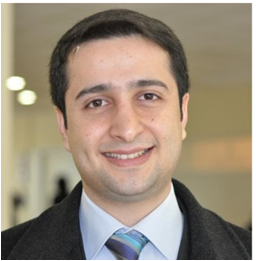
Dr. Ömer Bulakci (Nokia Bell Labs)
Topic: Role of 5GPPP Architecture WG toward B5G/6G System
Dr. Ömer Bulakci is currently a Senior Research Engineer at Nokia Bell Labs, Munich, Germany, and Vice-Chairman of the 5GPPP Architecture Working Group (WG). He has received B.Sc. (METU, Turkey, 2006), M.Sc. (TUM, Germany, 2008), and doctorate (Aalto University, Finland, 2013) degrees. He worked at Nokia Siemens Networks, Germany, on LTE-A relaying (2009–2012) in support of his doctorate studies. From 2012 to February 2020, he conducted research toward the 5G system, contributed to EU flagship projects METIS, METIS-II (leading a work package on RAN synchronous control plane design), and 5G-MoNArch (leading a work package on overall architecture and E2E network slicing), and contributed to 5G standardization (3GPP Releases 15, 16, and 17) at Huawei GRC, Germany. He is an author or co-author of 75+ technical publications (including 5G book chapters and editorship) and an inventor of 50+ patents/patent applications. His research interests comprise network slicing, industrial IoT, RRM, dynamic network topology, and system design and performance analysis of mobile networks.
Speaker 2

Dr. Alain Mourad (InterDigital Labs)
Topic: On the Path to 6G: Target Capabilities and Technology Trends
Alain Mourad has 18+ years of experience in wireless communications industrial R&D. He is currently a Director Engineering R&D at InterDigital Labs in London (UK), leading research and innovation for 5G and beyond radio access networks. Prior to joining InterDigital, from 2007 to 2014, Alain was a Principal Engineer at Samsung Electronics R&D (London, UK), where he led research and standardization efforts with a focus on ATSC 3.0, DVB-T2 and DVB-NGH, and WiMAX IEEE 802.16m. From 2002 to 2007, he was a Senior Engineer at Mitsubishi Electric R&D Centre Europe (Rennes, France), where he contributed technology development toward HSPA+ and 3GPP LTE/LTE-Advanced (4G). Alain is a prolific inventor with over 50 issued patents and several additional pending applications. He is a thought leader who has participated in numerous talks, panels, and publications. Alain has received several awards, notably the Inventor of the Year Award from Samsung Electronics R&D in 2012 and 2013, InterDigital Innovation Awards in 2016 and 2018, and the 2018 Global Telecoms Awards “Highly Commended” in the category “Advancing the Road to 5G”.
Speaker 3

Dr. Josep Mangues-Bafalluy (CTTC)
Topic: Network Architectures for 5G and Beyond
Josep Mangues-Bafalluy has been a Senior Researcher and Head of the Communication Networks Division of the Telecommunications Technological Center of Catalunya (CTTC) since 2013, a division that is currently composed of 30 researchers. He has a degree (1996) and a PhD (2003) in Telecommunications Engineering from the Technical University of Catalunya (UPC) and over 20 years of experience in the networks field (including mobile networks, application of machine learning to network optimization, testbed design and deployment, and network function virtualization). Josep has held various roles (including leadership) in several publicly funded and industrial research projects (e.g., 5GPPP 5Growth, 5G-Transformer, and Spanish 5G-REFINE), with a recent emphasis on adapting network infrastructures to the needs of vertical industries (e.g., automotive/transportation, industry 4.0, media, eHealth) and automated network management. He has published 120+ international journal articles and conference papers. He was Vice-Chair of IEEE WCNC 2018 (Barcelona). He was also a Researcher and Assistant Professor at UPC from 1996 to 2003.
For any questions about the webinar, please send an email to [email protected]
4 November 2020
Open for Discussion: the 1st International Electronic Conference—Futuristic Applications on Electronics
Dear Scientists, Researchers, and Authors,
We are delighted to announce that IEC 2020 is now open for discussions at:
https://iec2020.sciforum.net
Discussions will be open from 1 to 30 November.
As some of you have already learned, you will now be able to interact with other conference participants via the several functions on Sciforum, which can be accessed and used once you log in. Leave your comments on articles directly at the conference website, select your favorite papers and collect them on your user profile, rate papers you have read, and most of all, SHARE your thoughts and comments among your peers on the conference page! Please find a short overview of all the means of interaction and functions at
http://sciforum.net/file/download/UserInterfaceAndFunctions.pdf.
Extended and expanded versions of conference proceedings papers can be submitted to Special Issue “Selected Papers from the 1st International Electronic Conference – Futuristic Applications on Electronics” in the journal Electronics, with a 10% discount on the Article Processing Charges.
Please note that we will present awards for the best paper (2 winners), best poster (2 winners), and best presentation (1 winner), as selected by the organizers. The Best Paper Awards will consist of 400 Swiss francs. The Best Poster Awards will consist of 300 Swiss francs. The Best Presentation Award will consist of 200 Swiss francs.
We would like to take this opportunity to thank all of you for your input, and hope you enjoy the conference and make the most of it!
We look forward to your contributions and discussions.
4 November 2020
Electronics Special Issue “New Techniques and Components for Microwave and Radiofrequency Applicator Design” is open for submission now.

This Special Issue is edited by Prof. Dr. Juan Monzó-Cabrera, Prof. Dr. Alejandro Díaz-Morcillo, and Prof. Dr. Lozano-Guerrero Antonio. The aim of this Special Issue was to collect the latest advances on microwave and RF applicator design in different areas.
Potential topics in microwave and RF applicator design areas include but are not limited to the following:
- New design techniques for monomode and multimode cavities;
- Design of applicators and components for specific applications in food, waste management, medical, biological or chemical/biochemical fields, etc.;
- Emerging technologies such as solid-state applicators;
- New EM modeling and numerical techniques;
- Microwave plasma applicators and processing (CVD, cleaning, nanoparticles, etc.);
- Microwave component design and optimization: filters, stirrers, circulators, matching devices, etc.;
- Frequency sources and power supply design
- Electronics and microwave devices for microwave-heating and drying monitoring;
- Design and optimization of multimode feeding: leaky-wave antennas, slotted waveguides, multiport optimization, etc;
- Design of new radiofrequency applicators and components.
Moreover, this SI is cooperated by the 18th International Conference on Microwave and High-Frequency Applications: AMPERE 2021, it will be held in Gothenburg, Sweden, 13–16 September 2021. Selected papers from AMPERE 2021 and all the external contributions in this filed are welcome in this Special Issue.
Submission deadline: 15 October 2021
For more information, please refer to the Special Issue and conference website.
https://www.mdpi.com/journal/electronics/special_issues/RF_Applicator
Submission guidelines:
Submission: link: https://susy.mdpi.com/user/manuscripts/upload/09be35b81f092405c365adeecdae7795?form%5Bjournal_id%5D=127&form%5Bspecial_issue_id%5D=63806
Instructions for authors:
https://www.mdpi.com/journal/electronics/instructions
A template /Word/ file:
https://www.mdpi.com/files/word-templates/electronics-template.dot
A template /Latex/ file:
https://www.mdpi.com/authors/latex.
If you have any questions, please contact [email protected]/ [email protected]
29 October 2020
Introducing Editor's Choice Articles in Electronics
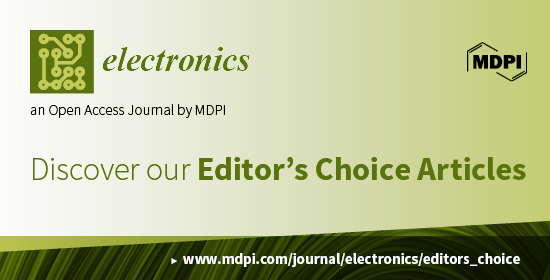
Dear authors and readers of Electronics,
Electronics would like to introduce a new feature, called "Editor's Choice Articles", which highlight outstanding papers published in the journal. These are selected by the editors, and include original articles which make important and impactful findings, as well as review articles that are excellently written. With this feature, readers can expect timely and useful highlights of recent articles in the journal, and deserving authors would receive more attention on their excellent contributions. We hope that this feature will enhance your reading pleasure and experience with Electronics.
25 October 2020
First Webinar of Electronics: Artificial Intelligence Circuits and Systems (AICAS)—28 October 2020. 13:00 CET

This webinar will address matters related to Artificial Intelligence Circuits and Systems, allowing our incredible principal investigators to share their personal stories of science, and provide our audience with the opportunity to ask questions and connect with AI scientists directly.
Date: 28 October 2020
Time: 11:00 a.m. (CEST)丨5:00 a.m. (EDT)丨17:00 p.m. (CST ASIA)
Webinar ID: 861 1225 4623
Register for Free Here: https://sciforum.net/conference/Electronics-1
Chair: Prof. D.Sc. Valeri Mladenov

Editorial Board Member of “Artificial Intelligence Circuits and Systems (AICAS)”
https://www.mdpi.com/journal/electronics/sectioneditors/AICAS
Interests: artificial intelligence; circuits and systems; electronics; power systems; smart grids; mathematical modeling; control theory and applications
Speaker 1. Prof. Huai Wang

Huai Wang is currently a Professor with the Center of Reliable Power Electronics (CORPE), and the Vice Leader of the Efficient and Reliable Power Electronics Research Program at Aalborg University. He has contributed more than 100 journal papers and co-edited a book on the Reliability of Power Electronic Converter Systems in 2015. He has given 25 tutorials at leading power electronics conferences (e.g., PCIM Europe, APEC, ECCE, etc.), and more than 80 invited talks.
Presentation: The Application of AI for Condition and Health Monitoring of Power Electronic Converters
Speaker 2. Prof. Georgi Radulov

Editorial Board Member of “Artificial Intelligence Circuits and Systems (AICAS)”
https://www.mdpi.com/journal/electronics/sectioneditors/AICAS
Interests: RF and mm-wave transmitters and receivers; phased arrays; Nyquist and sigma–delta data converters; built-in-self-testing
Presentation: Artificial Intelligence in Modern Redundant Systems
For any questions about the webinar, please send an email to [email protected]
13 October 2020
Electronics—Call for Special Issue Proposals

Electronics is calling for Special Issue proposals for the eight new sections:
- Microelectronics and Optoelectronics
- Power Electronics
- Bioelectronics
- Microwave and Wireless Communications
- Circuit and Signal Processing
- Electrical and Autonomous Vehicles
- Organic Electronics
- Industrial Electronics
The following topics may be covered in forthcoming Special Issues in the journal:
|
Nanoelectronic, optoelectronic, and photonic devices Advanced MOS devices Flexible/organic/molecular electronics Optical and photonic systems Lab-on-a-chip, bioMEMS, microTAS Electromechanical systems (MEMS, NEMS) Power converters Adjustable speed drives (AC and DC motors) Power quality and utility applications Renewable energy applications Smart grids Biosignal acquisition/conditioning/detection Wearable and implantable sensors Wireless power transfer and management Bioinspired electronics Artificial intelligence for health management Bioinformatics for healthcare engineering Communication and radar signal processing Micro-/millimeter wave imaging technology Micro-/millimeter wave network technology Electromagnetic scattering and propagation |
Micro-/millimeter wave measurement technology Nonlinear circuits and systems Analog signal processing Nanoelectronics and cellular networks Power and energy circuits and systems Circuits, systems, and signal processing for communication and networking Autonomous vehicles Electric vehicles Fuel cell vehicles Hybrid vehicles Smart cities and transportation Vehicles and transportation security Organic field-effect transistors Highly flexible devices Flexible energy-harvesting devices Industrial electronics and controls Industrial electronics for renewable energy grid interfacing Intelligent electronic devices (IEDs) Electronics for smart grid communications Automotive industry electronics and associated controls IoT-enabled smart inverter FACTS and HVDC systems Factory automation and control |
Any other proposals within the scope of the journal are welcome: https://www.mdpi.com/journal/electronics/about.
The following information is required upon submission: Special Issue title, introduction, and planned paper list.
The duties of Guest Editors are as follows:
- Re-defining the title and scope of the Special Issue;
- Making decisions on whether a manuscript can be accepted based on the reports we collect;
- Promoting the Special Issue and increasing its visibility at related academic conferences.
The benefits granted to Guest Editors include full/partial waivers of publishing fees for their first submission in the Special Issue.
Guest Editorship: Once your proposal is approved, your first task is to organize a team of 2–3 Editors. This is intended to balance the workload and enable internal discussions if any controversial issues arise. Moreover, as Guest Editors have different research networks, cooperation broadens the coverage of potential authors, thereby increasing the influence of the Special Issue. The Publisher and EiC will review these Co-Editors to ensure that they meet the journal’s editorial requirements. We encourage teams to include Editors from multiple institutions and locations. This diversity reduces potential conflicts of interest and helps the issue to reach a wider audience.
If you are interested in editing a Special Issue, please contact us before 31 December 2020. To propose or request further information, please contact the Electronics Editorial Office ([email protected]). We look forward to hearing from you soon.
Electronics (ISSN 2079-9292; CODEN: ELECGJ) is an international peer-reviewed open access journal on the science of electronics and its applications. It is published monthly online by MDPI. The journal has been indexed by Science Citation Index Expanded (Web of Science) since Vol. 4 (2015), Inspec (IET) and Scopus (2019 CiteScore: 1.9). The manuscripts are peer-reviewed, and a first decision is provided to authors approximately 13.4 days after submission; acceptance for publication is undertaken within 3.4 days (median value for papers published in this journal in the first half of 2020). The website of Electronics can be accessed here.
25 September 2020
Recruiting Editors for Section “Artificial Intelligence” in Electronics
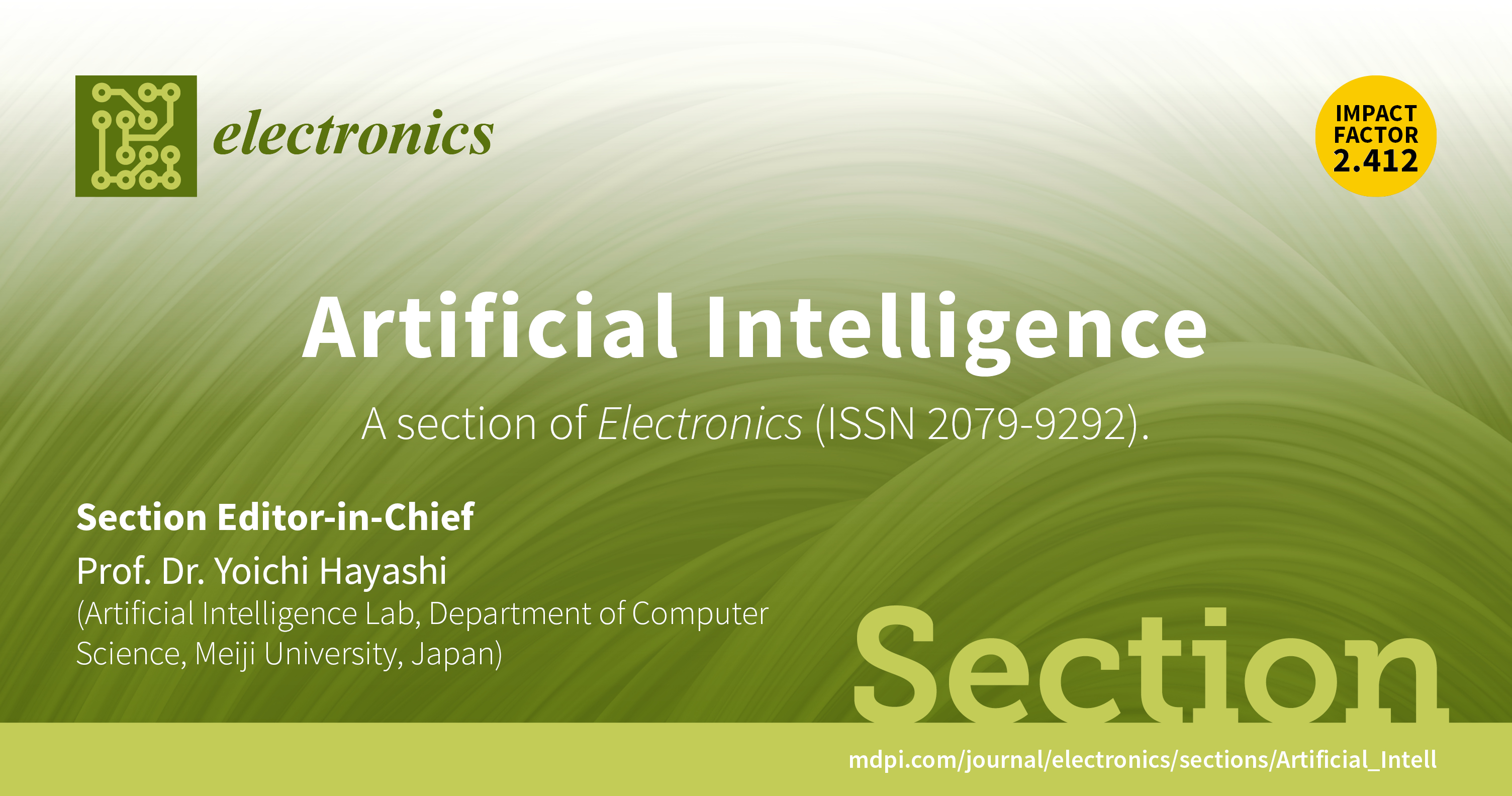
Section Editor-in-Chief: Prof. Dr. Yoichi Hayashi
The Artificial Intelligence section mainly covers topics of interest within hardware-based deep learning AI and algorithmic deep learning AI using machine learning. The purpose of this section is to bring together researchers and engineers, from both academia and industry, to present novel ideas and solid research on the hardware and algorithmic aspects of the industrial applications of deep learning-based AI.
The primary focus of this section is hardware-based deep learning AI. This section also focuses on the black-box nature of deep neural networks and shallow NNs, transparency, interpretability, and explainability of deep neural networks (DNNs) and algorithms and/or methods for the conversion of CNN into decision trees (DTs) and random forest.
Subject areas of interest include, without being limited to the following:
- Subsection for hardware-based deep learning AI
- Subsection for algorithmic deep learning AI using machine learning
- Algorithms and/or methods for conversion of CNN into DTs and random forest
- Explainable AI (XAI)
- Rule extraction algorithms/methods for shallow NNs
- Black box nature of DNNs versus the transparency of DNNs
You are welcome to join our section Editorial Board Members and contribute to this section.
For more information, please visit https://www.mdpi.com/journal/electronics/sections/Artificial_Intell
If you have any questions, please contact [email protected].
18 September 2020
Announcement of New Sections “Industrial Electronics”, “Organic Electronics”, and “Artificial Intelligence Circuits and Systems” in Electronics
We are pleased to announce the establishment of “Industrial Electronics”, “Organic Electronics”, and “Artificial Intelligence Circuits and Systems” as new sections of Electronics to cover the innovative technologies and applications in those electronic fields.
Industrial Electronics play a vital role in improving the efficiency and productivity of industries such as energy, transportation, petroleum, chemical, semiconductor, mining, agriculture, and others.
Organic Electronics have been receiving increased attention at both an academic and industrial level. The section welcomes papers on novel organic devices of materials, fabrication procedures, and applications.
Artificial Intelligence Circuits and Systems is focused on publications that are related to circuits and systems for artificial intelligence. The section covers topics of interest within hardware-based deep learning AI and algorithmic deep learning AI using machine learning.
19 August 2020
Electronics—Call for Editorial Board Members
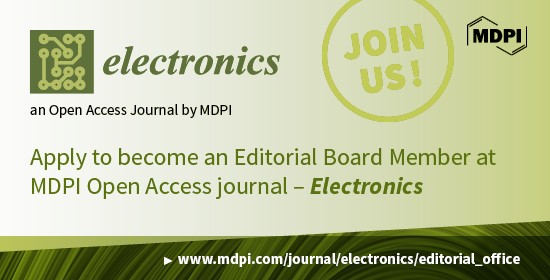
Electronics, an international open access journal published by MDPI, is looking for new Editorial Board Members (EBM) with the passion to drive the journal forward in this exciting period of development. Electronics is dedicated to the publication of high-quality reviews, research papers, and communications in all areas of Electronic Science and applications derived from both novel and established technologies. Please see the Electronics homepage for more information and details of the journal’s Aims & Scope.
This opportunity will allow you to keep up with research in our field and position yourself as one of the leaders in the evolving and exciting field of Electronics. Appointments to the Editorial Board are for a two-year period and may be renewable. Your name and affiliation will be displayed on the journal website.
The main responsibilities of Editorial Board Members are as follows:
- Working closely with Editors to develop the journal’s vision, policy, and practices;
- Pre-screening submissions and making decisions on whether a manuscript can be accepted or rejected for processing, and suggesting reviewers if necessary;
- Acting as the Guest Editor of a Special Issue in your particular field of expertise, or recommending potential topics and Guest Editors;
- Promoting Electronics and increasing its visibility at related academic conferences;
- Helping to solicit high quality papers for Electronics;
- Advising on the journal’s development.
The following are the criteria for the selection of board members:
- A PhD degree and relevant expertise;
- Having a strong interest in the scholarly journal;
- Holding an appointment at a university, or an academic or research institution;
- Prior experience in publishing and reviewing for peer-review publications.
To apply or request further information, please send your curriculum vitae and a short statement of interest to the Electronics Editorial Office ([email protected]). We look forward to hearing from you.
Kind regards,
Electronics Editorial Office
19 August 2020
Recruiting Editors for New Section “Industrial Electronics” in Electronics
In order to better categorize papers published within the journal, the section “Industrial Electronics” has recently been established. We are now recruiting Editorial Board members for this new section (https://www.mdpi.com/journal/electronics/sections/Industrial_Electronics).
If you are an active researcher in the field and are passionate about participating in cutting-edge research publications, please do not hesitate to get in touch ([email protected]). As an Editorial Board member, you will have the following responsibilities:
- To make decisions on whether a manuscript can be accepted or not based on the reports we collect;
- To serve as the Editor of a Special Issue on a topic related to your research interests when it is convenient for you;
- To review some manuscripts in your area of interest when you are available;
- To recommend timely topics or appropriate conferences;
- To promote Electronics and increase its visibility at related academic conferences.
19 August 2020
Recruiting Editors for New Section “Organic Electronics” in Electronics
In order to better categorize papers published within the journal, the section “Organic Electronics” has recently been established. We are now recruiting Editorial Board members for this new section (https://www.mdpi.com/journal/electronics/sections/organic_electronics).
If you are an active researcher in the field and are passionate about participating in cutting-edge research publications, please do not hesitate to get in touch ([email protected]). As an Editorial Board member, you will have the following responsibilities:
- To make decisions on whether a manuscript can be accepted or not based on the reports we collect;
- To serve as the Editor of a Special Issue on a topic related to your research interests when it is convenient for you;
- To review some manuscripts in your area of interest when you are available;
- To recommend timely topics or appropriate conferences;
- To promote Electronics and increase its visibility at related academic conferences.
9 July 2020
Open Access Agreement Between Jisc Collections and MDPI
We are delighted to announce the establishment of our Open Access agreement with Jisc Collections, which will allow UK institutions to benefit from access to article processing charge (APC) discounts and streamlined payment workflows.
All institutions participating in the agreement will also gain access to the MDPI online submission system where they can find full article metadata and pricing information for easy identification and additional transparency.
Eligible authors affiliated with the participating institutions are prompted to choose the corresponding Institutional Open Access Program (IOAP) when they submit an article via our online submission system.
About Jisc
Jisc's vision is for the UK to be the most digitally advanced education and research nation in the world. At its heart is the super-fast national research and education network, Janet, with built-in cyber security protection. Jisc also provides technology solutions for its members (colleges, universities and research centres) and customers (public sector bodies), helps members save time and money by negotiating sector-wide deals and provides advice and practical assistance on digital technology. Jisc is funded by the UK higher and further education and research funding bodies and member institutions.
For more information, contact [email protected].
About MDPI
MDPI is a publisher of fully peer-reviewed, Open Access journals with a focus on thorough and rapid editorial processing. Its aim is to ensure that high-quality research is verified and made available to the research community as quickly as possible. MDPI stands at the forefront of the Open Access movement, having launched its first online journal Molecules in 1996. Today, MDPI is a leader in Open Access publishing with over 250 journals across all research disciplines, and all content published under a Creative Commons Attribution License (CC BY).
For any questions about this agreement, please contact the MDPI IOAP team at [email protected].
29 June 2020
Updated Impact Factors Released in the Journal Citation Reports (Clarivate)
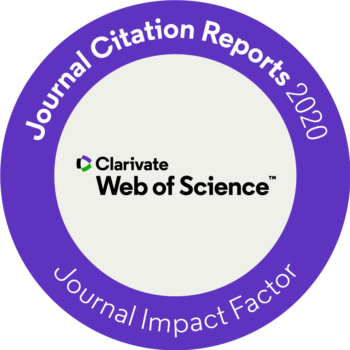
The updated citation metrics have been released in the Journal Citation Reports (JCR), published by Clarivate. The recent release of the JCR includes seventy-one MDPI titles. Out of these, 18 titles are newcomers, receiving a first Journal Impact Factor which is based on citation activity in 2019: Actuators, Agriculture, Biology, Biomedicines, Biosensors, Chemosensors, Children, Healthcare, Journal of Fungi, Journal of Personalized Medicine (JPM), Land, Life, Magnetochemistry, Membranes, Pharmaceuticals, Photonics, Separations and Toxics.
- Out of the previously listed journals, a total of 72 percent boast an increased Impact Factor.
- 25 journals are ranked among the top 25% of journals in at least one of the categories they are ranked for.
- Articles published in 2019 in MDPI journals account for approximately 17 percent of of articles published in gold Open Access journals covered in the Science Citation Index Expanded (SCIE) and Social Sciences Citation Index (SSCI).
First Impact Factors
| Journal | Impact Factor | Rank | Category | Details |
| Actuators | 1.957 | 31/64 (Q2) | • Instruments & Instrumentation | Link |
| Agriculture | 2.072 | 25/91 (Q2) | • Agronomy | Link |
| Biology | 3.796 | 19/93 (Q1) | • Biology | Link |
| Biomedicines | 4.717 | 30/138 (Q1) 36/270 (Q1) |
• Medicine, Research & Experimental • Pharmacology & Pharmacy |
Link |
| Biosensors | 3.240 | 24/86 (Q2) | • Chemistry, Analytical | Link |
| Chemosensors | 3.108 | 16/64 (Q1) 27/86 (Q2) 13/27 (Q2) |
• Instruments & Instrumentation • Chemistry, Analytical • Electrochemistry |
Link |
| Children | 2.078 | 50/128 (Q2) | • Pediatrics | Link |
| Healthcare | 1.916 | 62/102 (Q3) 45/87 (Q3) |
• Health Care Sciences & Services (SCIE) • Health Policy & Services (SSCI) |
Link |
| Journal of Fungi | 4.621 | 5/29 (Q1) 31/135 (Q1) |
• Mycology • Microbiology |
Link |
| Journal of Personalized Medicine | 4.433 | 24/165 (Q1) 10/102 (Q1) |
• Medicine, General & Internal • Health Care Sciences & Services |
Link |
| Land | 2.429 | 58/123 (Q2) | • Environmental Studies (SSCI) | Link |
| Life | 2.991 | 26/93 (Q2) 109/267 (Q2) |
• Biology • Microbiology |
Link |
| Magnetochemistry | 1.947 | 22/45 (Q2) 109/159 (Q3) 201/314 (Q3) |
• Chemistry, Inorganic & Nuclear • Chemistry, Physical • Materials Science, Multidisciplinary |
Link |
| Membranes | 3.094 | 53/143 (Q2) 129/314 (Q2) 23/89 (Q2) |
• Engineering, Chemical • Materials Science, Multidisciplinary • Polymer Science |
Link |
| Pharmaceuticals | 4.286 | 49/270 (Q1) | • Pharmacology & Pharmacy | Link |
| Photonics | 2.140 | 48/97 (Q2) | • Optics | Link |
| Separations | 1.900 | 53/86 (Q3) | • Chemistry, Analytical | Link |
| Toxics | 3.271 | 32/92 (Q2) 92/265 (Q2) |
• Toxicology • Environmental Sciences |
Link |
Updated Impact Factors
| Journal | Impact Factor | Rank | Category | Details |
| Agronomy | 2.603 | 18/91 (Q1) 65/234 (Q2) |
• Agronomy • Plant Sciences |
Link |
| Animals | 2.323 | 10/63 (Q1) 14/142 (Q1) |
• Agriculture, Dairy & Animal Science • Veterinary Sciences |
Link |
| Antibiotics | 3.893 | 23/93 (Q1) 64/270 (Q1) |
• Infectious Diseases • Pharmacology & Pharmacy |
Link |
| Antioxidants | 5.014 | 10/139 (Q1) 56/297 (Q1) 7/61 (Q1) |
• Food Science & Technology • Biochemistry & Molecular Biology • Chemistry, Medicinal |
Link |
| Applied Sciences | 2.474 | 161/314 (Q3) 32/91 (Q2) 88/177 (Q2) 62/154 (Q2) |
• Materials Science, Multidisciplinary • Engineering, Multidisciplinary • Chemistry, Multidisciplinary • Physics, Applied |
Link |
| Atmosphere | 2.397 | 48/93 (Q3) | • Meteorology & Atmospheric Sciences | Link |
| Biomolecules | 4.082 | 98/297 (Q2) | • Biochemistry & Molecular Biology | Link |
| Brain Sciences | 3.332 | 113/271 (Q2) | • Neurosciences | Link |
| Cancers | 6.126 | 37/244 (Q1) | • Oncology | Link |
| Catalysts | 3.520 | 65/159 (Q2) | • Chemistry, Physical | Link |
| Cells | 4.366 | 70/195 (Q2) | • Cell Biology | Link |
| Coatings | 2.436 | 10/21 (Q2) | • Materials Science, Coatings & Films | Link |
| Crystals | 2.404 | 10/26 (Q2) 165/314 (Q3) |
• Crystallography • Materials Science, Multidisciplinary |
Link |
| Diagnostics | 3.110 | 39/165 (Q1) | • Medicine, General & Internal | Link |
| Diversity | 1.402 | 119/168 (Q3) | • Ecology | Link |
| Electronics | 2.412 | 125/266 (Q2) | • Engineering, Electrical & Electronic | Link |
| Energies | 2.702 | 63/112 (Q3) | • Energy & Fuels | Link |
| Entropy | 2.494 | 33/85 (Q2) | • Physics, Multidisciplinary | Link |
| Foods | 4.092 | 27/139 (Q1) | • Food Science & Technology | Link |
| Forests | 2.221 | 17/68 (Q1) | • Forestry | Link |
| Genes | 3.759 | 53/177 (Q2) | • Genetics & Heredity | Link |
| Insects | 2.220 | 18/101 (Q1) | • Entomology | Link |
| International Journal of Environmental Research and Public Health (IJERPH) | 2.849 | 58/193 (Q2) 32/170 (Q1) 105/265 (Q2) |
• Public, Environmental & Occupational Health (SCIE) • Public, Environmental & Occupational Health (SSCI) • Environmental Sciences (SCIE) |
Link |
| International Journal of Molecular Sciences (IJMS) | 4.556 | 74/297 (Q1) 48/177 (Q2) |
• Biochemistry & Molecular Biology • Chemistry, Multidisciplinary |
Link |
| ISPRS International Journal of Geo-Information (IJGI) | 2.239 | 31/50 (Q3) 18/30 (Q3) |
• Geography, Physical • Remote Sensing |
Link |
| Journal of Clinical Medicine | 3.303 | 36/165 (Q1) | • Medicine, General & Internal | Link |
| Journal of Marine Science and Engineering | 2.033 | 31/66 (Q2) | • Oceanography | Link |
| Marine Drugs | 4.073 | 16/61 (Q2) | • Chemistry, Medicinal | Link |
| Materials | 3.057 | 132/314 (Q2) | • Materials Science, Multidisciplinary | Link |
| Mathematics | 1.747 | 28/324 (Q1) | • Mathematics | Link |
| Medicina | 1.205 | 107/165 (Q3) | • Medicine, General & Internal | Link |
| Metabolites | 4.097 | 95/297 (Q2) | • Biochemistry & Molecular Biology | Link |
| Metals | 2.117 | 18/79 (Q1) 185/314 (Q3) |
• Metallurgy & Metallurgical Engineering • Materials Science, Multidisciplinary |
Link |
| Micromachines | 2.523 | 56/92 (Q3) 23/64 (Q2) |
• Nanoscience & Nanotechnology • Instruments & Instrumentation |
Link |
| Microorganisms | 4.152 | 37/135 (Q2) | • Microbiology | Link |
| Minerals | 2.380 | 6/21 (Q2) 11/30 (Q2) |
• Mining & Mineral Processing • Mineralogy |
Link |
| Molecules | 3.267 | 70/177 (Q2) 141/297 (Q2) |
• Chemistry, Multidisciplinary • Biochemistry & Molecular Biology |
Link |
| Nanomaterials | 4.324 | 89/314 (Q2) 42/103 (Q2) |
• Materials Science, Multidisciplinary • Nanoscience & Nanotechnology |
Link |
| Nutrients | 4.546 | 17/89 (Q1) | • Nutrition & Dietetics | Link |
| Pathogens | 3.018 | 65/135 (Q2) | • Microbiology | Link |
| Pharmaceutics | 4.421 | 44/270 (Q1) | • Pharmacology & Pharmacy | Link |
| Plants | 2.762 | 58/234 (Q1) | • Plant Sciences | Link |
| Polymers | 3.426 | 16/89 (Q1) | • Polymer Science | Link |
| Processes | 2.753 | 59/143 (Q2) | • Engineering, Chemical | Link |
| Remote Sensing | 4.509 | 9/30 (Q2) | • Remote Sensing | Link |
| Sensors | 3.275 | 22/86 (Q2) 77/266 (Q2) 15/64 (Q1) |
• Chemistry, Analytical • Engineering, Electrical & Electronic • Instruments & Instrumentation |
Link |
| Sustainability | 2.576 | 120/265 (Q2) 26/41 (Q3) 53/123 (Q2) 6/8 (Q3) |
• Environmental Sciences (SCIE) • Green & Sustainable Science & Technology (SCIE) • Environmental Studies (SSCI) • Green & Sustainable Science & Technology (SSCI) |
Link |
| Symmetry | 2.645 | 29/71 (Q2) | • Multidisciplinary Sciences | Link |
| Toxins | 3.531 | 21/92 (Q1) 34/139 (Q1) |
• Toxicology • Food Science & Technology |
Link |
| Universe | 1.752 | 18/29 (Q3) 42/68 (Q3) |
• Physics, Particles & Fields • Astronomy & Astrophysics |
Link |
| Vaccines | 4.086 | 57/158 (Q2) 50/138 (Q2) |
• Immunology • Medicine, Research & Experimental |
Link |
| Viruses | 3.816 | 12/37 (Q2) | • Virology | Link |
| Water | 2.544 | 31/94 (Q2) | • Water Resources | Link |
Source: Clarivate 2020, InCites Journal Citation Reports®.
27 June 2020
Dr. S. M. Muyeen Appointed Section Editor-in-Chief for “Industrial Electronics” in Electronics
We are pleased to announce that Dr. S. M. Muyeen has been appointed Section Editor-in-Chief for the Section “Industrial Electronics” of Electronics (ISSN 2079-9292). His term started in July 2020.

Dr. S. M. Muyeen is presently working as an Associate Professor with the School of Electrical Engineering Computing and Mathematical Sciences, Curtin University, Australia. He received his Ph.D. from the Kitami Institute of Technology, Japan, in Electrical and Electronic Engineering and worked in Japan under the versatile banner of the Japan Society for the Promotion of Science (JSPS). He has visiting professor position at Shanghai Maritime University, China.
His research interests are industry-oriented, focusing on power electronics, electrical machines, FACTS, energy storage systems (ESSs), renewable energy, HVDC systems, power system stability and control, and smart grids. He has published more than 225 articles in different journals and international conferences. He has published seven books as an author or editor. He has been a keynote speaker and invited speaker at many international conferences, workshops, and universities. Dr. Muyeen has been the recipient of many research awards, including The Petroleum Institute ‘Research/Scholarship Award 2012’ and best paper awards from IEEE conferences many times. He has been awarded the IEEE WA Outstanding Engineering Award 2017, jointly from IEEE PES and PELS societies, for his leadership role, research, and service-related activities.
During his scientific career, he has been involved in various professional service activities, both nationally and internationally. He serves on the editorial panel for many prestigious journals from IEEE, IET, and other publishers including IEEE Transactions on Sustainable Energy (editor), IEEE Transactions on Energy Conversion (editor), IEEE Power Engineering Letters (editor), IET Renewable Power Generation (associate editor), and IET Generation, Transmission & Distribution (subject editor), etc. He has organized many international conferences for IEEE and other organizations in various capacities, including as General Chair, Advisory Chair, Technical Committee Chair, Special Session/Tutorial/Workshop Chair, Steering Committee member, etc. He is deeply involved with the IEEE Power and Energy Society (PES) University Education Sub-Committee under the Power and Energy Education Committee (PEEC).
Dr. Muyeen has secured many national and international research and infrastructure development grants as a leading investigator. He has established strong collaborations with renowned international universities and research centers worldwide. He has an intense connection with the R&D wings of leading industries like ABB, Siemens, Hitachi, Toshiba, Oztronenergy, Western Power, Horizon, ADNOC, and others. Dr. Muyeen is the senior member of the IEEE and Fellow of Engineers Australia (FIEAust).
His university profile link: - https://staffportal.curtin.edu.au/staff/profile/view/Sm.Muyeen/
23 May 2020
Professor Valeri Mladenov Appointed Section Editor-in-Chief for “Artificial Intelligence Circuits and Systems (AICAS)” in Electronics
We are pleased to announce that Professor Valeri Mladenov has been appointed Section Editor-in-Chief for the section “Artificial Intelligence Circuits and Systems (AICAS)” of Electronics (ISSN 2079-9292). His term started in May 2020.

Professor Valeri Mladenov received his Ph.D. from Technical University of Sofia (TU Sofia), Bulgaria, in 1993. Here, in 2019, he defended his thesis of his “Doctor of Science”. In 2004, he became Head of the Department of Theory of Electrical Engineering., He has served as Dean of Faculty of Automation since his appointment in June 2011, Vice-Rector of TU Sofia since Dec. 2011, and Director of the Directorate of Information and Public Relations since Dec. 2015. Currently, he is Head of the Neurocomputing Laboratory of TU Sofia and Head of the Artificial Intelligence and CAD Systems Laboratory at Sofia Tech Park. He is Guest Lecturer at the Faculty of Electrical Engineering, Eindhoven University of Technology, in the Netherlands, and numerous other institutions. In 2014, he served as the Deputy Minister of Education and Science of the Caretaker Government in Bulgaria.
Prof. Mladenov’s research interests are in the field of nonlinear circuits and systems, neural networks, artificial intelligence, applied mathematics, and signal processing. He has been awarded numerous international research fellowships. He has published more than 300 scientific papers in professional journals and conferences. He is a co-author of ten books and manuals for students. He had received many research grants including from the Technical University of Sofia, Bulgarian Ministry of Education and Science, DAAD (Germany), NWO (Netherlands), Royal Society (UK), NATO, TEMPUS, and Erasmus, and together with his team, has and is participating in numerous national and international projects, e.g., H2020, FP7, DFG, Erasmus+, and others. Prof. Mladenov serves as a member of numerous editorial boards, in addition to positions as Editor-in-Chief, Associate Editor, and as a reviewer for a number of professional journals and conferences. He is a Senior Member of IEEE and member of the IEEE Circuit and Systems Technical Committee on Cellular Nanoscale Networks and Array Computing and Educational Activities Officer of the Bulgarian IEEE section. He is also a member of the International Neural Networks Society (INNS) and International Council of Large Electric Systems, (SIGRE), Steering Committee Member of the International Symposium on Theoretical Electrical Engineering (ISTET), and Management Board Member of the Scientific and Technical Union of the Power Engineers as well as the Union of Automation and Informatics in Bulgaria.
21 May 2020
The 1st International Electronic Conference—Futuristic Applications on Electronics

We are pleased to announce that the 1st International Electronic Conference—Futuristic Applications on Electronics, chaired by Prof. Dr. Flavio Canavero, will be held at https://sciforum.net/conference/IEC2020 from 1 to 30 November 2020.
This conference aims to provide leading scientists working in the broad field of electronics with a robust common platform on which to share and discuss the latest research and to promote the advancement of this exciting and rapidly changing field. We would like to encourage submissions about current and emerging technologies, focused on the theoretical, simulation and experimental aspects of electronics.
Topics are organized into ten sessions. These sessions include, but are not limited to:
- The Electronic Circuits and Systems for Futuristic Applications Session
- The Communications and Signal Processing Session
- The Bioelectronics Session
- The Power Electronics Session
- The Optoelectronics Session
- The Microelectronics Session
- The Artificial Intelligence Session
- The Networks Session
- The Computer Science and Engineering Session
- The Systems and Control Engineering Session
IEC 2020 is a virtual conference sponsored by Electronics. Participation is free of charge for authors and attendees. Accepted papers will be gathered in the proceedings of the conference. Selected extended versions of the papers will be published in the Electronics conference Special Issue with a discount of 10% on the Article Processing Charge (ISSN 2079-9292; Impact Factor: 1.764 (2018) https://www.mdpi.com/journal/electronics/special_issues/ECFAE2020).
This conference will establish the Best Paper Award, Best Poster Award and Best Presentation Award.
The Best Paper Award will have two winners, and each winner will receive 400 CHF and a certificate.
The Best Poster Award will have two winners, and each winner will receive 300 CHF and a certificate.
The Best Presentation Award will have one winner, and the winner will receive 200 CHF and a certificate.
IEC 2020 offers you the opportunity to participate in this international, scholarly conference without having to consider travel expenses—all you need is your computer and access to the Internet. We would like to invite you to attend this conference; please present your latest work to be considered.
Important Dates
- Abstract Submission Deadline: 31 August 2020
- Notification of Acceptance: 15 September 2020
- Proceedings Paper Submission Deadline: 25 September 2020
- Conference: 1–30 November 2020
Please do not hesitate to contact us if you have any questions.
We look forward to welcoming you to this exciting online meeting.
https://sciforum.net/conference/IEC2020
Conference Secretariat
IEC Secretary
E-Mail: [email protected]
13 May 2020
COVID-19 Academic Resources Center

Since 1996, MDPI has been committed to supporting the research community by providing the latest research freely available and making relevant and useful research available as quickly as possible. The world is current experiencing a pandemic of COVID-19, and researchers are working extremely hard to understand it and find a cure.
The values MDPI holds strongly are particularly important at the moment, and we will continue to publish relevant, peer-reviewed research as quickly as possible in open access format. This means that it will immediately be available for researchers, health professionals, and the general public to read, distribute, and reuse. We believe that scientific advancements will be crucial to overcoming this pandemic, and will do everything we can to support researchers working looking for solutions.
COVID-19 Academic Resources Center contains a variety of information related to COVID-19 available from MDPI, including journal articles, special issues, and preprints, among others.
For more information, please visit: https://www.mdpi.com/covid-19
27 April 2020
Professor Flavio Canavero Appointed Section Editor-in-Chief for "Circuit and Signal Processing" in Electronics
We are pleased to announce that Professor Flavio Canavero has been appointed Section Editor-in-Chief for the section "Circuit and Signal Processing" of Electronics (ISSN 2079-9292).

Flavio Canavero is Full Professor at the Department of Electronics and Telecommunications of Politecnico di Torino. He received his diploma in Electronics Engineering in 1977 from Politecnico di Torino, and his PhD in 1986 from Georgia Institute of Technology. He works in the area of circuits and systems theory, with special interest in signal integrity and EMC design issues. To date, he has authored or coauthored more than 300 papers published in international journals and conference proceedings.
During his scientific career, he has been involved in various service activities both at the level of his institution and for many international organizations. At Politecnico di Torino, he has been Director of the Electronics Department (1993–1999), Vice Rector for Organization (2001–2005), and Head of the Doctoral School (2012–2018). At the international level, he has been a member of the Steering Committee of the Council for doctoral Education (CDE) of the European University Association (EUA), a member of the Board of Directors of the IEEE EMC Society (2012–2015), and VP of Communication Services for the same Society. He has been the Editor-in-Chief of IEEE Transactions on Electromagnetic Compatibility (2004–2006) and the Technical Editor of the IEEE Electromagnetic Compatibility Newsletter. Between 2005 and 2008, he was the Chair of the International Union of Radio Science (URSI) Commission E (Noise and Interference). He has been also a Member of the IEEE Fellow Committee and of the IEEE Press Editorial Board. He has been the Organizer of the Workshop on Signal Propagation on Interconnects (SPI) during 2001–2003 and 2007. He is currently a Member of the Editorial Boards for several scientific journals and a Member of the Scientific Steering Committees of several International Conferences in the field of EMC and electrical performance of interconnects and packages.
He has been Invited Visiting Professor at Okayama University (Japan), ESIGELEC (Engineering School in Rouen, France), University of Rennes and INSA (Rennes, France), University of Ghent (Belgium), University of Science and Technology of Lille (France), and University of Clermont-Ferrand (France).
For over a decade, he has been serving as Principal Investigator or Local Coordinator of several research projects supported by EU. In addition, he has been responsible for many research contracts with industrial companies globally.
Flavio Canavero is a Fellow of the Institute of Electrical and Electronics Engineers (IEEE) and a Fellow of the International Union of Radio Science (URSI). He has been the recipient of the prestigious Richard R. Stoddard Award for Outstanding Performance (the highest recognition of scientific merit bestowed by IEEE EMCS), and of the Honored Member Award of EMC Society (highest recognitions of service merit). He has been the recipient of IBM and Intel Research Awards; he was presented the award for the best paper contributed to the journal IEEE Transactions on Advanced Packaging for the year 2007, and has received several best paper awards for work presented at the following conferences: EMC Roma 1996, EMC-Zurich in Singapore 2006, EPEPS in Austin 2010 and San Jose 2013, EMC Europe in Angers (F) 2017, CEM in Paris (F) 2018, and SPI in Chambéry (F) 2019.
Some of his selected publications may be accessed at
https://iris.polito.it/browse?type=author&authority=rp19434&authority_lang=en&sort_by=2&order=DESC#.XlSGy_wRXIU.
23 April 2020
Electronics Reaches 3000 Articles Milestone
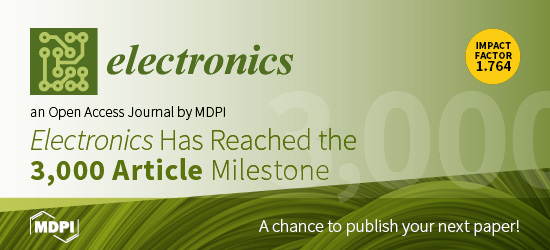
Electronics, an MDPI open access journal on the science of electronics and its applications, has published more than 3000 papers since its inception in 2012. Electronics is now covered in the Science Citation Index Expanded in Web of Science and received an impact factor of 1.764 for 2018, which corresponds to a ranking of 154/265 (Q3) in the JCR category “Engineering, Electrical and Electronic”.
The current Scopus CiteScore of Electronics is 2.49, ranking Q1 in the category of “Hardware and Architecture” and Q2 in the category of “Electrical and Electronics Engineering”, “Control and Systems Engineering”, “Signal Processing”, and “Computer Networks and Communications” based on the data from SCImago.
Electronics publishes original research covering the following non-exhaustive list of topical areas: Microelectronics and Optoelectronics; Power Electronics; Bioelectronics; Microwave and Wireless Communications; Computer Science and Engineering; Networks; Systems and Control Engineering; Circuit and Signal Processing; Semiconductor Devices; Artificial Intelligence; Electrical and Autonomous Vehicles; Quantum Electronics; Organic Electronics.
20 April 2020
Electronics 2020 Young Investigator Award: Winner Announced
Electronics 2020 Young Investigator Award

Prof. Shahar Kvatinsky is an Associate Professor at the Andrew and Erna Viterbi Faculty of Electrical Engineering, Technion–Israel Institute of Technology. Shahar received a B.S. in computer engineering and applied physics and an MBA degree in 2009 and 2010, respectively, both from the Hebrew University of Jerusalem, and a Ph.D. in electrical engineering from the Technion–Israel Institute of Technology in 2014. From 2006 to 2009, he worked as a circuit designer at Intel. From 2014 and 2015, he was a post-doctoral research fellow at Stanford University. Kvatinsky is an editor of Microelectronics Journal and has been the recipient of numerous awards: the 2019 Krill Prize for Excellence in Scientific Research, 2015 IEEE Guillemin-Cauer Best Paper Award, 2015 Best Paper of Computer Architecture Letters, Viterbi Fellowship, Jacobs Fellowship, ERC starting grant, the 2017 Pazy Memorial Award, the 2014 and 2017 Hershel Rich Technion Innovation Awards, 2013 Sanford Kaplan Prize for Creative Management in High Tech, 2010 Benin prize, and seven Technion excellence teaching awards. His current research is focused on circuits and architectures with emerging memory technologies and design of energy efficient architectures.
It was a difficult decision given the number of high quality applications for the award, and we would like to thank all the applicants from various fields of study for their participation, and all the Award Committee members for their efforts in evaluating the many applications. We congratulate the winner, Prof. Shahar Kvatinsky, on his accomplishments. We wish him further success in his career.
For more information about Electronics awards, please check: https://www.mdpi.com/journal/electronics/awards
20 April 2020
Electronics 2020 Travel Award: Winners Announced
We are pleased to announce the winners of the 2020 Travel Award sponsored by MDPI and Electronics. The award was granted to two outstanding young researchers working in thematic areas:
Electronics 2020 Travel Award

Dr. David Valiente is a postdoctoral fellow in the communications engineering department of Miguel Hernández University (UMH), within the area of electronics. He received degrees in telecommunications (Eng.), industrial and telecommunications (M.S.Eng.), teacher training (M.S.), and a Ph.D. in robotics, all of them with honours. He conducted research at Imperial College, Polytechnic University of Madrid, and Polytechnic Institute of Engineering of Coimbra. His research work has laid the groundwork for the innovative creation of a realistic, robust, and feasible mapping and localization mobile robotic system, which can be exploited through a wide range of real applications in autonomous robots. Additionally, he is currently setting the foundations of a new and promising research line on advanced organic photovoltaic materials, focusing on obtaining high power conversion efficiency in solar cells.
Electronics 2020 Travel Award
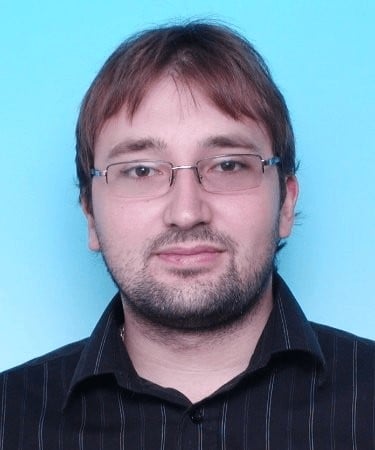
Dr. Jaroslav Frnda graduated from the Faculty of Electrical Engineering and Computer Science of the VSB-Technical University of Ostrava (Czech Republic) in 2013. He received his Ph.D. in 2018 with the thesis topic “New Method for Video Quality Evaluation” at the same university. Since 2019, he has been working at the University of Zilina (Slovakia). His research includes multimedia services, QoS/QoE (video quality assessement methods), computer networks and next generation networks, and artificial intelligence.
This was certainly a difficult decision given the collection of high quality applications submitted for the awards. We would like to thank all the applicants for submitting such a range of diverse and fascinating research topics and congratulate the winners for their accomplishment.
For more information about Electronics awards, please check: https://www.mdpi.com/journal/electronics/awards
9 April 2020
Free Open Platforms to Support Academics During the COVID-19 Pandemic

As a leading Open Access publisher, MDPI is committed to fostering open scientific exchange in all forms across all disciplines. Due to the outbreak of COVID-19, many researchers have to stay at home and many academic conferences have been cancelled or postponed. In light of these changes, MDPI has adopted numerous initiatives that may help accelerate scientific exchange and provide support to the academics during this period.
Scholarly Community—Encyclopedia
Encyclopedia is an online reference created and curated by active scholars. It aims to highlight the latest research results as well as providing benchmark information for researchers and the general public interested in accurate and advanced knowledge on specific topics.
Comprehensive and Free Literature Database—Scilit
Scilit is a comprehensive, free database for scientists that uses a new method to collate data and index scientific material. Our crawlers extract the latest data from CrossRef and PubMed on a daily basis. This means that newly published articles are immediately added to Scilit.
Display Academic Achievements—SciProfiles
SciProfiles is an innovative social network for researchers and scholars that is developed by MDPI. In line with our broad mission, the purpose of SciProfiles is to accelerate discovery and innovation by facilitating immediate access to research results and providing opportunities for academic networking.
Organize and Participate in Conferences Online—Sciforum
Sciforum is an event planning platform that supports open science by offering the opportunity to host and participate in academic conferences. It provides an environment for scholarly exchange, discussion of topics of current interest, building of networks, and establishing collaborations.
Post Early Versions of Research Outputs—Preprints
Preprints is a platform dedicated to making early versions of research outputs permanently available and citable. We post original research articles and comprehensive reviews, and papers can be updated by authors at any time. Content on Preprints is not peer-reviewed, and feedback can be received from readers.
***
MDPI remains committed to open science and open data and has signed a statement, along with more than thirty scholarly publishers, showing our intention to facilitate sharing of new research findings as early on as possible. The initiative sees publishers collectively removing barriers to new research, in the face of a global healthcare crisis.
7 April 2020
Professor Piero Cosseddu Appointed Section Editor-in-Chief for “Organic Electronics” in Electronics

We are pleased to announce that Professor Piero Cosseddu has been appointed Section Editor-in-Chief for the section “Organic Electronics” of Electronics (ISSN 2079-9292). His term started in April 2020.
Piero Cosseddu is Associate Professor at the Department of Electrical and Electronics Engineering of the University of Cagliari, Italy, where he currently teaches “Analog Electronics” and “Wearable and Flexible Electronics”. He also graduated in Electronic Engineering in 2003 from the University of Cagliari, where he obtained his Ph.D. in Electronic and Computer Science Engineering in 2007 before continuing as Postdoctoral Fellow at the DIEE from May 2007 to March 2010.
In 2008, he founded the company TechOnYou SRL, focused on the development of innovative systems for medical monitoring and healthcare, robotics, and biotechnologies, where he has been employed from 2012 to 2014 as Project Manager.
His research activity has mainly been focused on the field of Organic Electronics with particular attention towards the design, fabrication, and characterization of organic semiconductor-based devices on flexible plastic substrates as organic field effect transistors (OFETs), organic electrochemical transistors (OECTs), and nonvolatile memory elements. He has been particularly involved in the development of innovative sensing systems for different applications, including as biochemical sensors, wearable electronics, and artificial skin.
Piero Cosseddu is author of more than 100 papers and book chapters of peer-reviewed international journals and conference proceedings.
He has given more than 20 invited talks at various international conferences, schools, and other institutions.
25 March 2020
MDPI Comment on the COVID-19 Virus
The world is currently suffering from a global pandemic of the corona virus COVID-19. MDPI expresses its sympathies for all of those affected by the virus and stands in solidarity with medical staff and researchers treating patients and searching for scientific solutions.
MDPI has previously published papers covering corona viruses in addition to new papers on the current outbreak, see all papers here. In particular, Viruses has published a number of Special Issues and papers on the topic (see here, here, and here) as well as a forthcoming Special Issue.
Alongside journal articles, MDPI has been a strong supporter of preprints, which are increasingly being used to rapidly disseminate the latest research, and we run the preprint server Preprints.org. Our database of research articles, Scilit, is free to use and covers all publishers including preprint servers. New papers are often in search results within hours of publication and users can set up alerts for new papers.
Our main priority during this period has been the health and safety of staff, and we continue to allow staff to work at home and closely monitor the situation in all locations in which we work. Despite the restrictions, we continue to provide a full publication service and, by close collaboration with our editorial boards and making use our in-house teams, ensure that there are no unnecessary delays in publishing vital research. Fast and open publication has always been at the core of MDPI values and is now more important than ever.
We hope that a solution to the current situation will emerge soon. In the meantime, we will do our best to continue communicating vital research in all fields.
18 March 2020
MDPI Co-Signed Position Statement on Transformative Agreements
The advantages of the open access model of scientific publishing are being increasingly recognized in the scientific community. It allows new scientific evidence to be accessed from the moment of publication for free by anyone around the globe, boosting the impact of new research. In response, many funders, libraries and universities have been adopting new principles to accelerate the transition to open access.
Recently, “transformative agreements” have been negotiated between traditional publishers and various institutions. While increasing the number of open access papers, these agreements lack binding commitments to a full transition to open access, their conditions vary across different regions, and access is still limited for many users.
MDPI is a co-signatory of the recent position statement raising concerns about potential downsides of transformative agreements and how they may delay a full transition to open access. The statement highlights that these models “risk perpetuating current limitations on access, transparency and market competitiveness, while simultaneously facilitating excessive charges on the public purse”.
As a pioneering open access journal publisher, MDPI is the first to promote the importance of science being made available to everyone. Our peer-reviewed journals, covering diverse academic disciplines, are fully accessible to the public free of charge under a Creative Commons Attribution License (CC BY). This is why, along with other open access publishers, MDPI is a proud signatory of the position paper and is committed to contributing to the replacement of weak transitional agreements with “agreements with publishers that are already fully committed to open science and who offer full, immediate and transparent Open Access”.
Read the position paper here
16 March 2020
Encyclopedia Outstanding Contributor Awards 2020 - Open for Application
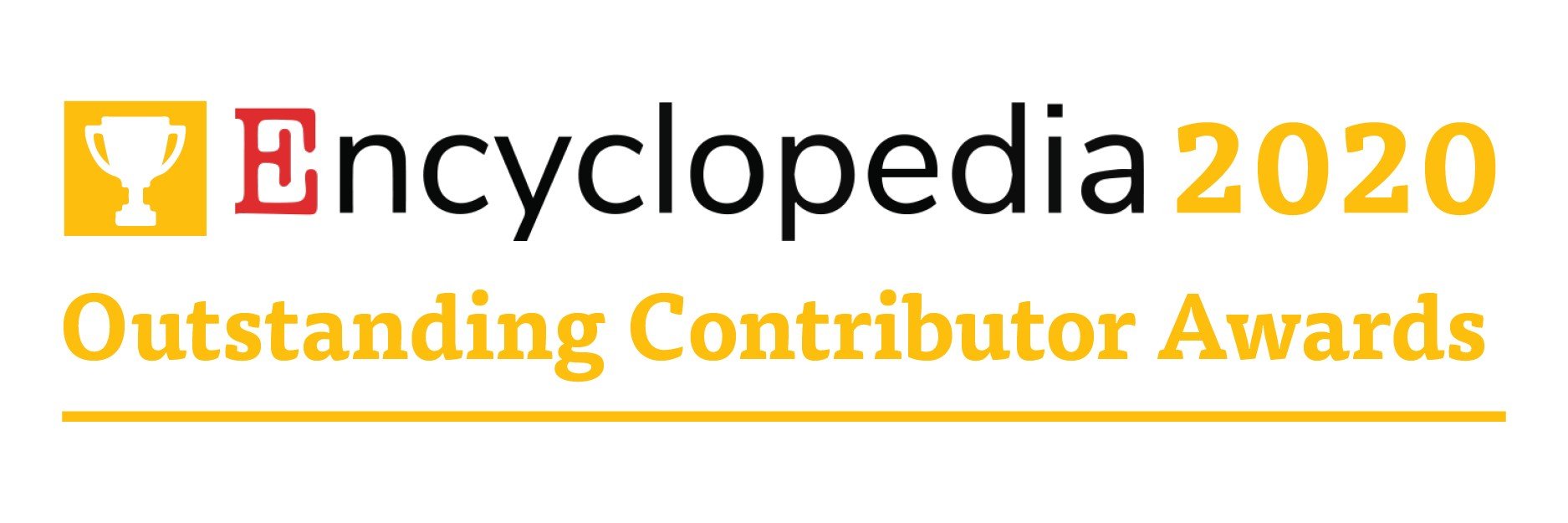
We are pleased to announce that Encyclopedia will be awarding five Outstanding Contributor Awards for researchers in 2020. The nominations and applications will be assessed by an Evaluation Committee consisting of senior scholars from the Encyclopedia Editorial Board.
Prize for Winners
- An official certificate;
- A cash award of 500 CHF or an MDPI discount voucher of 800 CHF.
Application Deadline
31 December, 2020 (Please send your application email with a list of all entries you contributed to our office before the deadline: [email protected])
Candidate Requirements
- Have a Ph.D. degree;
- Have more than three qualified entries published in Encyclopedia in 2020.
Evaluation Standards
- Number of entries published in Encyclopedia in 2020;
- Quality of entries online (including length, figure quality, and novelty);
- Impact of entries (including the number of likes, discussion contents, views, and downloads).
If you are a researcher and have not yet contribute entries to Encyclopedia, please do not miss this chance to highlight your research results.
12 March 2020
Meet us at The IEEE International Symposium on Circuits and Systems (ISCAS), Seville, Spain, October 12–14, 2020
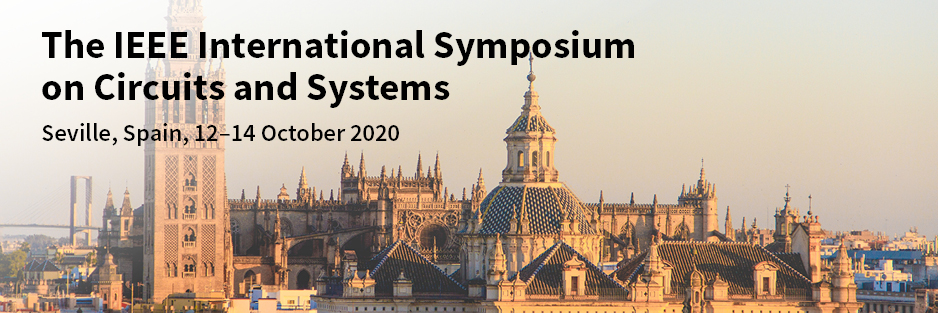
MDPI will be attending the IEEE International Symposium on Circuits and Systems (ISCAS), Seville, Spain, October 12–14, 2020.
The IEEE International Symposium on Circuits and Systems (ISCAS) is the flagship conference of the IEEE Circuits and Systems (CAS) Society and the world’s premiere networking forum for researchers in the highly active fields of theory, design and implementation of circuits and systems. This is accomplished through technical conference sessions, poster sessions, live demonstration sessions, and publication of conference papers. ISCAS 2020 will be driven by the theme Deploying CASS Knowledge towards Society Grand Challenges aiming to emphasize the potential of the CAS Society to find multidisciplinary solutions for the societal and engineering challenges of our times.
The following MDPI journals will be represented:
- Electronics (leading journal)
- Games
- Jounal of Sensor and Acuator Networks
- Jounal of Low Power Electronics and Applications
If you are also attending this conference, please feel free to stop by our booth. Our delegates look forward to meeting you in person to answer any questions you may have. For more information about the conference, please visit: https://iscas2020.org/.
14 February 2020
Meet us at the CLEO Laser Science to Photonic Applications, San Jose, California, USA, May 12-14, 2020
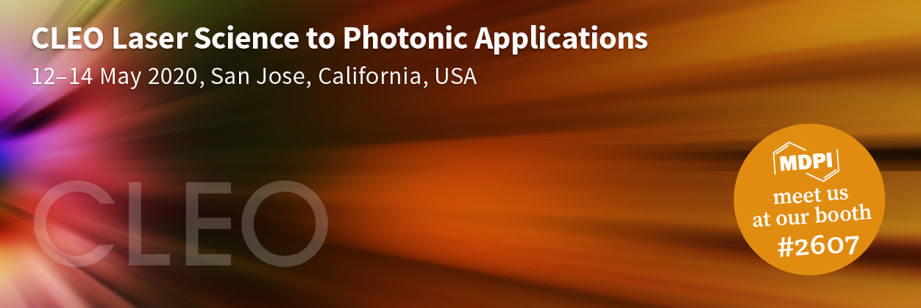
MDPI will be attending the CLEO Laser Science to Photonic Applictions, San Jose, California, USA, May 12-14, 2020
Conference on Lasers and Electro-Optics to generate quality face-time with world renowned industry leaders and help achieve your annual sales and marketing goals. Special industry offerings make this event a magnet for executives and scientific equipment users throughout the buying channel. Exhibitors will have extensive, targeted opportunities for exposure and in-depth interaction with key prospects and customers. These high-level buyers are looking to you—the leading product experts, manufacturers and service providers—for the most innovative, cost-effective solutions to support their missions.
The following MDPI journals will be represented:
- Applied Sciences (leading journal)
- Photonics (co-leading)
- Electronics
- Fibers
- Materials
If you are also attending this conference, please feel free to stop by our booth (Booth #2607). Our delegates look forward to meeting you in person to answer any questions you may have. For more information about the conference, please visit: https://www.cleoconference.org/home/.
4 February 2020
Professor Stathatos Appointed Section Editor-in-Chief for "Microelectronics and Optoelectronics"
We are pleased to announce that Professor Elias Stathatos has been appointed as Section Editor-in-Chief of “Microelectronics and Optoelectronics” in Electronics (ISSN 2079-9292; CODEN: ELECGJ). His term started at the beginning of January 2020.
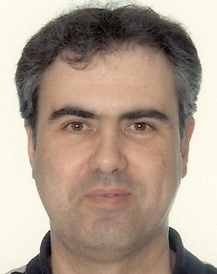
Elias Stathatos graduated from the Physics Department in 1991 and received his PhD in Materials Science/School of Engineering in 1999, both from the University of Patras, Greece. He was a Visiting Scholar at the University of Cincinnati, Ohio, USA, in 2004. From 2005 to 2019, he was a faculty member of Technological Educational Institute of Patras and is currently Professor at the University of Peloponnese. In the period 2008–2010, he was Department Head of the Electrical Engineering Department at Technological Educational Institute of Patras.
His research interests encompass different themes, such as conversion of solar into electrical energy using dye-sensitized, quantum dot, and perovskite solar cells employing nanostructured materials. Furthermore, Prof. Stathatos is also interested in the application of electrochromic nanocomposite materials in smart windows as well as OLED and OFET devices and nanosensors in environmental applications. He is the author of more than 130 papers published in ISI journals, six book chapters (a list of publications can be found here), and five international patents related to solar cells and electrochromic devices. He has been an invited speaker or reviewer in numerus international journals. He is also Associate Editor of International Journal of Photoenergy (Hindawi Publishing Corporation) and Elsevier’s Heliyon (Elsevier) in addition to being on the advisory board of their publication Materials Science in Semiconductor Processing. In 2020, he was appointed as Section Editor-in-Chief for the Section “Microelectronics and Optoelectronics” of Electronics. He has also organized several Special Issues in international journals.
We would like to warmly welcome Professor Elias Stathatos as Section Editor-in-Chief and look forward to developing the Section “Microelectronics and Optoelectronics” under his leadership.
4 February 2020
New Associate Section Editor-in-Chief of Electronics - Section "Microelectronics and Optoelectronics"
We are pleased to announce that Professor Alessandro Gabrielli has been appointed as Associate Section Editor-in-Chief of “Microelectronics and Optoelectronics” in Electronics (ISSN 2079-9292). His term started at the beginning of February 2020.

Alessandro Gabrielli, of the Physics and Astronomy Department of the University of Bologna, received a degree in Physics (110/110) in 1993, and later his PhD in Physics, from the University of Bologna, Italy.
He was a Project Associate at CERN of Geneva in the years 2008-2010 (6 months cumulative), joining international projects on electro-optical radiation-hardened microelectronic devices for applications in LHC experiments at CERN.
He was a Visiting Professor at the Center for Human Space Robotics (Istituto Italiano di Tecnologia) in Turin, Italy, December 2012–May 2013. The research dealt with the design of wireless sensor read-out systems for space applications and radiation-resistant microchips. He also collaborated with the Istituto Nazionale di Fisica Nucleare (INFN), Italy; Brookhaven National Laboratory (BNL), USA; CERN of Geneva, Switzerland; and the Ratherford Appleton Laboratory (RAL), UK.
His research interests include electronics, microelectronics and, in particular, his recent work for the ATLAS Experiment at CERN of Geneva. He is in charge of the firmware design for high-speed digital off-detector acquisition systems.
He is the co-author of hundreds of scientific papers, visible in http://www.bo.infn.it/~gabriell/private/papers.html. The papers cover nuclear physics and electronic digital applications for high-energy physics experiments. Dr. Gabrielli has personally presented tens of talks at international scientific conferences.
He teaches General Physics for the School of Engineering and Architecture and Applied Electronics for the School of Science at the University of Bologna, Italy.
He advised for many MA theses in physics and electronics, as well as a telecommunications PhD thesis for the ATLAS Experiment at CERN of Geneva.
He is member of the PhD board for Physics at the University of Bologna.
22 January 2020
Professor Tae-Yeon Seong Appointed Section Editor-in-Chief for "Semiconductor Devices" in Electronics

We are pleased to announce that Professor Tae-Yeon Seong has been appointed Section Editor-in-Chief for the section “Semiconductor Devices” of Electronics (ISSN 2079-9292).
Dr. Tae-Yeon Seong received his Ph.D. degree in materials science and engineering from the University of Oxford in 1992. After two years of research at the University of Oxford, he joined the Gwangju Institute of Science and Technology (GIST) in 1994. He carried out research at GIST for ~10 years, after which he was invited to be Chair of the Department of Materials Science and Engineering (MSE), Korea University in September 2005, as a Professor of Materials Science; He served as Chair of the MSE Department and Director for the BK21 Center for Advanced Device Materials from 2011 to 2016. His research interests and activities include LEDs, transparent conducting oxides, nanomaterials and device applications, characterization of semiconductor and electronic materials, integration of TFT and μ-LEDs, IR sensors and filters, and memristors. Dr. Seong has published over 450 peer-reviewed journal papers and holds over 230 patents issued or pending. Dr. Seong was awarded the EPD award from ECS (2018). He is a fellow of the Institute of Physics (UK) (2008), SPIE (2013), the Electrochemical Society (ECS) (2017), and the Materials Research Society (MRS) (2018). He has served as an associate editor of Semiconductor Science and Technology (IOP) and an editorial board member (EBM) for over 10 years. He also served as an EBM or guest editor of several international journals, including the Journal of Solid-State Lighting, ECS journal of Solid-State Science and Technology, ECS Solid-State Letters, Electronic Materials Letters, and Physica Status Solidi.
22 January 2020
Dr. Ajeet Kaushik Appointed Associate Section Editor-in-Chief for "Bioelectronics" in Electronics
We are pleased to announce that Dr. Ajeet Kaushik has been appointed Associate Section Editor-in-Chief for the section "Bioelectronics" of Electronics (ISSN 2079-9292). His term started in January 2020.

Ajeet Kaushik, M.Sc., Ph.D., Fellow-Indian Chemical Society I, as an assistant professor of chemistry at Flrida Polytechnic University, is exploring nanotechnology, material science, thin films, miniaturized sensors, electrochemistry, electrochemical biosensors, nanomedicine, drug delivery to CNS, and biomedical engineering for health wellness.
Dr. Kaushik received his Ph.D. on chemistry and nano-enabled biosensors in collaboration with National Physical Laboratory and Jamia Milia Islamia, New Delhi, India. Prior to moving to Polytech, he worked as an Assistant Professor to explore “magnetic nanomedicine along with drug delivery to the brain for CND disease management and miniaturized electrochemical sensing systems for personalized health wellness” at the Center of Personalized Nanomedicine, Institute of NeuroImmune Pharmacology, Department of Immunology and Nano-Medicine, Herbert Wertheim College of Medicine, Florida International University (FIU), Miami USA. He is the recipient of various reputed awards for his service in the area of nano-biotechnology in healthcare. His excellent research credentials are reflected in his four edited books, over 100 international research peer-reviewed publications, and three patents in the area of nanomedicine and smart biosensors for personalized healthcare.
In the course of his research, Dr. Kaushik has been engaged in the design and development of various electro-active nanostructures for electrochemical biosensor and nanomedicine for healthcare. His research interests include nano-biotechnology, analytical systems, design and development of nanostructures, nanocarriers for drug delivery, nanotherapeutics for CNS diseases, on-demand site-specific release of therapeutic agents, exploring personalized nanomedicines, biosensors, point-of-care sensing devices, and related areas of health care monitoring.
We would like to warmly welcome Dr. Ajeet Kaushik as Associate Section Editor-in-Chief and look forward to developing the Section "Bioelectronics" under his leadership.
22 January 2020
Professor Enzo Pasquale Scilingo Appointed Section Editor-in-Chief for "Bioelectronics" in Electronics
We are pleased to announce that Professor Enzo Pasquale Scilingo has been appointed Section Editor-in-Chief for the section “Bioelectronics” of Electronics (ISSN 2079-9292). His term started in January 2020.

Enzo Pasquale Scilingo is a full Professor in Electronic and Information Bioengineering at the University of Pisa. He received his Laurea Degree in Electronic Engineering from the University of Pisa, Italy and his Ph.D. degree in Bioengineering from the University of Milan, in 1995 and 1998, respectively. For two years, he was a postdoctoral fellow with the Italian National Research Council and for two another years a post-doctoral fellow at Information Engineering Department of the University of Pisa.
Currently, he is pursuing his research work mainly at the Research Center “E. Piaggio”. He has several teaching activities, he is the supervisor of several PhD students, and he is leading the laboratory Biolab at the Information Engineering Department. He coordinated European project EC-FP7-ICT-247777 “PSYCHE-Personalized monitoring Systems for Care in mental Health”, and he is currently coordinating two other European projects: H2020-PHC-2015-689691 NEVERMIND—Neurobehavioral Predictive and Personalized Modeling of Depressive Symptoms during Primary Somatic Diseases with ICT-Enabled Self-Management Procedures and H2020-FETPROACT-2018-01- 824153 POTION—Promoting Social Interaction through Emotional Body Odors. His main research interests are in wearable monitoring systems, human–computer interfaces, biomedical and biomechanical signal processing, modeling, control, and instrumentation.
He is the author of more than 200 papers on peer-review journals, contributions to international conferences, and chapters in international books. He is also the co-author of three books edited by Springer. He is currently serving as a reviewer for many international journals and as a member of Program and Scientific Committees of yearly international conferences. He is a member of the Editorial Board of the following journals: Plos One, Scientific Reports – Nature, IEEE Journal of Biomedical and Health Informatics, IEEE Transactions on Affective Computing, Frontiers in Bioengineering and Biotechnology, Frontiers in Robotics and AI section Bionics and Biomimetics, Frontiers in Neuroscience section Neural technology, Electronics, Complexity, and the ETRI Journal.
We would like to warmly welcome Professor Enzo Pasquale Scilingo as Section Editor-in-Chief and look forward to developing the Section "Bioelectronics" under his leadership.
19 December 2019
Professor Zita Vale Appointed Section Editor-in-Chief for "Electrical and Autonomous Vehicles" in Electronics

Zita Vale is Full Professor at the Engineering School of the Polytechnic Institute of Porto, Portugal. She received her diploma in Electrical Engineering in 1986 and her PhD in 1993, both from University of Porto. She works in the area of power and energy systems, with special interest in the application of artificial intelligence techniques.
She has been involved in more than 60 funded projects related to the development and use of knowledge-based systems, multiagent systems, machine learning, metaheuristics, optimization, and data mining. The main application fields of these projects comprise:
- Smart grids, accommodating an intensive use of renewable energy sources, distributed energy resources (DER), namely distributed generation (DG), storage, electric vehicles including the ones with griddable capability (V2G), and demand flexibility. Real-time management and simulation of energy resources, considering electrical networks, buildings, and diverse Internet of Things (IoT) and machine to machine (M2M) approaches are relevant aspects of her work in this field;
- Electricity markets, addressing decision support for market participants, prices and tariffs, ancillary services, energy transactions, service provision, and market simulation in the scope of wholesale and emergent local markets. The integration of DER, demand response, and EVs in electricity markets and transactive energy (TE) approaches are important aspects of her work. Her work also focuses on the conception, development, and testing of new business models for market participants and aggregation models for energy resources and the respective management and operation methods.
She published over 800 works, including more than 100 papers in international scientific journals and more than 500 papers in international scientific conferences.
See some of her selected publications at http://www.gecad.isep.ipp.pt/GECAD/Pages/Pubs/Publications.aspx.
11 October 2019
Introducing SciProfiles, an Academic Social Network
MDPI is pleased to announce the release of SciProfiles, its social network platform for researchers and scholars.
The purpose of SciProfiles is aligned with MDPI’s broad mission to accelerate discovery and innovation by facilitating immediate access to research results and to serve scholars and communities by providing opportunities for academic networking.
SciProfiles also ambitions to serve as a sustainable, transparent and community-driven research evaluation system aligned with the DORA principles (https://sfdora.org/). Through their scientific profiles, academics can highlight their contribution to research communities, and measure their impact on their field, beyond publication numbers and impact factors. SciProfiles is currently a beta version and will enrich to give researchers the possibility to highlight all of their contributions to science and their scientific communities as authors, reviewers, editors, conference organizers, conference panelists, conference keynote speakers, or even as lecturers or student mentors at their University.
The classic components of popular community social networks, including follower/following, classical metrics, endorsements and recommendations (https://www.mdpi.com/about/announcements/1690), comments (https://www.mdpi.com/about/announcements/1397) are or will be very soon highlighted in SciProfiles as open science contributions.
To help increase the impact and visibility of articles and their authors to an appropriate audience, the platform offers a NewsFeed that includes recommendations of relevant content based on interests, publication history, saved searches or colleagues’ recommendations.
SciProfiles’ avatars are now being integrated on several MDPI platforms, meaning that you will directly access researchers’ profiles from any of the MDPI platforms:
MDPI's journal publishing website: www.mdpi.com
MDPI's conference hosting and management website: www.sciforum.net
MDPI's pre-print website : www.preprints.org
MDPI's knowledge sharing website : www.encyclopedia.pub
MDPI's books store: www.mdpi.com/books
MDPI's literature database : www.scilit.net
SciProfiles aims to serve scientific communities at large. It can be embedded into third-party websites and also welcomes integration of data from third-parties.
Dr. Shu-Kun Lin: https://sciprofiles.com/profile/2
Dr. Franck Vazquez: https://sciprofiles.com/profile/FranckVazquez
Dr. Martyn Rittman: https://sciprofiles.com/profile/martynrittman
2 October 2019
Winners of the 2019 MDPI Writing Prize
We are delighted to announce the winners of the 2019 MDPI Writing Prize. Entrants were asked to write on the theme "Judging research: How should research and researchers be evaluated and rewarded?" We received a large number of excellent essays from PhD students and postdocs, and the process of shortlisting and choosing winners was not an easy one. The winners demonstrated excellent writing skills alongside interesting and thought-provoking ideas.
As last year, we will begin the process of collating all entries into a book that will be available in open access format. Alongside promoting good writing skills, we see the prize as a way to promote the voices of early career researchers within broader debates and policy discussions.
Congratulations to all of the participants and especially the winners. The winners are:
1st Prize (500 CHF):
Albin Nilsson (National Centre for Nuclear Research, Warsaw, Poland)
[Read here]
2nd Prize (250 CHF):
Qi Zhang (Shandong University, Jinan, China)
[Read here]
Igor Ogashawara (Indiana University, Indianapolis, US)
[Read here]
3rd Prize (100 CHF):
Margaret Sivapragasam (Universiti Teknologi Petronas, Perak, Malaysia)
[Read here]
Arvind Sharma (The University of Queensland, Gatton, Australia)
[Read here]
Jose Flores-Guerrero (University Medical Center Groningen, Groningen, The Netherlands)
[Read here]
The MDPI Writing Prize is an annual award supported by MDPI Author Services, which provides services including language editing, reformatting, plagiarism checks, and image editing.
20 September 2019
MDPI Now Gives Scholars the Possibility to Endorse and Recommend Articles

MDPI is pleased to announce the release of a new functionality giving the possibility for researchers and scholars to endorse, and formally recommend articles to their colleagues.
MDPI was an early signatory of the San Francisco Declaration on Research Assessment (https://sfdora.org/read/) which calls for improvement in how quality and impact of scholarly research outputs are evaluated, especially in moving beyond journal-based citation metrics (journal Impact Factor, Scopus Citescore, etc.).
MDPI supports the establishment of article-level impact metrics, including citations, views, downloads, and Altmetric scores. These measures serve as an impact indicator for research articles on a case–by-case basis, assessing paper on its own merit. However, these metrics are also subjective and can give a biased picture of the article impact: they do not directly reflect the quality or the intrinsic scientific value of the article.
In our view, community engagement with publications based on community-driven metrics can help to overcome this limitation. We have therefore launched an option for scholars to endorse articles, indicating their own assessment of its content and making a recommendation to their community. This follows our implementation of the open source Hypothesis commenting tool, which has been available for all articles published by MDPI for over a year (https://www.mdpi.com/about/announcements/1397). Both endorsement and commenting are available for all previously published and forthcoming MDPI articles.
In addition to potentially serving as a sustainable solution to article assessment, endorsements will help scientific communities to identify the most relevant articles, independently of the journal in which it was published.
The code for the endorsing functionality, which relies on DOIs and ORCIDs, will be made available on GitHub with an open source license.
Dr. Shu-Kun Lin, President and Founder
Dr. Franck Vazquez, Chief Scientific Officer
Dr. Martyn Rittman, Publishing Director
18 September 2019
Meet us at the IEEE International Electron Devices Meeting (IEDM) in San Francisco, USA, 7–11 December 2019
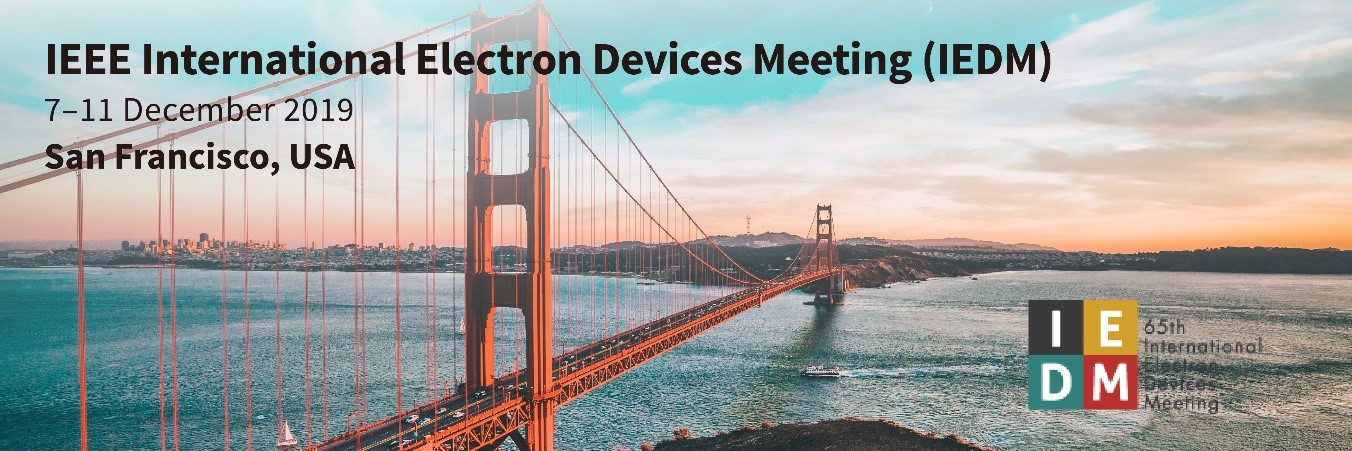
MDPI will be attending the IEEE International Electron Devices Meeting (IEDM) in San Francisco, USA, 7–11 December 2019
IEEE International Electron Devices Meeting (IEDM) is the world’s preeminent forum for reporting technological breakthroughs in the areas of semiconductor and electronic device technology, design, manufacturing, physics, and modeling. IEDM is the flagship conference for nanometer-scale CMOS transistor technology, advanced memory, displays, sensors, MEMS devices, novel quantum and nano-scale devices and phenomenology, optoelectronics, devices for power and energy harvesting, high-speed devices, as well as process technology and device modeling and simulation.
The following MDPI journals will be represented:
If you are also attending this conference, please feel free to stop by our booth. Our delegates look forward to meeting you in person to answer any questions you may have. For more information about the conference, please visit: https://ieee-iedm.org/.
11 September 2019
Create an Entry in Encyclopedia to Get a 100 CHF Voucher in Publishing in MDPI Journals
Encyclopedia is a free online reference created and curated by active scholars. It aims to highlight the latest research results as well as provide a comprehensive record of scientific development. If you have any suggestions or questions, please feel free to contact us via [email protected].

14 August 2019
Conference announcement: International Conference on Space, Aeronautical and Navigation Electronics 2019, 31st October–1st November 2019
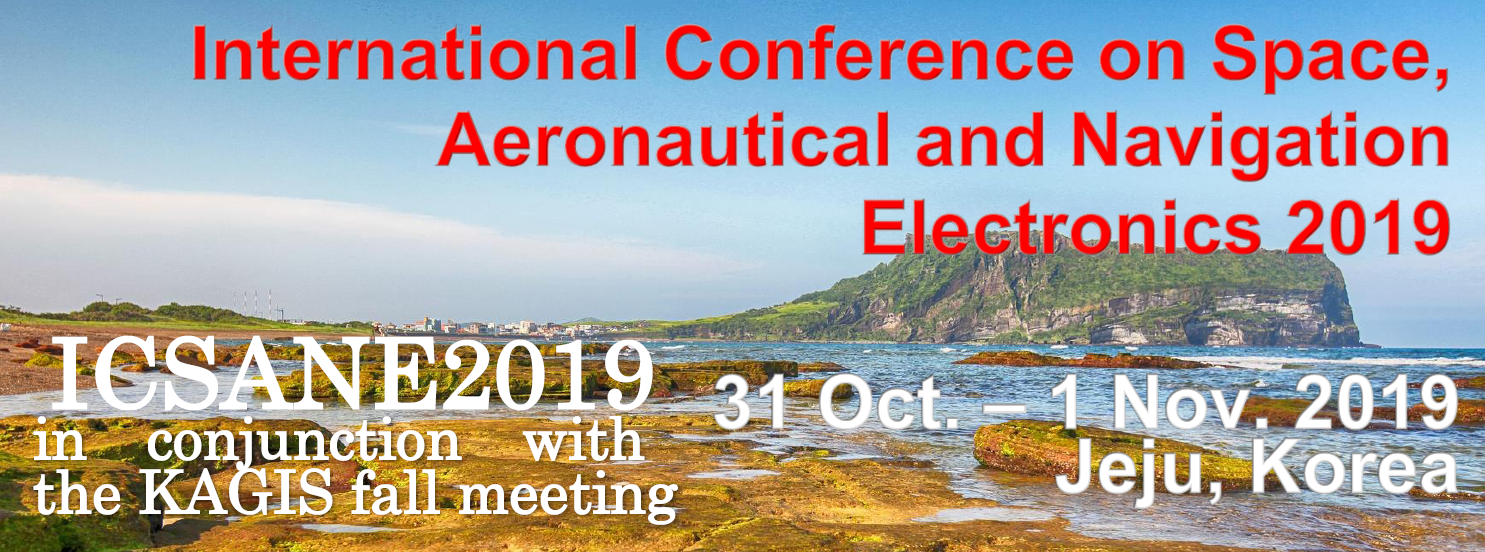
The 15th International Conference on Space, Aeronautical and Navigational Electronics 2019 (ICSANE2019) will be held in Korea for the fourth time, at Jeju University, Jeju, Korea, from 31st October to 1st November 2019. In addition, ICSANE2019 will be jointly held with the KAGIS (Korean Association of Geographic Information Studies) fall meeting.
This conference will offer numerous opportunities for oral presentations, posters, and publications. The system engineers and researchers are invited to present their works covering the full range of practice, development, and research experiences that advance the practice and theory of new and viable technical topics of electronics system in spacecraft, aircraft, ships, and ground facilities for citizens, government, and industry.
Topic areas include but are not limited to:
(1) Satellite and Space Station Systems
(2) Remote Sensing and Scientific Observation Technology
(3) Radar Systems and Applications
(4) Navigational and Communication Systems
(5) Spatial Information Technology
(6) Inverse Scattering Problem
The authors of the papers which will be presented at ICSANE2019 are invited to submit the related article to the co-operative Special Issue “Recent Advances in Space & Sensor Technologies and Remote Sensing Applications” in Electronics. There are no page limitations for this journal, and the submitted manuscript and its contents should not have been previously published and should be significantly independent in comparison with the ICSANE conference paper.
6 August 2019
Preprints Reaches 10,000 Posted Articles Milestone
We are pleased to announce that Preprints has passed the milestone of 10,000 posted preprints. We are delighted to have reached this after just over three years of operation. Our congratulations and thanks go to our authors and advisory board who have supported growth of the platform and been crucial to its operation.
You can find further details at https://www.preprints.org/announcement/show/37.
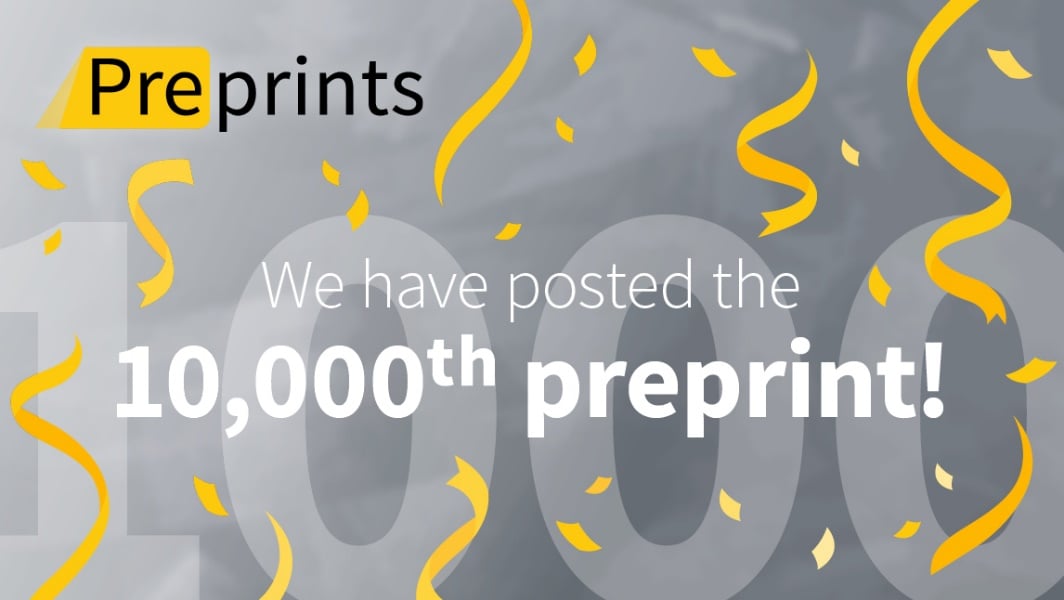
2 August 2019
DeepGreen Partnering with Publishers and Universities in Distributing Open Access Content to Institutional Repositories
Last week, the DeepGreen initiative in Germany started into an advanced test phase with the publishing partners S. Karger AG, SAGE Publishing, MDPI, Frontiers and De Gruyter, as well as 27 universities from all over Germany, from Hamburg University of Applied Sciences to University of Konstanz.
DeepGreen aims at lowering the barriers for open access publishing by automatically delivering metadata and full text publications from participating publishers to authorized repositories at German universities.
In preparation for a later live operation, the advanced test phase serves to gain experience with extensive data deliveries from publishers and also handling different repository software (including OPUS4, DSpace, EPrints, MyCoRe). DeepGreen thereby acts as a sophisticated platform, receiving articles published by authors affiliated with German universities and depositing these articles to respective university repositories, based on the affiliation metadata. For more information about DeepGreen: https://deepgreen.kobv.de
Karger AG has been a close cooperation partner of the DeepGreen consortium since 2016. S. Karger has more than 80 subscription-based and around 20 open access journals covering a wide spectrum in health science. DeepGreen will assign S. Karger articles to authorized institutions on the legal basis of German alliance and national licenses.
SAGE Publishing was founded by Sara Miller McCune in 1965 to support the dissemination of usable knowledge and educate a global community. SAGE publishes more than 1,000 journals and over 600 new books each year, spanning a wide range of subject areas. Our growing selection of library products includes archives, data, case studies and video. SAGE remains majority owned by our founder and after her lifetime will become owned by a charitable trust that secures the company’s continued independence. Principal offices are located in Los Angeles, London, New Delhi, Singapore, Washington DC and Melbourne. SAGE Publishing has been a close cooperation partner of DeepGreen since 2016.
MDPI is a scientific open access publisher and has been a partner of DeepGreen since 2017. MDPI comprises 205 peer-reviewed journals of various disciplines. All articles are published under a CC-BY license and are freely available without embargo period.
Frontiers is a scientific open access publisher with 61 journals of over 600 academic disciplines. All articles are peer-reviewed and published freely available under CC-BY license.
De Gruyter is an academic publisher with more than 700 subscription-based and open access journals of 29 disciplines. Articles provided by De Gruyter will be assigned to institutions with German alliance and national licenses.
There is promising communication with other publishers.
DeepGreen is funded by the German Research Foundation (DFG) and the consortium comprises six institutions: the Cooperative Library Network Berlin-Brandenburg, Bavarian State Library, Bavarian Library Network, University Library of the Technische Universität Berlin, University Library of Erlangen-Nuremberg and the Helmholtz Open Science Coordination Office at the GFZ German Research Centre for Geosciences.
If you would like to know in more detail which institutions take part in the advanced test phase of DeepGreen, you can find more information here.
22 July 2019
Professor Hirokazu Kobayashi Appointed Section Editor-in-Chief for "Microwave and Wireless Communications"
We are pleased to announce Dr. Hirokazu Kobayashi was appointed Section Editor-in-Chief for the section "Microwave and Wireless Communications" in Electronics.

Hirokazu Kobayashi graduated with a Master’s degree of Electrical Engineering from Shizuoka University, Hamamatsu, Japan, in 1980 and received his Doctorate in Engineering from the University of Tsukuba, Tsukuba, Japan, in 2000.
He joined Fujitsu Ltd., Kawasaki, Japan, and worked with the Fujitsu System Integration Laboratories as a researcher on Space and Defense Division, where he developed micro/millimeter wave wide band antennas, active phased array radar systems, antennas, and theoretical investigation of electromagnetic scattering. From 1999 to 2010, he was a General Manager at Fujitsu Ltd. In 2010, he joined the Faculty of Engineering as a Professor with Niigata University, Niigata, Japan. Since 2013, he has been a professor in the Department of Electronics and Information Systems Engineering, Osaka Institute of Technology, Osaka, Japan.
Dr. Kobayashi's current research interests include high-frequency electromagnetics scattering theory, computing of radar cross-section (RCS) using physical optics, physical theory of diffraction and geometrical theory of diffraction (PO/PTD/GTD), RCS near-field to far-field transformation technology for electrical large object such as airplanes based on microwave radar imaging theory, radar SAR and ISAR imaging, radiation analysis such as conformal array, and target recognizing analysis by micro-Doppler information.
Dr. Kobayashi has published around two hundred papers, including conference papers, and three books. He was a Senior Member of IEEE, a Chair of Technical Committee on Space, Aeronautical and Navigational Electronics (SANE) of the Institute of Electronics, Information and Communication Engineers (IEICE) in 2015-2016. He also served as a member or chair of the steering committee/TPC of many international and local conferences.
17 July 2019
First Basel Sustainable Publishing Forum
The University of Basel and the MDPI Sustainability Foundation are organizing the First Basel Sustainable Publishing Forum on 9th September 2019.
The aim of this event is to provide background and perspectives on Plan S to Learned Societies, which have to make well-informed decisions to transition their journals to Open Access (OA).
The BSPF will bring together several representatives of Learned societies, Plan S architects as well as representatives from various publishers and publishing platforms. After getting the big picture from cOAlition S, panel discussions will allow to better understand the diverse challenges that Learned societies are facing to transition their journals to OA as well as to identify sustainable, implementable and scalable solutions for successful Open Access transition.
For program details and registration, please follow the link below:
https://sciforum.net/conference/SustainableSolutionsToOpenAccess
8 July 2019
Professor Karimi Appointed Section Editor-in-Chief for "Systems & Control Engineering" in Electronics
We are pleased to announce that Professor Dr. Hamid Reza Karimi has been appointed Section Editor-in-Chief for the section "Systems & Control Engineering" of Electronics (ISSN 2079-9292). His term started in July 2019.
Hamid Reza Karimi (M’06–SM’09), born in 1976, received his B.Sc. (First Hons.) degree in power systems from the Sharif University of Technology, Tehran, Iran, in 1998 and his M.Sc. and Ph.D. (First Hons.) degrees in control systems engineering from the University of Tehran, Tehran, in 2001 and 2005, respectively. From 2009 to 2016, he was full professor of Mechatronics and Control Systems at the University of Agder in Norway. Since 2016, he has been a professor of Applied Mechanics at the Department of Mechanical Engineering, Politecnico di Milano, Milan, Italy. His current research interests include control systems and mechatronics with applications to automotive control systems and wind energy.
Prof. Karimi is currently the Editor-in-Chief of the Journal of Cyber-Physical Systems, Editor-in-Chief of the Journal of Machines, Editor-in-Chief of the International Journal of Aerospace System Science and Engineering, Editor-in-Chief of the Journal of Designs, and Editorial Board Member of various international journals, such as IEEE Transactions on Industrial Electronics, IEEE Transactions on Neural Networks and Learning Systems, IEEE Transactions on Circuits and Systems-I: Regular Papers, IEEE/ASME Transactions on Mechatronics, IEEE Transactions on Systems, Man and Cybernetics: Systems, Information Sciences, IFAC-Mechatronics, International Journal of Robust and Nonlinear Control, Electronics, Neurocomputing, Asian Journal of Control, Journal of The Franklin Institute. He is a member of Agder Academy of Science and Letters and also a member of the IEEE Technical Committee on Systems with Uncertainty, the Committee on Industrial Cyber-Physical Systems, the IFAC Technical Committee on Mechatronic Systems, the Committee on Robust Control, and the Committee on Automotive Control. Prof. Karimi was awarded as the 2016, 2017, and 2018 Web of Science Highly Cited Researcher in Engineering.
We would like to warmly welcome Professor Dr. Hamid Reza Karimi as Section Editor-in-Chief and look forward to developing the Section "Systems & Control Engineering" under his leadership.
3 July 2019
Meet Us at the Conference EWTEC 2019 in Napoli, Italy, 1–6 September 2019
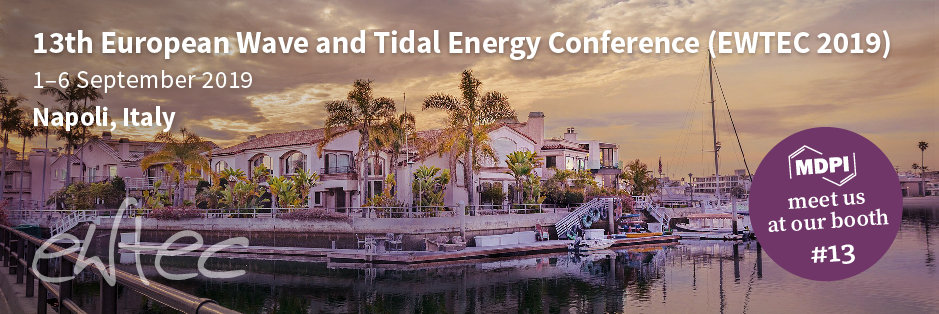
MDPI will be attending the 13th European Wave and Tidal Energy Conference (EWTEC 2019) in Napoli, Italy, 1–6 September 2019.
The European Wave and Tidal Energy Conference series are international, technical and scientific conferences, focused on ocean renewable energy. EWTEC series are widely respected for their commitment to maintaining high standards in the quality of academic and industrial contributions to their proceedings.
The following MDPI journals will be represented:
Journal of Marine Science and Engineering
If you are also attending this conference, please feel free to stop by our booth (Booth #13). Our delegates look forward to meeting you in person to answer any questions you may have. For more information about the conference, please visit: http://www.ewtec.org/conferences/ewtec-2019/.
27 June 2019
Professor Corchado Appointed Section Editor-in-Chief "Computer Science & Engineering" in Electronics
We are pleased to announce that Professor Dr. Juan Manuel Corchado Rodríguez has been appointed Section Editor-in-Chief for the section "Computer Science & Engineering" in Electronics (ISSN 2079-9292). His term started in June 2019.
Juan Manuel Corchado (born May 15, 1971, Salamanca, Spain). He is a Full Professor with Chair at the University of Salamanca. He was the Vice President for Research from December 2013 to December 2017 and the Director of the Science Park of the University of Salamanca. Chosen twice as the Dean of the Faculty of Science, he holds a PhD in Computer Sciences from the University of Salamanca and a PhD in Artificial Intelligence from the University of the West of Scotland. He is the Director of BISITE (Bioinformatics, Intelligent Systems and Educational Technology), which was founded in 2000, and also the director of the Digital Innovation Hub and President of the AIR Institute.
J.M. Corchado has been a Visiting Professor at the Osaka Institute of Technology since January 2015 and Visiting Professor at the Universiti Malaysia Kelantan. He has served as a Member of the Advisory group on Online Terrorist Propaganda of the European Counter Terrorism Centre (EUROPOL).
He has also been President of the IEEE Systems, Man and Cybernetics Spanish Chapter and the academic coordinator of the Institute of Digital Art and Animation of the University of Salamanca. Juan M. Corchado has also been a researcher at the Universities of Paisley (UK), Vigo (Spain), and at the Plymouth Marine Laboratory (UK). He also oversees Master´s Degrees in: Security, Digital Animation, Mobile Telephony, Information Systems Management, Internet of Things, Social Media, 3D Design and Printing, Blockchain, Z Systems, Industry 4.0, Agile Project Management and Smart Cities and Intelligent Buildings, at the University of Salamanca.
M. Corchado is the author of more than 160 peer-reviewed journal papers and 200 conference papers. He is also the co-author of numerous book chapters and several books. He has been the president of science and organization committees at over 30 international conferences, such as IEEE GlobeCom, Fusion, ACM SAC, PAAMS, DCAI, KMO, and ICUWB.
He has led over 120 research projects (both national and international) in the fields of Artificial Intelligence, Machine Learning, Blockchain, IoT, Fog Computing, Edge Computing, Smart Cities, Smart Grids, Sentiment Analysis, etc.
We would like to warmly welcome Professor Dr. Juan Manuel Corchado Rodríguez as Section Editor-in-Chief and look forward to developing the Section “Computer Science & Engineering” under his leadership.
20 June 2019
Electronics Receiving 2018 Updated Impact Factor of 1.764
We are pleased to inform that Electronics received an updated Journal Impact Factor of 1.764 in the recent release of the Journal Citation Reports®. Electronics now ranks 154/265 (Q3) in the category 'Engineering, Electrical & Electronic'.
Source: data according to Journal Citation Reports®, 2018 release, a Clarivate Analytics product.
18 June 2019
Meet Us at the MNE 2019 in Rhodes Island, Greece, 23–26 September 2019
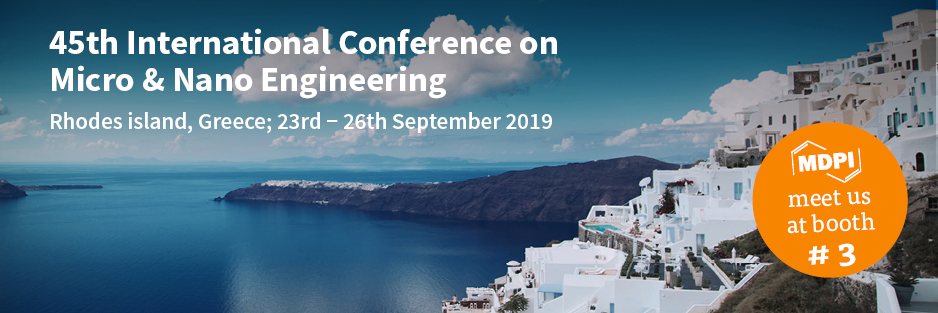
MDPI will be attending the 45th International Conference on Micro & Nano Engineering (MNE 2019), to be held in Rhodes Island, Greece, 23 - 26 September 2019.
MNE is the core international conference focusing on: micro/ nanofabrication and manufacturing techniques, and application of the fabricated micro/nanostructures, devices and microsystems into electronics, photonics, energy, environment, chemistry and life sciences.
The following MDPI journals will be represented:
Journal of Manufacturing and Materials Processing
If you are also attending this conference, please feel free to stop by our booth (Booth #3). Our delegates look forward to meeting you in person to answer any questions you may have. For more information about the conference, please visit: http://www.cleoeurope.org/.
14 June 2019
Professor Yoichi Hayashi Appointed Section Editor-in-Chief for "Artificial Intelligence" in Electronics
We are pleased to announce that Professor Dr. Yoichi Hayashi has been appointed Section Editor-in-Chief of "Artificial Intelligence" in Electronics (ISSN 2079-9292). His term starts in June 2019.

Yoichi Hayashi received the Dr. Eng. degree in systems engineering from Tokyo University of Science, Tokyo, in 1984. In 1986, he joined the Computer Science Department of Ibaraki University, Japan, as an Assistant Professor. Since 1996, he has been a Full Professor at the Computer Science Department, Meiji University, Tokyo. He has also been a Visiting Professor at the University of Alabama in Birmingham, USA, and the University of Canterbury in New Zealand and has authored over 230 published computer science papers.
Professor Hayashi's research interests include deep learning (DBN, CNN), especially the black box nature of deep neural networks and shallow neural networks, transparency, interpretability and explainability of deep neural networks, rule extraction, high-performance classifiers, advanced data mining, big data analytics, and medical informatics. He has been the Action Editor of Neural Networks and the Associate Editor of IEEE Trans. Fuzzy Systems and Artificial Intelligence in Medicine. Overall, he has served as an associate editor, guest editor, or reviewer for 50 academic journals. He has been a senior member of the IEEE since 2000.
We would like to warmly welcome Professor Dr. Yoichi Hayashi as Section Editor-in-Chief and look forward to research forthcoming to be highlighted in the "Artificial Intelligence" section under his leadership.
8 May 2019
Meet us at the 46th IEEE Photovoltaic Specialists Conference (PVSC 46) in Chicago, Illinois, USA

MDPI will attend PVSC 46 in Chicago, Illinois, USA, from 16−21 June 2019.
As the signature event in the burgeoning solar power technology and market sector, the PVSCs have a rich tradition of bringing together students, innovators, researchers and PV leaders in a vibrant and highly integrative forum to share information, gain knowledge, strengthen collaborations and move forward photovoltaic science and technology from basic and applied research into large scale manufacturing and deployments.
Our representatives will be exhibiting our open access journals Energies, Coatings, Sustainability, Catalysts, Nanomaterials, Materials, Electronics, and Applied System Innovation (ASI).
If you will also be in attendance, please stop by our booth (# 110). Our delegates look forward to meeting you in person to answer any questions you may have regarding open access publishing or our journals. For more information about this conference, please visit https://www.ieee-pvsc.org/PVSC46/index.php.
29 April 2019
Meet Us at the ELECTRIMACS 2019 in Salerno, Italy, 21–23 May 2019
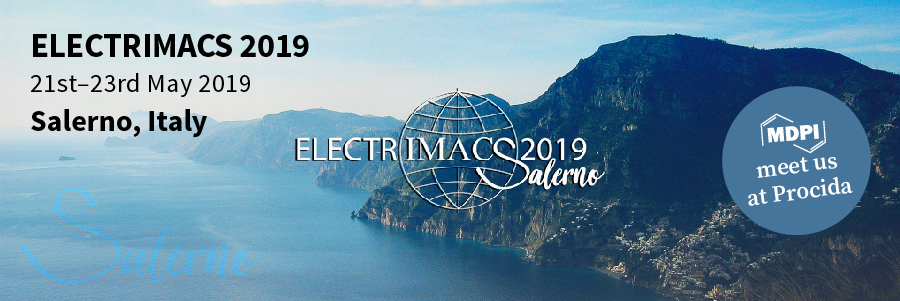
MDPI will be attending the ELECTRIMACS 2019, to be held in Salerno, Italy, 21 23 May 2019.
ELECTRIMACS 2019 - The 13th international conference of the IMACS TC1 Committee - is an international conference on theory and application of modelling, simulation, analysis, design optimization, identification and diagnostics in electrical power engineering.
The following MDPI journals will be represented:
If you are also attending this conference, please feel free to stop by our booth (Booth #Procida). Our delegates look forward to meeting you in person to answer any questions you may have. For more information about the conference, please visit: http://www.electrimacs2019.unisa.it/
20 March 2019
Fostering Open Access Publishing Worldwide: New IOAP Participants in February and March 2019
We are pleased to welcome more universities from Poland, Italy, Germany, Brazil and other parts of the world to MDPI's Institutional Open Access Program (IOAP). A warm welcome to the institutions listed below, who have joined the Program in February and March this year.
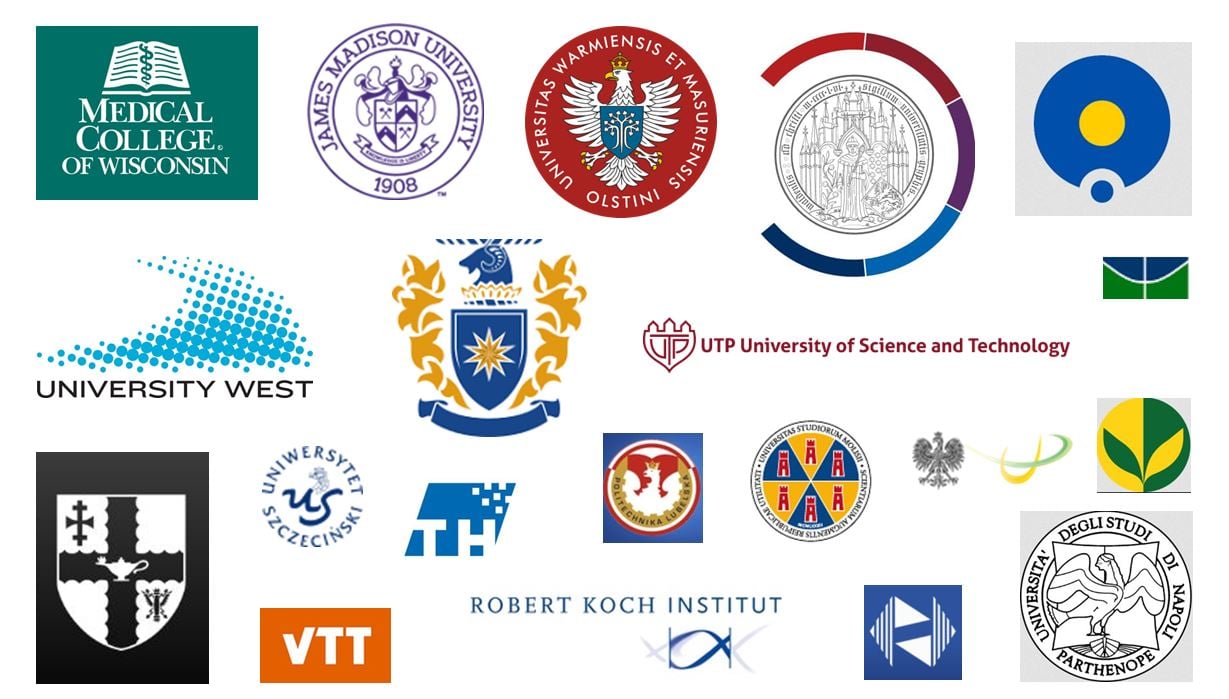
Authors affiliated with these institutions can now enjoy a discount on the APC for papers accepted for publication in any MDPI journal. If you would like to learn more about our program, please visit: https://www.mdpi.com/about/ioap or email us at [email protected].
5 March 2019
MDPI Joins Jisc’s Publications Router Service
We are delighted to announce our participation in Jisc’s Publication Router project, as of March 2019.
Publications Router is a Jisc service that automatically sends notifications about research articles to institutions' systems such as their repositories or CRISs, since May 2015. Through this agreement, MDPI will provide Jisc with daily feeds and information regarding published articles, which will be gathered by their system and delivered to institutions also registered to this service. Nearly all of our articles are published within 15 days of acceptance, so institutions will receive them quite promptly.
The feed will include the full text of the published version of record, with no embargo, so the articles can be exposed immediately for public view. They are accompanied by rich metadata, including confirmation of the immediate CC BY licence, minimising the need for any manual intervention or checking.
For more information about Publications Router, you may contact Jisc’s central helpdesk at [email protected]. For any queries about MDPI’s institutional agreements and collaborations, you may get in touch with MDPI’s Institutional Engagement team at [email protected], which would be very happy to hear from further UK institutions.
21 February 2019
Professor Juan-Carlos Cano Appointed Section Editor-in-Chief in Electronics
We are pleased to announce that Professor Dr. Juan-Carlos Cano has been appointed as Section Editor-in-Chief of “Networks” in Electronics (ISSN 2079-9292). His appointment starts from February 2019.

Juan-Carlos Cano received his M.Sc. and a Ph.D. in computer science from the Technical University of Valencia (UPV) in 1994 and 2002, respectively. From 1995 to 1997, he worked as a programming analyst at IBM’s manufacturing division in Valencia. He has been a full professor in computer engineering since 2011 and the Head of the Department of Computer Engineering at the Universitat Politècnica de València in Spain since 2012.
Professor Cano's current research interests include: wireless networks intelligent transport systems (ITS) computer networks design modeling and implementation power-aware routing protocols quality of service for mobile ad hoc networks pervasive computing and protocols for unmanned aerial vehicles. He is the author of over 100 scientific journal publications and 200 conference proceedings. A complete list of publications and research activities can be found here. You can contact Professor Cano at [email protected].
He has served as Co-Chair of the for IEEE ITS Society Technical Committee on Mobile Communication Networks (from January 2011 to December 2018), and currently is a member of the IFIP working Group 6.8, Mobile and Wireless Communications (since October 2015).
Professor Cano organized many Special Issues dealing with computer networks in reputable journals such as Mobile Information Systems, IEEE Transaction in Intelligent Transport Systems, Wireless Personal Communication, and Wireless Communications and Mobile Computing among others. He has chaired many international conferences including serving as General Chair at the Wireless Days 2013 Conference, and at the 28th International Conference on Computer Communications and Networks (ICCCN 2019).
We would like to warmly welcome Professor Dr. Juan-Carlos Cano as Section Editor-in-Chief and look forward to developing the Section “Networks” under his leadership.
18 February 2019
Electronics Reaches One Thousand Articles Milestone
Electronics, MDPI’s open access journal on the science of electronics and its applications, has published more than 1000 articles and reviews since its inception in 2012. Electronics is now covered in the Science Citation Index Expanded in Web of Science and received its first Impact Factor of 2.110 for 2017, which corresponds to rank 113/260 (Q2) in the JCR category ‘Engineering, Electrical & Electronic’.
Electronics’s current CiteScore in Scopus is 3.01. The CiteScore is a ratio between the number of citations in 2017 to papers published 2014–2016 in the numerator and the number of papers published 2014–2016 in the denominator, drawn from Scopus data.
Our sincerest thanks go to the Editor-in-Chief of Electronics, Prof. Dr. Mostafa Bassiouni, Section Editor-in-Chief Prof. Dr. Kyo-Beum Lee, as well as the Guest Editors of our Special Issues, who have ensured, with their hard work and diligence, the continued significance of the journal.
1 February 2019
2018 MDPI Top Reviewer Award—Winners Announced
Rigorous peer-review is the cornerstone of high quality academic publishing. Over 97,000 scholars served as reviewers for MDPI journals in 2018. We are extremely appreciative of all those who made a contribution to the editorial process in this capacity. At the beginning of every year, journal editorial offices publish a list all reviewers’ names to express our gratitude. In addition, this year the “MDPI Top Reviewer Awards” are announced, to recognize the very best reviewers for their expertise, dedication, high quality, and timely review reports. We are pleased to announce the following winners of the 2018 MDPI Top Reviewer Awards:
- Ali Behnood
- Andrea Pezzuolo
- Angela Gorgoglione
- Anna D'Auria
- Antonio D'Andrea
- Azhar Abbas
- Bogdan Zagajewski
- Chunhui Chen
- Dominika Głąbska
- Dominika Guzek
- Dragan Pamucar
- Francisco J. G. Silva
- Frank Li
- Gianluca Serafini
- Gyorgy Szekely
- Haozhi Pan
- Helvi Heinonen-Tanski
- José Manuel Gómez-Soberón
- Kathy Lewis
- Klara Kosova
- Luis N. López De Lacalle
- M. Z. Naser
- Malwina Tytła
- Masoume Amirkhani
- Matteo Ghidelli
- Moretti Laura
- Petra Schneider
- Roberto Cerchione
- Spyros Papaefthymiou
- Ştefan Cristian Gherghina
24 January 2019
JAMS Journals: A Low-Cost Publishing Platform

Since 2010, MDPI has run its own online submission system. More recently, we have made the software, with accompanying publishing services, available to other publishers as JAMS (Journal and Article Management System). We are now delighted to announce the launch of JAMS Journals, a standardized platform for operating open access journals at low cost.
JAMS Journals provides a comprehensive service, including a shared submission website, journal websites hosted at a URL provided by the publisher, and a full production service. There is a small setup fee and the cost for each published paper is just a few hundred Swiss francs.
The platform demonstrates that running an open access journal can be straightforward and affordable. The JAMS Journals platform is suitable for
- small publishers or groups of scholars looking to launch their own journal;
- existing publishers or societies seeking to explore open access options;
- publishers looking to convert an existing subscription journal to open access.
JAMS journals launches with two journals from Canadian-based publisher Etcetera Publications:
- Canadian Journal of Pesticides & Pest Management (http://www.cjppm.ca)
- Nanotechnology in Agriculture, Food & Environment (http://www.nanoafe.ca)
Dr AJ Al-Rajab (President of Etcetera Publications) comments:
“In the past few months, we were working on our project to launch new open access scientific journals in the field of agricultural and environmental sciences. We decided to go with JAMS for this venture because of the high quality of their services, reasonable prices, professionalism and easy communication. Our portfolio is expected to grow rapidly during 2019 to include more titles covering different areas in agriculture and environment. MDPI earned already our complete satisfaction and we are looking for a long term cooperation.”
Alongside the new platform, we continue to provide flexible, tailored journal management solutions for existing publishers. For any questions or to request a quotation, contact Dr. Constanze Schelhorn ([email protected]).
24 January 2019
Popularity of Preprints Continues to Grow

2018 was a great year for preprints, with increasing numbers of authors looking to make their papers available online before peer review. Along with other preprint servers, our platform Preprints.org saw an increase in the uptake from authors, and more than double the number of announced papers compared to 2017. In fact, we recently passed two important milestones: 8000 preprints online and 30,000 authors.
We believe that the whole research community has the opportunity to benefit from work being available online as early as possible. We thank and congratulate our authors for supporting us to make this goal a reality.
In 2019, we will be looking carefully at how to provide better value for authors, maintain efficiency while growing in size, and make sure we remain well-connected with the research community.
If you want to participate, you can consider screening preprints or joining our advisory board. And, of course, posting your own work.
9 January 2019
Open Access Agreement between the Austrian Academic Library Consortium (KEMÖ), the Austrian Science Fund (FWF), and MDPI

We are delighted to announce the establishment of our national Open Access agreement with the Austrian Academic Library Consortium (KEMÖ) and the Austrian Science Fund (FWF). Through this national agreement, the Austrian institutions listed below as well as FWF will cover the Article Processing Charges (APC) of manuscripts published by eligible corresponding or funded authors in MDPI journals as long as central funds are available.
All participating institutions have gained access to the MDPI online submission system where they can find full article metadata and pricing information as well as Funder and Grant ID details for easy identification and additional transparency. At the same time eligible authors are benefited from an APC discount which comes at no cost for the institutions.
Eligible corresponding authors affiliated with the participating institutions are prompted to choose the corresponding Institutional Open Access Program (IOAP) when they submit an article via our online submission system. The program will be selected automatically if authors submit their papers using their institutional email address. To claim their discount, FWF funded authors should choose the particular funder and add their Grant ID upon online submission of their manuscript. The institutions will then crosscheck the information and confirm the APC funding.
Eligible authors that have their APC covered by their institution or funder are advised to include the following sentence in their acknowledgments: "Open Access Funding by the [name of the institution/funder]".
The full text of the agreement is openly available online at: http://doi.org/10.5281/zenodo.2536007
For any questions about the agreement, please contact the KEMÖ Consortium at [email protected], FWF at [email protected], or the MDPI IOAP team at [email protected].
The Austrian institutions participating in this agreement are:
- Austrian Science Fund (FWF)
- University for Continuing Education Krems
- University of Applied Sciences BFI Vienna
- University of Applied Sciences Upper Austria
- University of Applied Sciences Technikum Wien
- Vorarlberg University of Applied Sciences
- International Institute for Applied Systems Analysis (IIASA)
- Institute of Science and Technology Austria
- MCI Management Center Innsbruck
- University of Graz
- University of Linz
- University of Salzburg
- Graz University of Technology
- TU Wien
- University of Veterinary Medicine Vienna
- University of Vienna
This is our first collective agreement with a national library consortium, while the individual institutions around the world participating in our IOAP are now more than 500 - see details here: https://www.mdpi.com/about/ioap. We would be mostly interested in discussing about possible collaborations with other consortia, funders, and institutions in our mutual efforts to accelerate Open Access.
4 January 2019
Professor Kyo-Beum Lee Appointed Section Editor-in-Chief for "Power Electronics"
We are pleased to announce that Professor Dr. Kyo-Beum Lee has been appointed Section Editor-in-Chief of “Power Electronics” in Electronics (ISSN 2079-9292). His term started in January 2019.

Kyo-Beum Lee received his B.S. and M.S. degrees in electrical and electronic engineering from Ajou University, Suwon, South Korea, in 1997 and 1999, respectively. He received a Ph.D. degree in electrical engineering from Korea University, Seoul, South Korea, in 2003.
From 2003 to 2006, he was with the Institute of Energy Technology at Aalborg University, Denmark. From 2006 to 2007, he was with the Division of Electronics and Information Engineering, Chonbuk National University, Jeonju, South Korea. In 2007, he joined the Department of Electrical and Computer Engineering, Ajou University.
Professor Lee's research interests include electric machine drives, renewable power generation, and electric vehicle applications. He is an Associated Editor of the IEEE Transactions on Power Electronics, the IEEE Transactions on Industrial Electronics, the Journal of Power Electronics, and the Journal of Electrical Engineering and Technology.
We would like to warmly welcome Professor Dr. Kyo-Beum Lee as Section Editor-in-Chief and look forward to strengthening the Section “Power Electronics” under his leadership.
2 January 2019
Encyclopedia—the Scholarly Community Encyclopedia

We are pleased to announce the new platform Encyclopedia, which is an online reference created and curated by active scholars. It aims to highlight the latest research results as well as providing benchmark information for researchers and the general public interested in accurate and advanced knowledge on specific topics.
We encourage authors of review articles to quote and adapt the content of their published papers to create Encyclopedia entries. You can create completely new entries on topics in which you have knowledge and expertise. There is no limit on the topics or research fields. All of science and the humanities are included. Each entry will be published directly after submission.
We also have prepared a DOI application function in Encyclopedia. Once a DOI application is approved, the entry website will announce the DOI number and a pdf version with DOI information will be automatically created.
We look forward to your contributions and hope you will make use of this service. Find more about the service at: https://encyclopedia.pub/
30 October 2018
Institutional Open Access Agreement between Bill and Melinda Gates Foundation and MDPI

We are delighted to announce that the Bill and Melinda Gates Foundation (BMGF) is now a participant of our Institutional Open Access Program (IOAP). Authors funded by the BMGF can enjoy discounts on the APC, while the funder covers the costs of eligible articles centrally. BMGF also has access to the MDPI online submission system where they can find full article metadata and pricing information as well as Grant ID details for easy identification and additional transparency.
We hope that funded authors find the programme beneficial and we are happy to offer our IOAP to other funders that need a streamlined workflow of compliance checking and APC coverage.
To claim their discount, BMGF funded authors should choose the particular funder and add their Grant ID upon online submission of their manuscript.
For any questions about the BMGF agreement, please contact the funder at [email protected] or the MDPI IOAP team at [email protected].
2 October 2018
MDPI Welcomes Plan S
Recently, it was announced that a group of European funders supported 10 principles that will help to expand open access, known as Plan S. MDPI warmly welcomes this move as a step towards achieving more open and accessible communication of research across all disciplines. Some aspects remain to be clarified, however the details given so far match the aims and values that MDPI has held over the past two decades.

We believe that open access publishers should be active participants in discussions around Plan S, particularly regarding potential new business models and practical aspects of implementation. MDPI supports APCs as a transparent unit of payment for article publishing, however we are committed to exploring other measures and recently signed the Jussieu Call. Sustainability is a key value for MDPI, and future funding models should have at their heart the sustainability of knowledge and research dissemination. Plan S provides an opportunity for funders and publishers to directly discuss funding of open access journals in ways that are beneficial to all parties involved.
12 September 2018
Best Paper Award for Special Issue "Engineering Metamaterials"

This Special Issue welcomes submissions from young researchers. When enough high-quality submissions are received, one of the published papers will be selected by an evaluation committee to receive an SI Best Paper Award.
If you want to participate in this competition, please include a short CV when submitting your paper.
Criteria:
From papers submitted to this Special Issue, the award nominees will be assessed based on their originality, quality, and contribution to the field.
Award:
The winner of the SI Best Paper Award will receive 300 CHF, a certificate, and the opportunity to publish another paper in Electronics free of charge.
30 August 2018
MDPI establishes Open Access agreement with Qatar National Library

We are happy to announce the establishment of an Open Access (OA) agreement with Qatar National Library (QNL). QNL is committed to supporting and helping Qatar authors publish OA at no cost. Through this national agreement, QNL will cover the Article Processing Charges (APC) of manuscripts published by Qatar-based corresponding authors in MDPI journals.
Eligible corresponding authors affiliated with Qatar research centers and universities are prompted to choose QNL as part of our Institutional Open Access Program (IOAP) when they submit an article via our online submission system. The program will be selected automatically if authors submit their papers using their institutional email and/or a computer registered with the institution’s IP range. QNL will then crosscheck the information and confirm the APC funding.
Qatar authors that have their APC covered by QNL are advised to include the following sentence in their acknowledgments: "The publication of this article was funded by Qatar National Library".
For more information, please visit Open Access at QNL or email the QNL Open Access team at [email protected].
26 June 2018
Electronics (ISSN 2079-9292) receives first Journal Impact Factor: 2.110
We are pleased to announce that Electronics has received a first Impact Factor in the latest edition of the Journal Citation Reports®, published by Clarivate Analytics in June 2018.
Electronics is covered in the Science Citation Index Expanded (SCIE) in Web of Science and received a first Impact Factor of 2.110. The journal ranks 113/260 (Q2) in the category 'Engineering, Electrical & Electronic.'
The Journal Citation Reports®, 2018 release, is a Clarivate Analytics product.
31 May 2018
Electronics 2017 CiteScore™ Announced - 2.97
We are pleased to report Electronics received a CiteScore of 2.97 for 2017. The metric reflects citation activity in 2017 in Scopus for papers published in the period 2014‒2016.
For the full details in the current CiteScore release, please see the journal's Source profile. To check the full list of MDPI journals receiving CiteScores, please see here.
31 May 2018
2017 CiteScore™ Metrics Released
The 2017 CiteScore™ data is available now, based on citation data in the Scopus® database. The current CiteScore reflects citation activity in 2017 for articles published in 2014‒2016. Please note that the list below includes journals assigned a CiteScore in this year’s release. For a full list of journals indexed in Scopus, please see our journal list.
Thirteen of our journals received a CiteScore which is in the top 10% of the distribution in at least one of the categories (marked with * in the table below), while a further 32 journals exhibit scores that are in the first quartile of the respective categories.
To access the full data for MDPI journals, please see here. More data can also be found in SJR Scimago Journal & Country Rank.
Unlike CiteScores and the widely used Journal Impact Factors, the Source Normalized Impact per Paper (SNIP) metrics are normalized in order to correct for differences in citation practices between scientific fields. Therefore, the SNIP allows direct comparison between journals specialized in different fields.
According to 2017 data, MDPI publishes six journals with an average citation impact, or SNIP, in excess of 1.500. These journals are Biomolecules, Cancers, Journal of Clinical Medicine (JCM), Marine Drugs, Remote Sensing and Sensors (see the last column in the table below).
CiteScore Data for MDPI Journals
| Journal | Rank (Quartile) |
Category | Link | CiteScore 2017 | 2016 |
2015 |
SNIP 2017 |
| Aerospace | 43/116 (Q2) | • Aerospace Engineering | Link | 1.23 | - | - | 1.152 |
| Agriculture | 69/309 (Q1) 91/398 (Q1) 78/255 (Q2) |
• Agronomy and Crop Science • Plant Science • Food Science |
Link | 1.93 | - | - | 1.133 |
| Agronomy | 46/309 (Q1) | • Agronomy and Crop Science | Link | 2.38 | - | - | 1.115 |
| Algorithms | 22/46 (Q2) 61/125 (Q2) 60/107 (Q3) 64/114 (Q3) |
• Numerical Analysis • Computational Mathematics • Computational Theory and Mathematics • Theoretical Computer Science |
Link | 1.03 | 1.15 | 1.07 | 0.749 |
| Animals | 12/154 (Q1) * 48/367 (Q1) |
• General Veterinary • Animal Science and Zoology |
Link | 2.02 | 1.46 | 1.66 | 1.099 |
| Antibiotics | 6/68 (Q1) * 62/263 (Q1) 55/230 (Q1) 31/108 (Q2) 47/134 (Q2) 139/398 (Q2) |
• General Pharmacology, Toxicology and Pharmaceutics • Infectious Diseases • Pharmacology (medical) • Microbiology (medical) • Microbiology • Biochemistry |
Link | 2.85 | 1.65 | - | 0.975 |
| Antibodies | 43/143 (Q2) 61/164 (Q2) 85/189 (Q2) |
• Drug Discovery • Immunology and Allergy • Immunology |
Link | 2.85 | - | - | 0.844 |
| Antioxidants | 23/119 (Q1) 35/169 (Q2) 100/398 (Q2) 119/367 (Q2) 102/264 (Q2) |
• Clinical Biochemistry • Physiology • Biochemistry • Molecular Biology • Cell Biology |
Link | 3.42 | - | - | 1.361 |
| Applied Sciences | 48/270 (Q1) 15/66 (Q1) 31/116 (Q2) 18/53 (Q2) 151/434 (Q2) 186/535 (Q2) |
• General Engineering • Fluid Flow and Transfer Processes • Instrumentation • Process Chemistry and Technology • General Materials Science • Computer Science Applications |
Link | 1.90 | - | - | 0.801 |
| Biology | 12/177 (Q1)* 32/186 (Q1) 10/40 (Q1) |
• General Agricultural and Biological Sciences • General Biochemistry, Genetics and Molecular Biology • General Immunology and Microbiology |
Link | 3.48 | 3.02 | 2.78 | 0.961 |
| Biomolecules | 31/398 (Q1) * 41/367 (Q1) |
• Biochemistry • Molecular Biology |
Link | 5.72 | 1.67 | 3.08 | 1.542 |
| Biosensors | 20/119 (Q1) | • Clinical Biochemistry | Link | 3.59 | 2.83 | 2.37 | 1.122 |
| Brain Sciences | 47/111 (Q2) | • General Neuroscience | Link | 2.56 | - | - | 0.695 |
| Cancers | 26/323 (Q1) * 23/191 (Q1) |
• Oncology • Cancer Research |
Link | 5.82 | 5.02 | 4.07 | 1.567 |
| Catalysts | 32/151 (Q1) 21/46 (Q2) |
• Physical and Theoretical Chemistry • Catalysis |
Link | 3.23 | 3.44 | 3.45 | 0.954 |
| Crystals | 76/272 (Q2) 140/434 (Q2) 127/398 (Q2) 26/64 (Q2) |
• General Chemical Engineering • General Materials Science • Condensed Matter Physics • Inorganic Chemistry |
Link | 1.97 | 1.89 | 1.47 | 0.745 |
| Diagnostics | 49/119 (Q2) | • Clinical Biochemistry | Link | 2.43 | - | - | 0.788 |
| Diversity | 30/124 (Q1) 14/52 (Q2) 83/306 (Q2) 11/29 (Q2) |
• Nature and Landscape Conservation • Agricultural and Biological Sciences (miscellaneous) • Ecology • Ecological Modelling |
Link | 2.15 | 2.03 | 1.96 | 1.300 |
| Electronics | 109/644 (Q1) 26/148 (Q1) 42/224 (Q1) 50/259 (Q1) 23/96 (Q1) |
• Electrical and Electronic Engineering • Hardware and Architecture • Control and Systems Engineering • Computer Networks and Communications • Signal Processing |
Link | 2.97 | - | - | 1.227 |
| Energies | 6/73 (Q1) * 31/192 (Q1) 103/644 (Q1) 4/16 (Q1) 47/140 (Q2) |
• Control and Optimization • Energy Engineering and Power Technology • Electrical and Electronic Engineering • Energy (miscellaneous) • Renewable Energy, Sustainability and the Environment |
Link | 3.11 | 2.50 | 2.87 | 1.340 |
| Entropy | 35/202 (Q1) | • General Physics and Astronomy | Link | 2.41 | 1.87 | 1.99 | 1.189 |
| Forests | 17/129 (Q1) | • Forestry | Link | 2.31 | 2.06 | 1.76 | 0.990 |
| Future Internet | 132/259 (Q3) | • Computer Networks and Communications | Link | 1.25 | - | - | - |
| Games | 132/187 (Q3) 78/110 (Q3) 305/418 (Q3) |
• Statistics and Probability • Statistics, Probability and Uncertainty • Applied Mathematics |
Link | 0.61 | 0.87 | 0.57 | 1.038 |
| Genes | 21/91 (Q1) 74/311 (Q1) |
• Genetics (clinical) • Genetics |
Link | 3.49 | 3.62 | 3.18 | 0.374 |
| Geosciences | 32/182 (Q1) |
• General Earth and Planetary Sciences | Link | 1.97 | 1.67 | 1.29 | 0.856 |
| Information | 143/251 (Q3) | • Information Systems | Link | 1.16 | 0.78 | 0.94 | 1.146 |
| Insects | 27/135 (Q1) | • Insect Science | Link | 1.85 | 1.81 | 1.38 | 0.719 |
| International Journal of Environmental Research and Public Health (IJERPH) | 80/478 (Q1) 34/106 (Q2) |
• Public Health, Environmental and Occupational Health • Health, Toxicology and Mutagenesis |
Link | 2.41 | 2.38 | 2.42 | 0.931 |
| International Journal of Molecular Sciences (IJMS) | 7/69 (Q1) * 61/535 (Q1) 20/163 (Q1) 9/64 (Q1) 26/151 (Q1) 89/367 (Q2) 17/46 (Q2) |
• Spectroscopy • Computer Science Applications • Organic Chemistry • Inorganic Chemistry • Physical and Theoretical Chemistry • Molecular Biology • Catalysis |
Link | 3.86 | 3.73 | 3.37 | 0.998 |
| ISPRS International Journal of Geo-Information (IJGI) | 79/605 (Q1) 22/82 (Q2) 13/36 (Q2) |
• Geography, Planning and Development • Earth and Planetary Sciences (miscellaneous) • Computers in Earth Sciences |
Link | 2.10 | 1.62 | 1.52 | 1.062 |
| Journal of Clinical Medicine (JCM) | 10/841 (Q1) * | • General Medicine | Link | 7.07 | - | - | 1.535 |
| Journal of Functional Biomaterials (JFB) | 43/199 (Q1) 23/77 (Q2) |
• Biomedical Engineering • Biomaterials |
Link | 3.47 | - | - | 1.344 |
| Journal of Low Po- wer Electronics and Applications (JLPEA) |
301/644 (Q2) | • Electrical and Electronic Engineering | Link | 1.12 | 0.98 | 0.83 | 0.367 |
| Journal of Personalized Medicine (JPM) | 54/189 (Q2) | • Medicine (miscellaneous) | Link | 2.61 | - | - | 0.944 |
| Land | 50/124 (Q2) 129/306 (Q2) 36/65 (Q3) |
• Nature and Landscape Conservation • Ecology • Global and Planetary Change |
Link | 1.44 | - | - | 0.658 |
| Life | 4/94 (Q1) * 70/561 (Q1) 40/186 (Q1) 20/80 (Q2) |
• Palaeontology • Ecology, Evolution, Behavior and Systematics • General Biochemistry, Genetics and Molecular Biology • Space and Planetary Science |
Link | 3.16 | 2.95 | 1.68 | 0.935 |
| Marine Drugs | 17/146 (Q1) | • Drug Discovery | Link | 4.58 | 3.83 | 3.66 | 1.537 |
| Materials | 83/434 (Q1) | • General Materials Science | Link | 3.02 | 3.26 | 3.11 | 1.285 |
| Membranes | 5/18 (Q2) 15/53 (Q2) 4/10 (Q2) |
• Chemical Engineering (miscellaneous) • Process Chemistry and Technology • Filtration and Separation |
Link | 2.69 | 2.19 | 2.95 | 0.880 |
| Metabolites | 47/209 (Q1) 103/398 (Q2) 127/367 (Q2) |
• Endocrinology, Diabetes and Metabolism • Biochemistry • Molecular Biology |
Link | 3.35 | - | - | 0.925 |
| Metals | 155/434 (Q2) | • General Materials Science | Link | 1.87 | - | - | 0.955 |
| Micromachines | 105/554 (Q1) 154/644 (Q1) 64/224 (Q2) |
• Mechanical Engineering • Electrical and Electronic Engineering • Control and Systems Engineering |
Link | 2.31 | 1.83 | 1.78 | 0.987 |
| Minerals | 33/175 (Q1) 45/208 (Q1) |
• Geotechnical Engineering and Engineering Geology • Geology |
Link | 2.21 | 2.13 | 1.77 | 1.149 |
| Molecules | 4/25 (Q1) 25/172 (Q1) 18/104 (Q1) 31/163 (Q1) 30/151 (Q1) 31/146 (Q1) 55/160 (Q2) |
• Chemistry (miscellaneous) • Pharmaceutical Science • Analytical Chemistry • Organic Chemistry • Physical and Theoretical Chemistry • Drug Discovery • Molecular Medicine |
Link | 3.27 | 3.09 | 2.65 | 1.146 |
| Nutrients | 11/255 (Q1) * 9/112 (Q1) * |
• Food Science • Nutrition and Dietetics |
Link | 4.35 | 4.29 | 4.07 | 1.403 |
| Pathogens | 38/263 (Q1) 20/108 (Q1) 9/40 (Q1) 40/164 (Q1) 110/367 (Q2) |
• Infectious Diseases • Microbiology (medical) • General Immunology and Microbiology • Immunology and Allergy • Molecular Biology |
Link | 3.52 | - | - | 1.166 |
| Pharmaceuticals | 14/172 (Q1) * 33/160 (Q1) |
• Pharmaceutical Science • Molecular Medicine |
Link | 4.12 | 4.90 | 3.64 | 1.370 |
| Pharmaceutics | 21/172 (Q1) | • Pharmaceutical Science | Link | 3.68 | 3.83 | 2.68 | 1.092 |
| Photonics | 30/116 (Q1) 80/270 (Q2) 53/160 (Q2) |
• Instrumentation • Radiology Nuclear Medicine and Imaging • Atomic and Molecular Physics, and Optics |
Link | 1.96 | - | - | 0.817 |
| Plants | 73/561 (Q1) 48/389 (Q1) 44/306 (Q1) |
• Ecology, Evolution, Behavior and Systematics • Plant Science • Ecology |
Link | 3.13 | - | - | 0.969 |
| Polymers | 17/142 (Q1) 63/359 (Q1) |
• Polymers and Plastics • General Chemistry |
Link | 3.30 | 3.74 | 3.37 | 1.213 |
| Religions | 26/389 (Q1) * | • Religious Studies | Link | 0.56 | - | - | 0.676 |
| Remote Sensing | 13/182 (Q1) * | • General Earth and Planetary Sciences | Link | 4.03 | 3.56 | 3.76 | 1.559 |
| Resources | 19/142 (Q1) 39/261 (Q1) |
• Nature and Landscape Conservation • Management, Monitoring, Policy and Law |
Link | 2.69 | - | - | 1.387 |
| Scientia Pharmaceutica | 92/172 (Q3) | • Pharmaceutical Science | Link | 0.86 | - | - | 0.513 |
| Sensors | 9/116 (Q1) * 25/160 (Q1) 100/644 (Q1) 19/104 (Q1) 113/398 (Q2) |
• Instrumentation • Atomic and Molecular Physics, and Optics • Electrical and Electronic Engineering • Analytical Chemistry • Biochemistry |
Link | 3.23 | 2.78 | 2.21 | 1.550 |
| Social Sciences | 81/213 (Q2) | • General Social Sciences | Link | 0.60 | - | - | 0.445 |
| Sustainability | 61/605 (Q1) * 55/261 (Q1) 60/140 (Q2) |
• Geography, Planning and Development • Management, Monitoring, Policy and Law • Renewable Energy, Sustainability and the Environment |
Link | 2.37 | 1.96 | 1.78 | 1.030 |
| Symmetry | 44/327 (Q1) 17/45 (Q2) 16/40 (Q2) 14/25 (Q2) |
• General Mathematics • Computer Science (miscellaneous) • Physics and Astronomy (miscellaneous) • Chemistry (miscellaneous) |
Link | 1.32 | 1.12 | 0.95 | 0.802 |
| Toxins | 18/106 (Q1) 21/111 (Q1) |
• Health, Toxicology and Mutagenesis • Toxicology |
Link | 3.32 | 3.34 | 3.76 | 1.136 |
| Vaccines | 5/230 (Q1) * 13/263 (Q1) * 18/302 (Q1) * 11/146 (Q1) * 32/189 (Q1) |
• Pharmacology (medical) • Infectious Diseases • Pharmacology • Drug Discovery • Immunology |
Link | 4.88 | 1.23 | 3.76 | 1.255 |
| Viruses | 29/263 (Q1) 16/68 (Q1) |
• Virology • Infectious Diseases |
Link | 3.88 | 3.60 | 3.74 | 1.130 |
| Water | 66/605 (Q1) 37/191 (Q1) 43/199 (Q1) 193/398 (Q2) |
• Geography, Planning and Development • Water Science and Technology • Aquatic Science • Biochemistry |
Link | 2.29 | 2.05 | 1.96 | 1.007 |
30 April 2018
Winners of the First MDPI Writing Prize
We are pleased to announce the results of the first MDPI Writing Prize. We received a large number of entries from across the globe on the theme of “The Global Benefits of Open Research”. It was a pleasure to read so many original, well-researched and well-presented ideas, and the final choice was not an easy one. We are pleased to announce that the winners are as follows:
1st prize (500 CHF, Swiss knife and certificate)
Edmond Sanganyado, Shantou University, China
2nd prizes (250 CHF, Swiss knife and certificate)
Kamala T. Rajahgopal, Asia e University, Malaysia
Yin Zhixuan, Qingdao University of Technology, China
3rd prizes (100 CHF, Swiss knife and certificate)
Alexandra Ticea, Carol Davila University of Medicine and Pharmacy, Romania
Ankur Sarker, University of Virginia, USA
Daniel Attoye, United Arab Emirates University, UAE
Congratulations to all of them! The winning entries can be downloaded by clicking on the names above. A compilation of all entries will soon be available as an open access book.
The writing prize is sponsored by the MDPI English editing service.
23 March 2018
Check for Updates: A New Function in the Article PDF Version

At MDPI, we always want to keep you up to date. Even for already published articles, some corrections or minor changes may occur. To prevent you from missing any updates, from now on you will be able to access the latest version of any manuscript by clicking on the “check for updates” logo that you can find in the PDF file, even if you have saved the file on your computer.
13 March 2018
MDPI Becoming a Member of UKSG

We are proud to announce that MDPI is now a member of UKSG, the UK´s largest scholarly communications community. Through UKSG, different stakeholders share their knowledge and experience in order to improve the knowledge and information environment for researchers. UKSG´s members include universities, publishers, content providers, intermediaries, and other similar organisations. Members participate in discussions and events on issues around scholarly communications.
The UKSG Annual Conference and Exhibition is a flagship initiative from the UKSG and one of the most stimulating events in the scholarly communications calendar. It is held annually and attracts a large number of delegates. More information is available at https://www.uksg.org/events/annualconference
MDPI is delighted to be a part of this active community and we look forward to making our own contribution. We will continue to support organisations and initiatives that boost collaboration and vision within scholarly communication.
More information about UKSG can be found at https://www.uksg.org/. The full membership list is available at: https://www.uksg.org/members.
8 March 2018
Meet Us at NANOTECH 2018 in Anaheim, CA, USA, 13–16 May 2018

We will be attending the 20th annual Nanotech 2018 Conference & Expo (NANOTECH 2018), co-located with the TechConnect World Innovation Conference, Defense TechConnect Summit and Spring SBIR/STTR Conference. The event will attract more than 350 featured exhibitors and an expected crowd of more than 4000 attendees, including business executives, venture capitalists, politicians, s cientists and researchers from over 70 countries. Nanotech contains 38 symposiums and brings together specialists from a wide range of scientific fields, technology and business.
Representatives of the following open access journals will attend:
Sensors
Materials
Nanomaterials
Journal of Functional Biomaterials (JFB)
Journal of Imaging
Sustainability
Fluids
Photonics
Electronics
Catalysts
Applied Sciences
Inventions
Diagnostics
Cancers
Journal of Low Power Electronics and Applications (JLPEA)
Designs
Pharmaceuticals
C
Inorganics
International Journal of Environmental Research and Public Health (IJERPH)
Machines
Pharmaceutics
Journal of Manufacturing and Materials Processing (JMMP)
Actuators
Robotics
Energies
Biosensors
Chemosensors
Membranes
Coatings
Micromachines
If you will also attend this conference, please feel free to stop by our booth (Booth # 317). Our delegates look forward to meeting you in person to answer any questions you may have. For more information about the conference, please visit:
https://www.techconnectworld.com/Nanotech2018/
Conference Location:
Anaheim Convention Center,
800 W Katella Avenue
Anaheim CA 92802
USA
1 February 2018
MDPI Signed the San Francisco Declaration on Research Assessment (DORA)

The DORA initiative addresses the need for advanced approaches in the evaluation and measurement of the quality of scientific research outputs. It is a worldwide initiative covering all scholarly disciplines. MDPI proudly joins a list of more than 400 organizations around the world which support DORA’s recommendations for improving the way the quality of research results is evaluated.
More info can be found at http://www.ascb.org/dora/
3 January 2018
Expanding the Coverage in SCIE (Web of Science)
The collection of journals in the Science Citation Index Expanded (SCIE)—the most prestigious part of the Web of Science Core Collection—keeps expanding. Last year, nine MDPI open access journals were added in SCIE; they are due to receive first Journal Impact Factors in June 2018.
|
Journal |
Current Volume |
Scope |
|
Oncology | more | submit article |
||
|
Vol. 8 (2018) | articles |
Animal science; animal welfare | more | submit article |
|
|
Vol. 7 (2018) | articles |
Cell biology; cell structure; cell function and processes; molecular biology and biophysics | more | submit article |
|
|
Pharmacokinetics; pharmacodynamics; biopharmaceutics; molecular biology and biotechnology | more | submit article |
||
|
General and internal medicine; healthcare research and practice | more | submit article |
||
|
Entomology; physiology and ecology of insects; taxonomy of insects | more | submit article |
||
|
Chemistry applied to agronomy; agroecology; food science | more | submit article |
||
|
Vol. 7 (2018) | articles |
Electrical engineering; microelectronics; signal processing | more | submit article |
|
|
Vol. 6 (2018) | articles |
Chemical engineering and processing; biochemistry | more |
28 December 2017
6th International Symposium on Sensor Science (I3S 2018) and 4th SPINTECH Technology Thesis Award, 6–8 August 2018, Kenting, Taiwan
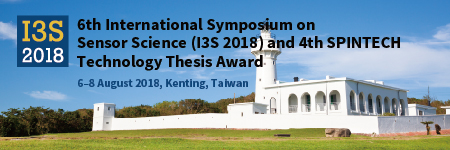
Sensors are vital components of smart manufacturing, artificial Intelligence, Cyber–Physical System (CPS) and Internet of Things (IoT) for industry 4.0. For more advanced creations, biologists, engineers, physicists and chemists are all endeavoring to provide innovative technical sensors. In 2018, the journal Sensors is going to hold an international conference in Kenting, which is located in the south of Taiwan; the conference is taking place in Asia for the first time.
I3S embraces all professionals from industry, academia and government to discuss the latest developments and breakthroughs of sensor technology and related subjects. During the conference, attendees, from a range of research areas, will all gather together to share different aspects and establish new mutually beneficial collaborations across different fields.
Conference scope: Physical Sensors; Sensor Networks; Sensors Application; Biosensors; Chemical Sensors; IOT sensor and application.
We sincerely look forward to your participation in I3S2018.
19 December 2017
Announcing the MDPI English Writing Prize
The competition is still open until end of March! Please check out the banner for more details: https://mdpi-res.com/data/english-prize.pdf
15 December 2017
UCL Press Adopts the MDPI Editorial Platform JAMS
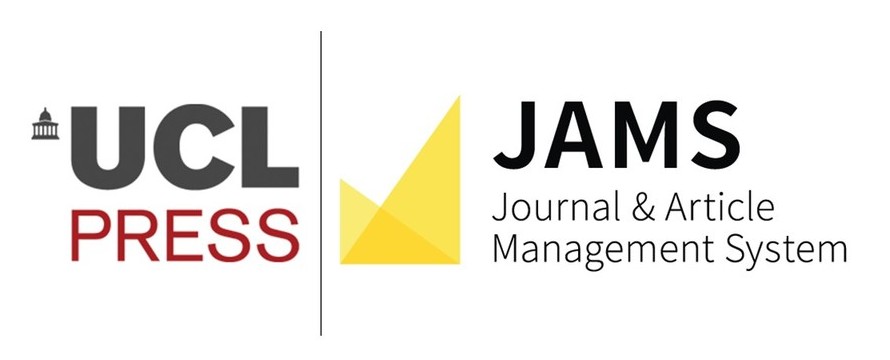
We are delighted to announce that UCL Press has adopted MDPI's Journal Article & Management System, JAMS, including production services. JAMS is a modular, integrated editorial platform for academic publishers. It offers flexibility, ease-of-use, and is a fully integrated solution for the end-to-end management of scholarly journals. JAMS is based on the software used to publish MDPI’s portfolio of journals.
Ian Caswell, UCL Press Journals Manager, says he is "excited to see UCL Press and MDPI partner together to implement the JAMS submission system for all UCL Press journals. The system offered a flexible, efficient and straightforward solution for our processes from author submission to ready for publication. I am grateful for the valuable experience and support MDPI have offered and look forward to developing our programme with an effective submission system in place.” Dr Martyn Rittman, MDPI’s Publishing Services Manager, adds, “We are proud to support one of the UK’s premier university presses in their publishing operation. This is an excellent way for us at MDPI to share our experience and knowledge, and benefit the research community beyond our own journals.”
JAMS combines services that are kept separate for many publishers. The entire editorial process, production and invoicing (e.g. for open access article processing charges) are fully integrated into a single platform. This allows for efficient, fast manuscript processing. For further information about JAMS, see https://www.mdpi.com/publishing_services.
29 November 2017
Cells, Electronics and Pharmaceutics added to SCIE in Web of Science
We are pleased to announce that the journals Cells, Electronics and Pharmaceutics have been accepted into the Science Citation Index Expanded (SCIE) in the Web of Science Core Collection (Clarivate Analytics). Coverage for the newly added titles starts from first issues in 2015. Cells, Electronics and Pharmaceutics are now eligible to be included in next year's Journal Citation Reports (JCR); they are due to receive first Journal Impact Factors in 2018.
23 November 2017
New Participants in the Institutional Open Access Program (IOAP)
We are pleased to welcome new participants to MDPI's Institutional Open Access Program (IOAP), designed to help institutions manage the transition to the Open Access publishing model. Researchers affiliated with participating universites benefit from a 10% discount on the Article Processing Charges (APC) for any paper published in an MDPI journal, while the participating library or university incurs no basic fee for participating in the program.
The IOAP set of free services, provided by MDPI to institutions that sign up, include:- No fee for participants and no obligation to prolong after the initial 12 months. The participants may withdraw from the programme at any time, and we will also keep it free for the library for as long as they continue in the programme.
- Authors affiliated with the university will receive a 10% discount on the APC.
- The institution is granted free access to the MDPI submission system and can receive free alerts of new submissions to our journals.
- By default, authors from the institution will continue to be invoiced directly unless the institution opts for central billing.
- Auto-archiving of papers into the institutions´ repository as long as it supports SWORD 1.3.
More details about the programme and a list of our current participant institutions can be found at: https://www.mdpi.com/about/ioap
Institutions which are interested to participate may do so online at: https://www.mdpi.com/ioap-form
The following North American universities have signed up to the IOAP program recently:
Connecticut College, USA
Emory University, USA
Florida International University, USA
Johns Hopkins University, USA
Mississippi State University, USA
Northeastern University, USA
Rice University, USA
University of Ontario Institute of Technology, Canada
University of Rhode Island, USA
University of Texas Southwestern Medical Center, USA
University of Toronto, Canada
University of Windsor, Canada
University of Wisconsin–Madison, USA
Wellesley College, USA
West Virginia University, USA
Many prestigious institutions from Europe and Asia have joined as well:
Asia Pacific University of Technology & Innovation, Malaysia
Czech Technical University in Prague, Czech Republic
Gdansk University of Technology, Poland
Martin-Luther-Universität Halle-Wittenberg, Germany
National Chung Hsing University, Taiwan
Newcastle University, UK
Northumbria University, UK
Southwest University, China
Technical University of Crete, Greece
University Malaya, Malaysia
University of Antwerp, Belgium
University of Cyprus, Cyprus
University of Manchester, UK
University of Reading, UK
University of Sussex, UK
University of Warwick, UK
West Pomeranian University of Technology Szczecin, Poland
We offer a warm welcome to the new participants!
10 November 2017
Available Journal Awards at MDPI
In order to reward the academic community, especially young researchers, and enhance communication among scientists, MDPI journals regularly offer various awards to researchers in specific fields, for example, Young Investigator Awards, Travel Awards, Best Paper Awards, and Best Poster Awards, etc. The awardees range from PhD students to junior scientists.
Currently, the following 44 awards given by MDPI journals are accepting applications. Please click on the award title below to check whether you are eligible for it and start the application process.
|
Subject |
Journal |
Award |
Intended Awardee |
|
Biology & Life Sciences |
Animals |
PhD students or postdoctoral researchers |
|
|
Antioxidants |
Postdoctoral researchers or PhD students |
||
|
Biology |
PhD or postdoctoral fellows |
||
|
Forests |
Postdocs or PhD students |
||
|
International Journal of Molecular Sciences (IJMS) |
Ground-breaking contribution in the fields of Molecular Biology, and Molecular Pathology |
||
|
Journal of Fungi (JoF) |
Travel Awards 2018 |
PhD graduate students, and postdoctoral fellows |
|
|
Life |
Travel Award 2018 |
PhD students or postdoctoral fellows |
|
|
Metabolites |
PhD students |
||
|
Pharmaceuticals |
PhD students |
||
|
Toxins |
Postdoctoral fellows |
||
|
Viruses |
Viruses 2018 participants |
||
|
Viruses |
Viruses 2018 participants |
||
|
Water |
2018 Young Investigator Award |
Young investigators |
|
|
Chemistry & Materials Science |
Biomimetics
|
Graduate Student or Postdoctoral Trainee / Research Associate |
|
|
Catalysts |
PhD students |
||
|
Chemosensors |
PhD or postdoctoral fellows |
||
|
Entropy |
Young investigators |
||
|
Fibers |
2018 Travel award |
Postdocs or PhD students |
|
|
Magnetochemistry |
Postdocs |
||
|
Materials |
PhD or postdoctoral fellows |
||
|
Metals |
PhD or postdoctoral fellows |
||
|
Minerals |
PhD or postdoctoral fellows |
||
|
Sensors |
Travel Award 2018 |
PhD or postdoctoral fellows |
|
|
Sensors |
Sensors' reviewers in 2017 |
||
|
Sensors |
Young investigators |
||
|
Technologies |
PhD students |
||
|
Computer Science & Mathematics |
Multimodal Technologies and Interaction (MTI) |
Postdoctoral researchers or PhD students |
|
|
ISPRS International Journal of Geo-Information(IJGI) |
Postdocs |
||
|
Journal of Sensor and Actuator Networks (JSAN) |
Postdoctoral fellows and PhD students |
||
|
Journal of Imaging |
Postdoctoral fellows and PhD students |
||
|
Engineering |
Actuators |
PhD or postdoctoral fellows |
|
|
Remote Sensing |
Authors |
||
|
Machines |
PhD or postdoctoral fellows |
||
|
Micromachines |
PhD or postdoctoral fellows |
||
|
Fluids |
Postdoctoral fellows and PhD students |
||
|
ChemEngineering |
Postdoctoral researchers and PhD students |
||
|
Environmental & Earth Sciences |
Diversity |
Travel Awards 2018 |
Postdoctoral fellows |
|
International Journal of Environmental Research and Public Health (IJERPH) |
Authors who submit from 1 Nov 2017 to 31 Oct 2018 |
||
|
Resources |
Postdocs or PhD students |
||
|
Geosciences |
Postdoctoral fellows and PhD students |
||
|
Physical Sciences & Astronomy |
Galaxies |
Ph.D. students, postdoctoral fellows, or lecturers in cosmology or galaxies physics |
|
|
Applied Science |
Postdocs |
||
|
Medicine & Pharmacology; Public Health & Healthcare |
Journal of Clinical Medicine (JCM) |
PhD or postdoctoral fellows |
|
|
Medicines |
Postdocs |
7 November 2017
MDPI has signed the Jussieu Call for Open Science and Bibliodiversity
The Jussieu Call aims to develop and implement alternative models to meet the aims of open science while promoting bibliodiversity. In particular it wishes to promote new business models for funding open access publication. It was drafted on the Jussieu campus in Paris by a group of French researchers and scientific publishing professionals.
MDPI supports scholarly communities and initiatives that innovate and further promote Open Access publishing. There is a need to explore different frameworks to fund open access in ways that ensure that excessive funds are not diverted from research towards publishing. Many fair funding models already exist, and they can be further developed and extended. These include institutional support, library contributions or subsidies, premium services, participatory funding, etc. For this reason, MDPI has signed up to the Jussieu call and welcomes its aims.
More information can be found at http://jussieucall.org/ (archived here)
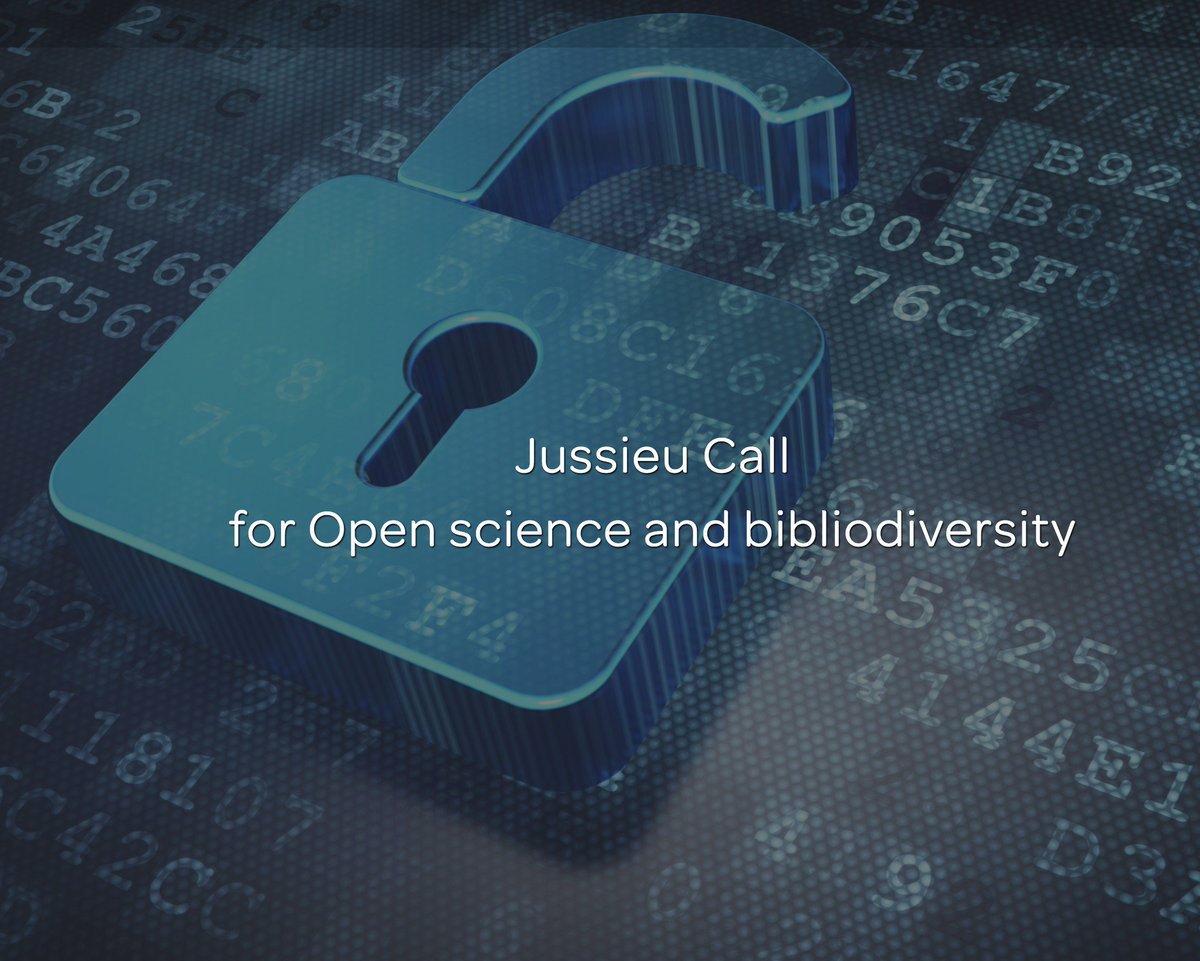
6 October 2017
Dr. Franck Vazquez, MDPI CEO, Interviewed by Scholarly Kitchen
The Society for Scholarly Publishing’s popular blog about topics in academic publishing, Scholarly Kitchen, recently interviewed MDPI’s CEO, Dr. Franck Vazquez. He shared some thoughts and information on the past and future of MDPI and open access publishing in general:
“In the long run, we aim to anchor MDPI in research communities. We recently developed and launched the preprint platform Preprints, revamped our free-to-use conference hosting platform Sciforum, and are working on other projects, such as Scilit, our bibliographic database.”
Read the full interview here.
3 October 2017
Electronics – Official Sponsor of The Loughborough Antennas and Propagation Conference (LAPC 2017), Loughborough, UK, 13–14 November 2017
Electronics is sponsoring the Best Paper Award at the 2017 Loughborough Antennas and Propagation Conference (LAPC 2017) held in Loughborough, UK from 13 to 14 November 2017.
The conference started in 2005 as a UK national event to recognise, nurture and celebrate the research of PhD students in the field of Antennas and Propagation, but has morphed into a well-established prominent international conference. This year, the conference will remain single track, and the programme will as always be centred on 12 invited talks by distinguished speakers divided into four themes.
19 September 2017
A Warm Welcome to the New IOAP Participants
We are delighted to have welcomed 24 new participants to our Institutional Open Access Programme (IOAP) since the beginning of September this year. These are University libraries and Research Institutions located around the world; from the USA and Canada to the UK, and from Norway and Spain to Greece. Well respected Universities, such as the University of Denver, the University of Colorado Boulder, and the University of Arizona in the US, have signed up, while their researchers can now benefit from a 10% discount on the Article Processing Charges (APC) for any papers they publish in MDPI journals, at no cost for the library or the University.
We are more than happy to see the Open Access movement growing stronger and wider every day and we appreciate the vital role which librarians, repository managers, and other scholarly communications professionals play in the field. Our communication with and service to this community is, therefore, one of our principal priorities. The IOAP is our way to support academic and scientific Institutions as well as their scholars in managing, administrating, and publishing research in an Open Access world.
The IOAP set of free services, provided by MDPI to institutions that sign up, include:
- No fee for participants and no obligation to prolong after the initial 12 months. The participants may withdraw from the programme at any time, and we will also keep it free for the library for as long as they continue in the programme.
- Authors affiliated with the university will receive a discount on the article processing charge (APC).
- The institution is granted free access to the MDPI submission system and can receive free alerts of new submissions to our journals.
- By default, authors from the institution will continue to be invoiced directly unless the institution opts for central billing.
- Auto-archiving of papers into the institutions´ repository as long as it supports SWORD 1.3.
More details about the programme and a list of our current participant institutions can be found at: https://www.mdpi.com/about/ioap
Institutions which are interested to participate may do so online at: https://www.mdpi.com/ioap-form
The full list of the Institutions that signed up in September is as follows:
- University of Denver, USA
- University of Colorado Boulder, USA
- University of Arizona, USA
- Institute of Metrology of Bosnia and Herzegovina, Bosnia and Herzegovina
- Middlebury College, USA
- Touro College, USA
- University of New Orleans, USA
- University of Leicester, UK
- Indiana University-Purdue University Indianapolis, USA
- University of Strathclyde, UK
- Cranfield University, UK
- Hope College, USA
- Oregon State University, USA
- Drew University, USA
- Swansea University, UK
- University of South Florida, USA
- University of Georgia, USA
- Arizona State University, USA
- University of Southern Mississippi, USA
- Université du Québec à Chicoutimi, Canada
- Grinnell College, USA
- Norwegian University of Science and Technology, Norway
- University of Patras, Greece
- Public University of Navarre, Spain
23 June 2017
Congratulations for Publishing the 100,000th Peer-Reviewed Article
Congratulations to the authors Javier Monroy and Javier Gonzalez-Jimenez from Universidad de Malaga, Spain, Victor Hernandez-Bennets, Han Fan and Achim Lilienthal from Örebro University, Sweden for publishing the 100,000th peer-reviewed article.
The article is published in the Chemical Sensors section of Sensors.
GADEN: A 3D Gas Dispersion Simulator for Mobile Robot Olfaction in Realistic Environments
Evermore pressing environmental concerns have led global actors and decision-makers to search for stricter emission monitoring approaches. As part of novel monitoring systems, robots with gas and environmental sensors are a promising solution. However, validation of such robotic inspectors is expensive, time consuming, and plagued by repeatability issues. In this article, we present GADEN (the short form for Gas Dispersion Simulator for Mobile Robot Olfaction in Realistic Environments), which combines gas dispersion and robotics simulation in a common framework. Developed under the widely used Robot Operating System (ROS), GADEN enables validation of sensing strategies with gas dispersion being simulated using computational fluid dynamics and filament dispersion theory. GADEN allows simulating complex, realistic, 3D environments for reproducible testing of robotic gas sensing algorithms. Through qualitative and quantitative evaluations, we show that GADEN is a versatile and user-friendly evaluation tool and emphasize its enormous potential for the mobile robot olfaction community.
Read the full article here: https://www.mdpi.com/1424-8220/17/7/1479/htm
6 June 2017
CiteScore™ Metrics Released for Scopus Journals
The CiteScore, the new citation metric for journals covered in the Scopus® database, was released on 1 June 2017, reflecting the citation activity in 2016 for articles published during the three previous years. Please note that the list below does not contain all MDPI journals covered in Scopus. For the CiteScore to serve as a reliable metric at least three volumes of articles need to be indexed in Scopus; journals which have not met this criterion have been omitted here.
Ten MDPI journals received a CiteScore which is in the Top 10% of scores in at least one of the categories, while a further 21 journals exhibit scores that are in the first quartile of the respective categories.
CiteScore Data for MDPI Journals
| Journal | Rank | Category | Link | CiteScore 2016 | 2015 |
2014 |
| Algorithms | 44/112 (Q2) 49/111 (Q2) 19/42 (Q2) 52/113 (Q2) |
• Numerical Analysis • Computational Mathematics • Computational Theory and Mathematics • Theoretical Computer Science |
Link | 1.15 | 1.07 | 1.06 |
| Animals | 69/343 (Q1) 21/146 (Q1) |
• Animal Science and Zoology • General Veterinary |
Link | 1.46 | 1.66 | 0.74 |
| Biology | 13/92 (Q1) 34/81 (Q1) 10/75 (Q1) |
• General Agricultural and Biological Sciences • General Biochemistry, Gene- tics and Molecular Biology • General Immunology and Microbiology |
Link | 3.02 | 2.78 | 1.74 |
| Biomolecules | 234/382 (Q3) 260/353 (Q3) |
• Biochemistry • Molecular Biology |
Link | 1.67 | 3.08 | 1.00 |
| Biosensors | 36/118 (Q2) 209/2156 (Q1) |
• Clinical Biochemistry • General Medicine |
Link | 2.83 | 2.37 | 2.04 |
| Cancers | 29/196 (Q1) 27/321 (Q1) |
• Cancer Research • Oncology |
Link | 5.02 | 4.07 | 2.31 |
| Catalysts | 18/44 (Q2) 27/144 (Q1) |
• Catalysis • Physical and Theoretical Chemistry |
Link | 3.44 | 3.45 | 2.17 |
| Crystals | 70/270 (Q2) 25/64 (Q2) 118/398 (Q2) 131/424 (Q2) |
• General Chemical Engineering • Inorganic Chemistry • Condensed Matter Physics • General Materials Science |
Link | 1.89 | 1.47 | 1.03 |
| Diversity | 10/41 (Q1) 9/25 (Q2) 76/291 (Q2) 24/109 (Q1) |
• Agricultural and Biological Sciences (miscellaneous) • Ecological Modelling • Ecology • Nature and Landscape Conservation |
Link | 2.03 | 1.96 | 1.82 |
| Energies | - | - | Link | 2.50 | 2.87 | 2.66 |
| Entropy | 51/198 (Q2) | • General Physics and Astronomy | Link | 1.87 | 1.99 | 1.69 |
| Forests | 17/127 (Q1) | • Forestry | Link | 2.06 | 1.76 | 1.84 |
| Games | 204/398 (Q3) 83/181 (Q2) 48/105 (Q2) |
• Applied Mathematics • Statistics and Probability • Statistics, Probability and Uncertainty |
Link | 0.87 | 0.57 | 0.64 |
| Genes | 62/300 (Q1) 18/90 (Q1) |
• Genetics • Genetics (clinical) |
Link | 3.62 | 3.18 | 1.33 |
| Geosciences | 36/169 (Q1) |
• General Earth and Planetary Sciences | Link | 1.67 | 1.29 | 1.13 |
| Information | 156/237 (Q3) | • Information Systems | Link | 0.78 | 0.94 | 0.74 |
| Insects | 28/131 (Q1) | • Insect Science | Link | 1.81 | 1.38 | 1.23 |
| International Journal of Environmental Research and Public Health (IJERPH) | 67/446 (Q1) 31/102 (Q2) |
• Public Health, Environmental and Occupational Health • Health, Toxicology and Mutagenesis |
Link | 2.38 | 2.42 | 2.47 |
| International Journal of Molecular Sciences (IJMS) | 23/157 (Q1) 8/64 (Q1) 90/353 (Q1) 22/144 (Q1) 16/44 (Q1) 8/62 (Q1) |
• Organic Chemistry • Inorganic Chemistry • Molecular Biology • Physical and Theoretical Chemistry • Catalysis • Spectroscopy |
Link | 3.73 | 3.37 | 3.06 |
| ISPRS International Journal of Geo-Information | 12/29 (Q2) 28/79 (Q2) 96/587 (Q1) |
• Computers in Earth Sciences • Earth and Planetary Sciences (miscellaneous) • Geography, Planning and Development |
Link | 1.62 | 1.52 | - |
| Journal of Low Power Electronic Applications (JLPEA) | 301/645 (Q2) | • Electrical and Electronic Engineering | Link | 0.98 | 0.83 | 0.83 |
| Life | 65/525 (Q1) 36/186 (Q1) 5/92 (Q1) 20/80 (Q2) |
• Ecology, Evolution, Behavior and Systematics • General Biochemistry, Gene- tics and Molecular Biology • Palaeontology • Space and Planetary Science |
Link | 2.95 | 1.68 | 1.20 |
| Marine Drugs | 18/145 (Q1) | • Drug Discovery | Link | 3.83 | 3.66 | 3.59 |
| Materials | 63/424 (Q1) | • General Materials Science | Link | 3.26 | 3.11 | 2.69 |
| Membranes | 103/424 (Q1) | • Materials Science | Link | 2.19 | 2.95 | 2.42 |
| Micromachines | 173/645 (Q2) 69/211 (Q2) 113/526 (Q1) |
• Electrical and Electronic Engineering • Control and Systems Engineering • Mechanical Engineering |
Link | 1.83 | 1.78 | 2.10 |
| Minerals | 45/206 (Q1) 29/167 (Q1) |
• Geology • Geotechnical Engineering and Engineering Geology |
Link | 2.13 | 1.77 | - |
| Molecules | 32/157 (Q1) | • Organic Chemistry | Link | 3.09 | 2.65 | 2.62 |
| Nutrients | 12/247 (Q1) | • Food Science | Link | 4.29 | 4.07 | 3.78 |
| Pharmaceuticals | 8/168 (Q1) 21/158 (Q1) |
• Pharmaceutical Science • Molecular Medicine |
Link | 4.90 | 3.64 | 1.92 |
| Pharmaceutics | 19/168 (Q1) | • Pharmaceutical Science | Link | 3.83 | 2.68 | 2.46 |
| Polymers | 13/138 (Q1) 44/354 (Q1) |
• Polymers and Plastics • General Chemistry |
Link | 3.74 | 3.37 | 4.10 |
| Remote Sensing | 13/169 (Q1) | • General Earth and Planetary Sciences | Link | 3.56 | 3.76 | 3.23 |
| Sensors | 25/96 (Q2) 25/159 (Q1) 124/382 (Q2) 103/645 (Q1) |
• Analytical Chemistry • Atomic and Molecular Physics, and Optics • Biochemistry • Electrical and Electronic Engineering |
Link | 2.78 | 2.21 | 2.40 |
| Sustainability | 49/129 (Q2) 68/587 (Q1) 56/236 (Q1) |
• Renewable Energy, Sustai-nability and the Environment • Geography, Planning and Development • Management, Monitoring, Policy and Law |
Link | 1.96 | 1.78 | 1.52 |
| Symmetry | 17/42 (Q2) 49/111 (Q2) |
• Numerical Analysis • Computational Mathematics |
Link | 1.12 | 0.95 | 1.02 |
| Toxins | 16/102 (Q1) 16/108 (Q1) |
• Health, Toxicology and Mutagenesis • Toxicology |
Link | 3.34 | 3.76 | 2.85 |
| Vaccines | 146/184 (Q4) 151/250 (Q3) 93/145 (Q3) 186/299 (Q3) 130/232 (Q3) |
• Immunology • Infectious Diseases • Drug Discovery • Pharmacology • Pharmacology (medical) |
Link | 1.23 | 3.76 | 2.85 |
| Viruses | 15/68 (Q1) 34/250 (Q1) |
• Virology • Infectious Diseases |
Link | 3.60 | 3.74 | 3.80 |
| Water | 33/184 (Q1) 48/195 (Q1) 62/587 (Q1) 198/382 (Q3) |
• Water Science and Technology • Aquatic Science • Geography, Planning and Development • Biochemistry |
Link | 2.05 | 1.96 | 1.45 |
17 May 2017
Three New Institutional Memberships Established
We are pleased to announce that the Goethe University of Frankfurt, the Technical University of Hamburg (TU Hamburg-Harburg), as well as the Humboldt University of Berlin, in Germany, have joined MDPI's institutional membership program: Primary authors from these instititions will benefit from a 10% discount on the article processing charges.
Additional details can be found on our institutional membership page.
4 May 2017
MDPI Supports the Initiative for Open Citations (I4OC)
As an open access publisher, we are keen to support openness and transparency in the research process. Citation data is very important for assessing the value of individual papers and the contribution of researchers. As such, we support the recently launched Initiative for Open Citations (I4OC). The initiative recognizes that citations should be freely available and machine-readable. By doing so, authors gain the maximum benefit from having their work cited.
MDPI now uploads citation data with metadata uploaded to Crossref when registering digital object identifiers (DOIs) for published papers. We are delighted to take this step to support a truly open research environment.
2 May 2017
Publons Peer Review Academy Goes Live
Getting high quality review reports is critical for any journal’s editorial process. At MDPI we have put in place several measures to motivate reviewers and reward them for their work. We are proud of the quality of reviewer reports we receive and grateful for the hours put in by active researchers from across the globe.
Reviewers of MDPI’s largest journals can get recognition via Publons, a website dedicated to rewarding peer reviewers. They have now taken this one step further and launched the Publons Reviewer Academy to help train reviewers to provide useful feedback. Through the academy, researchers can be trained and tutored in various aspects of how to provide structured feedback that will be of genuine help to editors and authors. We support this initiative and recommend it to potential MDPI reviewers, especially early career researchers. See the Publons announcement for further information.
More information on reviewing for MDPI, including how to volunteer as a reviewer, can be found here.
24 April 2017
Two New Institutional Memberships Established
We are pleased to announce that the following universities have joined MDPI's institutional membership program: Trinity University, San Antonio, Texas, USA and the University of New South Wales (UNSW), Sydney, Australia. Primary authors from these instititions will benefit from a 10% discount on the article processing charges.
Additional details can be found on our institutional membership page.
30 March 2017
Credit for Preprints Comments via Publons
Preprints.org is a platform run by MDPI that allows authors to make early versions of manuscripts available before peer review has been completed.
One of the major benefits of putting a preprint online is to get feedback before journal submission. Until now, however, the feedback has been on a voluntary basis. Preprints is delighted to be the first preprint server to collaborate with Publons to acknowledge substantial comments as reviews and give commentators the opportunity to receive credit for their efforts.
When you add a comment to any article, there is a check box to click for it to appear on Publons. If you have already linked your account it will be passed on automatically. If you don't already have a Publons account, you will be contacted soon afterwards with instructions on how to create one.
We appreciate the enthusiasm and cooperation of Publons in this project and expect it to be of great benefit to authors and commenters alike.
20 March 2017
MDPI 2016 Annual Report Released
We are pleased to announce that our annual report for the year 2016 has now been published.
It contains information regarding company and journal performance, conferences and other publishing services that we provided throughout 2016.
To read the report in full or download a copy, please click here.
15 March 2017
Our 100,000th Article Could be Yours!
After the 20th anniversary of MDPI in 2016, we will reach another milestone this year and will publish the 100,000th peer-reviewed article in one of our 170+ open access journals.
We would like you to be part of this great achievement and so are offering to publish the 100,000th accepted paper free of charge.
To be in with a chance, select a journal in one of our 10 scientific subject areas and submit your paper.
Access the live tracker on published articles here.
![]()
3 March 2017
1000 Preprints Online
We are delighted that Preprints now has 1000 papers online since its launch on 3 May 2016.
For more information, see the editorial here.
9 February 2017
Minister and State Secretaries Visit MDPI Office at STP, Belgrade, Serbia
Earlier this week the Science Technology Park in Belgrade, Serbia was visited by Swiss Secretary of State Dr. Mauro Dell’Ambrogio, as well as Serbian Minister of Public Administration and Local Self-Government Ana Brnabic, State Secretary Dr. Vladimir Popovic and Mayor of Belgrade Mr. Siniša Mali.
During the visit to the STP they had a short presentation from MDPI’s CEO Dr. Franck Vazquez and IT Manager Mr. Miloš Čučulović, and further discussed important issues such as Open Access and Open education. Dr. Dell'Ambrogio said he was impressed with the potential for development and ideas for business.
For more information please see:
http://bit.ly/2kpIu7k and http://bit.ly/2kpUQfz
7 February 2017
The 6th World Sustainability Forum: Final Press Release
Basel, 29 January 2017
The 6th World Sustainability Forum #WSF2017SA: African universities critical to achieving the Sustainable Development Goals
Jeffrey and Sonia Sachs win first World Sustainability Award.
Universities need to take the lead in solving the greatest challenges the world faces today, particularly in Africa. They need to do this not only through education – teaching the next generation to think critically and creatively to find sustainable solutions – but also through research that cuts across a range of disciplines. To ensure these solutions are implemented, they need to partner with the private sector and with government.
This was the key message from the 6th World Sustainability Forum (WSF2017), which took place in Cape Town on 27 and 28 January 2017. Sponsored by MDPI and the journal Sustainability under the patronage of the Universities of the Western Cape (UWC), Cape Town (UCT), University of Basel and the National Research Foundation (NRF) of South Africa, the conference was attended by key national and international speakers, including world-leading economist Professor Jeffrey D. Sachs, senior United Nations (UN) advisor and director of the Earth Institute at Columbia University.
The WSF is an annual sustainability conference which addresses research in a range of areas related to sustainable development and sustainability globally. This was the first WSF to take place on the African continent. Discussions at the 2017 conference were driven by the 17 sustainable development goals (SDGs) adopted as part of the 2030 Agenda for Sustainable Development by the UN in September 2015.
Achieving the SDGs “is the moonshot for our generation,” said Sachs. “Like the moonshot [moon landing] of the 1960s, these are tough, bold and achievable objectives.”
“This is a nasty, tough world we live in, and our world agrees on very little. So when 193 governments agree on something, that is important. And when they agree on something as important as sustainable development, that is really something for us to grab hold of – that is a lifeline.”
There was agreement at the WSF that the SDGs are particularly important for Africa, and that African universities in particular have a role to play in achieving them.
Said Professor Tyrone Pretorius, vice-chancellor of UWC: “The quest for sustainable development can only be met through education. Universities today are the oil that fuels the knowledge economy.”
As part of the drive to develop academic capacity to provide the knowledge needed to meet the SDGs, WSF2017 was preceded by the 1st Postgraduate Forum on Sustainability. “A series of workshops for postgraduate education linked to WSF are important, in order to equip postgraduates with the skills necessary to promote sustainability,” said Professor Thandi Mgwebi, director for research at UWC. A second postgraduate forum will take place alongside the WSF2018 in Beijing.
This capacity development is particularly critical to Africa. Said Sachs: “African universities need to do research to find solutions to Africa’s development challenges, because no other university will.”
The UN set a target of achieving the SDGs by 2030: “I regard this as the breakthrough period to end extreme poverty on the continent,” said Sachs, “and for Africa to become one of the most dynamic centres of the world economy.”
It is a critical time for South African universities, said Professor Mamokgethi Phakeng, deputy vice-chancellor for research and internationalisation at UCT: “Higher education is at a crossroads, and there is much polarisation. We need to think carefully about how this sustainable development agenda is owned by all so that it is inclusionary.”
There was also strong emphasis on public–private partnerships – for universities, business and government to work together to achieve the goals.
Said Professor Francis Petersen, deputy vice-chancellor at UCT and vice-chancellor designate at the University of the Free State: “Business sustainability has become critical, because there is increasing demand and complexity of demand on business from the natural, social and economic environment. Sustainability cannot be a standalone issue, divorced from business as usual. Sustainability needs to be embedded into business.”
Environmental crises and climate change was also high on the WSF agenda. In his keynote address, Sachs noted the irreversibility of the climate- and environmental-related challenges.
“If we don’t get our act together, we lose the chance of safety,” he said.
Said Professor Mark New, pro vice-chancellor and director of the African Climate and Development Initiative at UCT: “We have a fundamental challenge in responding to climate change, and we must go further than just putting a plaster on a wound. We need to address the deep structural issues, to move from our current model of development into climate-compatible development.”
“This requires researchers to find the evidence for the correct development pathways to take, and then support the ability of policymakers at all levels to enable the shift to climate-compatible development planning.”
Said Dr. Aldo Stroebel, executive director of international relations and cooperation at the NRF, in closing: “We have seen over the past two days an urgency towards the next step of thinking, that critical type of framework that we all must engage with, not only from an academic perspective, but further up into the policy environment and into rural-based environments where one can clearly see the links and effectiveness of the work.”
World Sustainability Awards
The first World Sustainability Award and the first Emerging Sustainability Leader Awards were presented by Prof. Thandi Mgwebi, Director of Research at UWC, and Dr. Franck Vazquez, CEO of MDPI, during the ceremony on 27 January 2017 as part of the gala dinner of the 6th World Sustainability Forum in South Africa.after day one of proceedings of the 2017 World Sustainability Forum South Africa.
Professor Jeffrey D. Sachs and Dr. Sonia Ehrlich Sachs are the joint recipients of the first World Sustainability Award. Jeffrey Sachs is a world-renowned economist and senior United Nations (UN) advisor and director of the Earth Institute at Columbia University. Sonia Sachs is a paediatrician and public health specialist, and director of the Health Centre at the Centre for Sustainable Development, also at Columbia University.
The joint recipients of the first Emerging Sustainability Leader Award are Dr. Esther Ngumbi and Dr. Xiaosong Hu. Esther Ngumbi is a postdoctoral researcher at Auburn University in Alabama USA and serves as a 2015 Clinton Global University Mentor for agriculture. Xiaosong Hu is a professor at the Chongqing University in China and specialises in automotive control systems and mechanical engineering.
The World Sustainability Award and the Emerging Sustainability Leader Awards are funded to encourage new initiatives and developments in sustainability with the ultimate aim of fostering the transition to sustainable practices and societies.
The World Sustainability Award is funded by the MDPI Sustainability Foundation, and included a monetary prize of USD 100,000 to Jeffrey and Sonia Sachs. The Emerging Sustainability Leader Award is funded by the journal Sustainability, awarded to researchers under 40, and included a monetary prize of USD10,000.
Issued jointly by: UCT Global Strategy and Visibility, Research Office, UWC Communications & Media and MDPI AG
Conference photos are free available at: https://sciforum.net/conference/wsf-6/page/175 Photo credit: Matthias Burkhalter
|
Carla Bernardo |
Luthando Tyhalibongo |
Matthias Burkhalter |
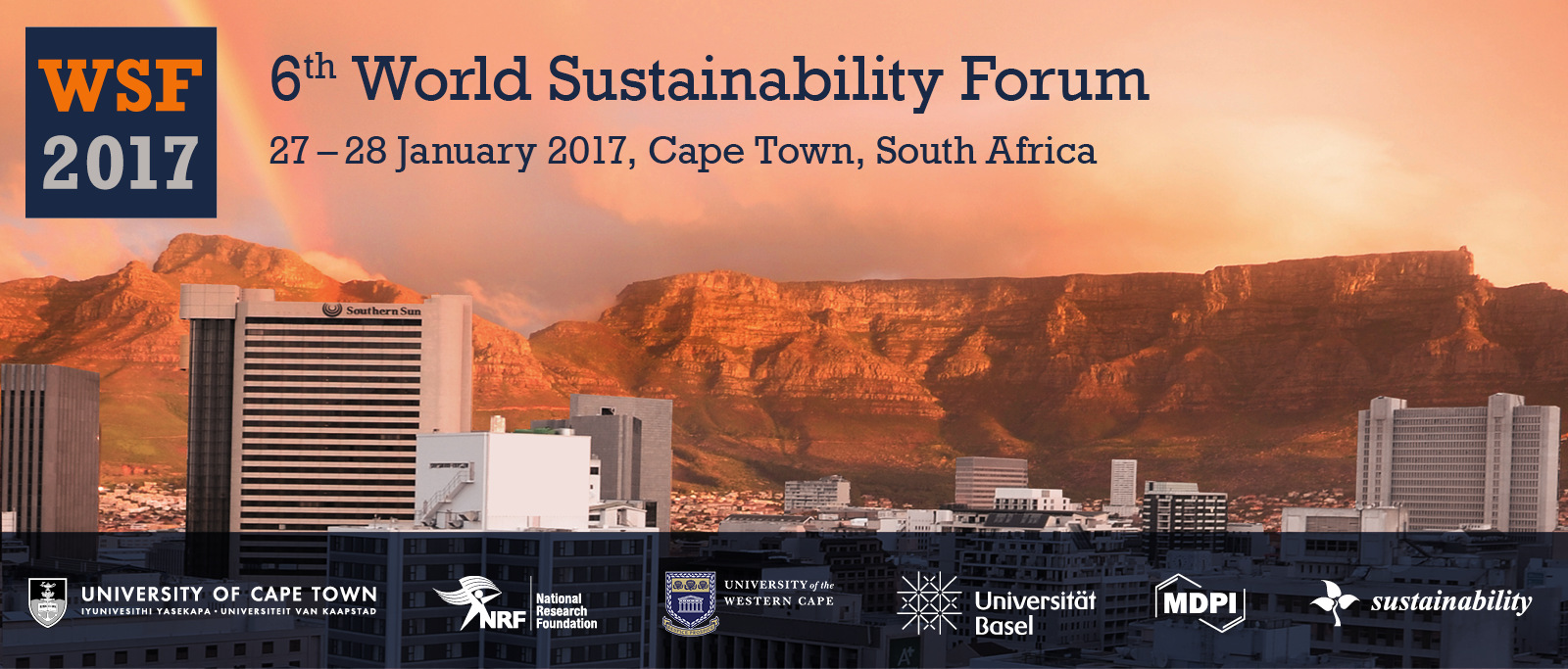
31 January 2017
Three New Institutional Memberships Established
We are pleased to announce that the Chalmers University of Technology, Sweden, the University of Manitoba, Canada and the Technical University of Cartagena, Spain, have joined MDPI's institutional membership program: Primary authors from these institutions will benefit from a 10% discount on the article processing charges.
Additional details can be found on our institutional membership page.
27 January 2017
6th World Sustainability Forum under way in South Africa
The 6th World Sustainability Forum is currently being held at the Cape Sun Hotel until 28 January 2017.
The Forum will showcase the work of internationally renowned researchers and include more than 150 presentations. During the conference dinner, the World Sustainability Award, associated with a US$ 100,000 prize, will be announced, as well as the Emerging Sustainability Leader Award, associated with a US$ 10,000 prize. The prizes are sponsored by the MDPI Sustainability Foundation and Sustainability, an academic open access journal by MDPI.
Here are some pictures from the forum so far:
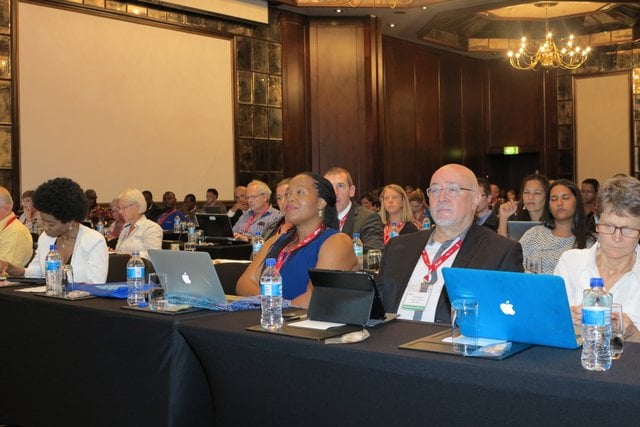
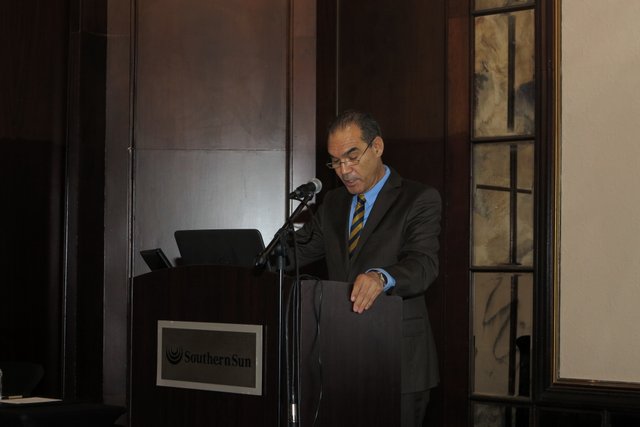
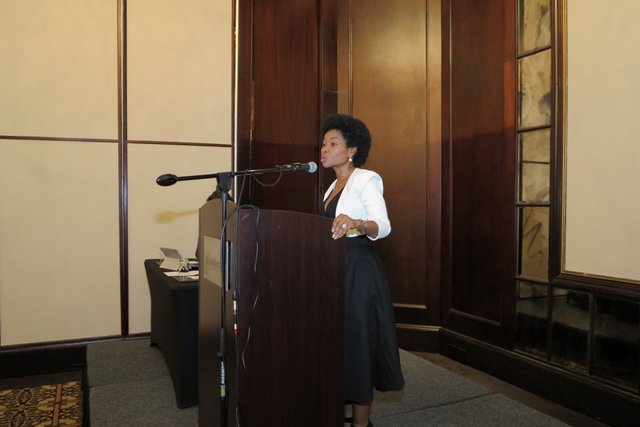
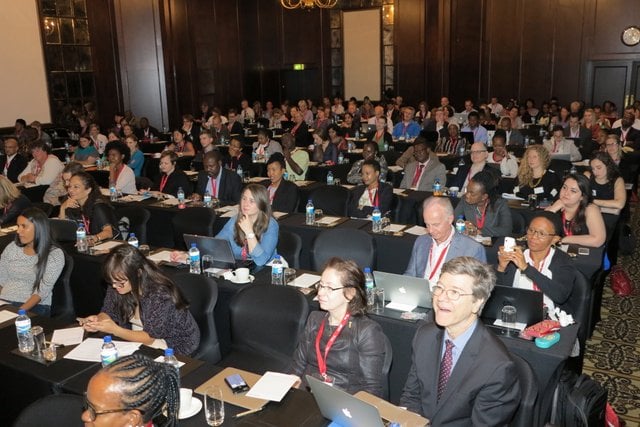
To see the full WSF2017 program and schedule, please see here: https://sciforum.net/conference/wsf-6/page/schedule
19 January 2017
Cape Town to Host the 6th World Sustainability Forum
Cape Town will host the 6th World Sustainability Forum at the Cape Sun Hotel on 27 and 28 January 2017. This prominent event, held for the first time in Africa, will include many illustrious South African and international experts, such as Her Excellency Graça Machel (Sustainable Development Advocate for the United Nations, Mozambique), Joyene Isaacs (HoD Agriculture Western Cape Government), Jeffrey Sachs (Columbia University, USA), Max Bergman (SRaM, University of Basel), Mark New (Pro Vice-Chancellor, University of Cape Town), Frans Swanepoel (FutureAfrica, University of Pretoria) and Francis Petersen (Vice-Chancellor-designate, University of the Free State). The Forum will provide a stage for national and international debates on sustainability in South Africa, the African continent, and about international perspectives on sustainability. It brings together researchers and representatives from government and the business sector to discuss a wide-ranging set of issues associated with sustainability, including food security, water and energy scarcity, mining, poverty reduction, climate change, and urbanisation.
The next few decades will be marked by profound changes in the relationships between global economics, national societies, and the environment. We have entered what some call the Anthropocene, an age in which human activity dominates the climate and the environment. These changes will have numerous consequences on societies around the globe. South Africa and Africa will play a central role, for better or worse, in creating opportunities and risks during these changing times as Africa is profoundly influencing and being influenced by global developments.
The adoption of the 17 United Nations Sustainable Development Goals and the 2030 Agenda for Sustainable Development in September 2015 was accompanied by what insiders considered an optimism they have not experienced in relation to UN resolutions before. The relative efficiency in the drafting, the lack of trenches between East and West, or between North and South, and the unanimity of support of the 193 countries speak volumes. In stark contrast, sustainability seems to go against a changing economic and political tide, where waves of nationalism and protectionism from some of the most powerful countries risk the wellbeing of the rest of the world. The 6th World Sustainability Forum will enable fruitful exchanges, which sensitise South African and international communities to the global urgency and specifics of sustainability.
The Forum will showcase the work of internationally renowned researchers and include more than 150 presentations. During the conference dinner, the World Sustainability Award, associated with a US$ 100 000 prize, will be announced, as well as the Emerging Sustainability Leader Award, associated with a US$ 10 000 prize. The prizes are sponsored by the MDPI Sustainability Foundation and Sustainability, an academic open access journal by MDPI. The World Sustainability Forum is preceded by the Postgraduate Forum on Sustainability, which will introduce more than 100 young scholars from South Africa and the African continent to sustainability research. Both events are organized and sponsored by the University of Cape Town, the University of the Western Cape, the University of Basel, MDPI, and by the National Research Foundation of South Africa.
Contacts:
Scientific Matters: Prof Manfred Max Bergman, Social Research and Methodology Group (SRaM), University of Basel, Switzerland; Email: [email protected]
Press Accreditation and General Enquiries: Mr Matthias Burkhalter, MDPI AG, Basel, Switzerland; Email: [email protected]; Tel. +41 61 683 77 34
Follow us on Twitter
#WSF2017SA
6 January 2017
MDPI Supports the OA2020 Initiative
MDPI is now a proud supporter of the OA2020 Initiative.
Open Access 2020 is an international initiative that aims to induce the swift, smooth and scholarly-oriented transformation of today’s scholarly journals from subscription to open access publishing.
MDPI is participating in the upcoming Berlin13 conference in March 2017, where we are contributing to the initiative by aiding in the design of the roadmap which will make OA the default publishing model.
For more information please see here.
6 January 2017
MDPI is Attending SPIE Photonics West 2017
We are pleased to announce that MDPI will be attending the 2017 SPIE Photonics West Conference (28 January-2 February, 2017) and representing the following open access journals:
Sensors
Photonics
Micromachines
Materials
Applied Sciences
Journal of Imaging
Inventions
Computation
Technologies
Remote Sensing
Biosensors
Electronics
If you are also attending this conference, please feel free to stop by our booth (Booth #4220) and meet the representative editors.
Conference details:
SPIE Photonics West 2017
28 January-2 February, 2017
Moscone Center
747 Howard St
San Francisco, CA 94103, USA
5 January 2017
Three New Institutional Memberships Established
We are pleased to announce that the University of Texas at Arlington, USA, the Harbin Institute of Technology, China and TU Darmstadt, Germany, have joined MDPI's institutional membership program: Primary authors from these institutions will benefit from a 10% discount on the article processing charges.
Additional details can be found on our institutional membership page.
22 December 2016
Two New Institutional Memberships Established
We are pleased to announce that the Otto-von-Guericke-Universität Magdeburg, Germany and the University of California, Berkeley, USA, have joined MDPI's institutional membership program: Primary authors from these instititions will benefit from a 10% discount on the article processing charges.
Additional details can be found on our institutional membership page.
19 December 2016
MDPI and Wellcome Trust Compliance
The Wellcome Trust has, for a number of years, required that the results of its funded projects are published in open access format. Recently it announced criteria that publishers must fulfil for publication fees to be paid by the Trust. MDPI is pleased to have been added to the list of compliant publishers.
Only publishers who have confirmed their compliance by 16 December 2016 will be eligible to receive payment of APCs by the Wellcome Trust as of 1 April 2017. For more information on the criteria and a full list of publishers that meet them, see here.
13 December 2016
Meet MDPI at the 2016 AGU Fall Meeting
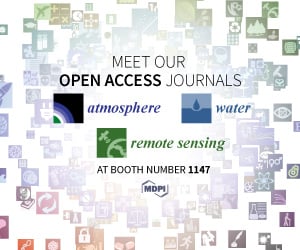 MDPI is currently attending the 2016 AGU Fall Meeting (12–16 December, 2016)
MDPI is currently attending the 2016 AGU Fall Meeting (12–16 December, 2016)
If you are also attending the conference, please feel free to stop by our booth (Booth #1147) and meet the representative editors.
Conference details:
2016 AGU Fall Meeting
12–16 December 2016
Moscone Center
747 Howard St
San Francisco, CA 94103, USA
8 December 2016
Three New Institutional Memberships Established
We are pleased to announce that Purdue University, USA, the Universitat Politécnica de Valencia, Spain and the Queensland University of Technology, Australia, have joined MDPI's institutional membership program: Primary authors from these instititions will benefit from a 10% discount on the article processing charges.
Additional details can be found on our institutional membership page.
16 November 2016
World Sustainability Award - Final Extension
The deadline for the World Sustainability Award has been extended for one last time! You now have one more month to nominate an individual researcher, group or project! The final deadline for nominations will be December 15, 2016.
For full details, please visit here.
11 November 2016
Three New Institutional Memberships Established
We are pleased to announce that the University of Minnesota, USA, the Universidad Politécnica de Madrid, Spain and Shanghai Jiao Tong University, China, have joined MDPI's institutional membership program: Primary authors from these instititions will benefit from a 10% discount on the article processing charges.
Additional details can be found on our institutional membership page.
4 November 2016
MDPI Joins the United Nations Global Compact
MDPI has become a member of the United Nations Global Compact to support corporate sustainability and have committed ourselves to the ten principles associated with the Compact.
Sustainability has always been at the core of MDPI’s values, starting with the collection and preservation of rare chemical samples that started in 1996 and led to the first journal, Molecules. Sustainability has become one of our flagship journals and we have supported and organized several conferences and events based on Sustainability, including the upcoming 6th World Sustainability Forum. As a global enterprise, we see it as our duty to promote responsible practices that will ensure a bright future for our planet. Given this, the choice to join the Global Compact was an easy one and we will do our utmost to fully implement it.
3 November 2016
MDPI Now a Member of SPARC Europe
We are delighted to announce that MDPI has become a member of SPARC Europe, an organization that works for open scholarship in Europe, including support of open access publication.
As one of the few publishers to join SPARC Europe to date, MDPI looks forward to making a contribution that puts open scholarship on a positive and sustainable path. We fully support the goals of open scholarship that allow the largest number of people possible to benefit from work of researchers in all disciplines. We hope that our membership will enable us to work with other stakeholders to find the best possible solution.
2 November 2016
World Sustainability Award Deadline Extension
The deadline for the World Sustainability Award has been extended! You now have until November 15, 2016 to nominate an individual researcher, group or project!
For full details, please visit here.
26 October 2016
Four New Institutional Memberships Established
We are pleased to announce that the Wuppertal Institut, Germany, the University of Girona, Spain and Central South University and Huazhong University of Science and Technology, China, have joined MDPI's institutional membership program: Primary authors from these instititions will benefit from a 10% discount on the article processing charges.
Additional details can be found on our institutional membership page.
24 October 2016
International Open Access Week 2016
Meet us during International Open Access Week 2016! We will be presenting at various locations in Europe and China.
To get involved and for full details see the complete list of events organised by MDPI here.
18 October 2016
Institutional Membership established with Universitat Pompeu Fabra, Spain and Aalto University, Finland
We are pleased to announce that the Universitat Pompeu Fabra, Spain and Aalto University, Finland, have joined MDPI's institutional membership program: Primary authors from these universities will benefit from a 10% discount on the article processing charges.
Additional details can be found on our institutional membership page.
12 October 2016
Institutional Membership Established with Iowa State University and the University of North Texas, USA
We are pleased to announce that the Iowa State University and the University of North Texas, USA, have joined MDPI's institutional membership program: Primary authors from these universities will benefit from a 10% discount on the article processing charges.
Additional details can be found on our institutional membership page.
7 October 2016
MDPI at Open Access Days in Munich, 10-11 October 2016
Meet MDPI during the Open Access Days held from 10-11 October 2016 at Ludwig Maximilian University of Munich, Germany.
The two-day event will feature experts from the open access sector, scientists from all disciplines, publishing representatives and supporters of scientific research and communication from libraries as well as research institutes and funding institutions. Join us!
For more information about the event and to see the program, visit the event webpage.
7 October 2016
Institutional Membership Established with the University of Sevilla and the University of Alicante, Spain
We are pleased to announce that the University of Sevilla and the University of Alicante, Spain have joined MDPI's institutional membership program: Primary authors from these universities will benefit from a 10% discount on the article processing charges.
Additional details can be found on our institutional membership page.
29 September 2016
Institutional Membership Established with the University of Delaware
We are pleased to announce that the University of Delaware, USA, has joined MDPI's institutional membership program: Primary authors from this university will benefit from a 10% discount on the article processing charges.
Additional details can be found on our institutional membership page.
19 September 2016
Peer Review Week 2016
As an open access publisher indebted to the work of our peer reviewers, we are proud to support Peer Review Week 2016. As part of the week's activities and to celebrate this year's theme "Recognition for Review", MDPI will host two webinars that anyone can join.
These webinars will explore the role and value of reviewers and the recognition they receive from a publishers perspective, with examples from MDPI's experience in publishing nearly 80,000 peer reviewed papers, along with evidence from reviewer surveys. It will also touch upon potential changes in how review is carried out and tips for early career researchers who want to be involved in the review process.
Details and links to join can be found below:
Wednesday September 21, 08:00 (CEST)
Friday September 23, 16:00 (CEST)
For more information about all the activites taking place, please visit the Peer Review Week website.
6 September 2016
Institutional Membership established with Kansas State University and Northwestern University, USA
We are pleased to announce that Kansas State University and Northwestern Universty, USE, have joined MDPI's institutional membership program: Primary authors from these universities will benefit from a 10% discount on the article processing charges.
Additional details can be found on our institutional membership page.
5 September 2016
Institutional Membership Established with University College Cork
We are pleased to announce that University College Cork, Ireland, has joined MDPI's institutional membership program: Primary authors from this university will benefit from a 10% discount on the article processing charges.
Additional details can be found on our institutional membership page.
22 August 2016
MDPI New Office Location
We are pleased to announce that MDPI has now moved to a new permanent address:
MDPI AG
St. Alban Anlage 66
CH-4052 Basel
Postfach, CH-4020 Basel
Switzerland
Telephone and fax numbers remain unchanged.
10 August 2016
Institutional Membership established with the University of Texas at Austin, USA, the Wroclaw University of Science and Technology, Poland and the University of Granada and the Compultense University of Madrid, Spain
We are pleased to announce that the following institutions have joined MDPI's institutional membership program in August 2016:
- University of Texas at Austin, USA
- Wroclaw University of Science and Technology, Poland
- University of Granada, Spain
- Compultense University of Madrid, Spain
Authors affiliated with these institutions will benefit from a 10% discount on the article processing charges.
Additional details can be found on our institutional membership page.
18 July 2016
Institutional Membership established with Louisiana State University and Florida State University, USA, Royal College of Surgeons, Ireland, University of Rostock, Germany, AGH University of Science and Technology, Poland and Southeast University, China
We are pleased to announce that the following institutions have joined MDPI's institutional membership program in July 2016:
- Louisiana State University, USA
- Florida State University, USA
- Royal College of Surgeons, Ireland
- University of Rostock, Germany
- AGH University of Science and Technology, Poland
- Southeast University, China
Authors affiliated with these institutions will benefit from a 10% discount on the article processing charges.
Additional details can be found on our institutional membership page.
12 July 2016
MDPI Moving to New Office Location in Basel (Switzerland) in August 2016
As of 20 August 2016, MDPI's new address in Basel will be:
MDPI AG
St. Alban-Anlage 66
CH-4052 Basel
Switzerland
Telephone and fax numbers remain unchanged.
St. Alban-Anlage 66 was built from 1947 to 1948 and initially the home of the "Bühler AG", a book printing business.
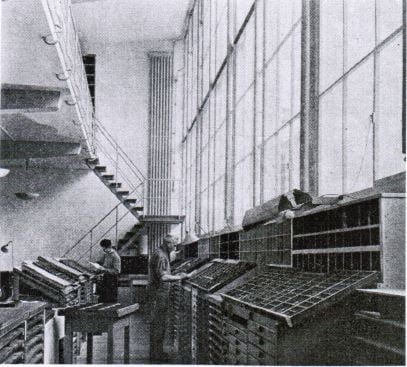
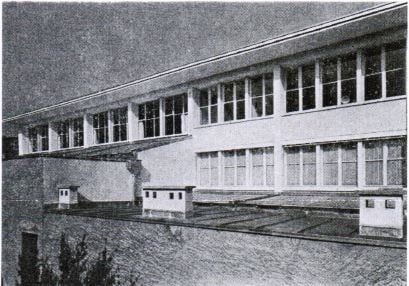
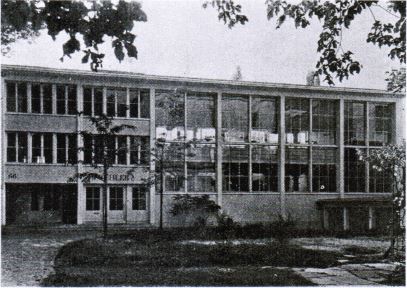
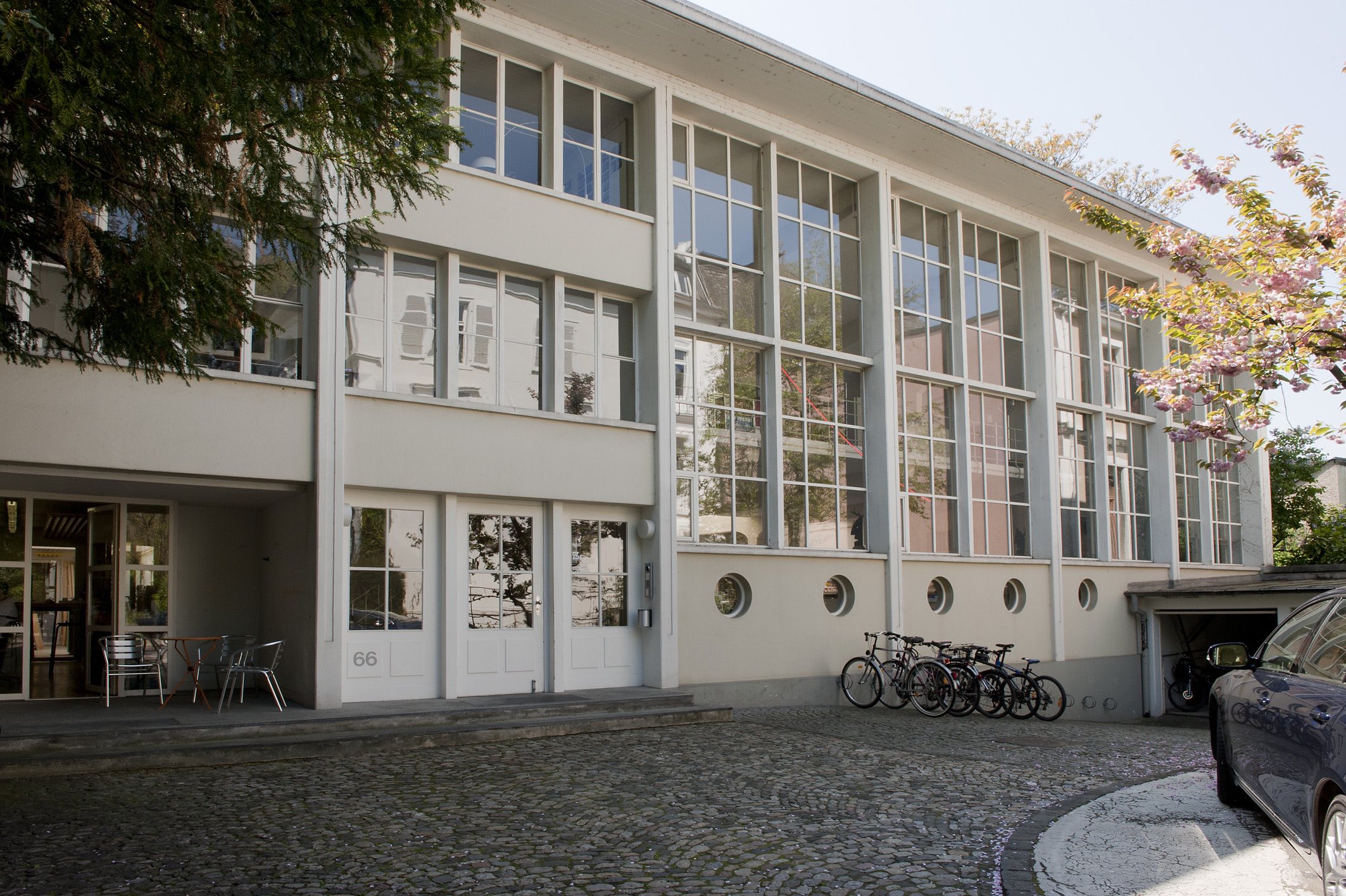
For more information about this building, see: https://www.mdpi.com/about/headquarters
21 June 2016
"Behind the Scenes of Academic Publishing—A Publisher's Perspective" - MDPI's Lecture at the University of Basel
From the 15-16 September, 2016, MDPI will run a course on Academic Publishing at the University of Basel.
In this two day workshop, MDPI will look in detail at the role performed by academic journal publishers and how they interact with academics. Ethical dimensions, what happens when problems occur and how the publisher coordinates all aspects of the submission process will also be covered.
For more detailed information about the program, trainers and registration please visit the course webpage.
14 June 2016
2015 Impact Factors Released
We are pleased to report the 2015 Journal Impact Factors in the latest Journal Citation Reports® Science Edition, published by Thomson Reuters in June 2016. Twenty out of 25 journals have seen an increase in their Impact Factor and two journals (Crystals and IJGI) received a first Impact Factor. Coatings was recently added to SCIE and will receive its first Impact Factor in next year’s JCR.
Updated Impact Factors for Journals in the Science Citation Index Expanded (SCIE)
| Journal | 2015 Impact Factor | Details | Category Rank |
| Applied Sciences | 1.726 | Link | 83/163 (Q3) in ‘Chemistry, Multidisciplinary’; 129/271 (Q2) in ‘Materials Science, Multidisciplinary’; 64/145 (Q2) in ‘Physics, Applied’ |
| Atmosphere | 1.221 | Link | 66/84 (Q4) in ‘Meteorology & Atmospheric Sciences’ |
| Catalysts | 2.964 | Link | 53/144 (Q2) in ‘Chemistry, Physical’ |
| Energies | 2.077 | Link | 43/88 (Q2) in ‘Energy & Fuels’ |
| Entropy | 1.743 | Link | 25/79 (Q2) in ‘Physics, Multidisciplinary’ |
| Forests | 1.583 | Link | 19/66 (Q2) in ‘Forestry’ |
| Genes | 3.242 | Link | 60/165 (Q2) in ‘Genetics & Heredity’ |
| International Journal of Environmental Research and Public Health (IJERPH) | 2.035 | Link | 101/225 (Q2) in ‘Environmental Sciences’ |
| International Journal of Molecular Sciences (IJMS) | 3.257 | Link | 110/289 (Q2) in ‘Biochemistry & Molecular Biology’; 51/163 (Q2) in ‘Chemistry, Multidisciplinary’ |
| Marine Drugs | 3.345 | Link | 13/59 (Q1) in ‘Chemistry, Medicinal’ |
| Materials | 2.728 | Link | 63/271 (Q1) in ‘Materials Science, Multidisciplinary’ |
| Metals | 1.574 | Link | 18/73 (Q1) in ‘Metallurgy & Metallurgical Engineering’; 145/271 (Q3) in ‘Materials Science, Multidisciplinary’ |
| Micromachines | 1.295 | Link | 30/56 (Q3) in ‘Instruments & Instrumentation’ 63/83 (Q4) in ‘Nanoscience & Nanotechnology’ |
| Minerals | 1.468 | Link | 9/21 (Q2) in ‘Mining & Mineral Processing; 14/29 (Q2) in ‘Mineralogy’ |
| Molecules | 2.465 | Link | 24/59 (Q2) in ‘Chemistry, Organic’ |
| Nanomaterials | 2.690 | Link | 64/271 (Q1) in ‘Materials Science, Multidisciplinary’; 36/83 (Q2) in ‘Nanoscience & Nanotechnology’ |
| Nutrients | 3.759 | Link | 16/78 (Q1) in ‘Nutrition & Dietetics’ |
| Polymers | 2.944 | Link | 20/85 (Q1) in ‘Polymer Science’ |
| Remote Sensing | 3.036 | Link | 5/28 (Q1) in ‘Remote Sensing’ |
| Sensors | 2.033 | Link | 36/75 (Q2) in ‘Chemistry, Analytical’; 16/27 (Q3) in ‘Electrochemistry’; 12/56 (Q1) in ‘Instruments & Instrumentation’ |
| Sustainability | 1.343 | Link | 146/225 (Q3) in ‘Environmental Sciences’; 22/29 (Q4) in ‘Green & Sustainable Science & Technology’ |
| Symmetry | 0.841 | Link | 31/63 (Q2) in ‘Multidisciplinary Sciences’ |
| Toxins | 3.571 | Link | 16/89 (Q1) in ‘Toxicology’ |
| Viruses | 3.042 | Link | 14/33 (Q2) in ‘Virology’ |
| Water | 1.687 | Link | 33/85 (Q2) in ‘Water Resources’ |
Journals with First Impact Factors
| Journal | 2015 Impact Factor | Details | Category Rank |
| Crystals | 2.075 | Link | 13/26 (Q2) in ‘Crystallography’ |
| ISPRS International Journal of Geo-Information | 0.651 | Link | 45/49 (Q4) in ‘Geography, Physical’; 26/28 (Q4) in ‘Remote Sensing’. |
26 May 2016
Institutional Membership established with University of Bremen, Germany, Koç University, Turkey, IIASA, Austria and Jilin University and Kunming Institute of Botany, CAS, China
We are pleased to announce that the following institutions have joined MDPI's institutional membership program in May 2016:
- Unversity of Bremen, Germany
- Koç University, Turkey
- International Institute for Applied Systems Analysis (IIASA), Austria
- Jilin University, China
- Kunming Institute of Botany, Chinese Academy of Sciences, China
Authors affiliated with these institutions will benefit from a 10% discount on the article processing charges.
Additional details can be found on our institutional membership page.
23 May 2016
Institutional Membership Established with the KTH Royal Institute of Technology, Sweden and the South China University of Technology, Beijing University of Technology and Southern Medical University, China
We are pleased to announce that the following institutions have joined MDPI's institutional membership program in April and May 2016:
- KTH Royal Institute of Technology, Sweden
- South China University of Technology, China
- Beijing University of Technology, China
- Southern Medical University, China
Authors affiliated with these institutions will benefit from a 10% discount on the article processing charges.
Additional details can be found on our institutional membership page.
26 April 2016
New Section on www.mdpi.com - Latest Books
You may have noticed a new section that is now visible on our home page. This section is called "Latest Books" and showcases recent publications from MDPI Books, our book publishing service.
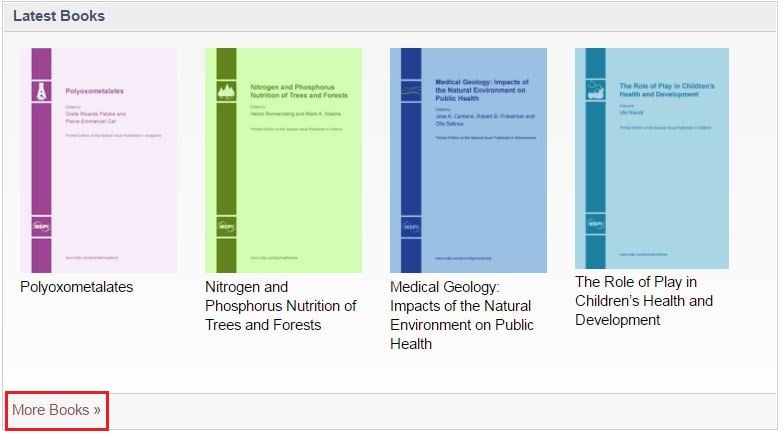
By clicking on the hyperlink "More Books" you will be taken to the MDPI Books Home Page. There you will find more information about the service, as well as the "Recent Publications" list.
Clicking on any of the book images in this list will take you to detailed information about that book (shown below). Here you can also download a PDF version of the book, or order a hardcover printed copy.
For further information about the MDPI Books service, please visit the webpage or contact [email protected].
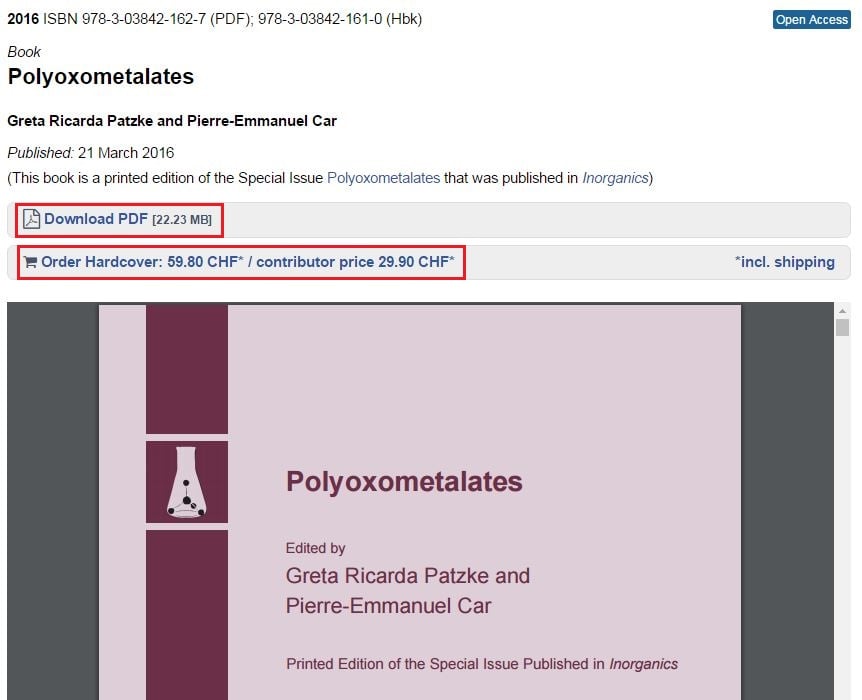
31 March 2016
Axioms, Behavioral Sciences, Photonics, Separations and Toxics added to the Emerging Sources Citation Index in Web of Science
We are pleased to announce that the journals Axioms, Behavioral Sciences, Photonics, Separations and Toxics were recently accepted for inclusion in the newly launched Emerging Sources Citation Index (ESCI) in Web of Science.
ESCI serves to highlight promising journals which are still under consideration for the Science Citation Index Expanded (SCIE) or the Social Sciences Citation Index (SSCI).
The Emerging Sources Citation Index (ESCI), Science Citation Index Expanded (SCIE), Social Sciences Citation Index
(SSCI), and Web of Science™ (WoS) are Thomson Reuters products.
30 March 2016
Institutional Membership established with the University of Winchester, UK, Silesian University of Technology, Poland and Beijing Jiaotong University and Zhejiang University, China
We are pleased to announce that the University of Winchester, UK, the Silesian University of Technology, Poland and Beijing Jiaotong University and Zhejiang University, China, have joined our Institutional Membership program. Primary authors from these universities will benefit from a 10% discount on article processing charges.
Additional details can be found on our institutional membership page.
24 March 2016
New Editorial Office in Barcelona, Spain
We are excited to announce the opening of our new editorial office in Barcelona, Spain. The launch team is led by a Senior Editor and comprises further staff holding doctoral degrees with several years of research experience. The new editorial team will help us to get closer to European research communities and progress Sciforum, the platform to support the scientific community via conference hosting and other functions. They will also help spread the word about Open Access and meet academics at scientific events.
We are in the process of hiring more doctoral and masters graduates to join the editorial team and welcome applications via [email protected]. For contact details about the office, see our contact page.

22 February 2016
Membership Established with the Max Planck Society
We are pleased to announce that the Max Planck Digital Library (MPDL) has signed an agreement with MDPI to support authors associated with the Max Planck Society (Max-Planck-Gesellschaft). As of 22 February 2016, corresponding authors will receive full funding from the MPDL for articles published in MDPI journals, with a 10% discount applied to the Article Processing Charges. Additional details can be found at our institutional membership page.
Founded in 1948, The Max Planck Society is one of Germany’s leading research organizations, and is currently made up of 83 institutes conducting basic research in natural sciences, life sciences, social sciences and humanities. 18 Nobel laureates have emerged from its ranks of scientists and the society has more than 15,000 publications in scientific journals each year.
5 February 2016
Institutional Membership Extension: Wageningen University, CSIC, University of Zürich, ETH Zürich, University of Tübingen and Osnabrück University
We are pleased to announce that Wageningen University, the Netherlands, the Spanish National Research Council (CSIC), Spain, the University of Zürich and ETH Zürich, Switzerland, and the University of Tübingen and Osnabrück University, Germany, have not only renewed their institutional memberships with MDPI after two years of successful cooperation, but have also increased the reduction of the article processing charges (APCs) for affiliated authors to 25%.
Additional details can be found on our institutional membership page.
5 February 2016
Institutional Membership established with Brock University, Canada and the University of Pisa, Italy
We are pleased to announce that Brock University, Cananda, and the University of Pisa, Italy, have joined MDPI's institutional membership program: Primary authors from these universities will benefit from a 10% discount on the article processing charges as of 01 February 2016.
Additional details can be found on our institutional membership page.
25 January 2016
MDPI Sponsors diss:kurs with the University of Basel
MDPI is pleased to announce its newly established sponsorship of diss:kurs, an event coordinated by the University of Basel to support their doctorate program. For more information about the event and how to register, please visit the diss:kurs webpage.
7 January 2016
New Institutional Memberships Established with Tsinghua University, the Chinese Society of Micro-Nano Technology, Ruhr University Bochum and the University of Ulm
We are pleased to announce that the following institutions have joined MDPI's institutional membership program as of 1 January 2016:
- Tsinghua University, China
- Chinese Society of Micro-Nano Technology (CSMNT)
- Ruhr University Bochum, Germany
- University of Ulm, Germany
Authors affiliated with these institutions will benefit from a 10% discount on the article processing charges.
Additional details can be found on our institutional membership page.
5 January 2016
Safety, Fermentation, C-Journal of Carbon Research, Magnetochemistry, Batteries and Horticulturae Released Their First Issue in December 2015
We are pleased to announce that MDPI's open access journals Safety, Journal of Imaging, Fermentation, C-Journal of Carbon Research, Magnetochemistry, Batteries and Horticulturae released their first issue at the end of December 2015.
17 December 2015
Institutional Membership Extension: University of Bern, Switzerland
We are pleased to announce that the University of Bern, Switzerland has not only renewed their institutional membership with MDPI after two years of successful cooperation, but also increased the reduction of the article processing charges (APCs) for affiliated authors to 25%.
17 December 2015
Institutional Membership with the University of Ulm and Helmholtz Zentrum Munich
We are pleased to announce that University of Ulm, Germany and Helmholtz Zentrum Munich, Germany has joined MDPI's institutional membership program:
Primary authors from the University of Ulm and Helmholtz Zentrum Munich will benefit from a 10% discount on the article processing charges as of 1 January 2016. Additional details can be found on our institutional membership page.
9 December 2015
Membership Established with the Virginia Polytechnic Institute and State University (Virginia Tech)
We are pleased to announce that Virginia Tech has joined MDPI's institutional membership program. Authors from Virginia Tech will benefit from a 10% discount on the article processing charges as of 1 December 2015. Additional details can be found on our institutional membership page.
1 December 2015
Membership Established with the Technical University of Denmark and the University of North Florida
We are pleased to announce that the following universities have joined MDPI's institutional membership program:
- Technical University of Denmark (as of 1 November 2015)
- University of North Florida, USA (as of 15 November 2015)
Primary authors from the Technical University of Denmark and the University of North Florida will benefit from a 10% discount on the article processing charges.
Additional details can be found on our institutional membership page.
16 November 2015
Emerging Sources Citation Index (ESCI) Launched in Web of Science™
The Emerging Sources Citation Index (ESCI) has been launched by Thomson Reuters as a new index in Web of Science™ alongside the established Science Citation Index Expanded (SCIE) and Social Sciences Citation Index (SSCI). Web of Science™ thereby continues to reflect the growing importance of Open Access scholarly literature as nearly half of the newly incorporated journals are Open Access journals.
We are pleased to announce that 32 journals published by MDPI were selected for inclusion in the Emerging Sources Citation Index (ESCI). Articles published after 1 January 2015 now appear in ESCI and Web of Science™. This will bring higher visibility to the published research, while they will continue to be under evaluation for SCIE or SSCI.
The following MDPI journals are covered by ESCI:
| Journal Title |
Established | About the Journal |
| Algorithms | 2008 | Link |
| Agriculture | 2011 | Link |
| Agronomy | 2011 | Link |
| Biomolecules | 2011 | Link |
| Brain Sciences | 2011 | Link |
| Diagnostics | 2011 | Link |
| Membranes | 2011 | Link |
| Metabolites | 2011 | Link |
| Antibiotics | 2012 | Link |
| Antibodies | 2012 | Link |
| Antioxidants | 2012 | Link |
| Arts | 2012 | Link |
| Computers | 2012 | Link |
| Electronics | 2012 | Link |
| Foods | 2012 | Link |
| Journal of Clinical Medicine | 2012 | Link |
| Pathogens | 2012 | Link |
| Plants | 2012 | Link |
| Atoms | 2013 | Link |
| Chemosensors | 2013 | Link |
| Climate | 2013 | Link |
| Computation | 2013 | Link |
| Economies | 2013 | Link |
| Fibers | 2013 | Link |
| International Journal of Financial Studies | 2013 | Link |
| Journal of Developmental Biology | 2013 | Link |
| Mathematics | 2013 | Link |
| Processes | 2013 | Link |
| Publications | 2013 | Link |
| Risks | 2013 | Link |
| Systems | 2013 | Link |
| Vaccines | 2013 | Link |
The Emerging Sources Citation Index (ESCI), Science Citation Index Expanded (SCIE), Social Sciences Citation Index (SSCI), and Web of Science™ (WoS) are Thomson Reuters products.
2 October 2015
Membership Established with the University of Freiburg and the University of Regensburg
We are pleased to announce that the following universities have joined MDPI's institutional membership program:
University of Freiburg, Germany
University of Regensburg, Germany
Primary authors from the University of Freiburg and the University of Regensburg will benefit from a 10% discount on the article processing charges as of 1 October 2015 and 1 November 2015.
Additional details can be found on our institutional membership page.
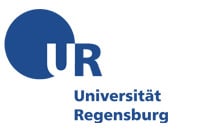
10 August 2015
Electronics (ISSN 2079-9292) Accepted for Coverage in Scopus
We are pleased to announce that the journal Electronics (ISSN 2079-9292) was recently selected to be included in Scopus. Citations are expected to be available in Scopus soon.
Scopus is the largest abstract and citation database of peer-reviewed literature and is published by Elsevier B.V. This means that the research you publish with Electronics will be more visible than ever. Electronics is an international, peer-reviewed, open access journal on the science of electronics and its applications.
6 February 2013
Electronics (ISSN 2079-9292) Covered by Chemical Abstracts (CAS)
We are pleased to announce that Electronics (ISSN 2079-9292) was recently selected to be included in the Chemical Abstracts Service (CAS). Electronics will therefore be available through SciFinder®.
5 February 2013
Electronics (ISSN 2079-9292) Covered by INSPEC
We are pleased to announce that Electronics (ISSN 2079-9292) was recently selected to be included in INSPEC, a major indexing database of scientific and technical literature, published by the Institution of Engineering and Technology (IET). It will be covered starting from the March 2013 issue onwards.





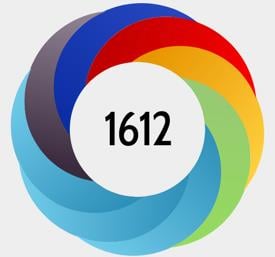
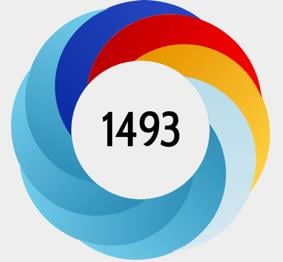
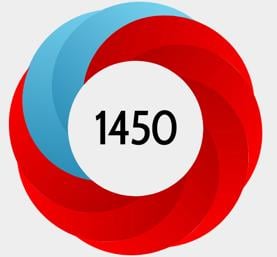
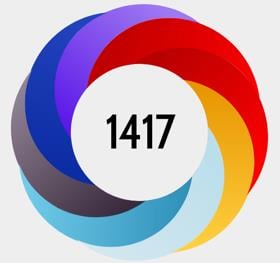
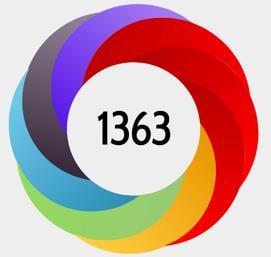
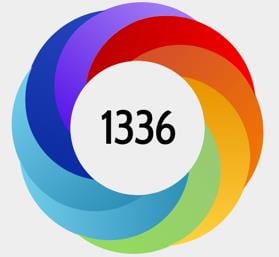
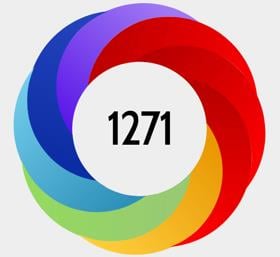
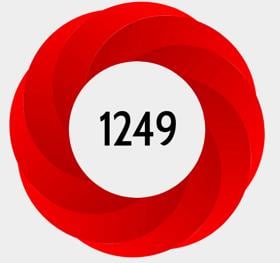































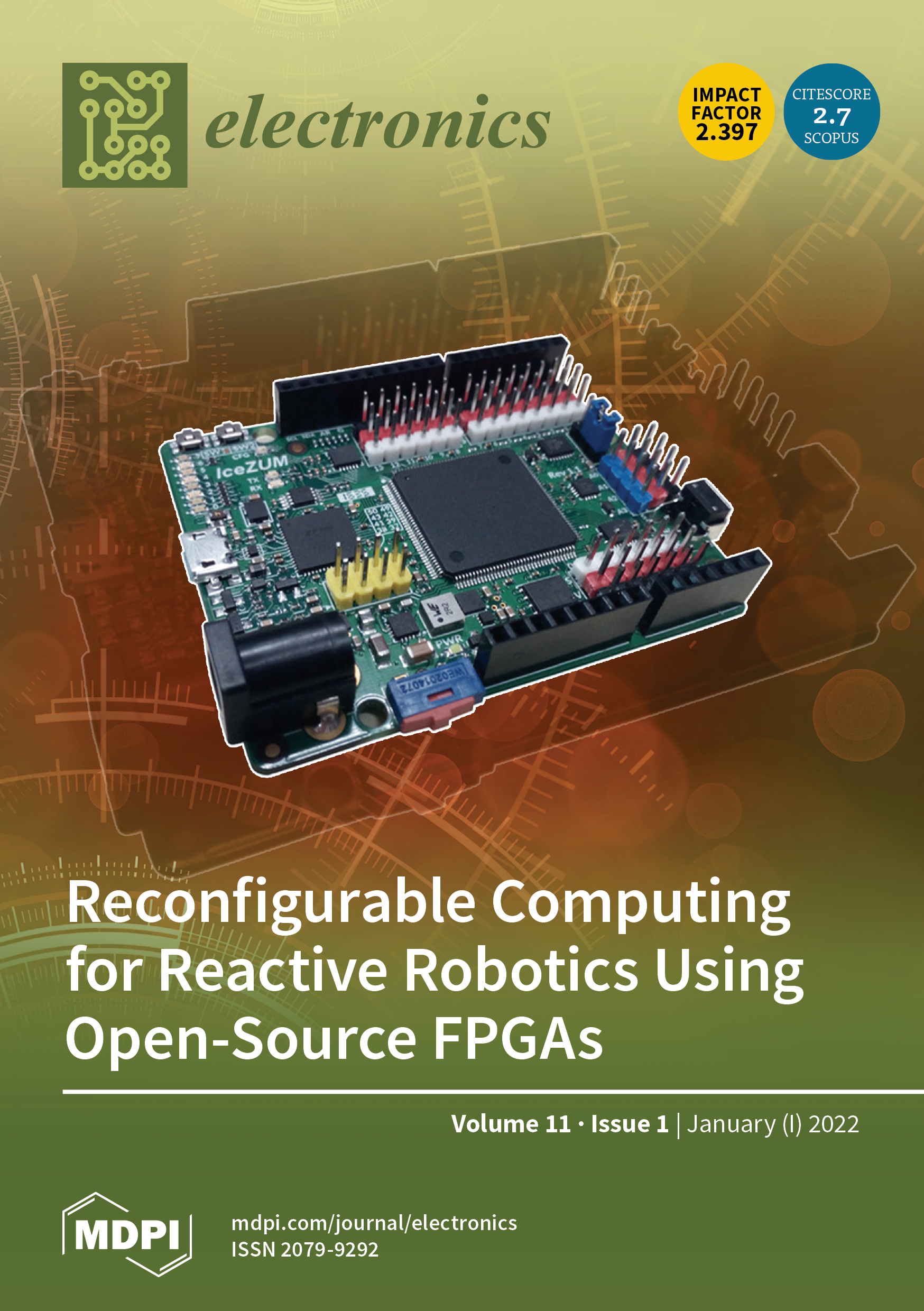
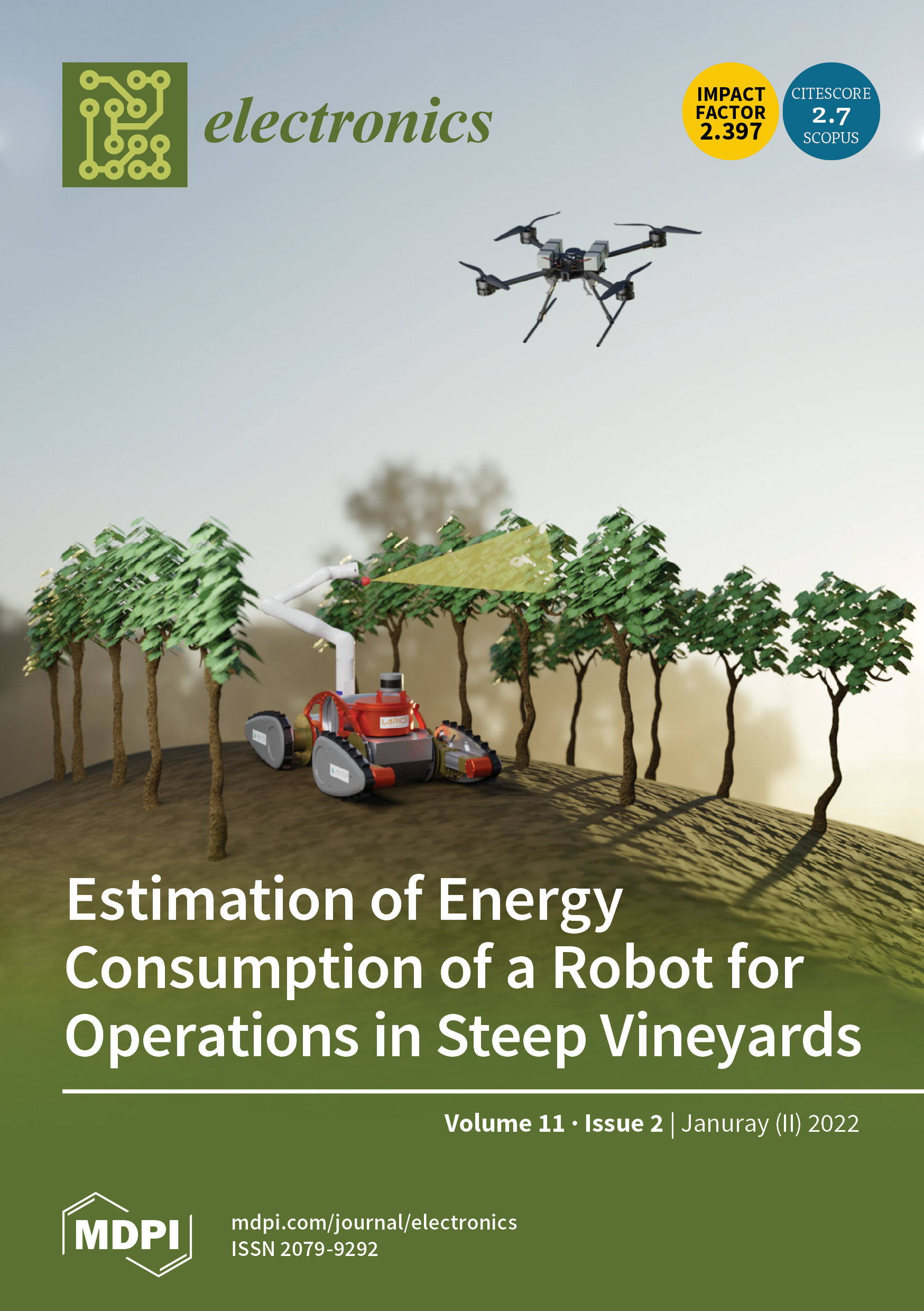
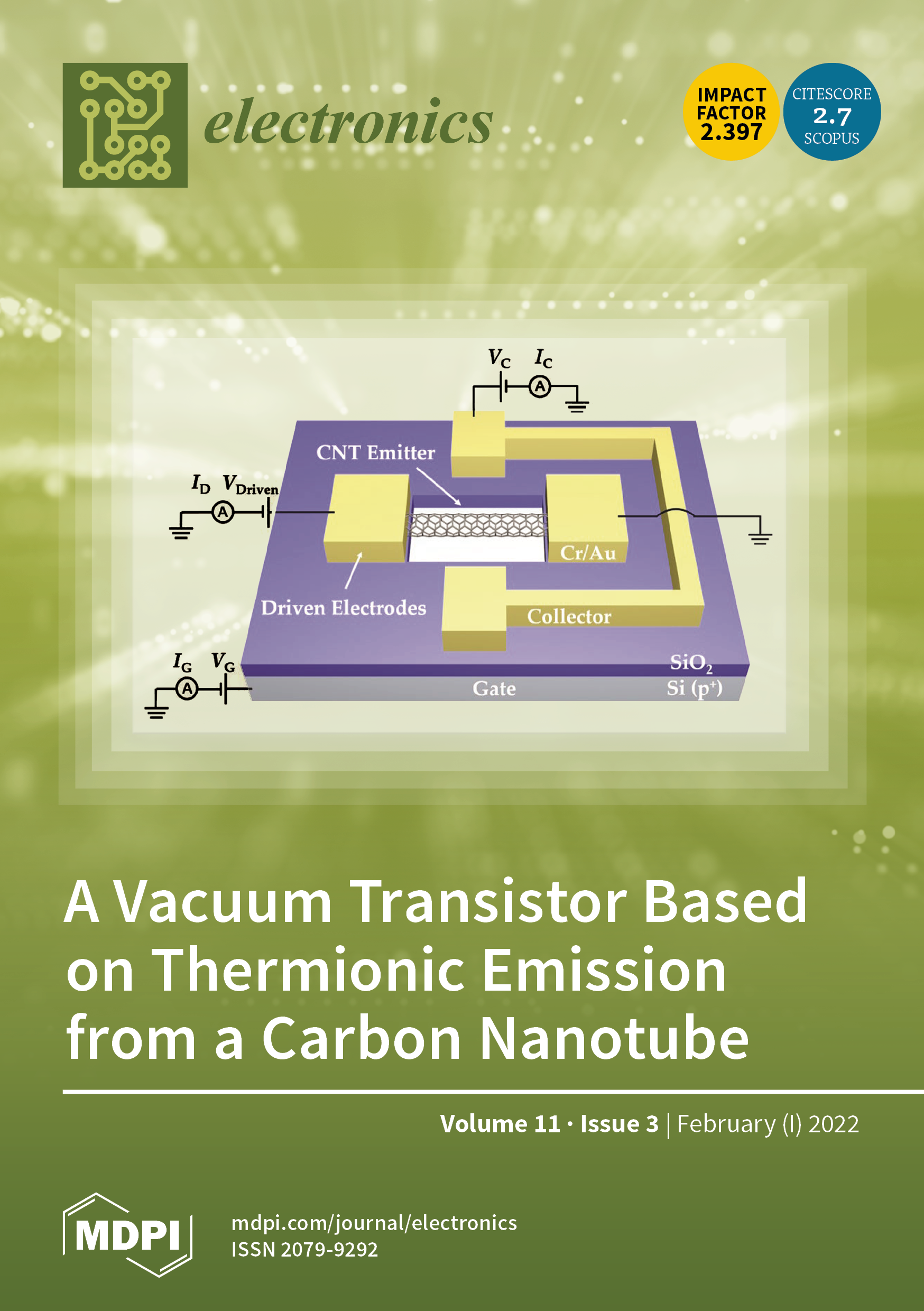
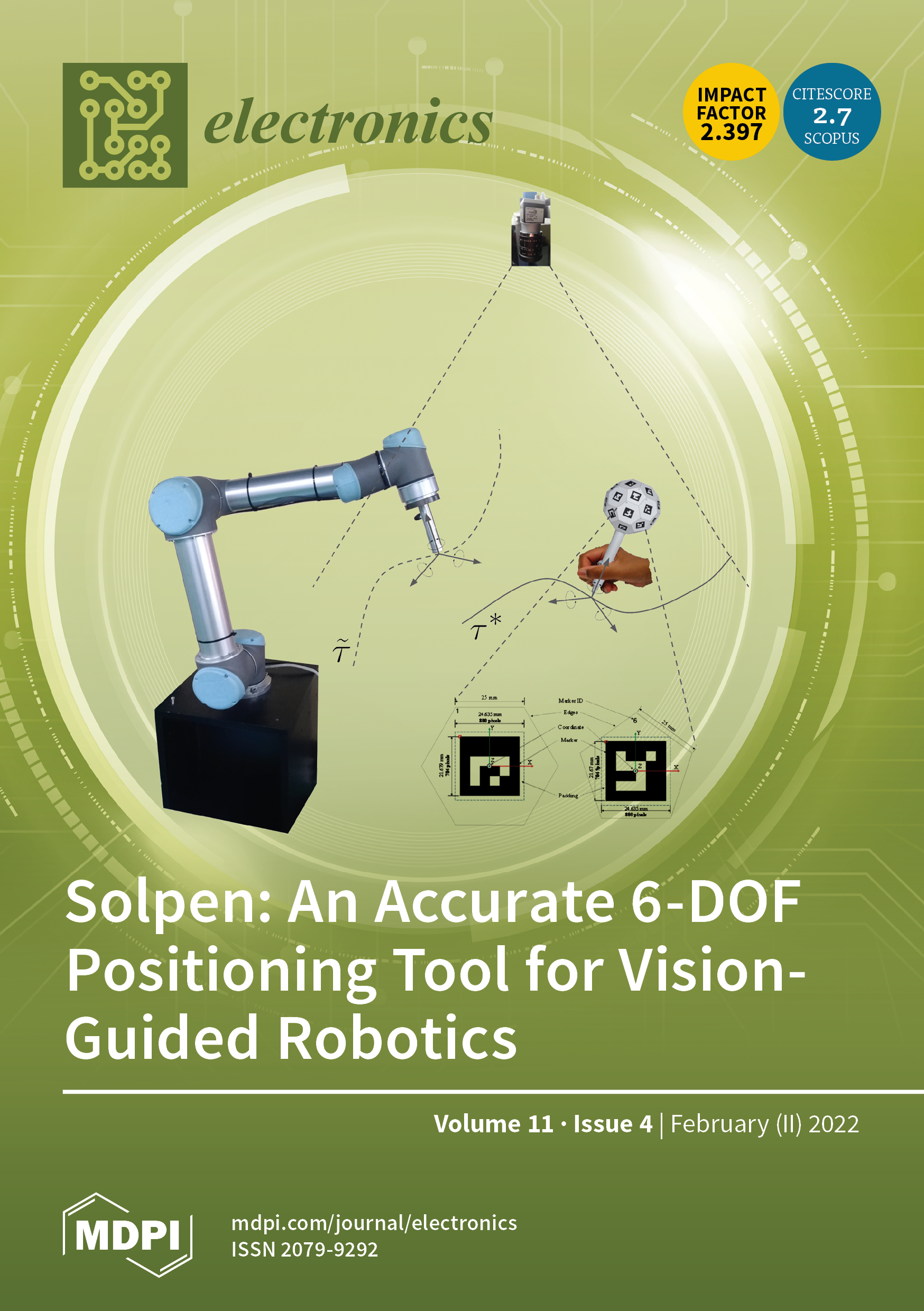
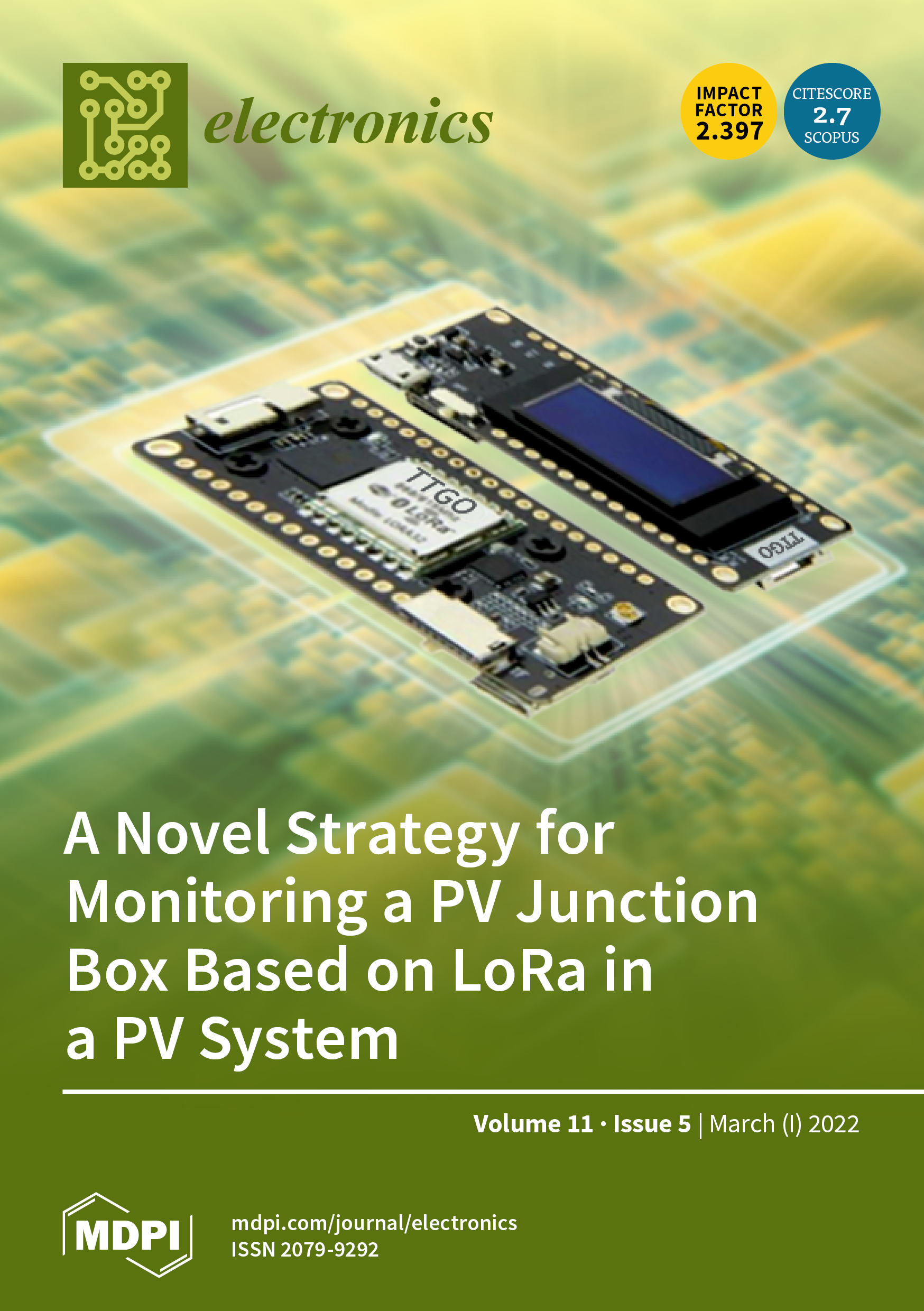
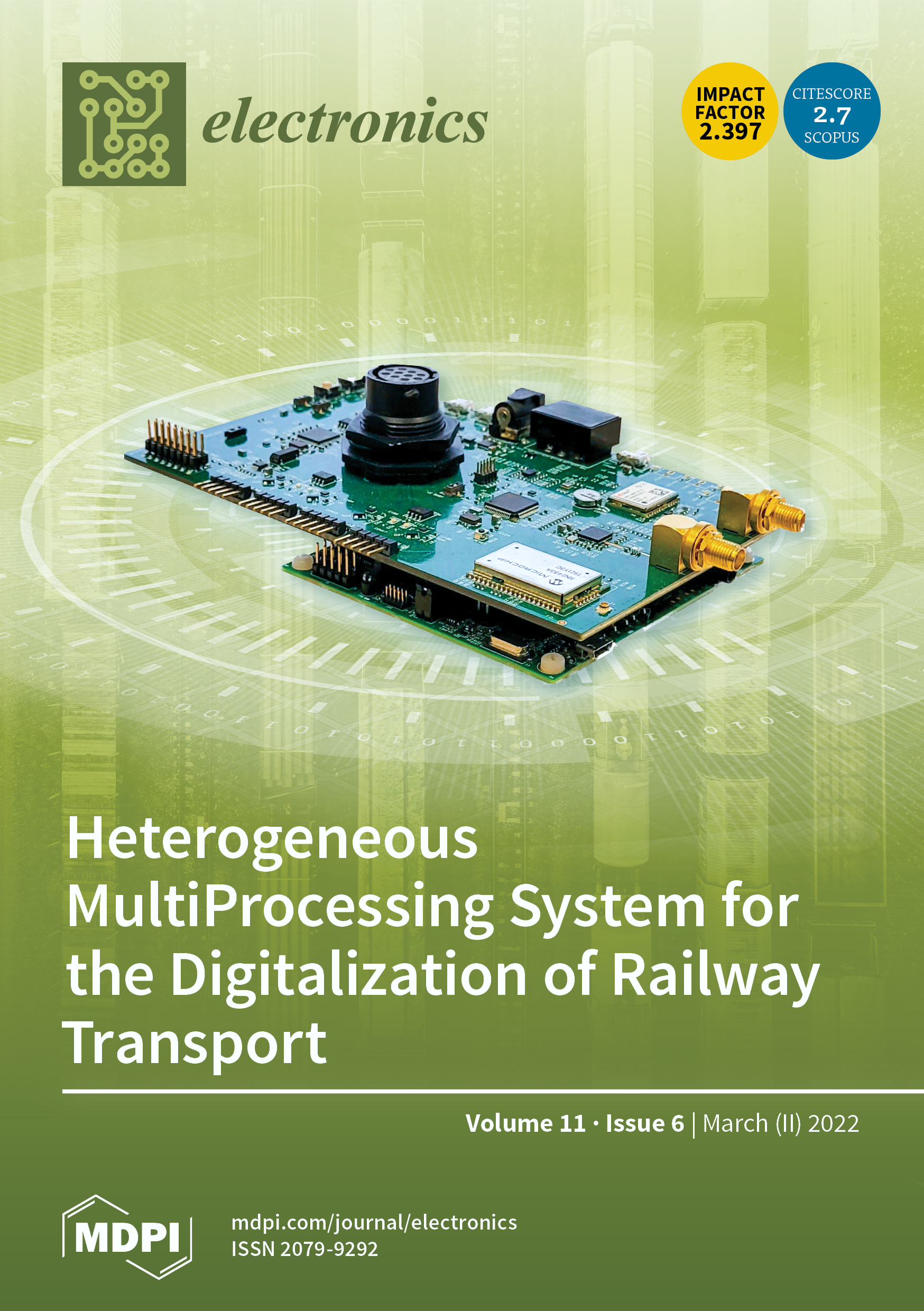
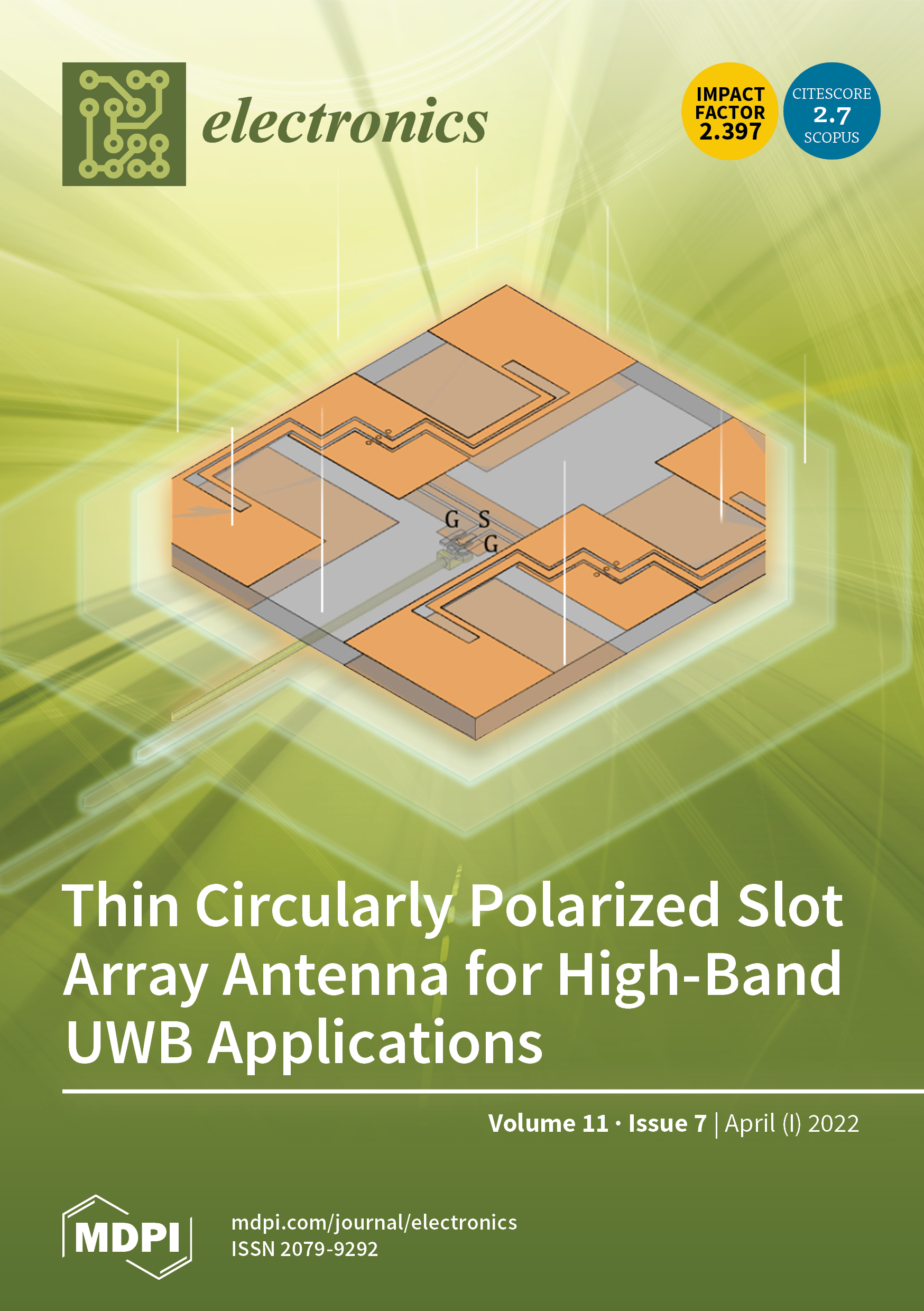
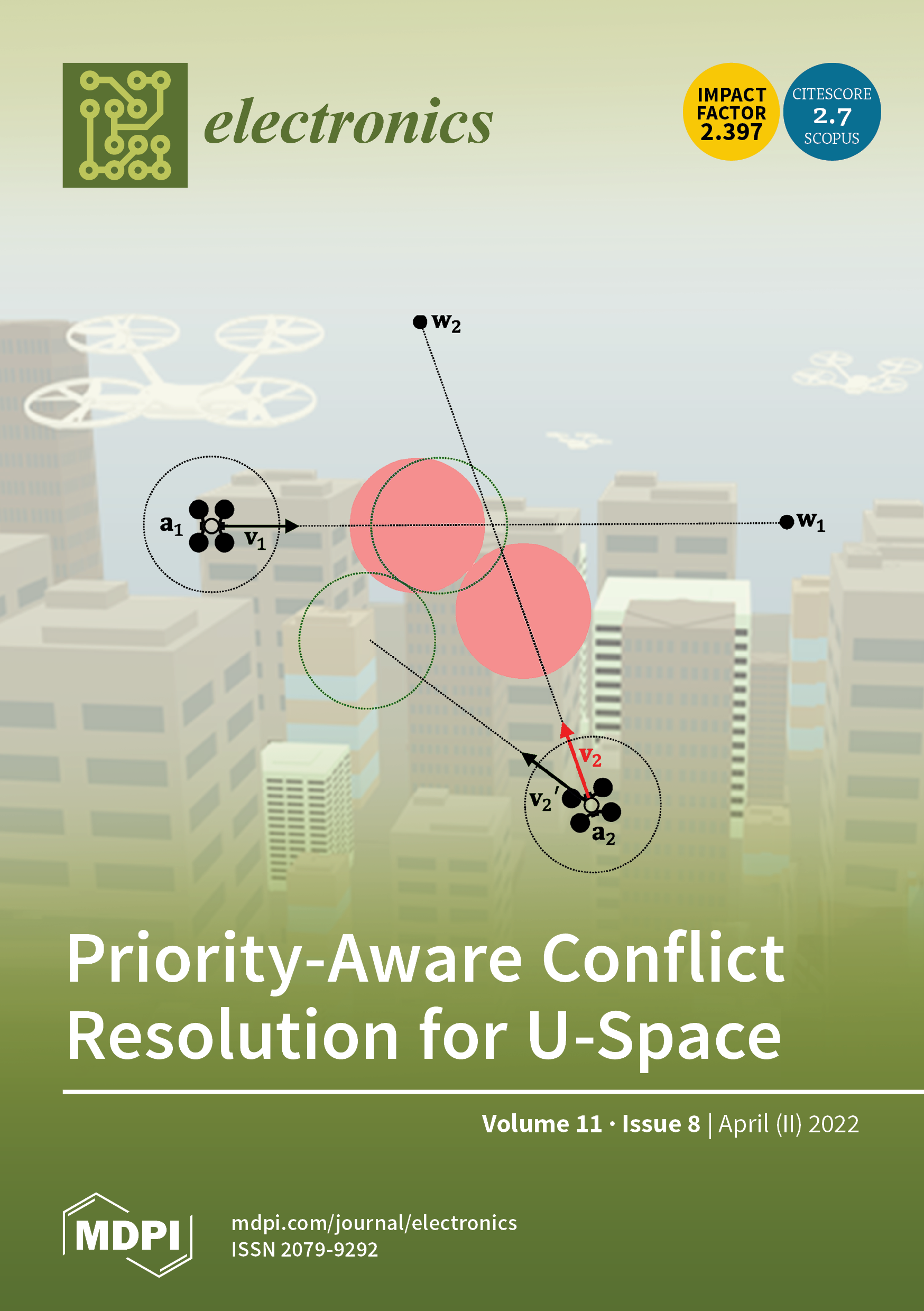
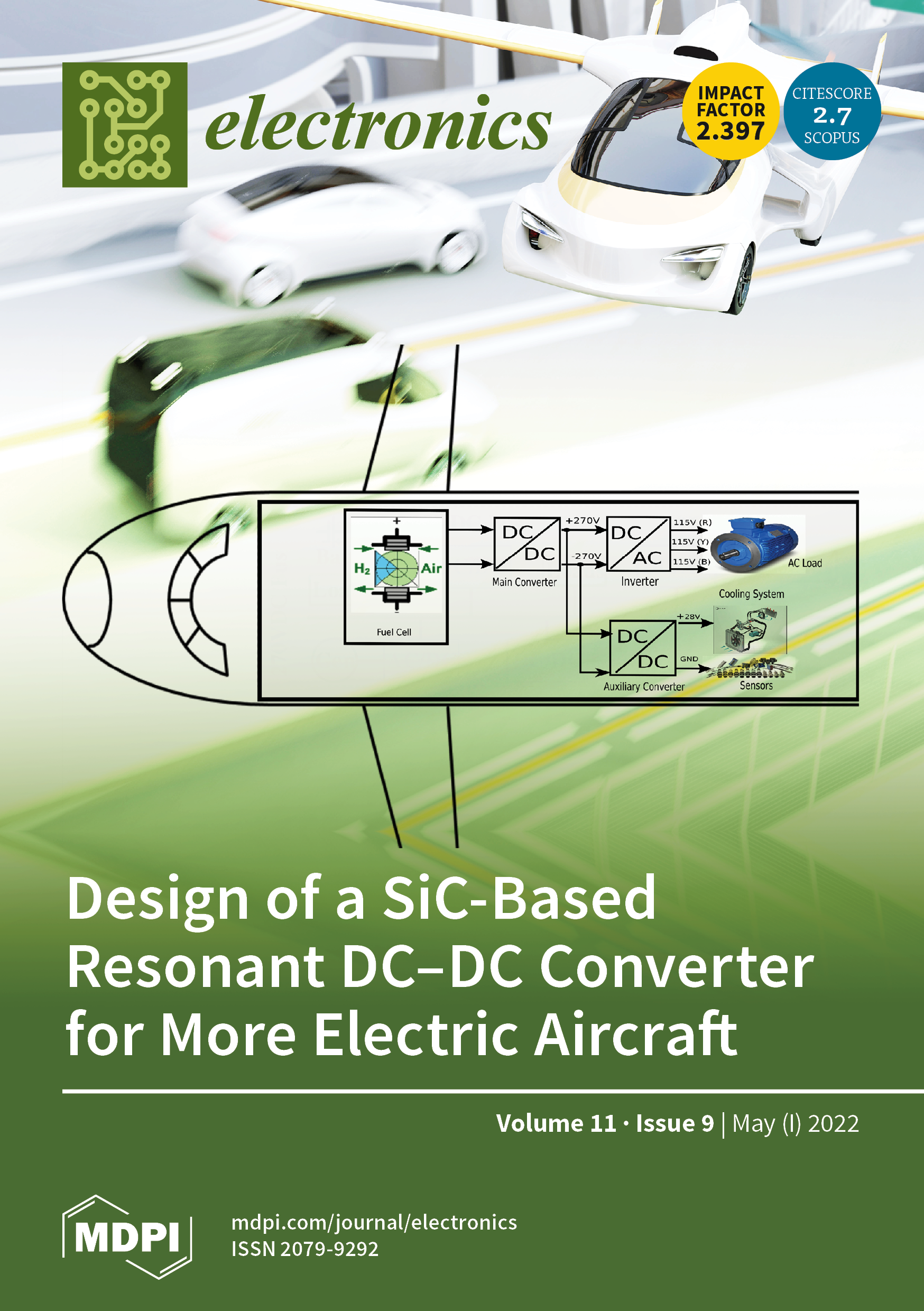
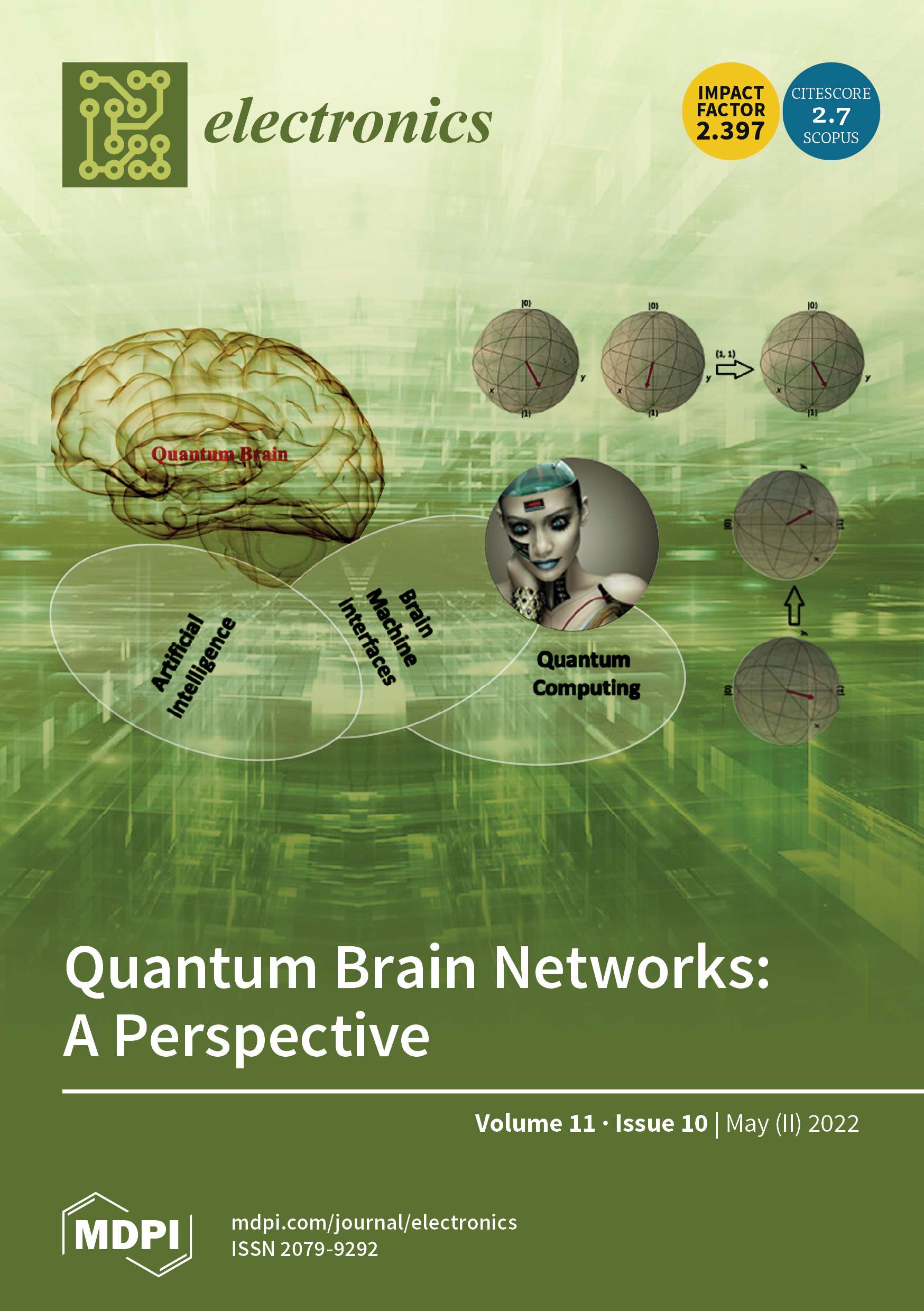
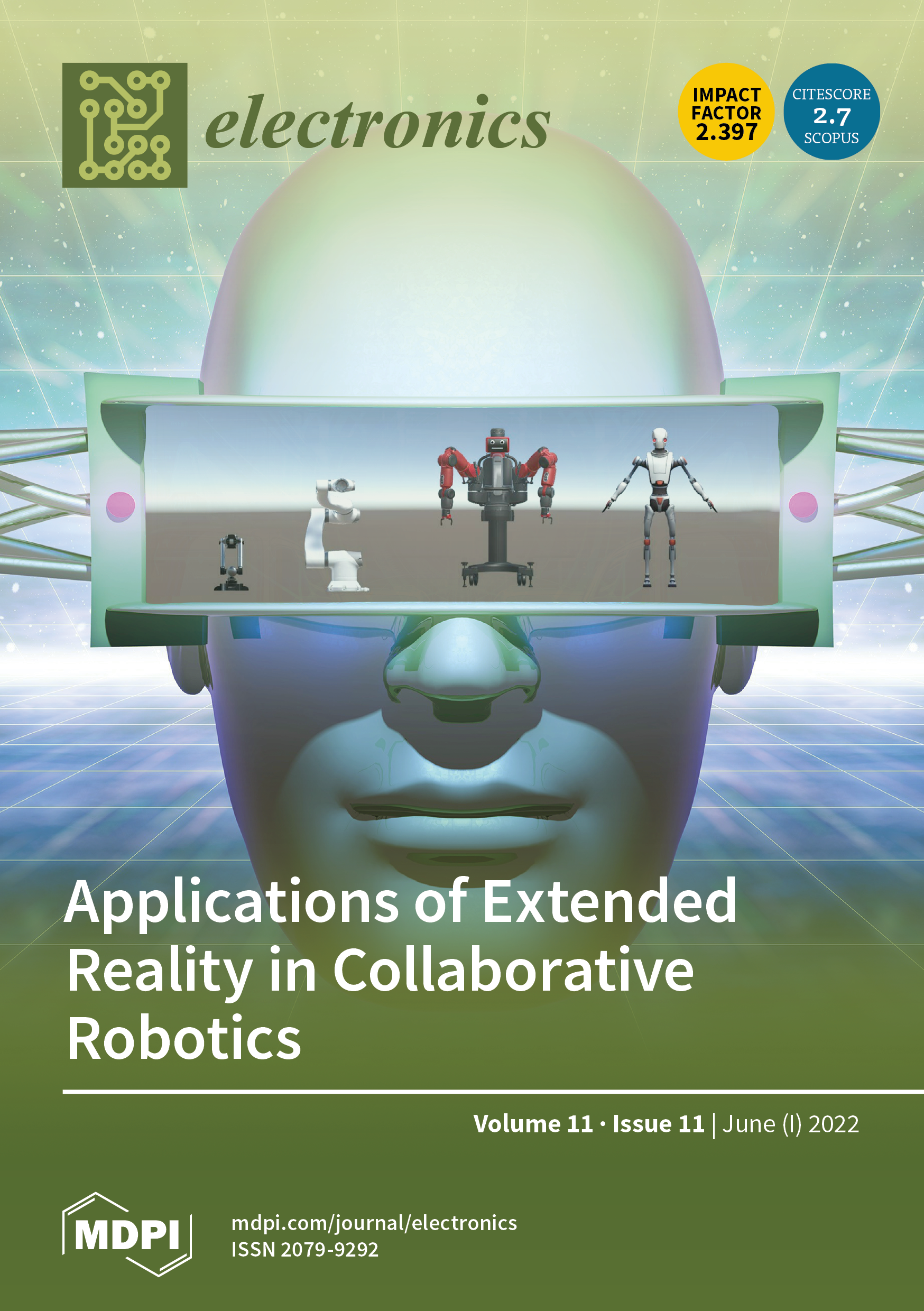
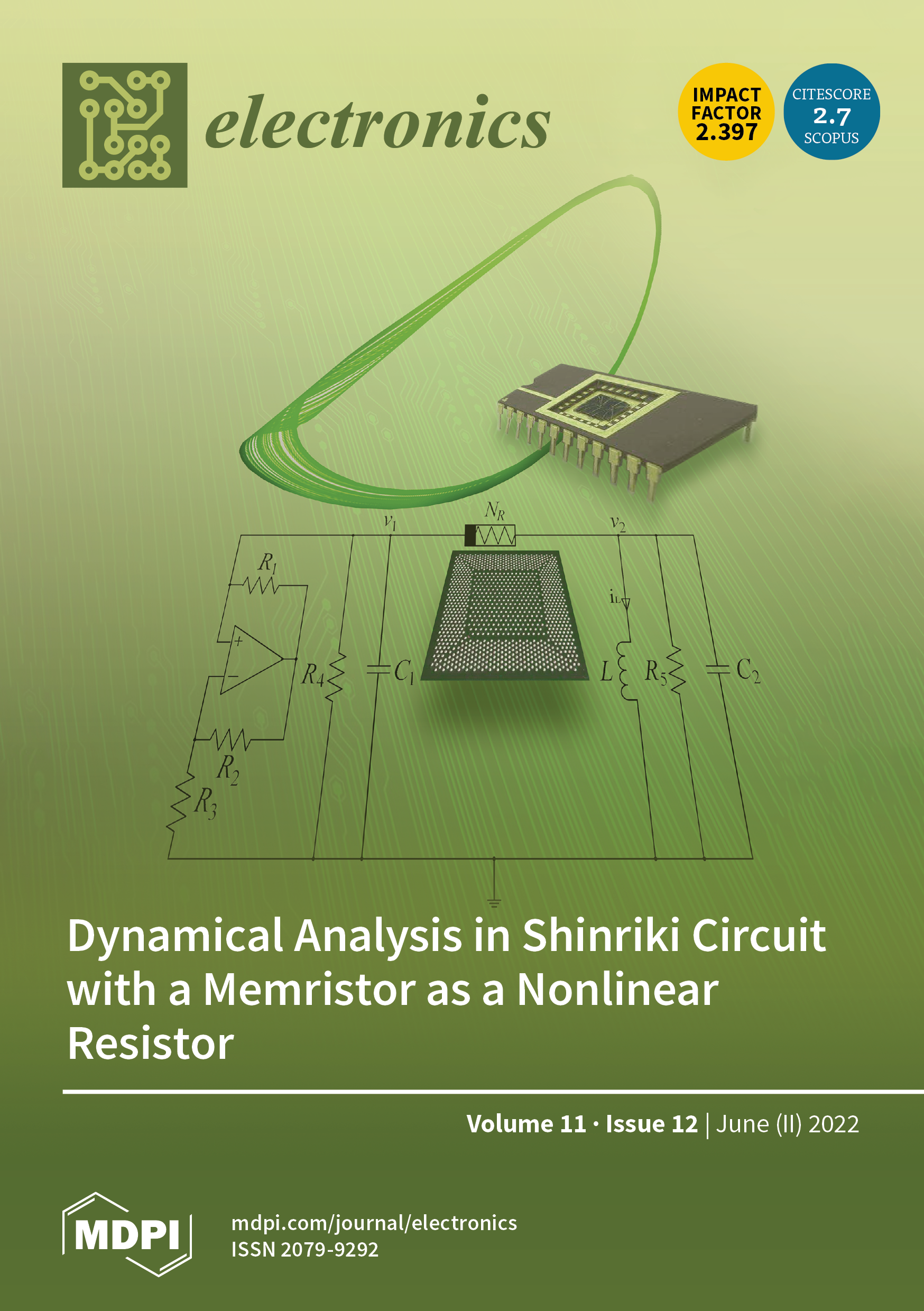
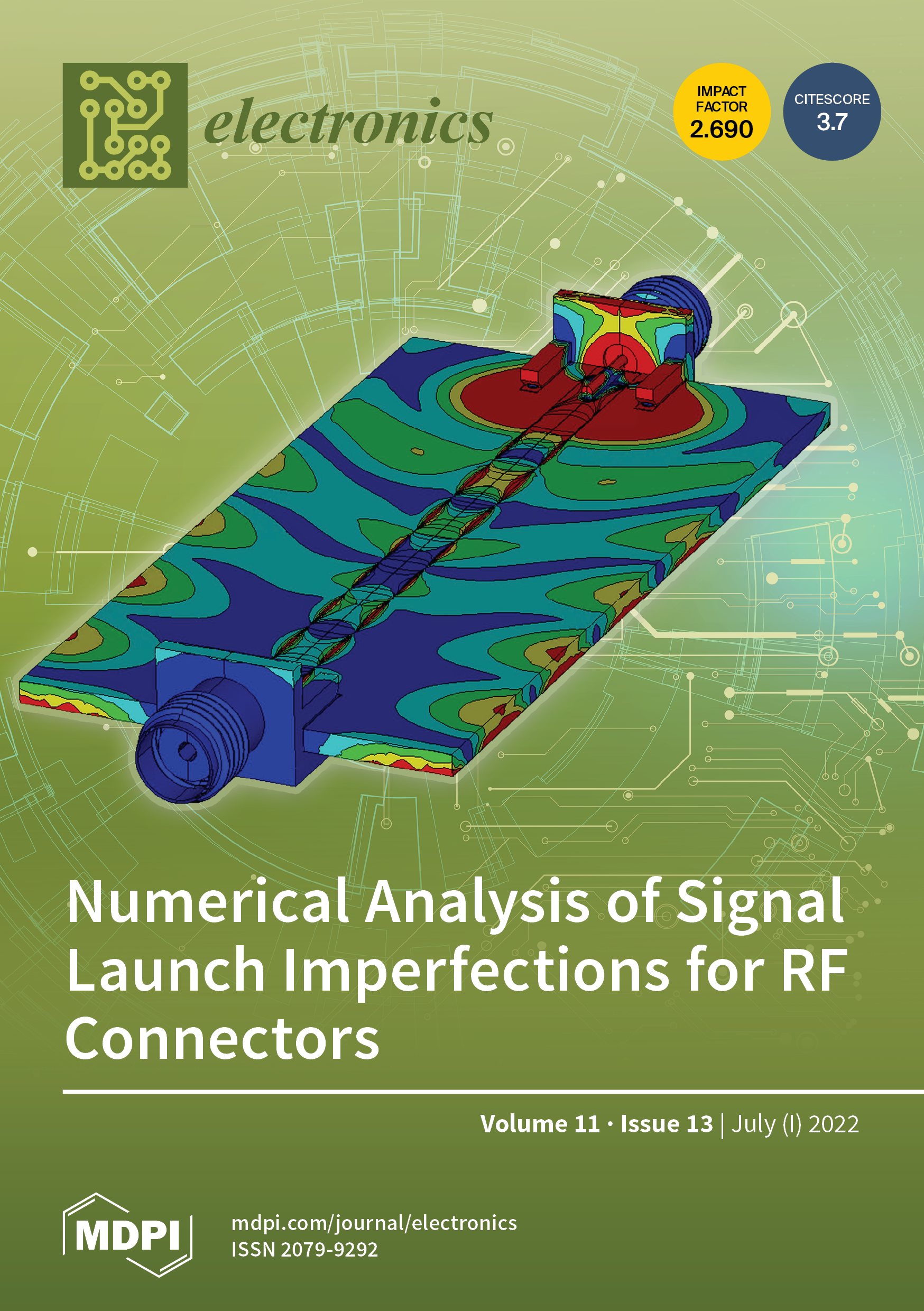
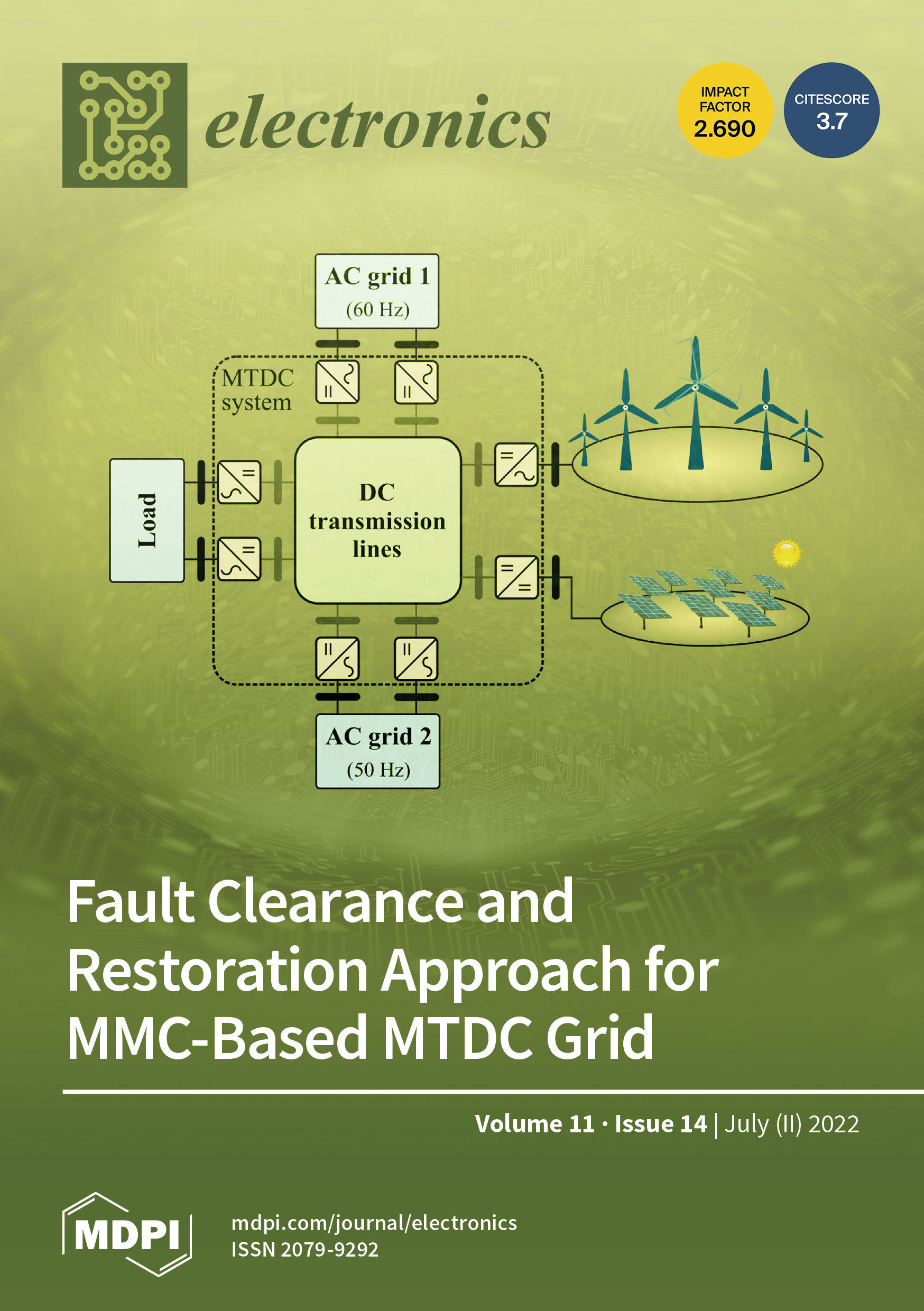
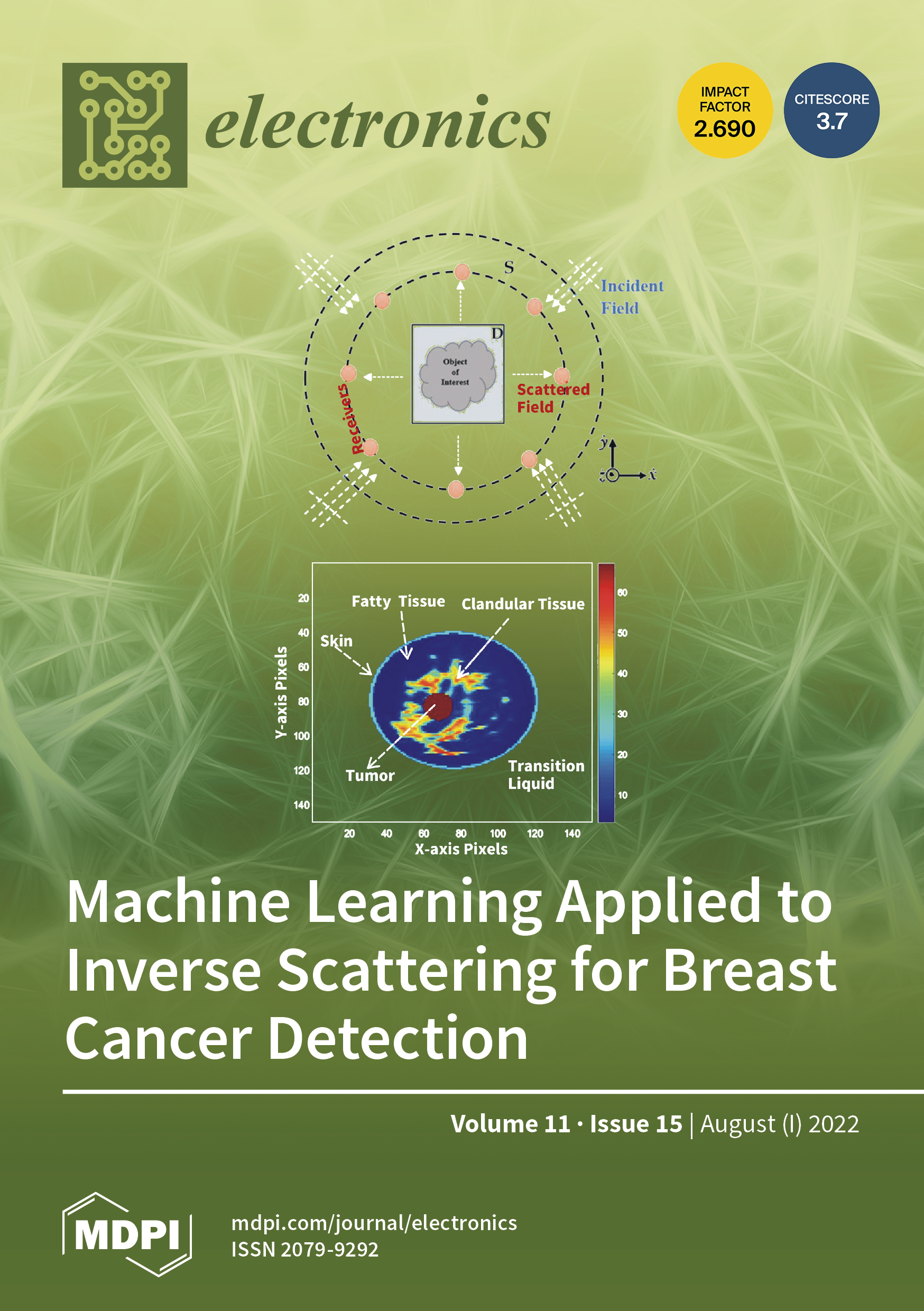
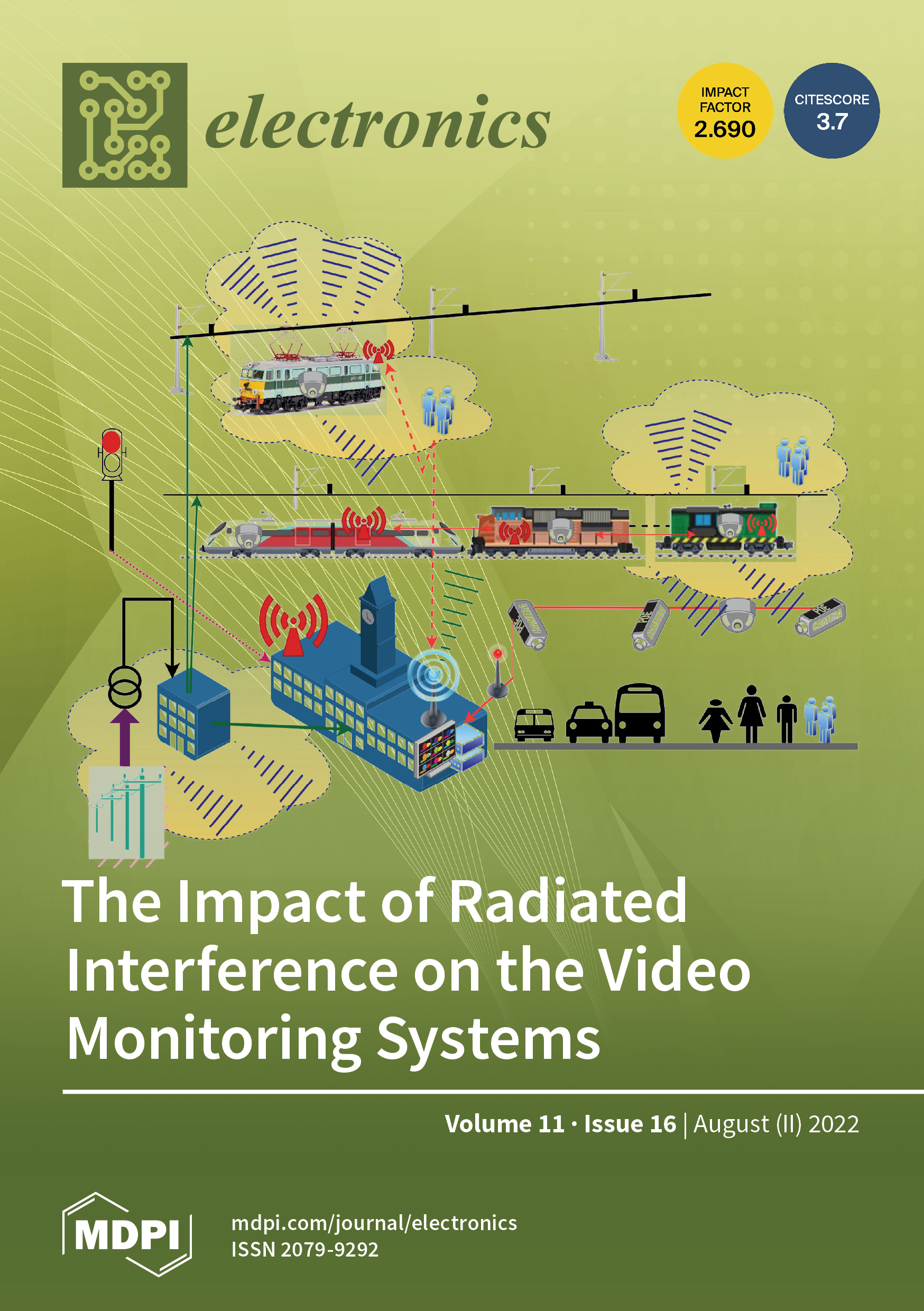
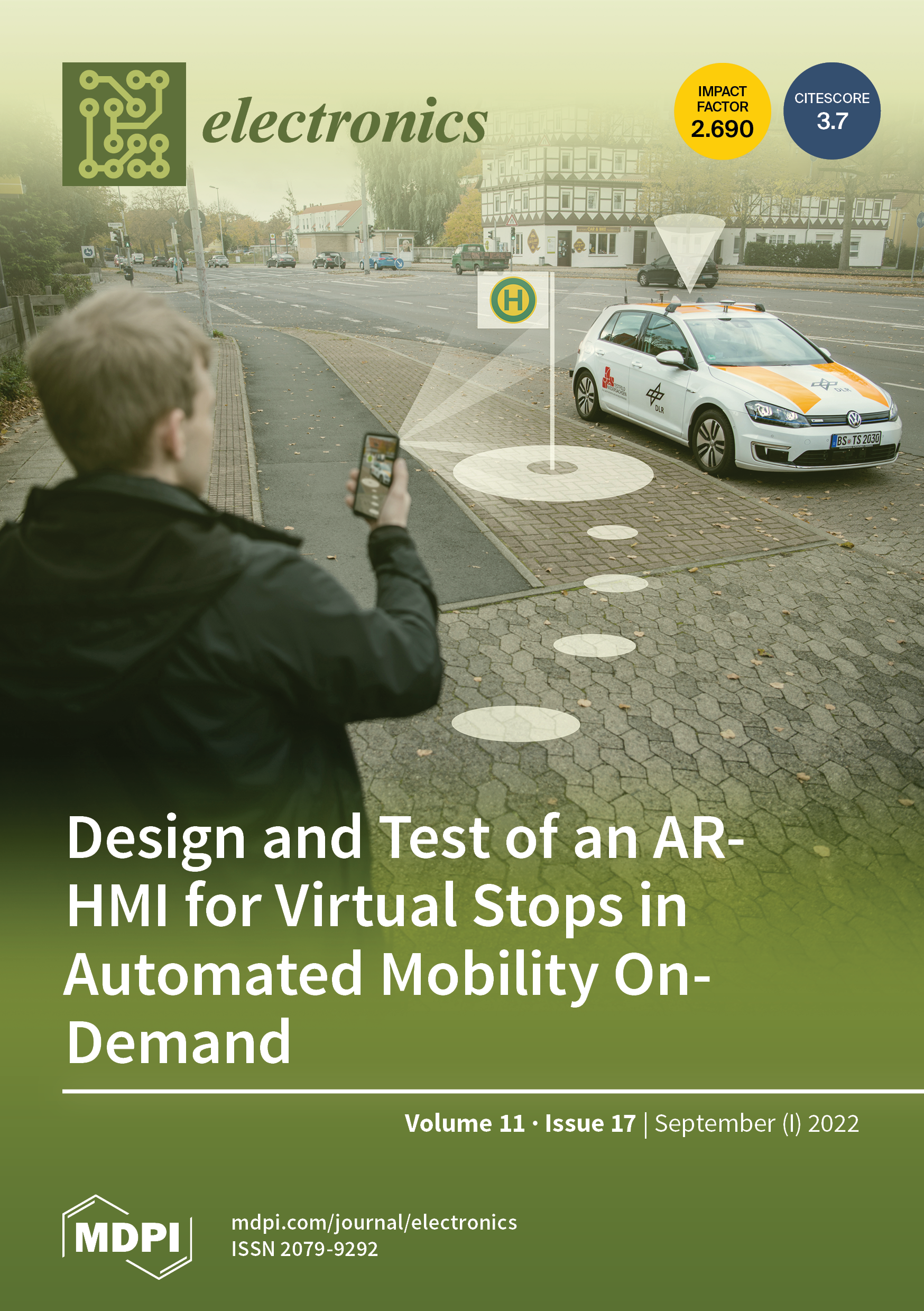
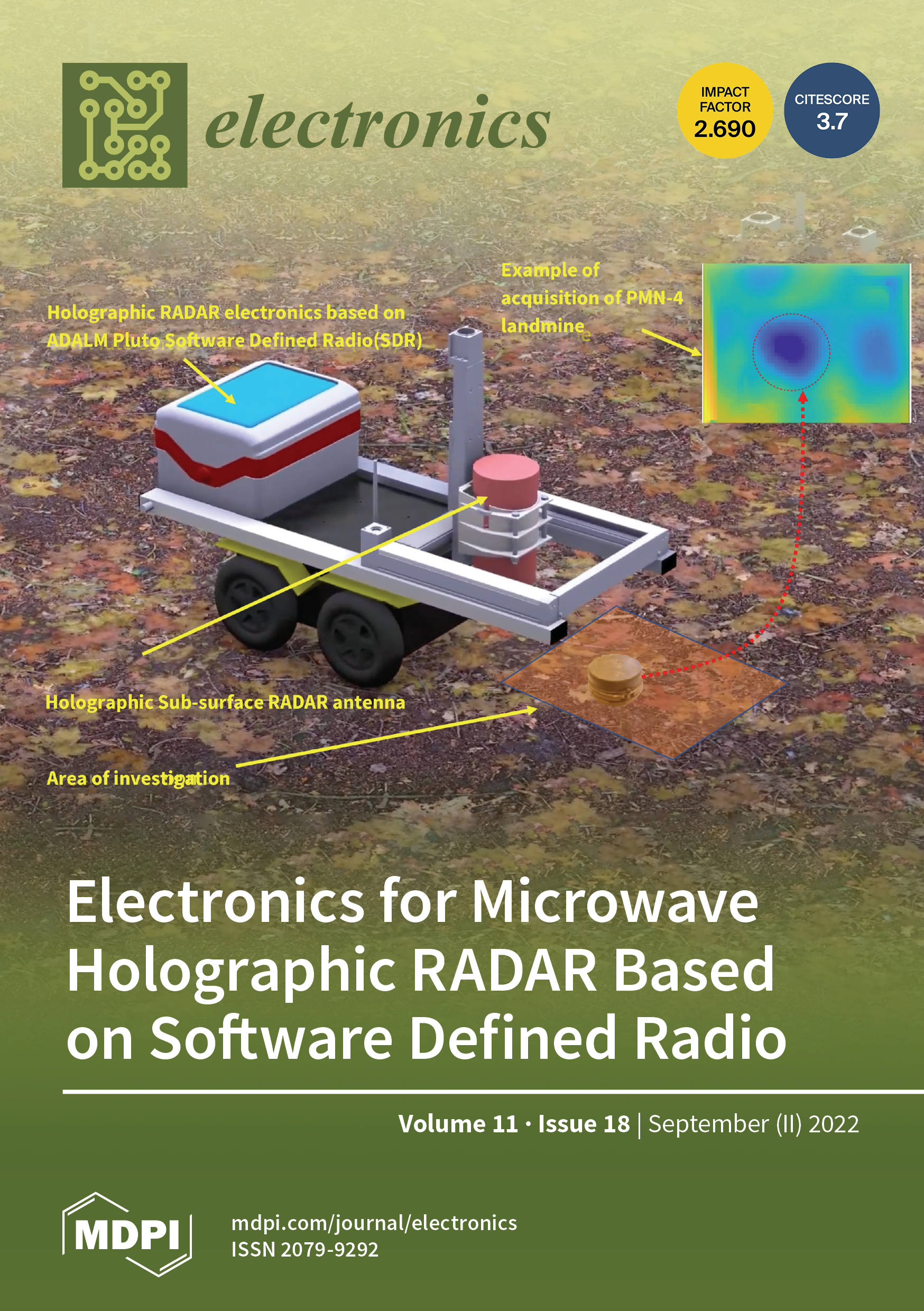
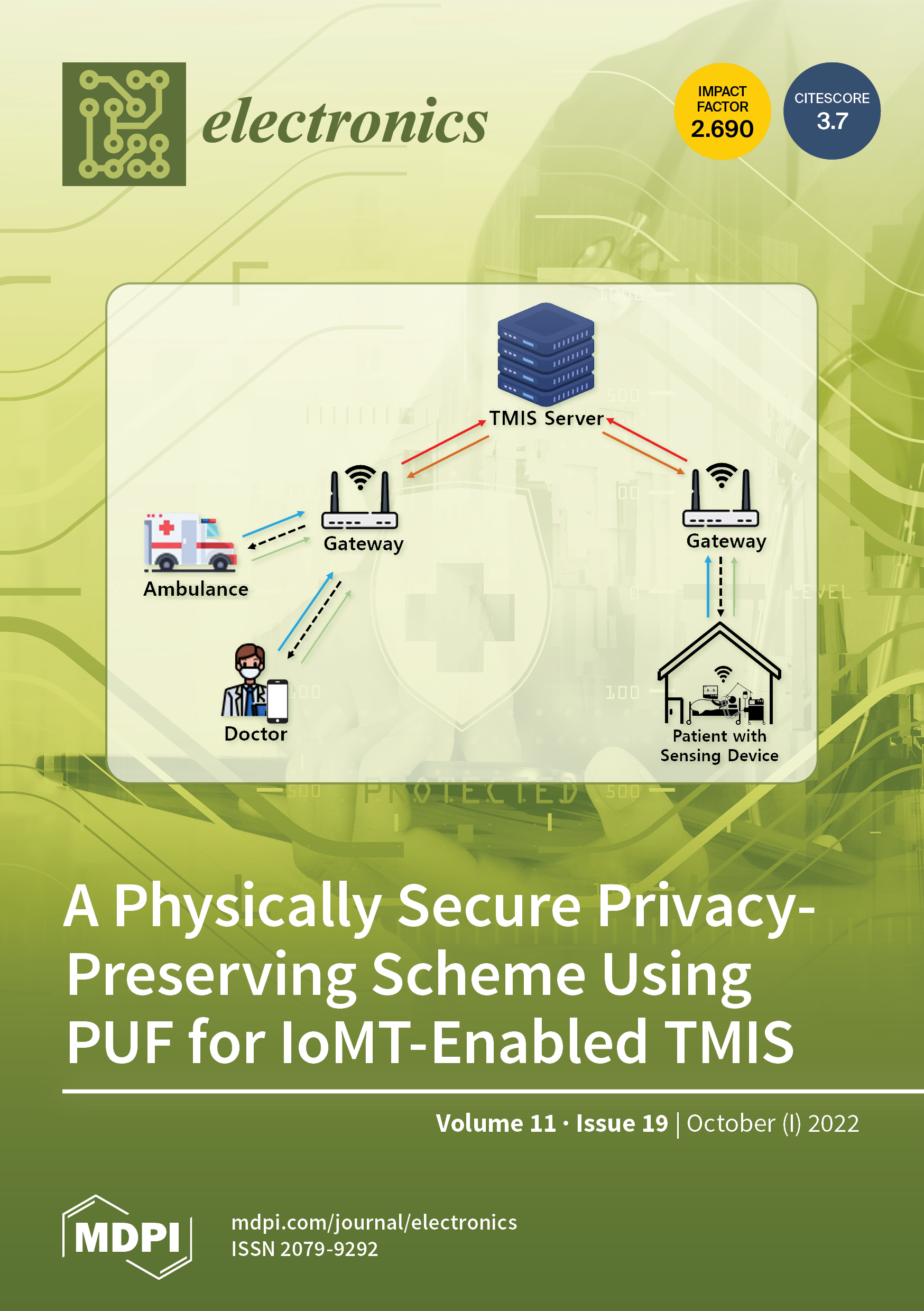
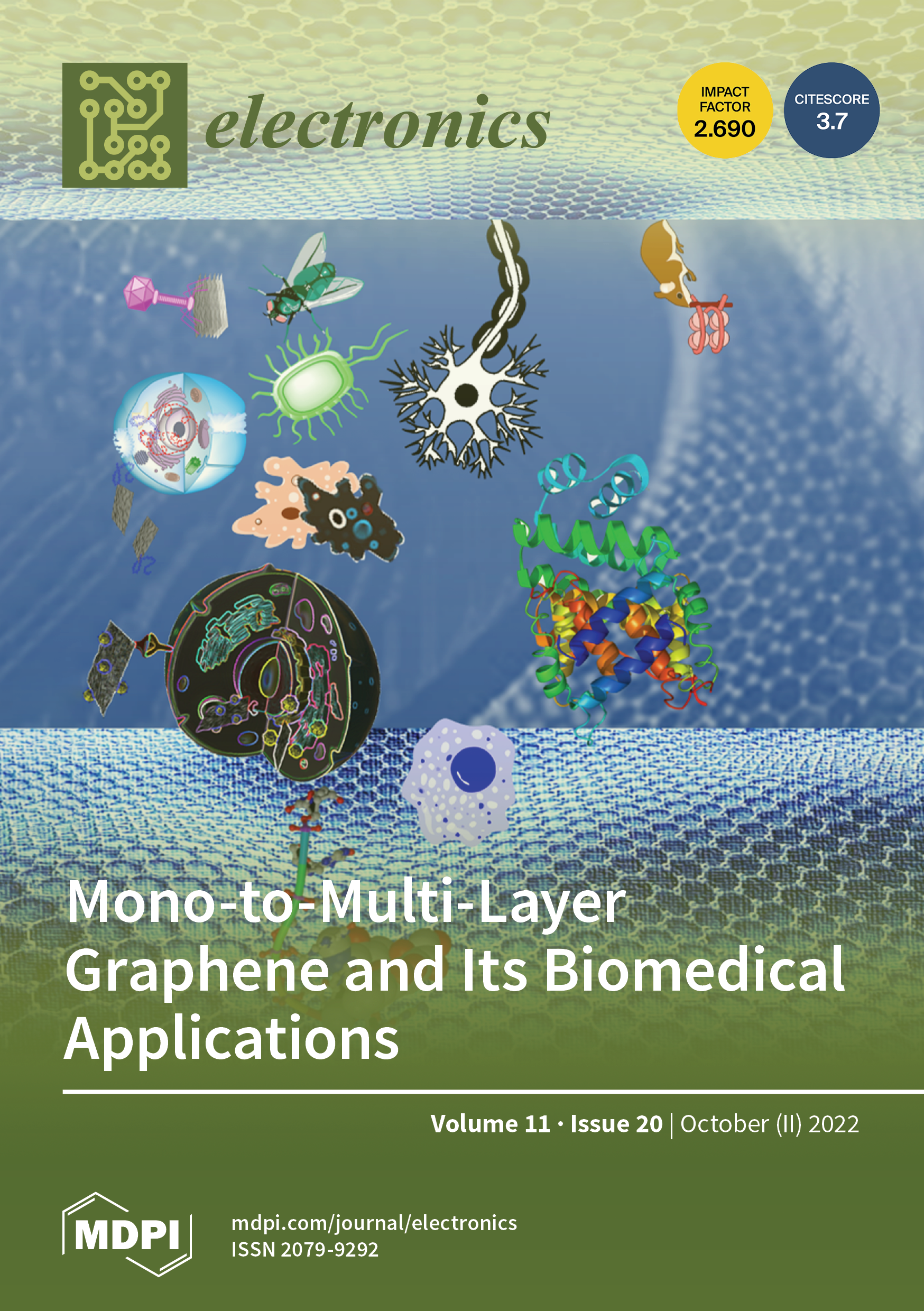
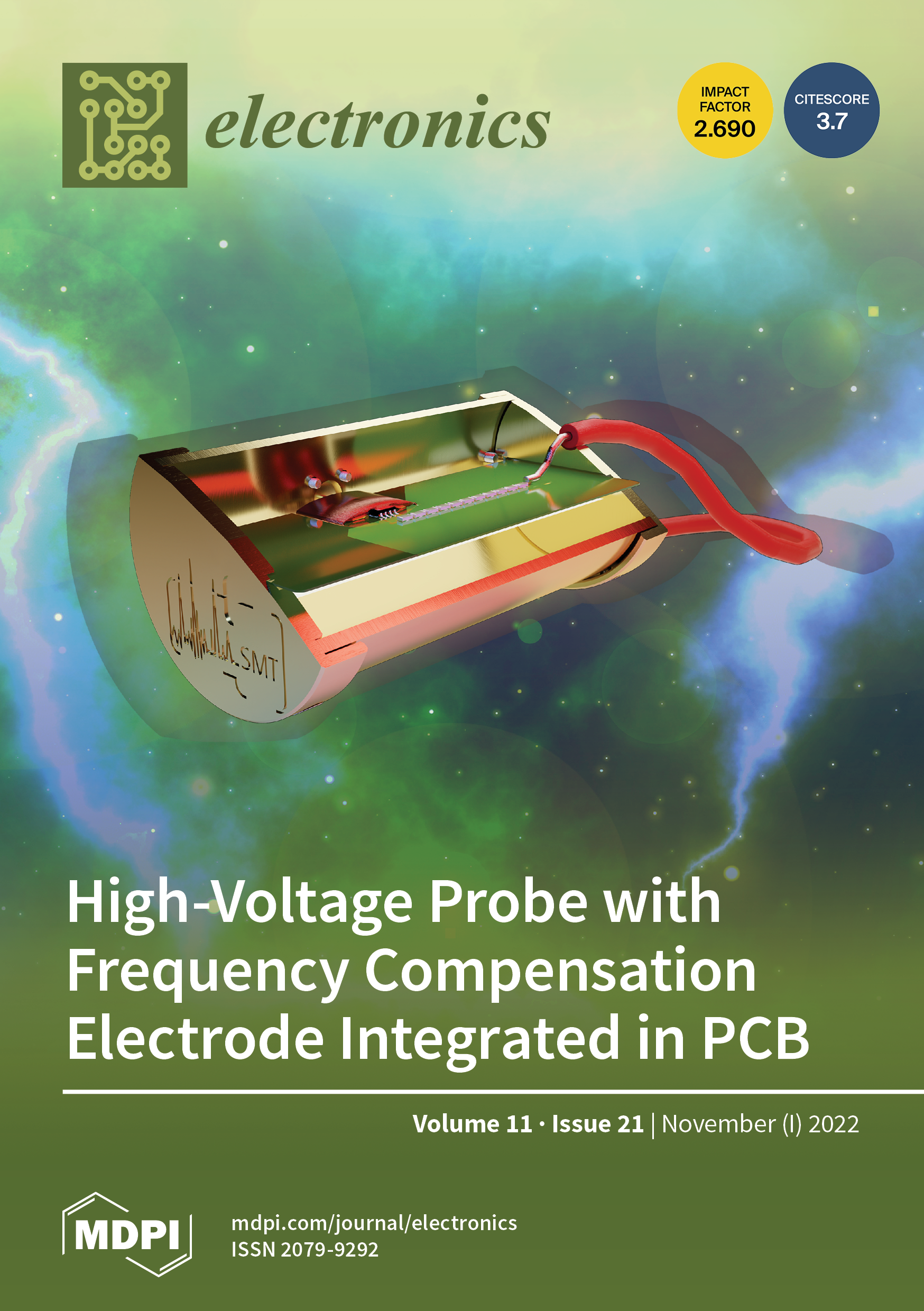
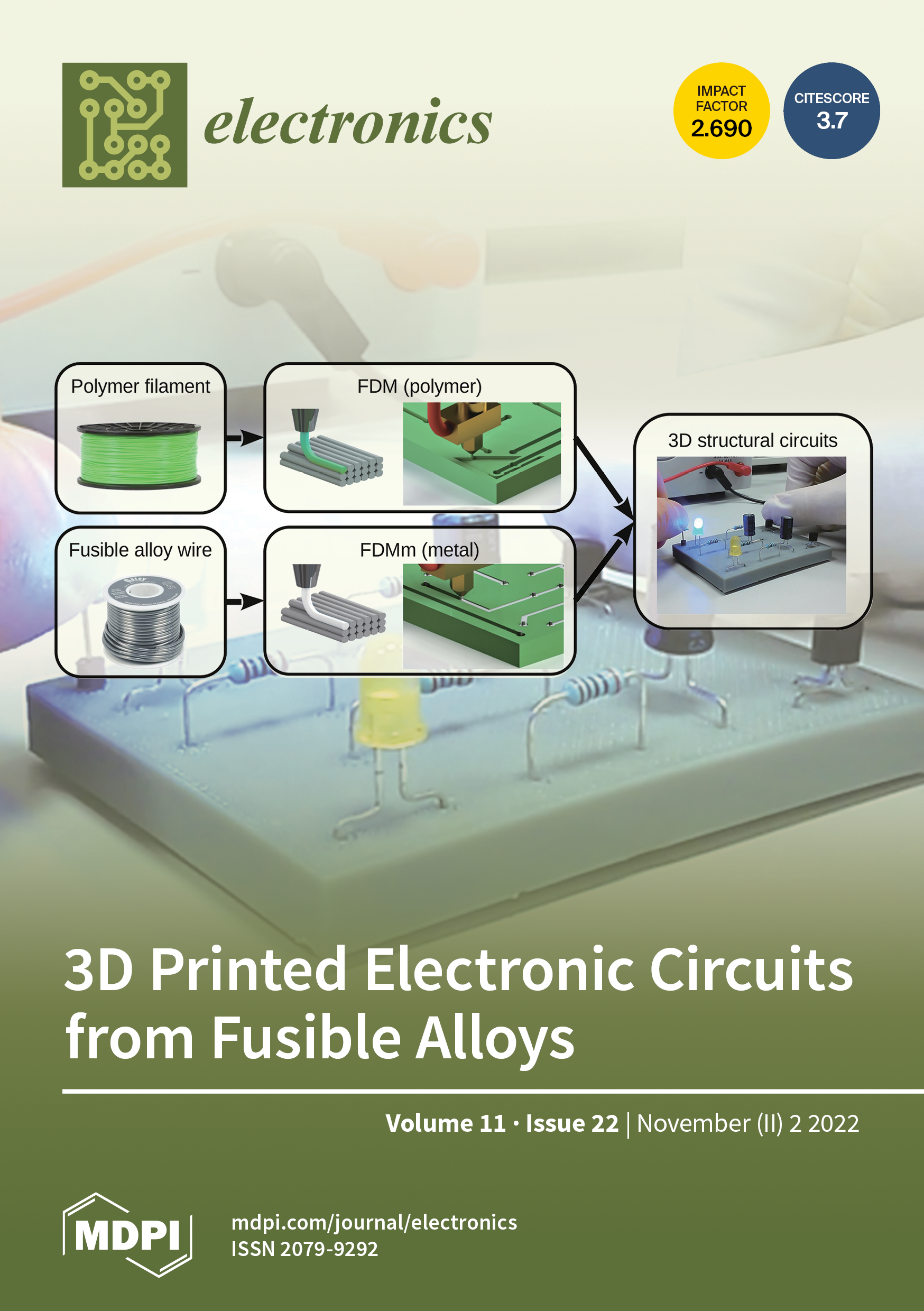
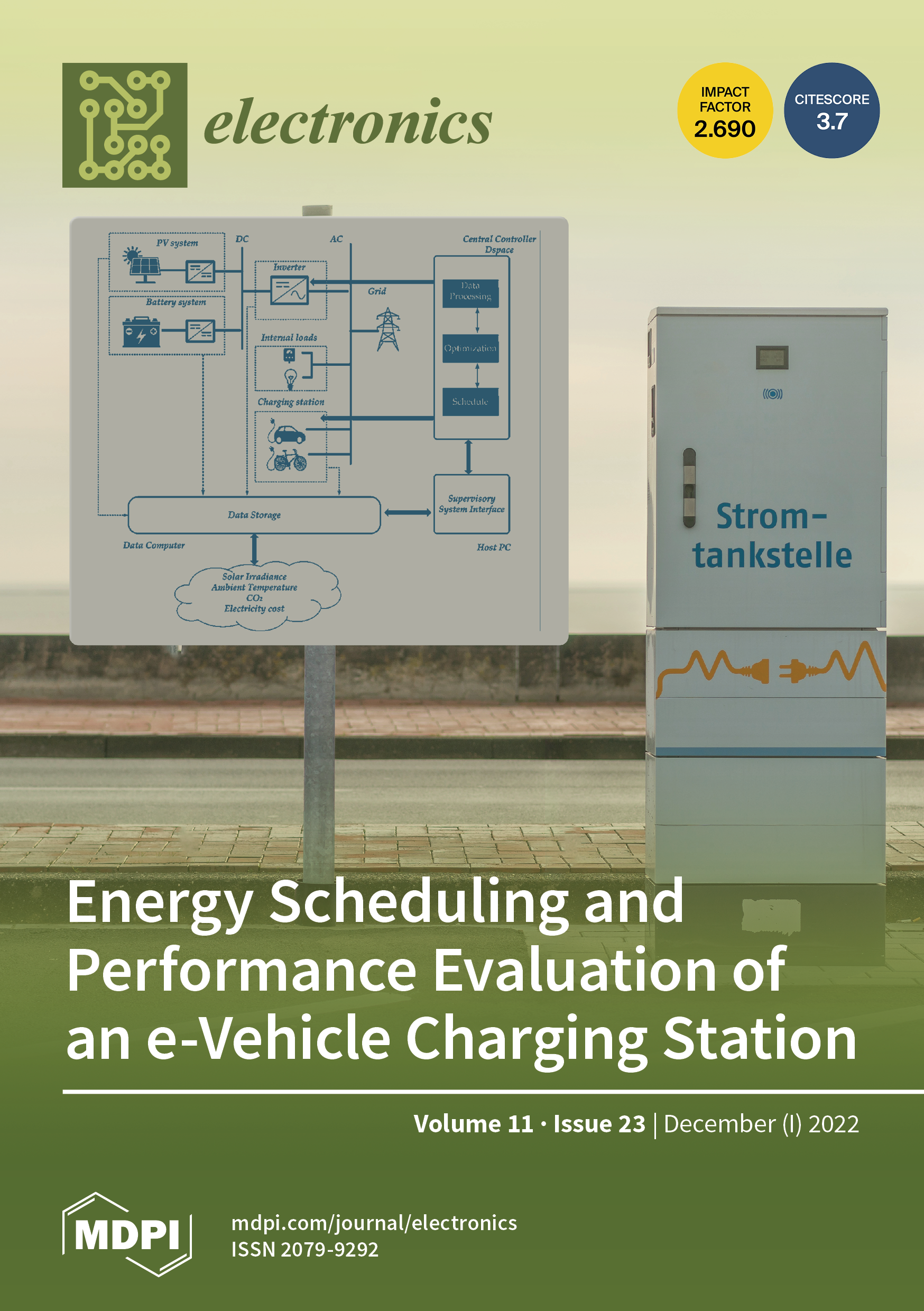
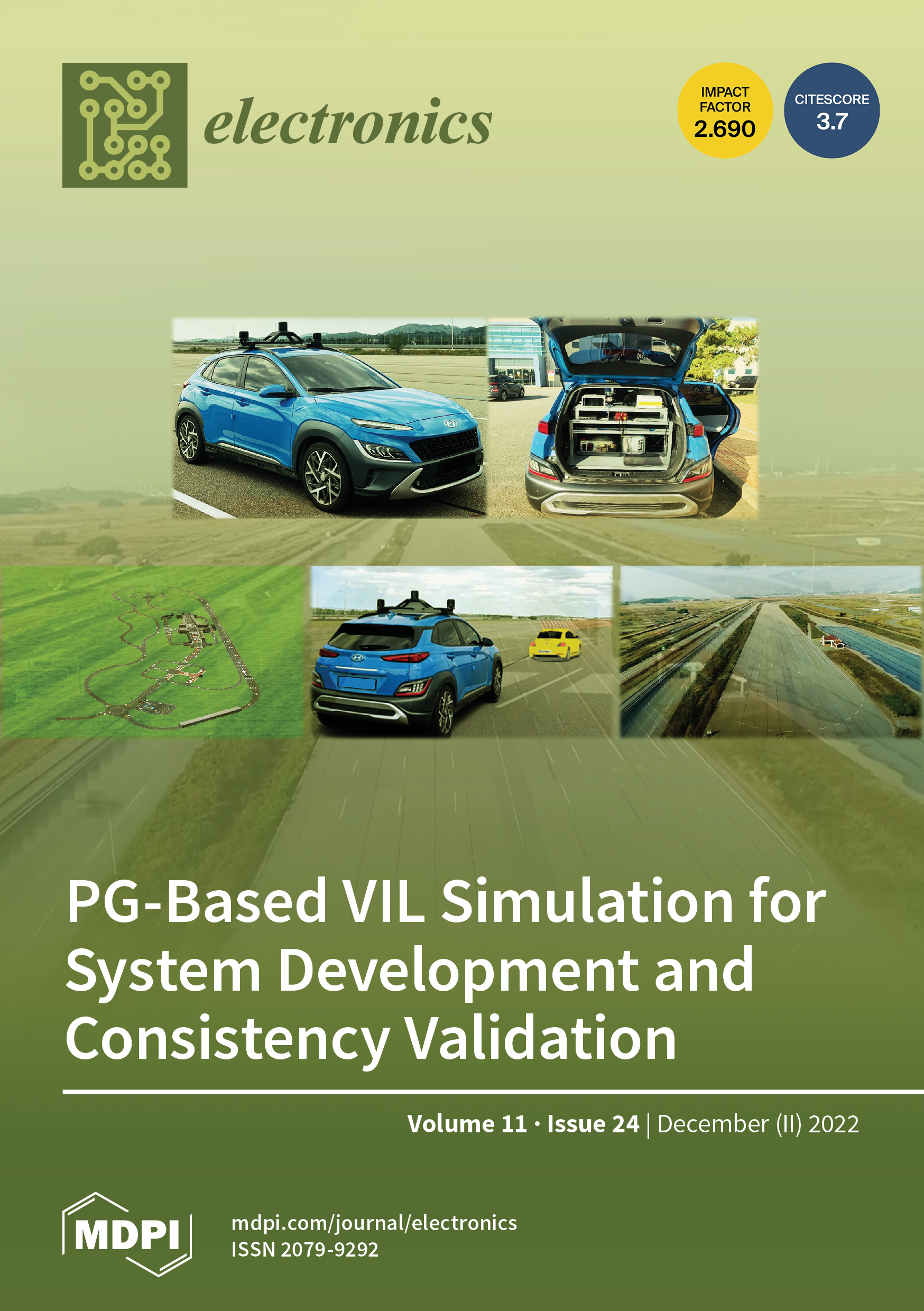























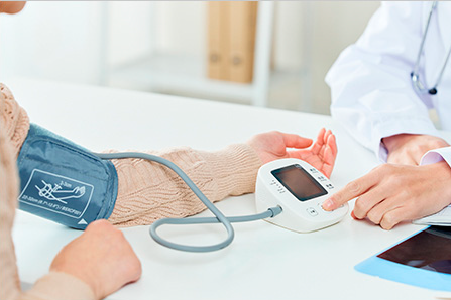






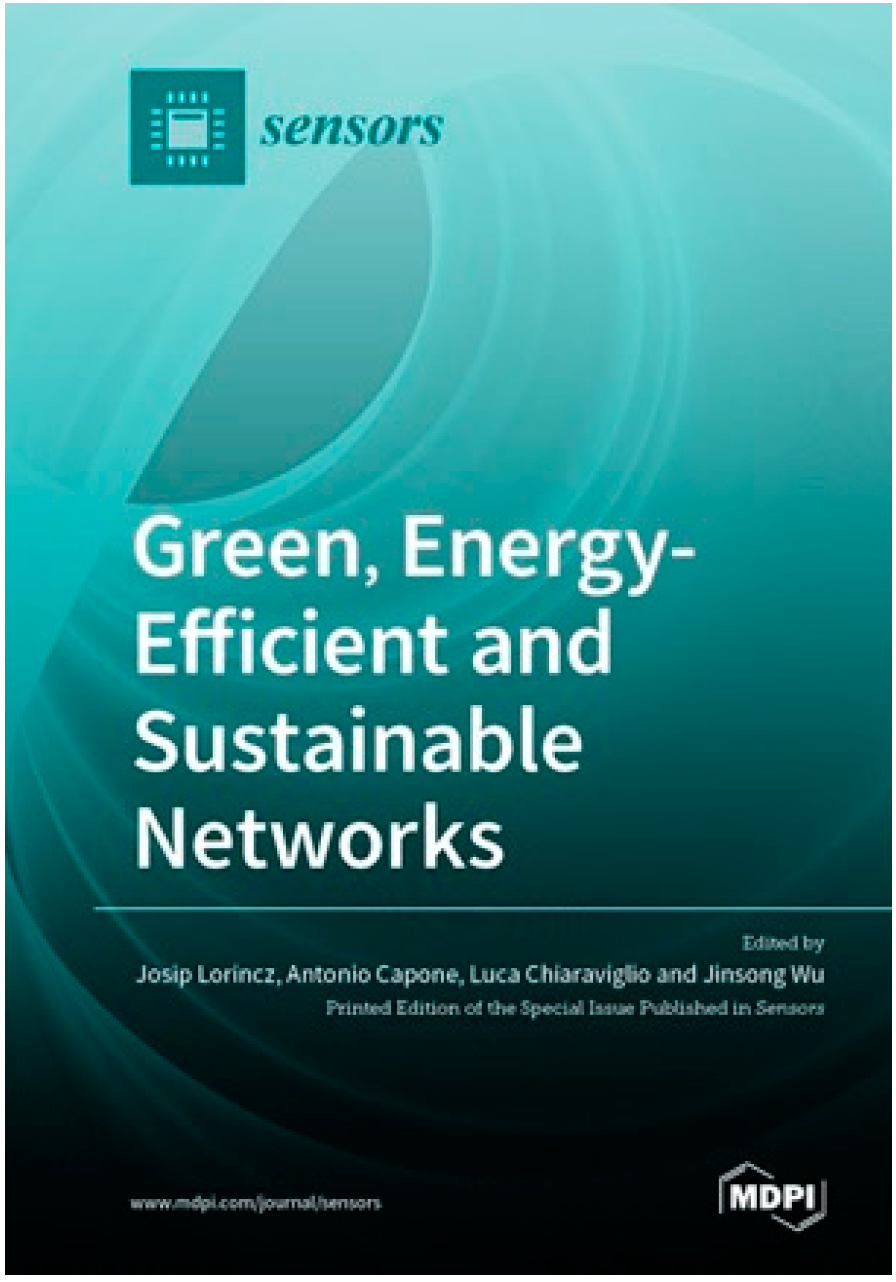
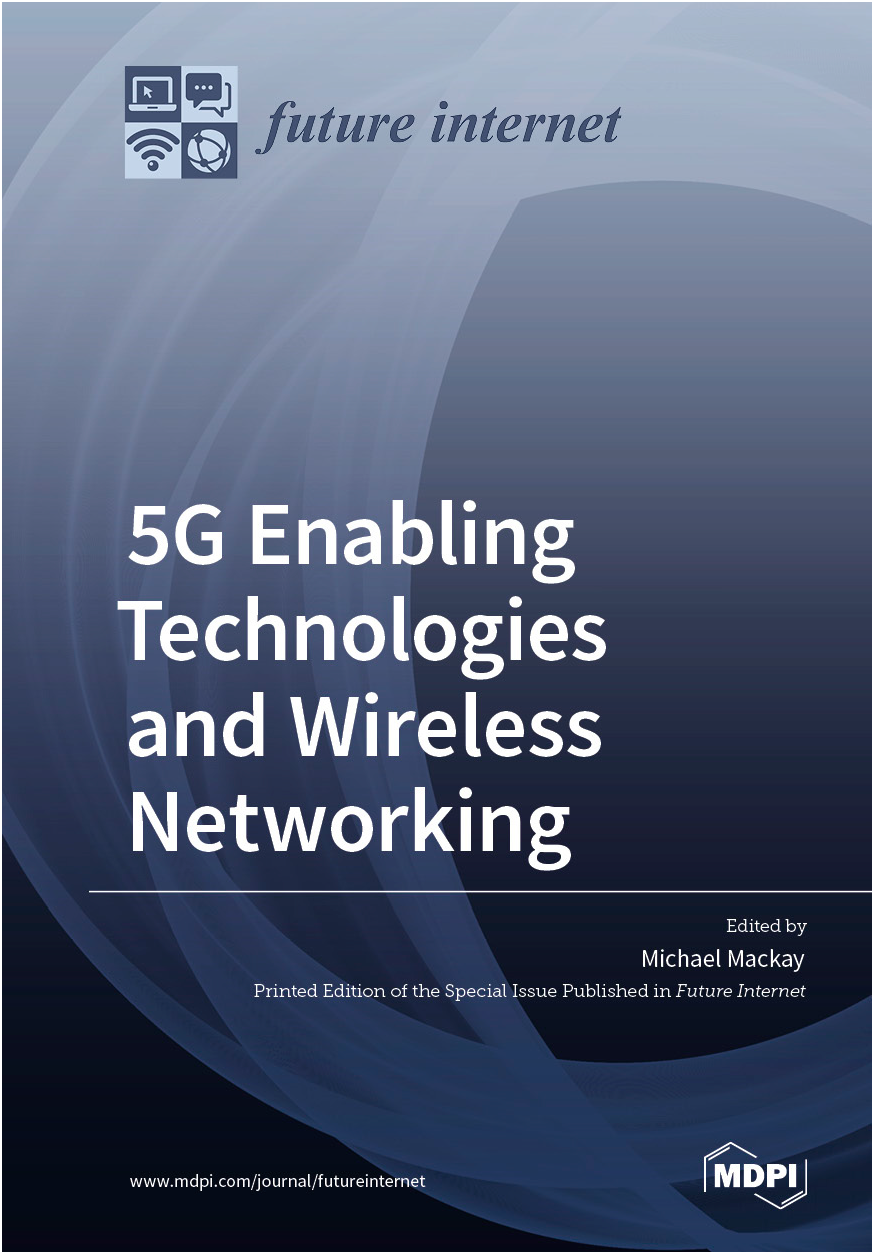
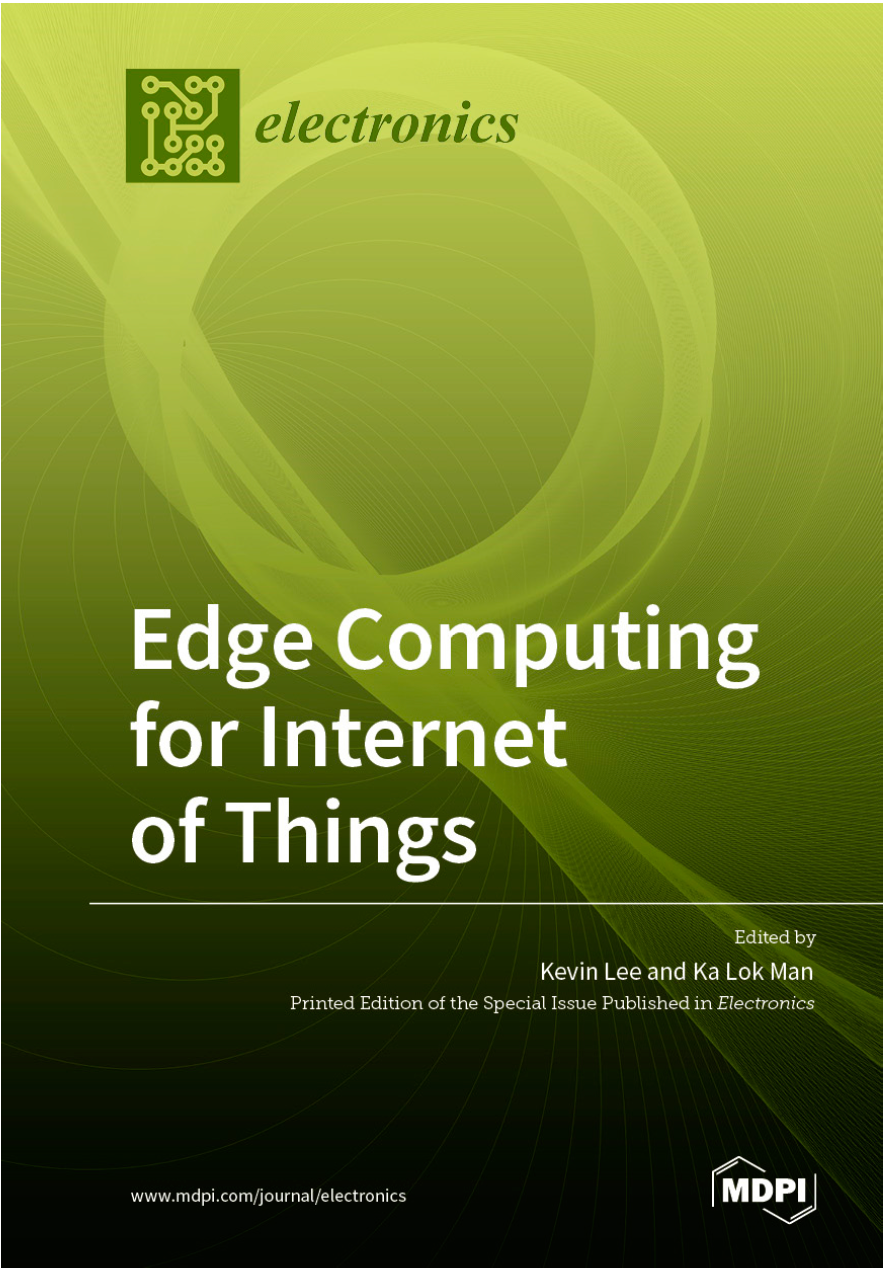


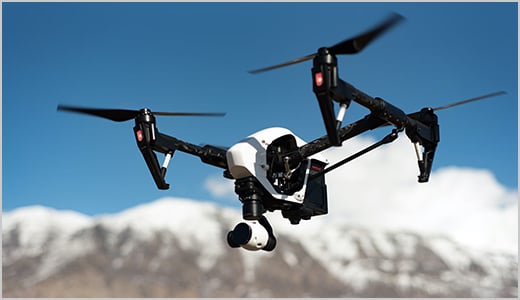
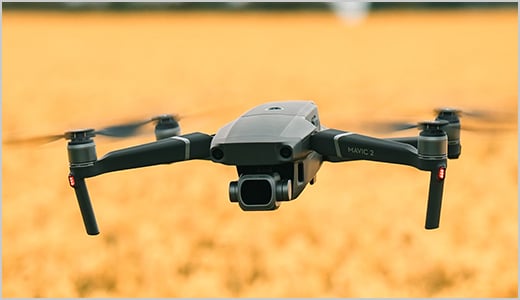





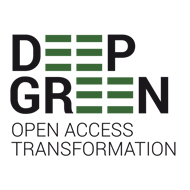
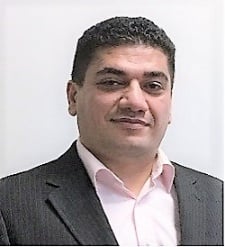













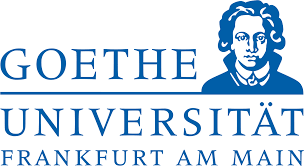
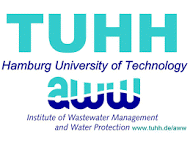




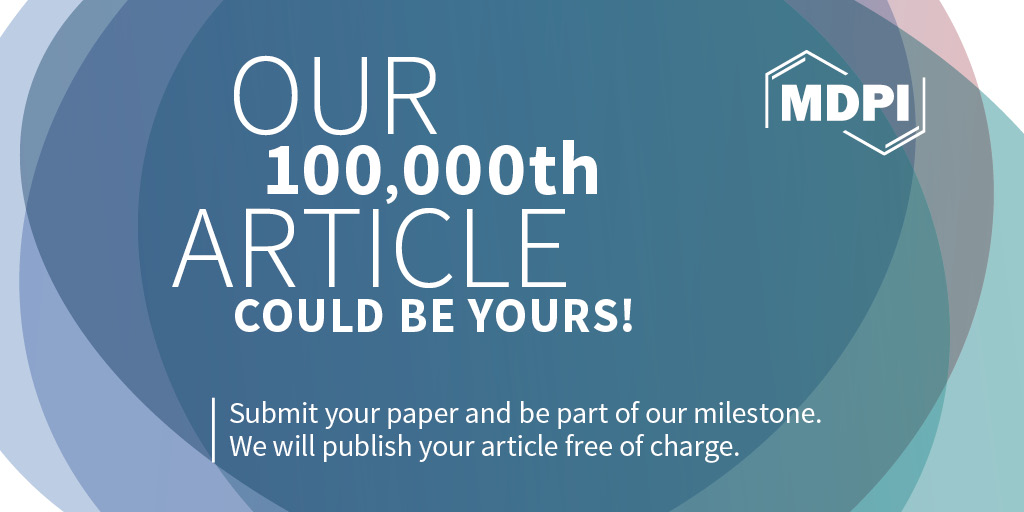

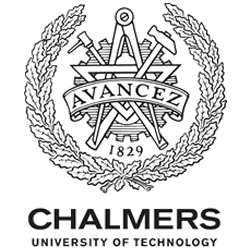

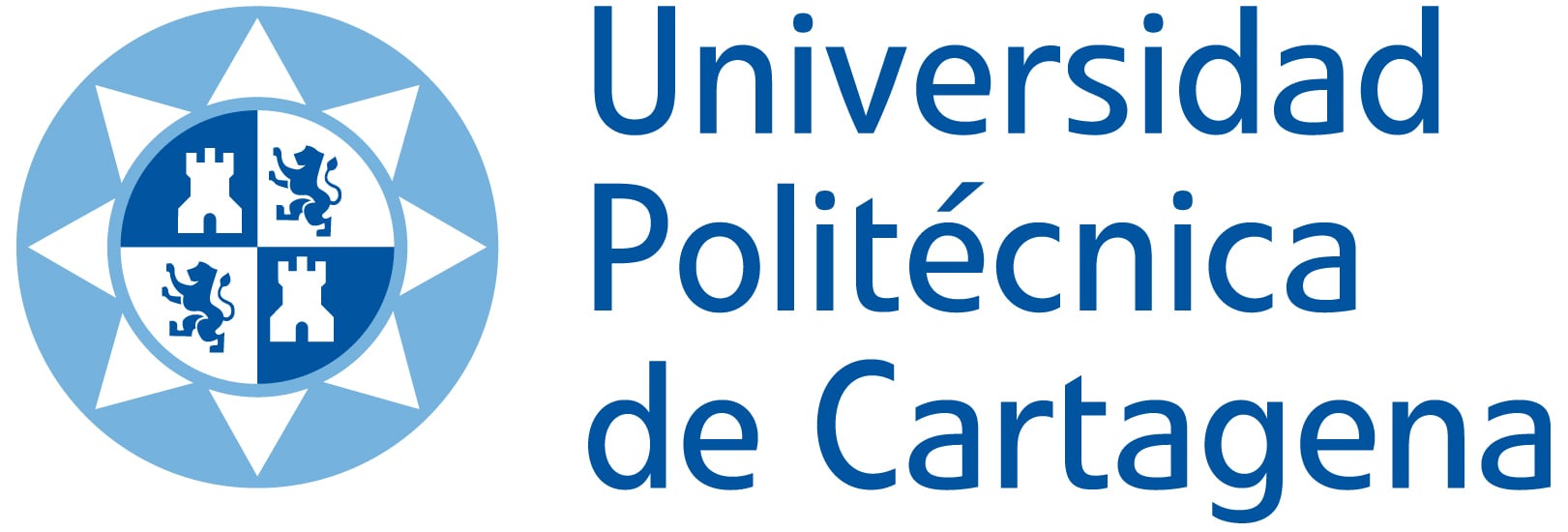
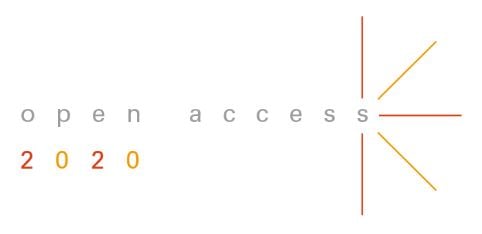
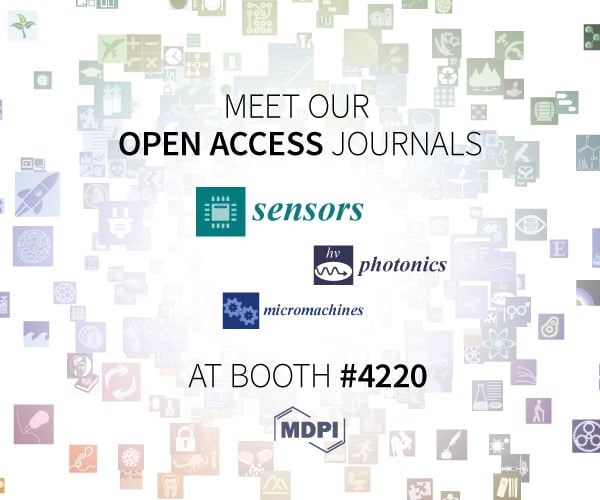



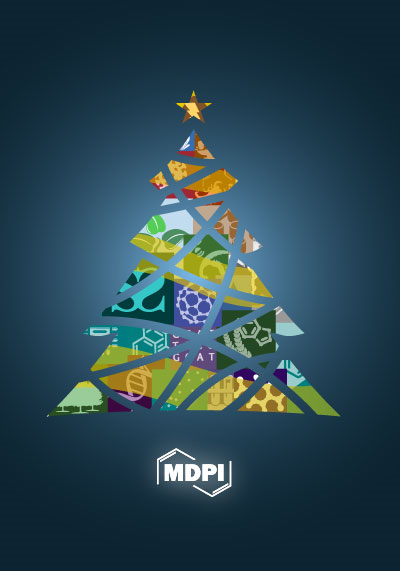





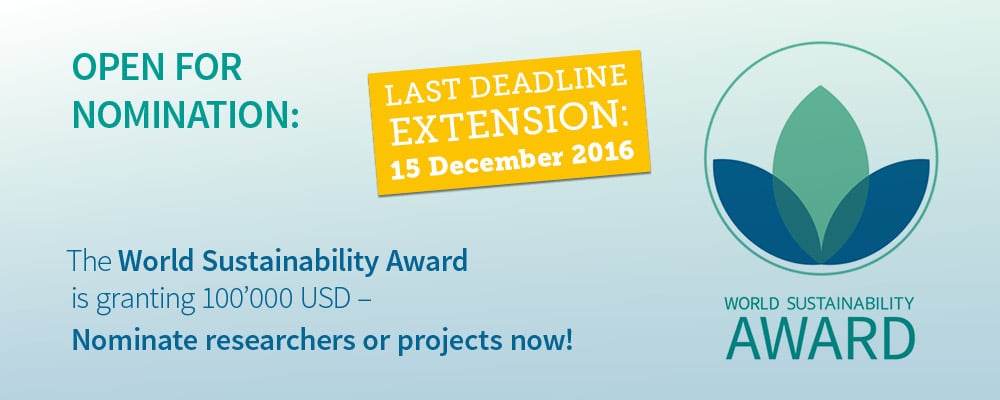



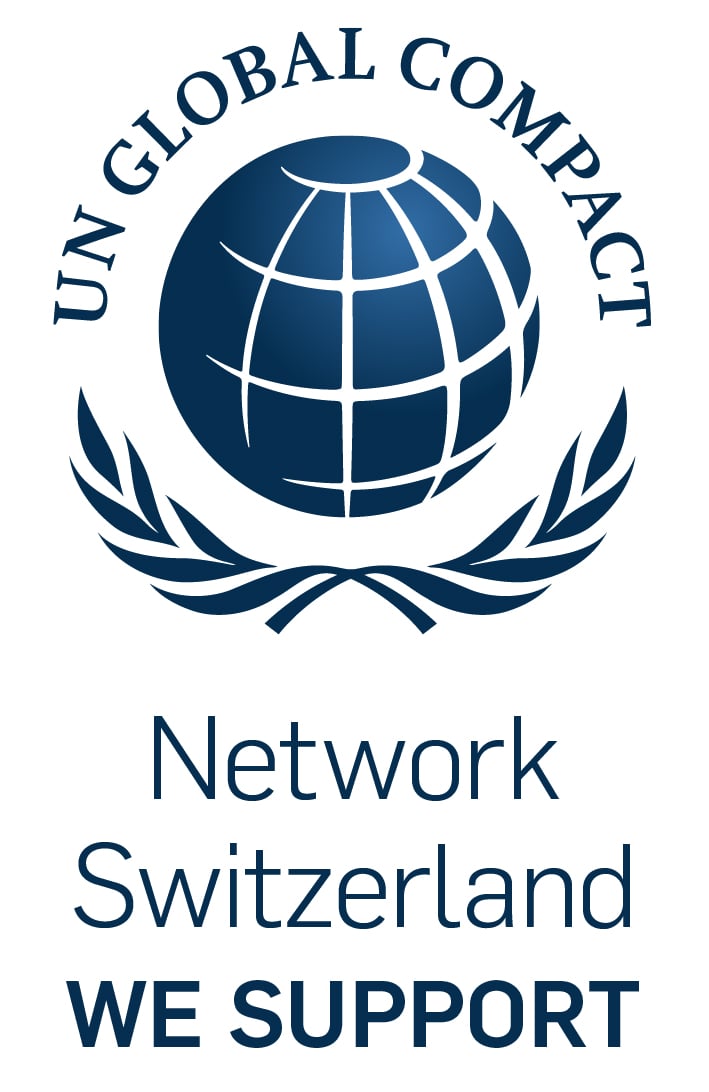
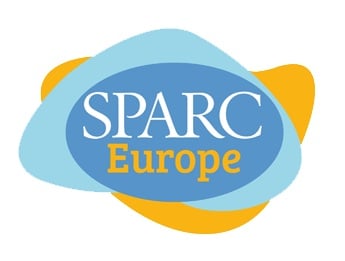
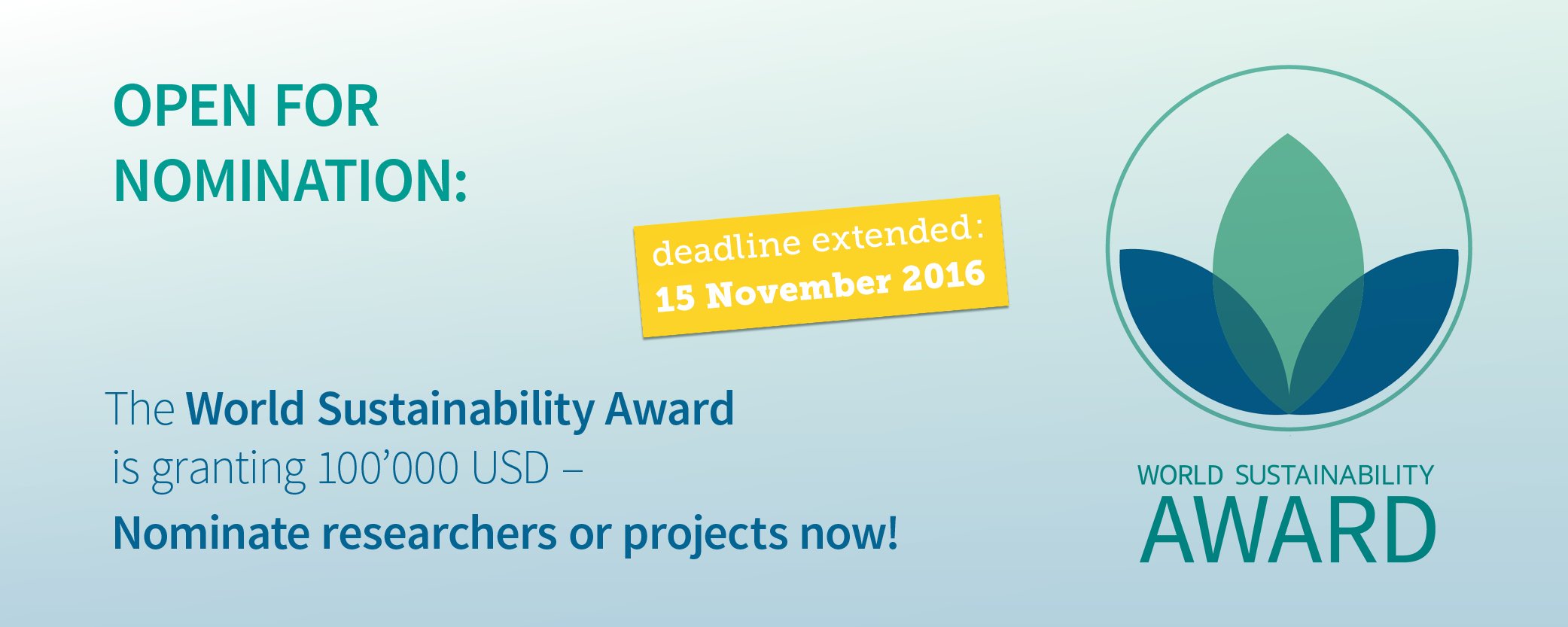 .
.